




41 West 47th Street, New York, N.Y. 10036
Selections from our "little mags" Dept., complete and Broken Runs.
ACCENT, edt. Kerker Quinn. Unbroken Run: Aut 1940-Aut 1951. 44 issues $60.00
AMERICAN MERCURY, edt. H. L. Mencken. Jan 1924-Dec 1935 (missing: Jul & Nov 1933). 142 issues
ENVOY (Dublin). Compo Run: 1-20 (1949-51). Incl. Spec. James Joyce issue. 20 issues. $45.00
$125.00
AUDIENCE (Cambridge, Mass.). Compo Run: Feb 1955-Aut 1960. 36 issues $50.00
BIG TABLE (Chicago). Compo Run: 1-5. 5 issues $17.50
BLUES, edt. Ch. Henri Ford & Parker Tyler. Run: 1-9 (missing: No.6). 8 Issues $25.00
BOTTEGHE OSCURE, edt. Marguerite Caetani. Compo Run: 1-25 plus index. Orig. issues, in wrappers. Index bound. 26 issues. $175.00
BRIARCLIFF QUARTERLY (orig. MARYLAND QUARTERLY), edt. Jane Woodring & Norman MacLeod. Unbroken Run: Nos. 1-10 (1944-46). 10 issues
$12.50
BROOM, edt. Harold Loeb. Nos. 1-4 (192122). Bound, 4 issues
$50.00
CHIMERA, edt. Wm. Arrowsmith, Barbara Howes, etc. Unbroken Run: Spr 1942-Sum 1947.20 issues
$45.00 Same. Spr 1942-Sum 1944. 12 issues. $20.00
CHOICE (Chicago), edt. John Logan. Compo Run: Spr 1961-No. 3 (1963).3 issues $6.00
CHRYSALIS, edt. Lily & Baird Hastings. Run: 1 :1-14:12 (missing: 3:11-12, 4:1-2, 13:9-12). 65 issues
$65.00
CONTACT, edt. W. C. Williams. Compo Run: Feb-Oct 1932. 3 issues
$20.00
CONTACT (San Francisco), edt. Wm. H. Ryan. Unbroken Run: 1 (1958)-Sept 1961. First 9 issues (all pub. in small format). $15.00
EL CORNO EMPLUMADO, edt. Margaret Randall. Compo Run: Jan 1962-Jan 1966. In English & Spanish. 17 issues
$75.00
COTERIE (London). Unbroken Run: Nos. 1-6/7 (1919-21). Incl. Huxley, Sitwells, H.D. Near-mint, in gold-stamped box. 6 issues.
$15.00
CRITERION, edt. T. 5. Eliot. Compo Run: 1-71 (1922-1939), Missing: No. 65. 70 issues. $275.00
DYN, edt. Wolfgang Paalen. Compo Run: 1-6 (1942-44). Bound, 5 issues
$20.00
THE ENEMY, edt. Wyndham Lewis. Compo Run: 1927-29. No. 1 trifle worn at spine. 3 issues
$40.00
EVERGREEN REVIEW, edt. Barney Rossett. Compo Run: 1-39.39 issues
$80.00
THE EXILE, edt. Ezra Pound. Compo Run: 1-4 (1927-28).4 issues $50.00
FAULKNER STUDIES (Denver & Minneapolis). Compo Run: 1952-54. Light water stain at edge. 11 issues
$15.00
FIGURE IN THE CARPET, edt. Hansell Baugh. Nos.1,3, 4 (1927-28). 3 issues $4.50
FRONT, edt. Norman MacLeod. Compo Run: 1930-31. 4 issues
$25.00
FURIOSO, edt. Reed Whittemore. Run: Sum 1941-Fall 1952 (missing: Vol. 2, No.2). 24 issues $25.00
GADFLY, edt. Lawrence Scott. Compo Run: 2 issues. Lively journal devoted largely to Ezra Pound & his works $7.50
THE GEM, edt. Alfred L. Elliott, Somerville, Mass. Vol. 1, Nos.1, 3, 5 (1861). 3 issues. $5.00
GENESIS WEST, edt. Gordon Lish. Compo Run: 1-7. 7 issues $15.00
HEMISPHERES, edt. Yvan Goli. Unbroken Run: 1-6. I n French & English 5 issues. $16.50
HORIZON, edt. Cyril Connolly. Compo Run: 1-120-21, plus index to Nos. 1-108 (19401950). 120 issues $150.00
Same. Missing No.1 $95.00
HOUND & HORN, edt. Lincoln Kirstein. Compo Run: 1927-34.28 issues $125.00
JAMES JOYCE REVIEW, edt. Edmund Epstein. Compo Run. 6 issues $15.00
LE JOURNAL DES POETEs, No.4, Dec 1932. Incl. French trans. of Hart Crane, Djuna Barnes, W. C. Williams. 4-page newspaper, folded $4.50
LIFE & LETTERS TODAY, edt. Robt. Herring. Run: 1-153 (missing: 7 issues after 104). Large-format early issues incl. Stein, Thomas, Moore, Williams. 146 issues $65.00
THE LITTLE REVIEW, edt. Margaret Anderson & Jane Heap. Run: Mar 1914-Spr 1929 (final issue). Missing: May & Nov 1914, Aug 1915, Nov 1919. Most important of all the "little mags." Incl. Spec. Issues on James, Pound, Brancusi, Picabia, etc. & 20 of the 23 issues containing first appearance of ULYSSES. 77 issues $675.00
LONDON MERCURY, edt. J. C. Squire. Unbroken Run: 1919-22.35 issues $50.00
MAGAZINE, edt. Kirby Congdon. Mimeographed. Compo Run: 2 issues, ltd. 250 copies. No.2 is a special "little mags" issue. $7.50
MEASURE, edt. Rob!. M. Hutchins. Nos. 1-4 (1950). 4 issues $3.50
CONTINUED ON INSIDE BACK COVER
Even though the Elizabethan period was the greatest in English stage history, its documentary records of authorship are often fragmentary, contradictory, or erroneous. This study, an essay in literary history and method, attempts to deal with the problem. S. Schoenbaum is Professor of English at Northwestern University.
288 pp. $7.50
.4 Study 0/ D. H. Lawrence by H. M. Daleski
Lawrence's novels abound with characters that can be defined in terms of strong "male" and "female" principles. The author divides' the novels into periods based on these principles, and in so doing defines and explains Lawrence's artistic and psychological development. H. M. Daleski teaches English at the Hebrew University in Jerusalem.
400 pp. $9.00
edited by
Jack P. Dalton and Clive HartThis volume of essays was prepared especially to commemorate the 25th anniversary of Finnegans Wake. The contributors, all prominent Joyceans, include Budgen, Colum, Hoffman, Mercier, Senn, Atherton, Morse, Halper, Kain, Litz, Hayman, and Dalton.
142 pp. $5.50
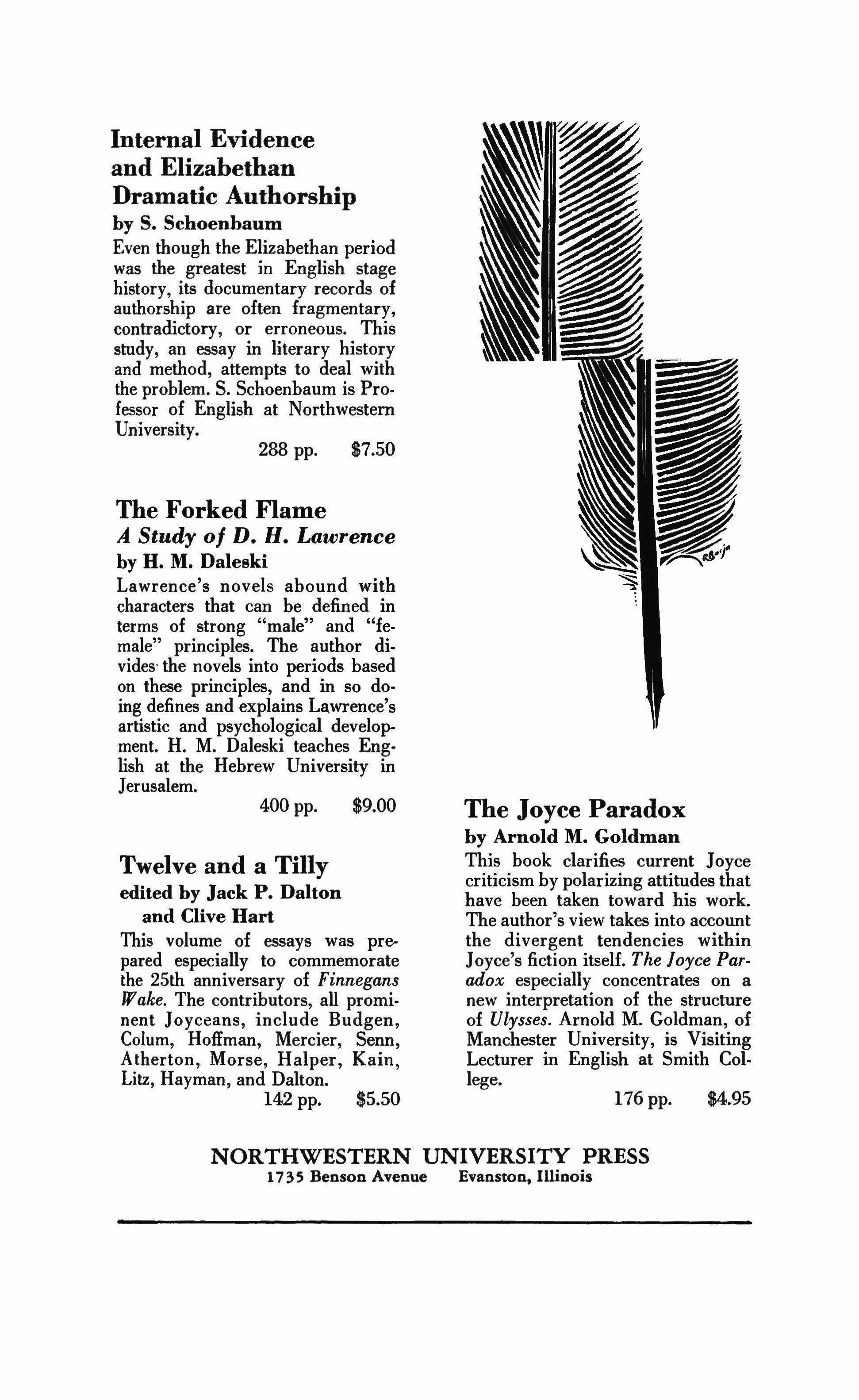
by
Arnold M. GoldmanThis book clarifies current Joyce criticism by polarizing attitudes that have been taken toward his work. The author's view takes into account the divergent tendencies within Joyce's fiction itself. The Joyce Paradox especially concentrates on a new interpretation of the structure of Ulysses. Arnold M. Goldman, of Manchester University, is Visiting Lecturer in English at Smith College.
176pp. $4.95
NORTHWESTERN UNIVERSITY PRESS 1735 Benson Avenue Evanston, Illinois
criticism
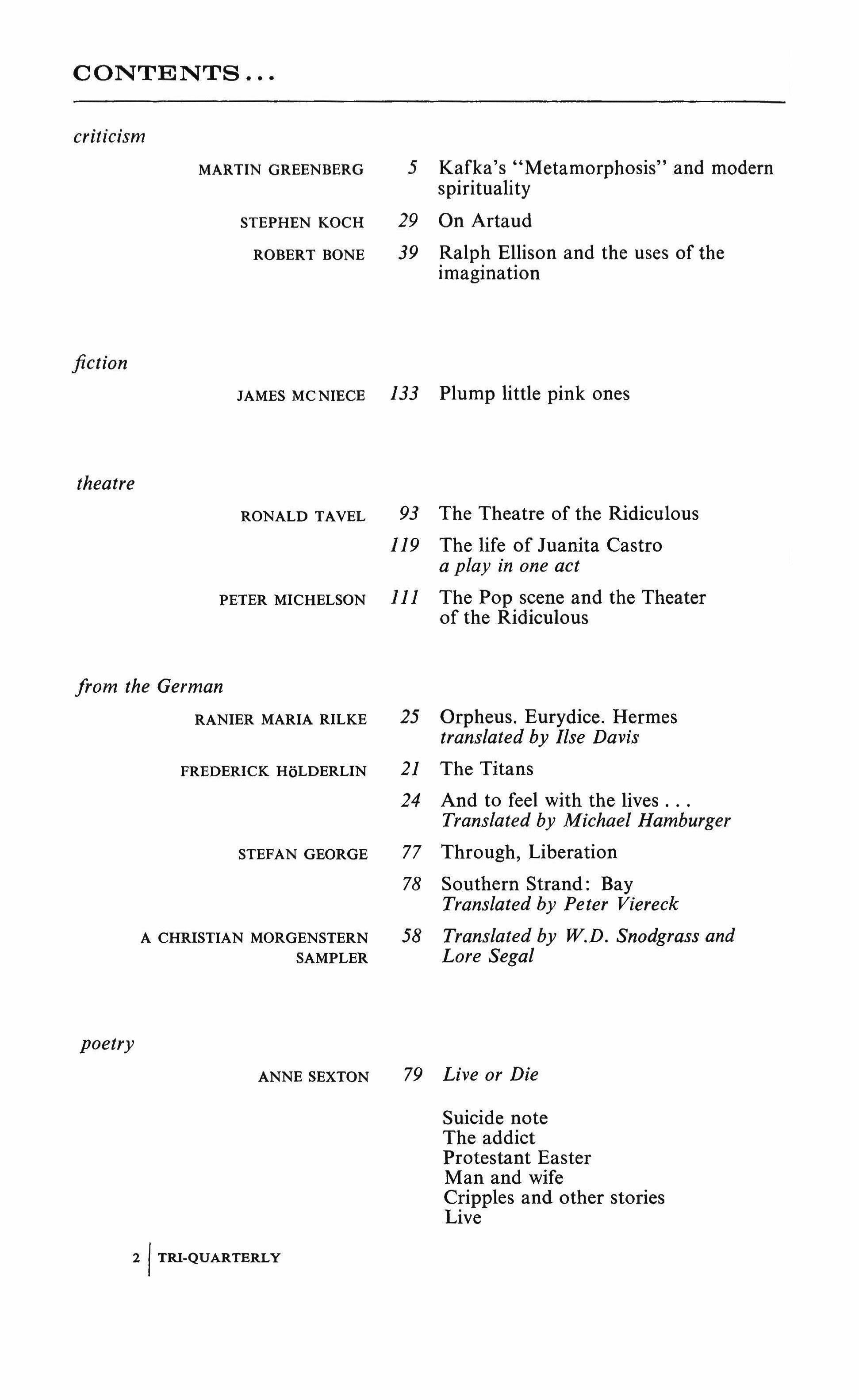
fiction
MARTIN GREENBERG
STEPHEN KOCH
ROBERT BONE 5 Kafka's "Metamorphosis" and modern spirituality 29 On Artaud 39 Ralph Ellison and the uses of the imagination
JAMES MCNIECE 133 Plump little pink ones
theatre
RONALD TAVEL 93 The Theatre of the Ridiculous 119 The life of Juanita Castro a play in one act
PETER MICHELSON 111 The Pop scene and the Theater of the Ridiculous
from the German
RANIER MARIA RILKE 25 Orpheus. Eurydice. Hermes translated by lise Davis
FREDERICK HoLDERLIN 21 The Titans 24 And to feel with the lives Translated by Michael Hamburger
STEFAN GEORGE 77 Through, Liberation 78 Southern Strand: Bay Translated by Peter Viereck A CHRISTIAN MORGENSTERN 58 Translated by W.D. Snodgrass and SAMPLER Lore Segal
poetry
ANNE SEXTON 79 Live or Die
Suicide note The addict Protestant Easter Man and wife
Cripples and other stories Live
TRI-QUARTERLY 6
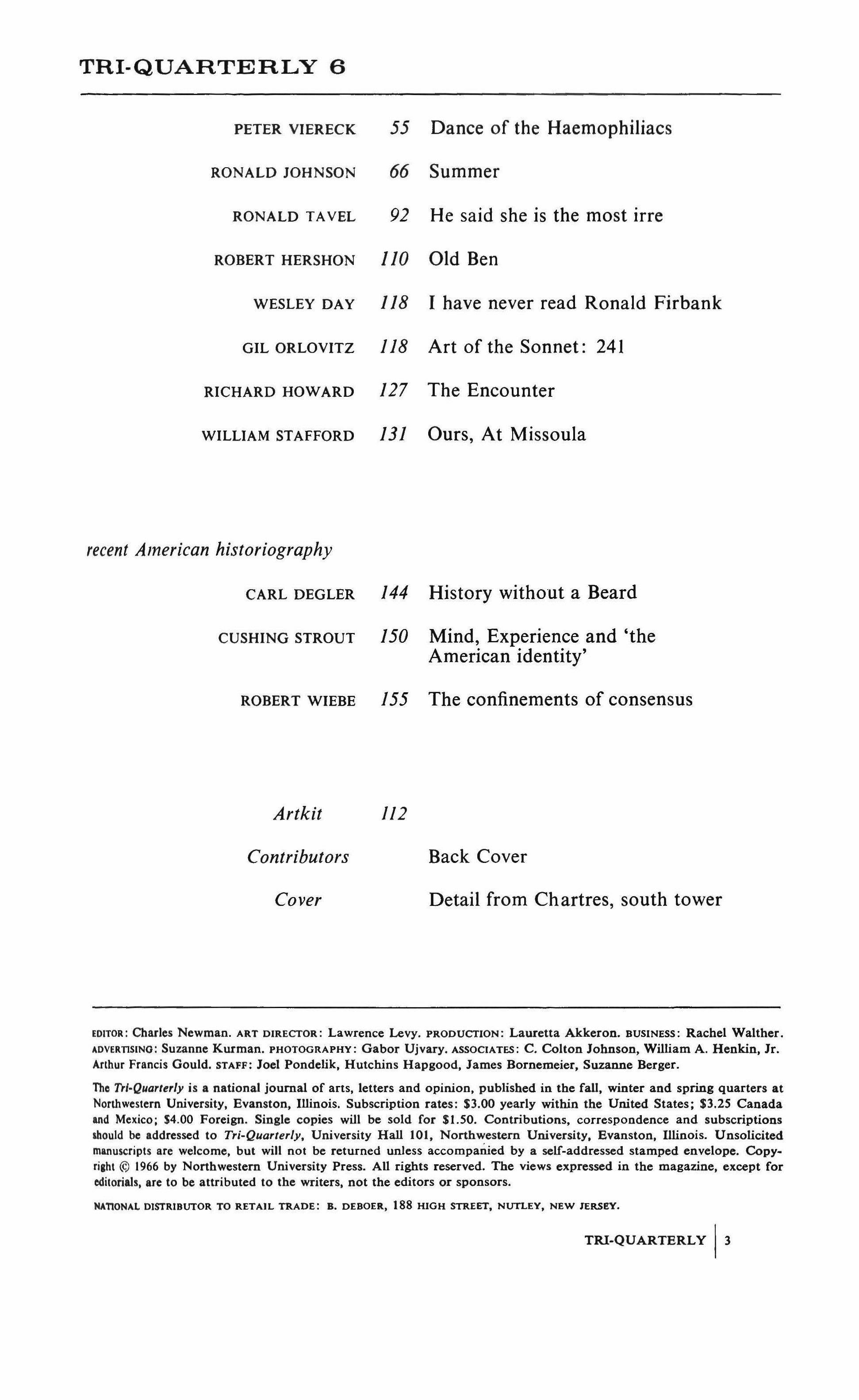
PETER VIERECK 55 Dance of the Haemophiliacs
RONALD JOHNSON 66 Summer
RONALD TAVEL 92 He said she is the most irre
ROBERT HERSHON 110 Old Ben
WESLEY DAY 118 I have never read Ronald Firbank
GIL ORLOVITZ 118 Art of the Sonnet: 241
RICHARD HOWARD 127 The Encounter
WILLIAM STAFFORD J3I Ours, At Missoula
recent American historiography
CARL DEGLER 144 History without a Beard
CUSHING STROUT 150 Mind, Experience and 'the American identity'
ROBERT WIEBE 155 The confinements of consensus
Artkit II2
Contributors Back Cover
Cover
Detail from Chartres, south tower
EDITOR: Charles Newman. ART DIRECTOR: Lawrence Levy. PRODUCTION: Lauretta Akkeron. BUSINESS: Rachel Walther.
ADVERTISINO: Suzanne Kurman. PHOTOGRAPHY: Gabor Ujvary, ASSOCIATES: C. Colton Johnson, William A. Henkin, Jr. Arlhur Francis Gould. STAFF: Joel Pondelik, Hutchins Hapgood, James Bornemeier, Suzanne Berger.
The Ttl-Quarterly is a national journal of arts, letters and opinion, published in the fall, winter and spring quarters at Northwestern University, Evanston, Illinois. Subscription rates: $3.00 yearly within the United States; $3.25 Canada and Mexico; 54.00 Foreign. Single copies will be sold for 51.50. Contributions, correspondence and subscriptions should be addressed to Tri-Quarterly, University Hall 101, Northwestern University, Evanston, Illinois. Unsolicited manuscripts are welcome, but will not be returned unless accompanied by a self-addressed stamped envelope. Copyrilht © 1966 by Northwestern University Press. All rights reserved. The views expressed in the magazine, except for editorials, are to be attributed to the writers, not the editors or sponsors.
NATIONAL DISTRIBtrrOR TO RETAIL TRADE: B. DEBOER, 188 HIGH STREET, NUTLEY, NEW JERSEY. TRI-QUARTERLY
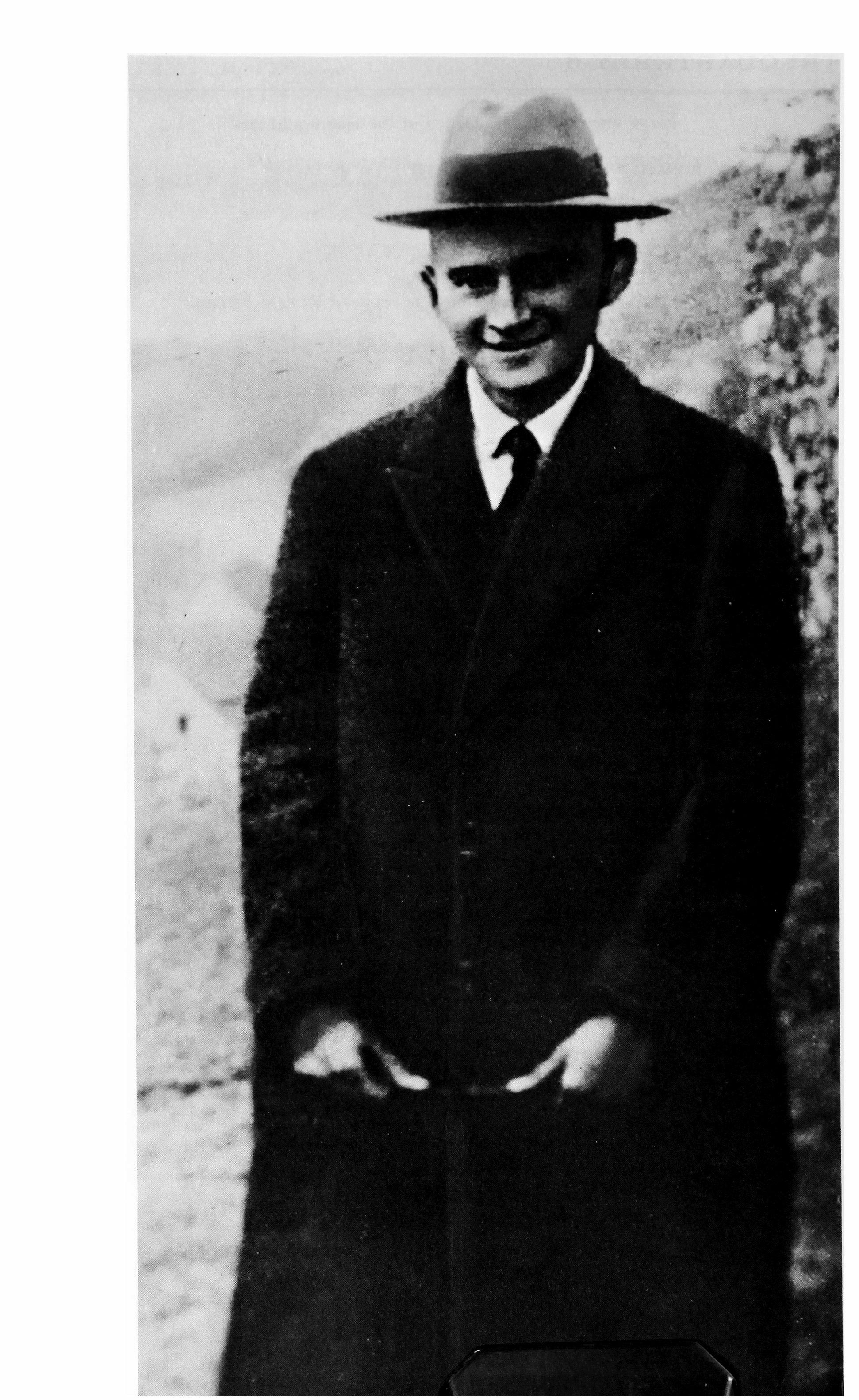
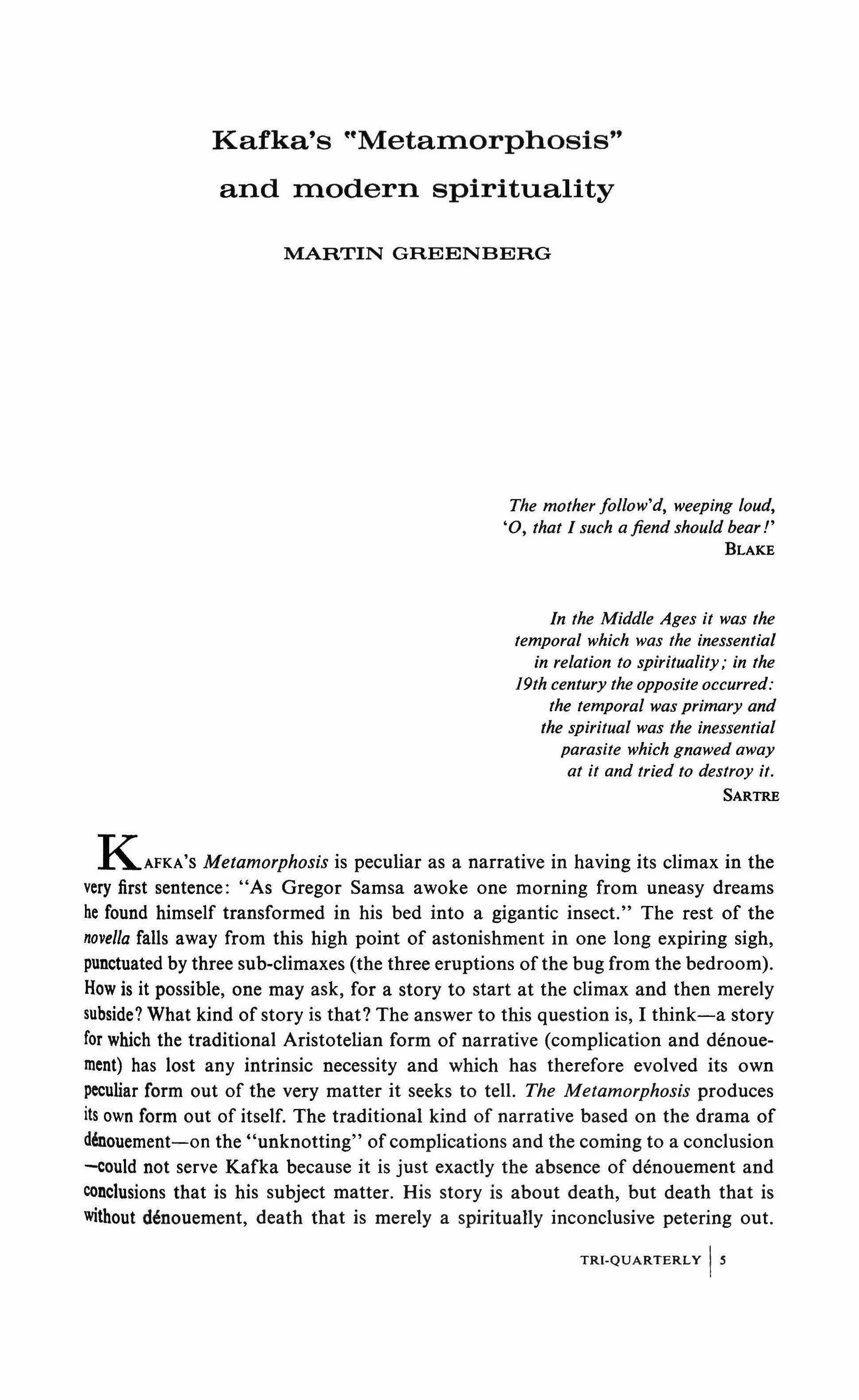
The mother follow'd, weeping loud, '0, that I such a fiend should bear!'
BLAKEIn the Middle Ages it was the temporal which was the inessential in relation to spirituality; in the 19th century the opposite occurred: the temporal was primary and the spiritual was the inessential parasite which gnawed away at it and tried to destroy it.
SARTREMetamorphosis is peculiar as a narrative in having its climax in the very first sentence: "As Gregor Samsa awoke one morning from uneasy dreams he found himself transformed in his bed into a gigantic insect." The rest of the novella falls away from this high point of astonishment in one long expiring sigh, punctuated by three sub-climaxes (the three eruptions of the bug from the bedroom). How is it possible, one may ask, for a story to start at the climax and then merely subside? What kind of story is that? The answer to this question is, I think-a story for which the traditional Aristotelian form of narrative (complication and denouement) has lost any intrinsic necessity and which has therefore evolved its own peculiar form out of the very matter it seeks to tell. The Metamorphosis produces its own form out of itself. The traditional kind of narrative based on the drama of dmouement-on the "unknotting" ofcomplications and the coming to a conclusion -could not serve Kafka because it is just exactly the absence of denouement and coDclusions that is his subject matter. His story is about death, but death that is without denouement, death that is merely a spiritually inconclusive petering out.
TRI-QUARTERLy I s
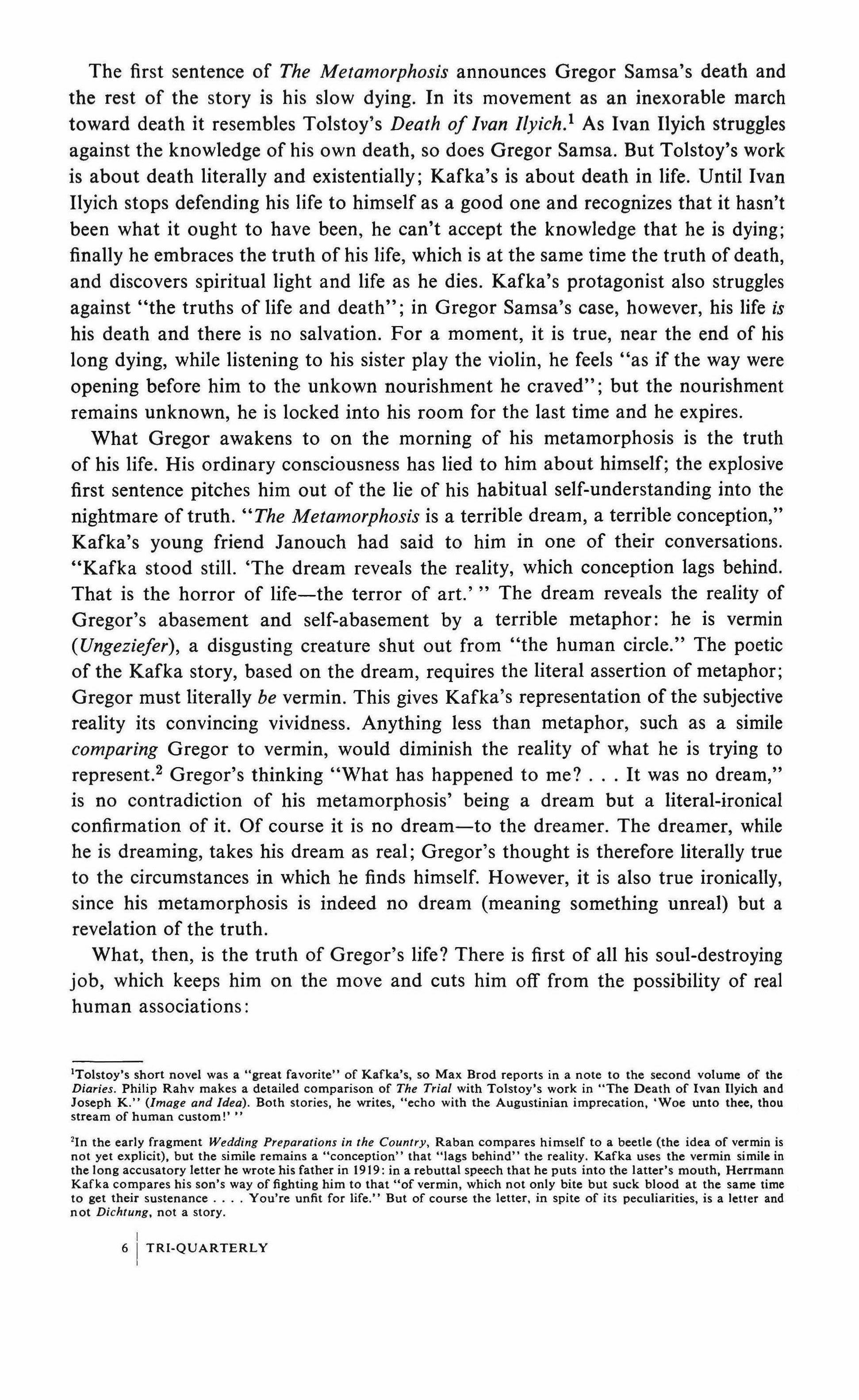
The first sentence of The Metamorphosis announces Gregor Samsa's death and the rest of the story is his slow dying. In its movement as an inexorable march toward death it resembles Tolstoy's Death oj Ivan Ilyich+ As Ivan Ilyich struggles against the knowledge of his own death, so does Gregor Samsa. But Tolstoy's work is about death literally and existentially; Kafka's is about death in life. Until Ivan Ilyich stops defending his life to himself as a good one and recognizes that it hasn't been what it ought to have been, he can't accept the knowledge that he is dying; finally he embraces the truth of his life, which is at the same time the truth of death, and discovers spiritual light and life as he dies. Kafka's protagonist also struggles against "the truths of life and death"; in Gregor Samsa's case, however, his life is his death and there is no salvation. For a moment, it is true, near the end of his long dying, while listening to his sister play the violin, he feels "as if the way were opening before him to the unkown nourishment he craved"; but the nourishment remains unknown, he is locked into his room for the last time and he expires. What Gregor awakens to on the morning of his metamorphosis is the truth of his life. His ordinary consciousness has lied to him about himself; the explosive first sentence pitches him out of the lie of his habitual self-understanding into the nightmare of truth. "The Metamorphosis is a terrible dream, a terrible conception," Kafka's young friend Janouch had said to him in one of their conversations. "Kafka stood still. 'The dream reveals the reality, which conception lags behind. That is the horror of life-the terror of art.' The dream reveals the reality of Gregor's abasement and self-abasement by a terrible metaphor: he is vermin (UngezieJer), a disgusting creature shut out from "the human circle." The poetic of the Kafka story, based on the dream, requires the literal assertion of metaphor; Gregor must literally be vermin. This gives Kafka's representation of the subjective reality its convincing vividness. Anything less than metaphor, such as a simile comparing Gregor to vermin, would diminish the reality of what he is trying to represent.P Gregor's thinking "What has happened to me? It was no dream," is no contradiction of his metamorphosis' being a dream but a literal-ironical confirmation of it. Of course it is no dream-to the dreamer. The dreamer, while he is dreaming, takes his dream as real; Gregor's thought is therefore literally true to the circumstances in which he finds himself. However, it is also true ironically, since his metamorphosis is indeed no dream (meaning something unreal) but a revelation of the truth.
What, then, is the truth of Gregor's life? There is first of all his soul-destroying job, which keeps him on the move and cuts him off from the possibility of real human associations:
"Tolstoy's short novel was a "great favorite" of Kafka'S, so Max Brod reports in a note to the second volume of the Diaries. Philip Rahv makes a detailed comparison of The Trial with Tolstoy'S work in "The Death of Ivan llyich and Joseph K." (Image and Idea). Both stories, he writes, "echo with the Augustinian imprecation, 'Woe unto thee, thou stream of human custom!'
'In the early fragment Wedding Preparations in the Country, Raban compares himself to a beetle (the idea of vermin is not yet explicit). but the simile remains a "conception" that "lags behind" the reality. Kafka uses the vermin simile in the long accusatory letter he wrote his father in 1919: in a rebuttal speech that he puts into the latter's mouth, Herrmann Kafka compares his son's way of fighting him to that "of vermin, which not only bite but suck blood at the same time to get their sustenance You're unfit for life." But of course the letter, in spite of its peculiarities, is a letter and not Dichtung not a story.
6 TRI-QUARTERLY
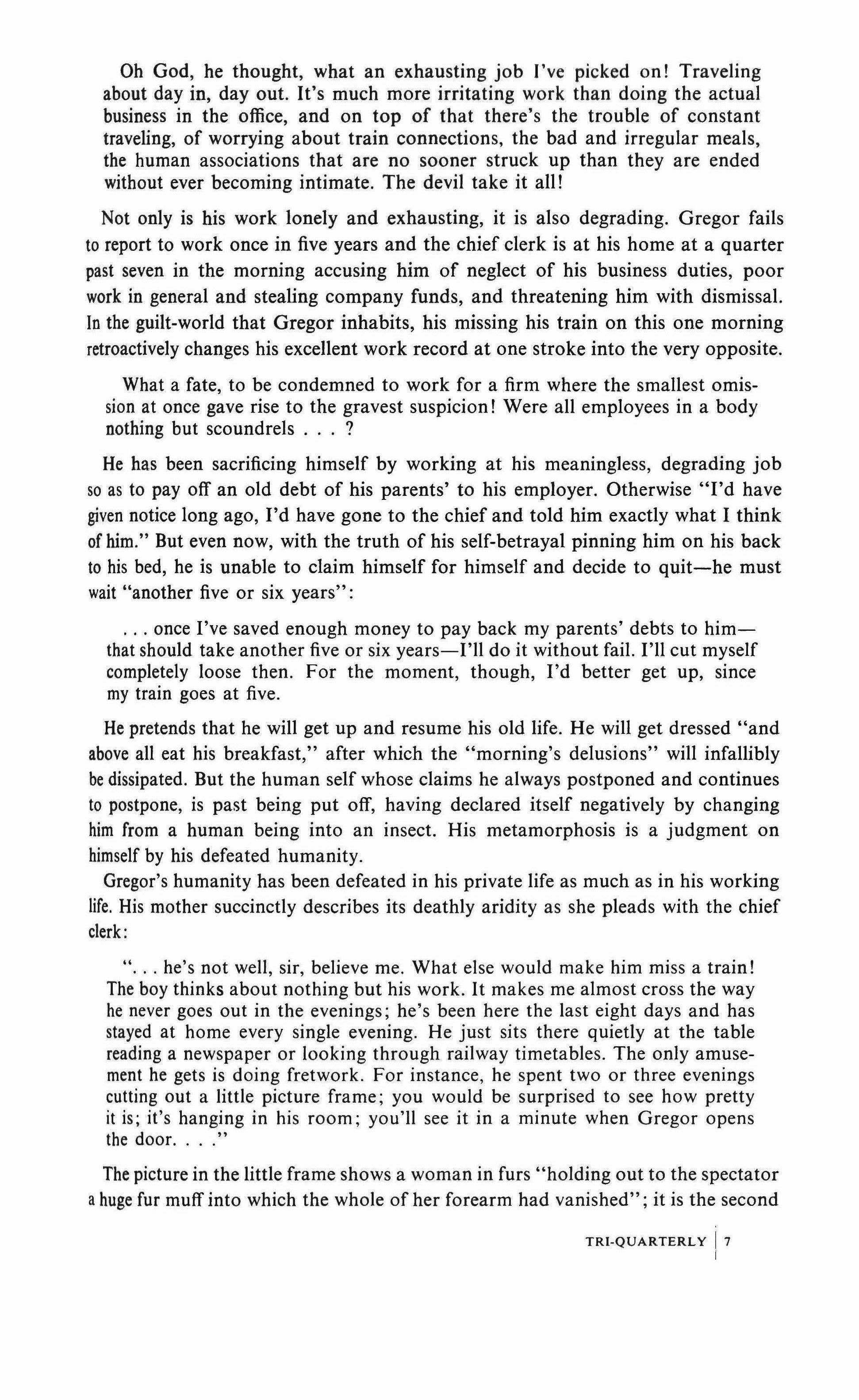
Oh God, he thought, what an exhausting job I've picked on! Traveling about day in, day out. It's much more irritating work than doing the actual business in the office, and on top of that there's the trouble of constant traveling, of worrying about train connections, the bad and irregular meals, the human associations that are no sooner struck up than they are ended without ever becoming intimate. The devil take it all!
Not only is his work lonely and exhausting, it is also degrading. Gregor fails to report to work once in five years and the chief clerk is at his home at a quarter past seven in the morning accusing him of neglect of his business duties, poor work in general and stealing company funds, and threatening him with dismissal. In the guilt-world that Gregor inhabits, his missing his train on this one morning retroactively changes his excellent work record at one stroke into the very opposite.
What a fate, to be condemned to work for a firm where the smallest omission at once gave rise to the gravest suspicion! Were all employees in a body nothing but scoundrels ?
He has been sacrificing himself by working at his meaningless, degrading job so as to payoff an old debt of his parents' to his employer. Otherwise "I'd have given notice long ago, I'd have gone to the chief and told him exactly what I think of him." But even now, with the truth of his self-betrayal pinning him on his back to his bed, he is unable to claim himself for himself and decide to quit-he must wait "another five or six years":
once I've saved enough money to pay back my parents' debts to himthat should take another five or six years-I'll do it without fail. I'll cut myself completely loose then. For the moment, though, I'd better get up, since my train goes at five.
He pretends that he will get up and resume his old life. He will get dressed "and above all eat his breakfast," after which the "morning's delusions" will infallibly be dissipated. But the human self whose claims he always postponed and continues to postpone, is past being put off, having declared itself negatively by changing him from a human being into an insect. His metamorphosis is a judgment on himself by his defeated humanity.
Gregor's humanity has been defeated in his private life as much as in his working life. His mother succinctly describes its deathly aridity as she pleads with the chief clerk:
he's not well, sir, believe me. What else would make him miss a train! The boy thinks about nothing but his work. It makes me almost cross the way he never goes out in the evenings; he's been here the last eight days and has stayed at home every single evening. He just sits there quietly at the table reading a newspaper or looking through railway timetables. The only amusement he gets is doing fretwork. For instance, he spent two or three evenings cutting out a little picture frame; you would be surprised to see how pretty it is; it's hanging in his room; you'll see it in a minute when Gregor opens the door
The picture in the little frame shows a woman in furs "holding out to the spectator a huge fur muff into which the whole of her forearm had vanished"; it is the second
TRI-QVARTERLY 7
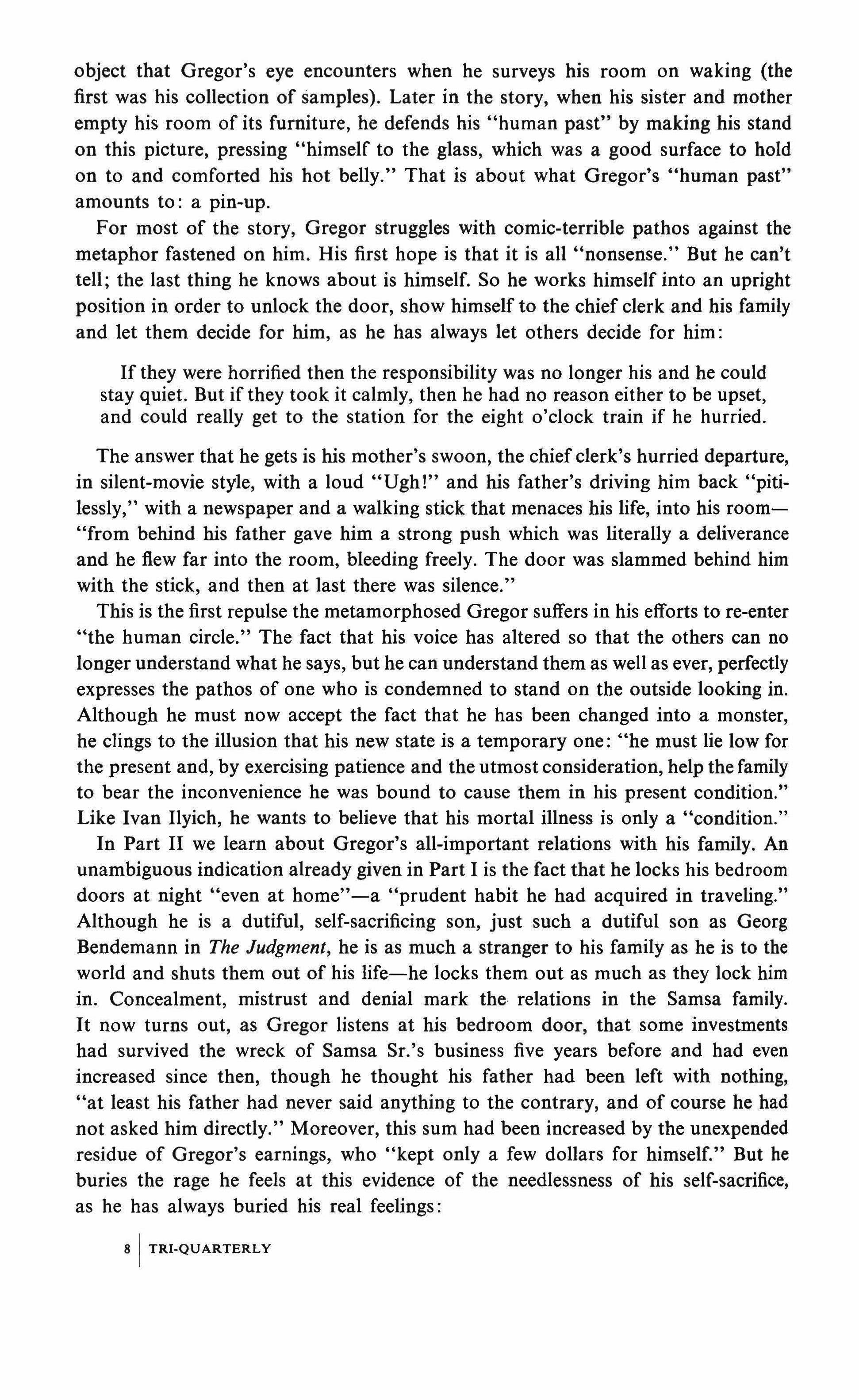
object that Gregor's eye encounters when he surveys his room on waking (the first was his collection of samples). Later in the story, when his sister and mother empty his room of its furniture, he defends his "human past" by making his stand on this picture, pressing "himself to the glass, which was a good surface to hold on to and comforted his hot belly." That is about what Gregor's "human past" amounts to: a pin-up.
For most of the story, Gregor struggles with comic-terrible pathos against the metaphor fastened on him. His first hope is that it is all "nonsense." But he can't tell; the last thing he knows about is himself. So he works himself into an upright position in order to unlock the door, show himself to the chief clerk and his family and let them decide for him, as he has always let others decide for him:
If they were horrified then the responsibility was no longer his and he could stay quiet. But if they took it calmly, then he had no reason either to be upset, and could really get to the station for the eight o'clock train if he hurried.
The answer that he gets is his mother's swoon, the chief clerk's hurried departure, in silent-movie style, with a loud "Ugh!" and his father's driving him back "pitilessly," with a newspaper and a walking stick that menaces his life, into his room"from behind his father gave him a strong push which was literally a deliverance and he flew far into the room, bleeding freely. The door was slammed behind him with the stick, and then at last there was silence."
This is the first repulse the metamorphosed Gregor suffers in his efforts to re-enter "the human circle." The fact that his voice has altered so that the others can no longer understand what he says, but he can understand them as well as ever, perfectly expresses the pathos of one who is condemned to stand on the outside looking in. Although he must now accept the fact that he has been changed into a monster, he clings to the illusion that his new state is a temporary one: "he must lie low for the present and, by exercising patience and the utmost consideration, help the family to bear the inconvenience he was bound to cause them in his present condition." Like Ivan Ilyich, he wants to believe that his mortal illness is only a "condition."
In Part II we learn about Gregor's all-important relations with his family. An unambiguous indication already given in Part I is the fact that he locks his bedroom doors at night "even at home"-a "prudent habit he had acquired in traveling." Although he is a dutiful, self-sacrificing son, just such a dutiful son as Georg Bendemann in The Judgment, he is as much a stranger to his family as he is to the world and shuts them out of his life-he locks them out as much as they lock him in. Concealment, mistrust and denial mark the relations in the Samsa family. It now turns out, as Gregor listens at his bedroom door, that some investments had survived the wreck of Samsa Sr.'s business five years before and had even increased since then, though he thought his father had been left with nothing, "at least his father had never said anything to the contrary, and of course he had not asked him directly." Moreover, this sum had been increased by the unexpended residue of Gregor's earnings, who "kept only a few dollars for himself." But he buries the rage he feels at this evidence of the needlessness of his self-sacrifice, as he has always buried his real feelings:
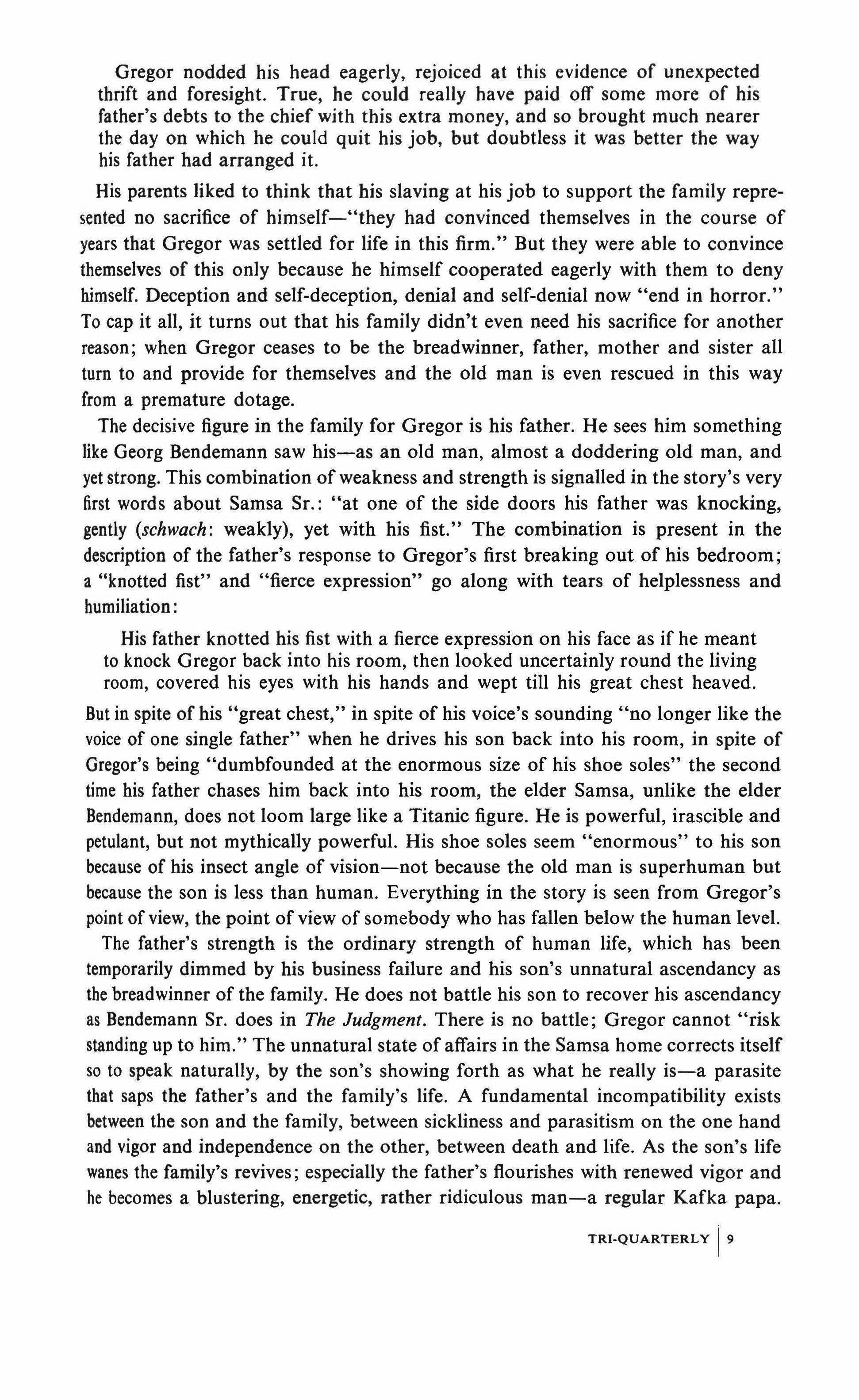
Gregor nodded his head eagerly, rejoiced at this evidence of unexpected thrift and foresight. True, he could really have paid off some more of his father's debts to the chief with this extra money, and so brought much nearer the day on which he could quit his job, but doubtless it was better the way his father had arranged it.
His parents liked to think that his slaving at his job to support the family represented no sacrifice of himself-"they had convinced themselves in the course of years that Gregor was settled for life in this firm." But they were able to convince themselves of this only because he himself cooperated eagerly with them to deny himself. Deception and self-deception, denial and self-denial now "end in horror." To cap it all, it turns out that his family didn't even need his sacrifice for another reason; when Gregor ceases to be the breadwinner, father, mother and sister all turn to and provide for themselves and the old man is even rescued in this way from a premature dotage.
The decisive figure in the family for Gregor is his father. He sees him something like Georg Bendemann saw his-as an old man, almost a doddering old man, and yet strong. This combination of weakness and strength is signalled in the story's very first words about Samsa Sr.: "at one of the side doors his father was knocking, gently (schwach: weakly), yet with his fist." The combination is present in the description of the father's response to Gregor's first breaking out of his bedroom; a "knotted fist" and "fierce expression" go along with tears of helplessness and humiliation:
His father knotted his fist with a fierce expression on his face as if he meant to knock Gregor back into his room, then looked uncertainly round the living room, covered his eyes with his hands and wept till his great chest heaved. But in spite of his "great chest," in spite of his voice's sounding "no longer like the voice of one single father" when he drives his son back into his room, in spite of Gregor's being "dumbfounded at the enormous size of his shoe soles" the second time his father chases him back into his room, the elder Samsa, unlike the elder Bendemann, does not 100m large like a Titanic figure. He is powerful, irascible and petulant, but not mythically powerful. His shoe soles seem "enormous" to his son because of his insect angle of vision-not because the old man is superhuman but because the son is less than human. Everything in the story is seen from Gregor's point of view, the point of view of somebody who has fallen below the human level.
The father's strength is the ordinary strength of human life, which has been temporarily dimmed by his business failure and his son's unnatural ascendancy as the breadwinner of the family. He does not battle his son to recover his ascendancy as Bendemann Sr. does in The Judgment. There is no battle; Gregor cannot "risk standing up to him." The unnatural state of affairs in the Samsa home corrects itself so to speak naturally, by the son's showing forth as what he really is-a parasite that saps the father's and the family's life. A fundamental incompatibility exists between the son and the family, between sickliness and parasitism on the one hand and vigor and independence on the other, between death and life. As the son's life wanes the family's revives; especially the father's flourishes with renewed vigor and he becomes a blustering, energetic, rather ridiculous man-a regular Kafka papa.
TRI-QUARTERLy 19
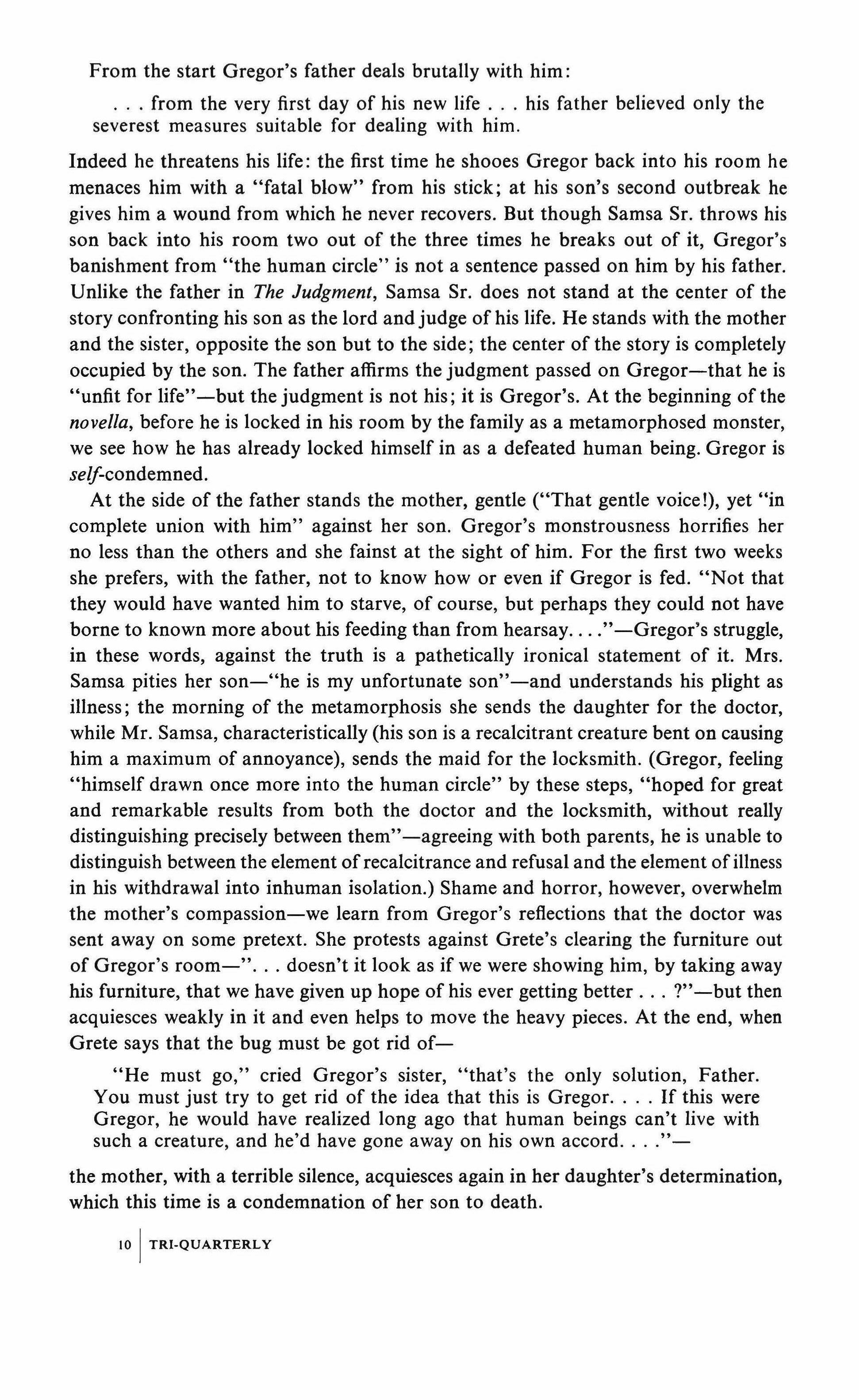
From the start Gregor's father deals brutally with him: from the very first day of his new life his father believed only the severest measures suitable for dealing with him.
Indeed he threatens his life: the first time he shooes Gregor back into his room he menaces him with a "fatal blow" from his stick; at his son's second outbreak he gives him a wound from which he never recovers. But though Samsa Sr. throws his son back into his room two out of the three times he breaks out of it, Gregor's banishment from "the human circle" is not a sentence passed on him by his father. Unlike the father in The Judgment, Samsa Sr. does not stand at the center of the story confronting his son as the lord and judge of his life. He stands with the mother and the sister, opposite the son but to the side; the center of the story is completely occupied by the son. The father affirms the judgment passed on Gregor-that he is "unfit for life"-but the judgment is not his; it is Gregor's. At the beginning of the novella, before he is locked in his room by the family as a metamorphosed monster, we see how he has already locked himself in as a defeated human being. Gregor is self-condemned.
At the side of the father stands the mother, gentle ("That gentle voice I), yet "in complete union with him" against her son. Gregor's monstrousness horrifies her no less than the others and she fainst at the sight of him. For the first two weeks she prefers, with the father, not to know how or even if Gregor is fed. "Not that they would have wanted him to starve, of course, but perhaps they could not have borne to known more about his feeding than from hearsay "-Gregor's struggle, in these words, against the truth is a pathetically ironical statement of it. Mrs. Samsa pities her son-"he is my unfortunate son"-and understands his plight as illness; the morning of the metamorphosis she sends the daughter for the doctor, while Mr. Samsa, characteristically (his son is a recalcitrant creature bent on causing him a maximum of annoyance), sends the maid for the locksmith. (Gregor, feeling "himself drawn once more into the human circle" by these steps, "hoped for great and remarkable results from both the doctor and the locksmith, without really distinguishing precisely between them"-agreeing with both parents, he is unable to distinguish between the element ofrecalcitrance and refusal and the element ofillness in his withdrawal into inhuman isolation.) Shame and horror, however, overwhelm the mother's compassion-we learn from Gregor's reflections that the doctor was sent away on some pretext. She protests against Grete's clearing the furniture out of Gregor's room-" doesn't it look as if we were showing him, by taking away his furniture, that we have given up hope of his ever getting better ?"-but then acquiesces weakly in it and even helps to move the heavy pieces. At the end, when Grete says that the bug must be got rid of"He must go," cried Gregor's sister, "that's the only solution, Father. You must just try to get rid of the idea that this is Gregor If this were Gregor, he would have realized long ago that human beings can't live with such a creature, and he'd have gone away on his own accord "the mother, with a terrible silence, acquiesces again in her daughter's determination, which this time is a condemnation of her son to death.
10 TRI-QUARTERLY
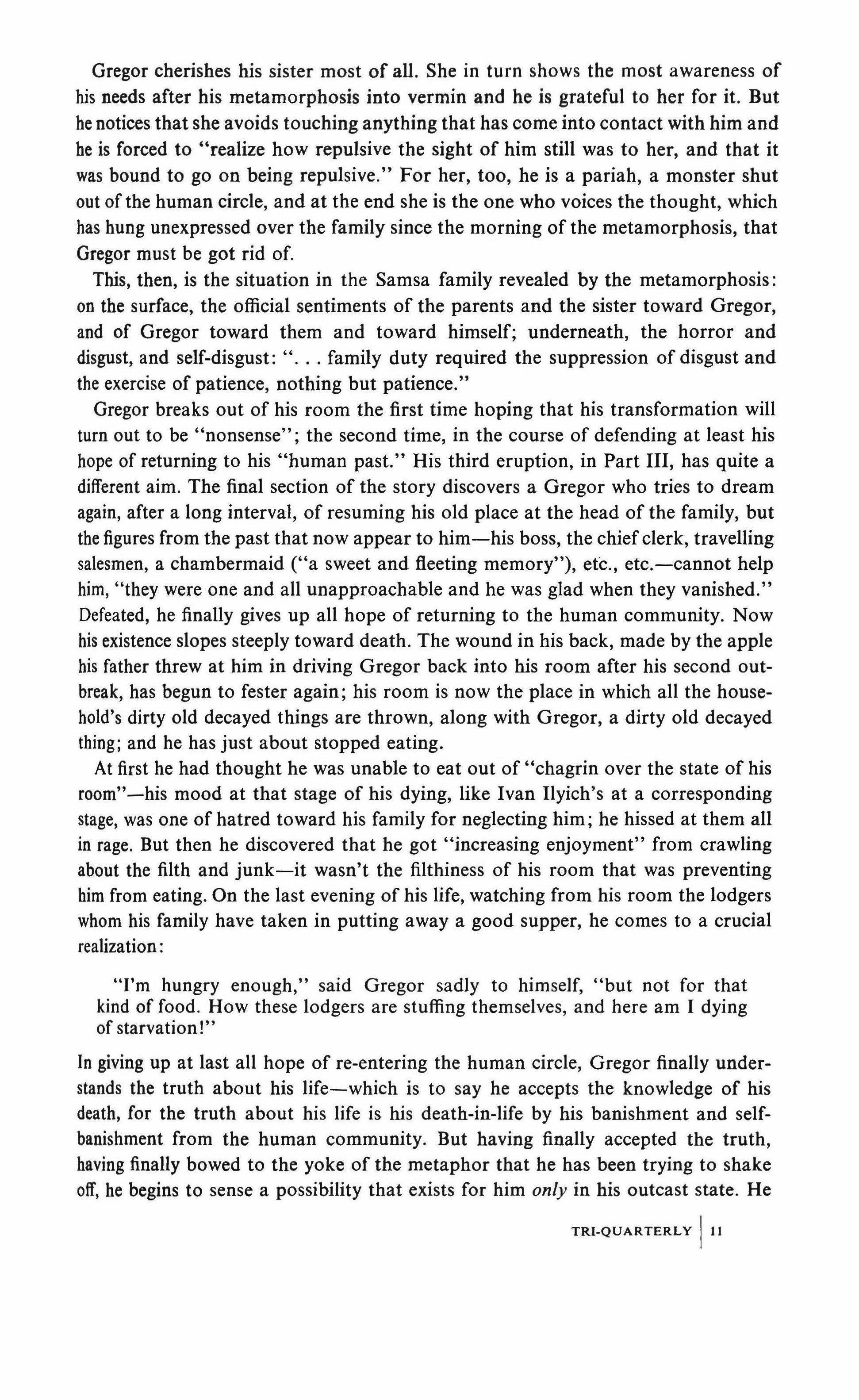
Gregor cherishes his sister most of all. She in turn shows the most awareness of his needs after his metamorphosis into vermin and he is grateful to her for it. But he notices that she avoids touching anything that has come into contact with him and he is forced to "realize how repulsive the sight of him still was to her, and that it was bound to go on being repulsive." For her, too, he is a pariah, a monster shut out of the human circle, and at the end she is the one who voices the thought, which has hung unexpressed over the family since the morning of the metamorphosis, that Gregor must be got rid of.
This, then, is the situation in the Samsa family revealed by the metamorphosis: on the surface, the official sentiments of the parents and the sister toward Gregor, and of Gregor toward them and toward himself; underneath, the horror and disgust, and self-disgust: family duty required the suppression of disgust and the exercise of patience, nothing but patience."
Gregor breaks out of his room the first time hoping that his transformation will turn out to be "nonsense"; the second time, in the course of defending at least his hope of returning to his "human past." His third eruption, in Part III, has quite a different aim. The final section of the story discovers a Gregor who tries to dream again, after a long interval, of resuming his old place at the head of the family, but the figures from the past that now appear to him-his boss, the chiefclerk, travelling salesmen, a chambermaid ("a sweet and fleeting memory"), etc., etc.-cannot help him, "they were one and all unapproachable and he was glad when they vanished." Defeated, he finally gives up all hope of returning to the human community. Now his existence slopes steeply toward death. The wound in his back, made by the apple his father threw at him in driving Gregor back into his room after his second outbreak, has begun to fester again; his room is now the place in which all the household's dirty old decayed things are thrown, along with Gregor, a dirty old decayed thing; and he has just about stopped eating.
At first he had thought he was unable to eat out of "chagrin over the state of his room"-his mood at that stage of his dying, like Ivan Ilyich's at a corresponding stage, was one of hatred toward his family for neglecting him; he hissed at them all in rage. But then he discovered that he got "increasing enjoyment" from crawling about the filth and junk-it wasn't the filthiness of his room that was preventing him from eating. On the last evening of his life, watching from his room the lodgers whom his family have taken in putting away a good supper, he comes to a crucial realization:
"I'm hungry enough," said Gregor sadly to himself, "but not for that kind of food. How these lodgers are stuffing themselves, and here am I dying of starvation!"
In giving up at last all hope of re-entering the human circle, Gregor finally understands the truth about his life-which is to say he accepts the knowledge of his death, for the truth about his life is his death-in-life by his banishment and selfbanishment from the human community. But having finally accepted the truth, having finally bowed to the yoke of the metaphor that he has been trying to shake off, he begins to sense a possibility that exists for him only in his outcast state. He
TRI-QUARTERLY III
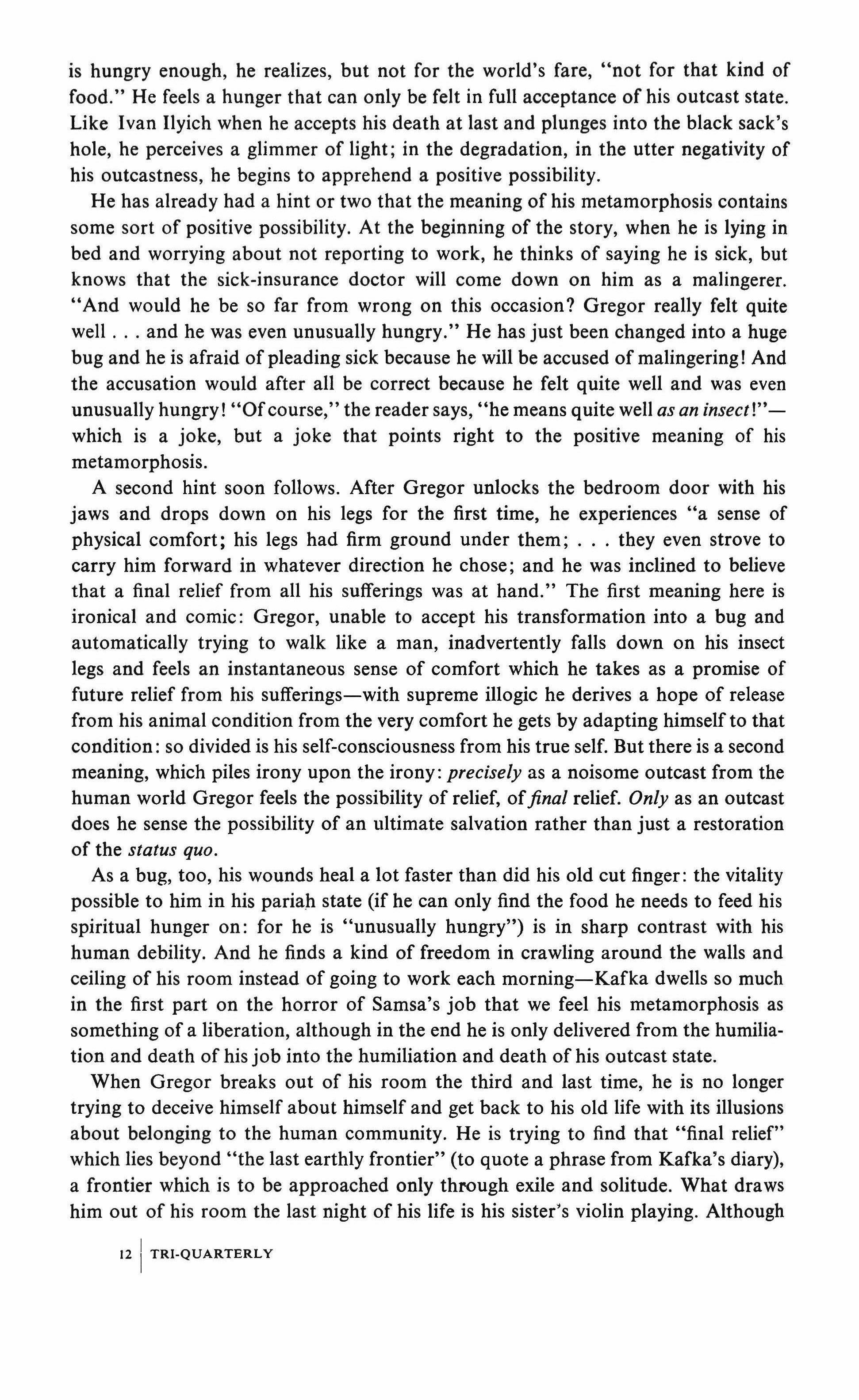
is hungry enough, he realizes, but not for the world's fare, "not for that kind of food." He feels a hunger that can only be felt in full acceptance of his outcast state. Like Ivan Ilyich when he accepts his death at last and plunges into the black sack's hole, he perceives a glimmer of light; in the degradation, in the utter negativity of his outcastness, he begins to apprehend a positive possibility.
He has already had a hint or two that the meaning of his metamorphosis contains some sort of positive possibility. At the beginning of the story, when he is lying in bed and worrying about not reporting to work, he thinks of saying he is sick, but knows that the sick-insurance doctor will come down on him as a malingerer. "And would he be so far from wrong on this occasion? Gregor really felt quite well and he was even unusually hungry." He has just been changed into a huge bug and he is afraid of pleading sick because he will be accused of malingering! And the accusation would after all be correct because he felt quite well and was even unusually hungry! "Ofcourse," the reader says, "he means quite well as an insect!"which is a joke, but a joke that points right to the positive meaning of his metamorphosis.
A second hint soon follows. After Gregor unlocks the bedroom door with his jaws and drops down on his legs for the first time, he experiences "a sense of physical comfort; his legs had firm ground under them; they even strove to carry him forward in whatever direction he chose; and he was inclined to believe that a final relief from all his sufferings was at hand." The first meaning here is ironical and comic: Gregor, unable to accept his transformation into a bug and automatically trying to walk like a man, inadvertently falls down on his insect legs and feels an instantaneous sense of comfort which he takes as a promise of future relief from his sufferings-with supreme illogic he derives a hope of release from his animal condition from the very comfort he gets by adapting himself to that condition: so divided is his self-consciousness from his true self. But there is a second meaning, which piles irony upon the irony: precisely as a noisome outcast from the human world Gregor feels the possibility of relief, offinal relief. Only as an outcast does he sense the possibility of an ultimate salvation rather than just a restoration of the status quo.
As a bug, too, his wounds heal a lot faster than did his old cut finger: the vitality possible to him in his pariah state (if he can only find the food he needs to feed his spiritual hunger on: for he is "unusually hungry") is in sharp contrast with his human debility. And he finds a kind of freedom in crawling around the walls and ceiling of his room instead of going to work each morning-Kafka dwells so much in the first part on the horror of Samsa's job that we feel his metamorphosis as something of a liberation, although in the end he is only delivered from the humiliation and death of his job into the humiliation and death of his outcast state.
When Gregor breaks out of his room the third and last time, he is no longer trying to deceive himself about himself and get back to his old life with its illusions about belonging to the human community. He is trying to find that "final relief" which lies beyond "the last earthly frontier" (to quote a phrase from Kafka's diary), a frontier which is to be approached only through exile and solitude. What draws him out of his room the last night of his life is his sister's violin playing. Although
TRI-QUARTERLY
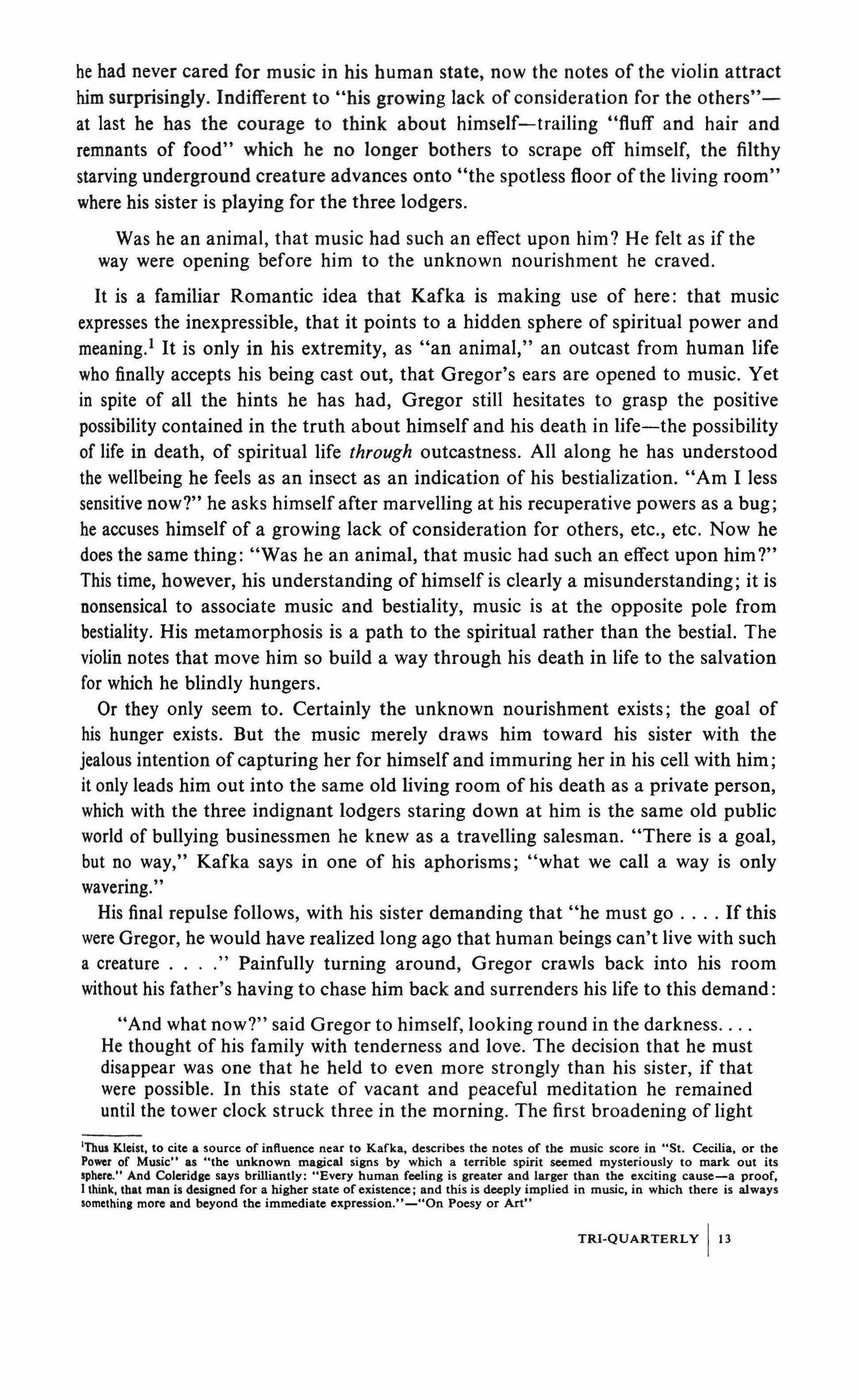
he had never cared for music in his human state, now the notes of the violin attract him surprisingly. Indifferent to "his growing lack of consideration for the others"at last he has the courage to think about himself-trailing "fluff and hair and remnants of food" which he no longer bothers to scrape off himself, the filthy starving underground creature advances onto "the spotless floor of the living room" where his sister is playing for the three lodgers.
Was he an animal, that music had such an effect upon him? He felt as if the way were opening before him to the unknown nourishment he craved.
It is a familiar Romantic idea that Kafka is making use of here: that music expresses the inexpressible, that it points to a hidden sphere of spiritual power and meaning.' It is only in his extremity, as "an animal," an outcast from human life who finally accepts his being cast out, that Gregor's ears are opened to music. Yet in spite of all the hints he has had, Gregor still hesitates to grasp the positive possibility contained in the truth about himself and his death in life-the possibility of life in death, of spiritual life through outcastness. All along he has understood the wellbeing he feels as an insect as an indication of his bestialization. "Am I less sensitive now?" he asks himself after marvelling at his recuperative powers as a bug; he accuses himself of a growing lack of consideration for others, etc., etc. Now he does the same thing: "Was he an animal, that music had such an effect upon him?" This time, however, his understanding of himself is clearly a misunderstanding; it is nonsensical to associate music and bestiality, music is at the opposite pole from bestiality. His metamorphosis is a path to the spiritual rather than the bestial. The violin notes that move him so build a way through his death in life to the salvation for which he blindly hungers.
Or they only seem to. Certainly the unknown nourishment exists; the goal of his hunger exists. But the music merely draws him toward his sister with the jealous intention of capturing her for himself and immuring her in his cell with him; it only leads him out into the same old living room of his death as a private person, which with the three indignant lodgers staring down at him is the same old public world of bullying businessmen he knew as a travelling salesman. "There is a goal, but no way," Kafka says in one of his aphorisms; "what we call a way is only wavering.
His final repulse follows, with his sister demanding that "he must go If this were Gregor, he would have realized long ago that human beings can't live with such a creature Painfully turning around, Gregor crawls back into his room without his father's having to chase him back and surrenders his life to this demand:
"And what now?" said Gregor to himself, looking round in the darkness He thought of his family with tenderness and love. The decision that he must disappear was one that he held to even more strongly than his sister, if that were possible. In this state of vacant and peaceful meditation he remained until the tower clock struck three in the morning. The first broadening of light
'Thus Kleist. to cite a source of inftuence near to Kafka. describes the notes of the music score in "St. Cecilia. or the Power of Music" as "the unknown magical signs by which a terrible spirit seemed mysteriously to mark out its spbere." And Coleridge says brilliantly: "Every human feeling is greater and larger than the exciting cause-a proof. I think. that man is designed for a higher state of existence; and this is deeply implied in music. in which there is always something more and beyond the immediate expression."-"On Poesy or Art"
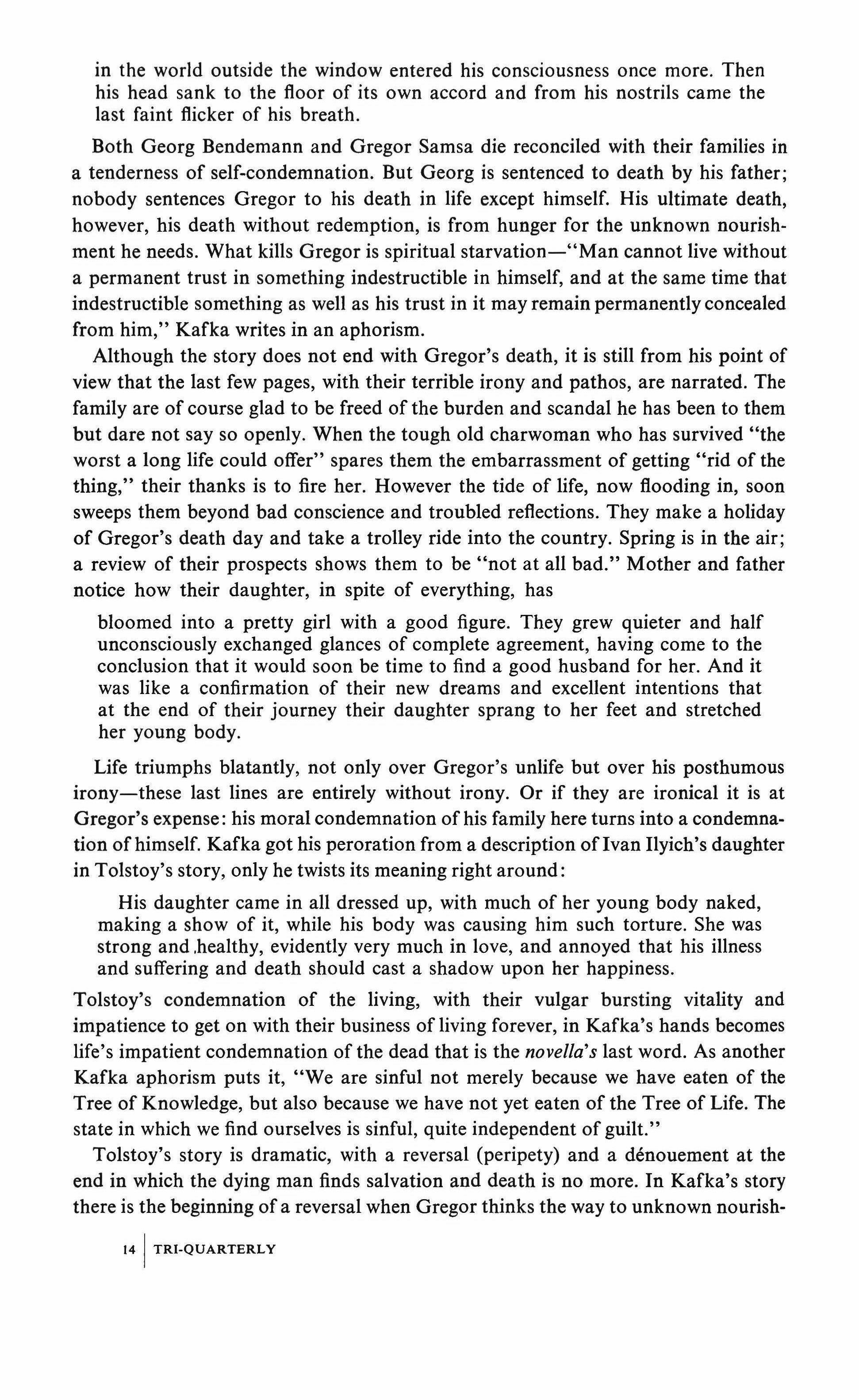
in the world outside the window entered his consciousness once more. Then his head sank to the floor of its own accord and from his nostrils came the last faint flicker of his breath.
Both Georg Bendemann and Gregor Samsa die reconciled with their families in a tenderness of self-condemnation. But Georg is sentenced to death by his father; nobody sentences Gregor to his death in life except himself. His ultimate death, however, his death without redemption, is from hunger for the unknown nourishment he needs. What kills Gregor is spiritual starvation-"Man cannot live without a permanent trust in something indestructible in himself, and at the same time that indestructible something as well as his trust in it may remain permanently concealed from him," Kafka writes in an aphorism.
Although the story does not end with Gregor's death, it is still from his point of view that the last few pages, with their terrible irony and pathos, are narrated. The family are of course glad to be freed of the burden and scandal he has been to them but dare not say so openly. When the tough old charwoman who has survived "the worst a long life could offer" spares them the embarrassment of getting "rid of the thing," their thanks is to fire her. However the tide of life, now flooding in, soon sweeps them beyond bad conscience and troubled reflections. They make a holiday of Gregor's death day and take a trolley ride into the country. Spring is in the air; a review of their prospects shows them to be "not at all bad." Mother and father notice how their daughter, in spite of everything, has bloomed into a pretty girl with a good figure. They grew quieter and half unconsciously exchanged glances of complete agreement, having come to the conclusion that it would soon be time to find a good husband for her. And it was like a confirmation of their new dreams and excellent intentions that at the end of their journey their daughter sprang to her feet and stretched her young body.
Life triumphs blatantly, not only over Gregor's unlife but over his posthumous irony-these last lines are entirely without irony. Or if they are ironical it is at Gregor's expense: his moral condemnation of his family here turns into a condemnation of himself. Kafka got his peroration from a description oflvan Ilyich's daughter in Tolstoy'S story, only he twists its meaning right around: His daughter came in all dressed up, with much of her young body naked, making a show of it, while his body was causing him such torture. She was strong and .healthy, evidently very much in love, and annoyed that his illness and suffering and death should cast a shadow upon her happiness.
Tolstoy'S condemnation of the living, with their vulgar bursting vitality and impatience to get on with their business of living forever, in Kafka's hands becomes life's impatient condemnation of the dead that is the novella's last word. As another Kafka aphorism puts it, "We are sinful not merely because we have eaten of the Tree of Knowledge, but also because we have not yet eaten of the Tree of Life. The state in which we find ourselves is sinful, quite independent of guilt."
Tolstoy'S story is dramatic, with a reversal (peripety) and a denouement at the end in which the dying man finds salvation and death is no more. In Kafka's story there is the beginning of a reversal when Gregor thinks the way to unknown nourish-
ment is opening before him, but it fails to take place and the novella sinks to the conclusion that has been implicit in it from the start. Kafka's story has little drama; a climax that occurs in the first sentence is no real climax. Earlier I described this nondramatic movement of The Metamorphosis as a dying fall, a sinking, an ebbing. The Trial and The Castle too have more or less the same movement, and in his diary entry of December 13, 1914 Kafka remarks on this dying movement of his best work: the best things I have written have their basis in this capacity of mine to die contentedly. All these fine and very convincing passages always deal with the fact that somebody is dying, that it is hard for him to do, that it seems unjust to him or at least cruel, and the reader finds this moving or at least I think he should. For me, however, who believe that I'll be able to lie contentedly on my deathbed, such descriptions are secretly a game, I positively enjoy my own death in the dying person's, therefore I calculatingly exploit the attention that the reader concentrates on death, understand it a lot more clearly than he, who I assume will complain on his deathbed, and for these reasons my complaining (Klage, lament) is as perfect as can be, doesn't suddenly break off in the way real complaining is likely to do, but dies away beautifully and purely. It is the same thing as my always complaining to my mother about pains that weren't nearly as bad as my complaints made one think.
The passage is a characteristically ambivalent appreciation and depreciation of his art for the very same reason. On the side of depreciation, he suggests that his stories aren't real stories at all, with the dramatic conflict of real stories, but a "game" he plays with the reader: behind the apparent struggle of his protagonists to live, undermining and betraying it from the start, is his own secret embrace of death. And just because the struggle is a fake one he is able to prolong it artfully into a sort of swan song, a swan song which at the end of the diary entry he compares to his hypochondriacal complainings to his mother, to his constant whinings about aches and pains. In this Kafka seems to be agreeing with those critics who find him a pusillanimous neurotic, lacking in any force or fight. Edmund Wilson thinks he. is "at his most characteristic when he is assimilating men to beasts-dogs, insects, mice, and apes-which can neither dare nor know. the denationalized, discouraged, disaffected, disabled Kafka can in the end only let us down."! A psychoanalytic critic concludes that "the striving for synthesis, for integration and harmony which are the marks of a healthy ego and a healthy art are lacking in Kafka's life and in his writings. The conflict is weak in Kafka's stories because the ego is submissive; the unequal forces within the Kafka psyche create no tension within the reader, only a fraternal sadness "2
But on the side of appreciation, Kafka sees his understanding of death as being responsible for his "best things." Thanks to his underlying acceptance of death, the selfsame story that he is always telling about somebody who finds it hard to die is "as perfect as can be" and "dies away beautifully and purely."
Which is it then? Is The Metamorphosis unhealthy art: the artfully prolonged whine of a disaffected neurotic with a submissive ego? Or is it a lament (Klage) that
'''A Disscnting Opinion on Kafka," in Classics and Commercials. 'Selma Fraiberg, "Kafka and the Dream," in Partisan Review (Winter 1956).
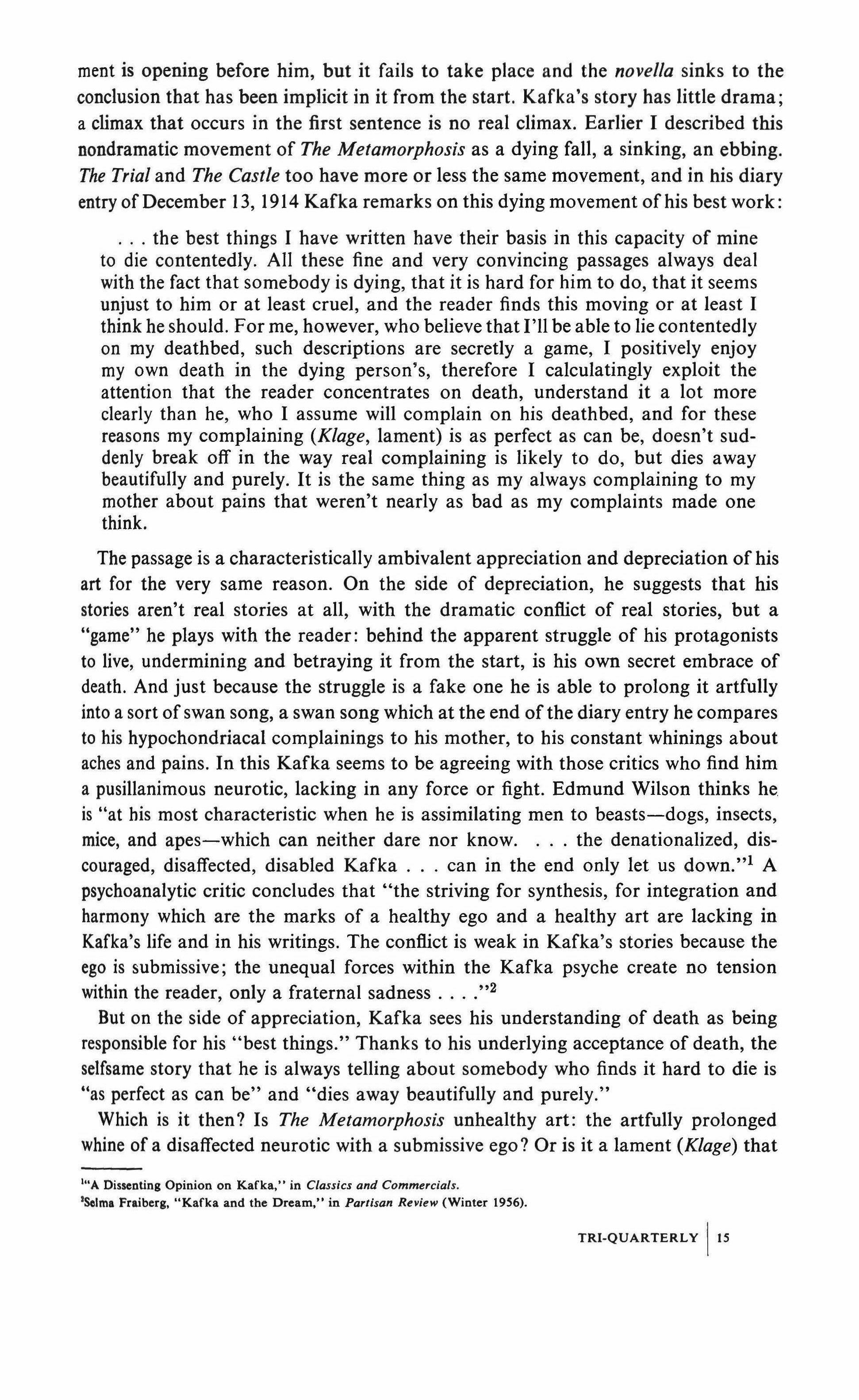
TRI-QVARTERLY \IS
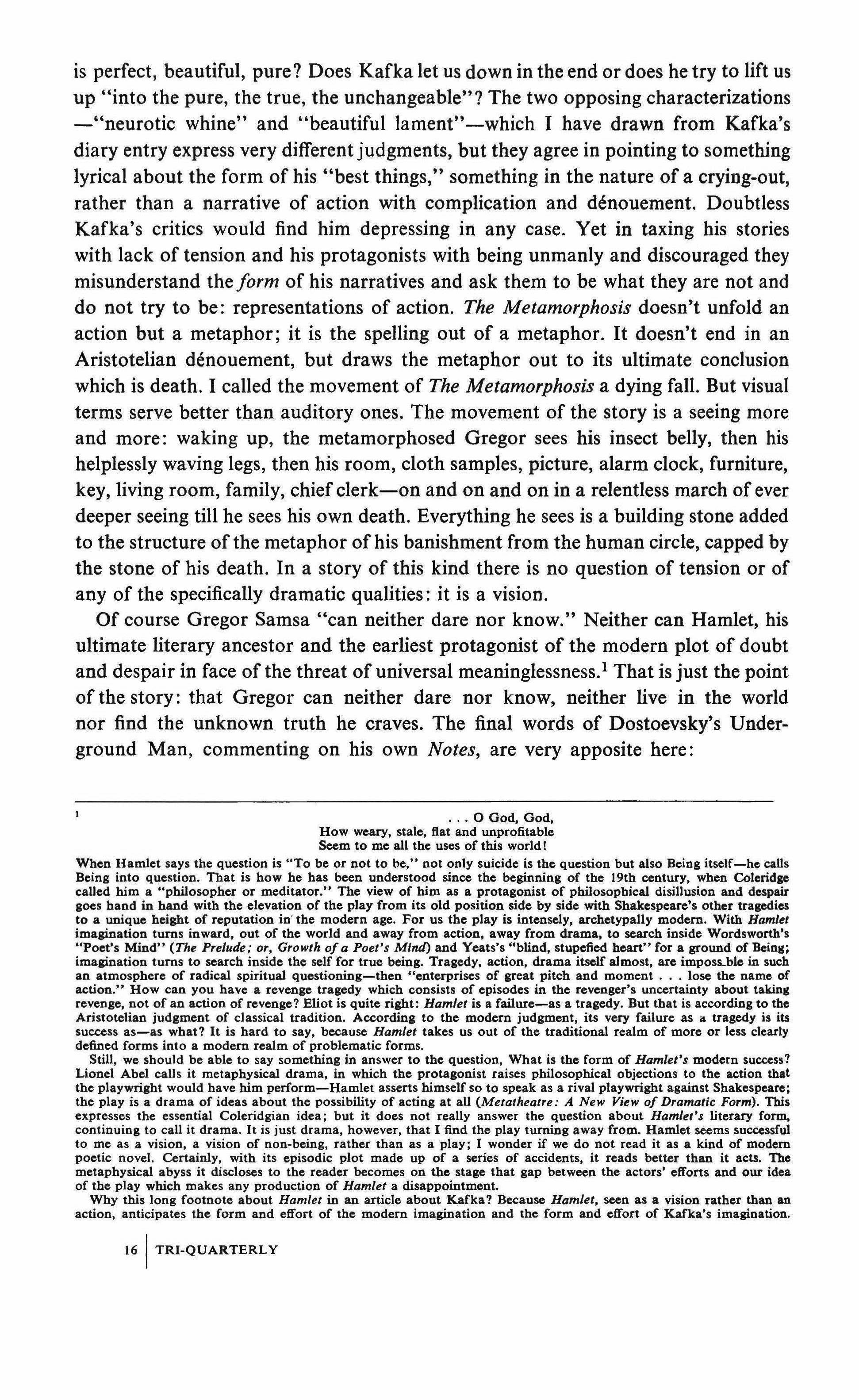
is perfect, beautiful, pure? Does Kafka let us down in the end or does he try to lift us up "into the pure, the true, the unchangeable"? The two opposing characterizations -"neurotic whine" and "beautiful lament"-which I have drawn from Kafka's diary entry express very different judgments, but they agree in pointing to something lyrical about the form of his "best things," something in the nature of a crying-out, rather than a narrative of action with complication and denouement. Doubtless Kafka's critics would find him depressing in any case. Yet in taxing his stories with lack of tension and his protagonists with being unmanly and discouraged they misunderstand the form of his narratives and ask them to be what they are not and do not try to be: representations of action. The Metamorphosis doesn't unfold an action but a metaphor; it is the spelling out of a metaphor. It doesn't end in an Aristotelian denouement, but draws the metaphor out to its ultimate conclusion which is death. I called the movement of The Metamorphosis a dying fall. But visual terms serve better than auditory ones. The movement of the story is a seeing more and more: waking up, the metamorphosed Gregor sees his insect belly, then his helplessly waving legs, then his room, cloth samples, picture, alarm clock, furniture, key, living room, family, chief clerk-on and on and on in a relentless march of ever deeper seeing till he sees his own death. Everything he sees is a building stone added to the structure of the metaphor of his banishment from the human circle, capped by the stone of his death. In a story of this kind there is no question of tension or of any of the specifically dramatic qualities: it is a vision.
Of course Gregor Samsa "can neither dare nor know." Neither can Hamlet, his ultimate literary ancestor and the earliest protagonist of the modern plot of doubt and despair in face of the threat of universal meaninglessness.' That is just the point of the story: that Gregor can neither dare nor know, neither live in the world nor find the unknown truth he craves. The final words of Dostoevsky's Underground Man, commenting on his own Notes, are very apposite here:
0 God, God, How weary, stale, flat and unprofitable Seem to me all the uses of this world!
When Hamlet says the question is "To be or not to be," not only suicide is the question but also Being itself-he calls Being into question. That is how he has been understood since the beginning of the 19th century, when Coleridge called him a "philosopher or meditator." The view of him as a protagonist of philosophical disillusion and despair goes hand in hand with the elevation of the play from its old position side by side with Shakespeare's other tragedies to a unique height of reputation in" the modern age. For us the play is intensely, archetypally modem. With Hamlet imagination turns inward, out of the world and away from action, away from drama, to search inside Wordsworth's "Poet's Mind" (The Prelude; or, Growth of a Poet's Mind) and Yeats's "blind, stupefied heart" for a ground of Being] imagination turns to search inside the self for true being. Tragedy, action, drama itself almost, are imposs.ble in such an atmosphere of radical spiritual questioning-then "enterprises of great pitch and moment lose the name of action." How can you have a revenge tragedy which consists of episodes in the revenger's uncertainty about takinll revenge, not of an action of revenge? Eliot is quite right: Hamlet is a failure-as a tragedy. But that is according to the Aristotelian judgment of classical tradition. According to the modern judgment, its very failure as iL tragedy is its success as-as what? It is hard to say, because Hamlet takes us out of the traditional realm of more or less clearly defined forms into a modem realm of problematic forms.
Still, we should be able to say something in answer to the question, What is the form of Hamlet's modern success? Lionel Abel calls it metaphysical drama, in which the protagonist raises philosophical objections to the action that the playwright would have him perform-Hamlet asserts himself so to speak as a rival playwright against Shakespeare; the play is a drama of ideas about the possibility of acting at all (Metatheatre: A New View of Dramatic Form). This expresses the essential Coleridgian idea; but it does not really answer the question about Hamlet's literary form, continuing to call it drama. It is just drama, however, that I find the play turning away from. Hamlet seems successful to me as a vision, a vision of non-being, rather than as a play; I wonder if we do not read it as a kind of modern poetic novel. Certainly, with its episodic plot made up of a series of accidents, it reads better than it acts. The metaphysical abyss it discloses to the reader becomes on the stage that gap between the actors' efforts and our idea of the play which makes any production of Hamlet a disappointment.
Why this long footnote about Hamlet in an article about Kafka? Because Hamlet, seen as a vision rather than an action, anticipates the form and effort of the modem imagination and the form and effort of Kafka's imagination.
161 TRI-QUARTERLY
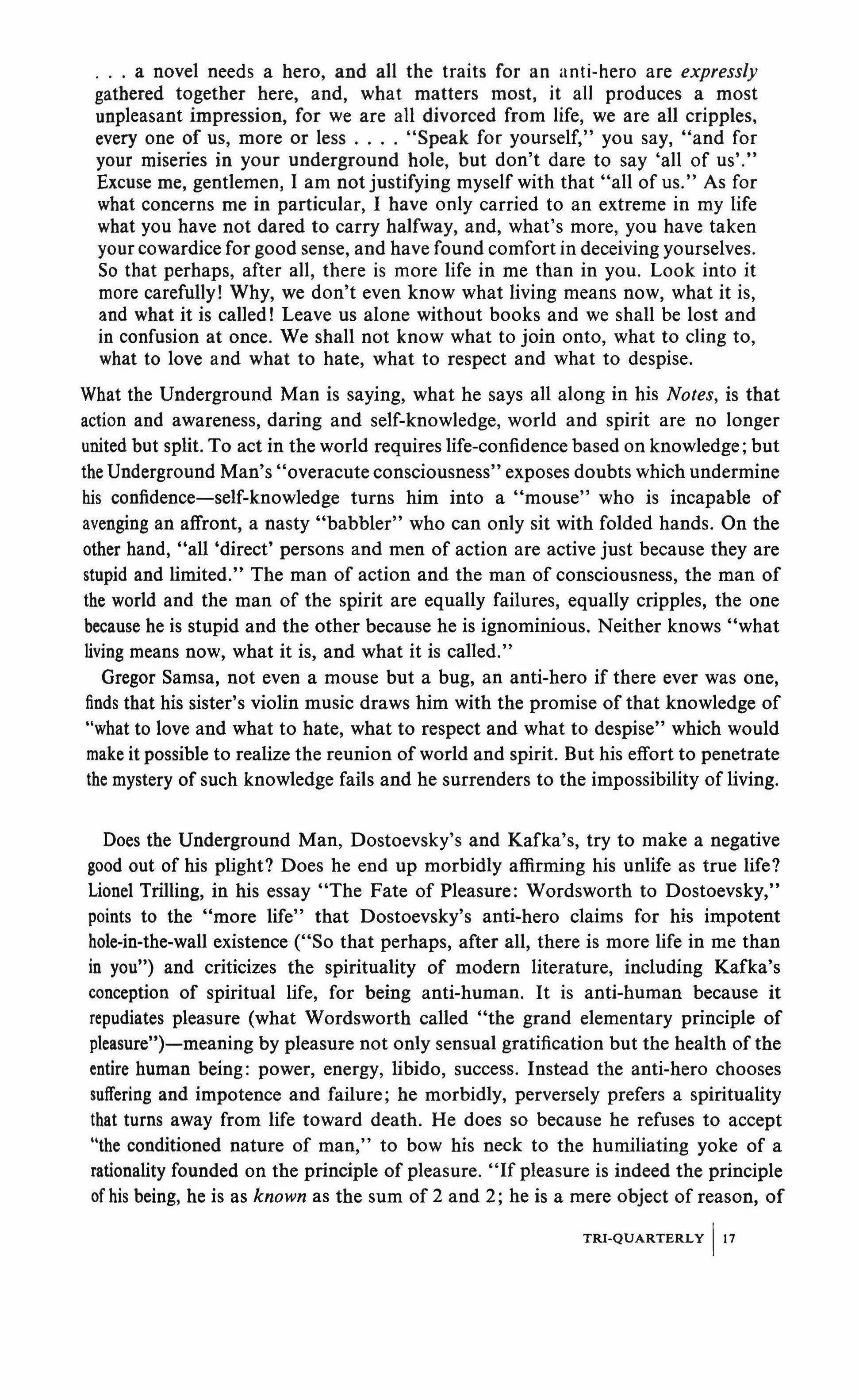
a novel needs a hero, and all the traits for an anti-hero are expressly gathered together here, and, what matters most, it all produces a most unpleasant impression, for we are all divorced from life, we are all cripples, every one of us, more or less "Speak for yourself," you say, "and for your miseries in your underground hole, but don't dare to say 'all of us'." Excuse me, gentlemen, I am not justifying myself with that "all of us." As for what concerns me in particular, I have only carried to an extreme in my life what you have not dared to carry halfway, and, what's more, you have taken your cowardice for good sense, and have found comfort in deceiving yourselves. So that perhaps, after all, there is more life in me than in you. Look into it more carefully! Why, we don't even know what living means now, what it is, and what it is called! Leave us alone without books and we shall be lost and in confusion at once. We shall not know what to join onto, what to cling to, what to love and what to hate, what to respect and what to despise.
What the Underground Man is saying, what he says all along in his Notes, is that action and awareness, daring and self-knowledge, world and spirit are no longer united but split. To act in the world requires life-confidence based on knowledge; but the Underground Man's "overacute consciousness" exposes doubts which undermine his confidence-self-knowledge turns him into a "mouse" who is incapable of avenging an affront, a nasty "babbler" who can only sit with folded hands. On the other hand, "all 'direct' persons and men of action are active just because they are stupid and limited." The man of action and the man of consciousness, the man of the world and the man of the spirit are equally failures, equally cripples, the one because he is stupid and the other because he is ignominious. Neither knows "what living means now, what it is, and what it is called."
Gregor Samsa, not even a mouse but a bug, an anti-hero if there ever was one, finds that his sister's violin music draws him with the promise of that knowledge of "what to love and what to hate, what to respect and what to despise" which would make it possible to realize the reunion of world and spirit. But his effort to penetrate the mystery of such knowledge fails and he surrenders to the impossibility of living.
Does the Underground Man, Dostoevsky's and Kafka's, try to make a negative good out of his plight? Does he end up morbidly affirming his unlife as true life?
Lionel Trilling, in his essay "The Fate of Pleasure: Wordsworth to Dostoevsky," points to the "more life" that Dostoevsky's anti-hero claims for his impotent hole-in-the-wall existence ("So that perhaps, after all, there is more life in me than in you") and criticizes the spirituality of modern literature, including Kafka's conception of spiritual life, for being anti-human. It is anti-human because it repudiates pleasure (what Wordsworth called "the grand elementary principle of pleasure")-meaning by pleasure not only sensual gratification but the health of the entire human being: power, energy, libido, success. Instead the anti-hero chooses suffering and impotence and failure; he morbidly, perversely prefers a spirituality that turns away from life toward death. He does so because he refuses to accept "the conditioned nature of man," to bow his neck to the humiliating yoke of a rationality founded on the principle of pleasure. "If pleasure is indeed the principle of his being, he is as known as the sum of 2 and 2; he is a mere object of reason, of TRI-QUARTERLY
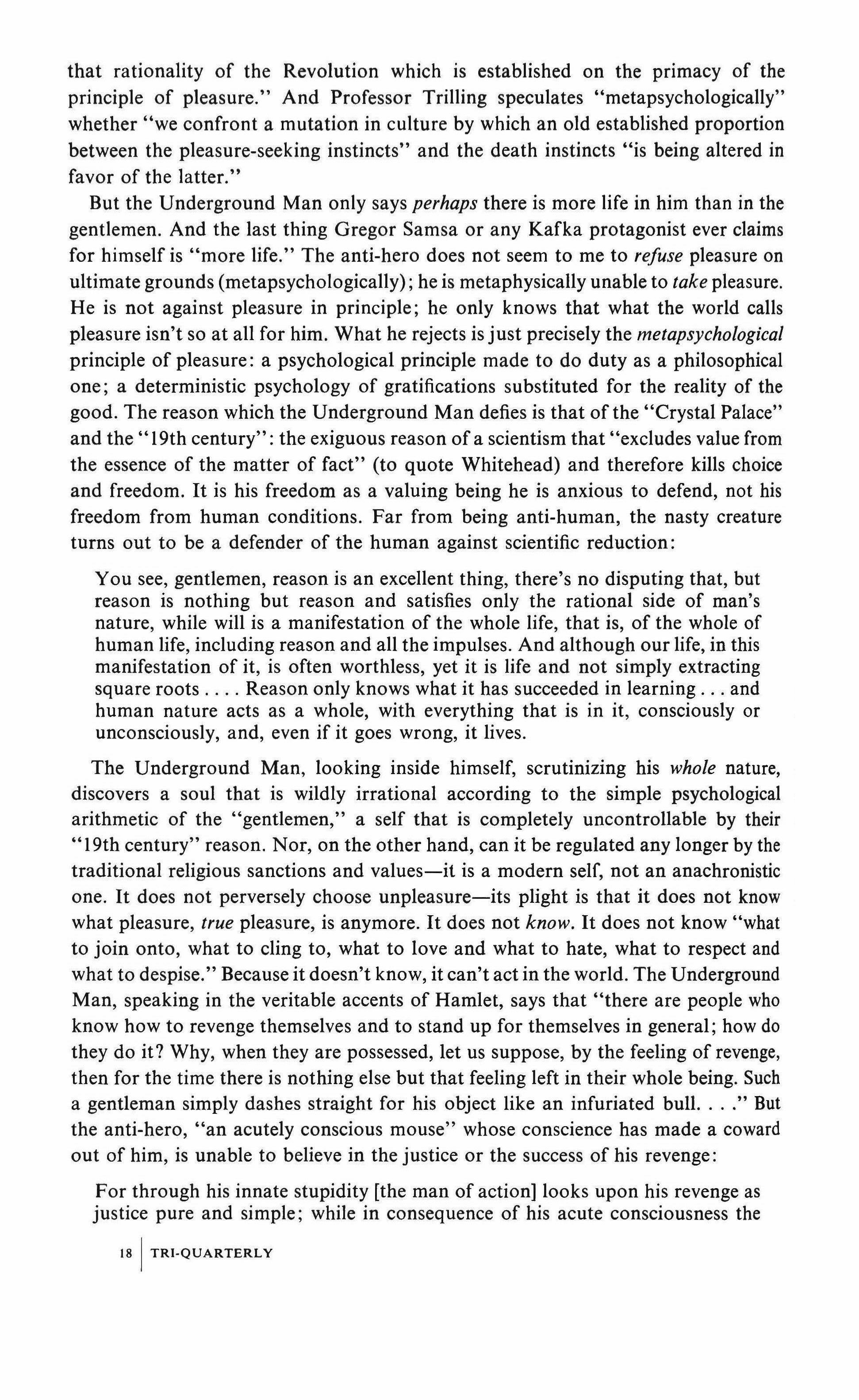
that rationality of the Revolution which is established on the primacy of the principle of pleasure." And Professor Trilling speculates "metapsychologically" whether "we confront a mutation in culture by which an old established proportion between the pleasure-seeking instincts" and the death instincts "is being altered in favor of the latter."
But the Underground Man only says perhaps there is more life in him than in the gentlemen. And the last thing Gregor Samsa or any Kafka protagonist ever claims for himself is "more life." The anti-hero does not seem to me to refuse pleasure on ultimate grounds (metapsychologically); he is metaphysically unable to take pleasure. He is not against pleasure in principle; he only knows that what the world calls pleasure isn't so at all for him. What he rejects is just precisely the metapsychological principle of pleasure: a psychological principle made to do duty as a philosophical one; a deterministic psychology of gratifications substituted for the reality of the good. The reason which the Underground Man defies is that of the "Crystal Palace" and the" 19th century": the exiguous reason of a scientism that "excludes value from the essence of the matter of fact" (to quote Whitehead) and therefore kills choice and freedom. It is his freedom as a valuing being he is anxious to defend, not his freedom from human conditions. Far from being anti-human, the nasty creature turns out to be a defender of the human against scientific reduction:
You see, gentlemen, reason is an excellent thing, there's no disputing that, but reason is nothing but reason and satisfies only the rational side of man's nature, while will is a manifestation of the whole life, that is, of the whole of human life, including reason and all the impulses. And although our life, in this manifestation of it, is often worthless, yet it is life and not simply extracting square roots Reason only knows what it has succeeded in learning and human nature acts as a whole, with everything that is in it, consciously or unconsciously, and, even if it goes wrong, it lives.
The Underground Man, looking inside himself, scrutinizing his whole nature, discovers a soul that is wildly irrational according to the simple psychological arithmetic of the "gentlemen," a self that is completely uncontrollable by their "19th century" reason. Nor, on the other hand, can it be regulated any longer by the traditional religious sanctions and values-it is a modern self, not an anachronistic one. It does not perversely choose unpleasure-its plight is that it does not know what pleasure, true pleasure, is anymore. It does not know. It does not know "what to join onto, what to cling to, what to love and what to hate, what to respect and what to despise." Because it doesn't know, it can't act in the world. The Underground Man, speaking in the veritable accents of Hamlet, says that "there are people who know how to revenge themselves and to stand up for themselves in general; how do they do it? Why, when they are possessed, let us suppose, by the feeling of revenge, then for the time there is nothing else but that feeling left in their whole being. Such a gentleman simply dashes straight for his object like an infuriated bull But the anti-hero, "an acutely conscious mouse" whose conscience has made a coward out of him, is unable to believe in the justice or the success of his revenge:
For through his innate stupidity [the man of action] looks upon his revenge as justice pure and simple; while in consequence of his acute consciousness the 181 TRI-QUARTERLY
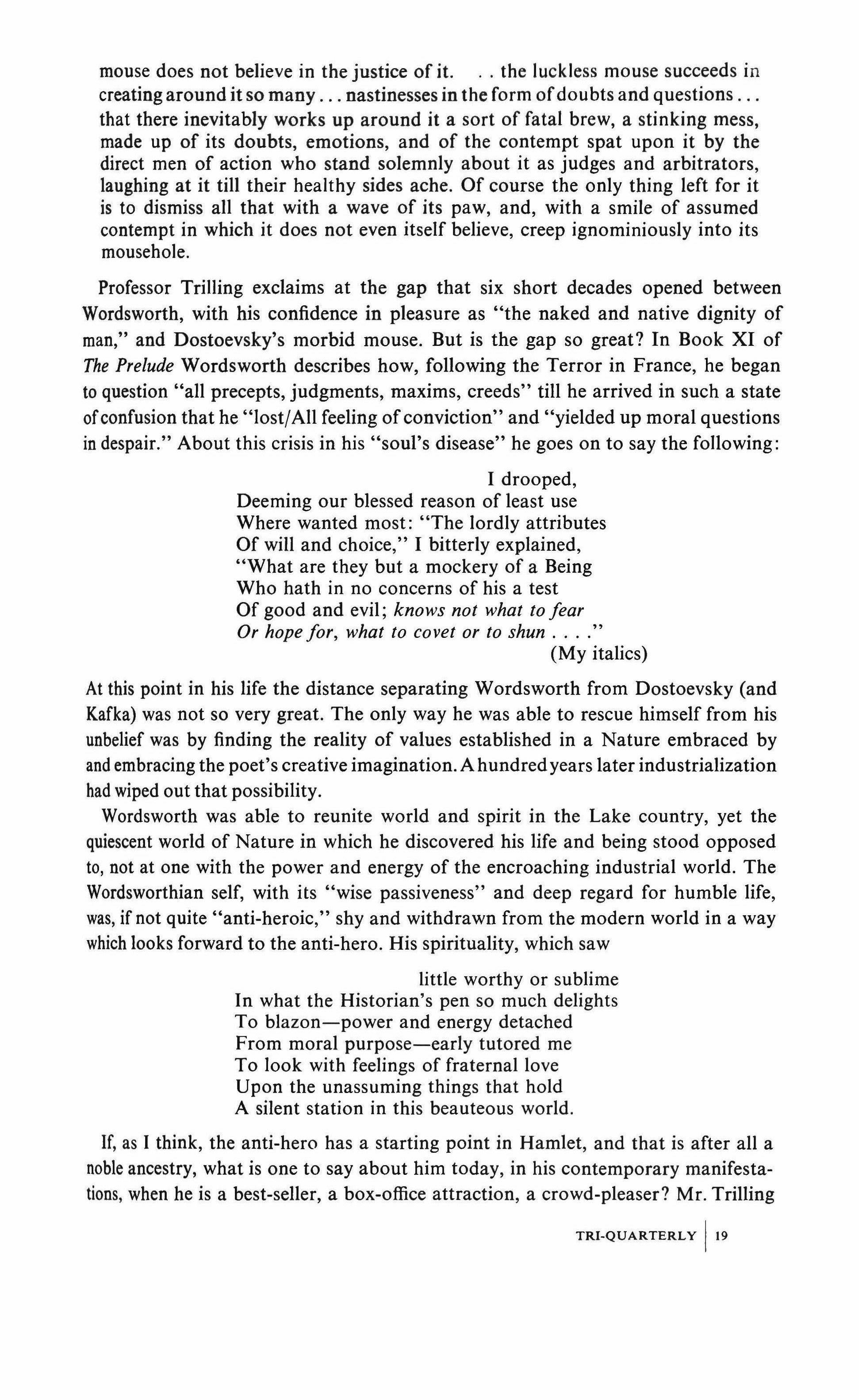
mouse does not believe in the justice of it. the luckless mouse succeeds in creating around it so many nastinesses in the form ofdoubts and questions that there inevitably works up around it a sort of fatal brew, a stinking mess, made up of its doubts, emotions, and of the contempt spat upon it by the direct men of action who stand solemnly about it as judges and arbitrators, laughing at it till their healthy sides ache. Of course the only thing left for it is to dismiss all that with a wave of its paw, and, with a smile of assumed contempt in which it does not even itself believe, creep ignominiously into its mousehole.
Professor Trilling exclaims at the gap that six short decades opened between Wordsworth, with his confidence in pleasure as "the naked and native dignity of man," and Dostoevsky's morbid mouse. But is the gap so great? In Book XI of The Prelude Wordsworth describes how, following the Terror in France, he began to question "all precepts, judgments, maxims, creeds" till he arrived in such a state ofconfusion that he "lost/All feeling ofconviction" and "yielded up moral questions in despair." About this crisis in his "soul's disease" he goes on to say the following:
I drooped,
Deeming our blessed reason of least use
Where wanted most: "The lordly attributes Of will and choice," I bitterly explained, "What are they but a mockery of a Being Who hath in no concerns of his a test Of good and evil; knows not what to fear Or hopefor, what to covet or to shun
(My italics)
At this point in his life the distance separating Wordsworth from Dostoevsky (and Kafka) was not so very great. The only way he was able to rescue himself from his unbelief was by finding the reality of values established in a Nature embraced by and embracing the poet's creative imagination. Ahundredyears later industrialization had wiped out that possibility.
Wordsworth was able to reunite world and spirit in the Lake country, yet the quiescent world of Nature in which he discovered his life and being stood opposed to, not at one with the power and energy of the encroaching industrial world. The Wordsworthian self, with its "wise passiveness" and deep regard for humble life, was, if not quite "anti-heroic," shy and withdrawn from the modern world in a way which looks forward to the anti-hero. His spirituality, which saw little worthy or sublime
In what the Historian's pen so much delights To blazon-power and energy detached From moral purpose-early tutored me
To look with feelings of fraternal love
Upon the unassuming things that hold
A silent station in this beauteous world.
If, as I think, the anti-hero has a starting point in Hamlet, and that is after all a noble ancestry, what is one to say about him today, in his contemporary manifestations, when he is a best-seller, a box-office attraction, a crowd-pleaser? Mr. Trilling TRI-QUARTERLY 119
asks, tellingly, how "irony can be withheld from an accredited subversiveness, an established moral radicalism, a respectable violence, an entertaining spirituality?" It can't. But his words describe the degeneration of the anti-worldly spirituality of modern literature into a worldly fashion, an attitude.
In Gregor Samsa there is no trace of pride or vanity about himself as a superior suffering spiritual being. The Kafka anti-hero is a genuine hunger artist who fasts because he must, because the diet of the world can't satisfy his spiritual hunger, and not because he has made hunger into a negative good. "Forgive me, everybody," the Hunger Artist whispers in the story of that name when he is dying in his cage. "Of course we forgive you," replies the circus overseer.
"I always wanted you to admire my fasting," said the hunger artist. "We do admire it," said the overseer, affably. "But you shouldn't admire it," said the hunger artist. "Well then we don't admire it," said the overseer, "but why shouldn't we admire it?" "Because I have to fast, I can't help it," said the hunger artist. "What a fellow you are," said the overseer, "and why can't you help it?" "Because," said the hunger artist, lifting his head a little and speaking, with his lips pursed, as if for a kiss, right into the overseer's ear, so that no syllable might be lost, "because I couldn't find the food I liked. If I had found it, believe me, I should have made no fuss and stuffed myself like you or anyone else."
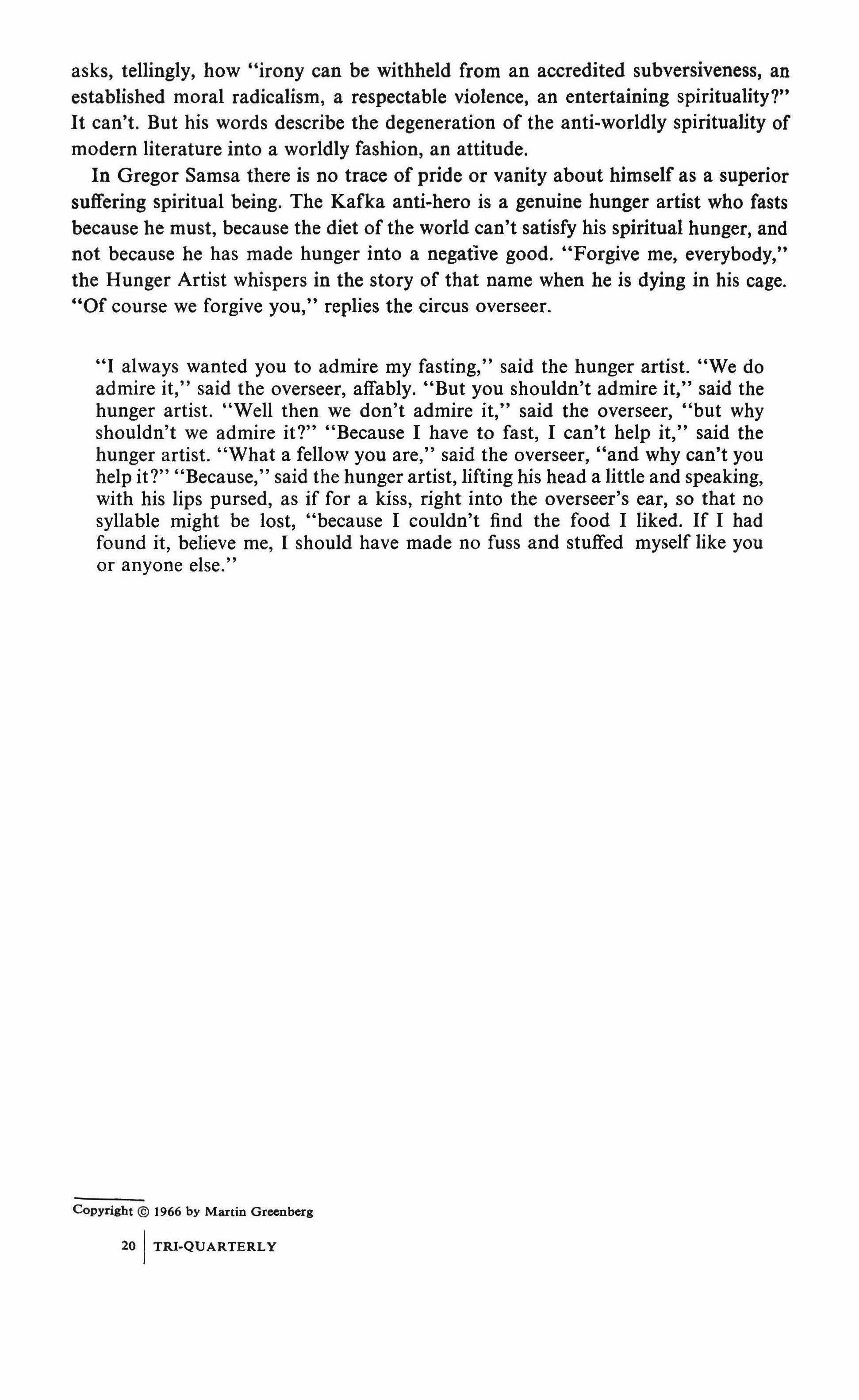
Copyright © 1966 by
Martin Greenberg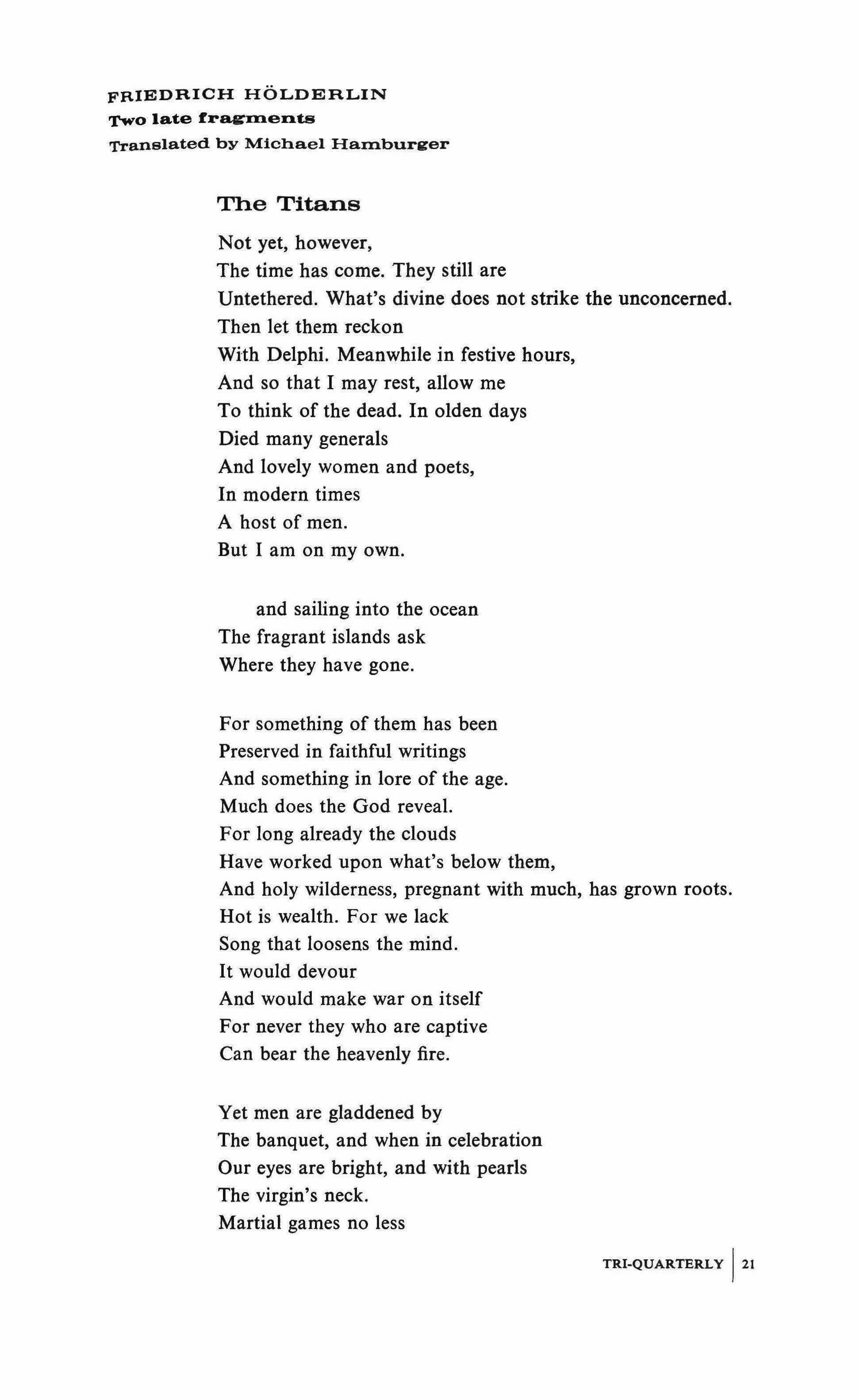
Two late fracPnents
Translated by Michael HamburgerTitans
Not yet, however,
The time has come. They still are Untethered, What's divine does not strike the unconcerned. Then let them reckon With Delphi. Meanwhile in festive hours, And so that I may rest, allow me
To think of the dead. In olden days Died many generals And lovely women and poets, In modern times
A host of men.
But I am on my own.
and sailing into the ocean The fragrant islands ask Where they have gone.
For something of them has been Preserved in faithful writings And something in lore of the age. Much does the God reveal. For long already the clouds Have worked upon what's below them, And holy wilderness, pregnant with much, has grown roots. Hot is wealth. For we lack Song that loosens the mind. It would devour And would make war on itself For never they who are captive Can bear the heavenly fire.
Yet men are gladdened by The banquet, and when in celebration Our eyes are bright, and with pearls The virgin's neck.
Martial games no less
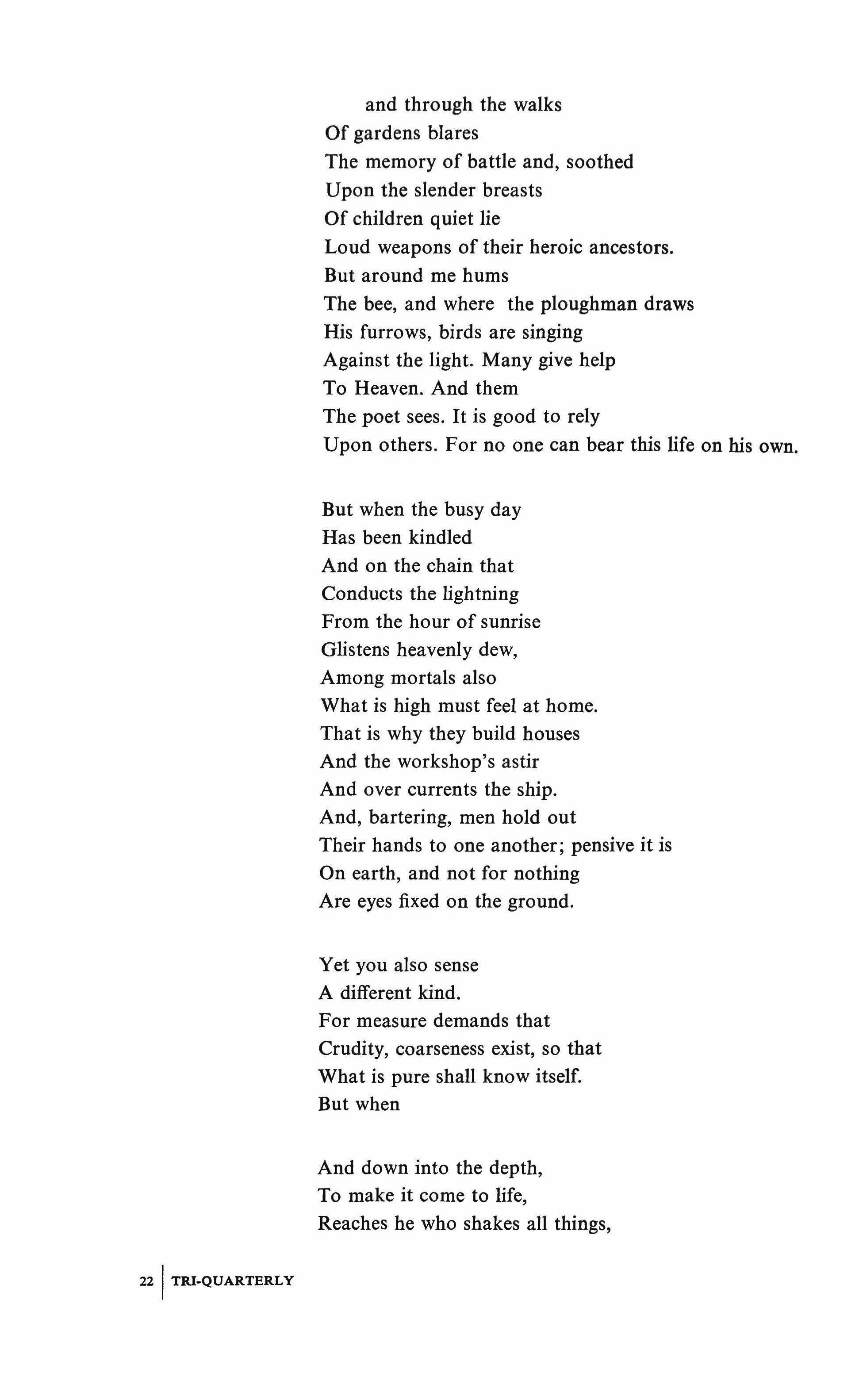
and through the walks Of gardens blares
The memory of battle and, soothed Upon the slender breasts Of children quiet lie Loud weapons of their heroic ancestors. But around me hums
The bee, and where the ploughman draws His furrows, birds are singing Against the light. Many give help To Heaven. And them
The poet sees. It is good to rely Upon others. For no one can bear this life on his own.
But when the busy day Has been kindled And on the chain that Conducts the lightning From the hour of sunrise Glistens heavenly dew, Among mortals also What is high must feel at home. That is why they build houses And the workshop's astir And over currents the ship. And, bartering, men hold out Their hands to one another; pensive it is On earth, and not for nothing Are eyes fixed on the ground.
Yet you also sense A different kind.
For measure demands that Crudity, coarseness exist, so that What is pure shall know itself. But when
And down into the depth, To make it come to life, Reaches he who shakes all things,
They believe the Heavenly comes
Down to the dead, and mightily In the unfettered abyss,
The all-perceiving, light breaks. But I do not wish to say
That the Heavenly are growing weak
Though now it erupts. But when and it rises
Up to the partings of the Father's hair, so that and the bird of Heaven
Makes it known to him. Then
Marvellous in anger he comes.
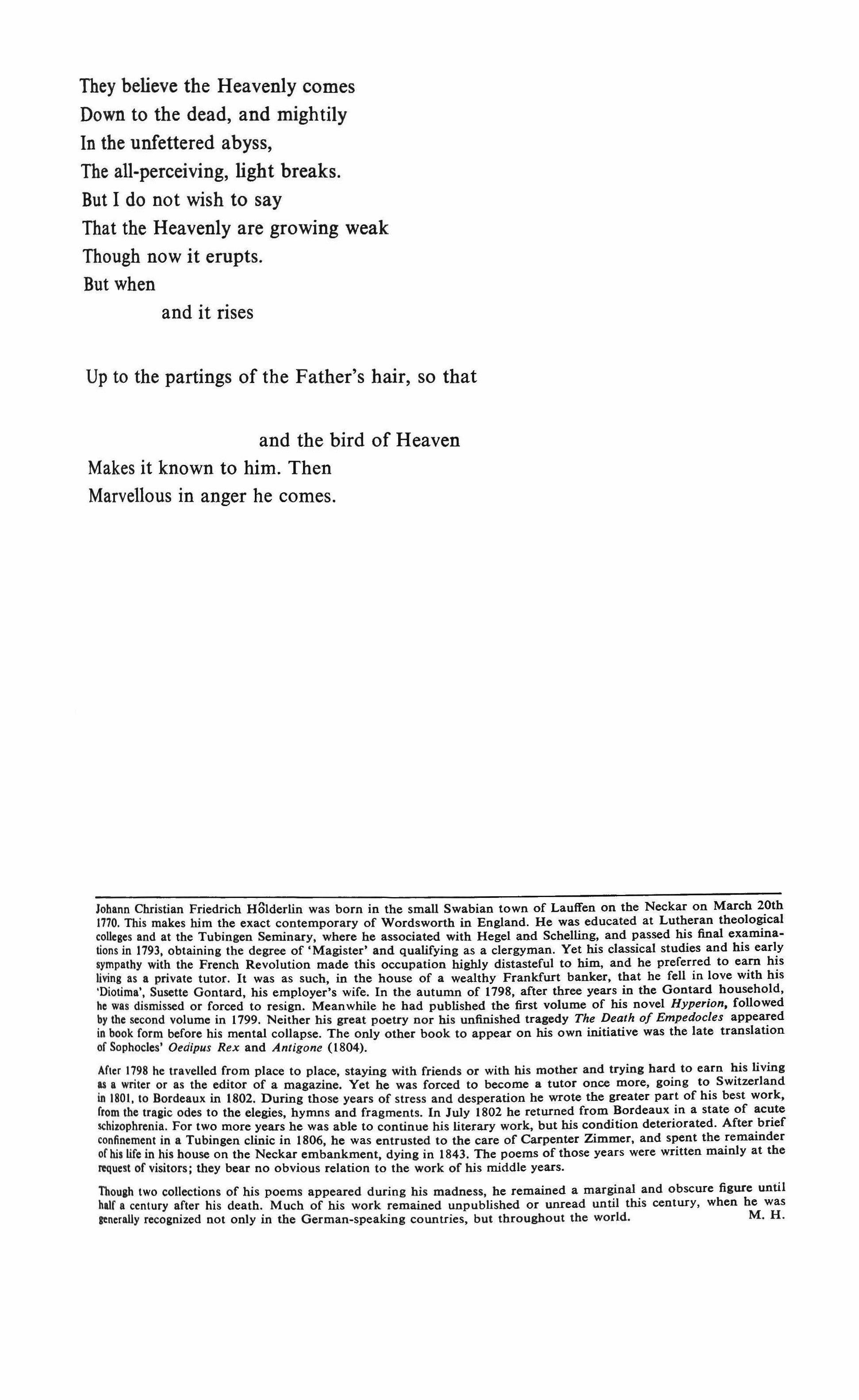
Johann Christian Friedrich HSlderlin was born in the small Swabian town of Laulfen on the Neckar on March 20th 1770. This makes him the exact contemporary of Wordsworth in England. He was educated at Lutheran theological colleges and at the Tubingen Seminary, where he associated with Hegel and Schelling, and passed his final examinations in 1793, obtaining the degree of 'Magister' and qualifying as a clergyman. Yet his classical studies and his early sympathy with the French Revolution made this occupation highly distasteful to him, and he preferred to earn his living as a private tutor. It was as such, in the house of a wealthy Frankfurt banker, that he fell in love with his 'Diotima', Susette Gontard, his employer's wife. In the autumn of 1798, after three years in the Gontard household, he was dismissed or forced to resign. Meanwhile he had published the first volume of his novel Hyperion, followed by the second volume in 1799. Neither his great poetry nor his unfinished tragedy The Death of Empedocles appeared in book form before his mental collapse. The only other book to appear on his own initiative was the late translation of Sophocles' Oedipus Rex and Antigone (1804).
Afler 1798 he travelled from place to place, staying with friends or with his mother and trying hard to earn his living II a writer or as the editor of a magazine. Yet he was forced to become a tutor once more, going to Switzerland in 1801, to Bordeaux in 1802. During those years of stress and desperation he wrote the greater part of his best work, from the tragic odes to the elegies, hymns and fragments. In July 1802 he returned from Bordeaux in a state of acute schizophrenia. For two more years he was able to continue his literary work, but his condition deteriorated. After brief confinement in a Tubingen clinic in 1806, he was entrusted to the care of Carpenter Zimmer, and spent the remainder ofhis life in his house on the Neckar embankment, dying in 1843. The poems of those years were written mainly at the request of visitors; they bear no obvious relation to the work of his middle years.
Thouah two collections of his poems appeared during his madness, he remained a marginal and obscure figure until hllf a century after his death. Much of his work remained unpublished or unread until this century, when he was generally recognized not only in the German-speaking countries, but throughout the world. M. H.
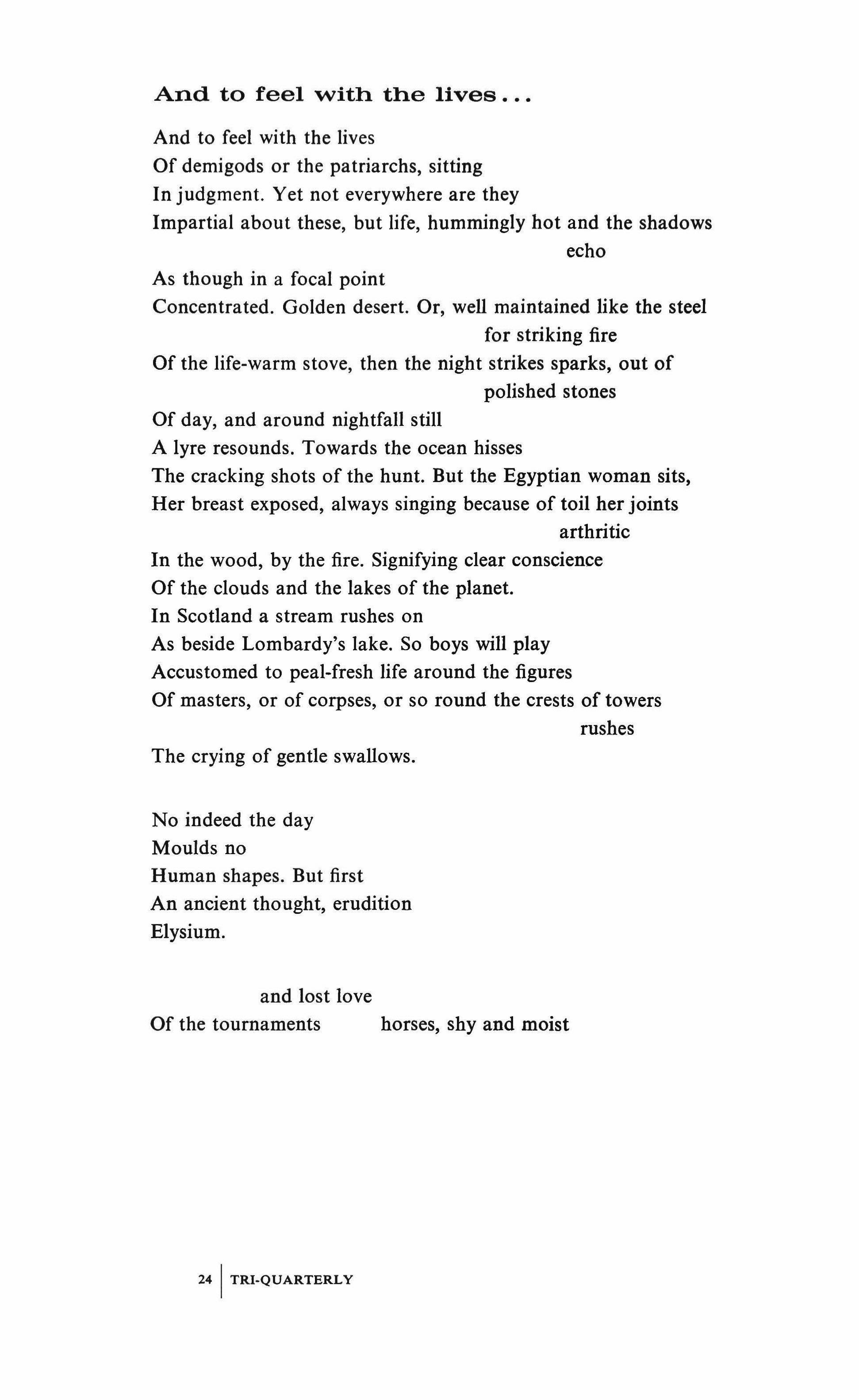
And to feel with the lives
Of demigods or the patriarchs, sitting In judgment. Yet not everywhere are they Impartial about these, but life, hummingly hot and the shadows echo
As though in a focal point
Concentrated. Golden desert. Or, well maintained like the steel for striking fire
Of the life-warm stove, then the night strikes sparks, out of polished stones
Of day, and around nightfall still A lyre resounds. Towards the ocean hisses
The cracking shots of the hunt. But the Egyptian woman sits, Her breast exposed, always singing because of toil her joints arthritic
In the wood, by the fire. Signifying clear conscience
Of the clouds and the lakes of the planet.
In Scotland a stream rushes on
As beside Lombardy's lake. So boys will play
Accustomed to peal-fresh life around the figures
Of masters, or of corpses, or so round the crests of towers rushes
The crying of gentle swallows.
No indeed the day
Moulds no
Human shapes. But first An ancient thought, erudition Elysium.
and lost love
Of the tournaments horses, shy and moist
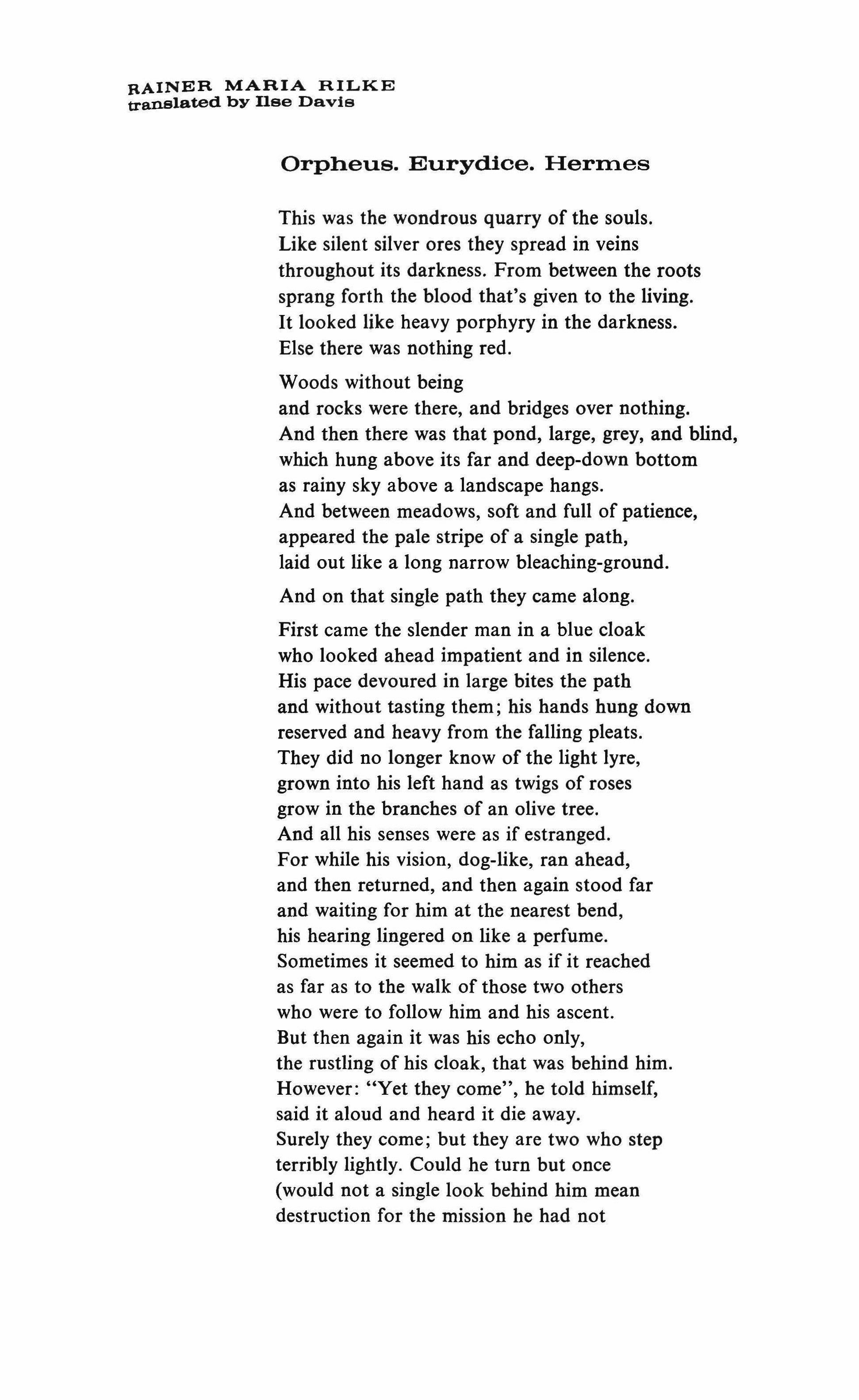
This was the wondrous quarry of the souls. Like silent silver ores they spread in veins throughout its darkness. From between the roots sprang forth the blood that's given to the living. It looked like heavy porphyry in the darkness. Else there was nothing red. Woods without being and rocks were there, and bridges over nothing. And then there was that pond, large, grey, and blind, which hung above its far and deep-down bottom as rainy sky above a landscape hangs. And between meadows, soft and full of patience, appeared the pale stripe of a single path, laid out like a long narrow bleaching-ground.
And on that single path they came along. First came the slender man in a blue cloak who looked ahead impatient and in silence. His pace devoured in large bites the path and without tasting them; his hands hung down reserved and heavy from the falling pleats. They did no longer know of the light lyre, grown into his left hand as twigs of roses grow in the branches of an olive tree. And all his senses were as if estranged. For while his vision, dog-like, ran ahead, and then returned, and then again stood far and waiting for him at the nearest bend, his hearing lingered on like a perfume. Sometimes it seemed to him as if it reached as far as to the walk of those two others who were to follow him and his ascent. But then again it was his echo only, the rustling of his cloak, that was behind him. However: "Yet they come", he told himself, said it aloud and heard it die away. Surely they come; but they are two who step terribly lightly. Could he turn but once (would not a single look behind him mean destruction for the mission he had not
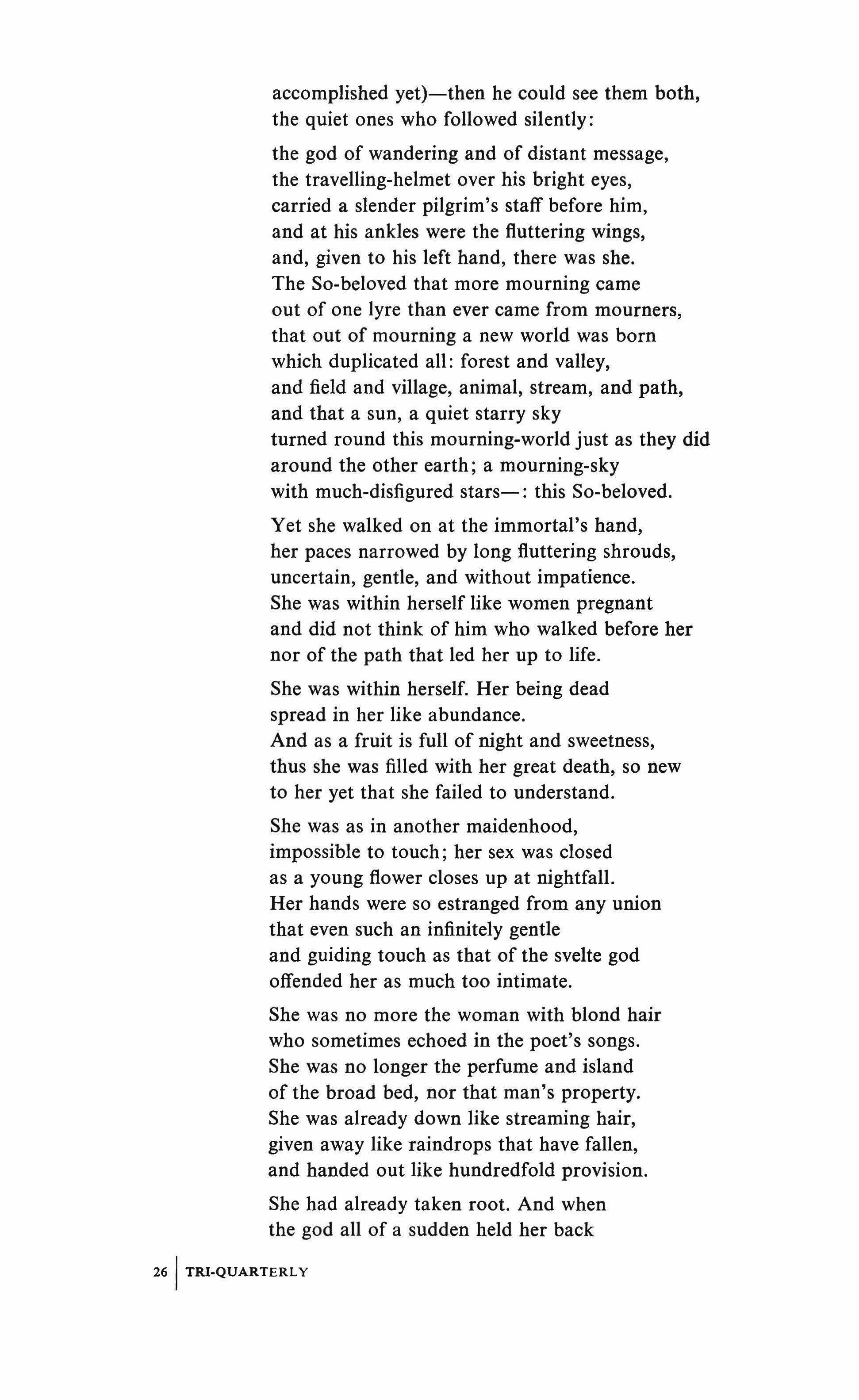
accomplished yet)-then he could see them both, the quiet ones who followed silently: the god of wandering and of distant message, the travelling-helmet over his bright eyes, carried a slender pilgrim's staff before him, and at his ankles were the fluttering wings, and, given to his left hand, there was she. The So-beloved that more mourning came out of one lyre than ever came from mourners, that out of mourning a new world was born which duplicated all: forest and valley, and field and village, animal, stream, and path, and that a sun, a quiet starry sky turned round this mourning-world just as they did around the other earth; a mourning-sky with much-disfigured stars-: this So-beloved.
Yet she walked on at the immortal's hand, her paces narrowed by long fluttering shrouds, uncertain, gentle, and without impatience. She was within herself like women pregnant and did not think of him who walked before her nor of the path that led her up to life.
She was within herself. Her being dead spread in her like abundance. And as a fruit is full of night and sweetness, thus she was filled with her great death, so new to her yet that she failed to understand.
She was as in another maidenhood, impossible to touch; her sex was closed as a young flower closes up at nightfall. Her hands were so estranged from any union that even such an infinitely gentle and guiding touch as that of the svelte god offended her as much too intimate.
She was no more the woman with blond hair who sometimes echoed in the poet's songs. She was no longer the perfume and island of the broad bed, nor that man's property. She was already down like streaming hair, given away like raindrops that have fallen, and handed out like hundredfold provision. She had already taken root. And when the god all of a sudden held her back

and spoke to her with grief: He turned around-, she did not grasp it and said gently: who? And far away, before the lucid exit, stood a dark image, someone; but his face could not be recognized. He stood and saw how on the narrow path among the meadows the god of errands turned with mournful eyes and deep in silence, following the figure who on the same path was already leaving, her paces narrowed by long fluttering shrouds, uncertain, gentle, and without impatience.
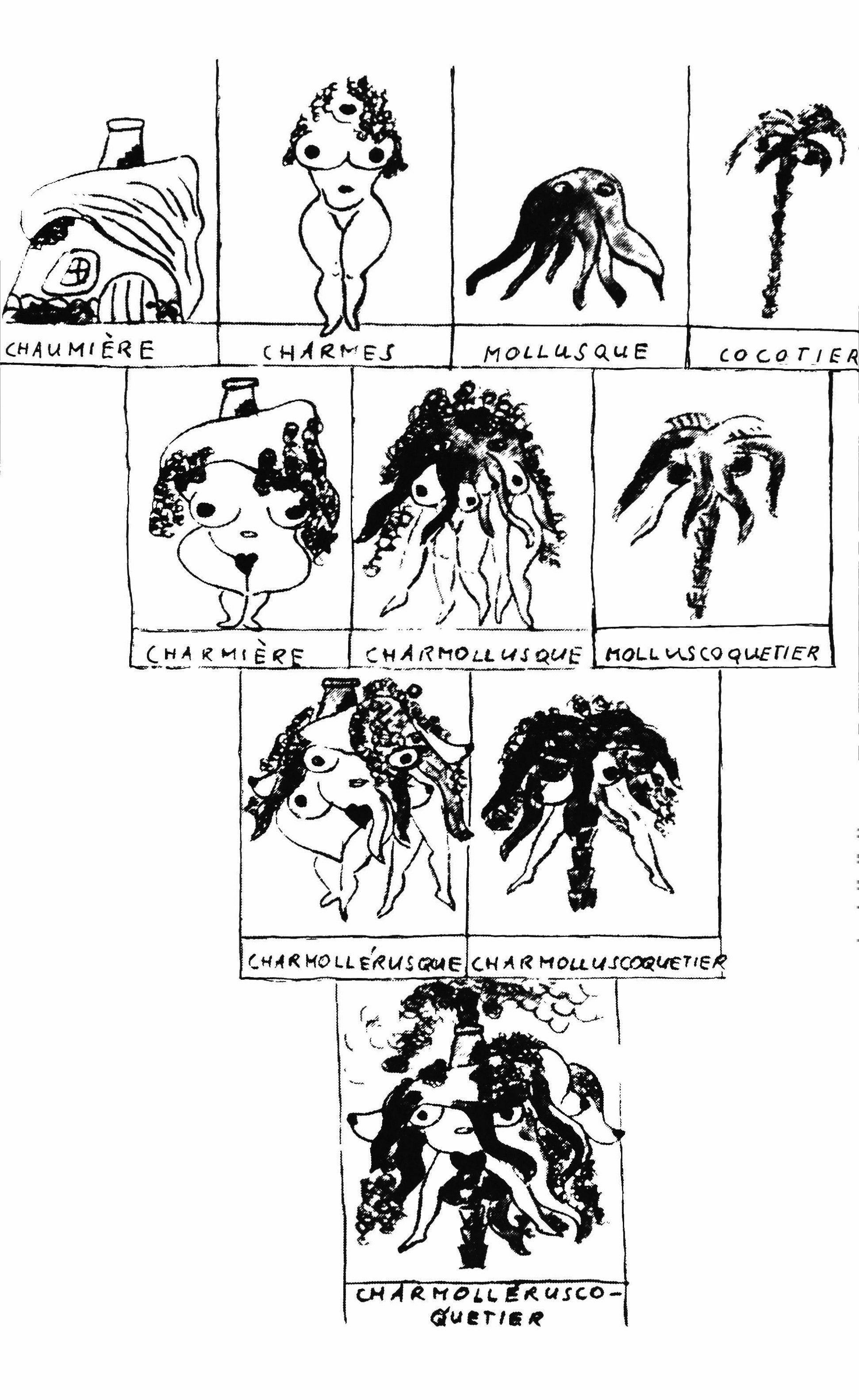
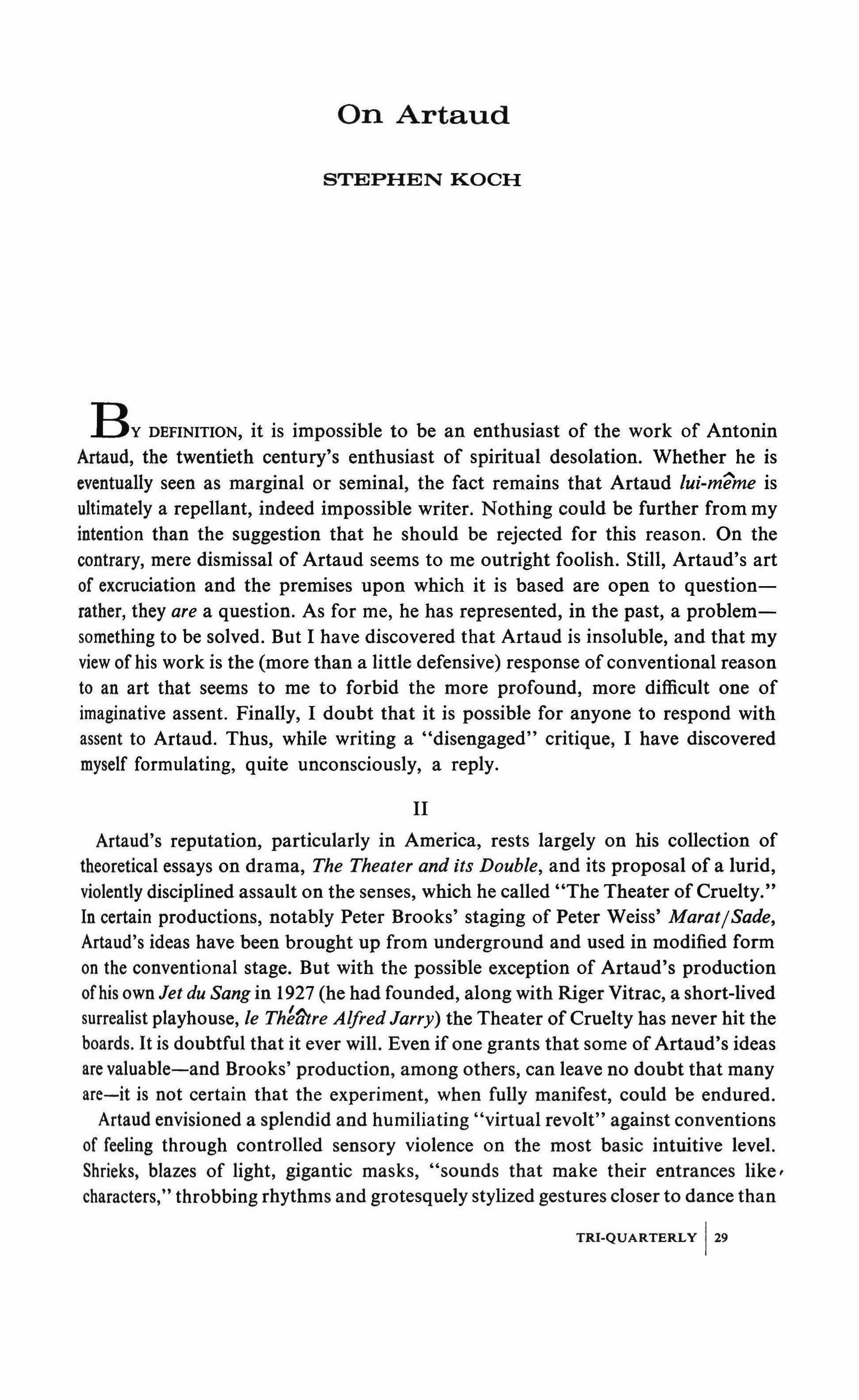
By DEFINITION, it is impossible to be an enthusiast of the work of Antonin Artaud, the twentieth century's enthusiast of spiritual desolation. Whether he is eventually seen as marginal or seminal, the fact remains that Artaud lui-meme is ultimately a repellant, indeed impossible writer. Nothing could be further from my intention than the suggestion that he should be rejected for this reason. On the contrary, mere dismissal of Artaud seems to me outright foolish. Still, Artaud's art of excruciation and the premises upon which it is based are open to questionrather, they are a question. As for me, he has represented, in the past, a problemsomething to be solved. But I have discovered that Artaud is insoluble, and that my view of his work is the (more than a little defensive) response of conventional reason to an art that seems to me to forbid the more profound, more difficult one of imaginative assent. Finally, I doubt that it is possible for anyone to respond with assent to Artaud. Thus, while writing a "disengaged" critique, I have discovered myself formulating, quite unconsciously, a reply.
Artaud's reputation, particularly in America, rests largely on his collection of theoretical essays on drama, The Theater and its Double, and its proposal of a lurid, violently disciplined assault on the senses, which he called "The Theater of Cruelty." In certain productions, notably Peter Brooks' staging of Peter Weiss' MaratfSade, Artaud's ideas have been brought up from underground and used in modified form on the conventional stage. But with the possible exception of Artaud's production ofhis own Jet du Sang in 1927 (he had founded, along with Riger Vitrac, a short-lived surrealist playhouse, Ie Th�f1tre AlfredJarry) the Theater of Cruelty has never hit the boards. It is doubtful that it ever will. Even if one grants that some of Artaud's ideas are valuable-and Brooks' production, among others, can leave no doubt that many are-it is not certain that the experiment, when fully manifest, could be endured. Artaud envisioned a splendid and humiliating "virtual revolt" against conventions of feeling through controlled sensory violence on the most basic intuitive level. Shrieks, blazes of light, gigantic masks, "sounds that make their entrances like, characters," throbbing rhythms and grotesquely stylized gestures closer to dance than TRI-QUARTERLY
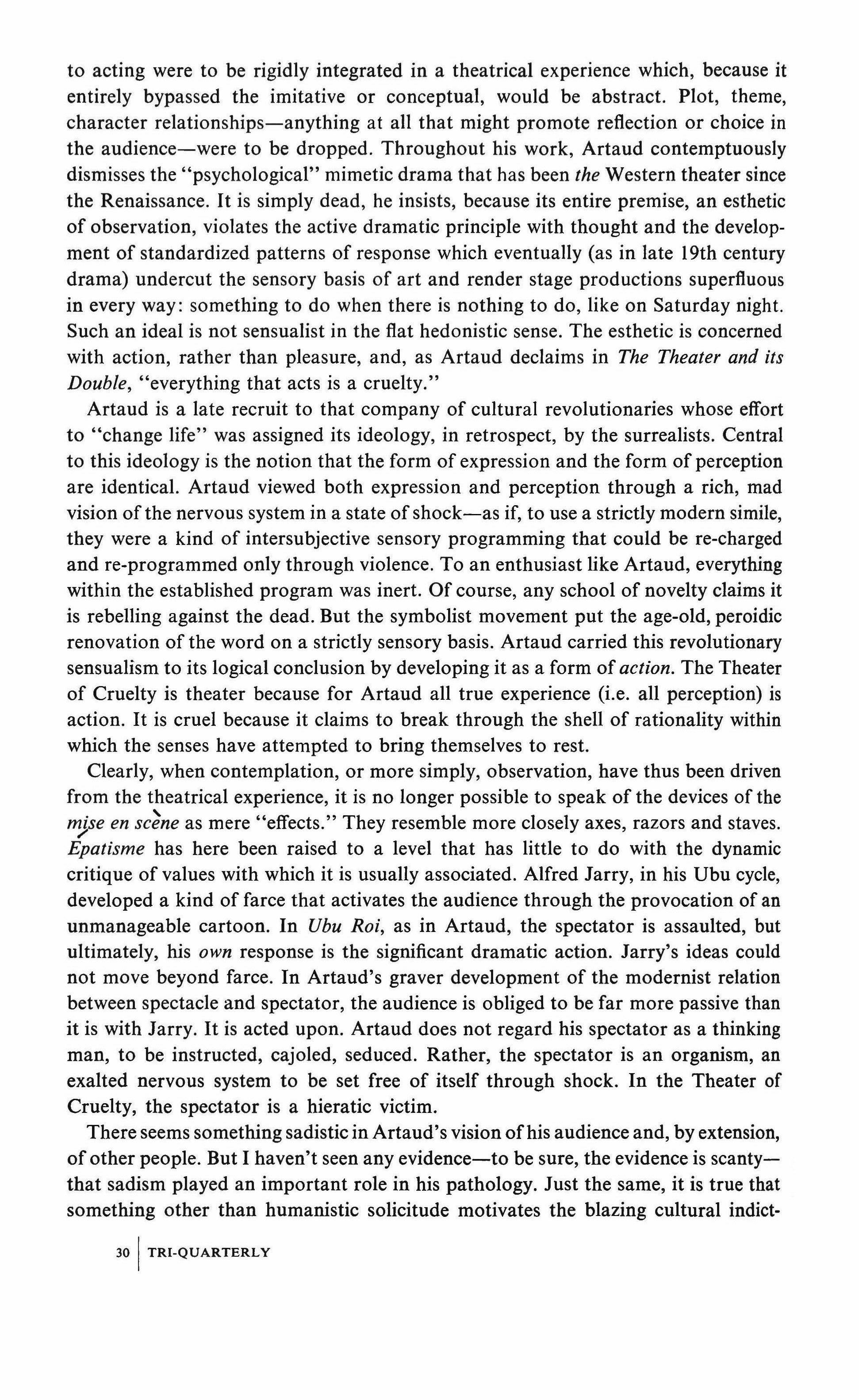
to acting were to be rigidly integrated in a theatrical experience which, because it entirely bypassed the imitative or conceptual, would be abstract. Plot, theme, character relationships-anything at all that might promote reflection or choice in the audience-were to be dropped. Throughout his work, Artaud contemptuously dismisses the "psychological" mimetic drama that has been the Western theater since the Renaissance. It is simply dead, he insists, because its entire premise, an esthetic of observation, violates the active dramatic principle with thought and the development of standardized patterns of response which eventually (as in late 19th century drama) undercut the sensory basis of art and render stage productions superfluous in every way: something to do when there is nothing to do, like on Saturday night. Such an ideal is not sensualist in the flat hedonistic sense. The esthetic is concerned with action, rather than pleasure, and, as Artaud declaims in The Theater and its Double, "everything that acts is a cruelty."
Artaud is a late recruit to that company of cultural revolutionaries whose effort to "change life" was assigned its ideology, in retrospect, by the surrealists. Central to this ideology is the notion that the form of expression and the form of perception are identical. Artaud viewed both expression and perception through a rich, mad vision of the nervous system in a state of shock-as if, to use a strictly modern simile, they were a kind of intersubjective sensory programming that could be re-charged and re-programmed only through violence. To an enthusiast like Artaud, everything within the established program was inert. Of course, any school of novelty claims it is rebelling against the dead. But the symbolist movement put the age-old, peroidic renovation of the word on a strictly sensory basis. Artaud carried this revolutionary sensualism to its logical conclusion by developing it as a form of action. The Theater of Cruelty is theater because for Artaud all true experience (i.e. all perception) is action. It is cruel because it claims to break through the shell of rationality within which the senses have attempted to bring themselves to rest.
Clearly, when contemplation, or more simply, observation, have thus been driven from the theatrical experience, it is no longer possible to speak of the devices of the mjse en sc�ne as mere "effects." They resemble more closely axes, razors and staves. Epatisme has here been raised to a level that has little to do with the dynamic critique of values with which it is usually associated. Alfred Jarry, in his Ubu cycle, developed a kind of farce that activates the audience through the provocation of an unmanageable cartoon. In Ubu Roi, as in Artaud, the spectator is assaulted, but ultimately, his own response is the significant dramatic action. Jarry's ideas could not move beyond farce. In Artaud's graver development of the modernist relation between spectacle and spectator, the audience is obliged to be far more passive than it is with Jarry. It is acted upon. Artaud does not regard his spectator as a thinking man, to be instructed, cajoled, seduced. Rather, the spectator is an organism, an exalted nervous system to be set free of itself through shock. In the Theater of Cruelty, the spectator is a hieratic victim.
There seems something sadistic in Artaud's vision ofhis audience and, by extension, of other people. But I haven't seen any evidence-to be sure, the evidence is scantythat sadism played an important role in his pathology. Just the same, it is true that something other than humanistic solicitude motivates the blazing cultural indict-
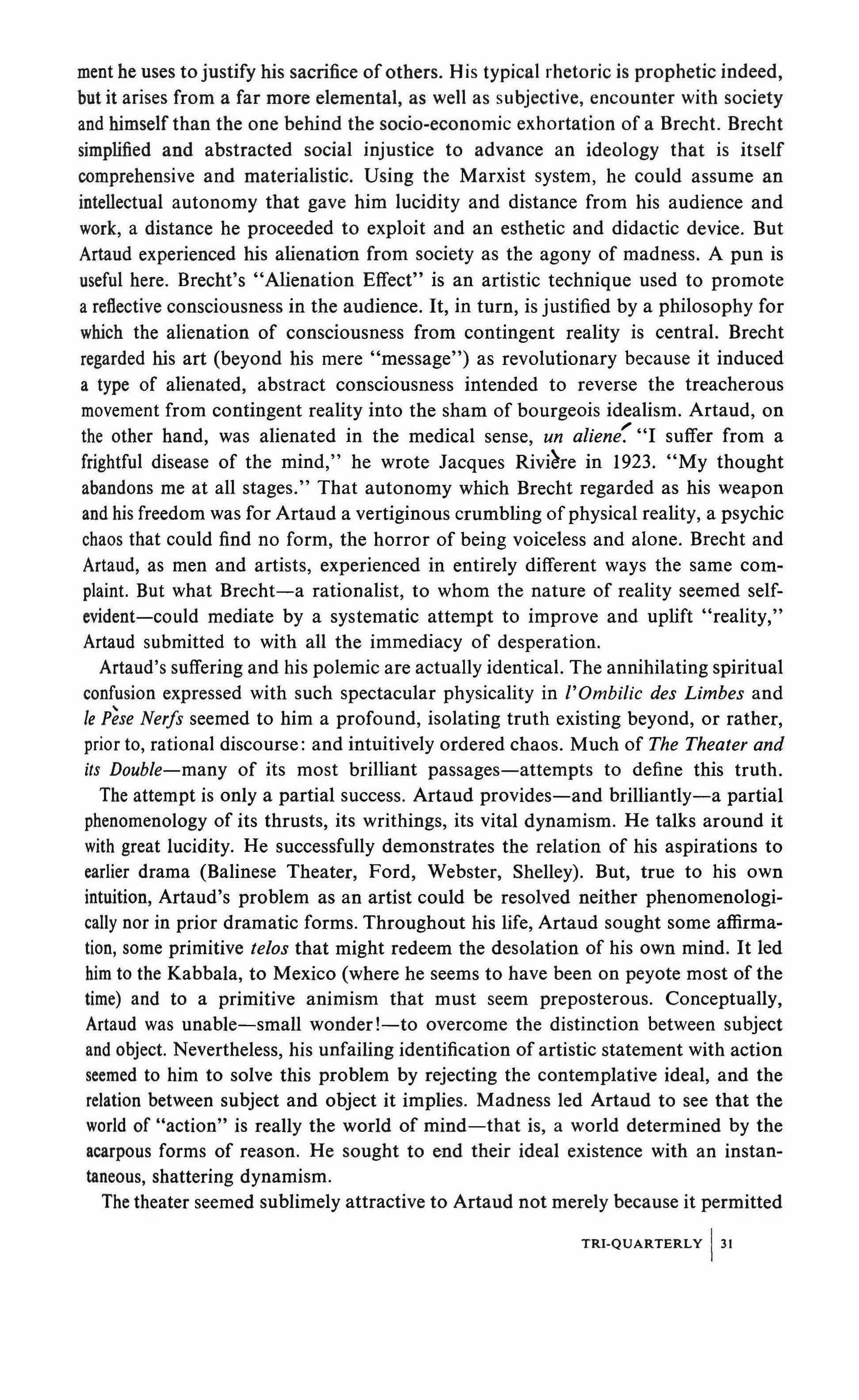
ment he uses to justify his sacrifice of others. His typical rhetoric is prophetic indeed, but it arises from a far more elemental, as well as subjective, encounter with society and himself than the one behind the socio-economic exhortation of a Brecht. Brecht simplified and abstracted social injustice to advance an ideology that is itself comprehensive and materialistic. Using the Marxist system, he could assume an intellectual autonomy that gave him lucidity and distance from his audience and work, a distance he proceeded to exploit and an esthetic and didactic device. But Artaud experienced his alienation from society as the agony of madness. A pun is useful here. Brecht's "Alienation Effect" is an artistic technique used to promote a reflective consciousness in the audience. It, in turn, is justified by a philosophy for which the alienation of consciousness from contingent reality is central. Brecht regarded his art (beyond his mere "message") as revolutionary because it induced a type of alienated, abstract consciousness intended to reverse the treacherous movement from contingent reality into the sham of bourgeois idealism. Artaud, on the other hand, was alienated in the medical sense, un alienl' "I suffer from a frightful disease of the mind," he wrote Jacques Rivi�re in 1923. "My thought abandons me at all stages." That autonomy which Brecht regarded as his weapon and his freedom was for Artaud a vertiginous crumbling of physical reality, a psychic chaos that could find no form, the horror of being voiceless and alone. Brecht and Artaud, as men and artists, experienced in entirely different ways the same complaint. But what Brecht-a rationalist, to whom the nature of reality seemed selfevident-could mediate by a systematic attempt to improve and uplift "reality," Artaud submitted to with all the immediacy of desperation.
Artaud's suffering and his polemic are actually identical. The annihilating spiritual confusion expressed with such spectacular physicality in I'Ombilic des Limbes and Ie P�se Nerfs seemed to him a profound, isolating truth existing beyond, or rather, prior to, rational discourse: and intuitively ordered chaos. Much of The Theater and its Double-many of its most brilliant passages-attempts to define this truth.
The attempt is only a partial success. Artaud provides-and brilliantly-a partial phenomenology of its thrusts, its writhings, its vital dynamism. He talks around it with great lucidity. He successfully demonstrates the relation of his aspirations to earlier drama (Balinese Theater, Ford, Webster, Shelley). But, true to his own intuition, Artaud's problem as an artist could be resolved neither phenomenologically nor in prior dramatic forms. Throughout his life, Artaud sought some affirmation, some primitive te/os that might redeem the desolation of his own mind. It led him to the Kabbala, to Mexico (where he seems to have been on peyote most of the time) and to a primitive animism that must seem preposterous. Conceptually, Artaud was unable-small wonder!-to overcome the distinction between subject and object. Nevertheless, his unfailing identification of artistic statement with action seemed to him to solve this problem by rejecting the contemplative ideal, and the relation between subject and object it implies. Madness led Artaud to see that the world of "action" is really the world of mind-that is, a world determined by the acarpous forms of reason. He sought to end their ideal existence with an instantaneous, shattering dynamism.
The theater seemed sublimely attractive to Artaud not merely because it permitted
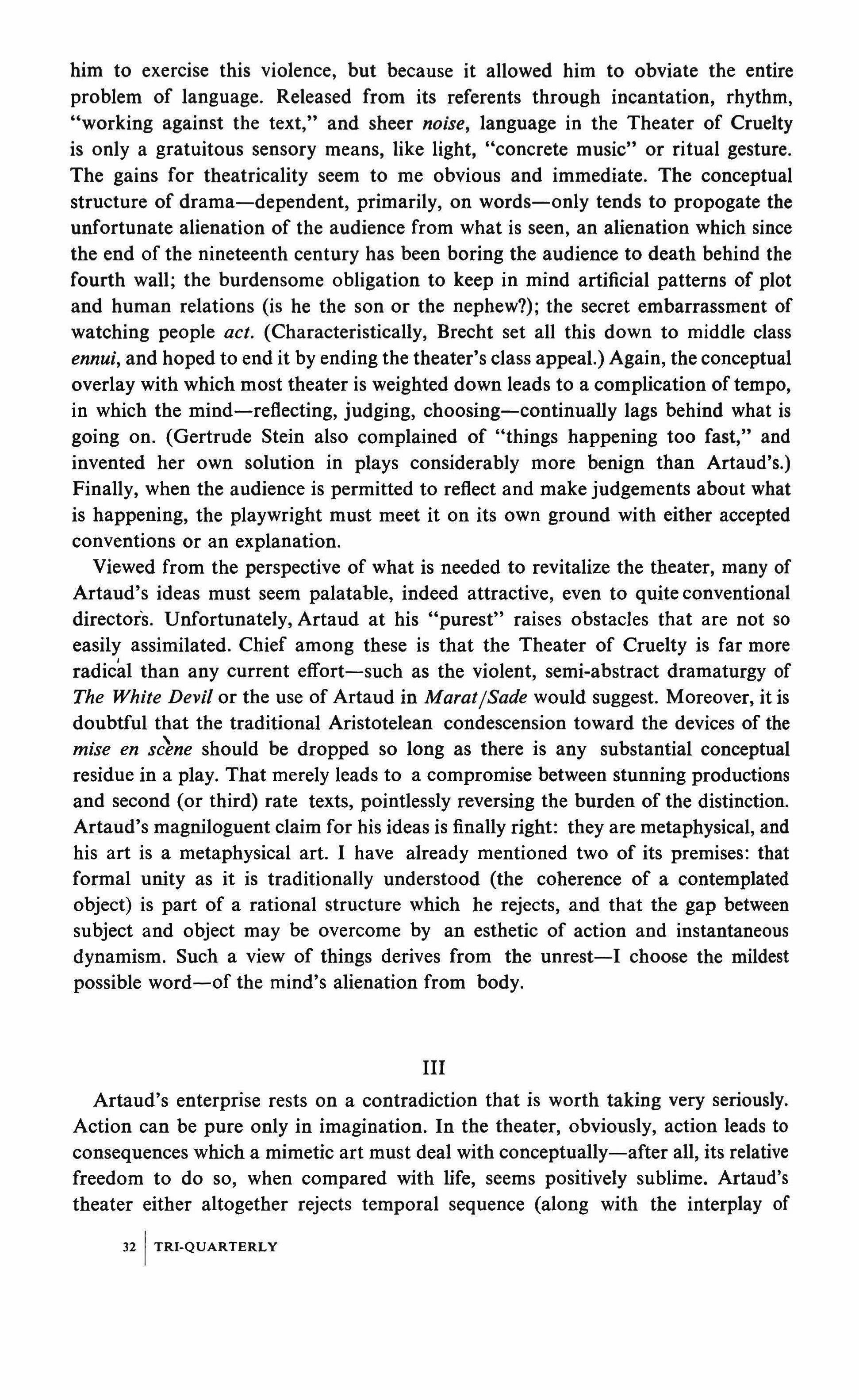
him to exercise this violence, but because it allowed him to obviate the entire problem of language. Released from its referents through incantation, rhythm, "working against the text," and sheer noise, language in the Theater of Cruelty is only a gratuitous sensory means, like light, "concrete music" or ritual gesture. The gains for theatricality seem to me obvious and immediate. The conceptual structure of drama-dependent, primarily, on words-only tends to propogate the unfortunate alienation of the audience from what is seen, an alienation which since the end of the nineteenth century has been boring the audience to death behind the fourth wall; the burdensome obligation to keep in mind artificial patterns of plot and human relations (is he the son or the nephew?); the secret embarrassment of watching people act. (Characteristically, Brecht set all this down to middle class ennui, and hoped to end it by ending the theater's class appeal.) Again, the conceptual overlay with which most theater is weighted down leads to a complication of tempo, in which the mind-reflecting, judging, choosing-continually lags behind what is going on. (Gertrude Stein also complained of "things happening too fast," and invented her own solution in plays considerably more benign than Artaud's.) Finally, when the audience is permitted to reflect and make judgements about what is happening, the playwright must meet it on its own ground with either accepted conventions or an explanation.
Viewed from the perspective of what is needed to revitalize the theater, many of Artaud's ideas must seem palatable, indeed attractive, even to quite conventional directors. Unfortunately, Artaud at his "purest" raises obstacles that are not so easily assimilated. Chief among these is that the Theater of Cruelty is far more radical than any current effort-such as the violent, semi-abstract dramaturgy of The White Devil or the use of Artaud in MaratjSade would suggest. Moreover, it is doubtful that the traditional Aristotelean condescension toward the devices of the mise en sc}ne should be dropped so long as there is any substantial conceptual residue in a play. That merely leads to a compromise between stunning productions and second (or third) rate texts, pointlessly reversing the burden of the distinction. Artaud's magniloguent claim for his ideas is finally right: they are metaphysical, and his art is a metaphysical art. I have already mentioned two of its premises: that formal unity as it is traditionally understood (the coherence of a contemplated object) is part of a rational structure which he rejects, and that the gap between subject and object may be overcome by an esthetic of action and instantaneous dynamism. Such a view of things derives from the unrest-I choose the mildest possible word-of the mind's alienation from body.
Artaud's enterprise rests on a contradiction that is worth taking very seriously. Action can be pure only in imagination. In the theater, obviously, action leads to consequences which a mimetic art must deal with conceptually-after all, its relative freedom to do so, when compared with life, seems positively sublime. Artaud's theater either altogether rejects temporal sequence (along with the interplay of
TRI-QUARTERLY
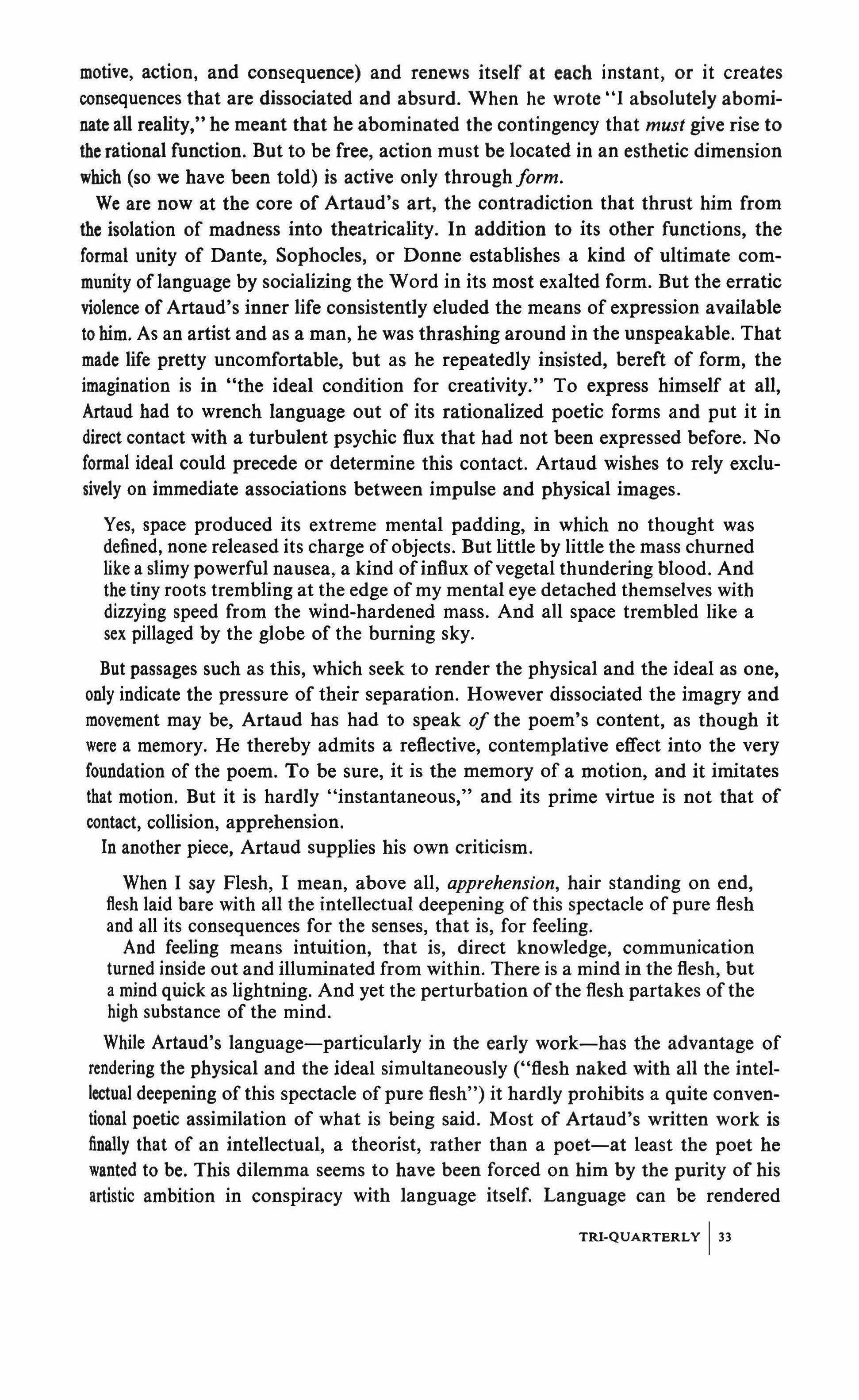
motive, action, and consequence) and renews itself at each instant, or it creates consequences that are dissociated and absurd. When he wrote "I absolutely abominate all reality," he meant that he abominated the contingency that must give rise to the rational function. But to be free, action must be located in an esthetic dimension which (so we have been told) is active only throughform.
We are now at the core of Artaud's art, the contradiction that thrust him from the isolation of madness into theatricality. In addition to its other functions, the formal unity of Dante, Sophocles, or Donne establishes a kind of ultimate community of language by socializing the Word in its most exalted form. But the erratic violence of Artaud's inner life consistently eluded the means of expression available to him. As an artist and as a man, he was thrashing around in the unspeakable. That made life pretty uncomfortable, but as he repeatedly insisted, bereft of form, the imagination is in "the ideal condition for creativity." To express himself at all, Artaud had to wrench language out of its rationalized poetic forms and put it in direct contact with a turbulent psychic flux that had not been expressed before. No formal ideal could precede or determine this contact. Artaud wishes to rely exclusively on immediate associations between impulse and physical images.
Yes, space produced its extreme mental padding, in which no thought was defined, none released its charge of objects. But little by little the mass churned like a slimy powerful nausea, a kind ofinflux ofvegetal thundering blood. And the tiny roots trembling at the edge of my mental eye detached themselves with dizzying speed from the wind-hardened mass. And all space trembled like a sex pillaged by the globe of the burning sky.
But passages such as this, which seek to render the physical and the ideal as one, only indicate the pressure of their separation. However dissociated the imagry and movement may be, Artaud has had to speak of the poem's content, as though it were a memory. He thereby admits a reflective, contemplative effect into the very foundation of the poem. To be sure, it is the memory of a motion, and it imitates that motion. But it is hardly "instantaneous," and its prime virtue is not that of contact, collision, apprehension.
In another piece, Artaud supplies his own criticism.
When I say Flesh, I mean, above all, apprehension, hair standing on end, flesh laid bare with all the intellectual deepening of this spectacle of pure flesh and all its consequences for the senses, that is, for feeling.
And feeling means intuition, that is, direct knowledge, communication turned inside out and illuminated from within. There is a mind in the flesh, but a mind quick as lightning. And yet the perturbation of the flesh partakes of the high substance of the mind.
While Artaud's language-particularly in the early work-has the advantage of rendering the physical and the ideal simultaneously ("flesh naked with all the intellectual deepening of this spectacle of pure flesh") it hardly prohibits a quite conventional poetic assimilation of what is being said. Most of Artaud's written work is finally that of an intellectual, a theorist, rather than a poet-at least the poet he wanted to be. This dilemma seems to have been forced on him by the purity of his artistic ambition in conspiracy with language itself. Language can be rendered
TRI-QUARTERLY 133
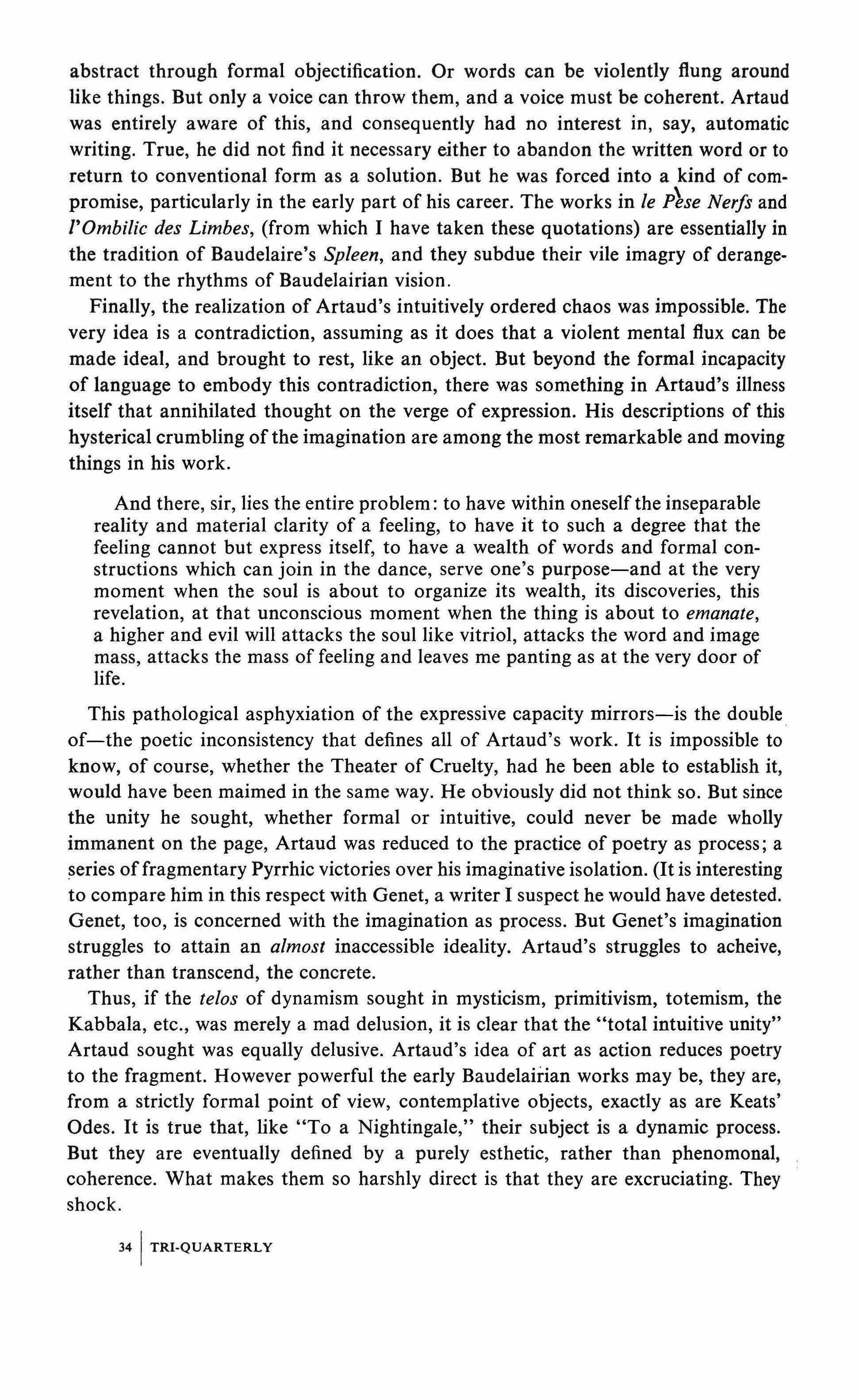
abstract through formal objectification. Or words can be violently flung around like things. But only a voice can throw them, and a voice must be coherent. Artaud was entirely aware of this, and consequently had no interest in, say, automatic writing. True, he did not find it necessary either to abandon the written word or to return to conventional form as a solution. But he was forced into a kind of compromise, particularly in the early part of his career. The works in Ie P}se Nerfs and l'Ombilic des Limbes, (from which I have taken these quotations) are essentially in the tradition of Baudelaire's Spleen, and they subdue their vile imagry of derangement to the rhythms of Baudelairian vision.
Finally, the realization of Artaud's intuitively ordered chaos was impossible. The very idea is a contradiction, assuming as it does that a violent mental flux can be made ideal, and brought to rest, like an object. But beyond the formal incapacity of language to embody this contradiction, there was something in Artaud's illness itself that annihilated thought on the verge of expression. His descriptions of this hysterical crumbling of the imagination are among the most remarkable and moving things in his work.
And there, sir, lies the entire problem: to have within oneself the inseparable reality and material clarity of a feeling, to have it to such a degree that the feeling cannot but express itself, to have a wealth of words and formal constructions which can join in the dance, serve one's purpose-and at the very moment when the soul is about to organize its wealth, its discoveries, this revelation, at that unconscious moment when the thing is about to emanate, a higher and evil will attacks the soul like vitriol, attacks the word and image mass, attacks the mass of feeling and leaves me panting as at the very door of life.
This pathological asphyxiation of the expressive capacity mirrors-is the double of-the poetic inconsistency that defines all of Artaud's work. It is impossible to know, of course, whether the Theater of Cruelty, had he been able to establish it, would have been maimed in the same way. He obviously did not think so. But since the unity he sought, whether formal or intuitive, could never be made wholly immanent on the page, Artaud was reduced to the practice of poetry as process; a series offragmentary Pyrrhic victories over his imaginative isolation. (It is interesting to compare him in this respect with Genet, a writer I suspect he would have detested. Genet, too, is concerned with the imagination as process. But Genet's imagination struggles to attain an almost inaccessible ideality. Artaud's struggles to acheive, rather than transcend, the concrete.
Thus, if the telos of dynamism sought in mysticism, primitivism, totemism, the Kabbala, etc., was merely a mad delusion, it is clear that the "total intuitive unity" Artaud sought was equally delusive. Artaud's idea of art as action reduces poetry to the fragment. However powerful the early Baudelairian works may be, they are, from a strictly formal point of view, contemplative objects, exactly as are Keats' Odes. It is true that, like "To a Nightingale," their subject is a dynamic process. But they are eventually defined by a purely esthetic, rather than phenomonal, coherence. What makes them so harshly direct is that they are excruciating. They shock.
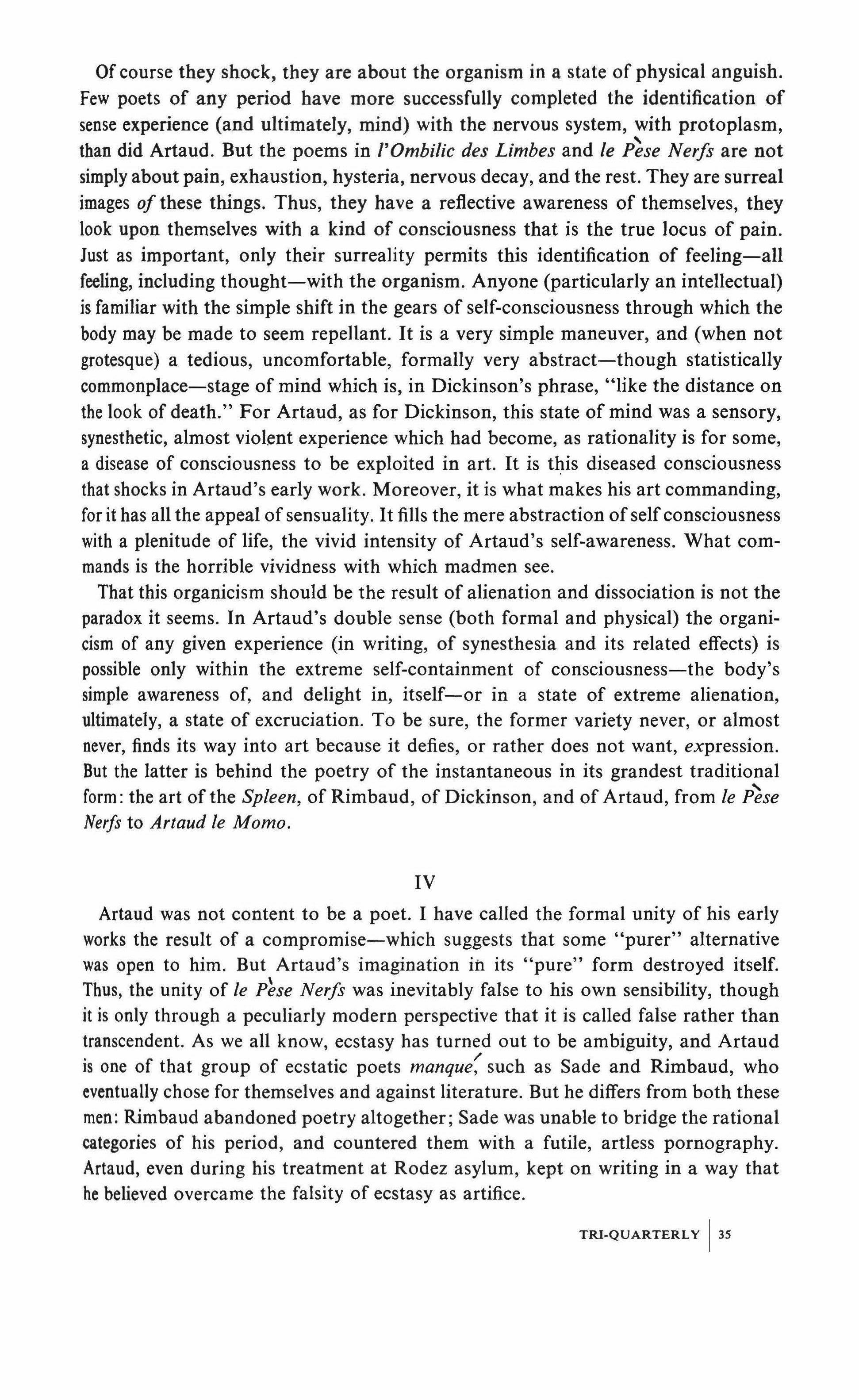
Of course they shock, they are about the organism in a state of physical anguish. Few poets of any period have more successfully completed the identification of sense experience (and ultimately, mind) with the nervous system, with protoplasm, than did Artaud. But the poems in I'Ombilic des Limbes and Ie P�se Nerfs are not simply about pain, exhaustion, hysteria, nervous decay, and the rest. They are surreal images of these things. Thus, they have a reflective awareness of themselves, they look upon themselves with a kind of consciousness that is the true locus of pain. Just as important, only their surreality permits this identification of feeling-all feeling, including thought-with the organism. Anyone (particularly an intellectual) is familiar with the simple shift in the gears of self-consciousness through which the body may be made to seem repellant. It is a very simple maneuver, and (when not grotesque) a tedious, uncomfortable, formally very abstract-though statistically commonplace-stage of mind which is, in Dickinson's phrase, "like the distance on the look of death." For Artaud, as for Dickinson, this state of mind was a sensory, synesthetic, almost violent experience which had become, as rationality is for some, a disease of consciousness to be exploited in art. It is this diseased consciousness that shocks in Artaud's early work. Moreover, it is what makes his art commanding, for it has all the appeal of sensuality. It fills the mere abstraction of selfconsciousness with a plenitude of life, the vivid intensity of Artaud's self-awareness. What commands is the horrible vividness with which madmen see.
That this organicism should be the result of alienation and dissociation is not the paradox it seems. In Artaud's double sense (both formal and physical) the organicism of any given experience (in writing, of synesthesia and its related effects) is possible only within the extreme self-containment of consciousness-the body's simple awareness of, and delight in, itself-or in a state of extreme alienation, ultimately, a state of excruciation. To be sure, the former variety never, or almost never, finds its way into art because it defies, or rather does not want, expression. But the latter is behind the poetry of the instantaneous in its grandest traditional form: the art of the Spleen, of Rimbaud, of Dickinson, and of Artaud, from Ie P"ese Nerfs to Artaud Ie Momo.
Artaud was not content to be a poet. I have called the formal unity of his early works the result of a compromise-which suggests that some "purer" alternative was open to him. But Artaud's imagination in its "pure" form destroyed itself. Thus, the unity of Ie P�se Nerfs was inevitably false to his own sensibility, though it is only through a peculiarly modern perspective that it is called false rather than transcendent. As we all know, ecstasy has turned out to be ambiguity, and Artaud is one of that group of ecstatic poets manque. such as Sade and Rimbaud, who eventually chose for themselves and against literature. But he differs from both these men: Rimbaud abandoned poetry altogether; Sade was unable to bridge the rational categories of his period, and countered them with a futile, artless pornography. Artaud, even during his treatment at Rodez asylum, kept on writing in a way that he believed overcame the falsity of ecstasy as artifice.
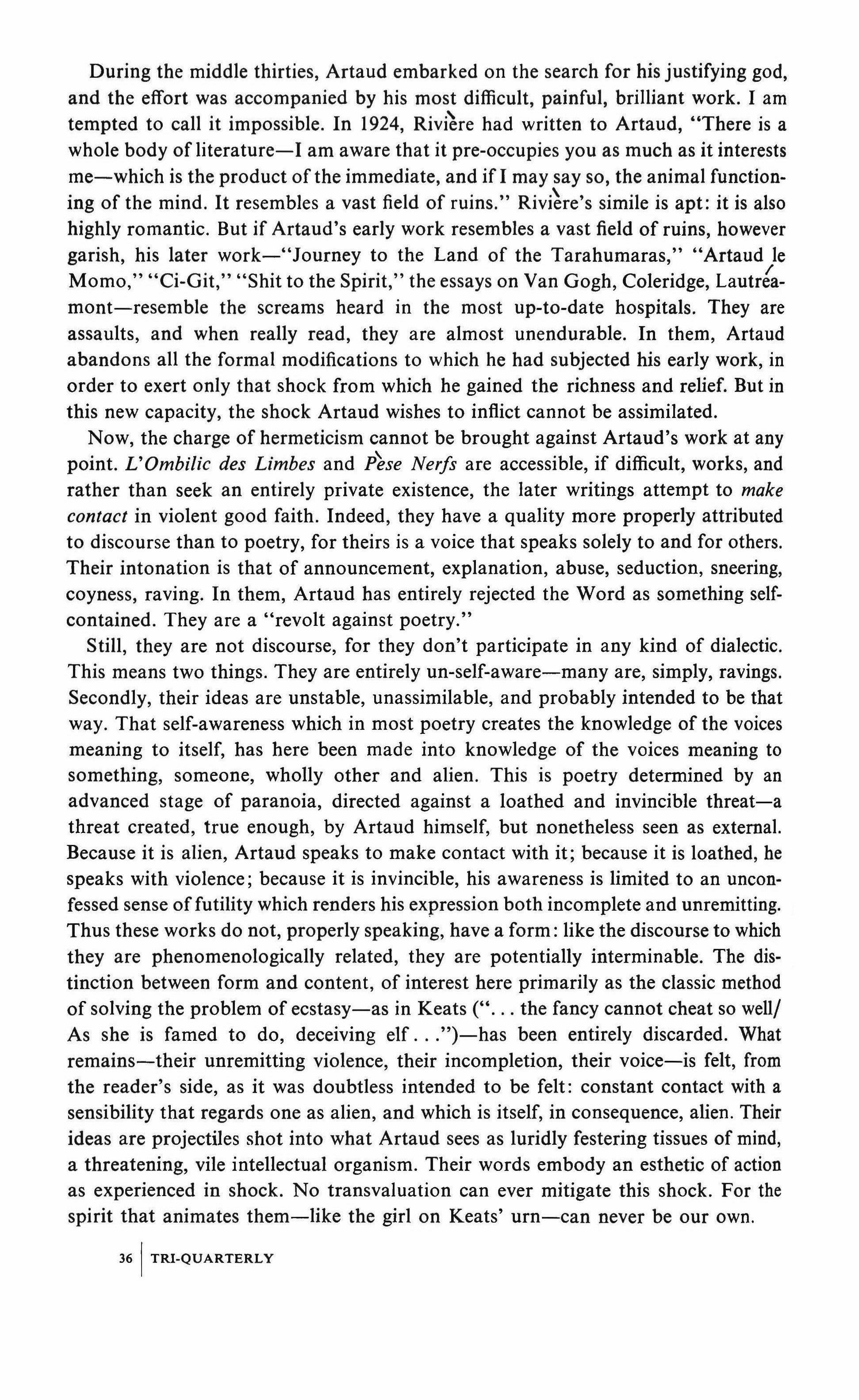
During the middle thirties, Artaud embarked on the search for his justifying god, and the effort was accompanied by his most difficult, painful, brilliant work. I am tempted to call it impossible. In 1924, Rivi�re had written to Artaud, "There is a whole body ofliterature-I am aware that it pre-occupies you as much as it interests me-which is the product of the immediate, and ifI may say so, the animal functioning of the mind. It resembles a vast field of ruins." Rivi�re's simile is apt: it is also highly romantic. But if Artaud's early work resembles a vast field of ruins, however garish, his later work-"Journey to the Land of the Tarahumaras," "Artaud Ie Momo," "Ci-Git," "Shit to the Spirit," the essays on Van Gogh, Coleridge, Lautr{amont-resemble the screams heard in the most up-to-date hospitals. They are assaults, and when really read, they are almost unendurable. In them, Artaud abandons all the formal modifications to which he had subjected his early work, in order to exert only that shock from which he gained the richness and relief. But in this new capacity, the shock Artaud wishes to inflict cannot be assimilated.
Now, the charge of hermeticism cannot be brought against Artaud's work at any point. L'Ombilic des Limbes and P'ese Nerfs are accessible, if difficult, works, and rather than seek an entirely private existence, the later writings attempt to make contact in violent good faith. Indeed, they have a quality more properly attributed to discourse than to poetry, for theirs is a voice that speaks solely to and for others. Their intonation is that of announcement, explanation, abuse, seduction, sneering, coyness, raving. In them, Artaud has entirely rejected the Word as something selfcontained. They are a "revolt against poetry."
Still, they are not discourse, for they don't participate in any kind of dialectic. This means two things. They are entirely un-self-aware-many are, simply, ravings. Secondly, their ideas are unstable, unassimilable, and probably intended to be that way. That self-awareness which in most poetry creates the knowledge of the voices meaning to itself, has here been made into knowledge of the voices meaning to something, someone, wholly other and alien. This is poetry determined by an advanced stage of paranoia, directed against a loathed and invincible threat-a threat created, true enough, by Artaud himself, but nonetheless seen as external. Because it is alien, Artaud speaks to make contact with it; because it is loathed, he speaks with violence; because it is invincible, his awareness is limited to an unconfessed sense offutility which renders his expression both incomplete and unremitting. Thus these works do not, properly speaking, have a form: like the discourse to which they are phenomenologically related, they are potentially interminable. The distinction between form and content, of interest here primarily as the classic method of solving the problem of ecstasy-as in Keats (" the fancy cannot cheat so well/ As she is famed to do, deceiving elf ")-has been entirely discarded. What remains-their unremitting violence, their incompletion, their voice-is felt, from the reader's side, as it was doubtless intended to be felt: constant contact with a sensibility that regards one as alien, and which is itself, in consequence, alien. Their ideas are projectiles shot into what Artaud sees as luridly festering tissues of mind, a threatening, vile intellectual organism. Their words embody an esthetic of action as experienced in shock. No transvaluation can ever mitigate this shock. For the spirit that animates them-like the girl on Keats' urn-can never be our own.
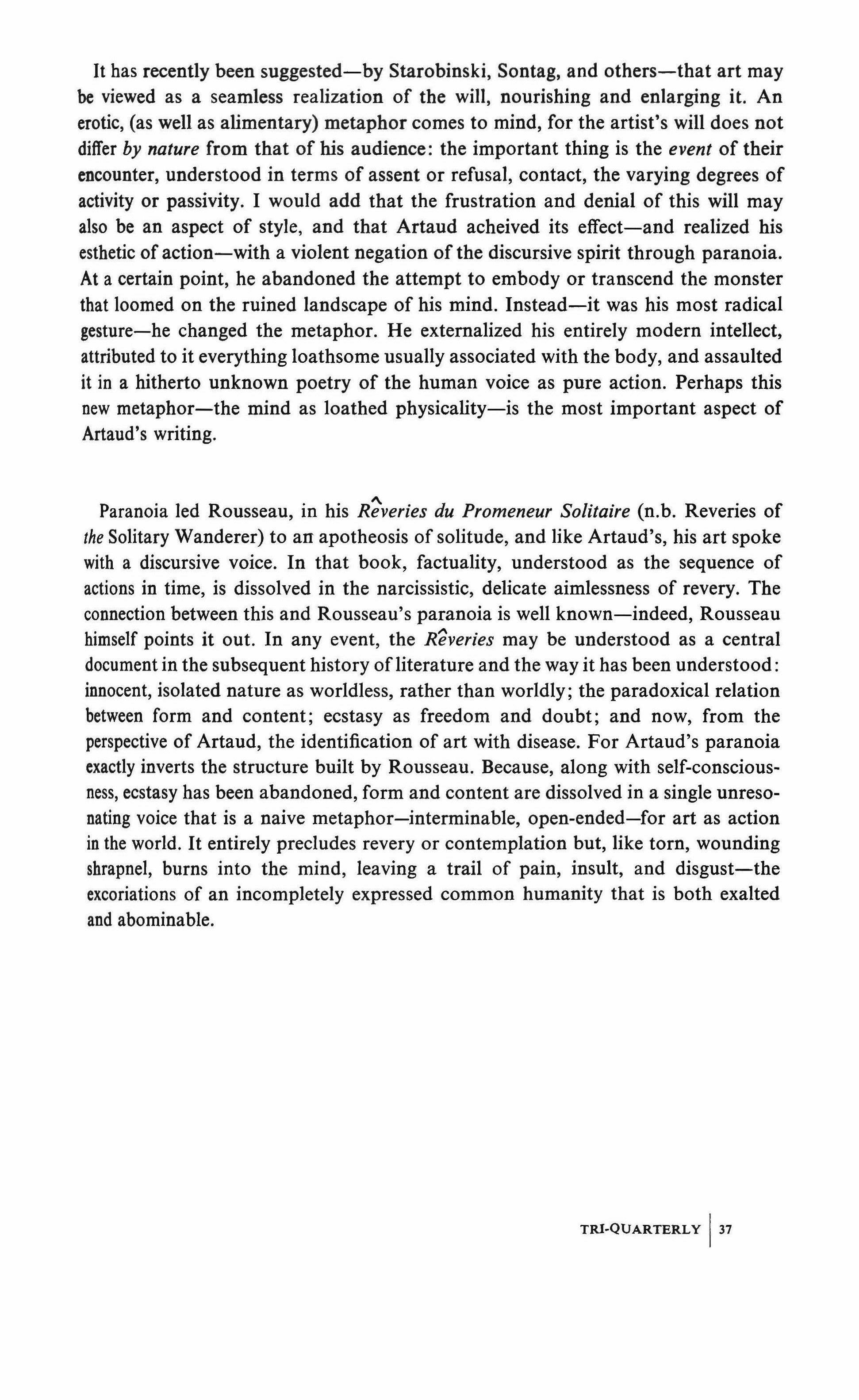
It has recently been suggested-by Starobinski, Sontag, and others-that art may be viewed as a seamless realization of the will, nourishing and enlarging it. An erotic, (as well as alimentary) metaphor comes to mind, for the artist's will does not differ by nature from that of his audience: the important thing is the event of their encounter, understood in terms of assent or refusal, contact, the varying degrees of activity or passivity. I would add that the frustration and denial of this will may also be an aspect of style, and that Artaud acheived its effect-and realized his esthetic of action-with a violent negation of the discursive spirit through paranoia. At a certain point, he abandoned the attempt to embody or transcend the monster that loomed on the ruined landscape of his mind. Instead-it was his most radical gesture-he changed the metaphor. He externalized his entirely modern intellect, attributed to it everything loathsome usually associated with the body, and assaulted it in a hitherto unknown poetry of the human voice as pure action. Perhaps this new metaphor-the mind as loathed physicality-is the most important aspect of Artaud's writing.
Paranoia led Rousseau, in his R�eries du Promeneur Solitaire (n.b. Reveries of the Solitary Wanderer) to an apotheosis of solitude, and like Artaud's, his art spoke with a discursive voice. In that book, factuality, understood as the sequence of actions in time, is dissolved in the narcissistic, delicate aimlessness of revery. The connection between this and Rousseau's paranoia is well known-indeed, Rousseau himself points it out. In any event, the R'everies may be understood as a central document in the subsequent history ofliterature and the way it has been understood: innocent, isolated nature as worldless, rather than worldly; the paradoxical relation between form and content; ecstasy as freedom and doubt; and now, from the perspective of Artaud, the identification of art with disease. For Artaud's paranoia exactly inverts the structure built by Rousseau. Because, along with self-consciousness, ecstasy has been abandoned, form and content are dissolved in a single unresonating voice that is a naive metaphor-interminable, open-ended-for art as action in the world. It entirely precludes revery or contemplation but, like torn, wounding shrapnel, burns into the mind, leaving a trail of pain, insult, and disgust-the excoriations of an incompletely expressed common humanity that is both exalted and abominable.
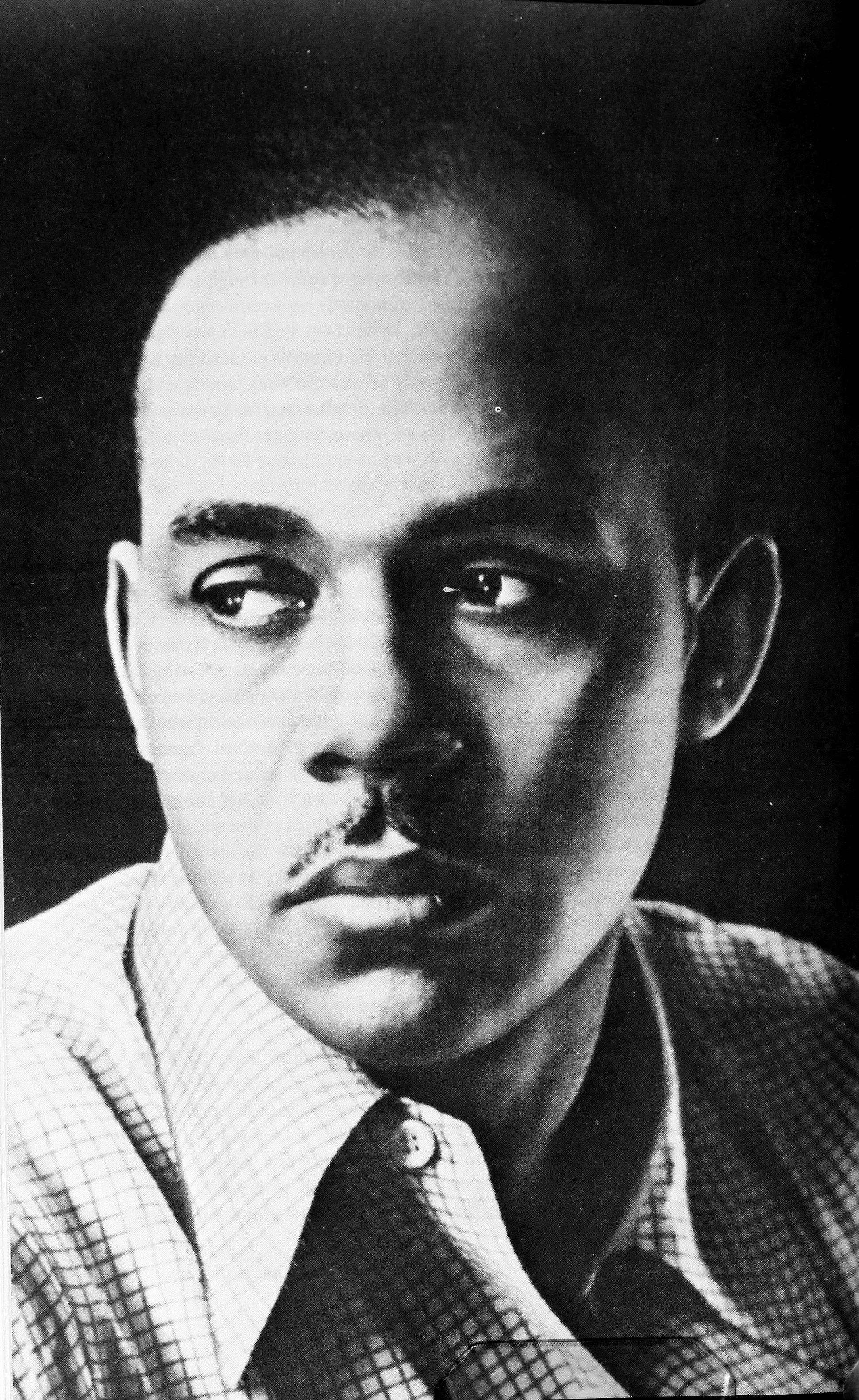
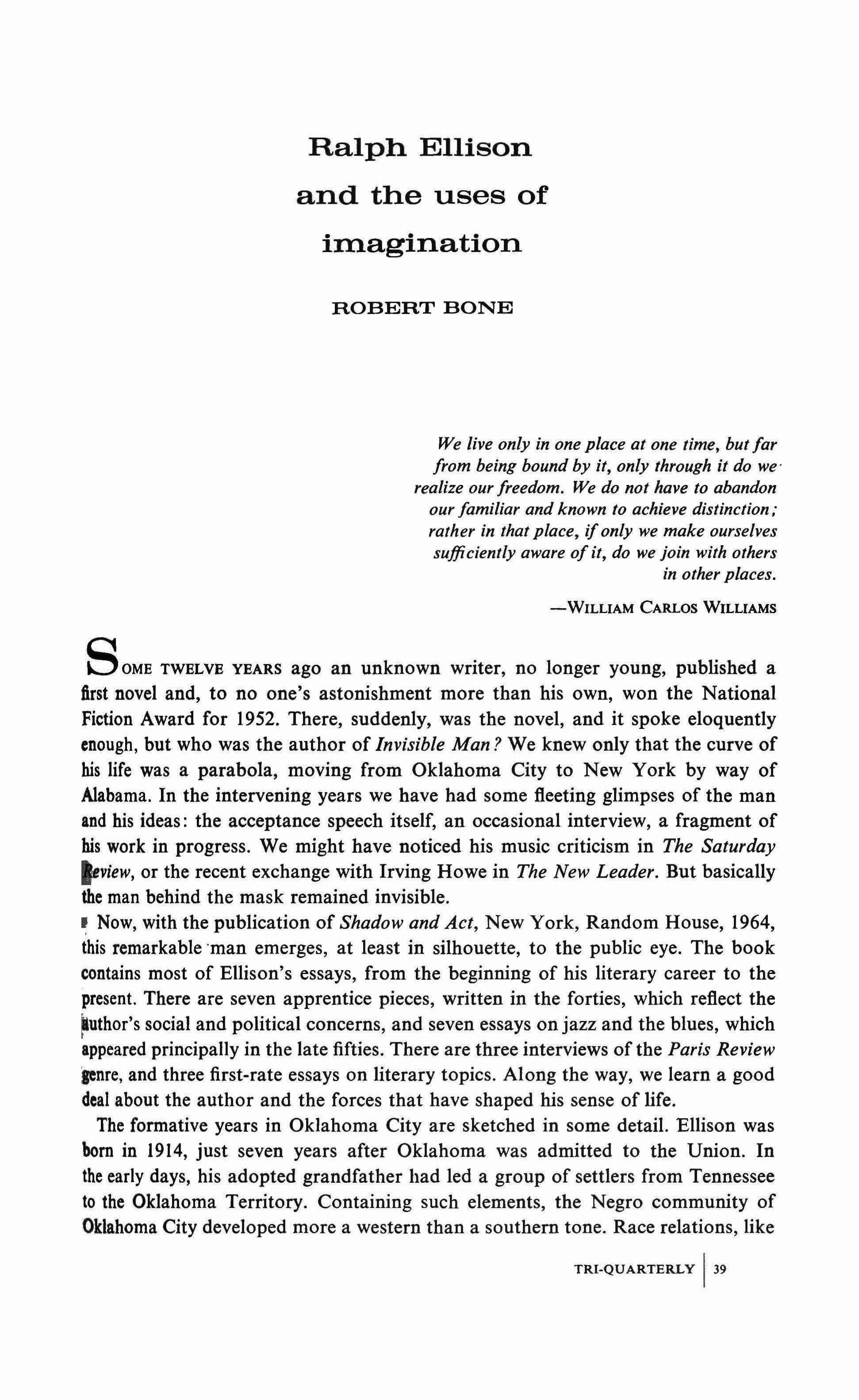
We live only in one place at one time, but far from being bound by it, only through it do we' realize our freedom. We do not have to abandon our familiar and known to achieve distinction; rather in that place, ifonly we make ourselves sufficiently aware ofit, do we join with others in other places.
-WILLIAM CARLOS WILLIAMSTWELVE YEARS ago an unknown writer, no longer young, published a first novel and, to no one's astonishment more than his own, won the National Fiction Award for 1952. There, suddenly, was the novel, and it spoke eloquently enough, but who was the author of Invisible Man? We knew only that the curve of his life was a parabola, moving from Oklahoma City to New York by way of Alabama. In the intervening years we have had some fleeting glimpses of the man and his ideas: the acceptance speech itself, an occasional interview, a fragment of his work in progress. We might have noticed his music criticism in The Saturday leview, or the recent exchange with Irving Howe in The New Leader. But basically the man behind the mask remained invisible
• Now, with the publication of Shadow and Act, New York, Random House, 1964, this remarkable 'man emerges, at least in silhouette, to the public eye. The book contains most of Ellison's essays, from the beginning of his literary career to the present. There are seven apprentice pieces, written in the forties, which reflect the �uthor's social and political concerns, and seven essays on jazz and the blues, which appeared principally in the late fifties. There are three interviews of the Paris Review pnre, and three first-rate essays on literary topics. Along the way, we learn a good deal about the author and the forces that have shaped his sense of life. The formative years in Oklahoma City are sketched in some detail. Ellison was born in 1914, just seven years after Oklahoma was admitted to the Union. In the early days, his adopted grandfather had led a group of settlers from Tennessee to the Oklahoma Territory. Containing such elements, the Negro community of Oklahoma City developed more a western than a southern tone. Race relations, like
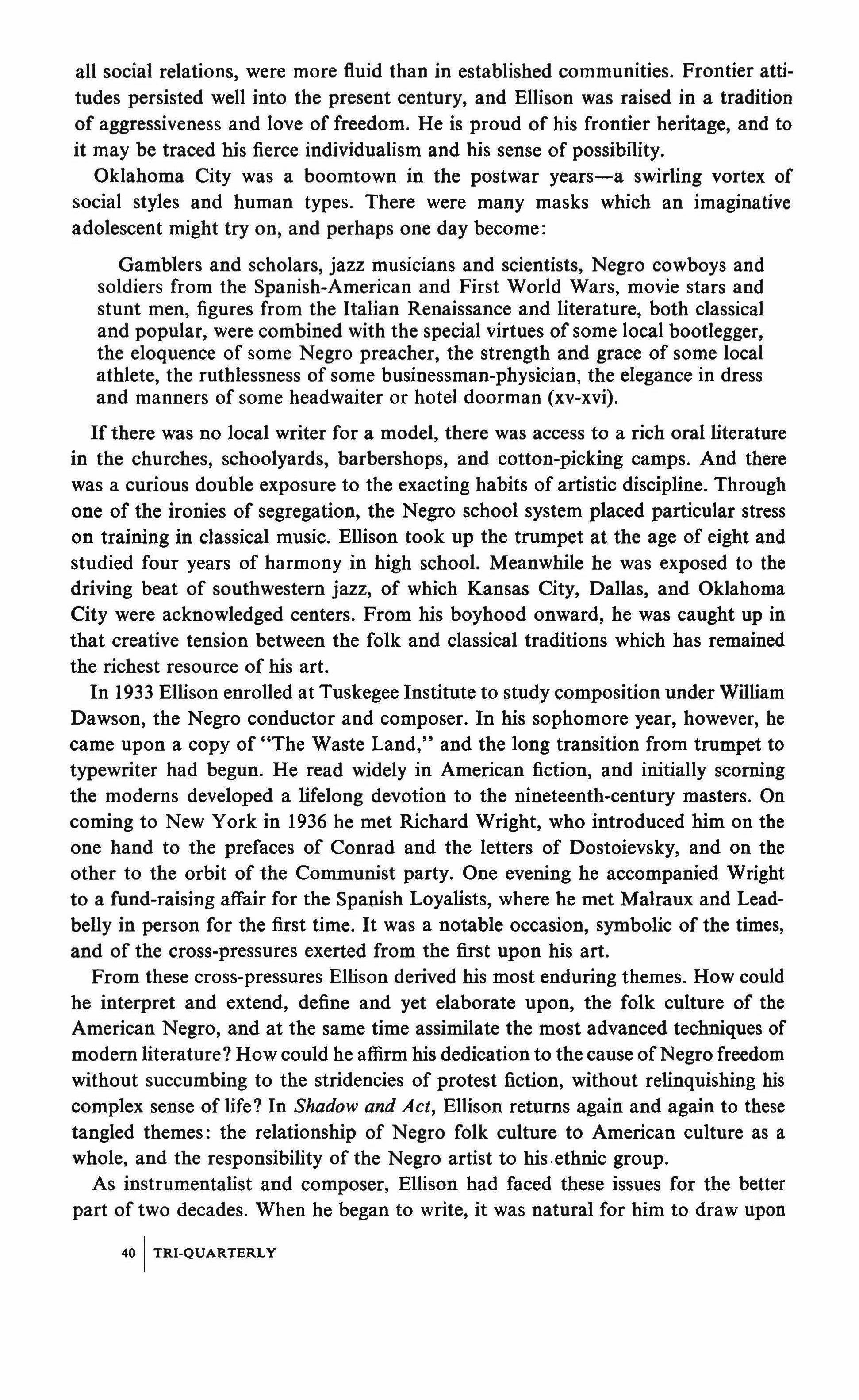
all social relations, were more fluid than in established communities. Frontier attitudes persisted well into the present century, and Ellison was raised in a tradition of aggressiveness and love of freedom. He is proud of his frontier heritage, and to it may be traced his fierce individualism and his sense of possibility.
Oklahoma City was a boomtown in the postwar years-a swirling vortex of social styles and human types. There were many masks which an imaginative adolescent might tryon, and perhaps one day become:
Gamblers and scholars, jazz musicians and scientists, Negro cowboys and soldiers from the Spanish-American and First World Wars, movie stars and stunt men, figures from the Italian Renaissance and literature, both classical and popular, were combined with the special virtues of some local bootlegger, the eloquence of some Negro preacher, the strength and grace of some local athlete, the ruthlessness of some businessman-physician, the elegance in dress and manners of some headwaiter or hotel doorman (xv-xvi),
If there was no local writer for a model, there was access to a rich oral literature in the churches, schoolyards, barbershops, and cotton-picking camps. And there was a curious double exposure to the exacting habits of artistic discipline. Through one of the ironies of segregation, the Negro school system placed particular stress on training in classical music. Ellison took up the trumpet at the age of eight and studied four years of harmony in high school. Meanwhile he was exposed to the driving beat of southwestern jazz, of which Kansas City, Dallas, and Oklahoma City were acknowledged centers. From his boyhood onward, he was caught up in that creative tension between the folk and classical traditions which has remained the richest resource of his art.
In 1933 Ellison enrolled at Tuskegee Institute to study composition under William Dawson, the Negro conductor and composer. In his sophomore year, however, he came upon a copy of "The Waste Land," and the long transition from trumpet to typewriter had begun. He read widely in American fiction, and initially scorning the modems developed a lifelong devotion to the nineteenth-century masters. On coming to New York in 1936 he met Richard Wright, who introduced him on the one hand to the prefaces of Conrad and the letters of Dostoievsky, and on the other to the orbit of the Communist party. One evening he accompanied Wright to a fund-raising affair for the Spanish Loyalists, where he met Malraux and Leadbelly in person for the first time. It was a notable occasion, symbolic of the times, and of the cross-pressures exerted from the first upon his art.
From these cross-pressures Ellison derived his most enduring themes. How could he interpret and extend, define and yet elaborate upon, the folk culture of the American Negro, and at the same time assimilate the most advanced techniques of modem literature? How could he affirm his dedication to the cause ofNegro freedom without succumbing to the stridencies of protest fiction, without relinquishing his complex sense of life? In Shadow and Act, Ellison returns again and again to these tangled themes: the relationship of Negro folk culture to American culture as a whole, and the responsibility of the Negro artist to his.ethnic group.
As instrumentalist and composer, Ellison had faced these issues for the better part of two decades. When he began to write, it was natural for him to draw upon
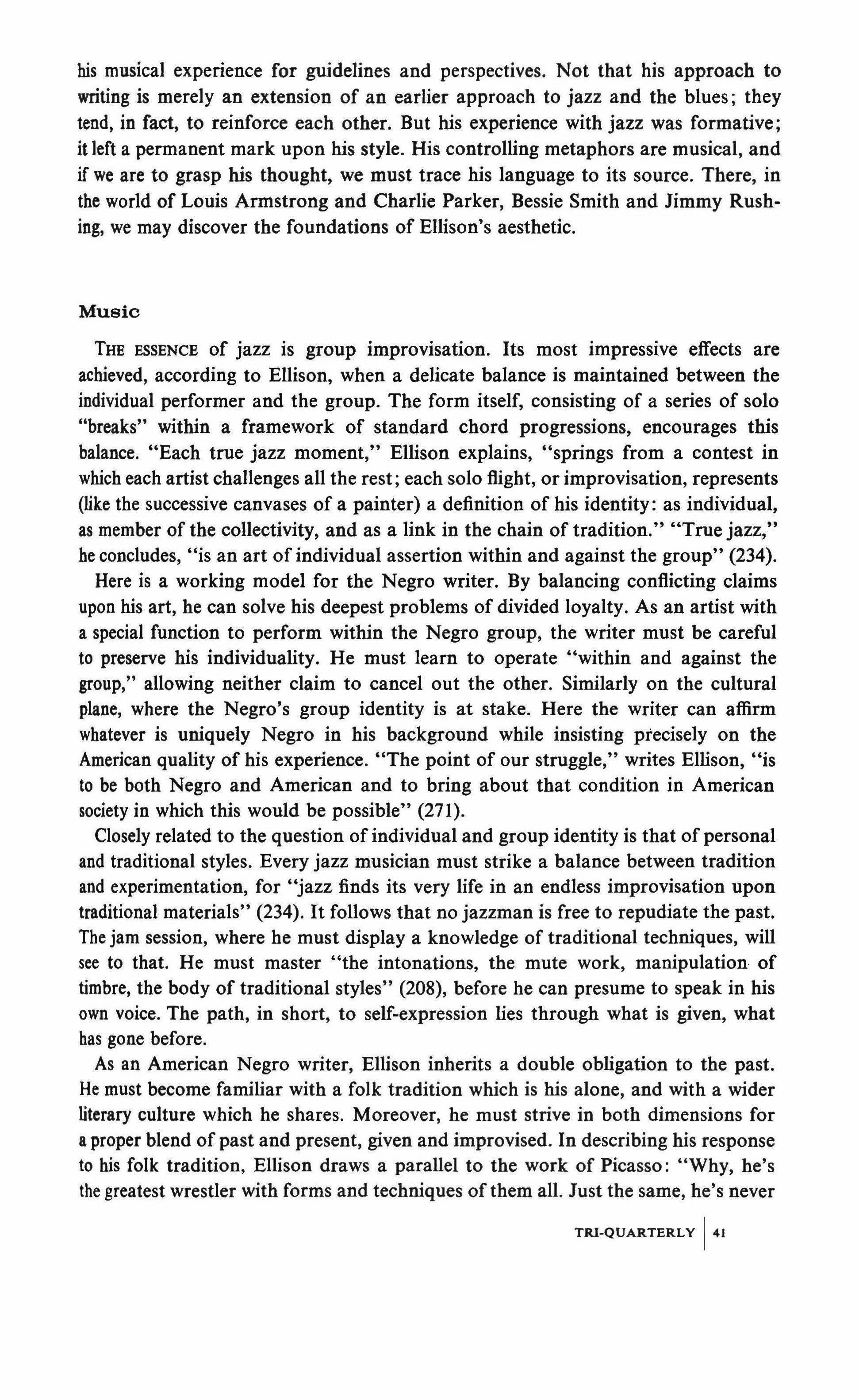
his musical experience for guidelines and perspectives. Not that his approach to writing is merely an extension of an earlier approach to jazz and the blues; they tend, in fact, to reinforce each other. But his experience with jazz was formative; it left a permanent mark upon his style. His controlling metaphors are musical, and if we are to grasp his thought, we must trace his language to its source. There, in the world of Louis Armstrong and Charlie Parker, Bessie Smith and Jimmy Rushing, we may discover the foundations of Ellison's aesthetic.
THE ESSENCE of jazz is group improvisation. Its most impressive effects are achieved, according to Ellison, when a delicate balance is maintained between the individual performer and the group. The form itself, consisting of a series of solo "breaks" within a framework of standard chord progressions, encourages this balance. "Each true jazz moment," Ellison explains, "springs from a contest in which each artist challenges all the rest; each solo flight, or improvisation, represents (like the successive canvases of a painter) a definition of his identity: as individual, as member of the collectivity, and as a link in the chain of tradition." "True jazz," he concludes, "is an art of individual assertion within and against the group" (234). Here is a working model for the Negro writer. By balancing conflicting claims upon his art, he can solve his deepest problems of divided loyalty. As an artist with a special function to perform within the Negro group, the writer must be careful to preserve his individuality. He must learn to operate "within and against the group," allowing neither claim to cancel out the other. Similarly on the cultural plane, where the Negro's group identity is at stake. Here the writer can affirm whatever is uniquely Negro in his background while insisting precisely on the American quality of his experience. "The point of our struggle," writes Ellison, "is to be both Negro and American and to bring about that condition in American society in which this would be possible" (271).
Closely related to the question of individual and group identity is that of personal and traditional styles. Every jazz musician must strike a balance between tradition and experimentation, for "jazz finds its very life in an endless improvisation upon traditional materials" (234). It follows that no jazzman is free to repudiate the past. The jam session, where he must display a knowledge of traditional techniques, will see to that. He must master "the intonations, the mute work, manipulation of timbre, the body of traditional styles" (208), before he can presume to speak in his own voice. The path, in short, to self-expression lies through what is given, what has gone before.
As an American Negro writer, Ellison inherits a double obligation to the past. He must become familiar with a folk tradition which is his alone, and with a wider literary culture which he shares. Moreover, he must strive in both dimensions for a proper blend of past and present, given and improvised. In describing his response to his folk tradition, Ellison draws a parallel to the work of Picasso: "Why, he's the greatest wrestler with forms and techniques of them all. Just the same, he's never
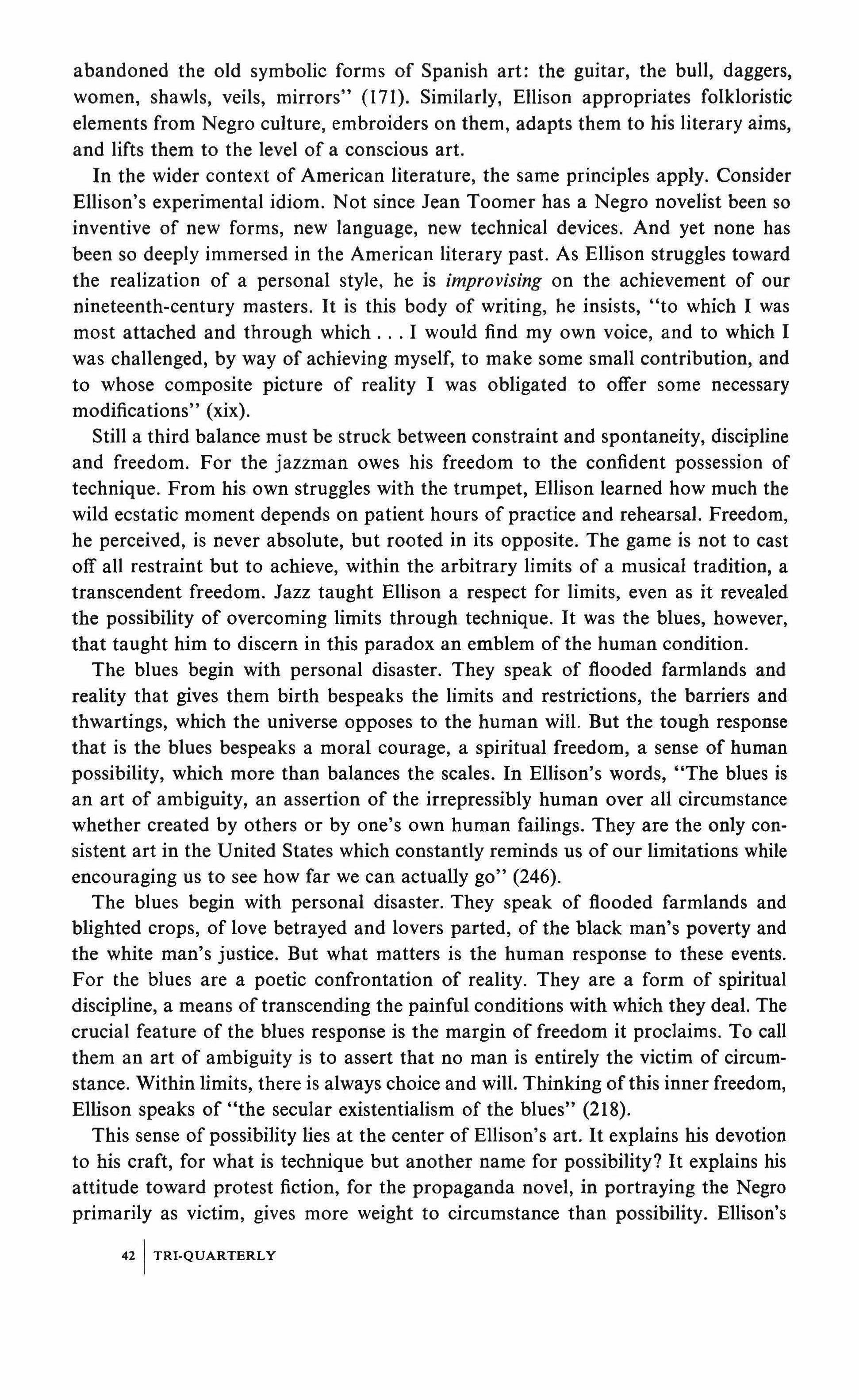
abandoned the old symbolic forms of Spanish art: the guitar, the bull, daggers, women, shawls, veils, mirrors" (171). Similarly, Ellison appropriates folkloristic elements from Negro culture, embroiders on them, adapts them to his literary aims, and lifts them to the level of a conscious art.
In the wider context of American literature, the same principles apply. Consider Ellison's experimental idiom. Not since Jean Toomer has a Negro novelist been so inventive of new forms, new language, new technical devices. And yet none has been so deeply immersed in the American literary past. As Ellison struggles toward the realization of a personal style, he is improvising on the achievement of our nineteenth-century masters. It is this body of writing, he insists, "to which I was most attached and through which I would find my own voice, and to which I was challenged, by way of achieving myself, to make some small contribution, and to whose composite picture of reality I was obligated to offer some necessary modifications" (xix).
Still a third balance must be struck between constraint and spontaneity, discipline and freedom. For the jazzman owes his freedom to the confident possession of technique. From his own struggles with the trumpet, Ellison learned how much the wild ecstatic moment depends on patient hours of practice and rehearsal. Freedom, he perceived, is never absolute, but rooted in its opposite. The game is not to cast off all restraint but to achieve, within the arbitrary limits of a musical tradition, a transcendent freedom. Jazz taught Ellison a respect for limits, even as it revealed the possibility of overcoming limits through technique. It was the blues, however, that taught him to discern in this paradox an emblem of the human condition.
The blues begin with personal disaster. They speak of flooded farmlands and reality that gives them birth bespeaks the limits and restrictions, the barriers and thwartings, which the universe opposes to the human will. But the tough response that is the blues bespeaks a moral courage, a spiritual freedom, a sense of human possibility, which more than balances the scales. In Ellison's words, "The blues is an art of ambiguity, an assertion of the irrepressibly human over all circumstance whether created by others or by one's own human failings. They are the only consistent art in the United States which constantly reminds us of our limitations while encouraging us to see how far we can actually go" (246).
The blues begin with personal disaster. They speak of flooded farmlands and blighted crops, of love betrayed and lovers parted, of the black man's poverty and the white man's justice. But what matters is the human response to these events. For the blues are a poetic confrontation of reality. They are a form of spiritual discipline, a means of transcending the painful conditions with which they deal. The crucial feature of the blues response is the margin of freedom it proclaims. To call them an art of ambiguity is to assert that no man is entirely the victim of circumstance. Within limits, there is always choice and will. Thinking of this inner freedom, Ellison speaks of "the secular existentialism of the blues" (218).
This sense of possibility lies at the center of Ellison's art. It explains his devotion to his craft, for what is technique but another name for possibility? It explains his attitude toward protest fiction, for the propaganda novel, in portraying the Negro primarily as victim, gives more weight to circumstance than possibility. Ellison's
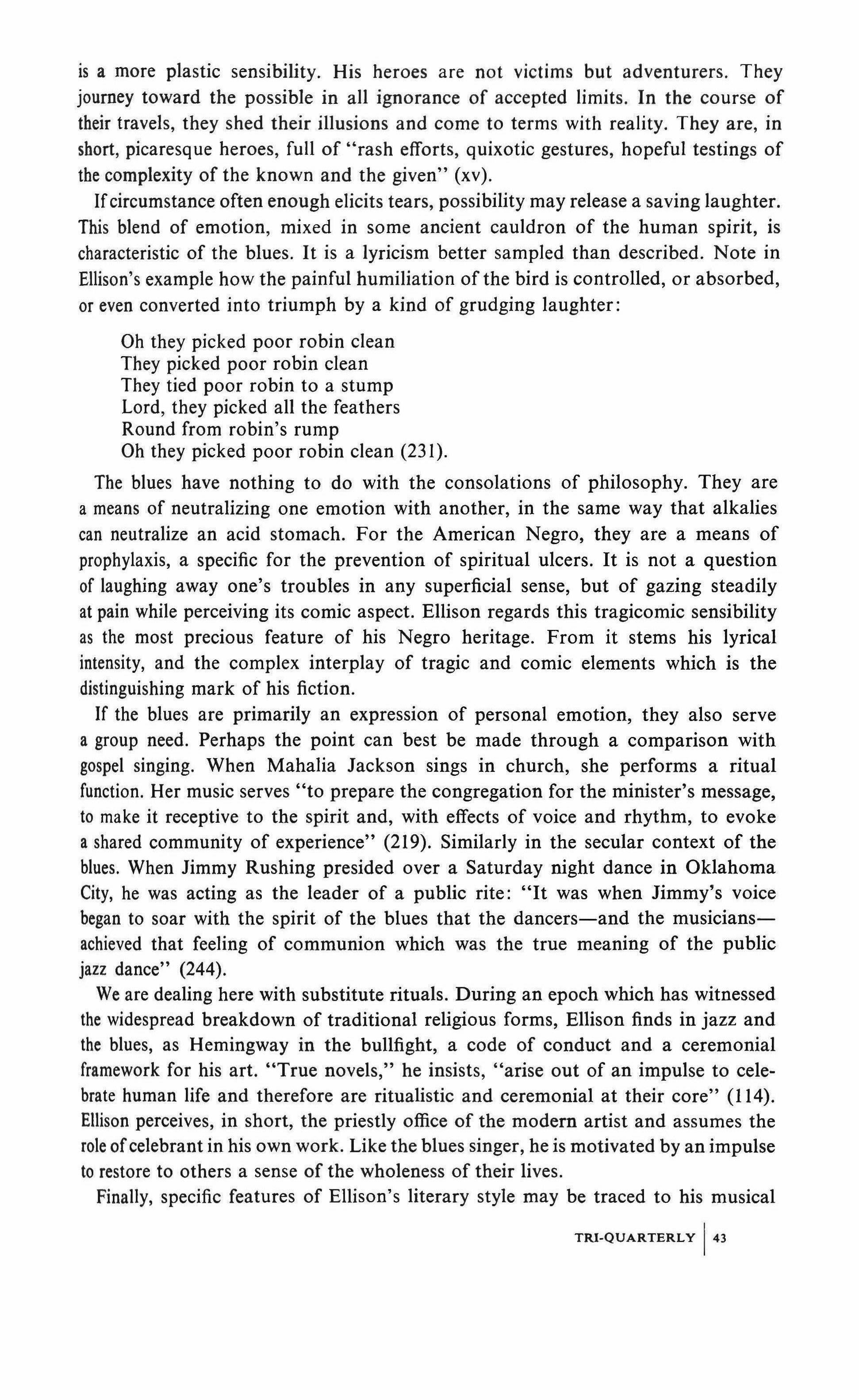
is a more plastic sensibility. His heroes are not victims but adventurers. They journey toward the possible in all ignorance of accepted limits. In the course of their travels, they shed their illusions and come to terms with reality. They are, in short, picaresque heroes, full of "rash efforts, quixotic gestures, hopeful testings of the complexity of the known and the given" (xv).
Ifcircumstance often enough elicits tears, possibility may release a saving laughter. This blend of emotion, mixed in some ancient cauldron of the human spirit, is characteristic of the blues. It is a lyricism better sampled than described. Note in Ellison's example how the painful humiliation of the bird is controlled, or absorbed, or even converted into triumph by a kind of grudging laughter:
Oh they picked poor robin clean
They picked poor robin clean
They tied poor robin to a stump
Lord, they picked all the feathers
Round from robin's rump
Oh they picked poor robin clean (231).
The blues have nothing to do with the consolations of philosophy. They are a means of neutralizing one emotion with another, in the same way that alkalies can neutralize an acid stomach. For the American Negro, they are a means of prophylaxis, a specific for the prevention of spiritual ulcers. It is not a question of laughing away one's troubles in any superficial sense, but of gazing steadily at pain while perceiving its comic aspect. Ellison regards this tragicomic sensibility as the most precious feature of his Negro heritage. From it stems his lyrical intensity, and the complex interplay of tragic and comic elements which is the distinguishing mark of his fiction.
If the blues are primarily an expression of personal emotion, they also serve a group need. Perhaps the point can best be made through a comparison with gospel singing. When Mahalia Jackson sings in church, she performs a ritual function. Her music serves "to prepare the congregation for the minister's message, to make it receptive to the spirit and, with effects of voice and rhythm, to evoke a shared community of experience" (219). Similarly in the secular context of the blues. When Jimmy Rushing presided over a Saturday night dance in Oklahoma City, he was acting as the leader of a public rite: "It was when Jimmy's voice began to soar with the spirit of the blues that the dancers-and the musiciansachieved that feeling of communion which was the true meaning of the public jazz dance" (244).
We are dealing here with substitute rituals. During an epoch which has witnessed the widespread breakdown of traditional religious forms, Ellison finds in jazz and the blues, as Hemingway in the bullfight, a code of conduct and a ceremonial framework for his art. "True novels," he insists, "arise out of an impulse to celebrate human life and therefore are ritualistic and ceremonial at their core" (114). Ellison perceives, in short, the priestly office of the modem artist and assumes the role ofcelebrant in his own work. Like the blues singer, he is motivated by an impulse to restore to others a sense of the wholeness of their lives.
Finally, specific features of Ellison's literary style may be traced to his musical
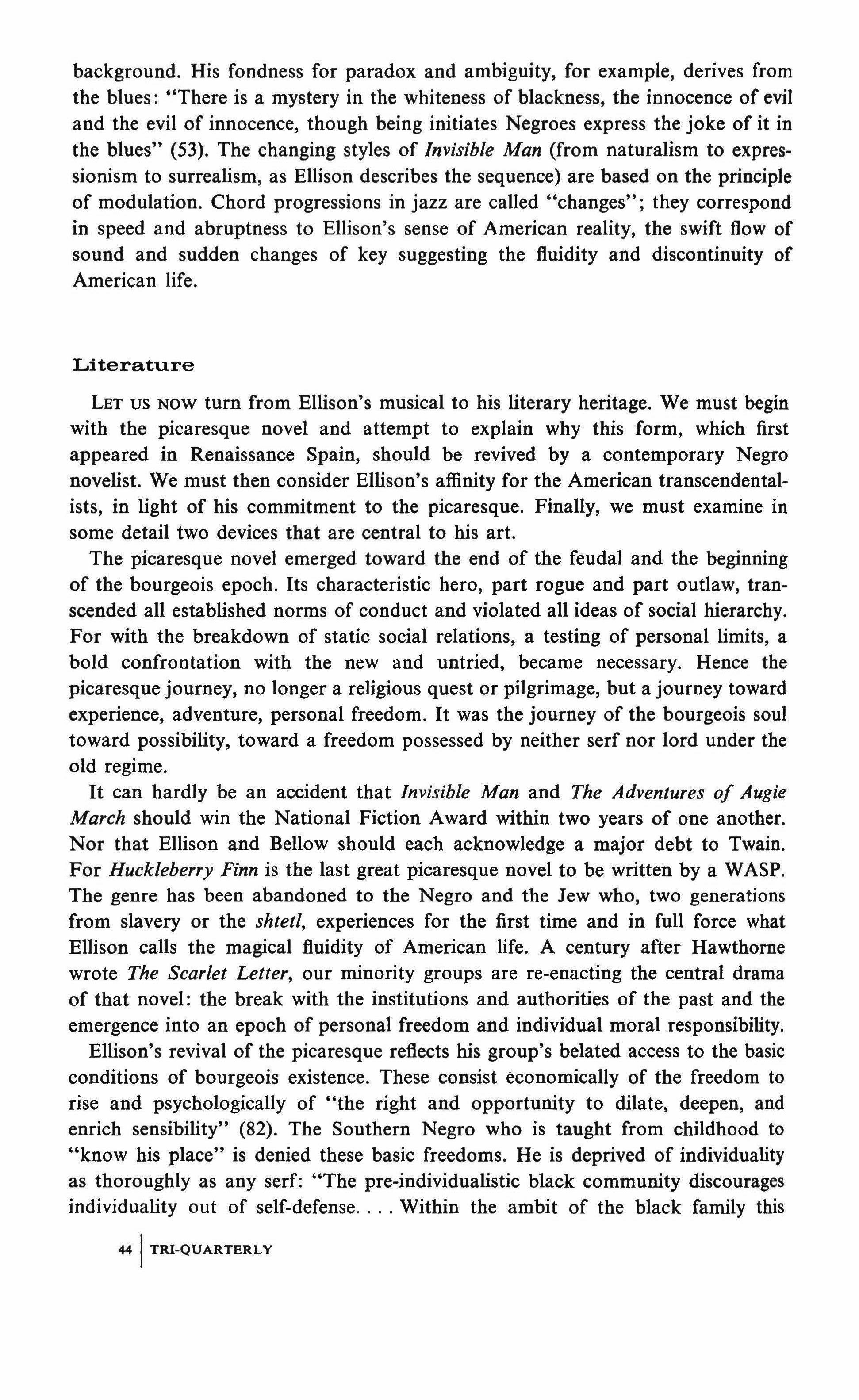
background. His fondness for paradox and ambiguity, for example, derives from the blues: "There is a mystery in the whiteness of blackness, the innocence of evil and the evil of innocence, though being initiates Negroes express the joke of it in the blues" (53). The changing styles of Invisible Man (from naturalism to expressionism to surrealism, as Ellison describes the sequence) are based on the principle of modulation. Chord progressions in jazz are called "changes"; they correspond in speed and abruptness to Ellison's sense of American reality, the swift flow of sound and sudden changes of key suggesting the fluidity and discontinuity of American life.
LET US NOW turn from Ellison's musical to his literary heritage. We must begin with the picaresque novel and attempt to explain why this form, which first appeared in Renaissance Spain, should be revived by a contemporary Negro novelist. We must then consider Ellison's affinity for the American transcendentalists, in light of his commitment to the picaresque. Finally, we must examine in some detail two devices that are central to his art.
The picaresque novel emerged toward the end of the feudal and the beginning of the bourgeois epoch. Its characteristic hero, part rogue and part outlaw, transcended all established norms of conduct and violated all ideas of social hierarchy. For with the breakdown of static social relations, a testing of personal limits, a bold confrontation with the new and untried, became necessary. Hence the picaresque journey, no longer a religious quest or pilgrimage, but a journey toward experience, adventure, personal freedom. It was the journey of the bourgeois soul toward possibility, toward a freedom possessed by neither serf nor lord under the old regime.
It can hardly be an accident that Invisible Man and The Adventures of Augie March should win the National Fiction Award within two years of one another. Nor that Ellison and Bellow should each acknowledge a major debt to Twain. For Huckleberry Finn is the last great picaresque novel to be written by a WASP. The genre has been abandoned to the Negro and the Jew who, two generations from slavery or the shtetl, experiences for the first time and in full force what Ellison calls the magical fluidity of American life. A century after Hawthorne wrote The Scarlet Letter, our minority groups are re-enacting the central drama of that novel: the break with the institutions and authorities of the past and the emergence into an epoch of personal freedom and individual moral responsibility. Ellison's revival of the picaresque reflects his group's belated access to the basic conditions of bourgeois existence. These consist economically of the freedom to rise and psychologically of "the right and opportunity to dilate, deepen, and enrich sensibility" (82). The Southern Negro who is taught from childhood to "know his place" is denied these basic freedoms. He is deprived of individuality as thoroughly as any serf: "The pre-individualistic black community discourages individuality out of self-defense Within the ambit of the black family this
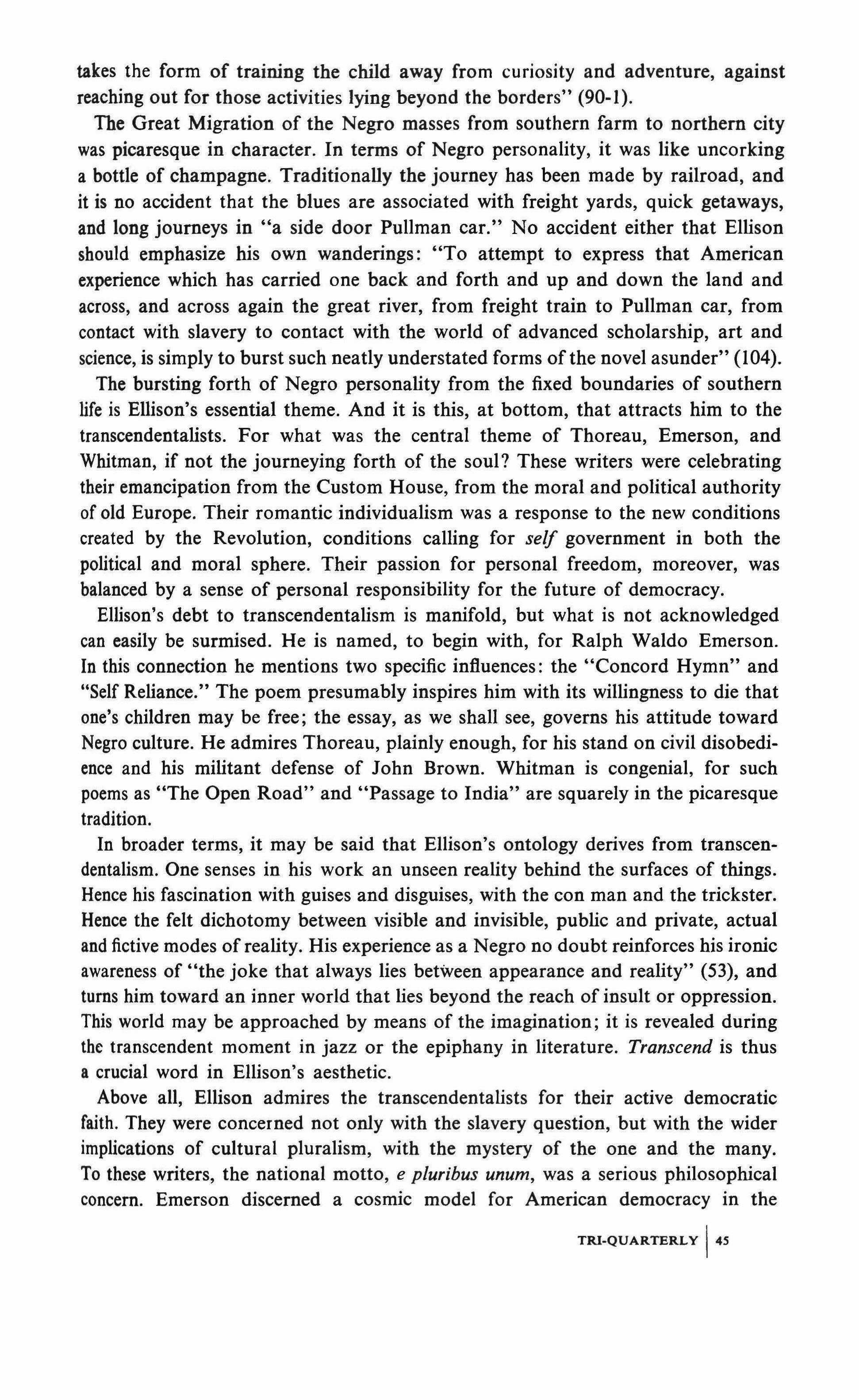
takes the form of training the child away from curiosity and adventure, against reaching out for those activities lying beyond the borders" (90-1).
The Great Migration of the Negro masses from southern farm to northern city was picaresque in character. In terms of Negro personality, it was like uncorking a bottle of champagne. Traditionally the journey has been made by railroad, and it is no accident that the blues are associated with freight yards, quick getaways, and long journeys in "a side door Pullman car." No accident either that Ellison should emphasize his own wanderings: "To attempt to express that American experience which has carried one back and forth and up and down the land and across, and across again the great river, from freight train to Pullman car, from contact with slavery to contact with the world of advanced scholarship, art and science, is simply to burst such neatly understated forms of the novel asunder" (104).
The bursting forth of Negro personality from the fixed boundaries of southern life is Ellison's essential theme. And it is this, at bottom, that attracts him to the transcendentalists. For what was the central theme of Thoreau, Emerson, and Whitman, if not the journeying forth of the soul? These writers were celebrating their emancipation from the Custom House, from the moral and political authority of old Europe. Their romantic individualism was a response to the new conditions created by the Revolution, conditions calling for self government in both the political and moral sphere. Their passion for personal freedom, moreover, was balanced by a sense of personal responsibility for the future of democracy.
Ellison's debt to transcendentalism is manifold, but what is not acknowledged can easily be surmised. He is named, to begin with, for Ralph Waldo Emerson. In this connection he mentions two specific influences: the "Concord Hymn" and "Self Reliance." The poem presumably inspires him with its willingness to die that one's children may be free; the essay, as we shall see, governs his attitude toward Negro culture. He admires Thoreau, plainly enough, for his stand on civil disobedience and his militant defense of John Brown. Whitman is congenial, for such poems as "The Open Road" and "Passage to India" are squarely in the picaresque tradition.
In broader terms, it may be said that Ellison's ontology derives from transcendentalism. One senses in his work an unseen reality behind the surfaces of things. Hence his fascination with guises and disguises, with the con man and the trickster. Hence the felt dichotomy between visible and invisible, public and private, actual and fictive modes of reality. His experience as a Negro no doubt reinforces his ironic awareness of "the joke that always lies between appearance and reality" (53), and turns him toward an inner world that lies beyond the reach of insult or oppression. This world may be approached by means of the imagination; it is revealed during the transcendent moment in jazz or the epiphany in literature. Transcend is thus a crucial word in Ellison's aesthetic.
Above all, Ellison admires the transcendentalists for their active democratic faith. They were concerned not only with the slavery question, but with the wider implications of cultural pluralism, with the mystery of the one and the many. To these writers, the national motto, e pluribus unum, was a serious philosophical concern. Emerson discerned a cosmic model for American democracy in the
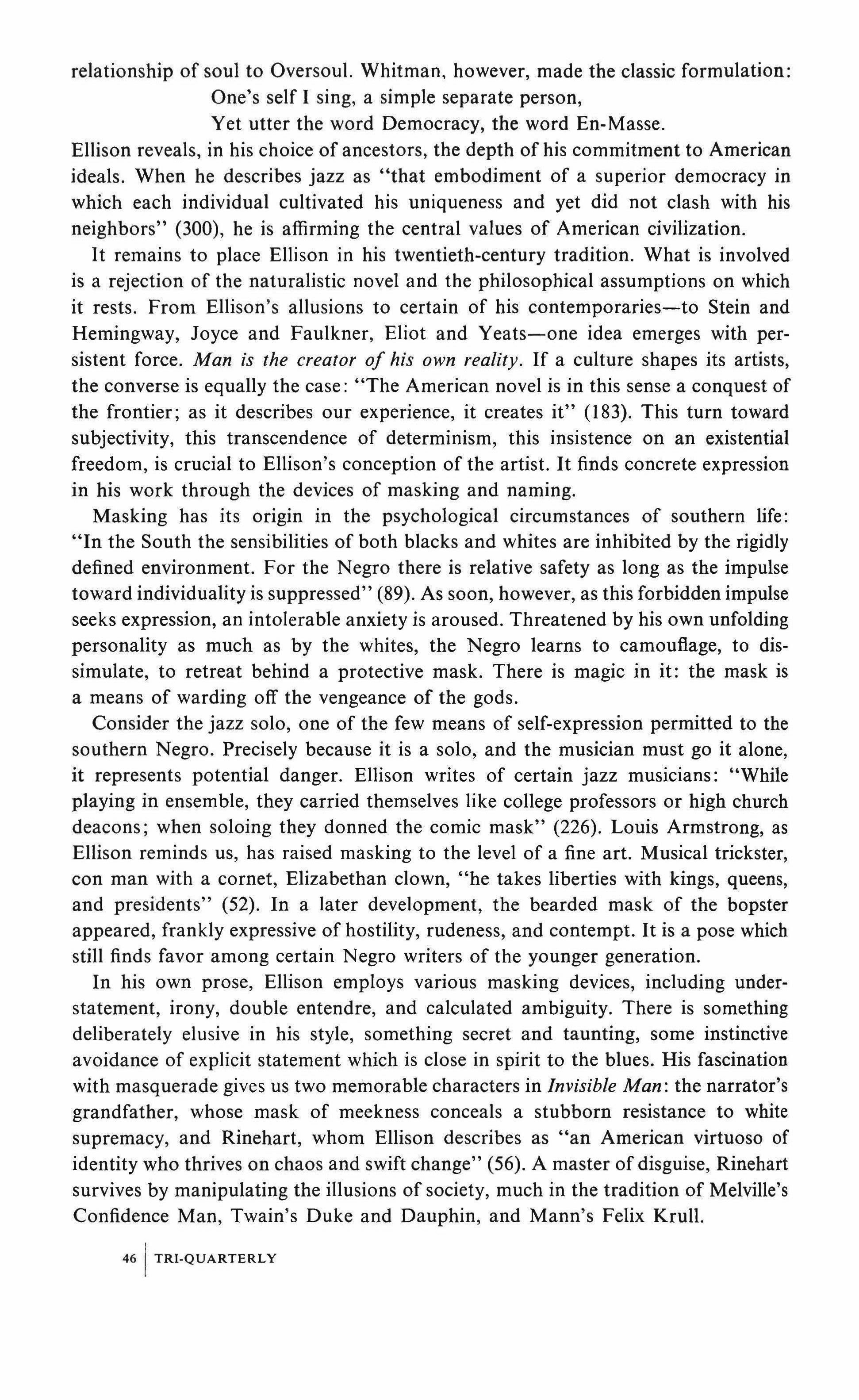
relationship of soul to Oversoul. Whitman, however, made the classic formulation: One's self I sing, a simple separate person, Yet utter the word Democracy, the word En-Masse. Ellison reveals, in his choice of ancestors, the depth of his commitment to American ideals. When he describes jazz as "that embodiment of a superior democracy in which each individual cultivated his uniqueness and yet did not clash with his neighbors" (300), he is affirming the central values of American civilization. It remains to place Ellison in his twentieth-century tradition. What is involved is a rejection of the naturalistic novel and the philosophical assumptions on which it rests. From Ellison's allusions to certain of his contemporaries-to Stein and Hemingway, Joyce and Faulkner, Eliot and Yeats-one idea emerges with persistent force. Man is the creator of his own reality. If a culture shapes its artists, the converse is equally the case: "The American novel is in this sense a conquest of the frontier; as it describes our experience, it creates it" (183). This turn toward subjectivity, this transcendence of determinism, this insistence on an existential freedom, is crucial to Ellison's conception of the artist. It finds concrete expression in his work through the devices of masking and naming.
Masking has its origin in the psychological circumstances of southern life: "In the South the sensibilities of both blacks and whites are inhibited by the rigidly defined environment. For the Negro there is relative safety as long as the impulse toward individuality is suppressed" (89). As soon, however, as this forbidden impulse seeks expression, an intolerable anxiety is aroused. Threatened by his own unfolding personality as much as by the whites, the Negro learns to camouflage, to dissimulate, to retreat behind a protective mask. There is magic in it: the mask is a means of warding off the vengeance of the gods.
Consider the jazz solo, one of the few means of self-expression permitted to the southern Negro. Precisely because it is a solo, and the musician must go it alone, it represents potential danger. Ellison writes of certain jazz musicians: "While playing in ensemble, they carried themselves like college professors or high church deacons; when soloing they donned the comic mask" (226). Louis Armstrong, as Ellison reminds us, has raised masking to the level of a fine art. Musical trickster, con man with a cornet, Elizabethan clown, "he takes liberties with kings, queens, and presidents" (52). In a later development, the bearded mask of the bopster appeared, frankly expressive of hostility, rudeness, and contempt. It is a pose which still finds favor among certain Negro writers of the younger generation.
In his own prose, Ellison employs various masking devices, including understatement, irony, double entendre, and calculated ambiguity. There is something deliberately elusive in his style, something secret and taunting, some instinctive avoidance of explicit statement which is close in spirit to the blues. His fascination with masquerade gives us two memorable characters in Invisible Man: the narrator's grandfather, whose mask of meekness conceals a stubborn resistance to white supremacy, and Rinehart, whom Ellison describes as "an American virtuoso of identity who thrives on chaos and swift change" (56). A master of disguise, Rinehart survives by manipulating the illusions of society, much in the tradition of Melville's Confidence Man, Twain's Duke and Dauphin, and Mann's Felix Krull.
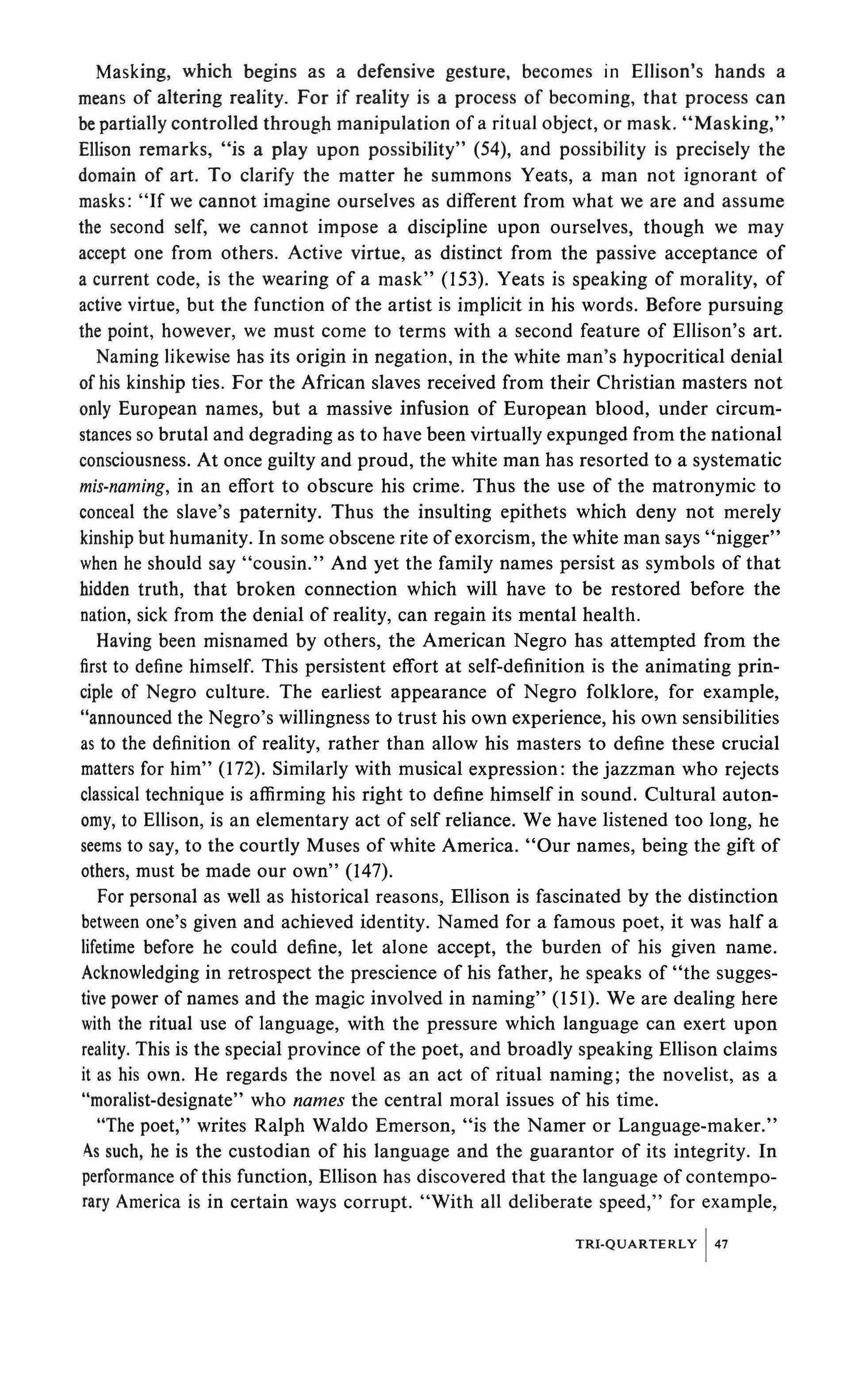
Masking, which begins as a defensive gesture, becomes in Ellison's hands a means of altering reality. For if reality is a process of becoming, that process can be partially controlled through manipulation of a ritual object, or mask. "Masking," Ellison remarks, "is a play upon possibility" (54), and possibility is precisely the domain of art. To clarify the matter he summons Yeats, a man not ignorant of masks: "If we cannot imagine ourselves as different from what we are and assume the second self, we cannot impose a discipline upon ourselves, though we may accept one from others. Active virtue, as distinct from the passive acceptance of a current code, is the wearing of a mask" (153). Yeats is speaking of morality, of active virtue, but the function of the artist is implicit in his words. Before pursuing the point, however, we must come to terms with a second feature of Ellison's art.
Naming likewise has its origin in negation, in the white man's hypocritical denial of his kinship ties. For the African slaves received from their Christian masters not only European names, but a massive infusion of European blood, under circumstances so brutal and degrading as to have been virtually expunged from the national consciousness. At once guilty and proud, the white man has resorted to a systematic mis-naming, in an effort to obscure his crime. Thus the use of the matronymic to conceal the slave's paternity. Thus the insulting epithets which deny not merely kinship but humanity. In some obscene rite of exorcism, the white man says "nigger" when he should say "cousin." And yet the family names persist as symbols of that hidden truth, that broken connection which will have to be restored before the nation, sick from the denial of reality, can regain its mental health.
Having been misnamed by others, the American Negro has attempted from the first to define himself. This persistent effort at self-definition is the animating principle of Negro culture. The earliest appearance of Negro folklore, for example, "announced the Negro's willingness to trust his own experience, his own sensibilities as to the definition of reality, rather than allow his masters to define these crucial matters for him" (172). Similarly with musical expression: the jazzman who rejects classical technique is affirming his right to define himself in sound. Cultural autonomy, to Ellison, is an elementary act of self reliance. We have listened too long, he seems to say, to the courtly Muses of white America. "Our names, being the gift of others, must be made our own" (147).
For personal as well as historical reasons, Ellison is fascinated by the distinction between one's given and achieved identity. Named for a famous poet, it was half a lifetime before he could define, let alone accept, the burden of his given name.
Acknowledging in retrospect the prescience of his father, he speaks of "the suggestive power of names and the magic involved in naming" (151). We are dealing here with the ritual use of language, with the pressure which language can exert upon reality. This is the special province of the poet, and broadly speaking Ellison claims it as his own. He regards the novel as an act of ritual naming; the novelist, as a "moralist-designate" who names the central moral issues of his time.
"The poet," writes Ralph Waldo Emerson, "is the Namer or Language-maker." As such, he is the custodian of his language and the guarantor of its integrity. In performance of this function, Ellison has discovered that the language of contemporary America is in certain ways corrupt. "With all deliberate speed," for example,
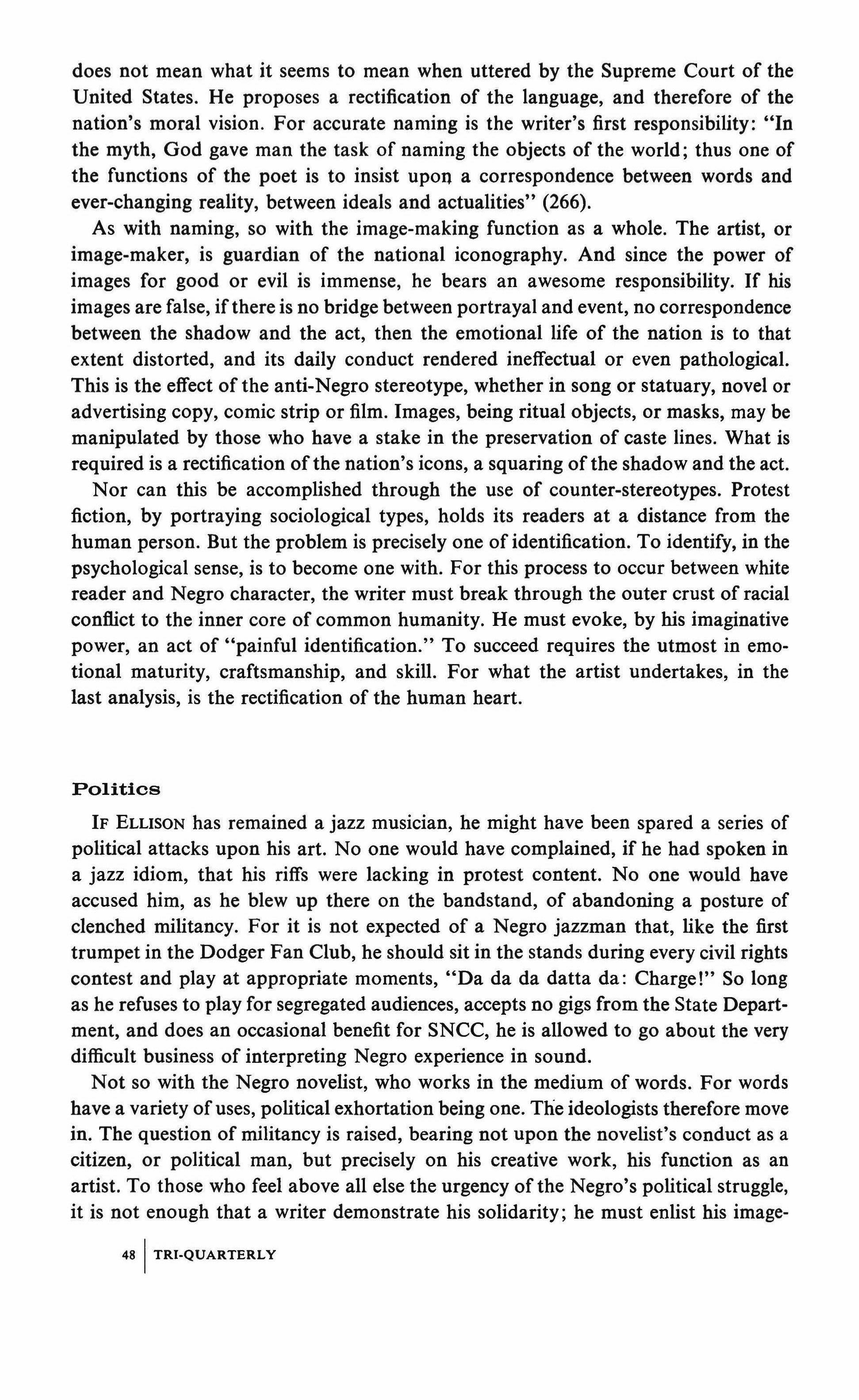
does not mean what it seems to mean when uttered by the Supreme Court of the United States. He proposes a rectification of the language, and therefore of the nation's moral vision. For accurate naming is the writer's first responsibility: "In the myth, God gave man the task of naming the objects of the world; thus one of the functions of the poet is to insist upon a correspondence between words and ever-changing reality, between ideals and actualities" (266).
As with naming, so with the image-making function as a whole. The artist, or image-maker, is guardian of the national iconography. And since the power of images for good or evil is immense, he bears an awesome responsibility. If his images are false, ifthere is no bridge between portrayal and event, no correspondence between the shadow and the act, then the emotional life of the nation is to that extent distorted, and its daily conduct rendered ineffectual or even pathological. This is the effect of the anti-Negro stereotype, whether in song or statuary, novel or advertising copy, comic strip or film. Images, being ritual objects, or masks, may be manipulated by those who have a stake in the preservation of caste lines. What is required is a rectification ofthe nation's icons, a squaring of the shadow and the act.
Nor can this be accomplished through the use of counter-stereotypes. Protest fiction, by portraying sociological types, holds its readers at a distance from the human person. But the problem is precisely one of identification. To identify, in the psychological sense, is to become one with. For this process to occur between white reader and Negro character, the writer must break through the outer crust of racial conflict to the inner core of common humanity. He must evoke, by his imaginative power, an act of "painful identification." To succeed requires the utmost in emotional maturity, craftsmanship, and skill. For what the artist undertakes, in the last analysis, is the rectification of the human heart.
IF ELLISON has remained a jazz musician, he might have been spared a series of political attacks upon his art. No one would have complained, if he had spoken in a jazz idiom, that his riffs were lacking in protest content. No one would have accused him, as he blew up there on the bandstand, of abandoning a posture of clenched militancy. For it is not expected of a Negro jazzman that, like the first trumpet in the Dodger Fan Club, he should sit in the stands during every civil rights contest and play at appropriate moments, "Da da da datta da: Charge!" So long as he refuses to play for segregated audiences, accepts no gigs from the State Department, and does an occasional benefit for SNCC, he is allowed to go about the very difficult business of interpreting Negro experience in sound.
Not so with the Negro novelist, who works in the medium of words. For words have a variety of uses, political exhortation being one. The ideologists therefore move in. The question of militancy is raised, bearing not upon the novelist's conduct as a citizen, or political man, but precisely on his creative work, his function as an artist. To those who feel above all else the urgency of the Negro's political struggle, it is not enough that a writer demonstrate his solidarity; he must enlist his image481 TRI-QUARTERLY
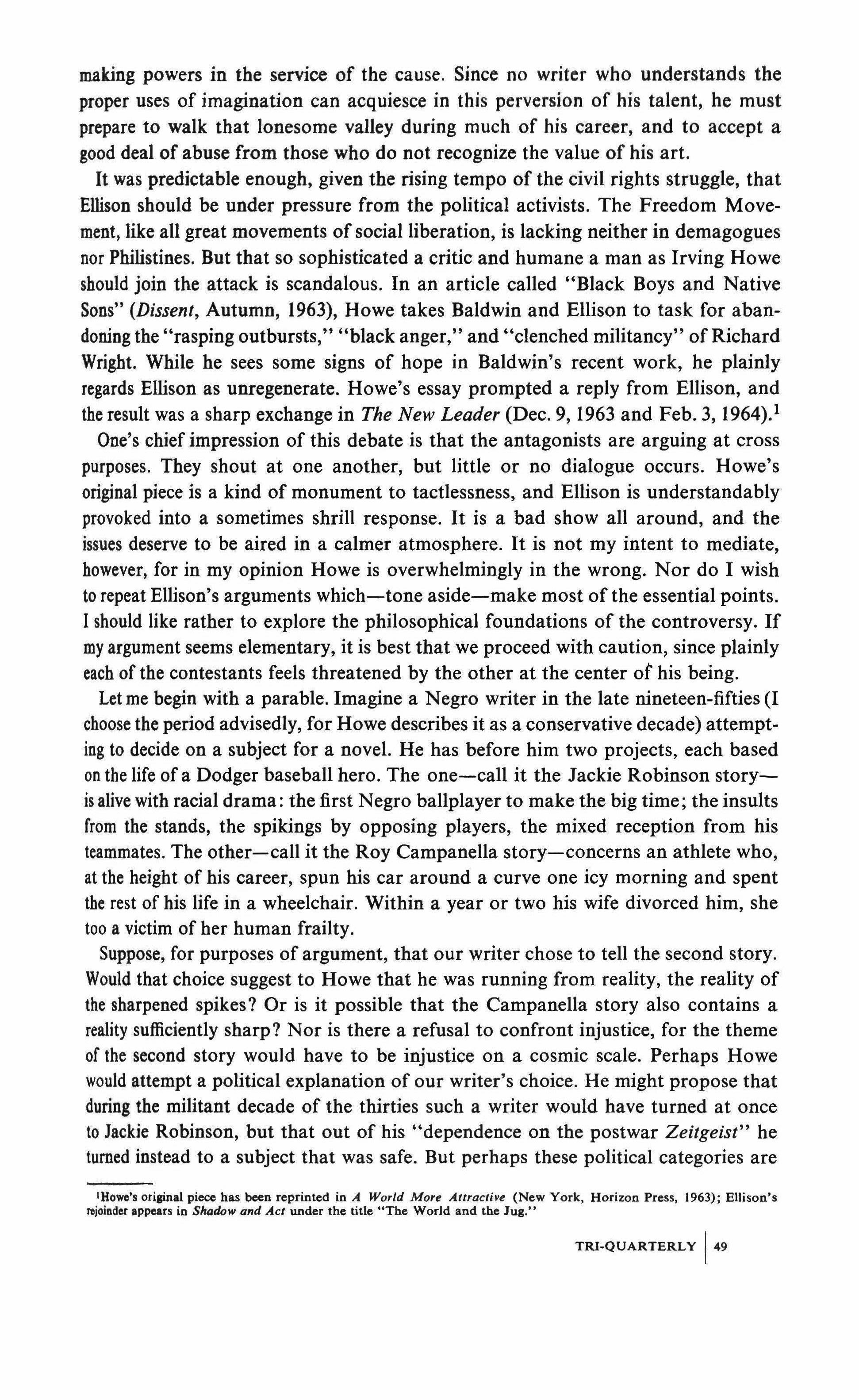
making powers in the service of the cause. Since no writer who understands the proper uses of imagination can acquiesce in this perversion of his talent, he must prepare to walk that lonesome valley during much of his career, and to accept a good deal of abuse from those who do not recognize the value of his art.
It was predictable enough, given the rising tempo of the civil rights struggle, that Ellison should be under pressure from the political activists. The Freedom Movement, like all great movements of social liberation, is lacking neither in demagogues nor Philistines. But that so sophisticated a critic and humane a man as Irving Howe should join the attack is scandalous. In an article called "Black Boys and Native Sons" (Dissent, Autumn, 1963), Howe takes Baldwin and Ellison to task for abandoning the "rasping outbursts," "black anger," and "clenched militancy" of Richard Wright. While he sees some signs of hope in Baldwin's recent work, he plainly regards Ellison as unregenerate. Howe's essay prompted a reply from Ellison, and the result was a sharp exchange in The New Leader (Dec. 9, 1963 and Feb. 3, 1964).1
One's chief impression of this debate is that the antagonists are arguing at cross purposes. They shout at one another, but little or no dialogue occurs. Howe's original piece is a kind of monument to tactlessness, and Ellison is understandably provoked into a sometimes shrill response. It is a bad show all around, and the issues deserve to be aired in a calmer atmosphere. It is not my intent to mediate, however, for in my opinion Howe is overwhelmingly in the wrong. Nor do I wish to repeat Ellison's arguments which-tone aside-make most of the essential points. I should like rather to explore the philosophical foundations of the controversy. If my argument seems elementary, it is best that we proceed with caution, since plainly each of the contestants feels threatened by the other at the center of his being.
Let me begin with a parable. Imagine a Negro writer in the late nineteen-fifties (I choose the period advisedly, for Howe describes it as a conservative decade) attempting to decide on a subject for a novel. He has before him two projects, each based on the life of a Dodger baseball hero. The one-call it the Jackie Robinson storyis alive with racial drama: the first Negro ballplayer to make the big time; the insults from the stands, the spikings by opposing players, the mixed reception from his teammates. The other-call it the Roy Campanella story-concerns an athlete who, at the height of his career, spun his car around a curve one icy morning and spent the rest of his life in a wheelchair. Within a year or two his wife divorced him, she too a victim of her human frailty.
Suppose, for purposes of argument, that our writer chose to tell the second story. Would that choice suggest to Howe that he was running from reality, the reality of the sharpened spikes? Or is it possible that the Campanella story also contains a reality sufficiently sharp? Nor is there a refusal to confront injustice, for the theme of the second story would have to be injustice on a cosmic scale. Perhaps Howe would attempt a political explanation of our writer's choice. He might propose that during the militant decade of the thirties such a writer would have turned at once to Jackie Robinson, but that out of his "dependence on the postwar Zeitgeist" he turned instead to a subject that was safe. But perhaps these political categories are
IHowe's original piece has been reprinted in A World More Attractive (New York, Horizon Press, 1963); Ellison's IIIjoinder appears in Shadow and Act under the title "The World and the Jug."
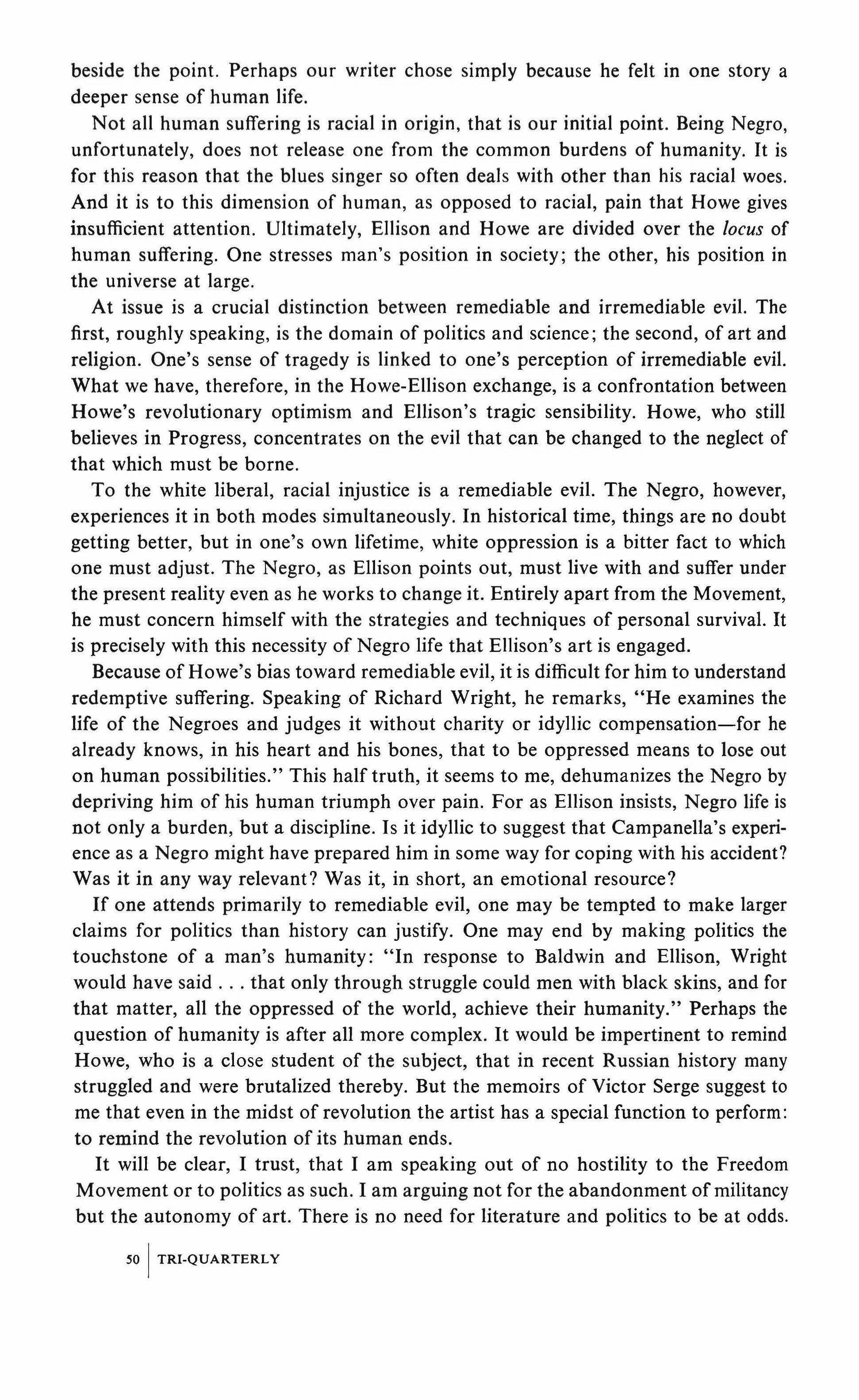
beside the point. Perhaps our writer chose simply because he felt in one story a deeper sense of human life.
Not all human suffering is racial in origin, that is our initial point. Being Negro, unfortunately, does not release one from the common burdens of humanity. It is for this reason that the blues singer so often deals with other than his racial woes. And it is to this dimension of human, as opposed to racial, pain that Howe gives insufficient attention. Ultimately, Ellison and Howe are divided over the locus of human suffering. One stresses man's position in society; the other, his position in the universe at large.
At issue is a crucial distinction between remediable and irremediable evil. The first, roughly speaking, is the domain of politics and science; the second, of art and religion. One's sense of tragedy is linked to one's perception of irremediable evil. What we have, therefore, in the Howe-Ellison exchange, is a confrontation between Howe's revolutionary optimism and Ellison's tragic sensibility. Howe, who still believes in Progress, concentrates on the evil that can be changed to the neglect of that which must be borne.
To the white liberal, racial injustice is a remediable evil. The Negro, however, experiences it in both modes simultaneously. In historical time, things are no doubt getting better, but in one's own lifetime, white oppression is a bitter fact to which one must adjust. The Negro, as Ellison points out, must live with and suffer under the present reality even as he works to change it. Entirely apart from the Movement, he must concern himself with the strategies and techniques of personal survival. It is precisely with this necessity of Negro life that Ellison's art is engaged.
Because of Howe's bias toward remediable evil, it is difficult for him to understand redemptive suffering. Speaking of Richard Wright, he remarks, "He examines the life of the Negroes and judges it without charity or idyllic compensation-for he already knows, in his heart and his bones, that to be oppressed means to lose out on human possibilities." This half truth, it seems to me, dehumanizes the Negro by depriving him of his human triumph over pain. For as Ellison insists, Negro life is not only a burden, but a discipline. Is it idyllic to suggest that Campanella's experience as a Negro might have prepared him in some way for coping with his accident? Was it in any way relevant? Was it, in short, an emotional resource?
If one attends primarily to remediable evil, one may be tempted to make larger claims for politics than history can justify. One may end by making politics the touchstone of a man's humanity: "In response to Baldwin and Ellison, Wright would have said that only through struggle could men with black skins, and for that matter, all the oppressed of the world, achieve their humanity." Perhaps the question of humanity is after all more complex. It would be impertinent to remind Howe, who is a close student of the subject, that in recent Russian history many struggled and were brutalized thereby. But the memoirs of Victor Serge suggest to me that even in the midst of revolution the artist has a special function to perform: to remind the revolution of its human ends.
It will be clear, I trust, that I am speaking out of no hostility to the Freedom Movement or to politics as such. I am arguing not for the abandonment of militancy but the autonomy of art. There is no need for literature and politics to be at odds.
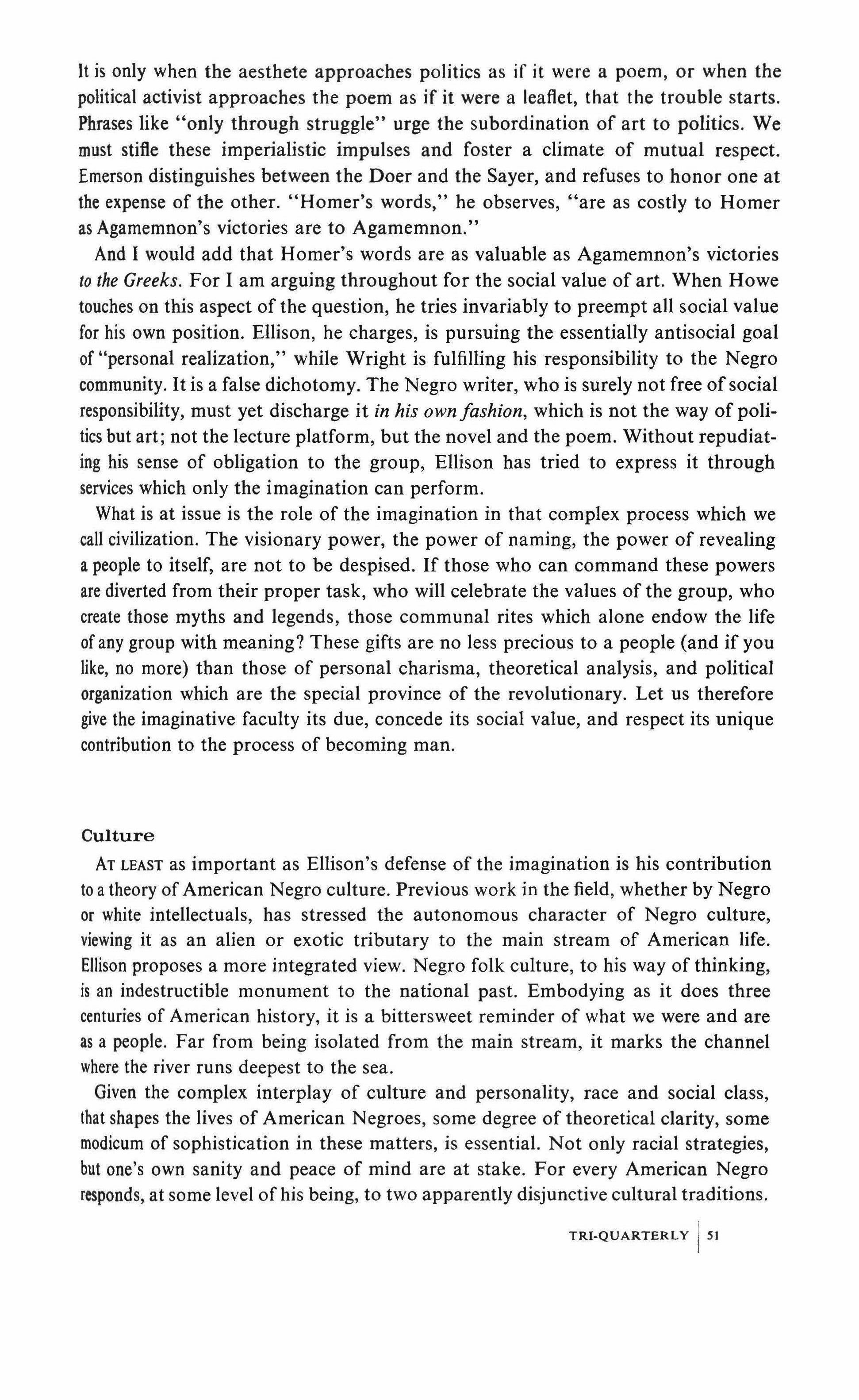
It is only when the aesthete approaches politics as if it were a poem, or when the political activist approaches the poem as if it were a leaflet, that the trouble starts. Phrases like "only through struggle" urge the subordination of art to politics. We must stifle these imperialistic impulses and foster a climate of mutual respect. Emerson distinguishes between the Doer and the Sayer, and refuses to honor one at the expense of the other. "Homer's words," he observes, "are as costly to Homer as Agamemnon's victories are to Agamemnon."
And I would add that Homer's words are as valuable as Agamemnon's victories to the Greeks. For I am arguing throughout for the social value of art. When Howe touches on this aspect of the question, he tries invariably to preempt all social value for his own position. Ellison, he charges, is pursuing the essentially antisocial goal of "personal realization," while Wright is fulfilling his responsibility to the Negro community. It is a false dichotomy. The Negro writer, who is surely not free of social responsibility, must yet discharge it in his own fashion, which is not the way of politics but art; not the lecture platform, but the novel and the poem. Without repudiating his sense of obligation to the group, Ellison has tried to express it through services which only the imagination can perform.
What is at issue is the role of the imagination in that complex process which we call civilization. The visionary power, the power of naming, the power of revealing a people to itself, are not to be despised. If those who can command these powers are diverted from their proper task, who will celebrate the values of the group, who create those myths and legends, those communal rites which alone endow the life of any group with meaning? These gifts are no less precious to a people (and if you like, no more) than those of personal charisma, theoretical analysis, and political organization which are the special province of the revolutionary. Let us therefore give the imaginative faculty its due, concede its social value, and respect its unique contribution to the process of becoming man.
AT LEAST as important as Ellison's defense of the imagination is his contribution to a theory of American Negro culture. Previous work in the field, whether by Negro or white intellectuals, has stressed the autonomous character of Negro culture, viewing it as an alien or exotic tributary to the main stream of American life. Ellison proposes a more integrated view. Negro folk culture, to his way of thinking, is an indestructible monument to the national past. Embodying as it does three centuries of American history, it is a bittersweet reminder of what we were and are as a people. Far from being isolated from the main stream, it marks the channel where the river runs deepest to the sea.
Given the complex interplay of culture and personality, race and social class, that shapes the lives of American Negroes, some degree of theoretical clarity, some modicum of sophistication in these matters, is essential. Not only racial strategies, but one's own sanity and peace of mind are at stake. For every American Negro responds, at some level of his being, to two apparently disjunctive cultural traditions. TRI-QUARTERLY
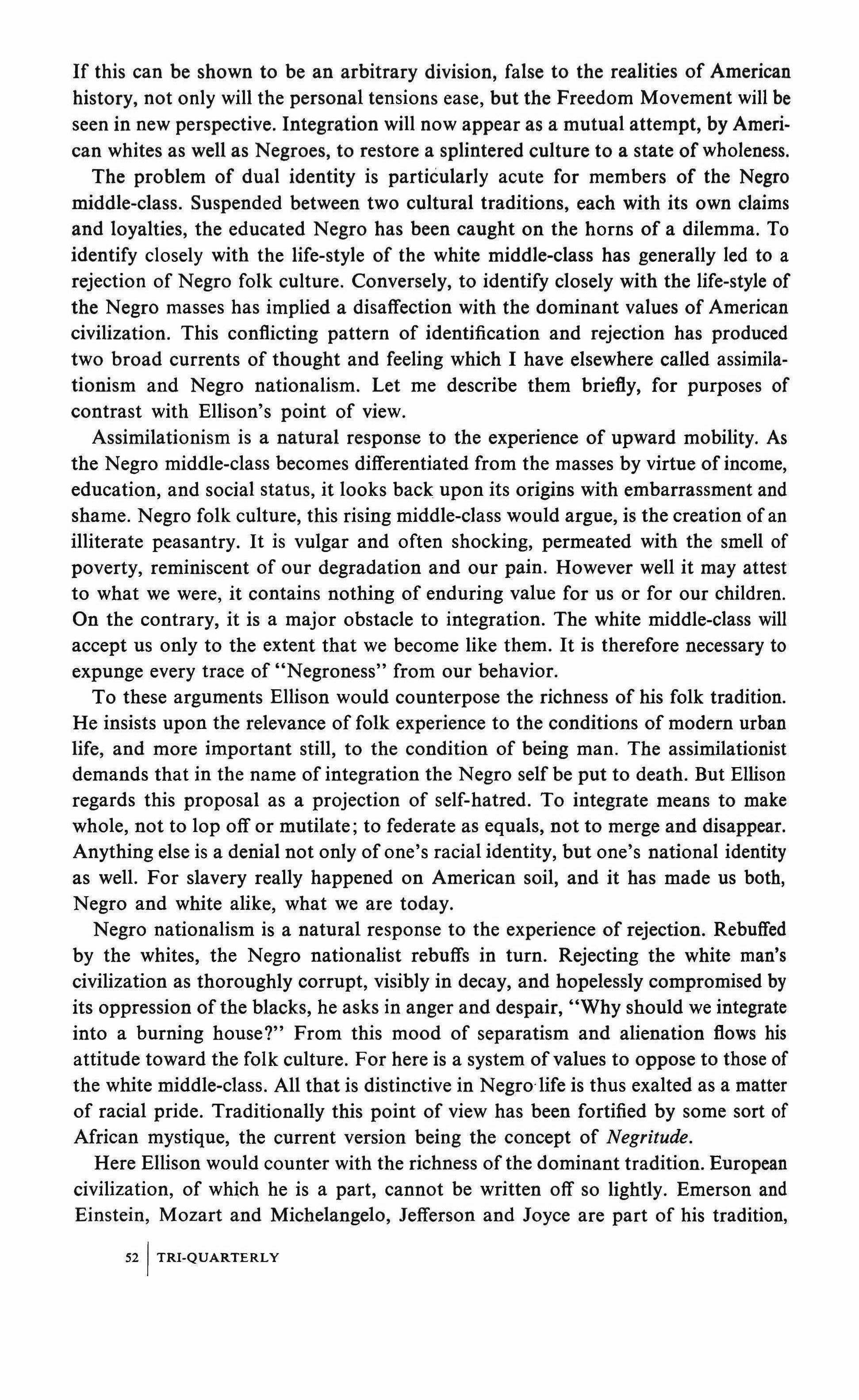
If this can be shown to be an arbitrary division, false to the realities of American history, not only will the personal tensions ease, but the Freedom Movement will be seen in new perspective. Integration will now appear as a mutual attempt, by American whites as well as Negroes, to restore a splintered culture to a state of wholeness.
The problem of dual identity is particularly acute for members of the Negro middle-class. Suspended between two cultural traditions, each with its own claims and loyalties, the educated Negro has been caught on the horns of a dilemma. To identify closely with the life-style of the white middle-class has generally led to a rejection of Negro folk culture. Conversely, to identify closely with the life-style of the Negro masses has implied a disaffection with the dominant values of American civilization. This conflicting pattern of identification and rejection has produced two broad currents of thought and feeling which I have elsewhere called assimilationism and Negro nationalism. Let me describe them briefly, for purposes of contrast with Ellison's point of view.
Assimilationism is a natural response to the experience of upward mobility. As the Negro middle-class becomes differentiated from the masses by virtue of income, education, and social status, it looks back upon its origins with embarrassment and shame. Negro folk culture, this rising middle-c1ass would argue, is the creation of an illiterate peasantry. It is vulgar and often shocking, permeated with the smell of poverty, reminiscent of our degradation and our pain. However well it may attest to what we were, it contains nothing of enduring value for us or for our children. On the contrary, it is a major obstacle to integration. The white middle-class will accept us only to the extent that we become like them. It is therefore necessary to expunge every trace of "Negroness" from our behavior.
To these arguments Ellison would counterpose the richness of his folk tradition. He insists upon the relevance of folk experience to the conditions of modern urban life, and more important still, to the condition of being man. The assimilationist demands that in the name of integration the Negro self be put to death. But Ellison regards this proposal as a projection of self-hatred. To integrate means to make whole, not to lop off or mutilate; to federate as equals, not to merge and disappear. Anything else is a denial not only of one's racial identity, but one's national identity as well. For slavery really happened on American soil, and it has made us both, Negro and white alike, what we are today.
Negro nationalism is a natural response to the experience of rejection. Rebuffed by the whites, the Negro nationalist rebuffs in turn. Rejecting the white man's civilization as thoroughly corrupt, visibly in decay, and hopelessly compromised by its oppression of the blacks, he asks in anger and despair, "Why should we integrate into a burning house?" From this mood of separatism and alienation flows his attitude toward the folk culture. For here is a system of values to oppose to those of the white middle-class. All that is distinctive in Negro'life is thus exalted as a matter of racial pride. Traditionally this point of view has been fortified by some sort of African mystique, the current version being the concept of Negritude.
Here Ellison would counter with the richness of the dominant tradition. European civilization, of which he is a part, cannot be written off so lightly. Emerson and Einstein, Mozart and Michelangelo, Jefferson and Joyce are part of his tradition,
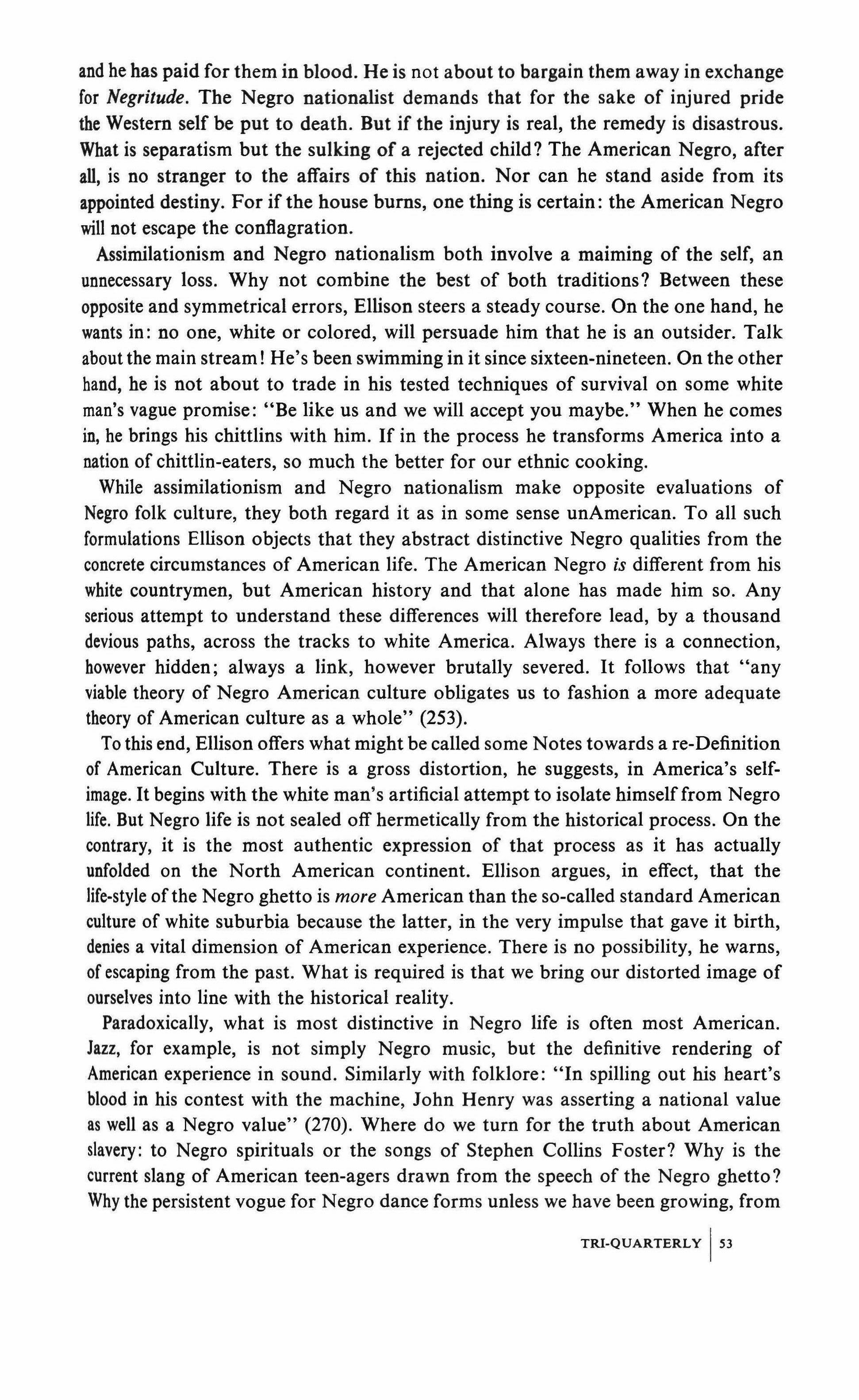
and he has paid for them in blood. He is not about to bargain them away in exchange for Negritude. The Negro nationalist demands that for the sake of injured pride the Western self be put to death. But if the injury is real, the remedy is disastrous. What is separatism but the sulking of a rejected child? The American Negro, after all, is no stranger to the affairs of this nation. Nor can he stand aside from its appointed destiny. For if the house bums, one thing is certain: the American Negro will not escape the conflagration.
Assimilationism and Negro nationalism both involve a maiming of the self, an unnecessary loss. Why not combine the best of both traditions? Between these opposite and symmetrical errors, Ellison steers a steady course. On the one hand, he wants in: no one, white or colored, will persuade him that he is an outsider. Talk about the main stream! He's been swimming in it since sixteen-nineteen. On the other hand, he is not about to trade in his tested techniques of survival on some white man's vague promise: "Be like us and we will accept you maybe." When he comes in, he brings his chittlins with him. If in the process he transforms America into a nation of chittlin-eaters, so much the better for our ethnic cooking.
While assimilationism and Negro nationalism make opposite evaluations of Negro folk culture, they both regard it as in some sense unAmerican. To all such formulations Ellison objects that they abstract distinctive Negro qualities from the concrete circumstances of American life. The American Negro is different from his white countrymen, but American history and that alone has made him so. Any serious attempt to understand these differences will therefore lead, by a thousand devious paths, across the tracks to white America. Always there is a connection, however hidden; always a link, however brutally severed. It follows that "any viable theory of Negro American culture obligates us to fashion a more adequate theory of American culture as a whole" (253).
To this end, Ellison offers what might be called some Notes towards are-Definition of American Culture. There is a gross distortion, he suggests, in America's selfimage. It begins with the white man's artificial attempt to isolate himselffrom Negro life. But Negro life is not sealed off hermetically from the historical process. On the contrary, it is the most authentic expression of that process as it has actually unfolded on the North American continent. Ellison argues, in effect, that the life-style ofthe Negro ghetto is more American than the so-called standard American culture of white suburbia because the latter, in the very impulse that gave it birth, denies a vital dimension of American experience. There is no possibility, he warns, of escaping from the past. What is required is that we bring our distorted image of ourselves into line with the historical reality.
Paradoxically, what is most distinctive in Negro life is often most American. Jazz, for example, is not simply Negro music, but the definitive rendering of American experience in sound. Similarly with folklore: "In spilling out his heart's blood in his contest with the machine, John Henry was asserting a national value as well as a Negro value" (270). Where do we tum for the truth about American slavery: to Negro spirituals or the songs of Stephen Collins Foster? Why is the current slang of American teen-agers drawn from the speech of the Negro ghetto? Why the persistent vogue for Negro dance forms unless we have been growing, from
y I S3
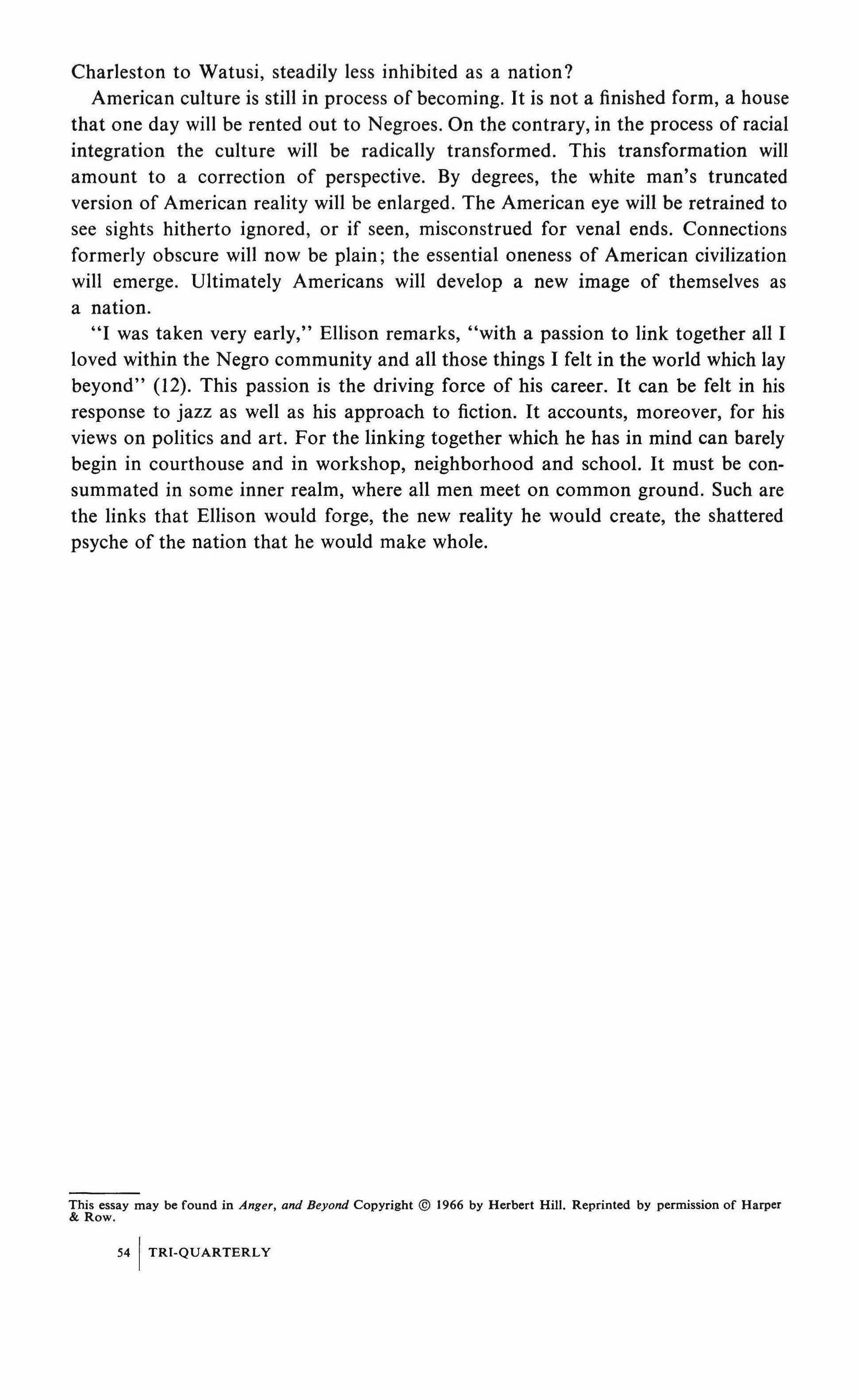
Charleston to Watusi, steadily less inhibited as a nation?
American culture is still in process of becoming. It is not a finished form, a house that one day will be rented out to Negroes. On the contrary, in the process of racial integration the culture will be radically transformed. This transformation will amount to a correction of perspective. By degrees, the white man's truncated version of American reality will be enlarged. The American eye will be retrained to see sights hitherto ignored, or if seen, misconstrued for venal ends. Connections formerly obscure will now be plain; the essential oneness of American civilization will emerge. Ultimately Americans will develop a new image of themselves as a nation.
"I was taken very early," Ellison remarks, "with a passion to link together all I loved within the Negro community and all those things I felt in the world which lay beyond" (12). This passion is the driving force of his career. It can be felt in his response to jazz as well as his approach to fiction. It accounts, moreover, for his views on politics and art. For the linking together which he has in mind can barely begin in courthouse and in workshop, neighborhood and school. It must be consummated in some inner realm, where all men meet on common ground. Such are the links that Ellison would forge, the new reality he would create, the shattered psyche of the nation that he would make whole.
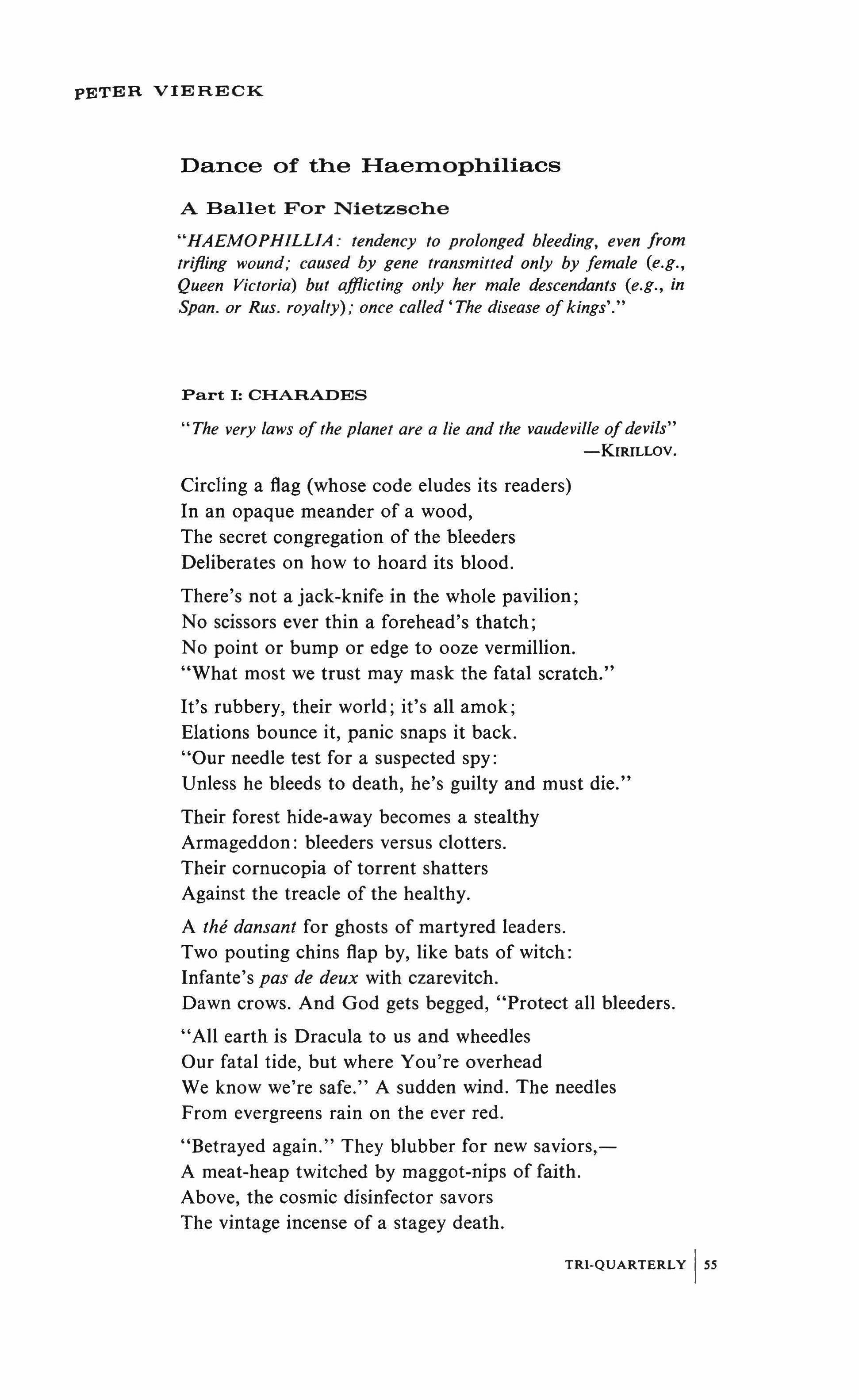
"HAEMOPHILLIA: tendency to prolonged bleeding, even from trifling wound; caused by gene transmitted only by female (e.g., Queen Victoria) but afflicting only her male descendants (e.g., in Span. or Rus. royalty); once called 'The disease ofkings'."
"The very laws of the planet are a lie and the vaudeville ofdevils" -KIRILLOV.
Circling a flag (whose code eludes its readers)
In an opaque meander of a wood, The secret congregation of the bleeders Deliberates on how to hoard its blood.
There's not a jack-knife in the whole pavilion; No scissors ever thin a forehead's thatch; No point or bump or edge to ooze vermillion.
"What most we trust may mask the fatal scratch."
It's rubbery, their world; it's all amok; Elations bounce it, panic snaps it back.
"Our needle test for a suspected spy: Unless he bleeds to death, he's guilty and must die."
Their forest hide-away becomes a stealthy Armageddon: bleeders versus clotters.
Their cornucopia of torrent shatters Against the treacle of the healthy.
A the dansant for ghosts of martyred leaders.
Two pouting chins flap by, like bats of witch: Infante's pas de deux with czarevitch.
Dawn crows. And God gets begged, "Protect all bleeders.
"All earth is Dracula to us and wheedles
Our fatal tide, but where You're overhead
We know we're safe." A sudden wind. The needles From evergreens rain on the ever red.
"Betrayed again." They blubber for new saviors,
A meat-heap twitched by maggot-nips of faith.
Above, the cosmic disinfector savors
The vintage incense of a stagey death. TRI-QUARTERL
They caper, then, like heels an adder triggers; They try to shake their fists, but pudgily,Contorted less by bone's corporeal rigors
Than by mind's rage at undeserved decree.
That gene, that egg of anger, who plants it in a bleeder? In howl and hunger shriller, what non-man monster Other? "In claw and skull-fur longer; red-lipt like unclean feeder; Of nest, of trap a builder; 'hi,' says the prey, 'hi mother'."
The bleeders' flag is coded: "two visions of our lady."
On one side Queen Victoria squats benign, Grandma of death-pale kinglets. The other side is bloody: A female spider, dirty and divine.
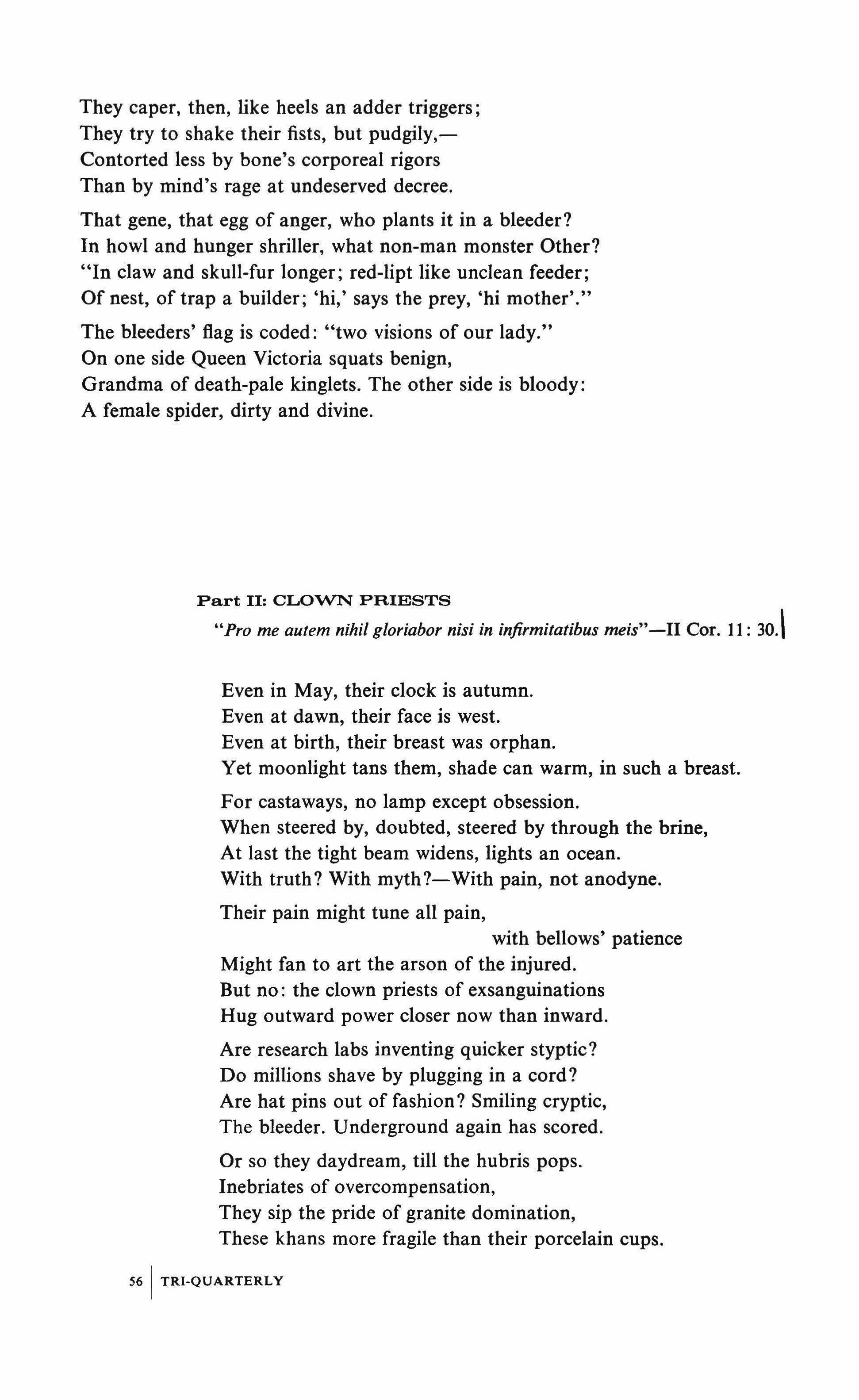
"Pro me autem nihil gloriabor nisi in infirmitatibus meis"-II Cor. 11: 30.'
Even in May, their clock is autumn. Even at dawn, their face is west. Even at birth, their breast was orphan. Yet moonlight tans them, shade can warm, in such a breast. For castaways, no lamp except obsession. When steered by, doubted, steered by through the brine, At last the tight beam widens, lights an ocean. With truth? With myth?-With pain, not anodyne. Their pain might tune all pain, with bellows' patience Might fan to art the arson of the injured. But no: the clown priests of exsanguinations Hug outward power closer now than inward. Are research labs inventing quicker styptic? Do millions shave by plugging in a cord? Are hat pins out of fashion? Smiling cryptic, The bleeder. Underground again has scored.
Or so they daydream, till the hubris pops. Inebriates of overcompensation, They sip the pride of granite domination, These khans more fragile than their porcelain cups.
TRI-QUARTERLY
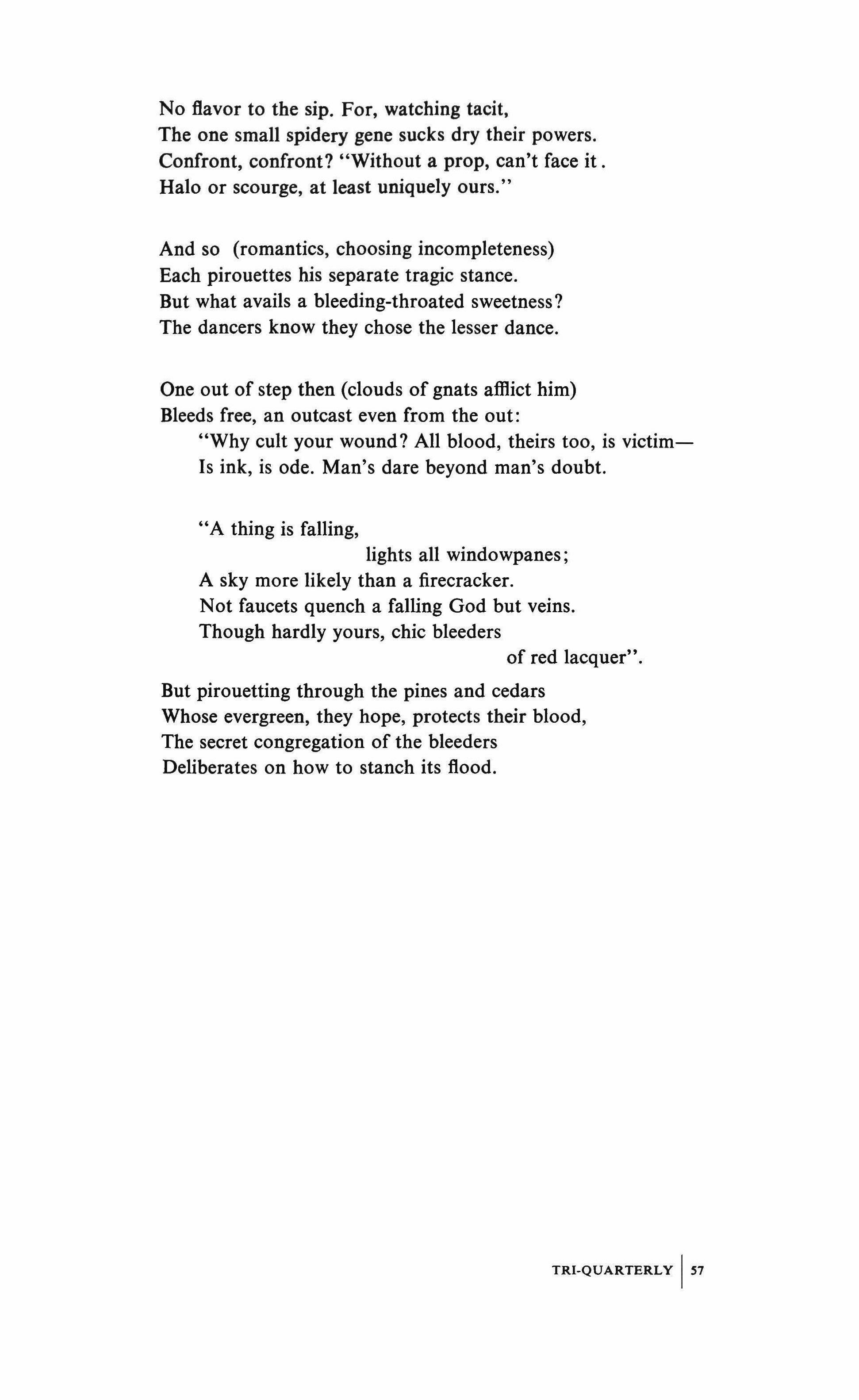
No flavor to the sip. For, watching tacit, The one small spidery gene sucks dry their powers. Confront, confront? "Without a prop, can't face it. Halo or scourge, at least uniquely ours."
And so (romantics, choosing incompleteness)
Each pirouettes his separate tragic stance. But what avails a bleeding-throated sweetness? The dancers know they chose the lesser dance.
One out of step then (clouds of gnats afflict him)
Bleeds free, an outcast even from the out: "Why cult your wound? All blood, theirs too, is victimIs ink, is ode. Man's dare beyond man's doubt.
"A thing is falling, lights all windowpanes; A sky more likely than a firecracker. Not faucets quench a falling God but veins. Though hardly yours, chic bleeders of red lacquer".
But pirouetting through the pines and cedars Whose evergreen, they hope, protects their blood, The secret congregation of the bleeders Deliberates on how to stanch its flood.
Korf and Palmstrom compete in nocturnes
I. The Priestess
Pensively nods, in twilight, the pagoda Nearby, from the gateway of her Order Tang-ku-ei-i steps out, ordained to guard her Lands from onerous Life, from Death so odious. Out of her mouth, there hangs the Moonlight Ode Of Emporer Tang Wang, with its flowery border; For with both hands she carries, from her larder, One biscuit crowned with a tiny oak commode. She wanders over seven tremblingly narrow Temple bridges, carved of flute-wood trestles, To the moon-murdered hound's funereal barrow; There, she breaks cake crumbs in the sacred vessels, Tempting the moon to stoop down toward these coffers And to the verses she, with her pursed lips, offers.
(v.K.)
II. The Blouse III. Nocturne in White
Though worn by day, the blouse
Rests silently at eve, While through its hollow sleeve
There trots the mouse.
Through its hollow sleeve
Trots ghostlily the mouse
While, worn by day, the blouse Takes rest at eve.
It rests, the dayworn blouse, Still, in the lap of eve, It rests, while through its sleeve
There trots its mouse
(P.)
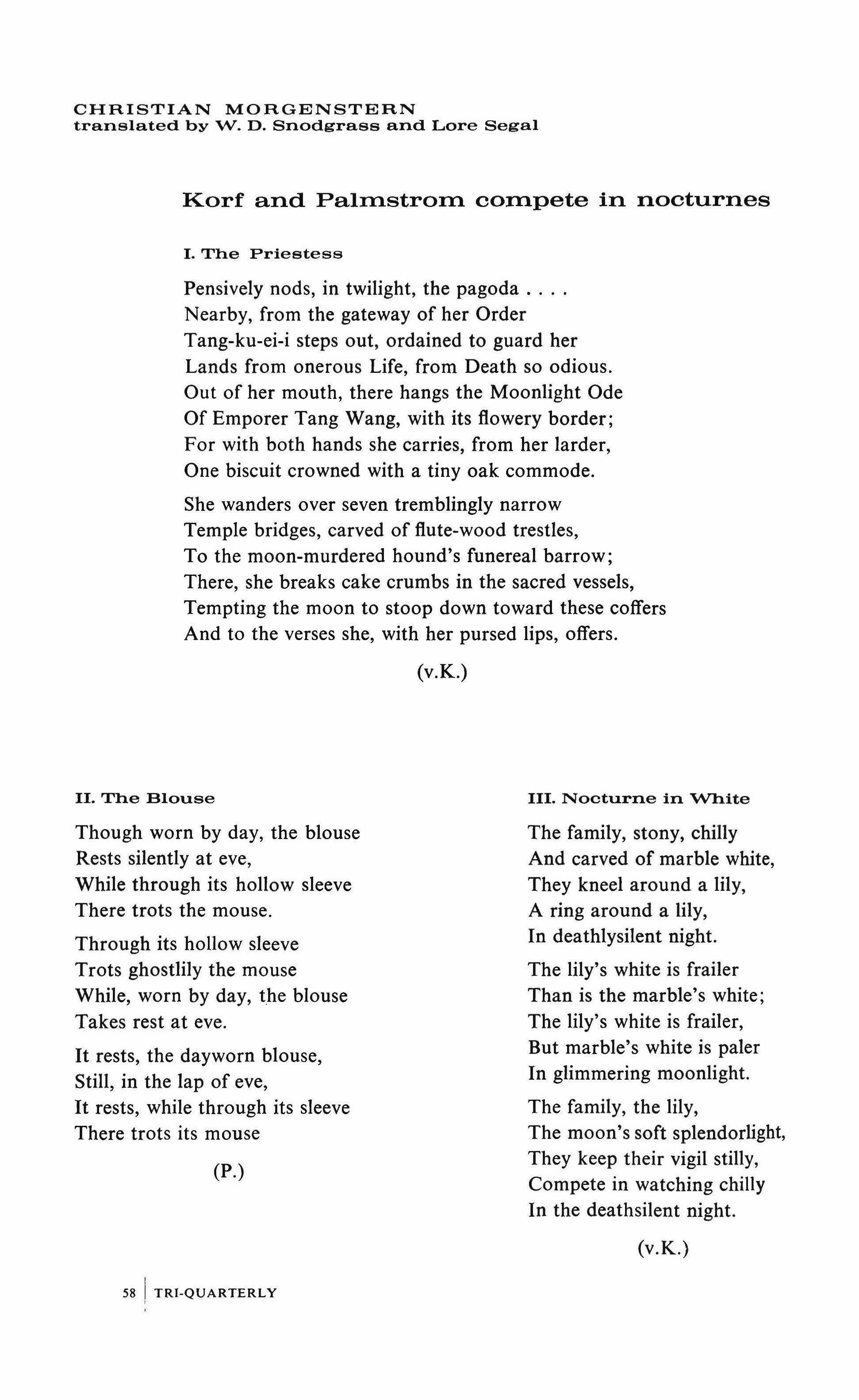
TRI-QUARTERLY
The family, stony, chilly And carved of marble white, They kneel around a lily, A ring around a lily, In deathlysilent night.
The lily's white is frailer Than is the marble's white; The lily's white is frailer, But marble's white is paler In glimmering moonlight.
The family, the lily, The moon's soft splendorlight, They keep their vigil stilly, Compete in watching chilly In the deathsilent night.
(v.K.)
Korf gets to know a giant Whose wife puts anything she does not like inside His mouth. Night or day, Whenever she announces such Intentions, one will see him, patient and compliant, Open wide
The hedge of his teeth, then carefully Push in everything that's in the way Of his wife. And there is much In the way of that woman. It would be quite impossible to say
Exactly what, from mammoth to mosquito, she To some degree Dislikes. Within that place
One sees whole streets, completely populated towns, Mountains, rivers, gardens; not to mention gowns, Plates, wigs, canes, beards. Short and sweet, A complete World collects in the aforesaid space. Von Korf displeases; is taken quietly into the mouth
Of that pious, giant spouse, Only because, as noted previously, he Is a spirit, has von Korf gone free.
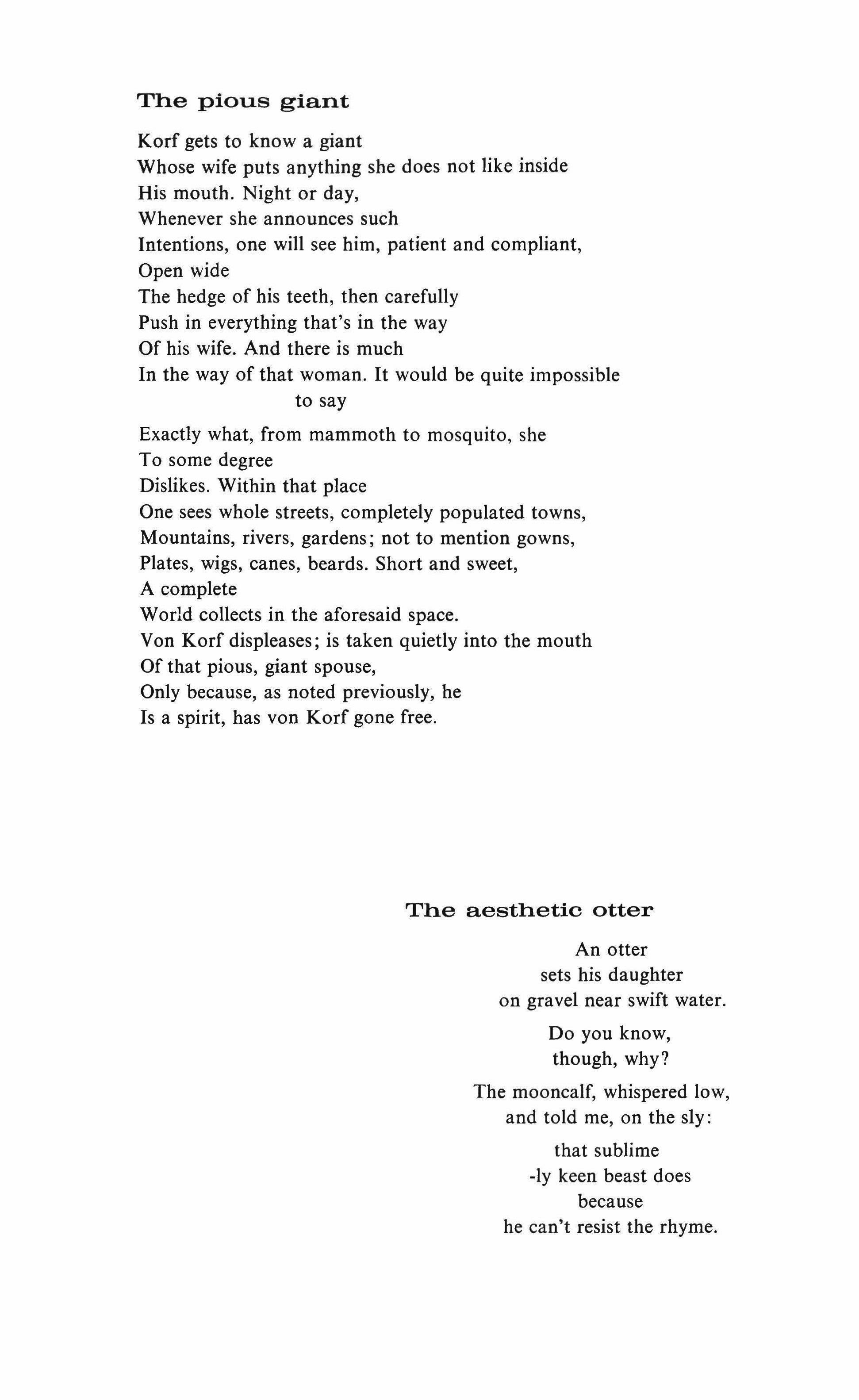
An otter sets his daughter on gravel near swift water.
Do you know, though, why?
The mooncalf, whispered low, and told me, on the sly: that sublime -Iy keen beast does because he can't resist the rhyme.
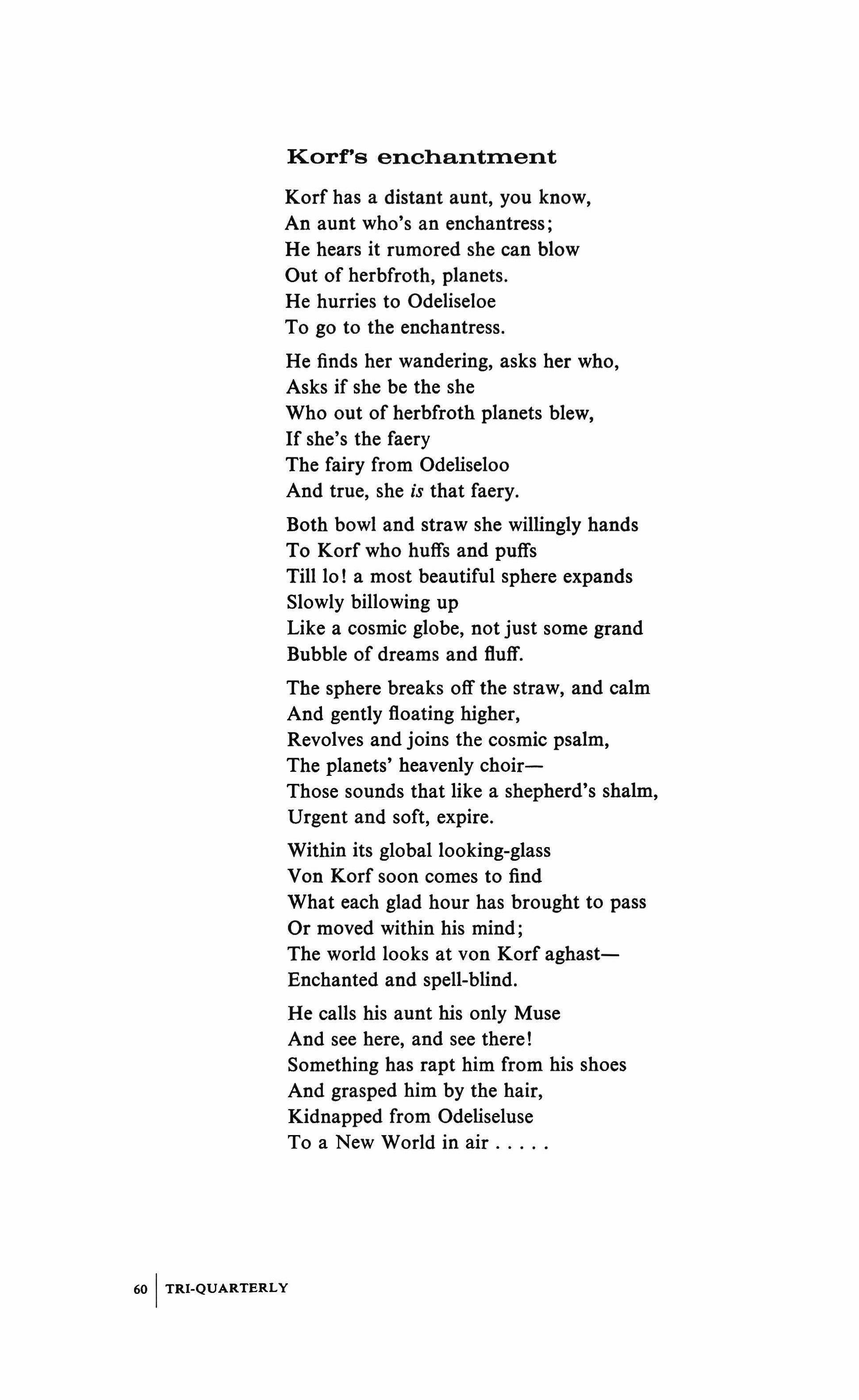
Korf has a distant aunt, you know, An aunt who's an enchantress; He hears it rumored she can blow Out of herbfroth, planets. He hurries to Odeliseloe To go to the enchantress.
He finds her wandering, asks her who, Asks if she be the she Who out of herbfroth planets blew, If she's the faery
The fairy from Odeliseloo And true, she is that faery.
Both bowl and straw she willingly hands To Korf who huffs and puffs Till 10 ! a most beautiful sphere expands Slowly billowing up Like a cosmic globe, not just some grand Bubble of dreams and fluff.
The sphere breaks off the straw, and calm And gently floating higher, Revolves and joins the cosmic psalm, The planets' heavenly choirThose sounds that like a shepherd's shalm, Urgent and soft, expire.
Within its global looking-glass Von Korf soon comes to find What each glad hour has brought to pass Or moved within his mind; The world looks at von Korf aghastEnchanted and spell-blind.
He calls his aunt his only Muse And see here, and see there!
Something has rapt him from his shoes And grasped him by the hair, Kidnapped from Odeliseluse To a New World in air
I am a thousand odd years old And older every day; The King of all Goths, Theobold Raised me on a tray.
The world's changed since, but all unknown To my thought or my feeling. Nor for a small fee 1 am shown By a businessman in Wheeling.
Oeath's voice, Death's face, 1 know not, nor Conturbat timor mortis:
I am the tor-I am the torI am the tor-to-tortoise.
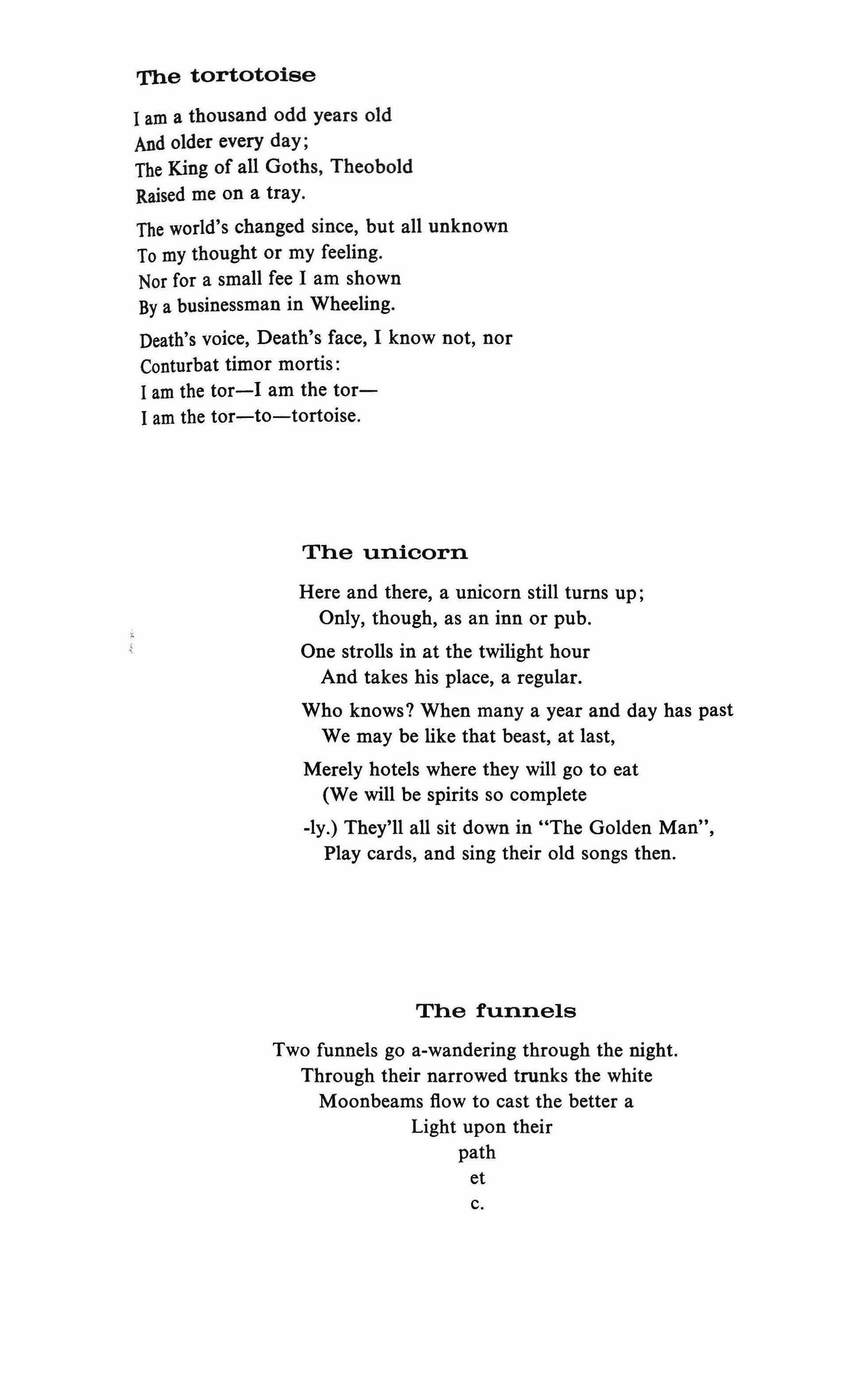
Here and there, a unicorn still turns up; Only, though, as an inn or pub. One strolls in at the twilight hour And takes his place, a regular. Who knows? When many a year and day has past We may be like that beast, at last, Merely hotels where they will go to eat (We will be spirits so complete -ly.) They'll all sit down in "The Golden Man", Play cards, and sing their old songs then.
Two funnels go a-wandering through the night. Through their narrowed trunks the white Moonbeams flow to cast the better a Light upon their path et c.
(Spahollseconcertbeerterraceepisode)
The fledermaus
Heard "herself"-Strauss.
The moon appeared
Specially weird; Her wings whisk past The globed milkglass.
Ladies: "A bat!
EEEk, George! My hat!"
Whirr, whorr,-she flits
In someone's Schlitz.
At once a bus -boy ousts her:-: thus:-
That ends, no doubts, "Die Fledermaus."
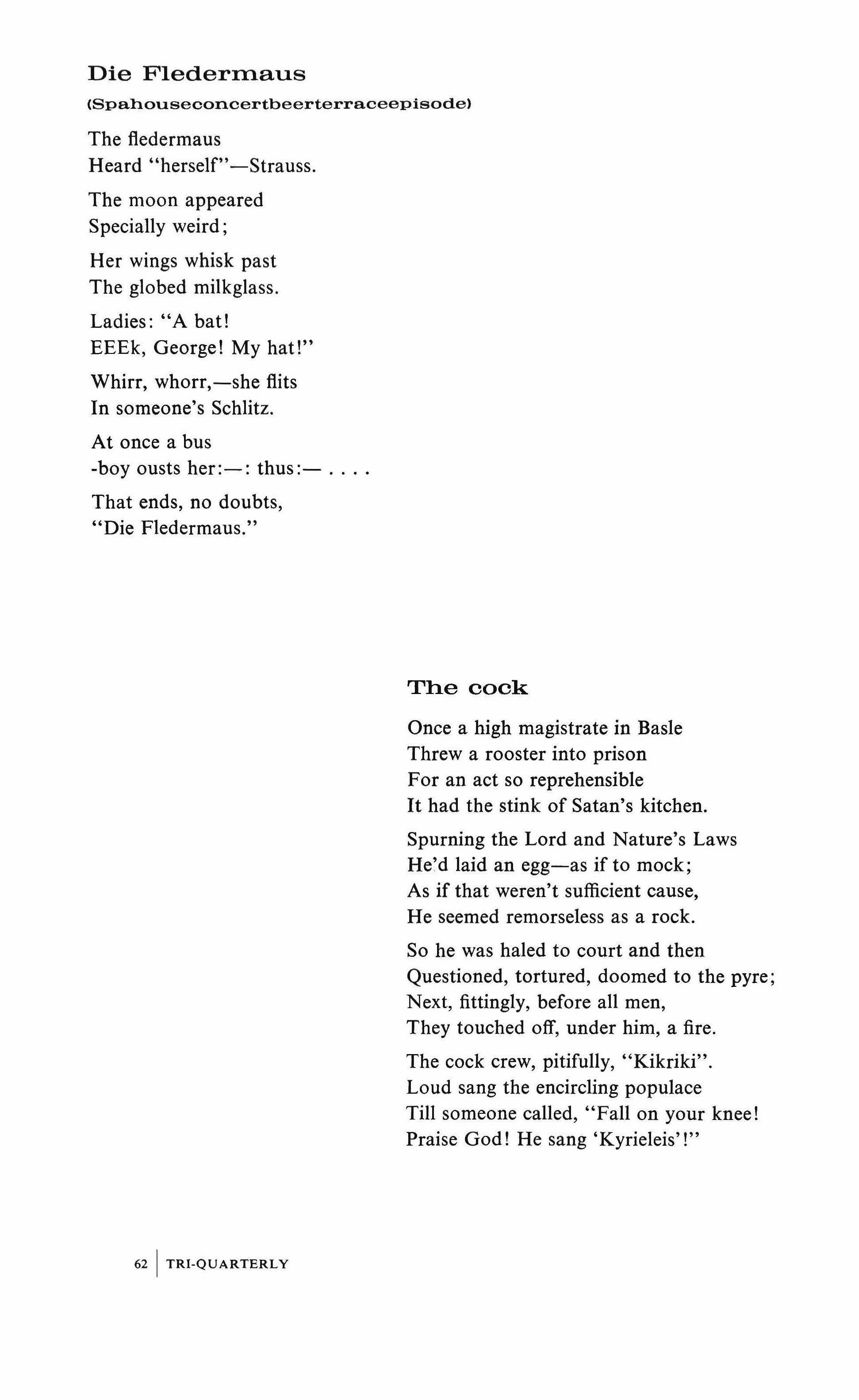
cock
Once a high magistrate in Basle Threw a rooster into prison For an act so reprehensible It had the stink of Satan's kitchen.
Spurning the Lord and Nature's Laws
He'd laid an egg-as if to mock; As if that weren't sufficient cause, He seemed remorseless as a rock.
So he was haled to court and then Questioned, tortured, doomed to the pyre; Next, fittingly, before all men, They touched off, under him, a fire.
The cock crew, pitifully, "Kikriki".
Loud sang the encircling populace
Till someone called, "Fall on your knee! Praise God! He sang 'Kyrieleis'!"
A belltone hurls through the night skies
As if with a bird's wings; he flies In a Roman Catholic gown, Far over meadow, hill and town. He seeks the ladybelltone, BIM, Who left him and has flown away; A bad business; which is to say She has betrayed, abandoned him.
o come, he calls, 0 come; your BAM Is waiting for you here heartsore, o come back, BIM, beloved lamb, Your BAM adores you more and more.
Yet BIM, I ought to let you know, Has given herself up to BUM; He too belongs to Christendom, Of course-that's just the trouble, though.
So BAM hurls on his headlong flight O'er hills and forests through the night. But all in vain-which is to say Alas! he's flying the wrong way.
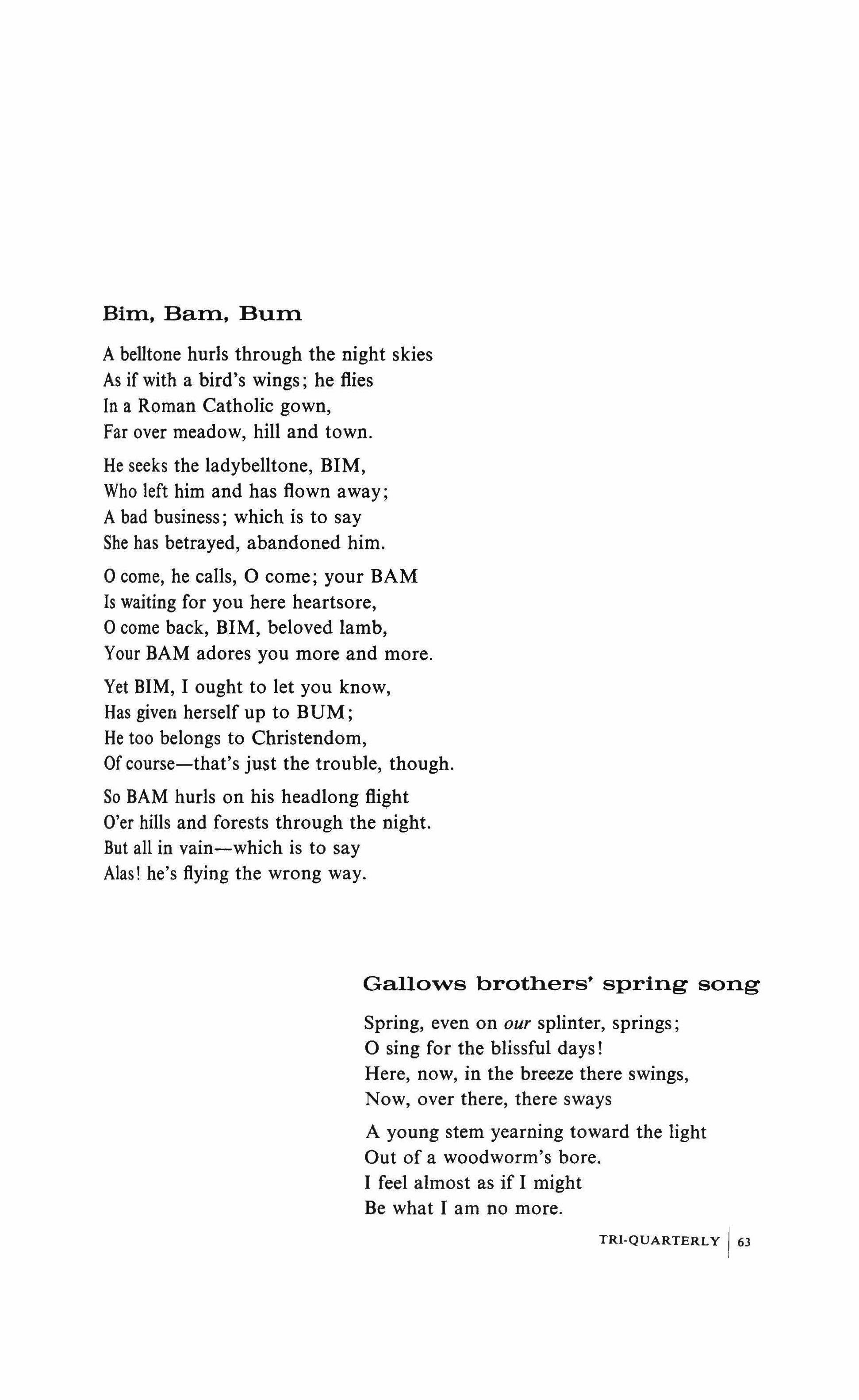
Gallows brothers' spring song
Spring, even on our splinter, springs; o sing for the blissful days! Here, now, in the breeze there swings, Now, over there, there sways
A young stem yearning toward the light Out of a woodworm's bore.
I feel almost as if I might Be what I am no more.
TRI-QVARTERLY
A nervous person set on a meadow
Would be better off with none. Let him discover how life can be led a-way (in the main) from one.
No sooner will he have settled there Than ants come, grasshoppers, worms, Centipedes creep up; a bug's in his ear; Bees' buzzers sound alarms.
A nervous person set on a meadow
Had better arise straightway
And go to another paradise instead 0' Meadows (for instance, away).
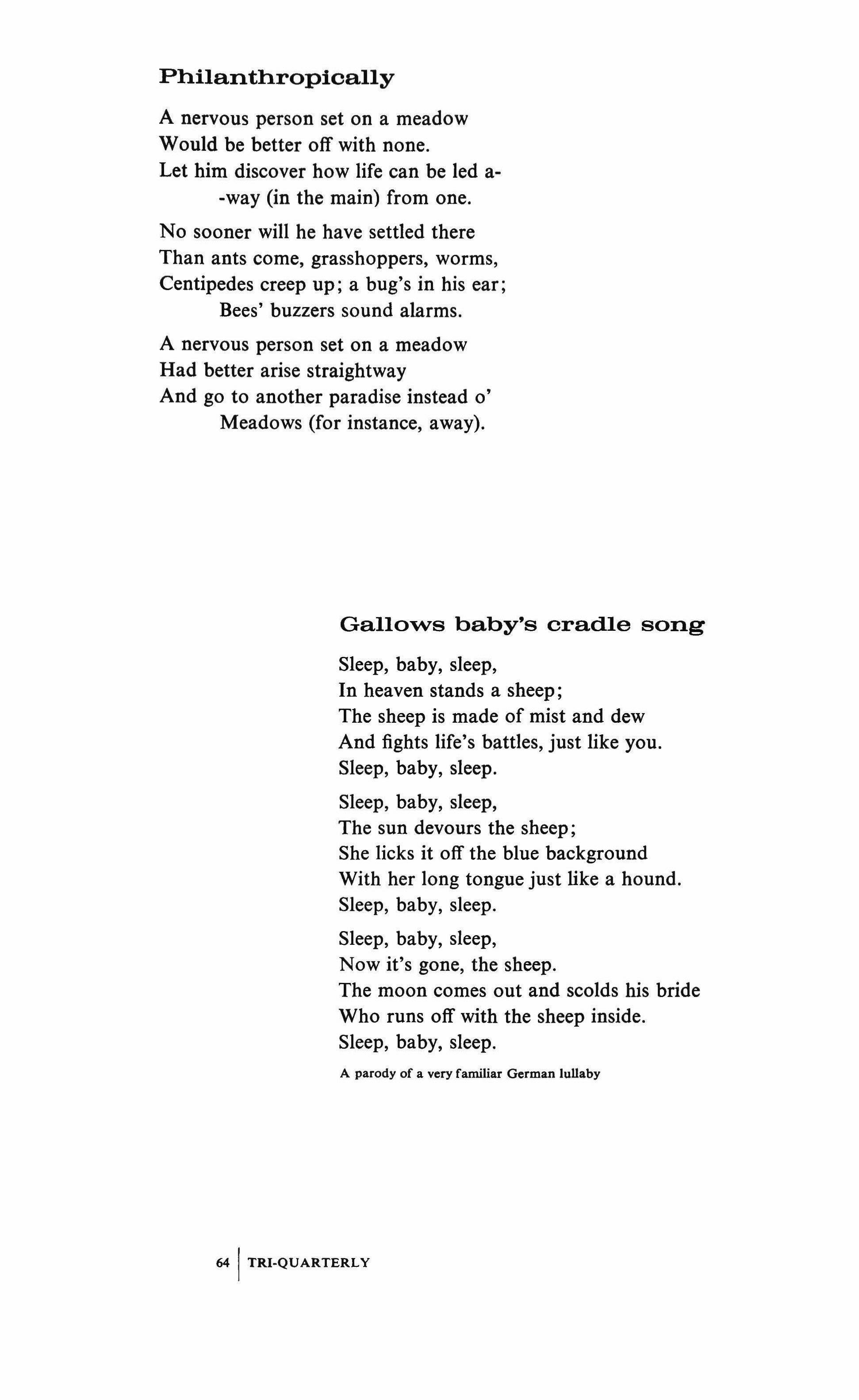
Sleep, baby, sleep, In heaven stands a sheep; The sheep is made of mist and dew And fights life's battles, just like you.
Sleep, baby, sleep.
Sleep, baby, sleep, The sun devours the sheep; She licks it off the blue background With her long tongue just like a hound.
Sleep, baby, sleep.
Sleep, baby, sleep, Now it's gone, the sheep. The moon comes out and scolds his bride Who runs off with the sheep inside.
Sleep, baby, sleep.
A parody of a very familiar German lullaby
Gallo'-Vs baby's cradle songAlthough I only pull a hack, I've kept up on philosophy; Soon as the feedbag's round my neck, I can't help ruminate, you see. I swing it to, I swing it fro; And with this mild, familiar swinging, Through my brain such thoughts will go As only wise men could be thinking.
Although I only pull a hack, I've often reasoned, full of care, How to get oats out of the sack Into my mouth, from the depths, there. I've swung it low, I've swung it high, Until my very ears would ring; What slept there, veiled in darkness, I Found too deep for pondering.
Although I only pull a hack, I need this consolation: I Tell myself, thus foul and slack Does all terrestrial knowledge lie; In the Nosebag of the Profound Every mouth partakes, perhaps, And yet-Alas I-the Ultimate Ground Particles evade our grasp.
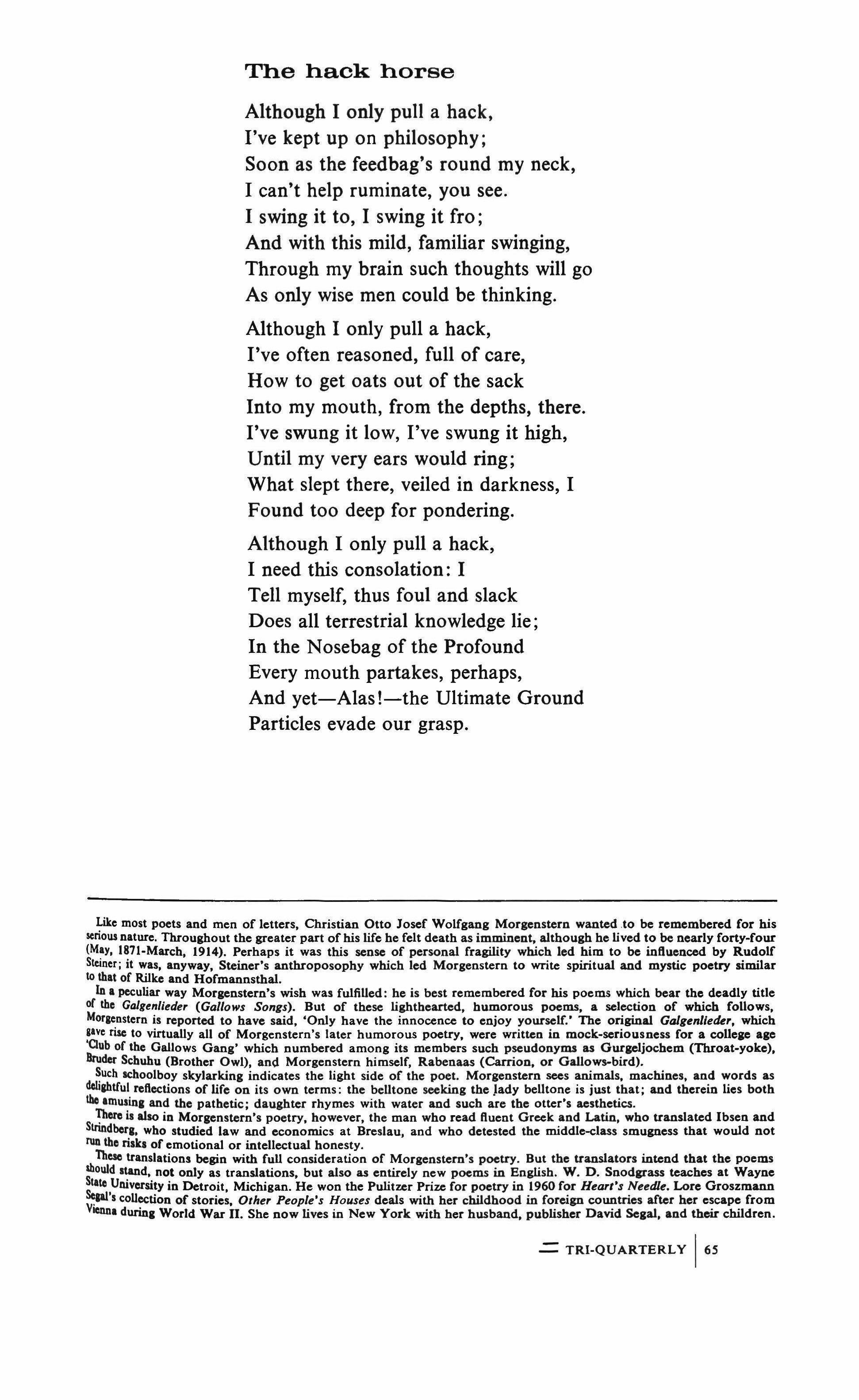
Like most poets and men of letters, Christian Otto Josef Wolfgang Morgenstern wanted .to be remembered for his serious nature. Throughout the greater part of his life he felt death as imminent, although he lived to be nearly forty-four (May, IB7l-March, 1914). Perhaps it was this sense of personal fragility which led him to be influenced by Rudolf Steiner; it was, anyway, Steiner's anthroposophy which led Morgenstern to write spiritual and mystic poetry similar 10 that of Rilke and Hofmannsthal. III a peculiar way Morgenstern's wish was fulfilled: he is best remembered for his poems which bear the deadly title of the GIIIg."U.der (Gallows So"gs). But of these lighthearted, humorous poems, a selection of which follows, Moraenstern is reported to have said, 'Only have the innocence to enjoy yourself.' The original Galgenlleder, which aave rise to virtually all of Morgenstern's later humorous poetry, were written in mock-seriousness for a collese age 'aub of tbe Gallows Gang' which numbered among its members such pseudonyms as Gurgeljochem (Throat-yoke), Bruder Schuhu (Brother Owl), and Morgenstern himself, Rabenaas (Carrion, or Gallows-bird).
�uch achoolboy skylarking indicates the light side of the poet. Morgenstern sees animals, machines, and words as deliahtful reftections of life on its own terms: the belltone seeking the Jady belltone is just that; and therein lies both !be amusin, and the pathetic; daughter rhymes with water and such are the otter's aesthetics.
� it also in Morgenstern's poetry, however, the man who read ftuent Greek and Latin, who translated Ibsen and Strindborl, who studied law and economics at Breslau, and who detested the middle-class smugness that would not l11li the risks of emotional or intellectual honesty.
These translations begin with full consideration of Morgenstern's poetry. But the translators intend that the poems should stand, not only as transiations, but also as entirely new poems in English. W. D. Snodgrass teaches at Wayne Slate University in Detroit, Michigan. He won the Pulitzer Prize for poetry in 1960 for Heart's Needle. Lore Groszmann �'s collection of stories, Other People's Houses deals with her childhood in foreign countries after her escape from lellDa durin, World War n. She now lives in New York. with her husband, publisher David Segal, and their children
Y
As the morning advanced the sun became bright and warm, cloudless, calm, serene. About nine an appearance very unusual began to demand our attention-a shower of cobwebs fallingfrom very elevated regions, & continuing, without any interruption, till the close of the day
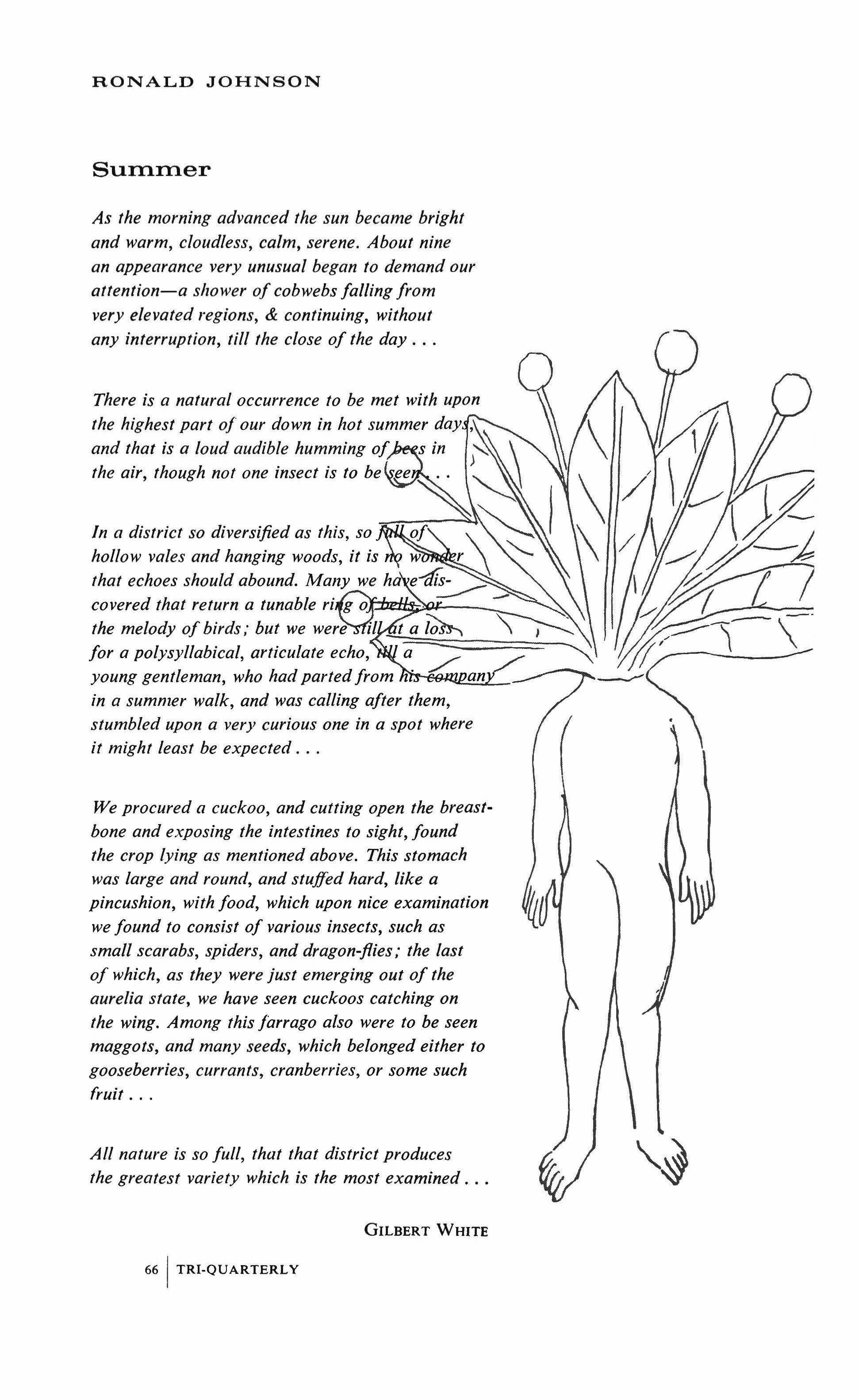
In a district so diversified as this, so hollow vales and hanging woods, it is that echoes should abound. Many we h covered that return a tunable ri g 0�'11!:I:.t;i:':D¥---_ the melody ofbirds,' but we were it for a polysyllabical, articulate echo,
in a summer walk, and was calling after them, stumbled upon a very curious one in a spot where it might least be expected
We procured a cuckoo, and cutting open the breastbone and exposing the intestines to sight, found the crop lying as mentioned above. This stomach was large and round, and stuffed hard, like a pincushion, with food, which upon nice examination we found to consist of various insects, such as small scarabs, spiders, and dragon-flies,' the last of which, as they were just emerging out of the aurelia state, we have seen cuckoos catching on the wing. Among this farrago also were to be seen maggots, and many seeds, which belonged either to gooseberries, currants, cranberries, or some such fruit
All nature is so full, that that district produces the greatest variety which is the most examined
GILBERT WHITE1
Upon first opening a cuckoo
I saw the sweet-briar & bon-fire & strawberry wire now relaxed into intricate thicket.
It was as if seen in strong sunlight, flat & tapestried, all edge & definition. Here, an airy bone shaped like a plowshare, there, vibratory membranes within a space from which the song must come: a syrinx (hollow pipes of reeds) now silent
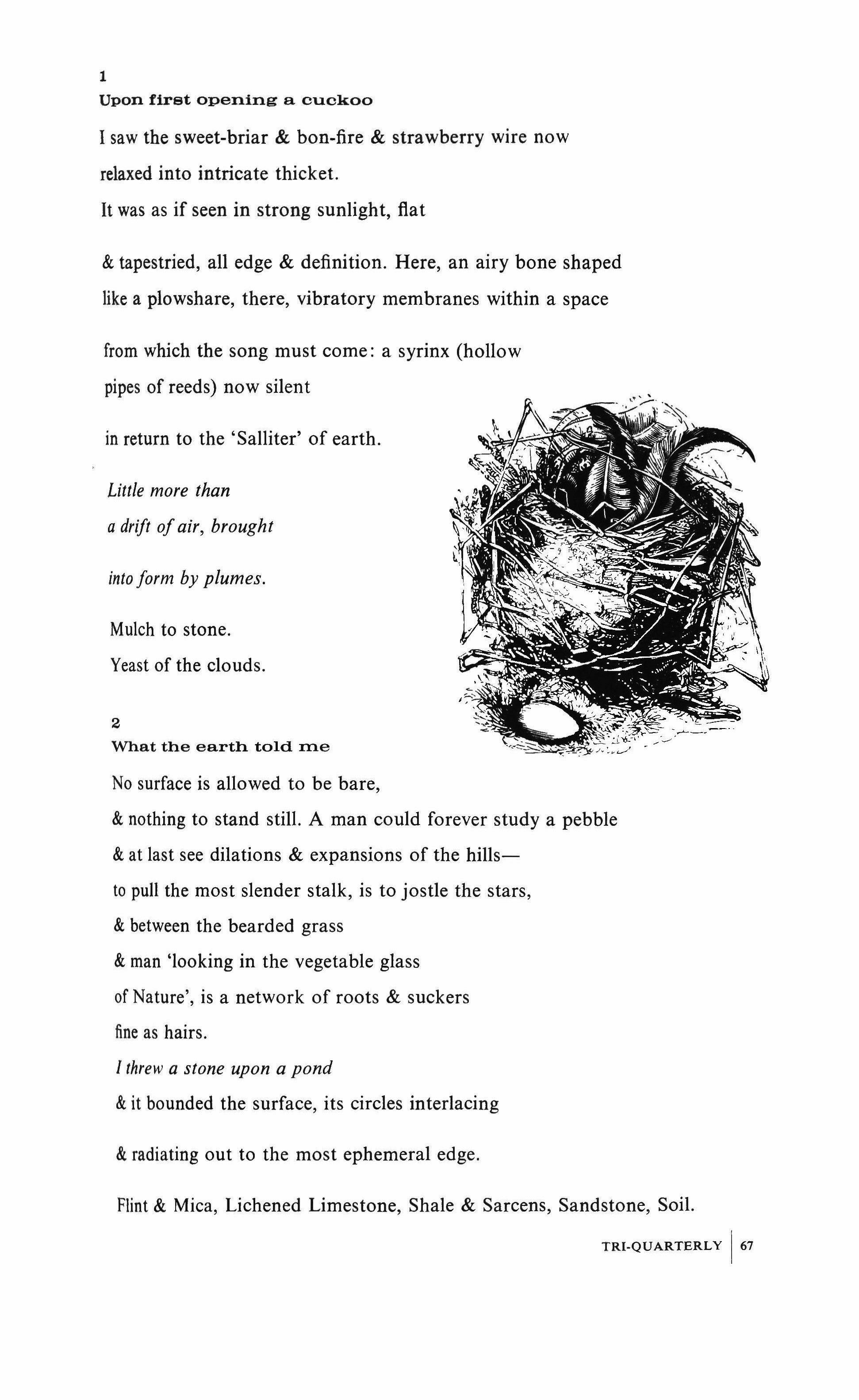
Little more than a drift ofair, brought into form by plumes.
Mulch to stone.
Yeast of the clouds.
What the earth told me in return to the 'Salliter' of earth.
2
No surface is allowed to be bare, & nothing to stand still. A man could forever study a pebble & at last see dilations & expansions of the hillsto pull the most slender stalk, is to jostle the stars, & between the bearded grass & man 'looking in the vegetable glass of Nature', is a network of roots & suckers fine as hairs.
I threw a stone upon a pond & it bounded the surface, its circles interlacing & radiating out to the most ephemeral edge.
Flint & Mica, Lichened Limestone, Shale & Sarcens, Sandstone, Soil.
TRI-QUARTERLy
I saw the wind moving on a meadow & the meadows moving under windlifting, settling & accumulating.
Flint & Mica, Lichened Limestone, Shale & Sarcens, Sandstone, Soil.
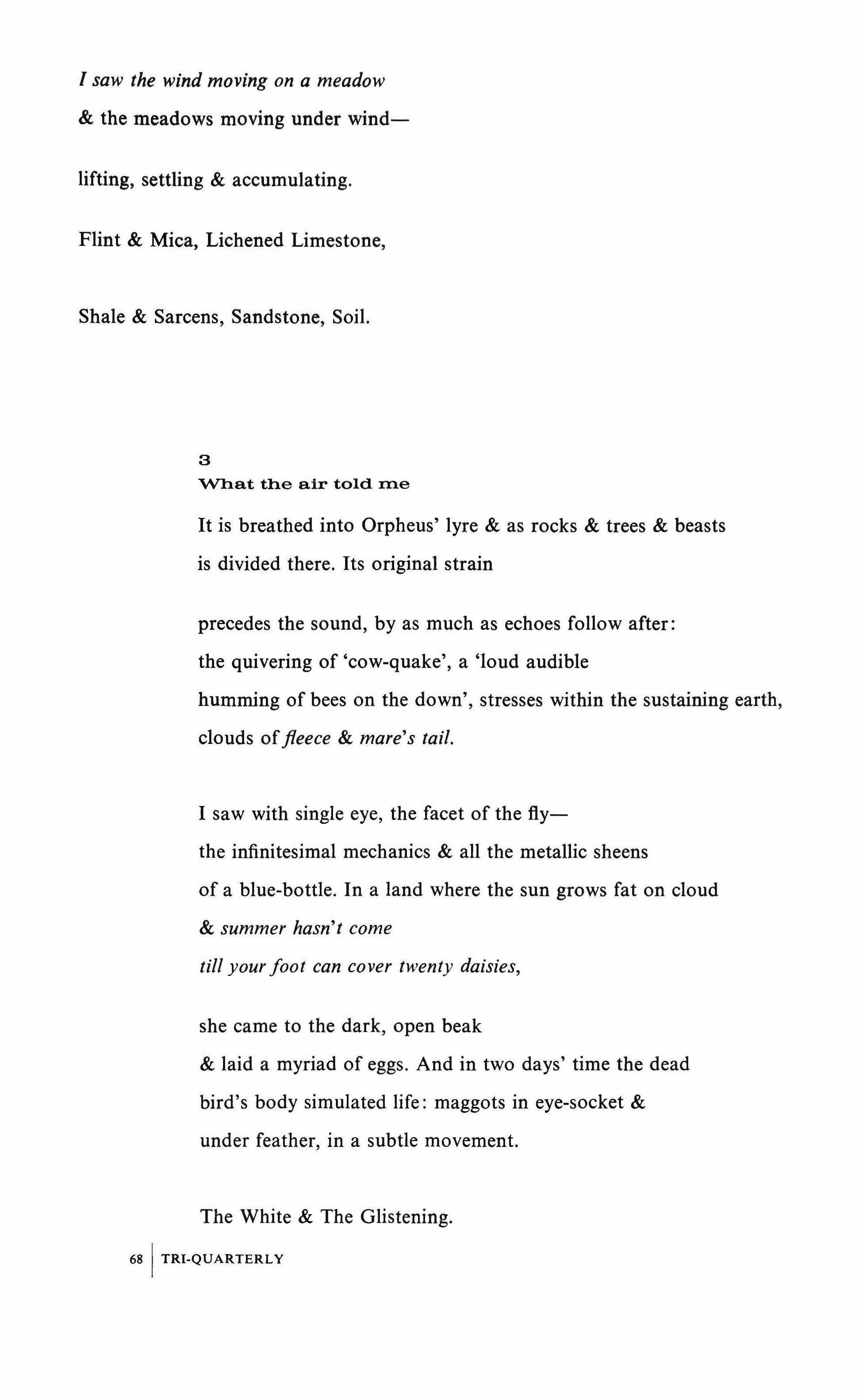
3 What the air told me
It is breathed into Orpheus' lyre & as rocks & trees & beasts is divided there. Its original strain precedes the sound, by as much as echoes follow after: the quivering of 'cow-quake', a 'loud audible humming of bees on the down', stresses within the sustaining earth, clouds offleece & mare's tail.
I saw with single eye, the facet of the flythe infinitesimal mechanics & all the metallic sheens of a blue-bottle. In a land where the sun grows fat on cloud & summer hasn't come till your foot can cover twenty daisies, she came to the dark, open beak & laid a myriad of eggs. And in two days' time the dead bird's body simulated life: maggots in eye-socket & under feather, in a subtle movement.
The White & The Glistening.
What the leaf told me
Today I saw the word written on the poplar leaves. It was 'dazzle'. The dazzle of the poplars.
As a leaf startles out from an undifferentiated mass of foliage, so the word did from a leaf-
A Mirage Of The Delicate Polyglot inventing itself as cipher. But this, in shifts & gyrations, grew in brightness, so bright the massy poplars soon outshone the sun
'My light-my dews-my breezes-my bloom'. Reflections
In A Wren's Eye.
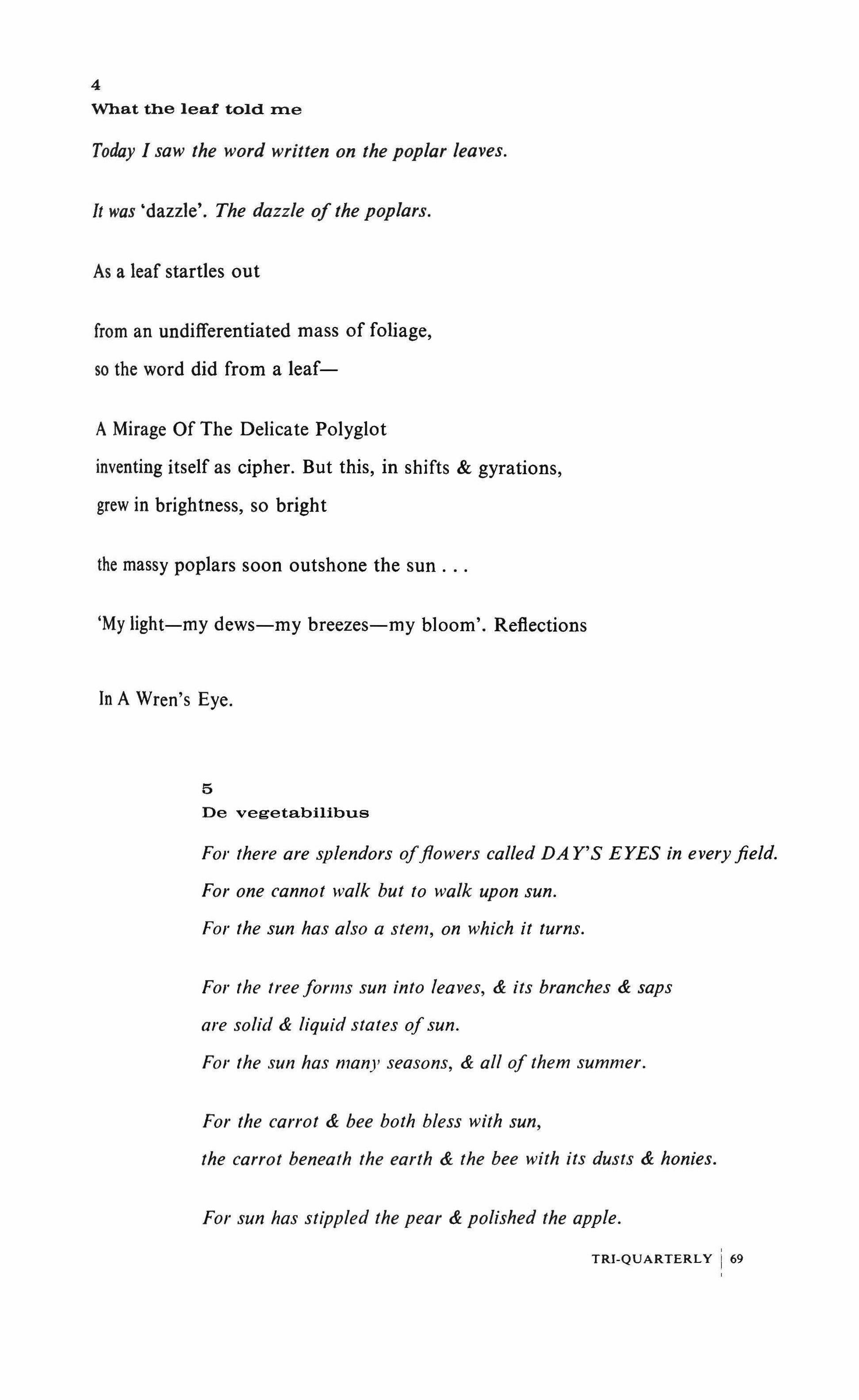
5 De vegetabilibus
For there are splendors of.ftowers called DAY'S EYES in every field.
For one cannot walk but to walk upon sun.
For the sun has also a stem, on which it turns.
For the tree forms sun into leaves, & its branches & saps are solid & liquid states of sun.
For the sun has man)' seasons, & all of them summer.
For the carrot & bee both bless with sun, the carrot beneath the earth & the bee with its dusts & honies.
For sun has stippled the pear & polished the apple.
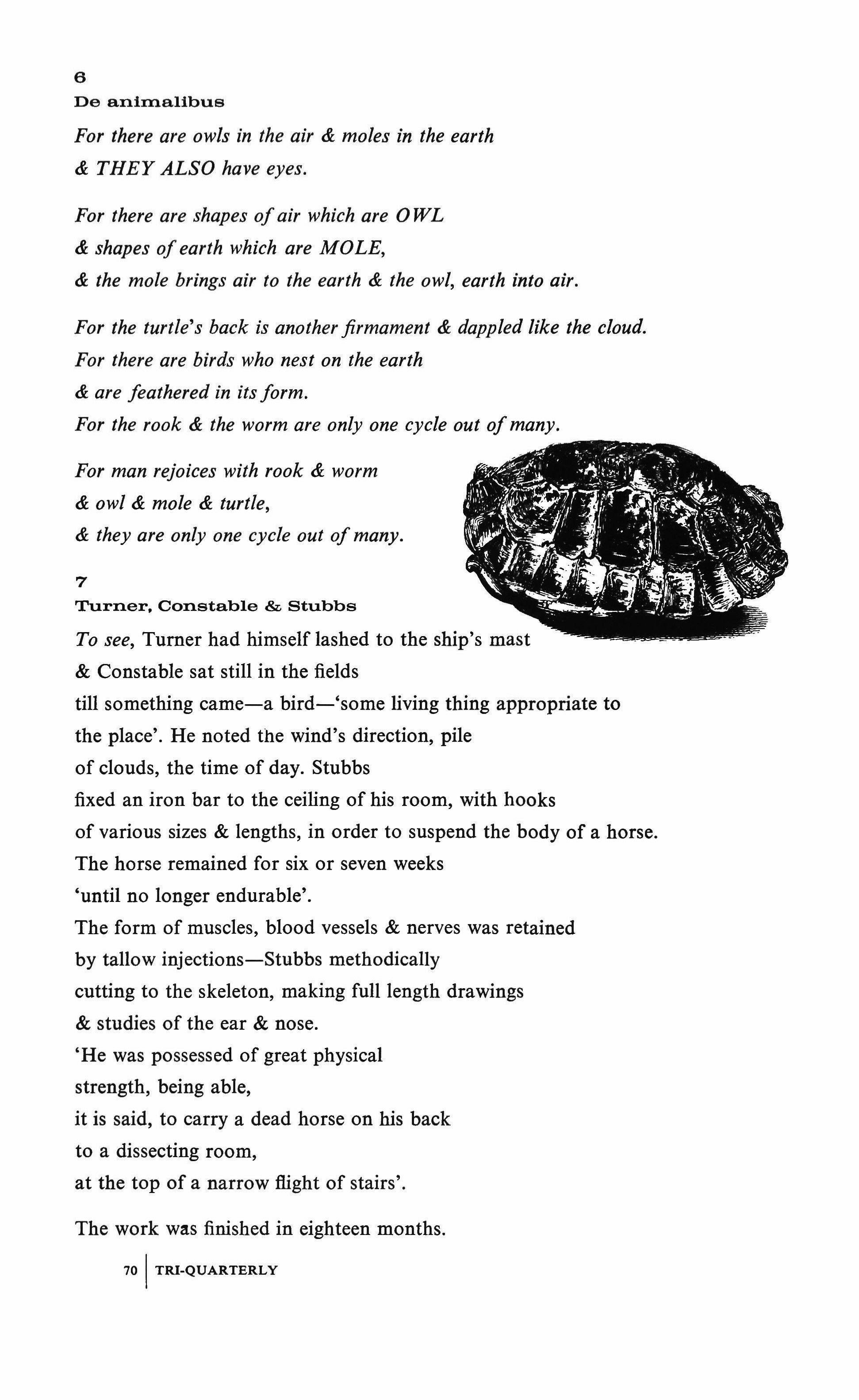
For there are owls in the air & moles in the earth & THEY ALSO have eyes.
For there are shapes ofair which are OWL & shapes ofearth which are MOLE, & the mole brings air to the earth & the owl, earth into air.
For the turtle's back is another firmament & dappled like the cloud.
For there are birds who nest on the earth & are feathered in itsform.
For the rook & the worm are only one cycle out ofmany.
For man rejoices with rook & worm & owl & mole & turtle, & they are only one cycle out of many.
7 Turner, Constable & Stubbs
To see, Turner had himself lashed to the ship's mast & Constable sat still in the fields till something came-a bird-'some living thing appropriate to the place'. He noted the wind's direction, pile of clouds, the time of day. Stubbs fixed an iron bar to the ceiling of his room, with hooks of various sizes & lengths, in order to suspend the body of a horse.
The horse remained for six or seven weeks 'until no longer endurable'.
The form of muscles, blood vessels & nerves was retained by tallow injections-Stubbs methodically cutting to the skeleton, making full length drawings & studies of the ear & nose.
'He was possessed of great physical strength, being able, it is said, to carry a dead horse on his back to a dissecting room, at the top of a narrow flight of stairs'.
The work was finished in eighteen months.
70 I TRl-QUARTERLY
1(( s
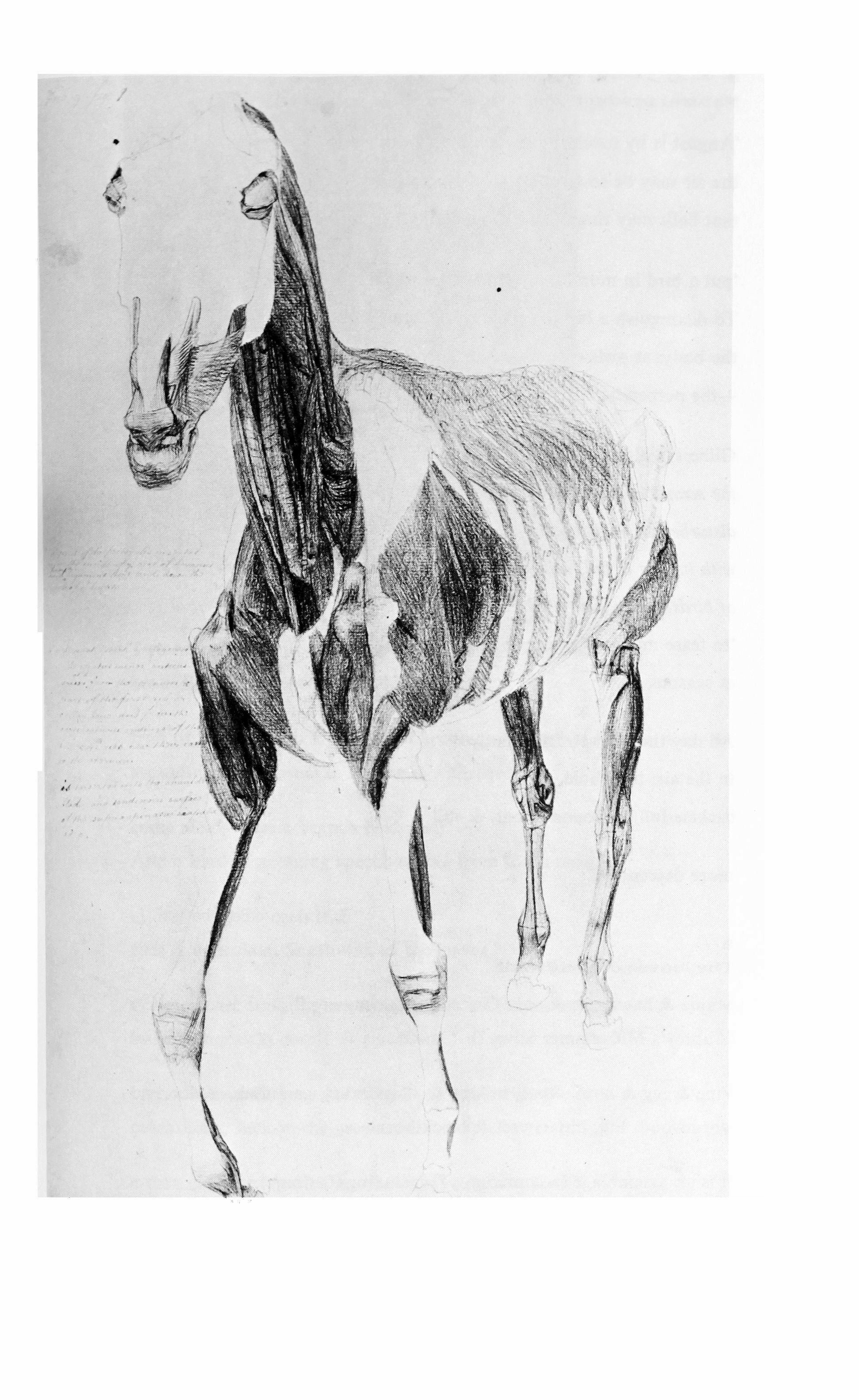
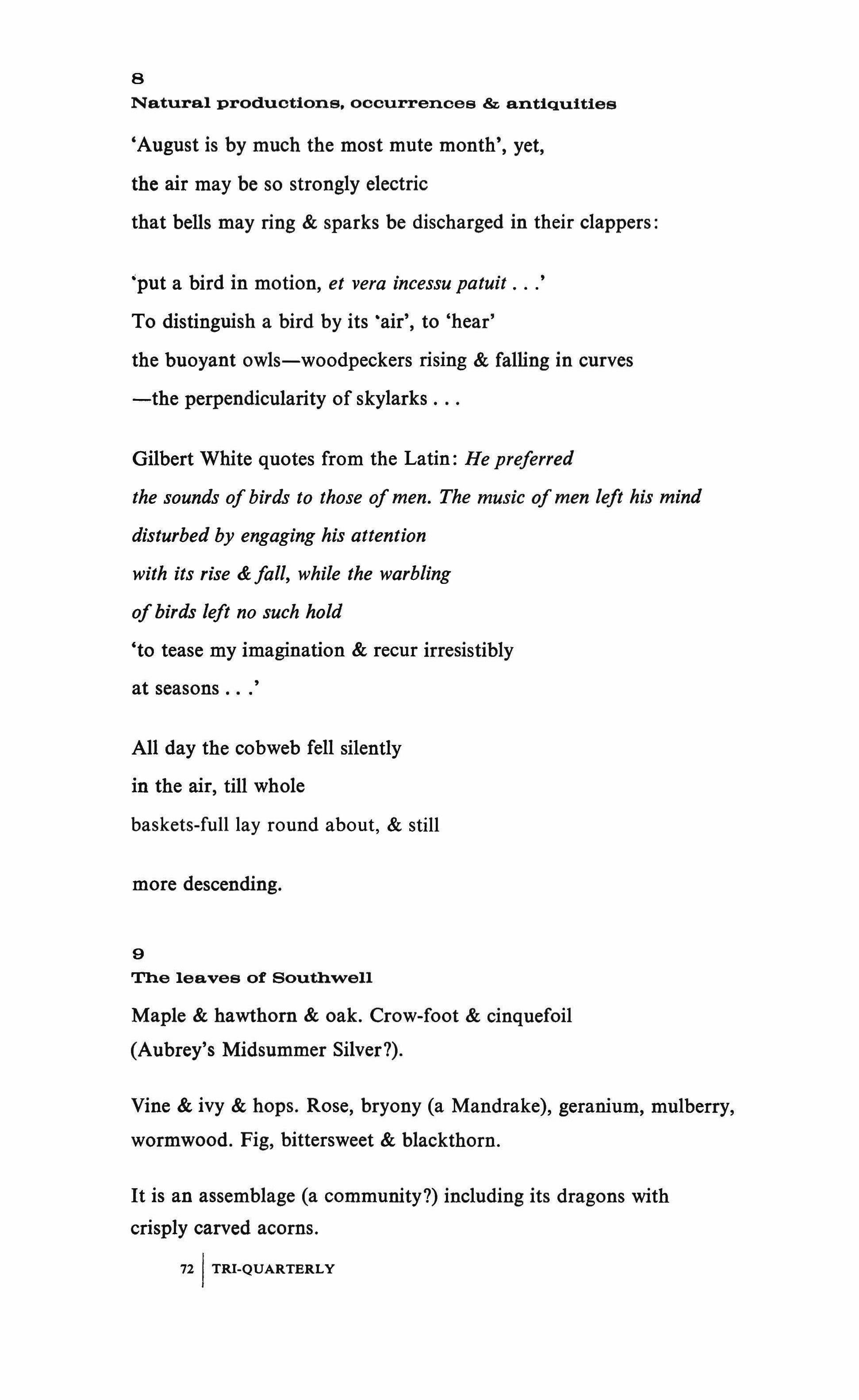
Natural productions, occurrences & antiquities
'August is by much the most mute month', yet, the air may be so strongly electric that bells may ring & sparks be discharged in their clappers:
'put a bird in motion, et vera incessu patuit
To distinguish a bird by its "air', to 'hear' the buoyant owls-woodpeckers rising & falling in curves -the perpendicularity of skylarks
Gilbert White quotes from the Latin: He preferred the sounds of birds to those of men. The music of men left his mind disturbed by engaging his attention with its rise & fall, while the warbling ofbirds left no such hold 'to tease my imagination & recur irresistibly at seasons .'
All day the cobweb fell silently in the air, till whole baskets-full lay round about, & still
more descending.
9
The leaves of Southwell
Maple & hawthorn & oak. Crow-foot & cinquefoil (Aubrey's Midsummer Silver?).
Vine & ivy & hops. Rose, bryony (a Mandrake), geranium, mulberry, wormwood. Fig, bittersweet & blackthorn.
It is an assemblage (a community?) including its dragons with crisply carved acorns.
721 TRI-QUARTERLY
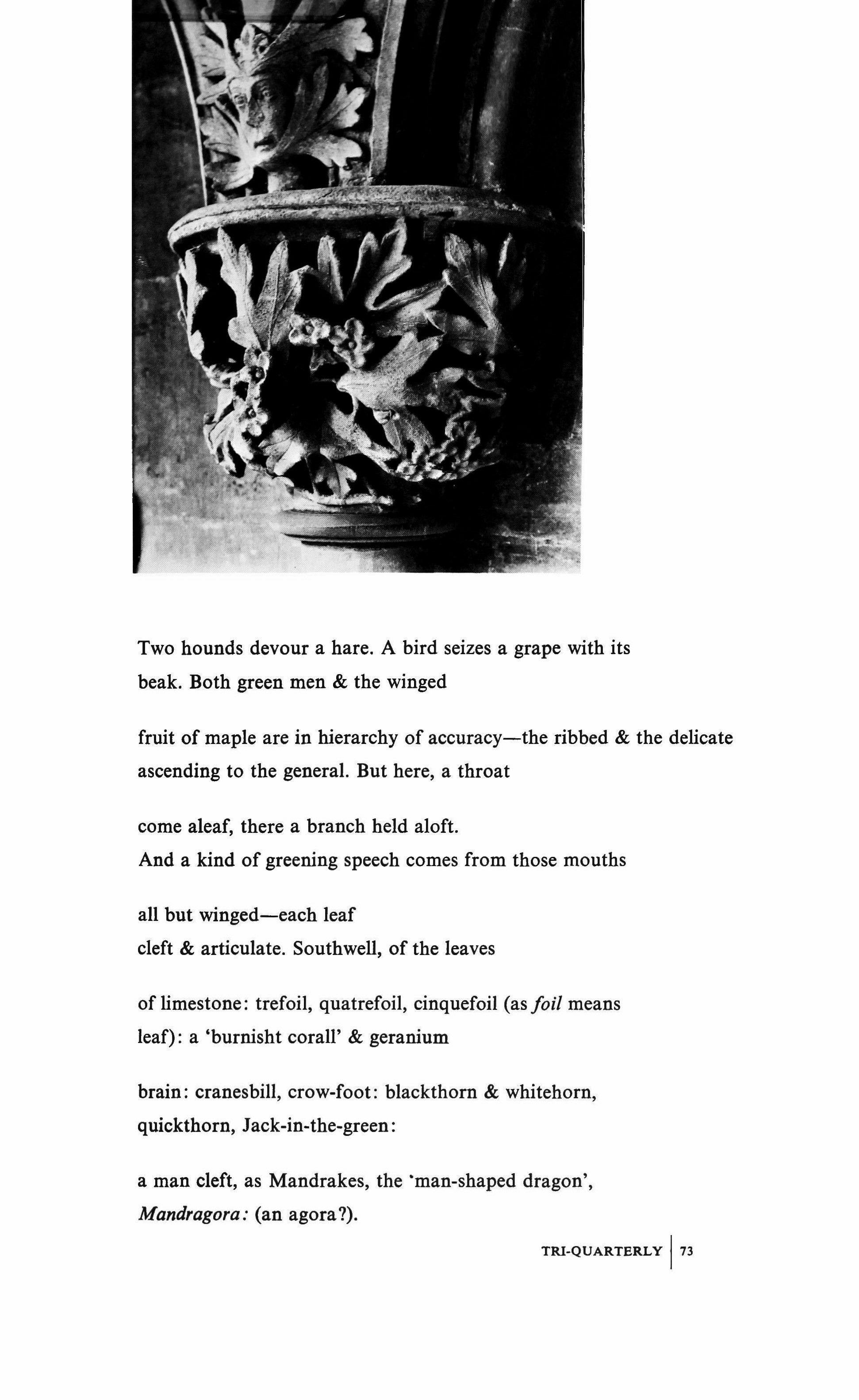
Two hounds devour a hare. A bird seizes a grape with its beak. Both green men & the winged fruit of maple are in hierarchy of accuracy-the ribbed & the delicate ascending to the general. But here, a throat
come aleaf, there a branch held aloft.
And a kind of greening speech comes from those mouths all but winged-each leaf cleft & articulate. Southwell, of the leaves
of limestone: trefoil, quatrefoil, cinquefoil (asfoil means leaf): a 'burnisht corall' & geranium
brain: cranesbill, crow-foot: blackthorn & whitehorn, quickthorn, Jack-in-the-green:
a man cleft, as Mandrakes, the "man-shaped dragon', Mandragora: (an agora?).
TRI-QUARTERLY
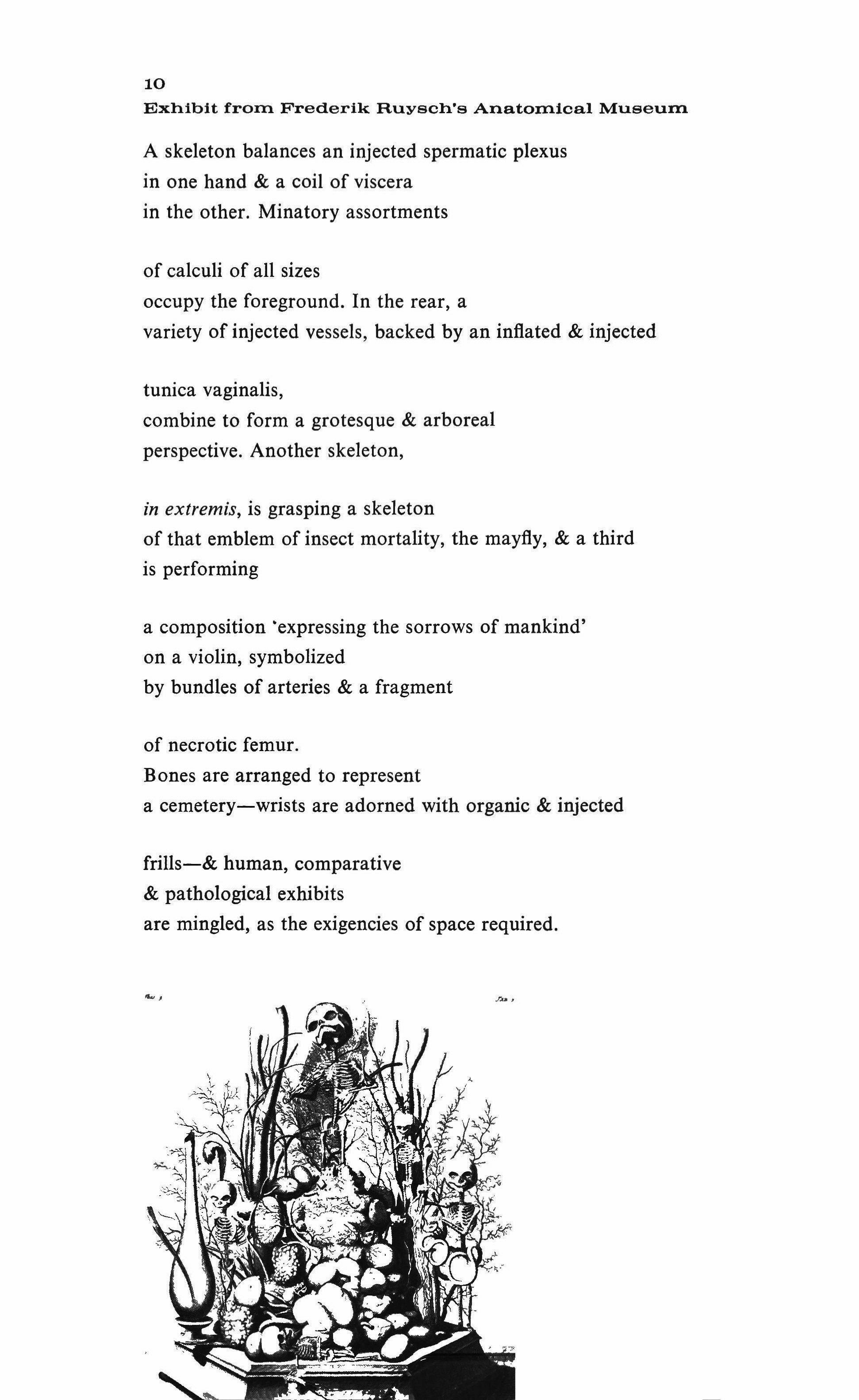 Exhibit from Frederik Ruysch's Anatomical Museum
Exhibit from Frederik Ruysch's Anatomical Museum
A skeleton balances an injected spermatic plexus in one hand & a coil of viscera in the other. Minatory assortments of calculi of all sizes occupy the foreground. In the rear, a variety of injected vessels, backed by an inflated & injected tunica vaginalis, combine to form a grotesque & arboreal perspective. Another skeleton, in extremis, is grasping a skeleton of that emblem of insect mortality, the mayfly, & a third is performing
a composition 'expressing the sorrows of mankind' on a violin, symbolized by bundles of arteries & a fragment of necrotic femur.
Bones are arranged to represent a cemetery-wrists are adorned with organic & injected frills-& human, comparative & pathological exhibits are mingled, as the exigencies of space required
1Jn1ess the humming of a gnat is as the musio of the spheres & the music of the spheres is as the humming of a gnat .' A spectre came, transparent-winged, out of the interstices of light, & shadow went up like smoke & everywhere the hills were as clouds over valleys of water, rippling & reverberating.
And before him the sands of the beach swarmed as insects, close-knit in electrical flight 'For MATTER is the dust of the Earth, every atom of which is the life.
For the flames of fire may be blown thro musical pipes'.
And everywhere the hills were as clouds over valleys of water, rippling & reverberating.

12
What the light told me
It is now a circle, now a spiral or wheel.
It merges with the eye, with a wing or a sickle-shaped horn. It takes on the form of beasts-a dragon, fish or bird.
As an orb, at summer solstice, it balances on the altar-stone at Stonehenge-
TRI-QDARTERLY /75
& as beam, expands, elongates, twists & 'attenuates itself into leafen gold as a covering for the quince'.
With arc & parabolic & serpent-oblique-'musical in ocular harmony'. Expanding, elongating, twisting & attenuating.
An encompassing eye.
Within and out, round as a ballWith hither and thither, as straight as a line. Slight as a fox-whisker, sickled & spiraled as chicory-flower.
Within and out, round as a ballWith hither and thither, as straight as a line. With lily, germander And sops-in-wine. With sweet-briar and Bon-fire and strawberry wire And columbine.
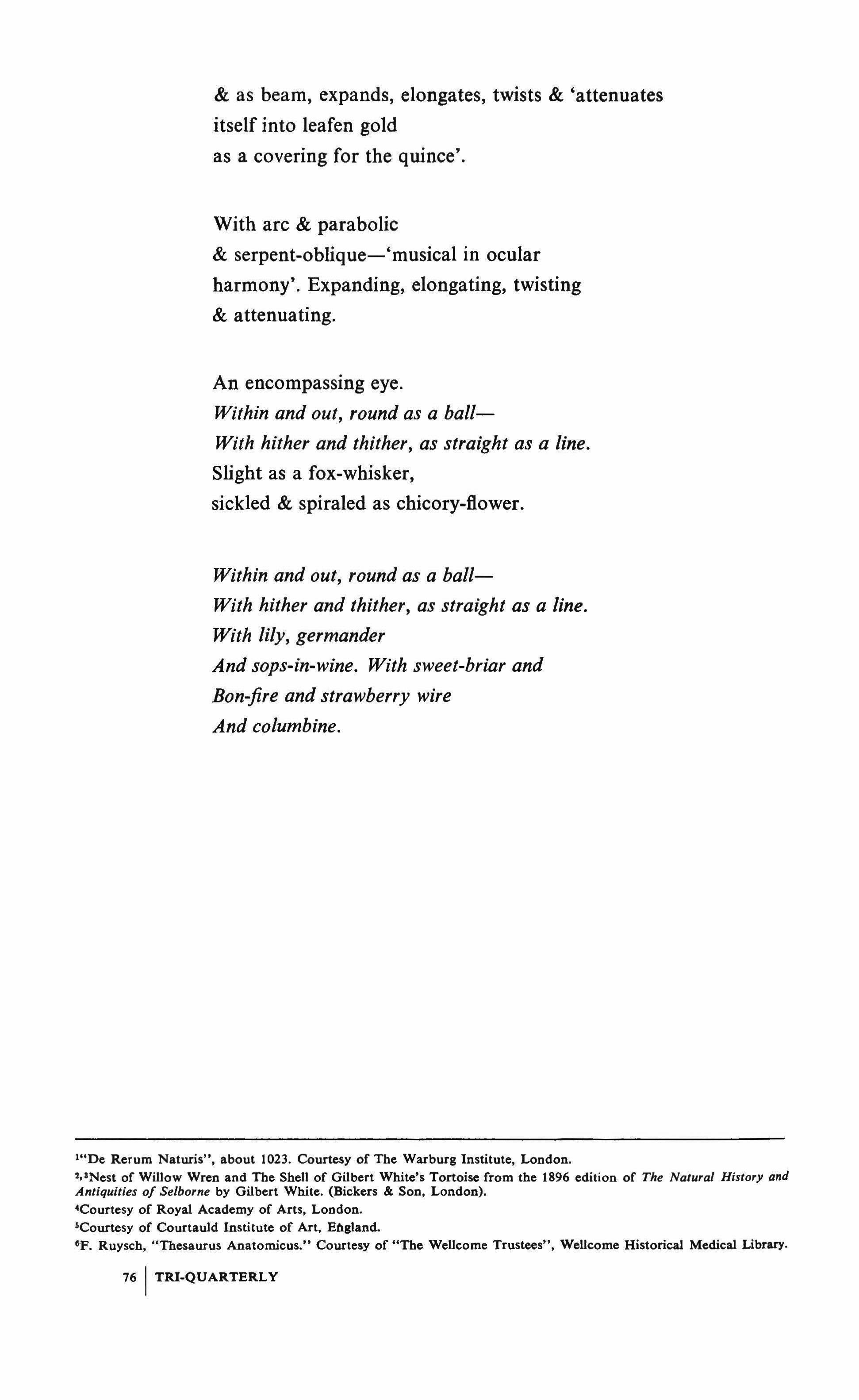
l"De Rerum Naturis", about 1023. Courtesy of The Warburg Institute, London.
2,'Nest of Willow Wren and The Shell of Gilbert White's Tortoise from the 1896 edition of The Natural History and Antiquities of Selborne by Gilbert White. (Bickers & Son, London). 'Courtesy of Royal Academy of Arts, London. 'Courtesy of Courtauld Institute of Art, Etlgland.
�F. Ruysch, "Thesaurus Anatomicus." Courtesy of "The Wellcome Trustees", Wellcome Historical Medical Library.
76 I TRI-QUARTERLY
Translated by Peter Viereck
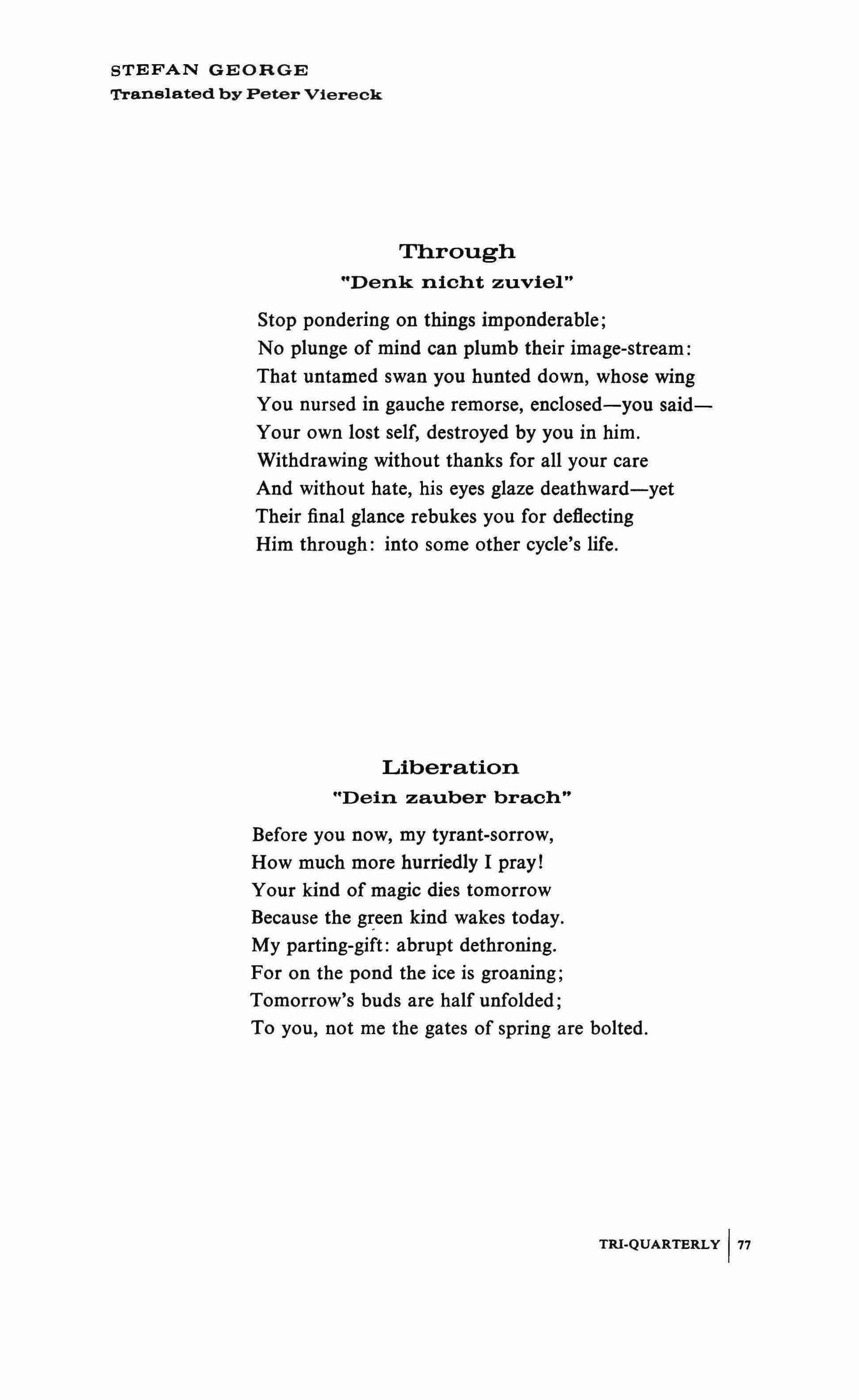
Stop pondering on things imponderable; No plunge of mind can plumb their image-stream: That untamed swan you hunted down, whose wing You nursed in gauche remorse, enclosed-you saidYour own lost self, destroyed by you in him.
Withdrawing without thanks for all your care And without hate, his eyes glaze deathward-yet Their final glance rebukes you for deflecting Him through: into some other cycle's life.
Before you now, my tyrant-sorrow, How much more hurriedly I pray! Your kind of magic dies tomorrow Because the g�een kind wakes today. My parting-gift: abrupt dethroning. For on the pond the ice is groaning; Tomorrow's buds are half unfolded; To you, not me the gates of spring are bolted.
Sudlicher Strand: BuchtOO
Long, long I roamed the coast line, where it shields Pearled strings of cities, only I unanchored, Seeking some hearth to spread the wedding banquet. The homeless leaves for open fields.
Each time I circle round the same old bridges (Not wiser but more bitter at the core)
I let old hope entice me just once more; I haunt a gate that never budges.
When couples twirl in ball-room vertigo (Their brows adorned more flowery than arbors) I trail the wretched prowlers of the harbors.
To walk alone has hurt me so.
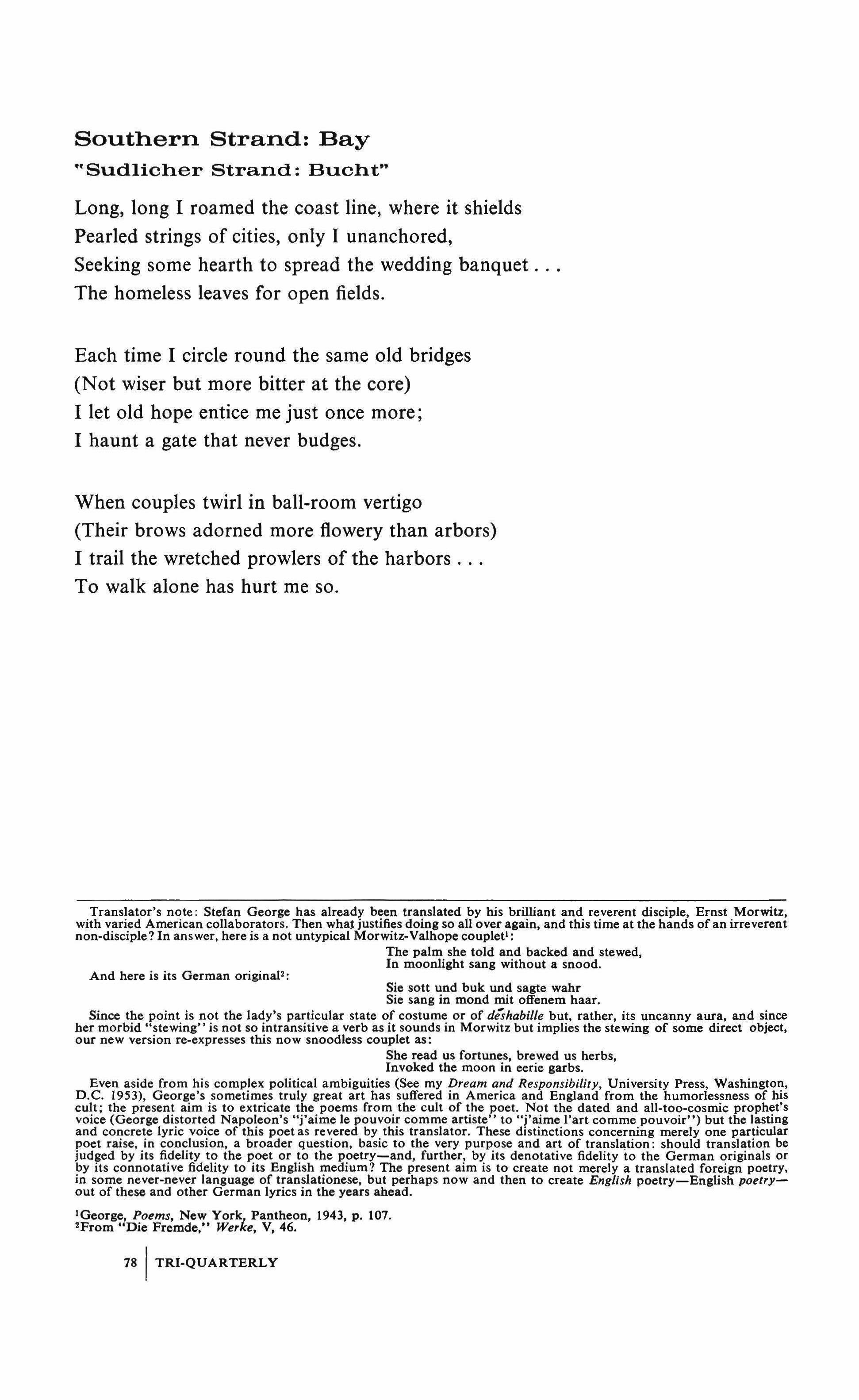
Translator's note: Stefan George has already been translated by his brilliant and reverent disciple, Ernst Morwitz, with varied American collaborators. Then what justifies doing so all over again, and this time at the hands of an irreverent non-disciple? In answer, here is a not untypical Morwitz-Valhope couplet':
And here is its German original':
The palm she told and backed and stewed, In moonlight sang without a snood.
Sie sott und buk und sagte wahr Sie sang in mond mit offenem haar.
Since the point is not the lady's particular state of costume or of deshabille but, rather, its uncanny aura, and since her morbid "stewing" is not so intransitive a verb as it sounds in Morwitz but implies the stewing of some direct object, our new version re-expresses this now snoodless couplet as:
She read us fortunes, brewed us herbs, Invoked the moon in eerie garbs.
Even aside from his complex political ambiguities (See my Dream and Responsibility, University Press, Washington, D.C. 1953), George's sometimes truly great art has suffered in America and England from the humorlessness of his cult; the present aim is to extricate the poems from the cult of the poet. Not the dated and all-too-cosmic prophet's voice (George distorted Napoleon's "j'aime Ie pouvoir comme artiste" to "j'aime I'art comme pouvoir") but the lasting and concrete lyric voice of this poet as revered by this translator. These distinctions concerning merely one particular poet raise, in conclusion, a broader question, basic to the very purpose and art of translation: should translation be judged by its fidelity to the poet or to the poetry-and, further, by its denotative fidelity to the German originals or by its connotative fidelity to its English medium? The present aim is to create not merely a translated foreign poetry, in some never-never language of translationese, but perhaps now and then to create English poetry-English poetryout of these and other German lyrics in the years ahead.
'George, Poems, New York, Pantheon, 1943, p. 107.
'From "Die Fremde," WerKe, V, 46. 781 TRI-QUARTERLY
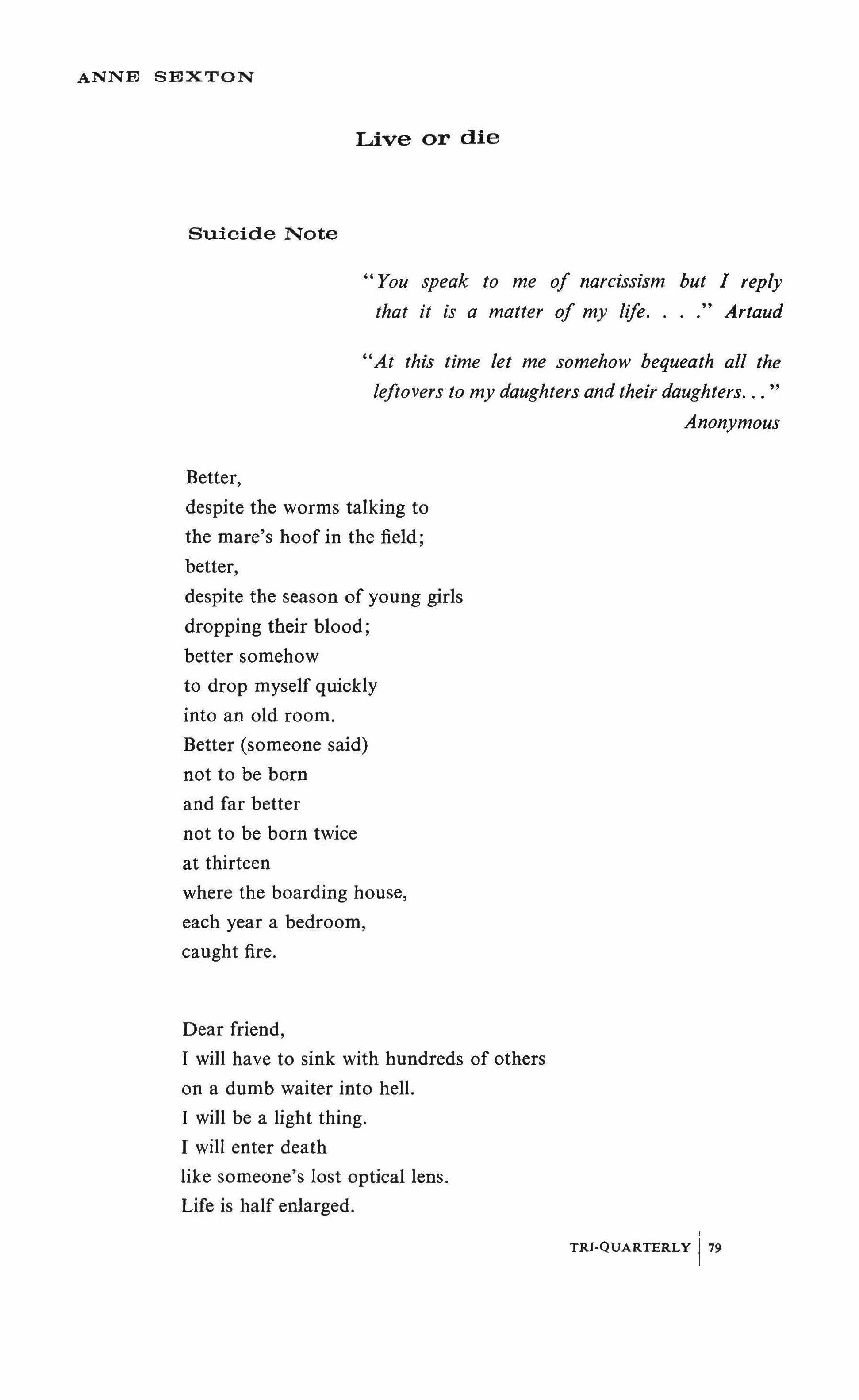
"You speak to me of narcissism but I reply that it is a matter of my life.. "Artaud
"At this time let me somehow bequeath all the leftovers to my daughters and their daughters Anonymous
Better, despite the worms talking to the mare's hoof in the field; better, despite the season of young girls dropping their blood; better somehow to drop myself quickly into an old room. Better (someone said) not to be born and far better not to be born twice at thirteen where the boarding house, each year a bedroom, caught fire.
Dear friend, I will have to sink with hundreds of others on a dumb waiter into hell. I will be a light thing. I will enter death like someone's lost optical lens. Life is half enlarged.
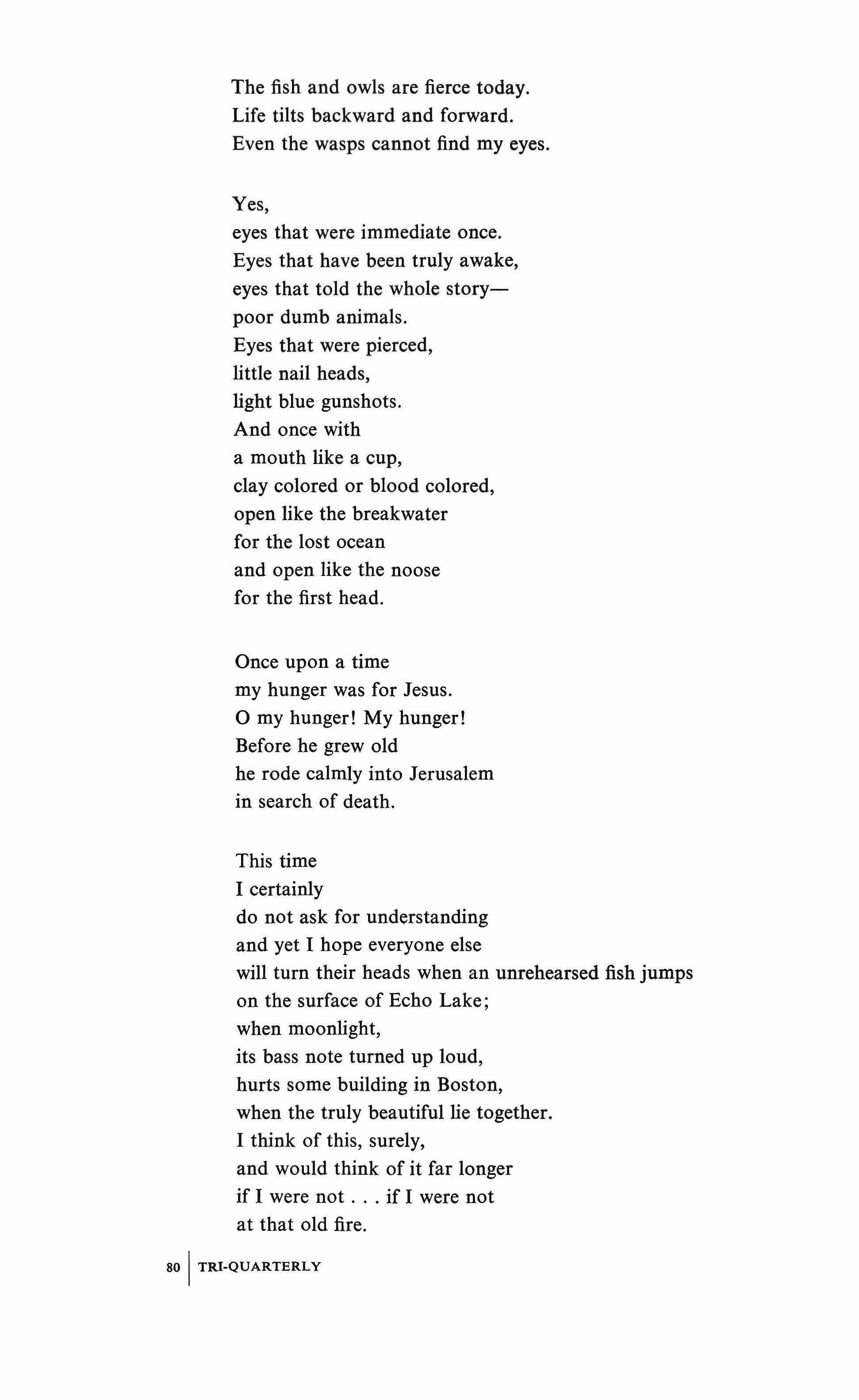
The fish and owls are fierce today. Life tilts backward and forward. Even the wasps cannot find my eyes.
Yes,
eyes that were immediate once. Eyes that have been truly awake, eyes that told the whole storypoor dumb animals. Eyes that were pierced, little nail heads, light blue gunshots. And once with a mouth like a cup, clay colored or blood colored, open like the breakwater for the lost ocean and open like the noose for the first head.
Once upon a time my hunger was for Jesus. o my hunger! My hunger! Before he grew old he rode calmly into Jerusalem in search of death.
This time I certainly do not ask for understanding and yet I hope everyone else will tum their heads when an unrehearsed fish jumps on the surface of Echo Lake; when moonlight, its bass note turned up loud, hurts some building in Boston, when the truly beautiful lie together. I think of this, surely, and would think of it far longer if I were not if I were not at that old fire.
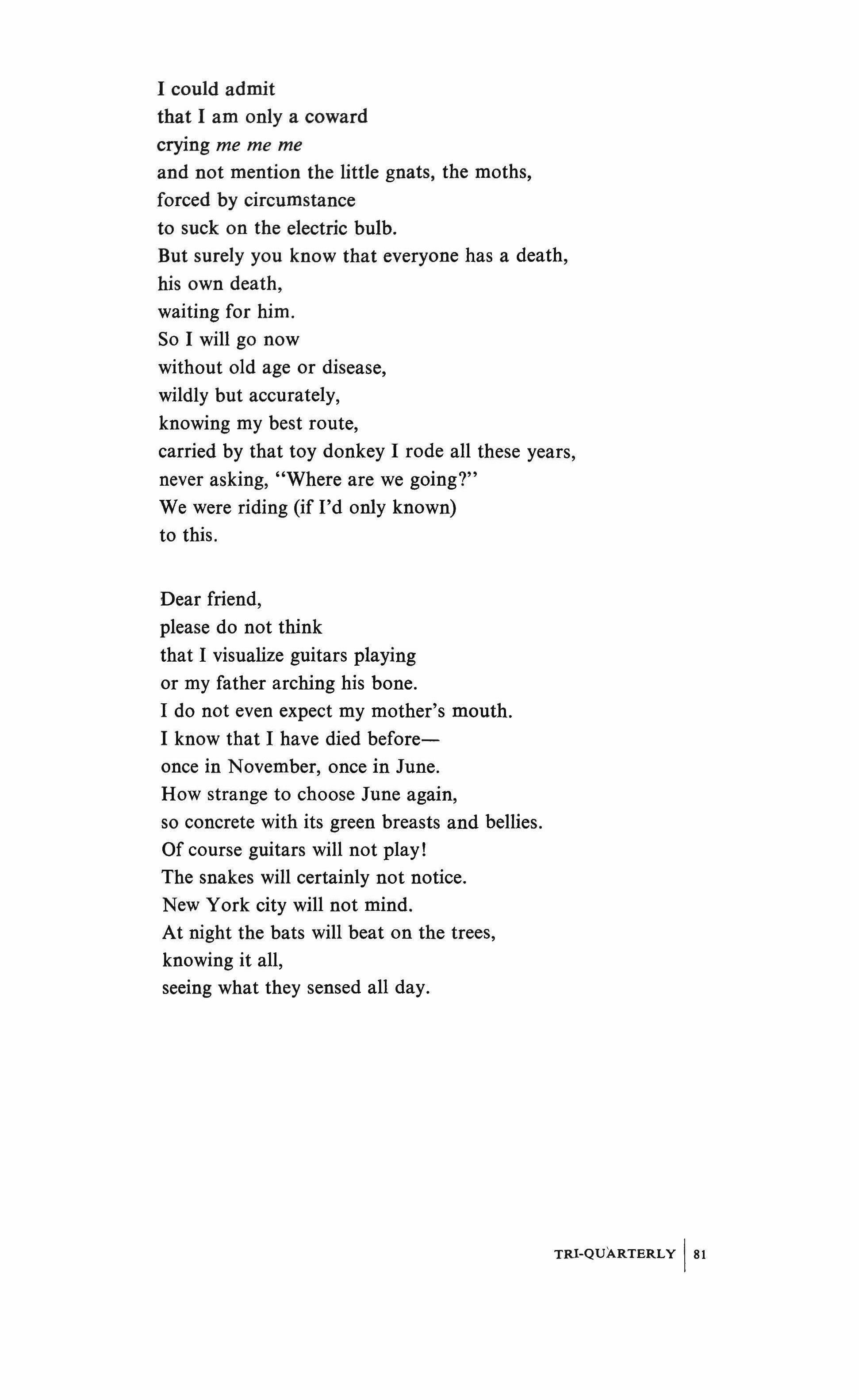
I could admit that I am only a coward crying me me me and not mention the little gnats, the moths, forced by circumstance to suck on the electric bulb. But surely you know that everyone has a death, his own death, waiting for him. So I will go now without old age or disease, wildly but accurately, knowing my best route, carried by that toy donkey I rode all these years, never asking, "Where are we going?" We were riding (if I'd only known) to this.
Dear friend, please do not think that I visualize guitars playing or my father arching his bone. I do not even expect my mother's mouth. I know that I have died beforeonce in November, once in June. How strange to choose June again, so concrete with its green breasts and bellies. Of course guitars will not play! The snakes will certainly not notice. New York city will not mind. At night the bats will beat on the trees, knowing it all, seeing what they sensed all day.
Sleepmonger, deathmonger, with capsules in my palms each night, eight at a time from sweet pharmaceutical bottles I make arrangements for a pint-sized journey.
I'm the queen of this condition.
I'm an expert on making the trip and now they say I'm an addict. Now they ask why. Why!
Don't they know that I promised to die!
I'm keeping in practice. I'm merely staying in shape. The pills are a mother, but better, every color and as good as sour balls. I'm on a diet from death.
Yes, I admit it has gotten to be a bit of a habitblows eight at a time, socked in the eye, hauled away by the pink, the orange, the green and the white goodnights. I'm becoming something of a chemical mixture.
That's it!
My supply of tablets has got to last for years and years. I like them more than I like me.
Stubborn as hell, they won't let go. It's a kind of marriage. It's a kind of war where I plant bombs inside of myself.
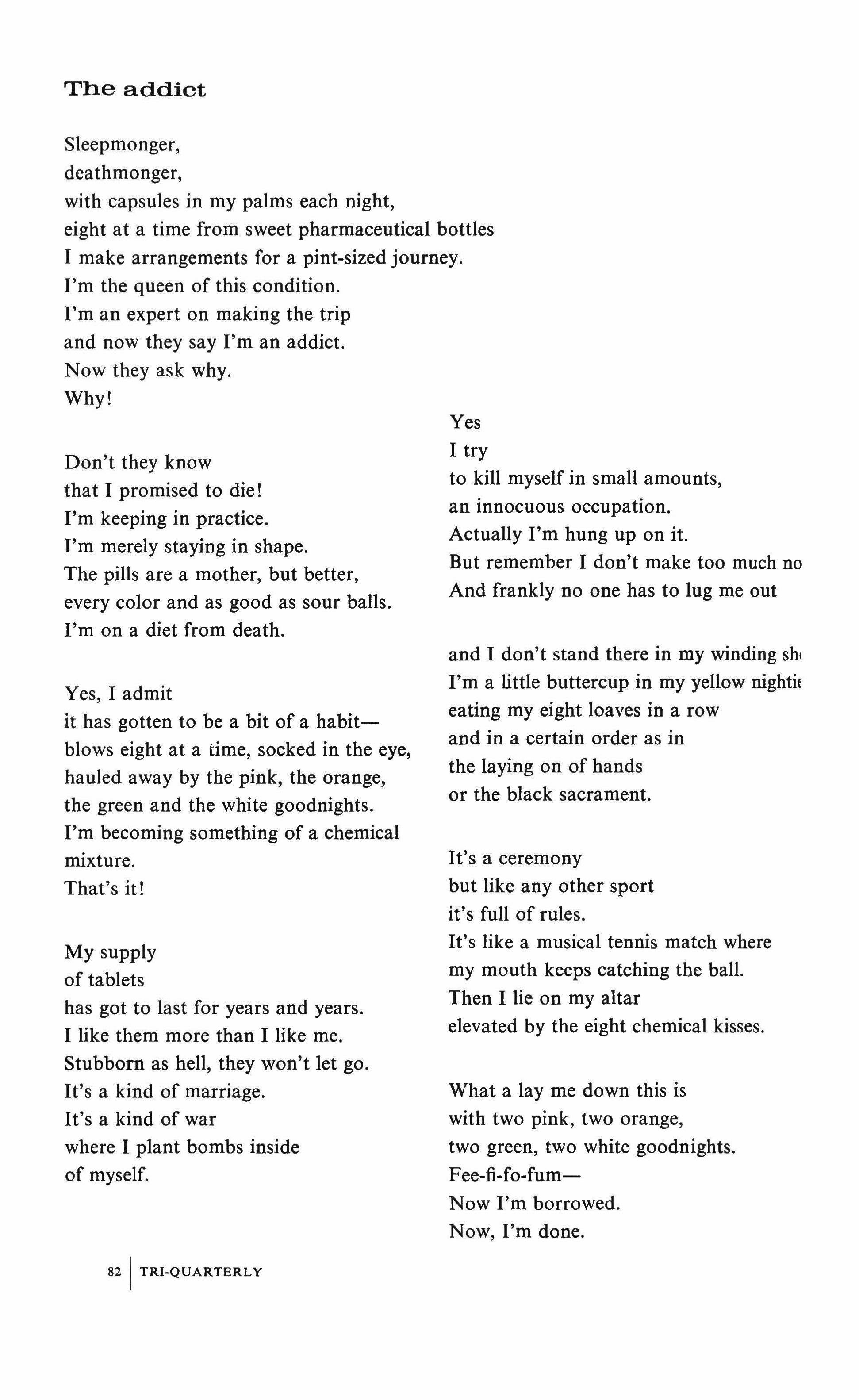
821 TRI-QUARTERLY
Yes
I try to kill myself in small amounts, an innocuous occupation. Actually I'm hung up on it.
But remember I don't make too much no And frankly no one has to lug me out
and I don't stand there in my winding sh: I'm a little buttercup in my yellow nightie eating my eight loaves in a row and in a certain order as in the laying on of hands or the black sacrament.
It's a ceremony but like any other sport it's full of rules.
It's like a musical tennis match where my mouth keeps catching the ball. Then I lie on my altar elevated by the eight chemical kisses.
What a lay me down this is with two pink, two orange, two green, two white goodnights. Fee-fi-fo-fumNow I'm borrowed. Now, I'm done.
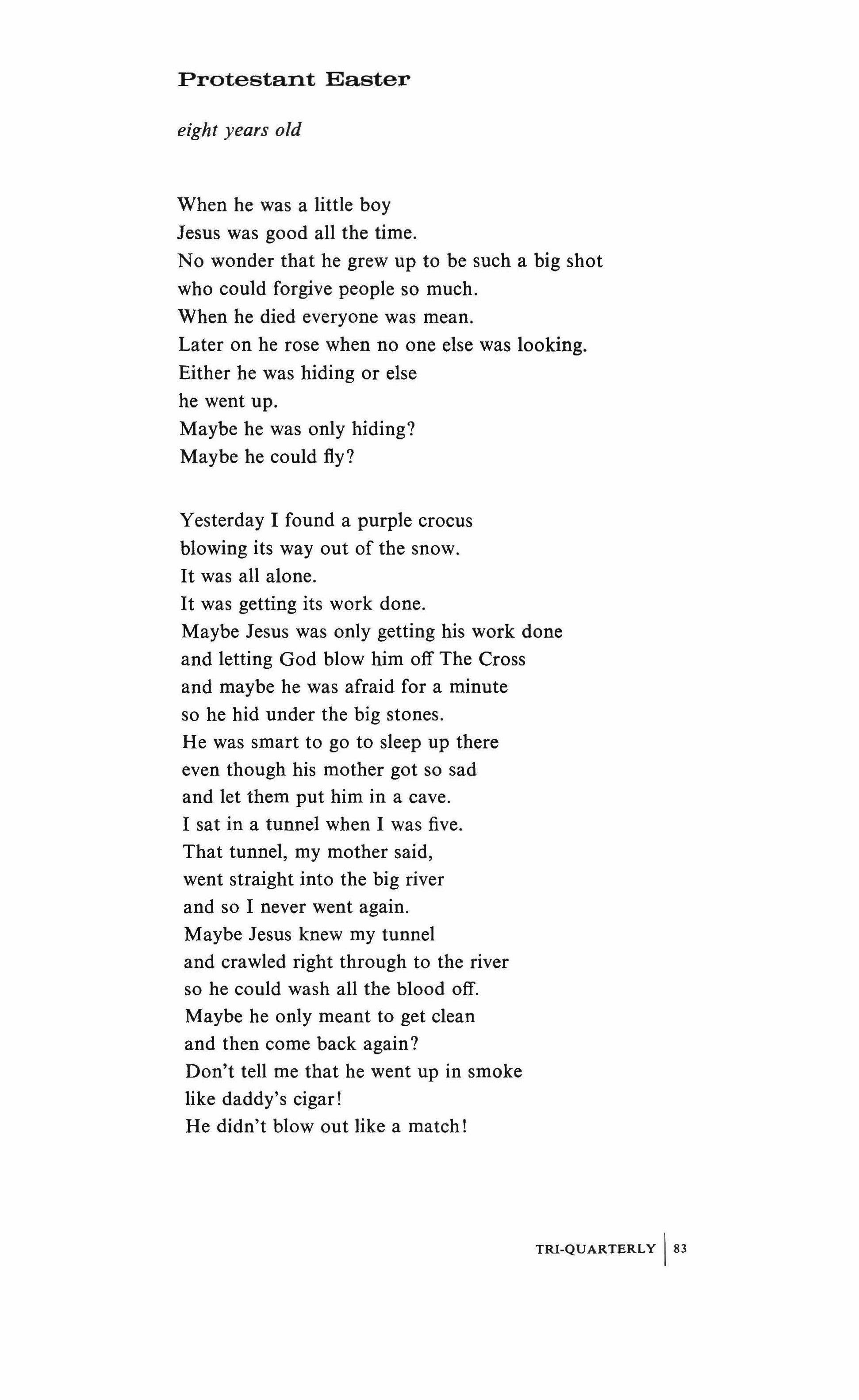
eight years old
When he was a little boy Jesus was good all the time. No wonder that he grew up to be such a big shot who could forgive people so much. When he died everyone was mean. Later on he rose when no one else was looking. Either he was hiding or else he went up. Maybe he was only hiding? Maybe he could fly?
Yesterday I found a purple crocus blowing its way out of the snow. It was all alone. It was getting its work done. Maybe Jesus was only getting his work done and letting God blow him off The Cross and maybe he was afraid for a minute so he hid under the big stones. He was smart to go to sleep up there even though his mother got so sad and let them put him in a cave.
I sat in a tunnel when I was five. That tunnel, my mother said, went straight into the big river and so I never went again. Maybe Jesus knew my tunnel and crawled right through to the river so he could wash all the blood off. Maybe he only meant to get clean and then come back again?
Don't tell me that he went up in smoke like daddy's cigar! He didn't blowout like a match! TRI-QUARTERLY
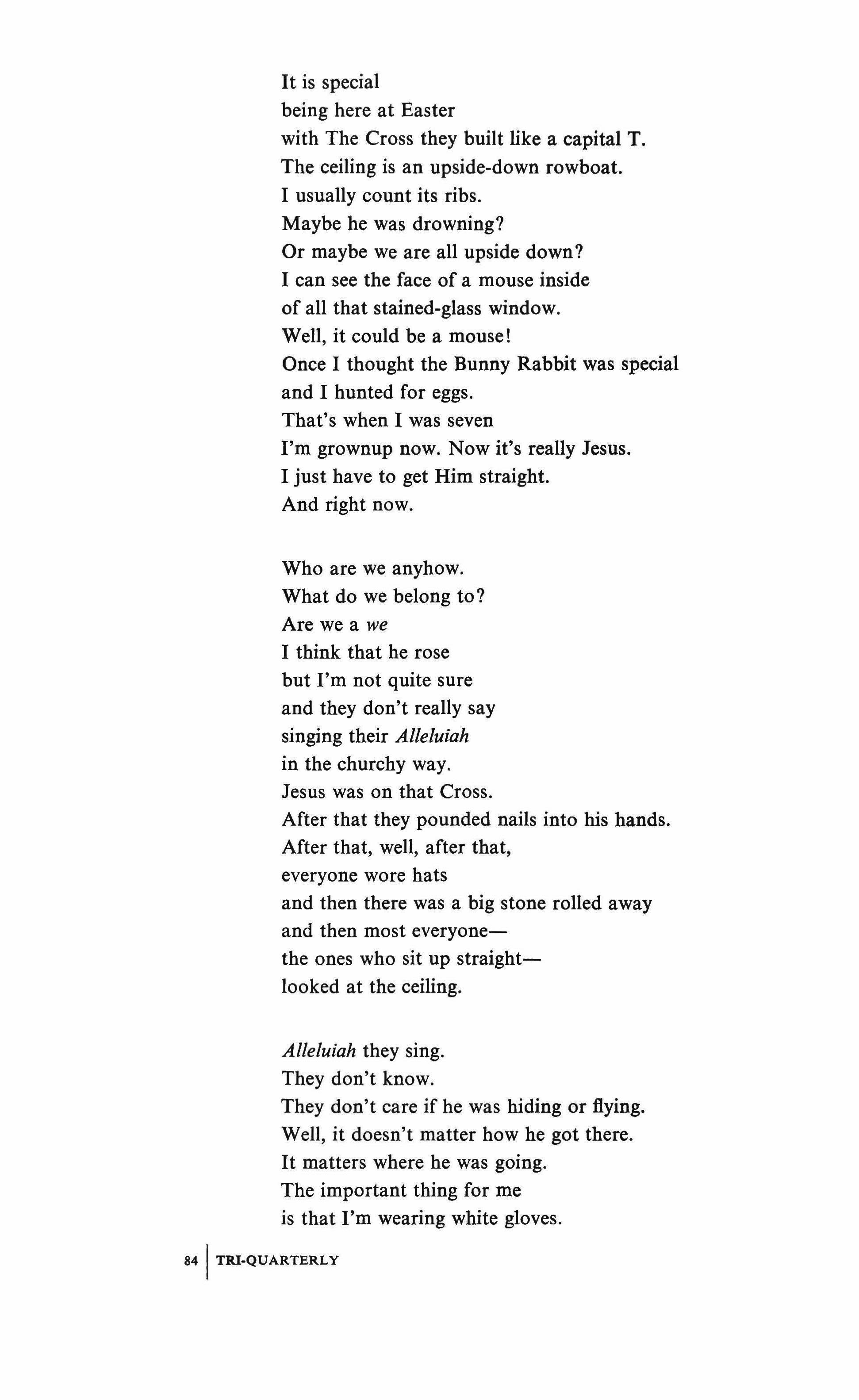
It is special being here at Easter with The Cross they built like a capital T. The ceiling is an upside-down rowboat. I usually count its ribs. Maybe he was drowning? Or maybe we are all upside down? I can see the face of a mouse inside of all that stained-glass window. Well, it could be a mouse! Once I thought the Bunny Rabbit was special and I hunted for eggs. That's when I was seven I'm grownup now. Now it's really Jesus. I just have to get Him straight. And right now.
Who are we anyhow. What do we belong to?
Are we a we I think that he rose but I'm not quite sure and they don't really say singing their Alleluiah in the churchy way. Jesus was on that Cross. After that they pounded nails into his hands. After that, well, after that, everyone wore hats and then there was a big stone rolled away and then most everyonethe ones who sit up straightlooked at the ceiling.
Alleluiah they sing. They don't know. They don't care if he was hiding or flying. Well, it doesn't matter how he got there. It matters where he was going. The important thing for me is that I'm wearing white gloves.
TRI-QUARTERLY
I always sit straight. I keep on looking at the ceiling. And about Jesus, they couldn't be sure of it, not so sure of it anyhow,. so they decided to become Protestants. Those are the people that sing when they aren't quite sure.
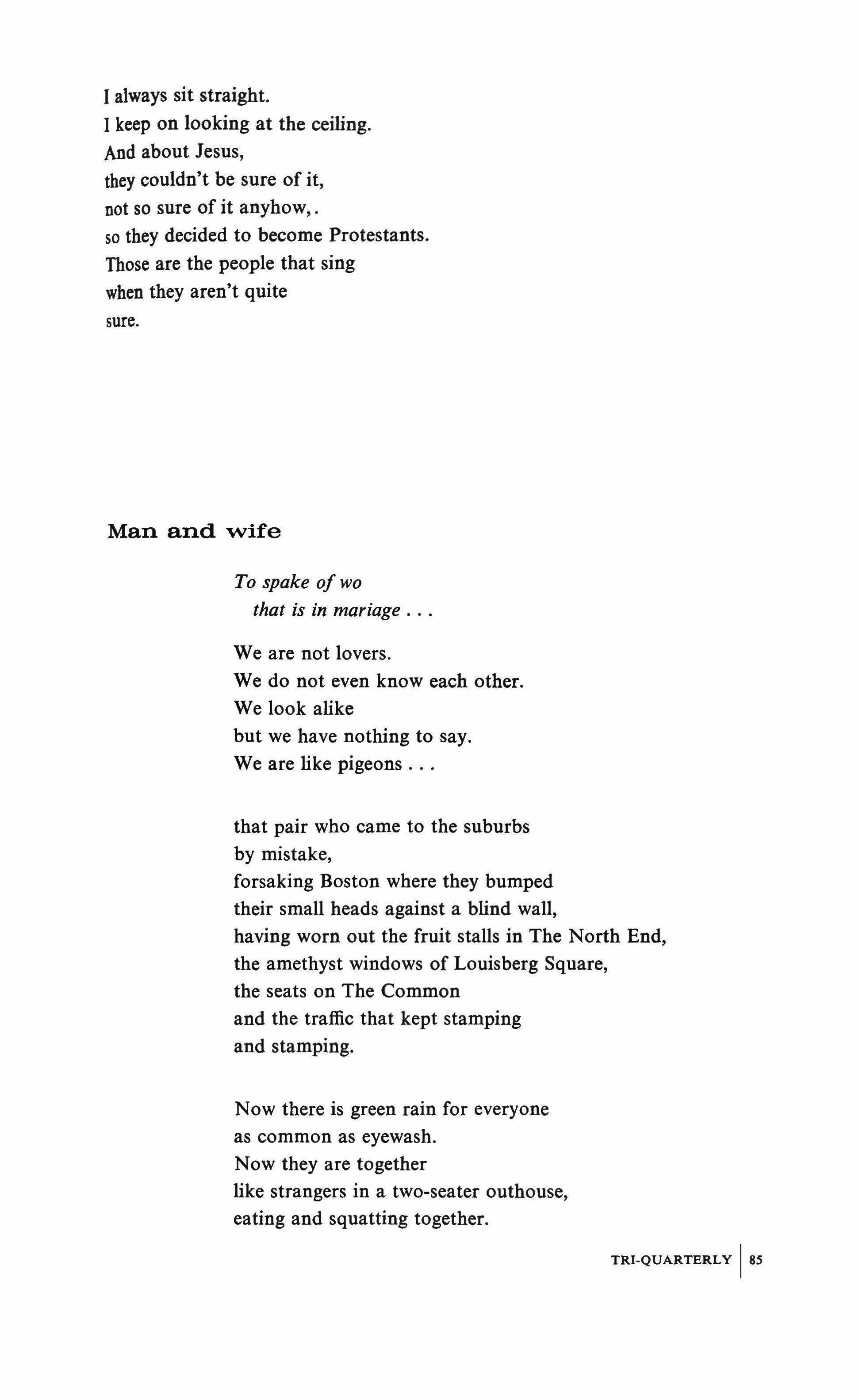
Man and wife
To spake of wo that is in mariage
We are not lovers. We do not even know each other. We look alike but we have nothing to say. We are like pigeons
that pair who came to the suburbs by mistake, forsaking Boston where they bumped their small heads against a blind wall, having worn out the fruit stalls in The North End, the amethyst windows of Louisberg Square, the seats on The Common and the traffic that kept stamping and stamping.
Now there is green rain for everyone as common as eyewash. Now they are together like strangers in a two-seater outhouse, eating and squatting together.
TRI-QUARTERLY
I knew I was a cripple. Of course, I'd known it from the start. My father took the crowbar and broke that wringer's heart.
The surgeons shook their heads. They really didn't knowWould the cripple inside of me be a cripple that would show?
My father was a perfect man, clean and rich and fat. My mother was a brilliant thing. She was good at that.
You hold me in your arms. How strange that you're so tender! Child-woman that I am, you think that you can mend her.
As for the arm, unfortunately it grew. Though mother said a withered arm would put me in Who's Who.
For years she described it. She sang it like a hymn. By then she loved the shrunken thing, my little withered limb.
My father's cells clicked each night, intent on making money. And as for my cells, the brooded, little queens, on honey.
On boys too, as a matter of fact, and cigarettes and cars. Mother frowned at my wasted life. My father smoked cigars.
881 TRl-QUARTERLY
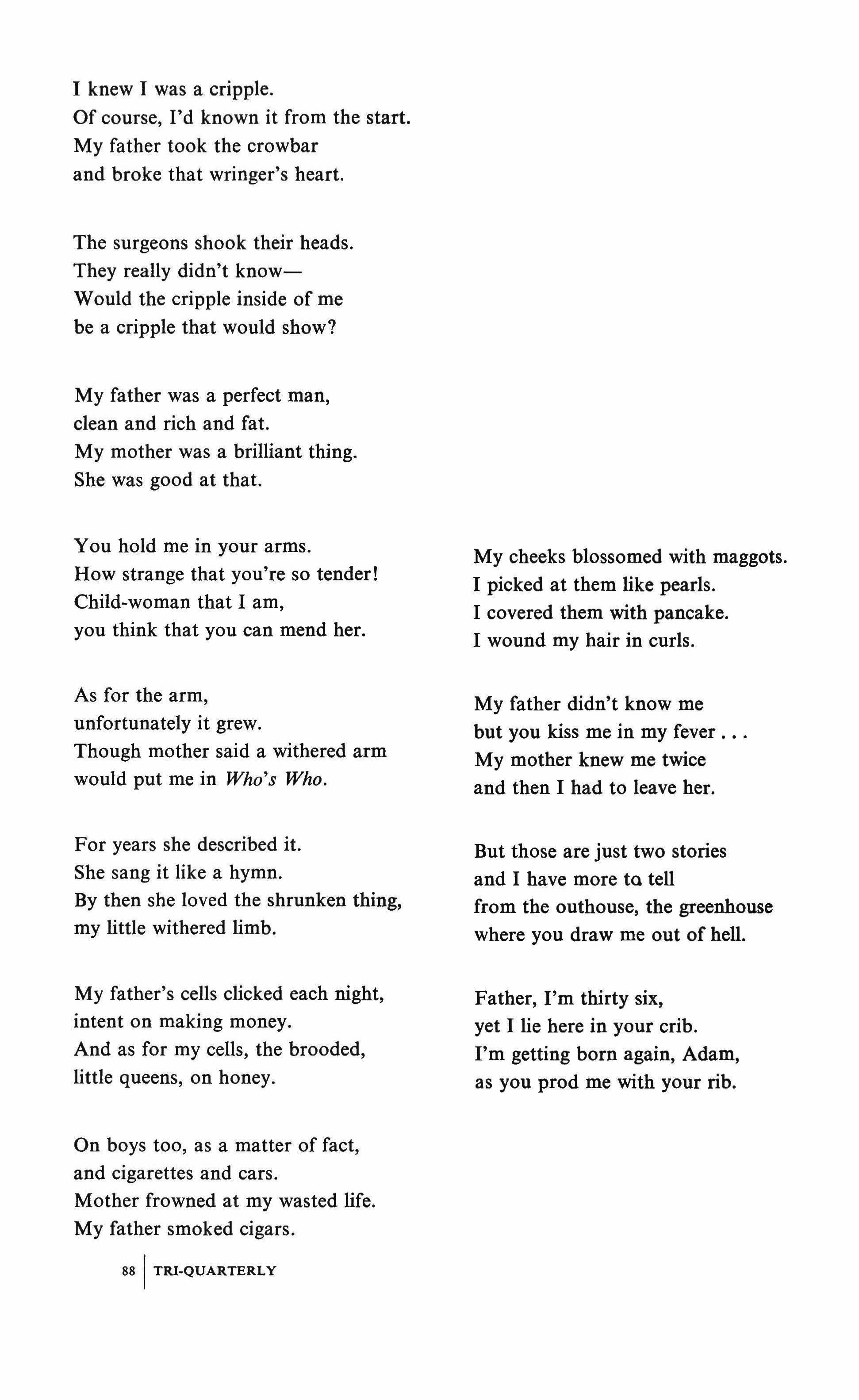
My cheeks blossomed with maggots. I picked at them like pearls. I covered them with pancake. I wound my hair in curls.
My father didn't know me but you kiss me in my fever My mother knew me twice and then I had to leave her.
But those are just two stories and I have more to tell from the outhouse, the greenhouse where you draw me out of hell.
Father, I'm thirty six, yet I lie here in your crib. I'm getting born again, Adam, as you prod me with your rib.
"Live or die, but don't poison everything SAUL BELWW
Well, death's been here for a long timeit has a hell of a lot to do with hell and suspicion of the eye and the religious objects and how I mourned them when they were made obscene by my dwarf-heart's doodle. The chief ingredient is mutilation. And mud, day after day, mud like a ritual and the baby on the platter, cooked but still human cooked also with little maggots, sewn onto it maybe by somebody's mother, the damn bitch!
Even so, I kept right on going on, a sort of human statement, lugging myself as if I were a sawed off body in the trunk, the steamer trunk. This became a perjury of the soul. It became an outright lie and even though I dressed the body it was still naked, still killed. It was caught in the first place at birth, like a fish.
But I played it, dressed it up, dressed it up like somebody's doll. Is life something you play? And all the time wanting to get rid of it? And further, everyone yelling at you to shut up. And no wonder!
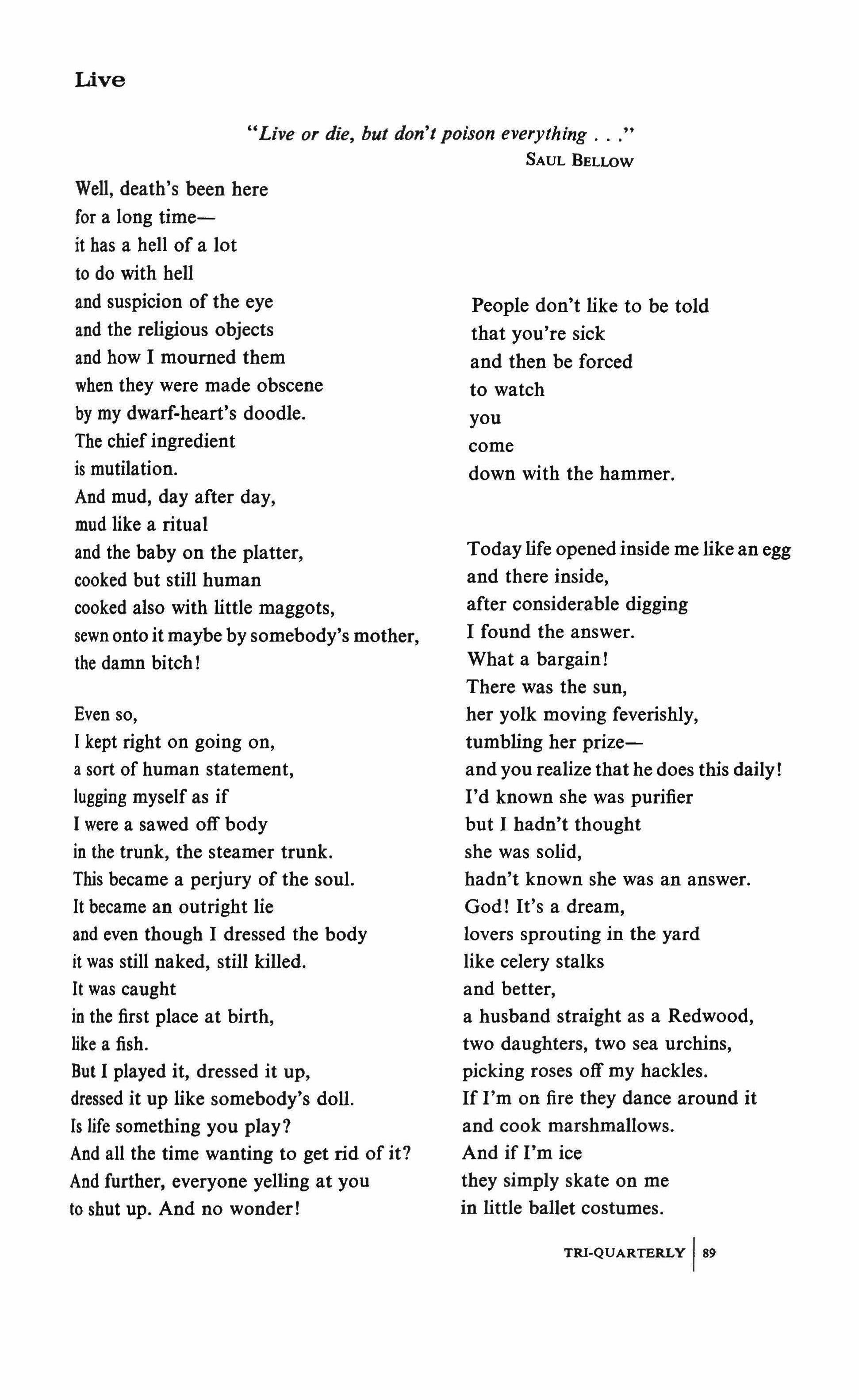
People don't like to be told that you're sick and then be forced to watch you come down with the hammer.
Today life opened inside me like an egg and there inside, after considerable digging I found the answer. What a bargain! There was the sun, her yolk moving feverishly, tumbling her prizeand you realize that he does this daily! I'd known she was purifier but I hadn't thought she was solid, hadn't known she was an answer. God! It's a dream, lovers sprouting in the yard like celery stalks and better, a husband straight as a Redwood, two daughters, two sea urchins, picking roses off my hackles. If I'm on fire they dance around it and cook marshmallows. And if I'm ice they simply skate on me in little ballet costumes.
TRI-QUARTERLY
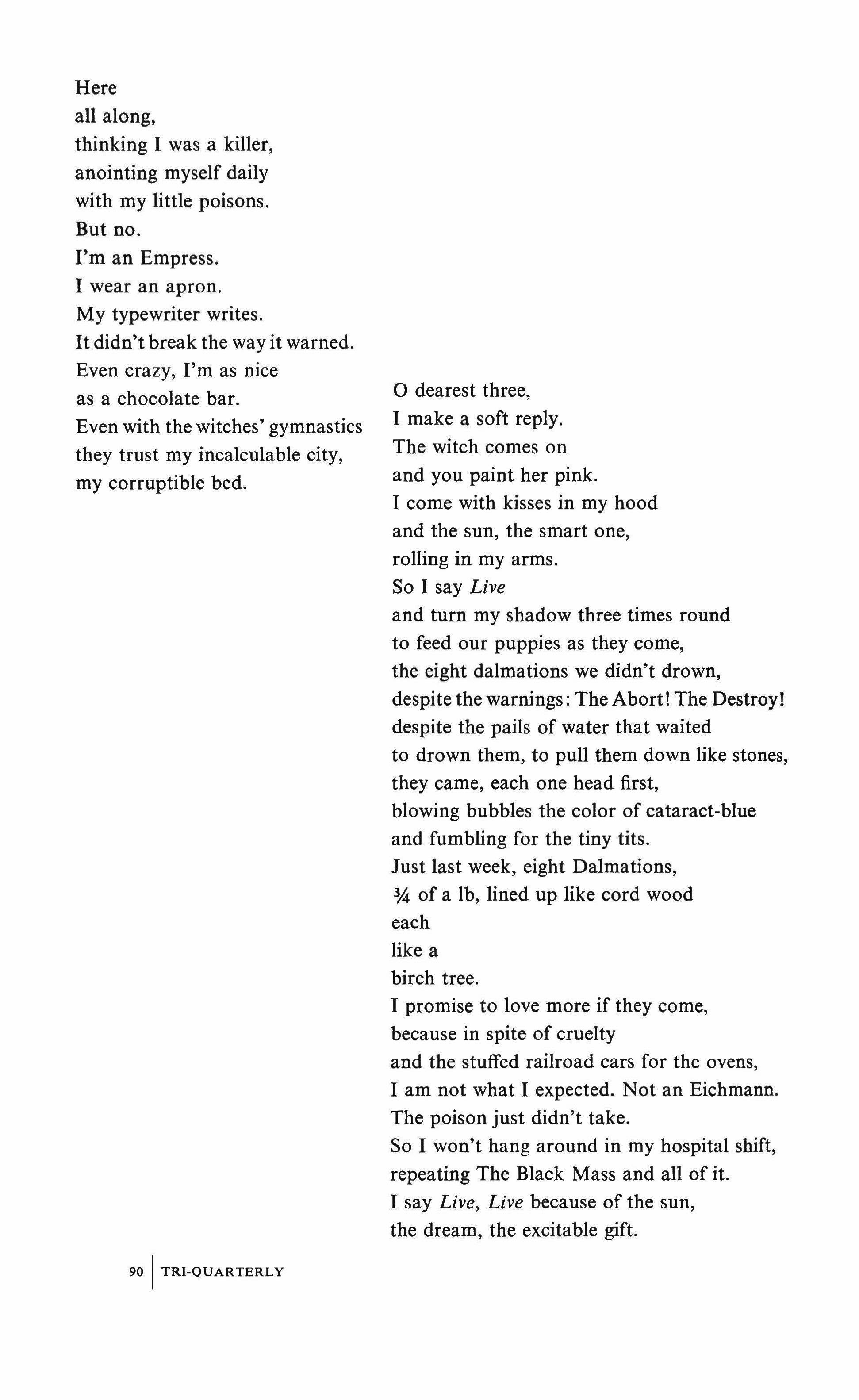
Here all along, thinking I was a killer, anointing myself daily with my little poisons. But no.
I'm an Empress. I wear an apron. My typewriter writes. It didn't break the way it warned. Even crazy, I'm as nice as a chocolate bar. Even with the witches' gymnastics they trust my incalculable city, my corruptible bed. 90 TRI-QUARTERLY
o dearest three, I make a soft reply. The witch comes on and you paint her pink.
I come with kisses in my hood and the sun, the smart one, rolling in my arms.
So I say Live and turn my shadow three times round to feed our puppies as they come, the eight dalmations we didn't drown, despite the warnings: The Abort! The Destroy! despite the pails of water that waited to drown them, to pull them down like stones, they came, each one head first, blowing bubbles the color of cataract-blue and fumbling for the tiny tits. Just last week, eight Dalmations, * of a lb, lined up like cord wood each like a birch tree.
I promise to love more if they come, because in spite of cruelty and the stuffed railroad cars for the ovens, I am not what I expected. Not an Eichmann. The poison just didn't take. So I won't hang around in my hospital shift, repeating The Black Mass and all of it.
I say Live, Live because of the sun, the dream, the excitable gift.
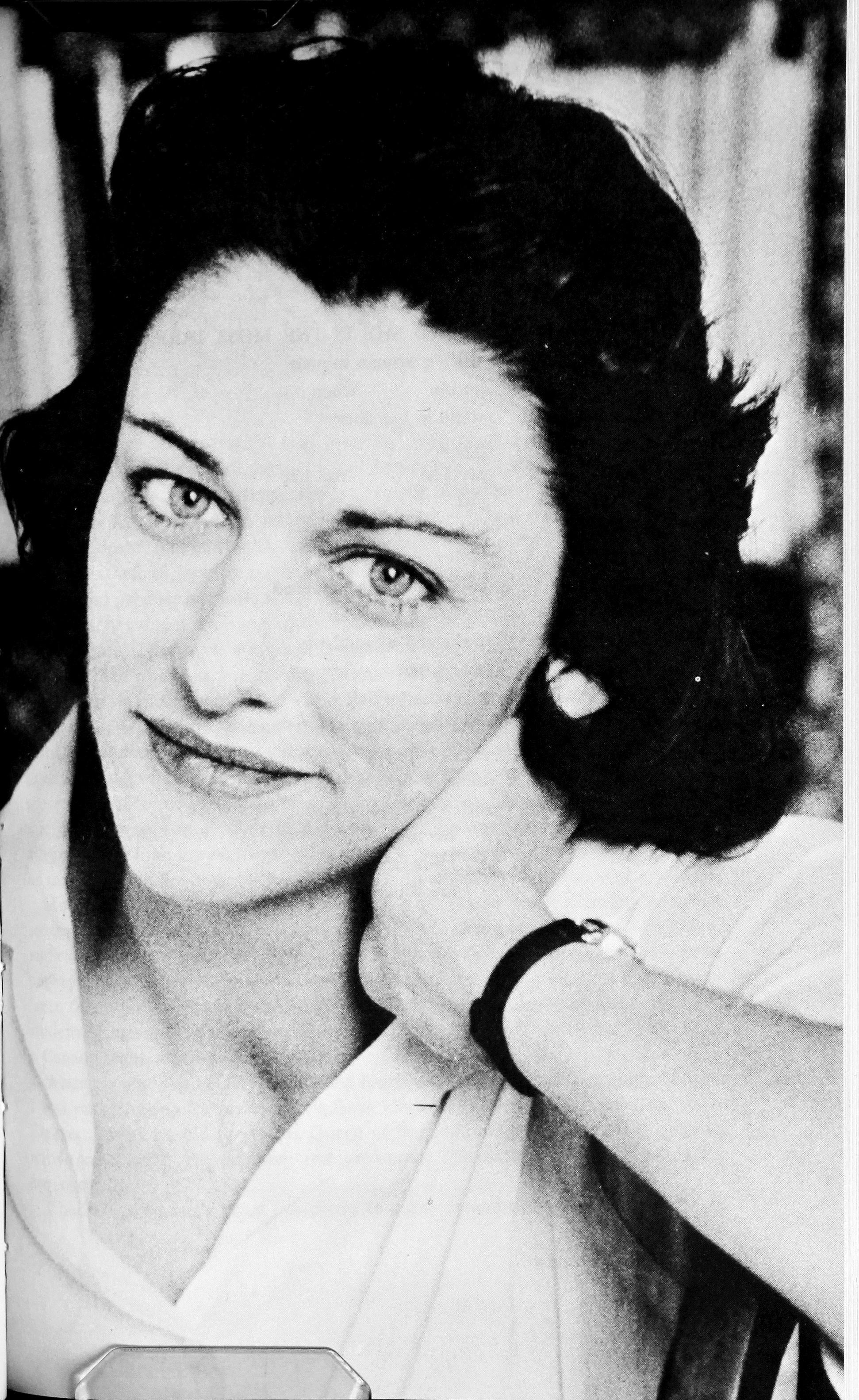
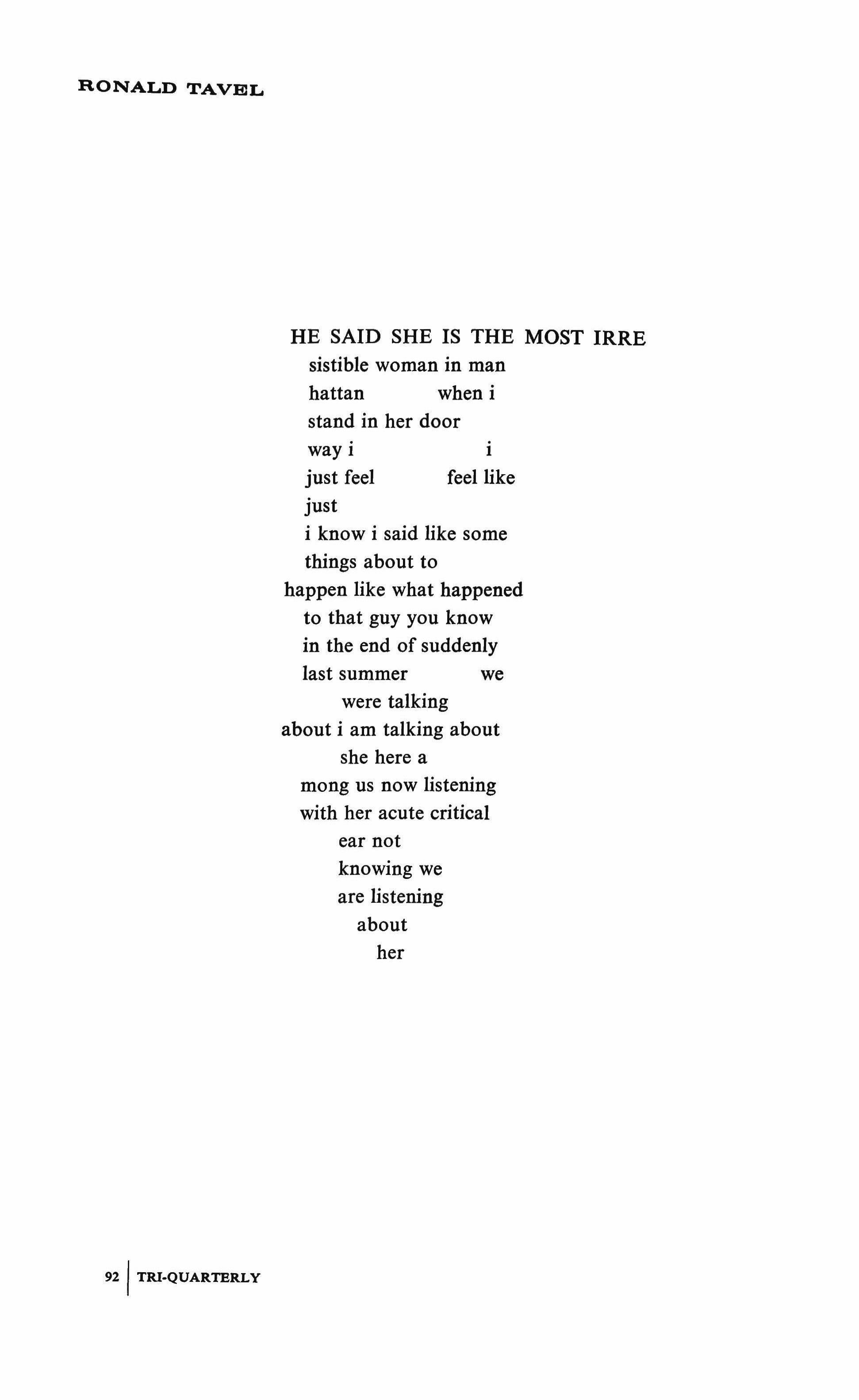
HE SAID SHE IS THE MOST IRRE sistible woman in man hattan when i stand in her door way i just feel feel like just i know i said like some things about to happen like what happened to that guy you know in the end of suddenly last summer we were talking about i am talking about she here a mong us now listening with her acute critical ear not knowing we are listening about her

ToWRITE for movies," I said, quoting Jack Smith, to one of my actors at a crowded Warhol cocktail party, "is not to write." "To act for movies, is not to act," he snapt back and disappeared among the celebrities. To direct for movies, at least for Warhol movies, is not to direct, I concluded, musing over the cheap gin. A play begins and ends with its script, opening night gives back the playwright his play. Not so in flicks: a movie starts with a script (or most do atany rate) but the finished product has little to do with the writer. Everyone's contribution comes before his: the director's, the photographer's, the stars', even the set designer's, the costume men. The movie's product is more what comes off the screen back at the audience than what was put into the footage. The product is the million emanations of the graphic in the world, the way a smile gets caught at the corner of a mouth, the drop of a beautiful woman's false eyelashes, the uncontrollable sadism of an actor's hesitating to pick up a cue, the inadvertant, mesmerizing dance of a person's most natural gestures, the inevitablejuxtapositions that human or camera movement must make of forms and lines. What is most deliberate, like a scenarist's calculated tale or message, counts least in a true movie. We are long used to considering allegory one of the lowest forms of painting; it is a superimposition on the graphic, an imposition on the organic. Scenarios are to movies what allegories are to painting.
Movies, then, are not the writer's medium. I am aware that if there are not great scenarios, at least there are whole scenes of great dialogue. Hollywood produced endless scores of them in the '30's and '40's. But the writers of these lines are those, perhaps, least aware of their accomplishment, are who would be most surprised to learn that their words are considered great. To the deliberate and serious writer, the student of literature, the ambitious, communicative "slinger-of-words," films seem a Canaan from which he is excluded.
When my actor had emerged from the bee-hive of twisting and frugging socialites, I was paraphrasing for myself a line from Universal's 1944 Ali Baba and the Forty Thieves: "Why should the future Queen of Baghdad come to the market place to write scenarios?" He laughed and answered: "Because fruits and vegetables are cheap I"
I had the scenarist's usual complaint that any resemblance between my scripts
TRI-QUARTERLY
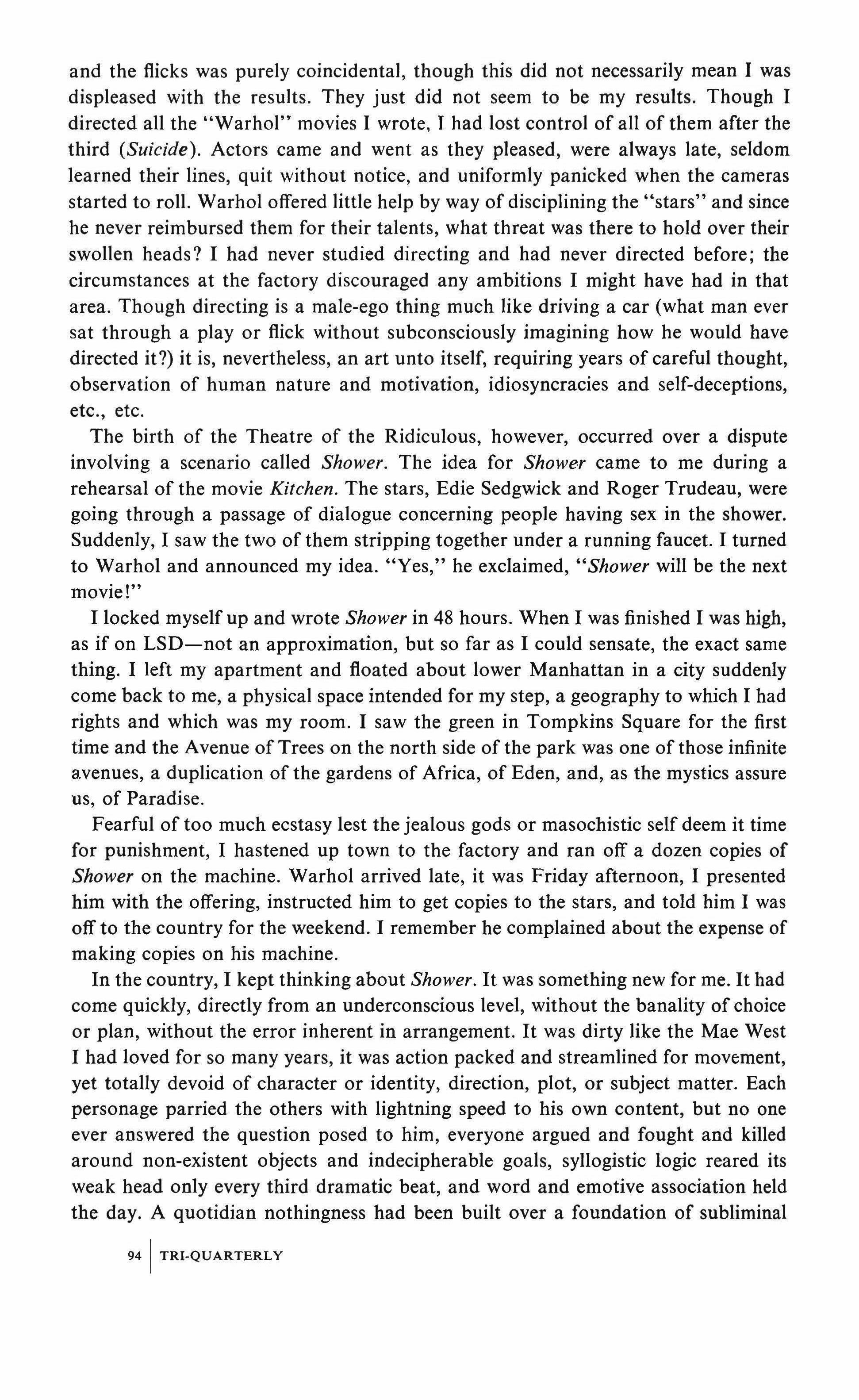
and the flicks was purely coincidental, though this did not necessarily mean I was displeased with the results. They just did not seem to be my results. Though I directed all the "Warhol" movies I wrote, I had lost control of all of them after the third (Suicide). Actors came and went as they pleased, were always late, seldom learned their lines, quit without notice, and uniformly panicked when the cameras started to roll. Warhol offered little help by way of disciplining the "stars" and since he never reimbursed them for their talents, what threat was there to hold over their swollen heads? I had never studied directing and had never directed before; the circumstances at the factory discouraged any ambitions I might have had in that area. Though directing is a male-ego thing much like driving a car (what man ever sat through a play or flick without subconsciously imagining how he would have directed it?) it is, nevertheless, an art unto itself, requiring years of careful thought, observation of human nature and motivation, idiosyncracies and self-deceptions, etc., etc.
The birth of the Theatre of the Ridiculous, however, occurred over a dispute involving a scenario called Shower. The idea for Shower came to me during a rehearsal of the movie Kitchen. The stars, Edie Sedgwick and Roger Trudeau, were going through a passage of dialogue concerning people having sex in the shower. Suddenly, I saw the two of them stripping together under a running faucet. I turned to Warhol and announced my idea. "Yes," he exclaimed, "Shower will be the next movie!"
I locked myself up and wrote Shower in 48 hours. When I was finished I was high, as if on LSD-not an approximation, but so far as I could sensate, the exact same thing. I left my apartment and floated about lower Manhattan in a city suddenly come back to me, a physical space intended for my step, a geography to which I had rights and which was my room. I saw the green in Tompkins Square for the first time and the Avenue of Trees on the north side of the park was one of those infinite avenues, a duplication of the gardens of Africa, of Eden, and, as the mystics assure us, of Paradise.
Fearful of too much ecstasy lest the jealous gods or masochistic self deem it time for punishment, I hastened up town to the factory and ran off a dozen copies of Shower on the machine. Warhol arrived late, it was Friday afternoon, I presented him with the offering, instructed him to get copies to the stars, and told him I was off to the country for the weekend. I remember he complained about the expense of making copies on his machine.
In the country, I kept thinking about Shower. It was something new for me. It had come quickly, directly from an underconscious level, without the banality of choice or plan, without the error inherent in arrangement. It was dirty like the Mae West I had loved for so many years, it was action packed and streamlined for movement, yet totally devoid of character or identity, direction, plot, or subject matter. Each personage parried the others with lightning speed to his own content, but no one ever answered the question posed to him, everyone argued and fought and killed around non-existent objects and indecipherable goals, syllogistic logic reared its weak head only every third dramatic beat, and word and emotive association held the day. A quotidian nothingness had been built over a foundation of subliminal
cement. I was in no wise sure what Shower was, except that it was where I was at, and that my excitement was the emblem of it.
I came to the factory that Monday in June with great expectations: only to learn that Warhol could not understand the script and that Edie, starlet on the rise, refused to be the mouthpiece for "Tavel's perversities." "I think you're capable of something better than that," she said to me sitting on the couch of Couch fame, "I mean, that kind of thing isn't worthy of you." Warhol took no stand other than "perhaps it can be cleaned up a bit," or Edie's nudity stood-in for. But the day an actress starts dictating her scripts art goes out the window, and I gathered up my scripts and went out the door.
I took Shower to Jerry Benjamin (director of Leroi Jones' The Toilet) but he was booked up for his next nine plays and suggested I give it to John Vaccaro, a prominent off-off Broadway actor and former night club entertainer. I knew John only slightly, as he who had given the best performance in Jack Smith's movie Normal Love. I called him and asked him if he would direct Shower and a curtain-raiser I would provide for the occasion. He consented; I went to the Coda Galleries, a new showplace for psychodelic art, where I noticed they were putting on a Gelderode play. I asked to speak to the management. I announced myself as Warhol's scenarist and boldly proclaimed: "Call that a show? I'll give you material that will really draw the crowds!" "Fine, you open on July 29th," Issac Abrams, proprietor, responded. That took me aback.
"Oh-er-don't you want to see the scripts first?"
"Don't bother, I know your novel, Street of Stairs."
"But how?-it's not published."
"Through Jerry Jofen."
(Jerry Jofen is a painter, collagist, and filmmaker under whom I had studied for 10 years.)
I picked up a copy of the opener, rushed over to John Vaccaro's loft, tossed it on his huge round dining table and said, 'Whip this up, John, you're on in four weeks!"
Coda Galleries sent out circulars announcing the advent of the Theatre of the Ridiculous, that New York's "Underground" was moving to the stage, and on the night of Thursday, July 29th, the curtain went up on "The Life of Juanita Castro" and "Shower."
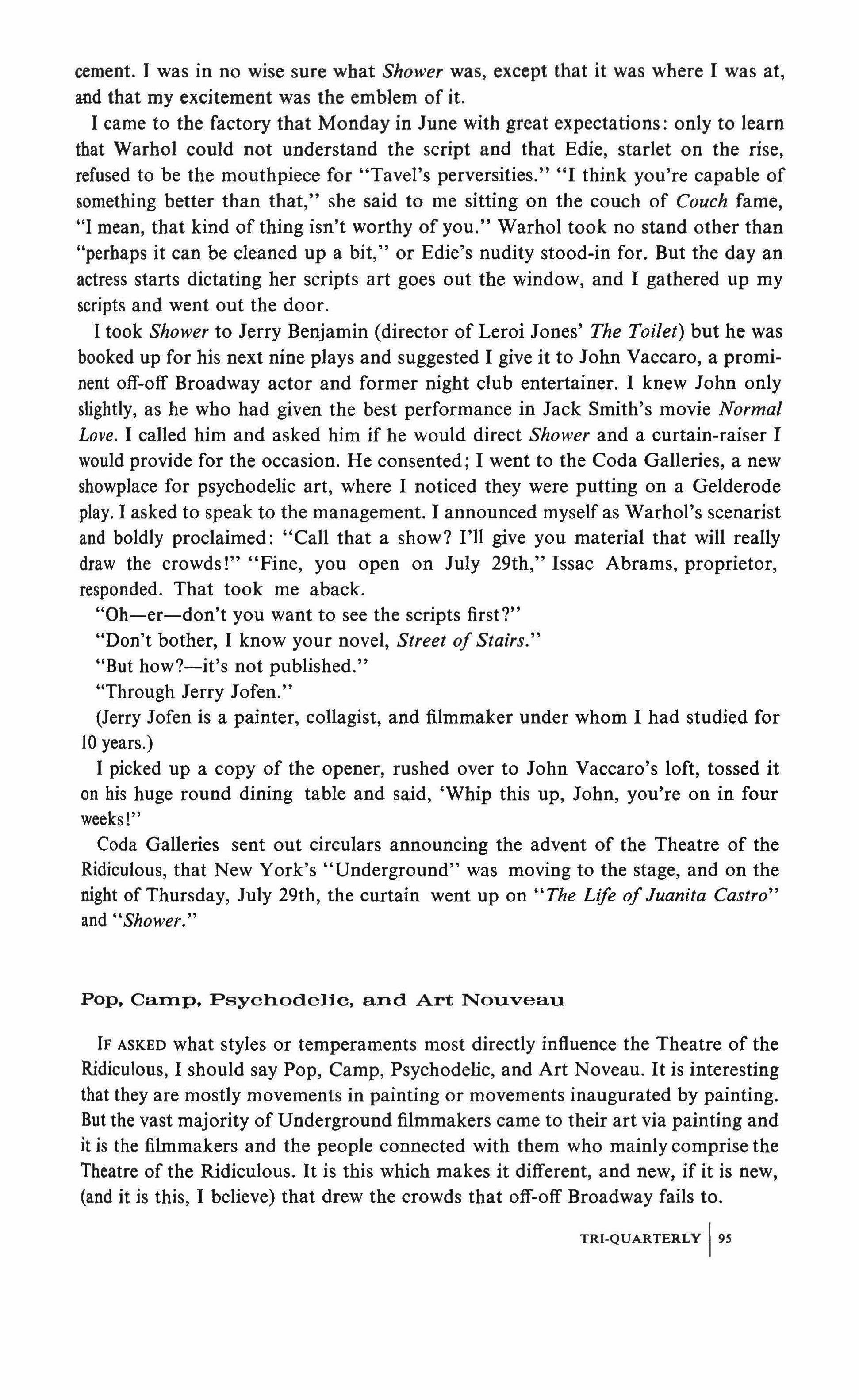
Pop, Camp. Psychodelic, and Art Nouveau
IF ASKED what styles or temperaments most directly influence the Theatre of the Ridiculous, I should say Pop, Camp, Psychodelic, and Art Noveau. It is interesting that they are mostly movements in painting or movements inaugurated by painting. But the vast majority of Underground filmmakers came to their art via painting and it is the filmmakers and the people connected with them who mainly comprise the Theatre of the Ridiculous. It is this which makes it different, and new, if it is new, (and it is this, I believe) that drew the crowds that off-off Broadway fails to.
TRI-QUARTERLY 195
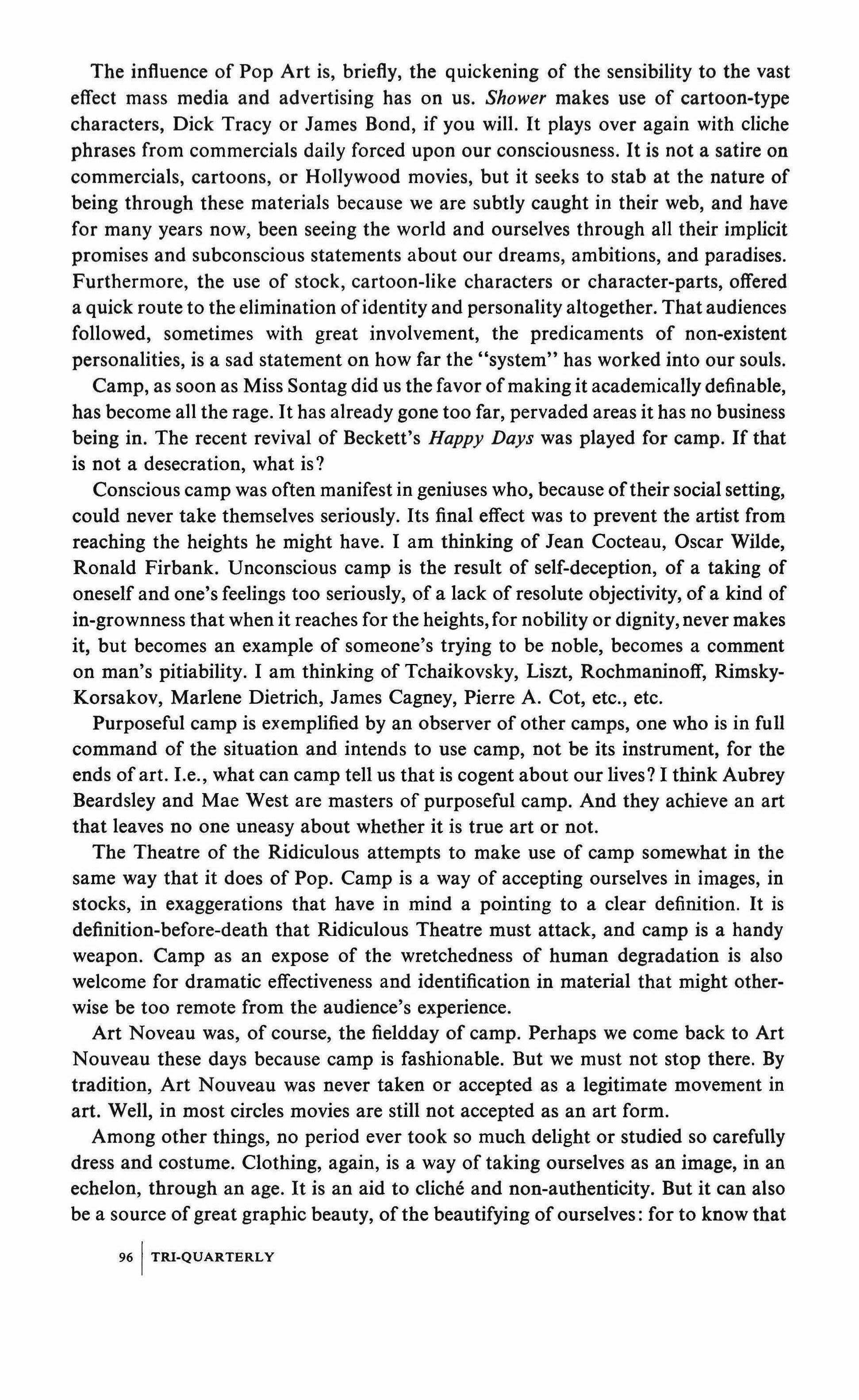
The influence of Pop Art is, briefly, the quickening of the sensibility to the vast effect mass media and advertising has on us. Shower makes use of cartoon-type characters, Dick Tracy or James Bond, if you will. It plays over again with cliche phrases from commercials daily forced upon our consciousness. It is not a satire on commercials, cartoons, or Hollywood movies, but it seeks to stab at the nature of being through these materials because we are subtly caught in their web, and have for many years now, been seeing the world and ourselves through all their implicit promises and subconscious statements about our dreams, ambitions, and paradises. Furthermore, the use of stock, cartoon-like characters or character-parts, offered a quick route to the elimination ofidentity and personality altogether. That audiences followed, sometimes with great involvement, the predicaments of non-existent personalities, is a sad statement on how far the "system" has worked into our souls. Camp, as soon as Miss Sontag did us the favor ofmaking it academically definable, has become all the rage. It has already gone too far, pervaded areas it has no business being in. The recent revival of Beckett's Happy Days was played for camp. If that is not a desecration, what is?
Conscious camp was often manifest in geniuses who, because oftheir social setting, could never take themselves seriously. Its final effect was to prevent the artist from reaching the heights he might have. I am thinking of Jean Cocteau, Oscar Wilde, Ronald Firbank. Unconscious camp is the result of self-deception, of a taking of oneself and one's feelings too seriously, of a lack of resolute objectivity, of a kind of in-grownness that when it reaches for the heights, for nobility or dignity, never makes it, but becomes an example of someone's trying to be noble, becomes a comment on man's pitiability. I am thinking of Tchaikovsky, Liszt, Rochmaninoff, RimskyKorsakov, Marlene Dietrich, James Cagney, Pierre A. Cot, etc., etc.
Purposeful camp is exemplified by an observer of other camps, one who is in full command of the situation and intends to use camp, not be its instrument, for the ends of art. I.e., what can camp tell us that is cogent about our lives? I think Aubrey Beardsley and Mae West are masters of purposeful camp. And they achieve an art that leaves no one uneasy about whether it is true art or not.
The Theatre of the Ridiculous attempts to make use of camp somewhat in the same way that it does of Pop. Camp is a way of accepting ourselves in images, in stocks, in exaggerations that have in mind a pointing to a clear definition. It is definition-before-death that Ridiculous Theatre must attack, and camp is a handy weapon. Camp as an expose of the wretchedness of human degradation is also welcome for dramatic effectiveness and identification in material that might otherwise be too remote from the audience's experience.
Art Noveau was, of course, the fieldday of camp. Perhaps we come back to Art Nouveau these days because camp is fashionable. But we must not stop there. By tradition, Art Nouveau was never taken or accepted as a legitimate movement in art. Well, in most circles movies are still not accepted as an art form.
Among other things, no period ever took so much delight or studied so carefully dress and costume. Clothing, again, is a way of taking ourselves as an image, in an echelon, through an age. It is an aid to cliche and non-authenticity. But it can also be a source of great graphic beauty, of the beautifying of ourselves: for to know that
TRI-QUARTERLY
one looks beautiful is to feel beautiful, and feeling is close enough to being to be the same, enough of the time.
Again, Art Nouveau with its tendrils and petals, is the structure rather than the upholstery. Structure fascinates us more today, and that is a healthier fascination to potter around in since the upholstery in which we are enmeshed is altogether improper -isn't our size.
Implicit in Art Nouveau is its sly humor, its decadent wit, its thinly veneered warning. All these things are cogent to our day and Ridiculous Theatre welcomes them. Much is made of the homosexual temperament that pervades Art Nouveau. I should say that correct use of this would be toward the pointing of itself out, that homosexuality is, indeed, but one more definition and prejudice, and that the vicious, vengeful decadence exhibited by Madison Avenue must be purged through enlightenment.
Further, Art Nouveau is a liberation of the imagination in many ways broader than abstract art could be-because it makes its meanderings in the accepted graphic.
Lest I forget, Pop and Art Nouveau (which was so often advertising) are connected by society's interest in both of them; in their artists, and in destroying their artists.
Psychodelic (mind-expansion) Art is generally taken to be the work of artists under the influence of halucinagens, or work produced in sober states about the state of consciousness under halucinagens, or art professing to contain mystic awareness, or art produced by persons incarcerated in asylums. Shower was called the first psychodelic play and felt by many to be an LSD experience because it dealt with the thinking patterns and non-syllogistic links subliminal reasoning feels along when freed of self-consciousness. As a statement on being it seeks an order beyond the trap of words by dispensing with the response and action and idea that words usually dictate. For me it is a claimant ofjoy in the witness of human freedoms. It is also a fun with words and new ways with words. I'm hardly in a position to advocate the destruction of language. What I mean is that words even as concepts are not at fault: only our use or abuse of them is. It should be noted that the above endeavors were accepted by more persons than not as a chaotic put-down of sex, and virgin-vampires most of all. So runs the world away.
)l Maria Montez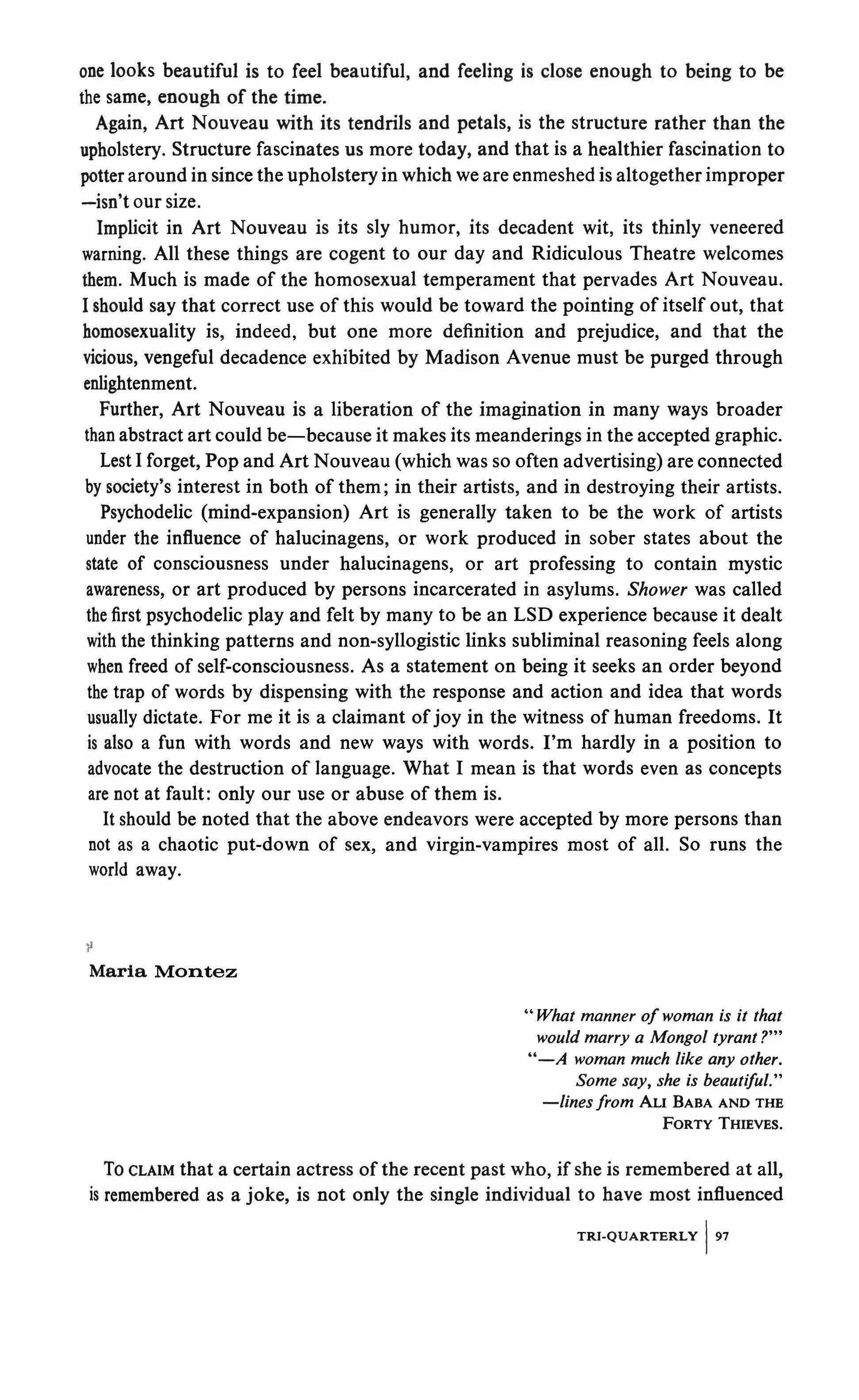
What manner of woman is it that would marry a Mongol tyrant ?'" "-A woman much like any other. Some say, she is beautiful." -linesfrom Au BABA AND THE FORTY THIEVES.
To CLAIM that a certain actress of the recent past who, if she is remembered at all, is remembered as a joke, is not only the single individual to have most influenced
TRI-QUARTERLY 197
the Theatre of the Ridiculous but is also the best actress ever produced by Hollywood, obviously requires a book-length essay which must include, among other things, the elaboration of an entirely new aesthetic approach to films. Having neither the space nor the inclination for such an undertaking, let me state briefly the standard by which the latter claim is made: that she exhibited the greatest number of subtleties in her every verbal and physical gesture (meaning by subtlety that which reveals a truth about human nature) and that she was ceaselessly interesting in every split-second that she appeared on screen. She possessed what might be called "Absolute Presence" and her presence was the ineluctable cynosure of all eyes regardless of what was going on in the scene. She was able, by reason of her own peculiar psychology, to embody in her single self the age-old dichotomy of good and evil, and this made her immediately suitable to project the struggle which underlies most traditional Western tales, religions, and illnesses. Because she was able, by reason of her unique imagination, to believe herself to be the fairy-tale princess, woman as the personification of evil, and finally the Eternal Woman in whom each man finds the answer to his destiny, various as the destinies of men are, she was able to embody all these roles. Also, she was beautiful; to some, the most beautiful woman of our times.

(j, BER� AHil VALh:ltY (St«fJ Corrcllpondftt'lt 01 The New.)
Pari:\, �t:.'pt. 'j'. - V(llu.plI.i:OUl', auburn-hatred movie SPI,�� fir� i\laf'ui MVIlh:Z drtlwll··d in her bathtub tl)tloar.
Tbr- :U.r.'III-,,!d l)",dl',�n-, r;V t..�auLy �;"I ..a",·t"nUl' �if,·'ed (" ,1- '_", lund: hilt' hc,;". llu�band and attack "'hilt' la)l.mtt :� bath ,m ':S·,!d<.l;!ght.�l", :\bui\l ('b!I:-'�l(h", i; were tf"tomely 11<)1: wai er u�I"_ed it h rc- nUl ,.ltop.)ing. du,('illg' salh_ Wh",n dj(" d:ci n_u� ri:B!'("I"!l! aftt!r Fi.rl:"PI'·" and 1,·.1:('€ scmu-oned to' mort' than balf 8.JI bour h�r li8h,'/, her �ulJur-!L\1I home i1: :-'Jb,,'Sr.�S: Adit. (;n.d:t. bees inc \A'oJlr-it?1,. gavt' t1'!1' I\rli(.t.cn,l re'l",h ',Iiuu f<l:T: entered lh,. bathr(,)vm' ",d, f(mod three 11H"Hl�ti H I FI It 1::;�!O(��v\J�b'\':�nbt:i�(�fl::�?�gllt'i;� ��� �'»r u, tr�. SUrlollCCo_ Fri"ncb and �er 1;'I'�n('h aetoT': \\t'd ia Lt. S. �11�:tJ:,��':'�;i�,:'�;'r��!t:o';�:;:ht�·�:! AumnHt (.,)Hapll�d when hp, retakin.g hot. Ilalh� eevernt ,imt"� a' turned hornr wttb his daughtel' ia ; day. l\t'cf'nt\y she ("()nlpiuineJ that l mld.ait-ern.)fJn. ;�:�:.I��t��hf!K\��:ti!���d�i�·.1't flut. iU::t"j_1IS�':�:ijl"lf� l��:t"��tt��r ��� Todav IHw d�';d"d tv bathe Im.�tliatcl)' aftt:__�h� y��,�.���,:�._,�(:,.��...:
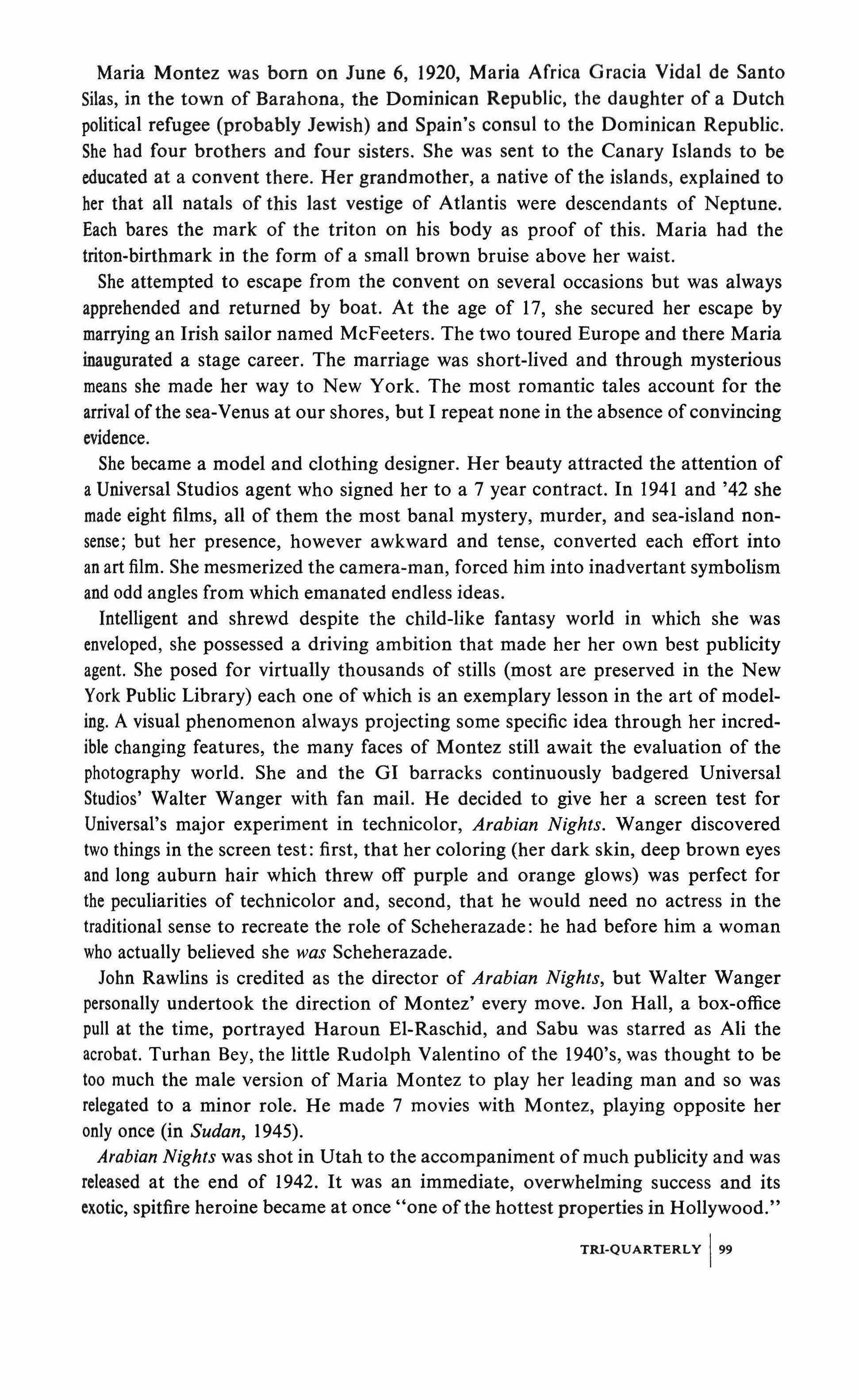
Maria Montez was born on June 6, 1920, Maria Africa Gracia Vidal de Santo Silas, in the town of Barahona, the Dominican Republic, the daughter of a Dutch political refugee (probably Jewish) and Spain's consul to the Dominican Republic, She had four brothers and four sisters. She was sent to the Canary Islands to be educated at a convent there. Her grandmother, a native of the islands, explained to her that all natals of this last vestige of Atlantis were descendants of Neptune. Each bares the mark of the triton on his body as proof of this. Maria had the triton-birthmark in the form of a small brown bruise above her waist.
She attempted to escape from the convent on several occasions but was always apprehended and returned by boat. At the age of 17, she secured her escape by marrying an Irish sailor named McFeeters. The two toured Europe and there Maria inaugurated a stage career. The marriage was short-lived and through mysterious means she made her way to New York. The most romantic tales account for the arrival ofthe sea-Venus at our shores, but I repeat none in the absence of convincing evidence.
She became a model and clothing designer. Her beauty attracted the attention of a Universal Studios agent who signed her to a 7 year contract. In 1941 and '42 she made eight films, all of them the most banal mystery, murder, and sea-island nonsense; but her presence, however awkward and tense, converted each effort into an art film. She mesmerized the camera-man, forced him into inadvertant symbolism and odd angles from which emanated endless ideas.
Intelligent and shrewd despite the child-like fantasy world in which she was enveloped, she possessed a driving ambition that made her her own best publicity agent. She posed for virtually thousands of stills (most are preserved in the New York Public Library) each one of which is an exemplary lesson in the art of modeling. A visual phenomenon always projecting some specific idea through her incredible changing features, the many faces of Montez still await the evaluation of the photography world. She and the GI barracks continuously badgered Universal Studios' Walter Wanger with fan mail. He decided to give her a screen test for Universal's major experiment in technicolor, Arabian Nights. Wanger discovered two things in the screen test: first, that her coloring (her dark skin, deep brown eyes and long auburn hair which threw off purple and orange glows) was perfect for the peculiarities of technicolor and, second, that he would need no actress in the traditional sense to recreate the role of Scheherazade: he had before him a woman who actually believed she was Scheherazade.
John Rawlins is credited as the director of Arabian Nights, but Walter Wanger personally undertook the direction of Montez' every move. Jon Hall, a box-office pull at the time, portrayed Haroun El-Raschid, and Sabu was starred as Ali the acrobat. Turhan Bey, the little Rudolph Valentino of the 1940's, was thought to be too much the male version of Maria Montez to play her leading man and so was relegated to a minor role. He made 7 movies with Montez, playing opposite her only once (in Sudan, 1945).
Arabian Nights was shot in Utah to the accompaniment of much publicity and was released at the end of 1942. It was an immediate, overwhelming success and its exotic, spitfire heroine became at once "one of the hottest properties in Hollywood."
TRl-QUARTERLY \99
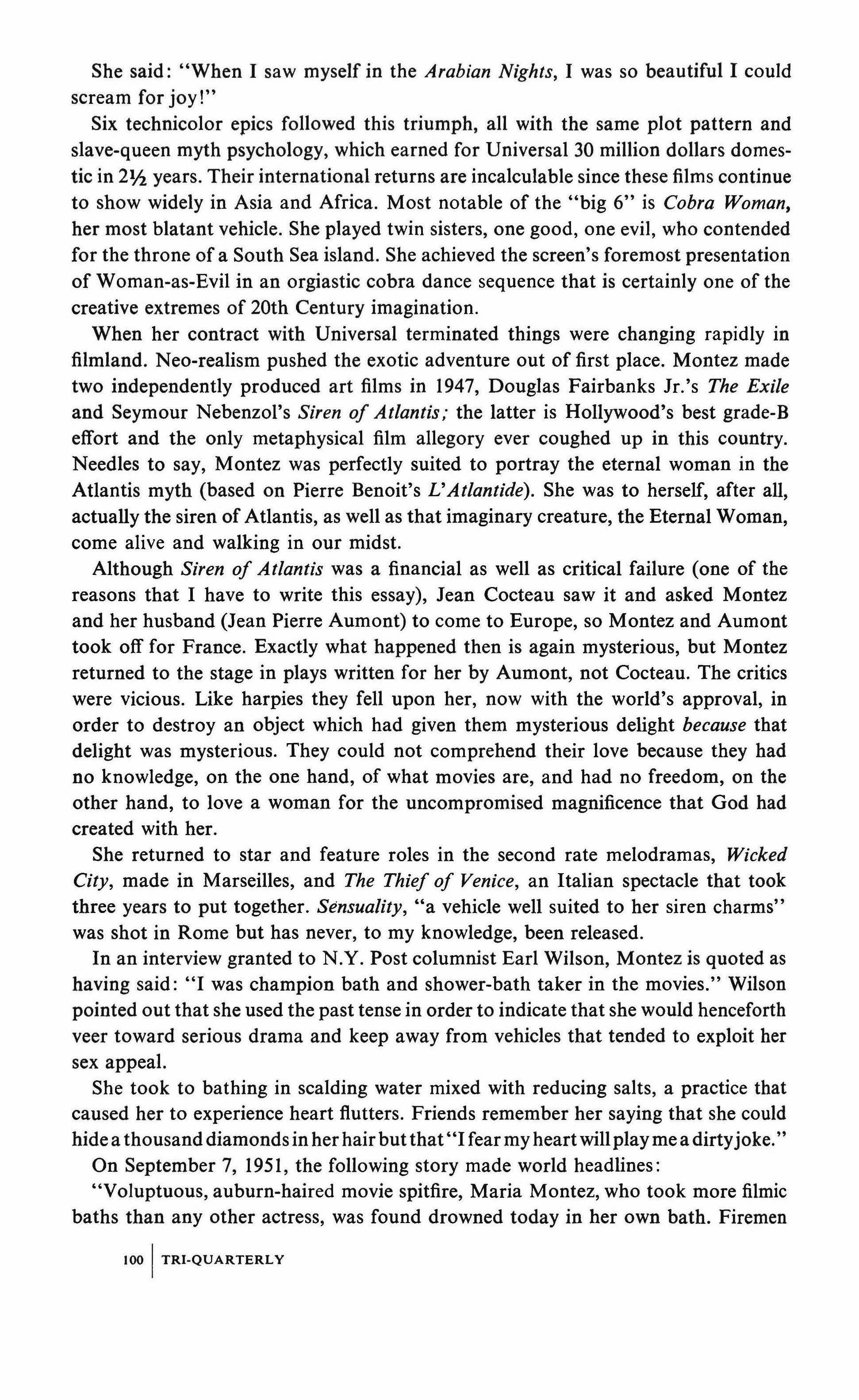
She said: "When I saw myself in the Arabian Nights, I was so beautiful I could scream for joy!"
Six technicolor epics followed this triumph, all with the same plot pattern and slave-queen myth psychology, which earned for Universal 30 million dollars domestic in 2� years. Their international returns are incalculable since these films continue to show widely in Asia and Africa. Most notable of the "big 6" is Cobra Woman, her most blatant vehicle. She played twin sisters, one good, one evil, who contended for the throne of a South Sea island. She achieved the screen's foremost presentation of Woman-as-Evil in an orgiastic cobra dance sequence that is certainly one of the creative extremes of 20th Century imagination.
When her contract with Universal terminated things were changing rapidly in filmland. Neo-realism pushed the exotic adventure out of first place. Montez made two independently produced art films in 1947, Douglas Fairbanks Jr.'s The Exile and Seymour Nebenzol's Siren of Atlantis the latter is Hollywood's best grade-B effort and the only metaphysical film allegory ever coughed up in this country. Needles to say, Montez was perfectly suited to portray the eternal woman in the Atlantis myth (based on Pierre Benoit's L'Atlantide). She was to herself, after all, actually the siren of Atlantis, as well as that imaginary creature, the Eternal Woman, come alive and walking in our midst.
Although Siren of Atlantis was a financial as well as critical failure (one of the reasons that I have to write this essay), Jean Cocteau saw it and asked Montez and her husband (Jean Pierre Aumont) to come to Europe, so Montez and Aumont took off for France. Exactly what happened then is again mysterious, but Montez returned to the stage in plays written for her by Aumont, not Cocteau. The critics were vicious. Like harpies they fell upon her, now with the world's approval, in order to destroy an object which had given them mysterious delight because that delight was mysterious. They could not comprehend their love because they had no knowledge, on the one hand, of what movies are, and had no freedom, on the other hand, to love a woman for the uncompromised magnificence that God had created with her.
She returned to star and feature roles in the second rate melodramas, Wicked City, made in Marseilles, and The Thief of Venice, an Italian spectacle that took three years to put together. Sensuality, "a vehicle well suited to her siren charms" was shot in Rome but has never, to my knowledge, been released.
In an interview granted to N.Y. Post columnist Earl Wilson, Montez is quoted as having said: "I was champion bath and shower-bath taker in the movies." Wilson pointed out that she used the past tense in order to indicate that she would henceforth veer toward serious drama and keep away from vehicles that tended to exploit her sex appeal.
She took to bathing in scalding water mixed with reducing salts, a practice that caused her to experience heart flutters. Friends remember her saying that she could hide a thousand diamonds in her hairbut that"I fear my heartwillplay me a dirtyjoke."
On September 7, 1951, the following story made world headlines: "Voluptuous, auburn-haired movie spitfire, Maria Montez, who took more filmic baths than any other actress, was found drowned today in her own bath. Firemen
were summoned to the Surnes, Paris suburbs apartment, but three hours of artificial respiration failed to revive the 31 year old Dominican-born beauty. Her actorhusband, Jean Pierre Aumont, collapsed upon hearing the news after returning from a shopping tour with daughter Christine, 7. Becoming suspicious after she did not reappear for more than a half hour, her sister, Adita Gracia, broke down the bathroom door, only to discover her long auburn hair floating on the surface of the water
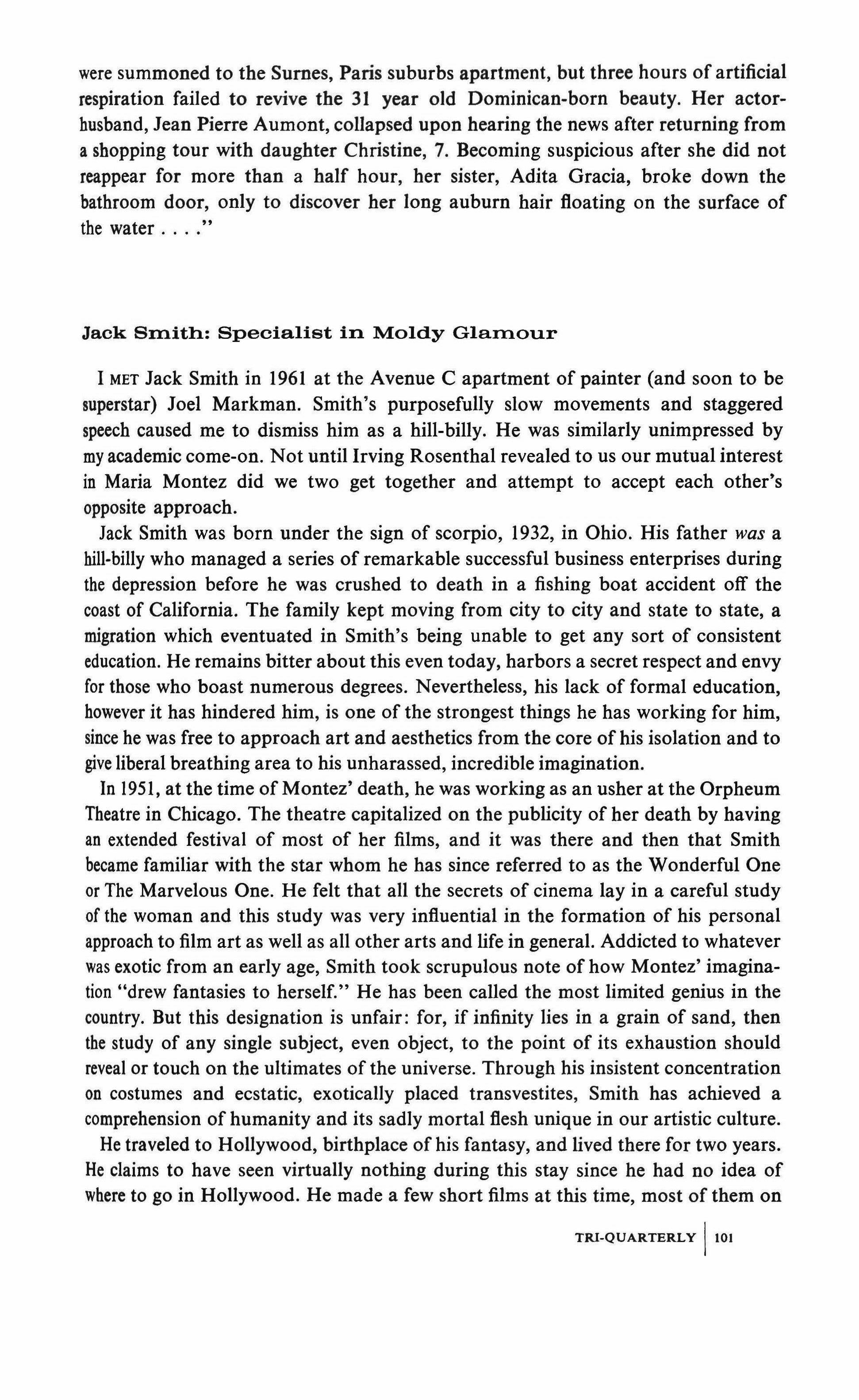 Jack Smith: Specialist in Moldy Glamour
Jack Smith: Specialist in Moldy Glamour
I MET Jack Smith in 1961 at the Avenue C apartment of painter (and soon to be superstar) Joel Markman. Smith's purposefully slow movements and staggered speech caused me to dismiss him as a hill-billy. He was similarly unimpressed by my academic come-on. Not until Irving Rosenthal revealed to us our mutual interest in Maria Montez did we two get together and attempt to accept each other's opposite approach.
Jack Smith was born under the sign of scorpio, 1932, in Ohio. His father was a hill-billy who managed a series of remarkable successful business enterprises during the depression before he was crushed to death in a fishing boat accident off the coast of California. The family kept moving from city to city and state to state, a migration which eventuated in Smith's being unable to get any sort of consistent education. He remains bitter about this even today, harbors a secret respect and envy for those who boast numerous degrees. Nevertheless, his lack of formal education, however it has hindered him, is one of the strongest things he has working for him, since he was free to approach art and aesthetics from the core of his isolation and to give liberal breathing area to his unharassed, incredible imagination.
In 1951, at the time of Montez' death, he was working as an usher at the Orpheum Theatre in Chicago. The theatre capitalized on the publicity of her death by having an extended festival of most of her films, and it was there and then that Smith became familiar with the star whom he has since referred to as the Wonderful One or The Marvelous One. He felt that all the secrets of cinema lay in a careful study of the woman and this study was very influential in the formation of his personal approach to film art as well as all other arts and life in general. Addicted to whatever was exotic from an early age, Smith took scrupulous note of how Montez' imagination "drew fantasies to herself." He has been called the most limited genius in the country. But this designation is unfair: for, if infinity lies in a grain of sand, then the study of any single subject, even object, to the point of its exhaustion should reveal or touch on the ultimates of the universe. Through his insistent concentration on costumes and ecstatic, exotically placed transvestites, Smith has achieved a comprehension of humanity and its sadly mortal flesh unique in our artistic culture. He traveled to Hollywood, birthplace of his fantasy, and lived there for two years. He claims to have seen virtually nothing during this stay since he had no idea of where to go in Hollywood. He made a few short films at this time, most of them on
TRI-QUARTERLY 1101
cliche Arabian Nights themes, but showing an economy and taste for the essential that is apparent in few of the epics he unabashedly imitated. I say imitated because he claims that there is nothing new to do, just new arrangements to put things in. I disagree with him here, believing that there are always new things to do (though their not being done before does not necessarily mean that they should be now). I also wish to point out that it is the arrangement of things that will eventuate in their statement and this is how he arrived, with the use of cliches, at a pronouncement.
He came to New York in 1953, ostensibly en route to the dreamland of Morocco, to the Mogadore of pirates, to the caravans of the Garden of Allah. He never reached Morocco, is unaware that Mogadore has sunk into the sea or that movie cameras are sure death on Moslem caravans. He spent nearly ten years at office and messenger boy jobs, thinking, observing, unspeakably lonely. During these years he worked occasionally at still photography, producing the strangest and richest examples of this genre I have ever seen. A few magazines printed the stills from time to time and the Museum of Modern Art owns some of them. But by and large, his photography has gone unrecognized and Vogue and Harper's have yet to see him as the country's best fashion cameraman.
Flaming Creatures, was shot in the summer of '62, for $100 on outdated army surplus film. Most of it was made on the roof of the old Windsor Theatre on Grand St., now demolished. Retired Coney Island transvestite, Francis Francine, was intended for the lead but disappeared when the footage was only half shot, leaving Joel Markman, as the vampire Jean Harlow-Marilyn Monroe come alive again, to j
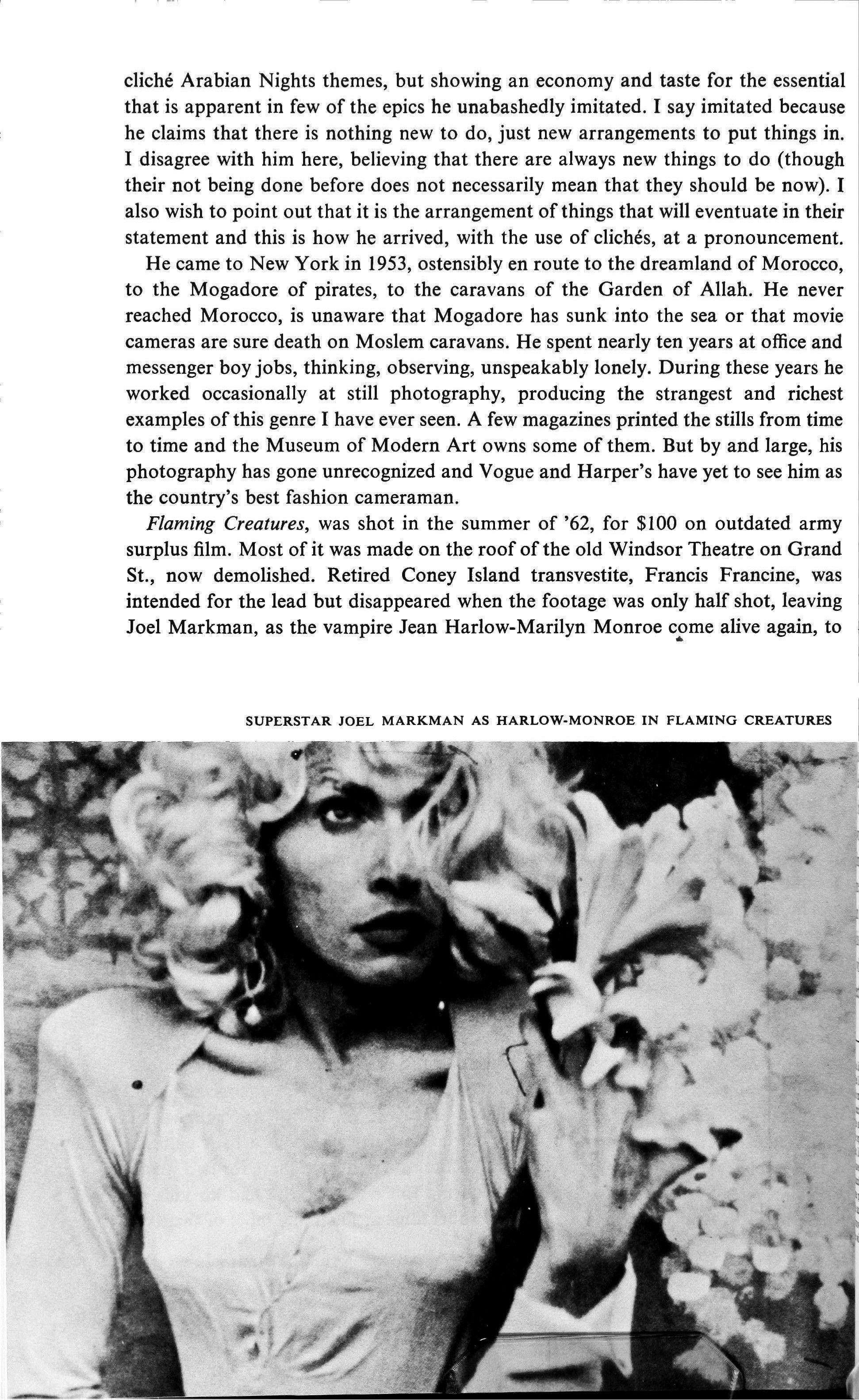 SUPERSTAR JOEL MARKMAN AS HARLOW-MONROE IN FLAMING CREATURES
SUPERSTAR JOEL MARKMAN AS HARLOW-MONROE IN FLAMING CREATURES
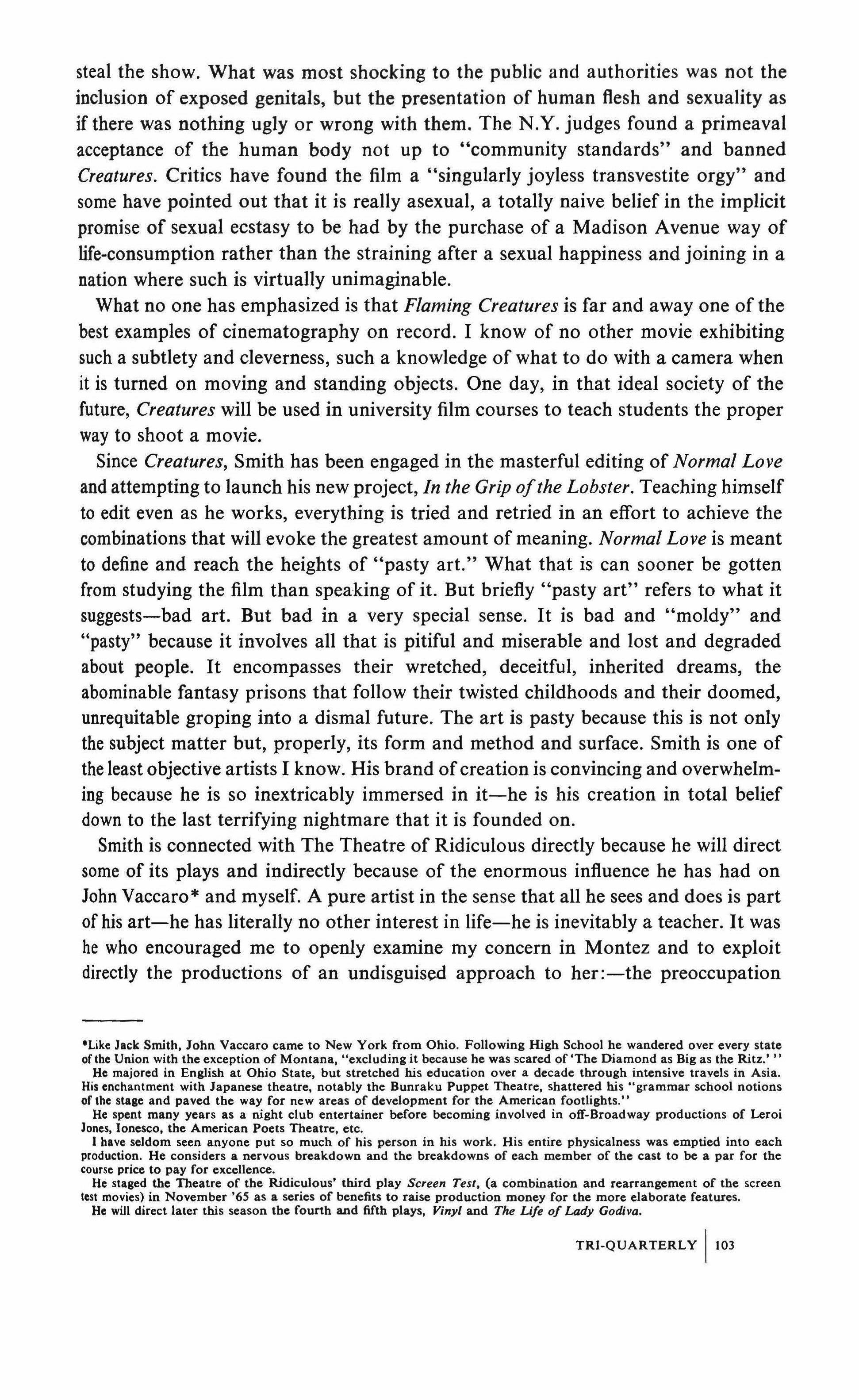
steal the show. What was most shocking to the public and authorities was not the inclusion of exposed genitals, but the presentation of human flesh and sexuality as if there was nothing ugly or wrong with them. The N.Y. judges found a primeaval acceptance of the human body not up to "community standards" and banned Creatures. Critics have found the film a "singularly joyless transvestite orgy" and some have pointed out that it is really asexual, a totally naive belief in the implicit promise of sexual ecstasy to be had by the purchase of a Madison Avenue way of life-consumption rather than the straining after a sexual happiness and joining in a nation where such is virtually unimaginable.
What no one has emphasized is that Flaming Creatures is far and away one of the best examples of cinematography on record. I know of no other movie exhibiting such a subtlety and cleverness, such a knowledge of what to do with a camera when it is turned on moving and standing objects. One day, in that ideal society of the future, Creatures will be used in university film courses to teach students the proper way to shoot a movie.
Since Creatures, Smith has been engaged in the masterful editing of Normal Love and attempting to launch his new project, In the Grip ofthe Lobster. Teaching himself to edit even as he works, everything is tried and retried in an effort to achieve the combinations that will evoke the greatest amount of meaning. Normal Love is meant to define and reach the heights of "pasty art." What that is can sooner be gotten from studying the film than speaking of it. But briefly "pasty art" refers to what it suggests-bad art. But bad in a very special sense. It is bad and "moldy" and "pasty" because it involves all that is pitiful and miserable and lost and degraded about people. It encompasses their wretched, deceitful, inherited dreams, the abominable fantasy prisons that follow their twisted childhoods and their doomed, unrequitable groping into a dismal future. The art is pasty because this is not only the subject matter but, properly, its form and method and surface. Smith is one of the least objective artists I know. His brand ofcreation is convincing and overwhelming because he is so inextricably immersed in it-he is his creation in total belief down to the last terrifying nightmare that it is founded on.
Smith is connected with The Theatre of Ridiculous directly because he will direct some of its plays and indirectly because of the enormous influence he has had on John Vaccaro* and myself. A pure artist in the sense that all he sees and does is part of his art-he has literally no other interest in life-he is inevitably a teacher. It was he who encouraged me to openly examine my concern in Montez and to exploit directly the productions of an undisguised approach to her:-the preoccupation
'Like Jack Smith, John Vaccaro came to New York from Ohio. Following High School he wandered over every state of the Union with the exception of Montana, "excluding it because he was scared of 'The Diamond as Big as the Ritz.' He majored in English at Ohio State, but stretched his education over a decade through intensive travels in Asia. His enchantment with Japanese theatre, notably the Bunraku Puppet Theatre, shattered his "grammar school notions of the stase and paved the way for new areas of development for the American footlights."
He spent many years as a night club entertainer before becoming involved in off-Broadway productions of Leroi Jones, Ionesco, the American Poets Theatre, etc.
I have seldom seen anyone put so much of his person in his work. His entire physicalness was emptied into each production. He considers a nervous breakdown and the breakdowns of each member of the cast to be a par for the Course price to pay for excellence.
He staged the Theatre of the Ridiculous' third play Screen Test, (a combination and rearrangement of the screen test movies) in November '65 as a series of benefits to raise production money for the more elaborate features.
He will direct later this season the fourth and fifth plays, Vinyl and The Life of Lady Godiva.
TRI-QUARTERLY 1103
with childhood and fantasy, with psychology and disappointment and escape, with the humor and beauty as well as the cosmic implications thereof. Though long aware of the influence and foundation of these matters in my work, it is to Jack Smith that the credit must go for a reorganization of my material, a fresh approach and a rejuvenation. Taking the cue from him, I found my way toward a more subliminal and emotive, as distinct from classical art. Also, an acceptance of the visual and graphic, something my philosopher-heroes had deterred me from. When pursued to its extreme the visual will surely result where cerebration leads you, but it is a delight in its skin as well and its skin is an essential element in theatre.
I hope it is plain that Camp and Jack Smith are two things apart. As a matter of fact, using materials natal to Camp, Smith is at the opposite pole. He is all belief. He is absolute innocence.
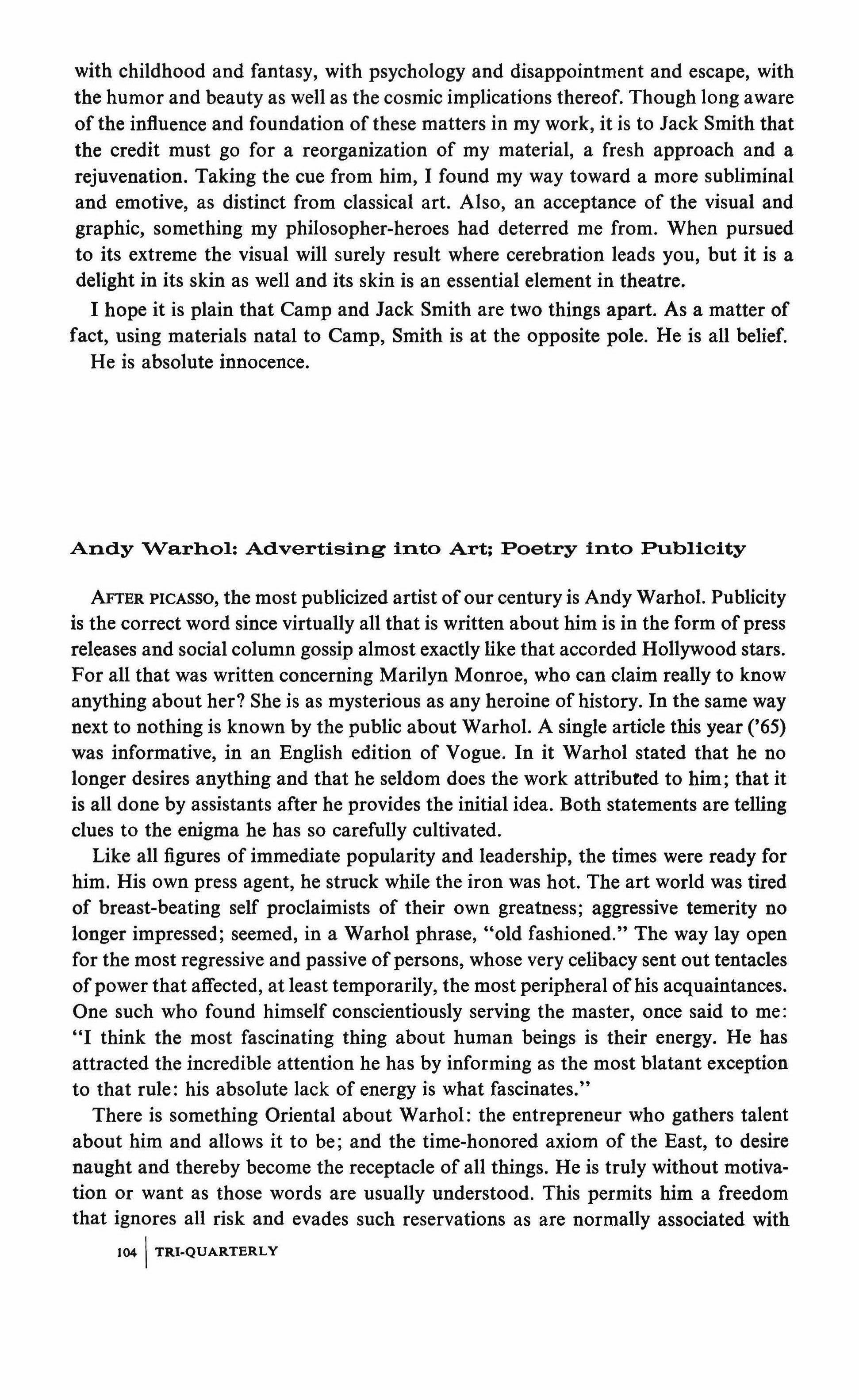
AFTER PICASSO, the most publicized artist of our century is Andy Warhol. Publicity is the correct word since virtually all that is written about him is in the form of press releases and social column gossip almost exactly like that accorded Hollywood stars. For all that was written concerning Marilyn Monroe, who can claim really to know anything about her? She is as mysterious as any heroine of history. In the same way next to nothing is known by the public about Warhol. A single article this year ('65) was informative, in an English edition of Vogue. In it Warhol stated that he no longer desires anything and that he seldom does the work attributed to him; that it is all done by assistants after he provides the initial idea. Both statements are telling clues to the enigma he has so carefully cultivated.
Like all figures of immediate popularity and leadership, the times were ready for him. His own press agent, he struck while the iron was hot. The art world was tired of breast-beating self proclaimists of their own greatness; aggressive temerity no longer impressed; seemed, in a Warhol phrase, "old fashioned." The way lay open for the most regressive and passive of persons, whose very celibacy sent out tentacles of power that affected, at least temporarily, the most peripheral ofhis acquaintances. One such who found himself conscientiously serving the master, once said to me: "I think the most fascinating thing about human beings is their energy. He has attracted the incredible attention he has by informing as the most blatant exception to that rule: his absolute lack of energy is what fascinates."
There is something Oriental about Warhol: the entrepreneur who gathers talent about him and allows it to be; and the time-honored axiom of the East, to desire naught and thereby become the receptacle of all things. He is truly without motivation or want as those words are usually understood. This permits him a freedom that ignores all risk and evades such reservations as are normally associated with
TRI-QUARTERLY

the living. Adolescent and uncontrollably suicidal-how many worshiped as courageous were really that?
But the important question remains, the one never asked: If Warhol does not execute the products attributed to him, who does? Also, if one's ideas can be so easily realized by others, are they really his own ideas?
Gerard Malanga introduced me to Andy Warhol one Monday night after the Metro reading in November 1964. He listened to me read from my novel. Shortly after that, he came to the Metro and heard me reading poetry. He called me to his table, informed me that he was soon to make his first sound film, and asked if I would read, read anything-the newspaper perhaps-for the sound track. I agreed and what eventuated was not a solo performance but a 3 part conversation along with English poet Harry Fainlight and Billy Linich, who performs as janitor for free board at Warhol's East 47th St. studio, otherwise known as the "factory." The film we spoke for was Har/ot, which featured Mario Montez as Jean Harlow; Mario is one of the best known underground film stars, a transvestite creation ofJack Smith's.
Filmmaker Gregory Markoupolous said, "Mario Montez is to Jack Smith what Dietrich was to Von Sternberg."
Harlot was internationally released early in January and has always been well received, but never overwhelmingly. The 70 minute single shot composition is masterful and is Warhol's own doing. Who suggested a commentary on the Jean Harlow cult, I do not know.
Later that month Warhol asked me for a scenario that would be a simple screen test for one of his assistants, Philip Fagan. I called him after a week and announced that the script was ready. I had studied all the information I could get on Philip and devised a rigorous inquisition calculated to draw from his face the maximum number of telling expressions that I could imagine.
"Do you want to read the script?" I asked Warhol over the phone. "No," he replied, "come and we'll shoot it on Saturday."
At that time I had been able to write nothing but poetry and was eager to get involved with something that would necessitate more ambitious projects. This peculiar approach to ftickmaking and the aesthetic hidden behind it intrigued me. lt was a ruthless, rigid aesthetic, one pared away till nothing but the essential remained. I was in need of just such chains: an elemental, savagely simple approach to art. Warhol once said to reporters: "I give people things to do; I keep them busy." And I am enamoured of rules.
The resultant film was Screen Test. I sat out of camera and read and improvised the inquisition. Philip set up the stationary camera and Warhol kept an eye on the sound meter, warning us when we spoke too low and keeping me advised of the time during the prescribed 70 minutes. But Philip proved an inhibited partner, painfully recalcitrant, and this movie remains unreleased.
The second movie I did for Warhol was much the same, this time with Mario Montez. The star-dazed actor was a miracle of co-operation and Screen Test II is my favorite film.
The only thing that disturbed me about the shooting was that there were some 50 people present on the set while I made it, including newspaper reporters and column
with childhood and fantasy, with psychology and disappointment and escape, with the humor and beauty as well as the cosmic implications thereof. Though long aware of the influence and foundation of these matters in my work, it is to Jack Smith that the credit must go for a reorganization of my material, a fresh approach and a rejuvenation. Taking the cue from him, I found my way toward a more subliminal and emotive, as distinct from classical art. Also, an acceptance of the visual and graphic, something my philosopher-heroes had deterred me from. When pursued to its extreme the visual will surely result where cerebration leads you, but it is a delight in its skin as well and its skin is an essential element in theatre.
I hope it is plain that Camp and Jack Smith are two things apart. As a matter of fact, using materials natal to Camp, Smith is at the opposite pole. He is all belief. He is absolute innocence.
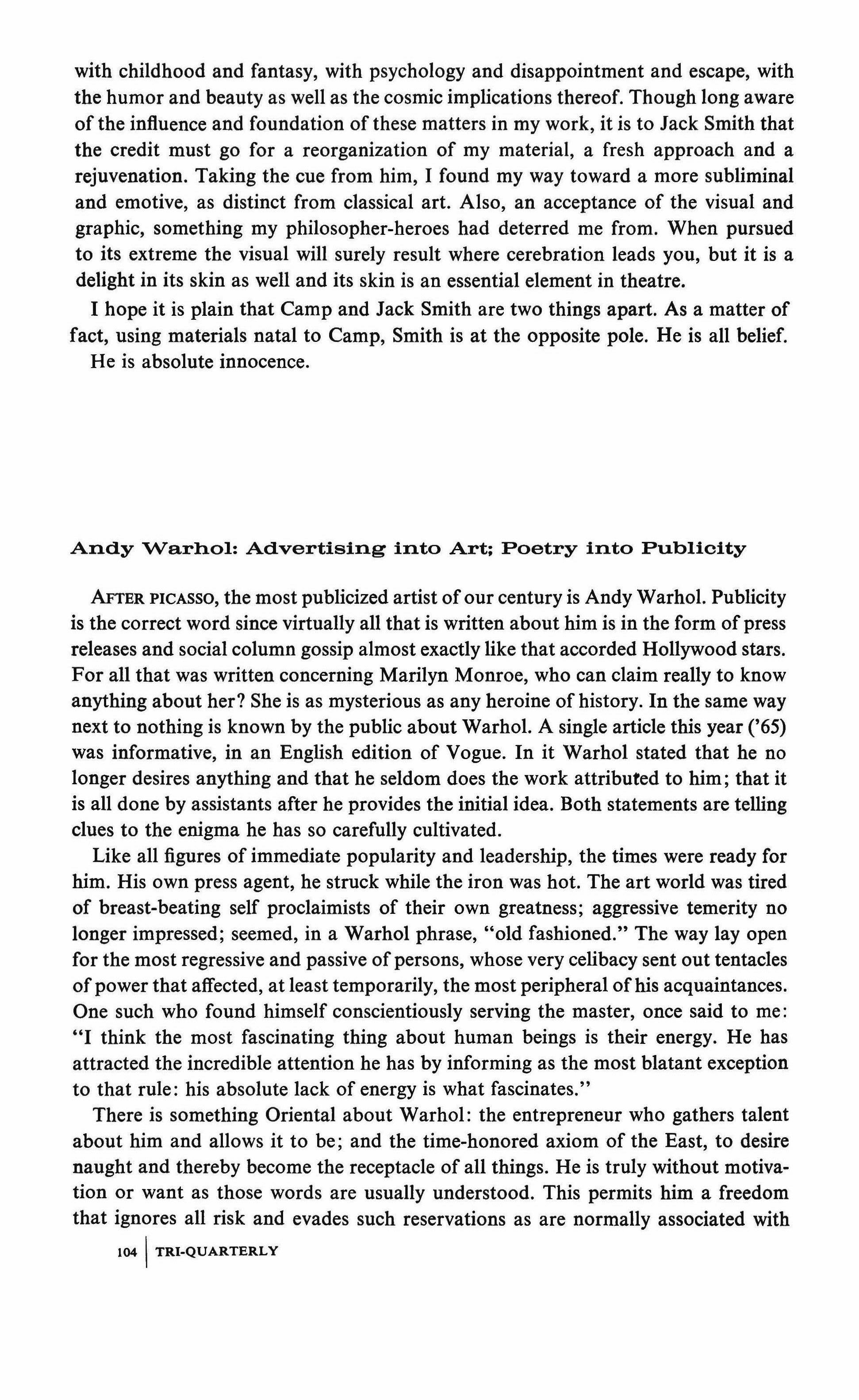
AFTER PICASSO, the most publicized artist of our century is Andy Warhol. Publicity is the correct word since virtually all that is written about him is in the form of press releases and social column gossip almost exactly like that accorded Hollywood stars. For all that was written concerning Marilyn Monroe, who can claim really to know anything about her? She is as mysterious as any heroine of history. In the same way next to nothing is known by the public about Warhol. A single article this year ('65) was informative, in an English edition of Vogue. In it Warhol stated that he no longer desires anything and that he seldom does the work attributed to him; that it is all done by assistants after he provides the initial idea. Both statements are telling clues to the enigma he has so carefully cultivated.
Like all figures of immediate popularity and leadership, the times were ready for him. His own press agent, he struck while the iron was hot. The art world was tired of breast-beating self proclaimists of their own greatness; aggressive temerity no longer impressed; seemed, in a Warhol phrase, "old fashioned." The way lay open for the most regressive and passive of persons, whose very celibacy sent out tentacles ofpower that affected, at least temporarily, the most peripheral ofhis acquaintances. One such who found himself conscientiously serving the master, once said to me: "I think the most fascinating thing about human beings is their energy. He has attracted the incredible attention he has by informing as the most blatant exception to that rule: his absolute lack of energy is what fascinates."
There is something Oriental about Warhol: the entrepreneur who gathers talent about him and allows it to be; and the time-honored axiom of the East, to desire naught and thereby become the receptacle of all things. He is truly without motivation or want as those words are usually understood. This permits him a freedom that ignores all risk and evades such reservations as are normally associated with
TRI-QUARTERLY
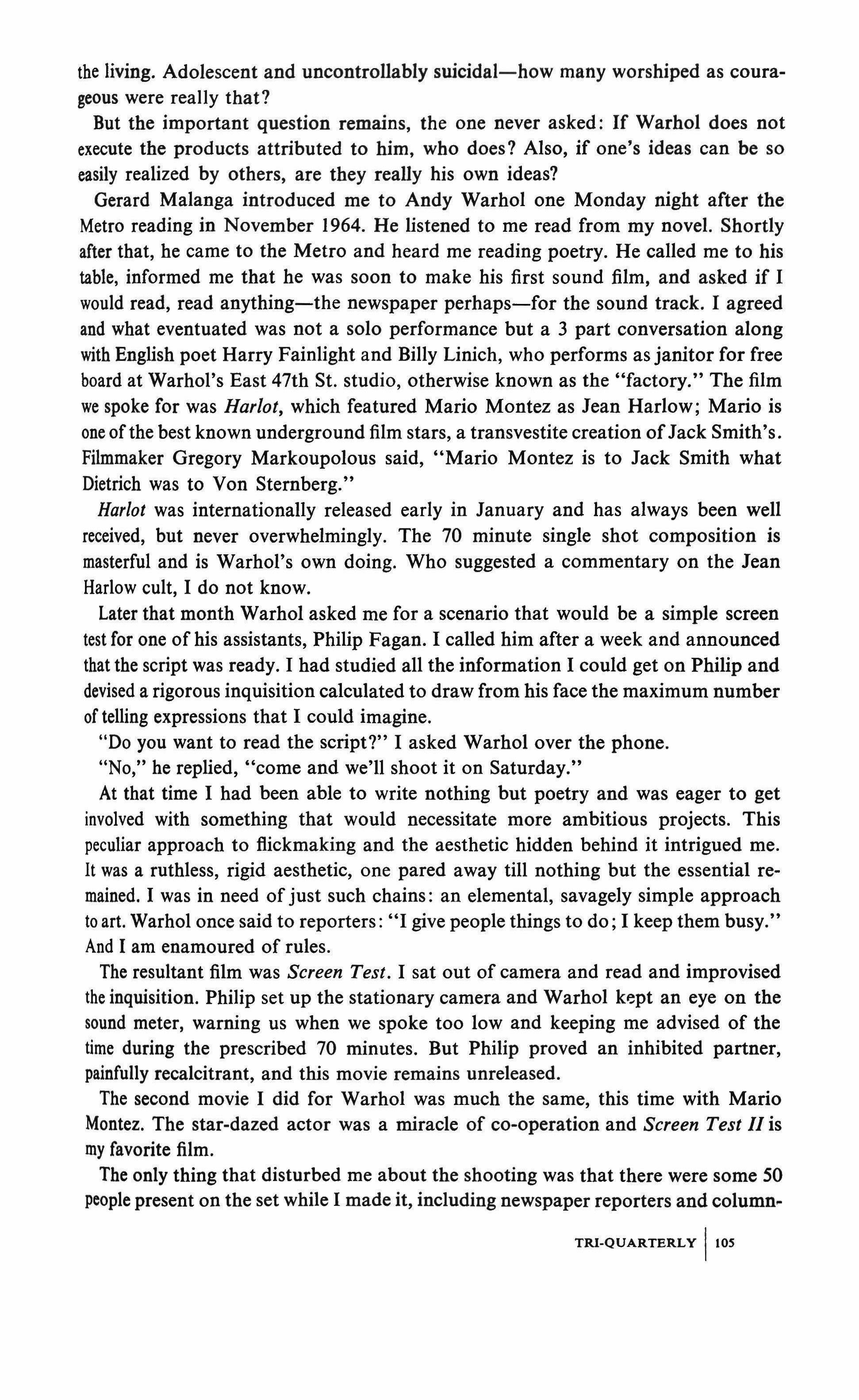
the living. Adolescent and uncontrollably suicidal-how many worshiped as courageous were really that?
But the important question remains, the one never asked: If Warhol does not execute the products attributed to him, who does? Also, if one's ideas can be so easily realized by others, are they really his own ideas?
Gerard Malanga introduced me to Andy Warhol one Monday night after the Metro reading in November 1964. He listened to me read from my novel. Shortly after that, he came to the Metro and heard me reading poetry. He called me to his table, informed me that he was soon to make his first sound film, and asked if I would read, read anything-the newspaper perhaps-for the sound track. I agreed and what eventuated was not a solo performance but a 3 part conversation along with English poet Harry Fainlight and Billy Linich, who performs as janitor for free board at Warhol's East 47th St. studio, otherwise known as the "factory." The film we spoke for was Harlot, which featured Mario Montez as Jean Harlow; Mario is one ofthe best known underground film stars, a transvestite creation ofJack Smith's.
Filmmaker Gregory Markoupolous said, "Mario Montez is to Jack Smith what Dietrich was to Von Sternberg."
Harlot was internationally released early in January and has always been well received, but never overwhelmingly. The 70 minute single shot composition is masterful and is Warhol's own doing. Who suggested a commentary on the Jean Harlow cult, I do not know.
Later that month Warhol asked me for a scenario that would be a simple screen test for one of his assistants, Philip Fagan. I called him after a week and announced that the script was ready. I had studied all the information I could get on Philip and devised a rigorous inquisition calculated to draw from his face the maximum number of telling expressions that I could imagine.
"Do you want to read the script?" I asked Warhol over the phone. "No," he replied, "come and we'll shoot it on Saturday."
At that time I had been able to write nothing but poetry and was eager to get involved with something that would necessitate more ambitious projects. This peculiar approach to flickmaking and the aesthetic hidden behind it intrigued me. lt was a ruthless, rigid aesthetic, one pared away till nothing but the essential remained. I was in need of just such chains: an elemental, savagely simple approach to art. Warhol once said to reporters: "I give people things to do; I keep them busy." And I am enamoured of rules.
The resultant film was Screen Test. I sat out of camera and read and improvised the inquisition. Philip set up the stationary camera and Warhol kept an eye on the sound meter, warning us when we spoke too low and keeping me advised of the time during the prescribed 70 minutes. But Philip proved an inhibited partner, painfully recalcitrant, and this movie remains unreleased.
The second movie I did for Warhol was much the same, this time with Mario Montez. The star-dazed actor was a miracle of co-operation and Screen Test II is my favorite film.
The only thing that disturbed me about the shooting was that there were some SO people present on the set while I made it, including newspaper reporters and column.
TRI-QUARTERLY I lOS
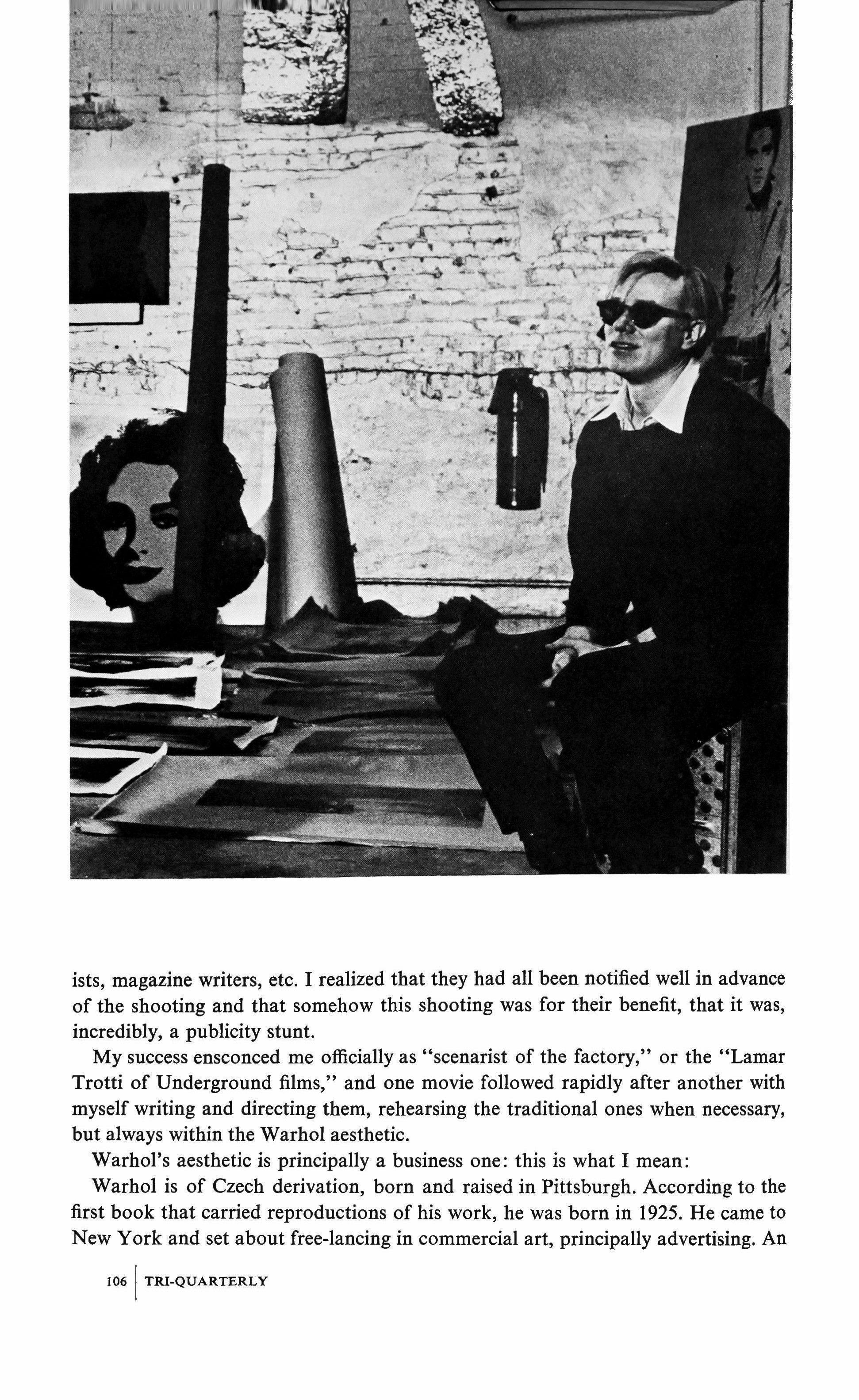
ists, magazine writers, etc. I realized that they had all been notified well in advance of the shooting and that somehow this shooting was for their benefit, that it was, incredibly, a publicity stunt.
My success ensconced me officially as "scenarist of the factory," or the "Lamar Trotti of Underground films," and one movie followed rapidly after another with myself writing and directing them, rehearsing the traditional ones when necessary, but always within the Warhol aesthetic.
Warhol's aesthetic is principally a business one: this is what I mean:
Warhol is of Czech derivation, born and raised in Pittsburgh. According to the first book that carried reproductions of his work, he was born in 1925. He came to New York and set about free-lancing in commercial art, principally advertising. An
TRI-QUARTERLY

unerring intuitive sense for the kind of drawings that would appeal to the widest number of people possible made him one of Miller Shoes' most highly paid employees. He earned, IO years ago, according to associates, $40,000 annually. He continues, to this day, to work for I. E. Miller.
Braving the vested interest and the abstract-expressionist monopoly, Pop Art burst on the scene in the spring of 1962. Warhol's first show sold out for $90,000. It was still advertising drawings or paintings, but now they were framed. The other contribution was the blown up photograph, painted over in places, and the purchase of one of these, a Marilyn Monroe, by The Metropolitan Museum of Art officially placed Warhol in the realm of legitimate Art. But controversy raged over whether or not his work was art and the name of Warhol was on the lips of the gal'ery world. Years of commercial practice made him almost infallible when it came to creating controversy that would keep him in the limelight. With silk-screens his assistants reproduced hundreds of copies of the conversation pieces. He notified the papers of all his activities and projects and gradually the interest of one or two columnists ever eager for something new began to snowball.
This business aesthetic kept things in line as long as he remained its faithful slave. A businessman promotes, he stea's from others without hesitation, he utilizes one and all, he plays one off against another, he beats, with the aid of maximum organization, everyone to the punch. In a certain sense, if you accept the basic premise about this commercial aesthetic being an important statement on our times, then everything goes. Warhol could do no wrong. But if you can do no wrong and everything goes, then it is pure Aristotilian logic, that nothing goes and that you can do no right.
Warhol became suspect in artistic circles for several reasons. One was that he appeared to go too far, to somehow strain the limits of art; another was that he finally veered from the rigors he had set himself; and a third is that he too anxiously courted the acceptance of "society."
Some said the Campbell Soup Cans made the point, the point of nothingness above all, and that the Brillo Boxes, because they were near exact duplicates (rather than paintings) were just that-duplicates of Brillo boxes as distinct from art, a commentary on them. Warhol himself felt satisfied with the achievement of the "Flowers," the absolute last word in vacuousness, nothing to look at, nothingness in and of itself. This went somewhat further than the "pure object" of the Soup Cans. Warhol put down his brush.
But it was too late. There were long term business contracts with impatient galleries and salaries paid in advance that had to be earned, and the adherence of an artist to his objectives are not the concern of gallery owners. They pressured him for new oeuvres; he capitulated. He turned to filmmaking but the vested interest was not impressed with underground efforts to make money, even with the immense publicity that Warhol could command. Ever ready with new gimmicks, they struck observers more as commercial showbizz stunts than artistic contributions. Allowing his name to become attached to certain saleable machines strained the approval of even the most faithful. He also started re-shooting films, turning slice-of-life into slice-of-art.
TRI-QUARTERLY \107
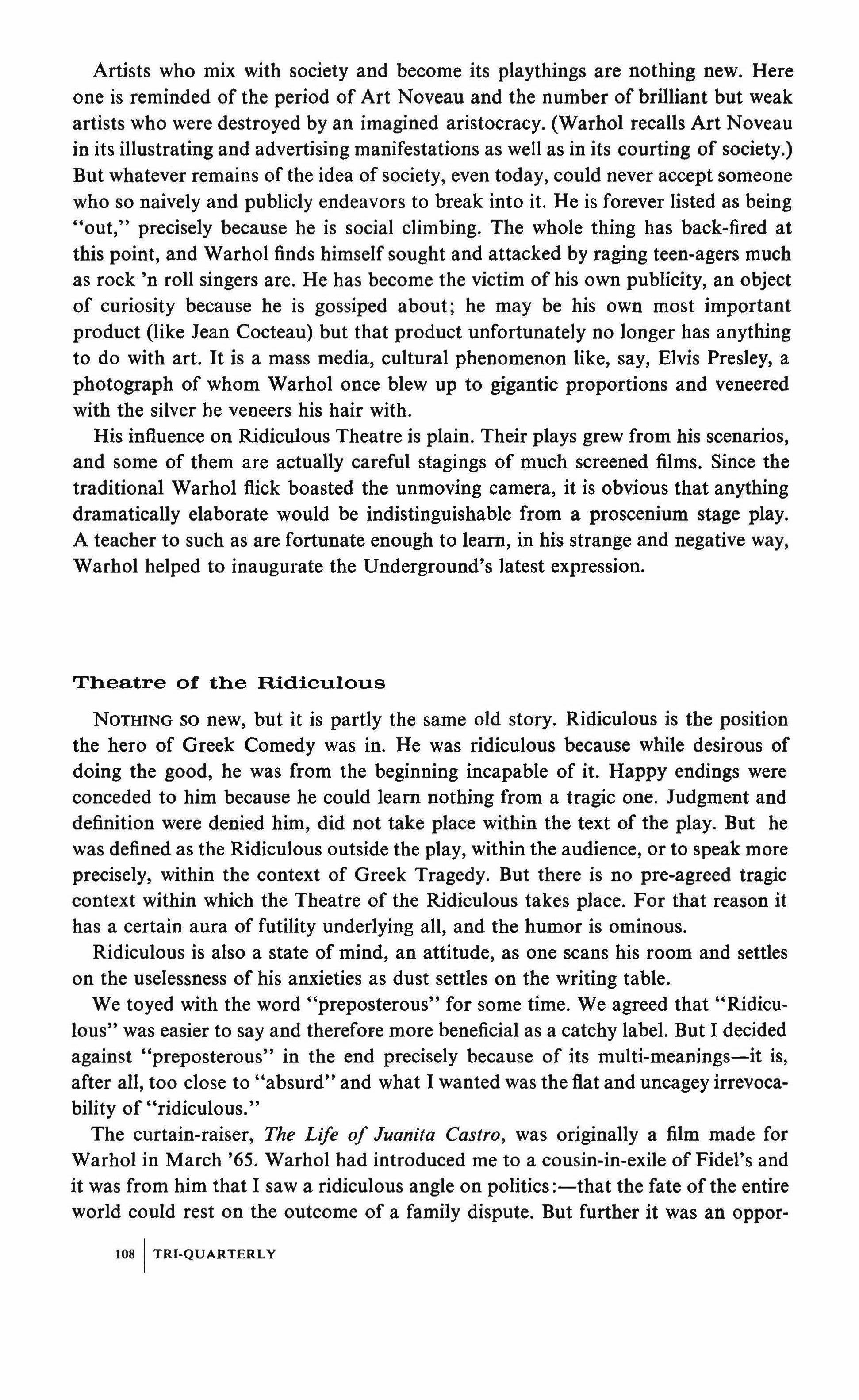
Artists who mix with society and become its playthings are nothing new. Here one is reminded of the period of Art Noveau and the number of brilliant but weak artists who were destroyed by an imagined aristocracy. (Warhol recalls Art Noveau in its illustrating and advertising manifestations as well as in its courting of society.) But whatever remains of the idea of society, even today, could never accept someone who so naively and publicly endeavors to break into it. He is forever listed as being "out," precisely because he is social climbing. The whole thing has back-fired at this point, and Warhol finds himself sought and attacked by raging teen-agers much as rock 'n roll singers are. He has become the victim of his own publicity, an object of curiosity because he is gossiped about; he may be his own most important product (like Jean Cocteau) but that product unfortunately no longer has anything to do with art. It is a mass media, cultural phenomenon like, say, Elvis Presley, a photograph of whom Warhol once blew up to gigantic proportions and veneered with the silver he veneers his hair with.
His influence on Ridiculous Theatre is plain. Their plays grew from his scenarios, and some of them are actually careful stagings of much screened films. Since the traditional Warhol flick boasted the unmoving camera, it is obvious that anything dramatically elaborate would be indistinguishable from a proscenium stage play. A teacher to such as are fortunate enough to learn, in his strange and negative way, Warhol helped to inaugurate the Underground's latest expression.
NOTHING so new, but it is partly the same old story. Ridiculous is the position the hero of Greek Comedy was in. He was ridiculous because while desirous of doing the good, he was from the beginning incapable of it. Happy endings were conceded to him because he could learn nothing from a tragic one. Judgment and definition were denied him, did not take place within the text of the play. But he was defined as the Ridiculous outside the play, within the audience, or to speak more precisely, within the context of Greek Tragedy. But there is no pre-agreed tragic context within which the Theatre of the Ridiculous takes place. For that reason it has a certain aura of futility underlying all, and the humor is ominous.
Ridiculous is also a state of mind, an attitude, as one scans his room and settles on the uselessness of his anxieties as dust settles on the writing table.
We toyed with the word "preposterous" for some time. We agreed that "Ridiculous" was easier to say and therefore more beneficial as a catchy label. But I decided against "preposterous" in the end precisely because of its multi-meanings-it is, after all, too close to "absurd" and what I wanted was the flat and uncagey irrevocability of "ridiculous."
The curtain-raiser, The Life of Juanita Castro, was originally a film made for Warhol in March '65. Warhol had introduced me to a cousin-in-exile of Fidel's and it was from him that I saw a ridiculous angle on politics :-that the fate of the entire world could rest on the outcome of a family dispute. But further it was an oppor-
TRl-QUARTERLY
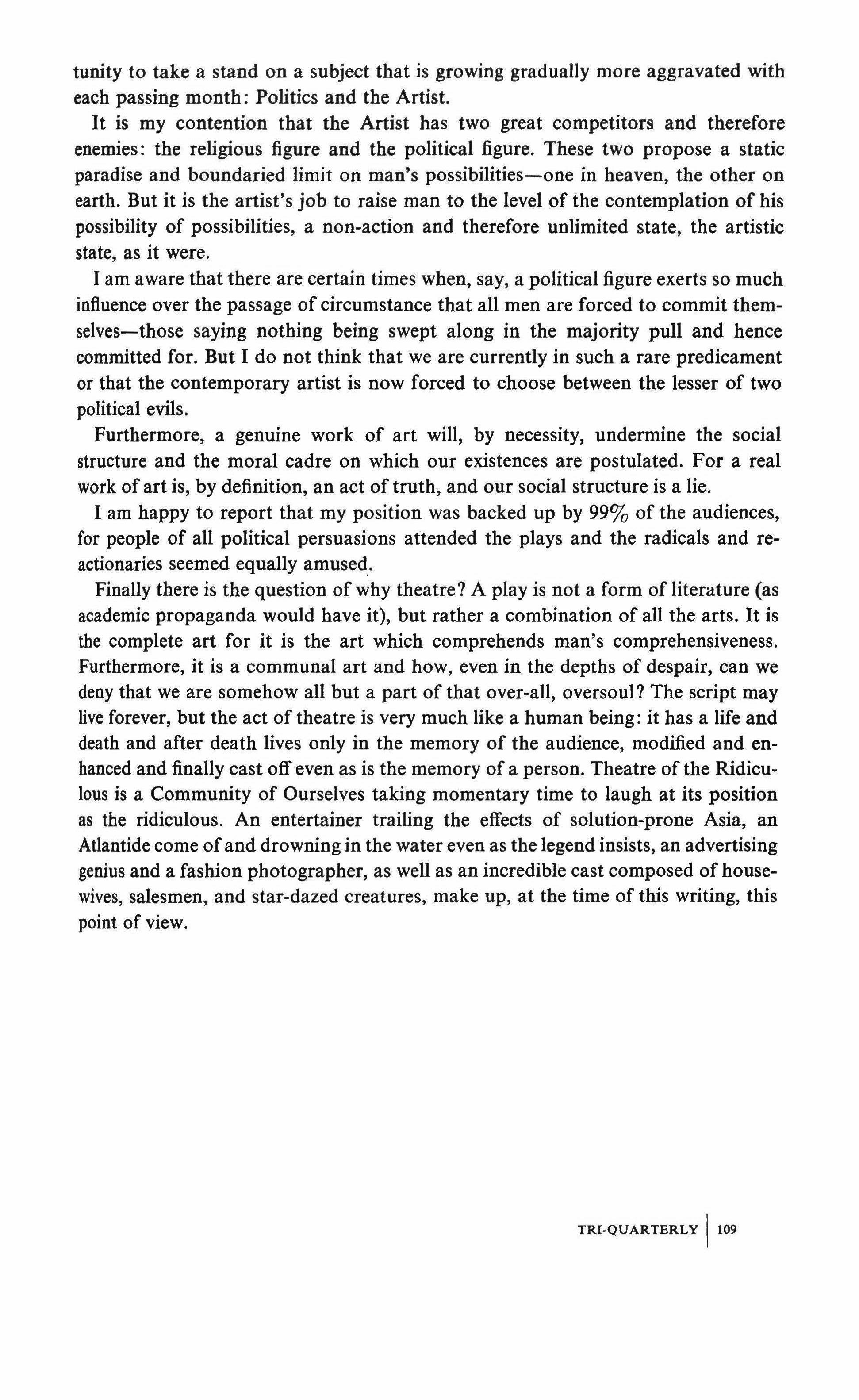
tunity to take a stand on a subject that is growing gradually more aggravated with each passing month: Politics and the Artist.
It is my contention that the Artist has two great competitors and therefore enemies: the religious figure and the political figure. These two propose a static paradise and boundaried limit on man's possibilities-one in heaven, the other on earth. But it is the artist's job to raise man to the level of the contemplation of his possibility of possibilities, a non-action and therefore unlimited state, the artistic state, as it were.
I am aware that there are certain times when, say, a political figure exerts so much influence over the passage of circumstance that all men are forced to commit themselves-those saying nothing being swept along in the majority pull and hence committed for. But I do not think that we are currently in such a rare predicament or that the contemporary artist is now forced to choose between the lesser of two political evils.
Furthermore, a genuine work of art will, by necessity, undermine the social structure and the moral cadre on which our existences are postulated. For a real work of art is, by definition, an act of truth, and our social structure is a lie.
I am happy to report that my position was backed up by 99% of the audiences, for people of all political persuasions attended the plays and the radicals and reactionaries seemed equally amused.
Finally there is the question of why theatre? A play is not a form of literature (as academic propaganda would have it), but rather a combination of all the arts. It is the complete art for it is the art which comprehends man's comprehensiveness. Furthermore, it is a communal art and how, even in the depths of despair, can we deny that we are somehow all but a part of that over-all, oversoul? The script may live forever, but the act of theatre is very much like a human being: it has a life and death and after death lives only in the memory of the audience, modified and enhanced and finally cast off even as is the memory of a person. Theatre of the Ridiculous is a Community of Ourselves taking momentary time to laugh at its position as the ridiculous. An entertainer trailing the effects of solution-prone Asia, an Atlantide come ofand drowning in the water even as the legend insists, an advertising genius and a fashion photographer, as well as an incredible cast composed of housewives, salesmen, and star-dazed creatures, make up, at the time of this writing, this point of view.
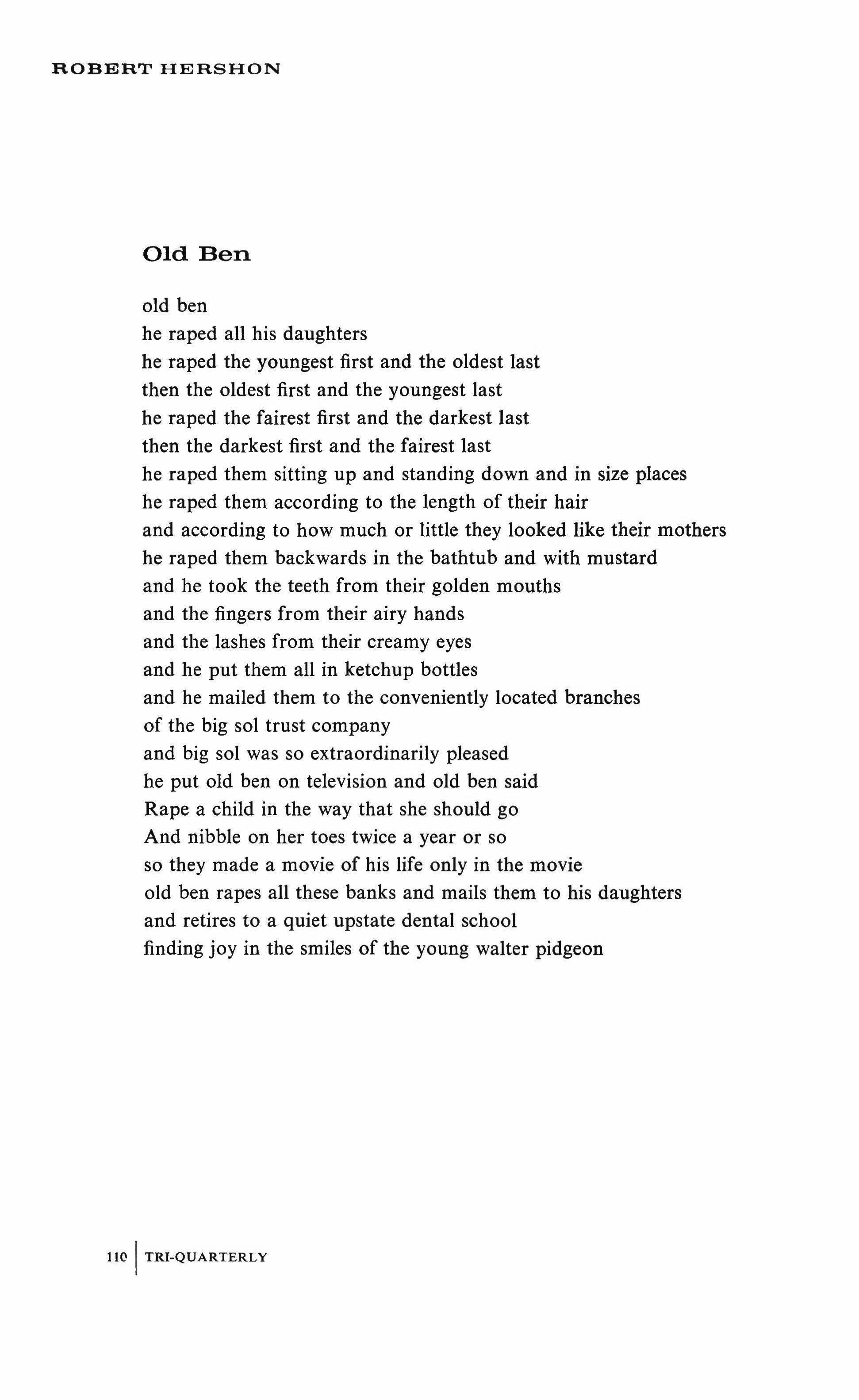
Old Ben
old ben
he raped all his daughters he raped the youngest first and the oldest last then the oldest first and the youngest last he raped the fairest first and the darkest last then the darkest first and the fairest last he raped them sitting up and standing down and in size places he raped them according to the length of their hair and according to how much or little they looked like their mothers he raped them backwards in the bathtub and with mustard and he took the teeth from their golden mouths and the fingers from their airy hands and the lashes from their creamy eyes and he put them all in ketchup bottles and he mailed them to the conveniently located branches of the big sol trust company and big sol was so extraordinarily pleased he put old ben on television and old ben said Rape a child in the way that she should go And nibble on her toes twice a year or so so they made a movie of his life only in the movie old ben rapes all these banks and mails them to his daughters and retires to a quiet upstate dental school finding joy in the smiles of the young walter pidgeon
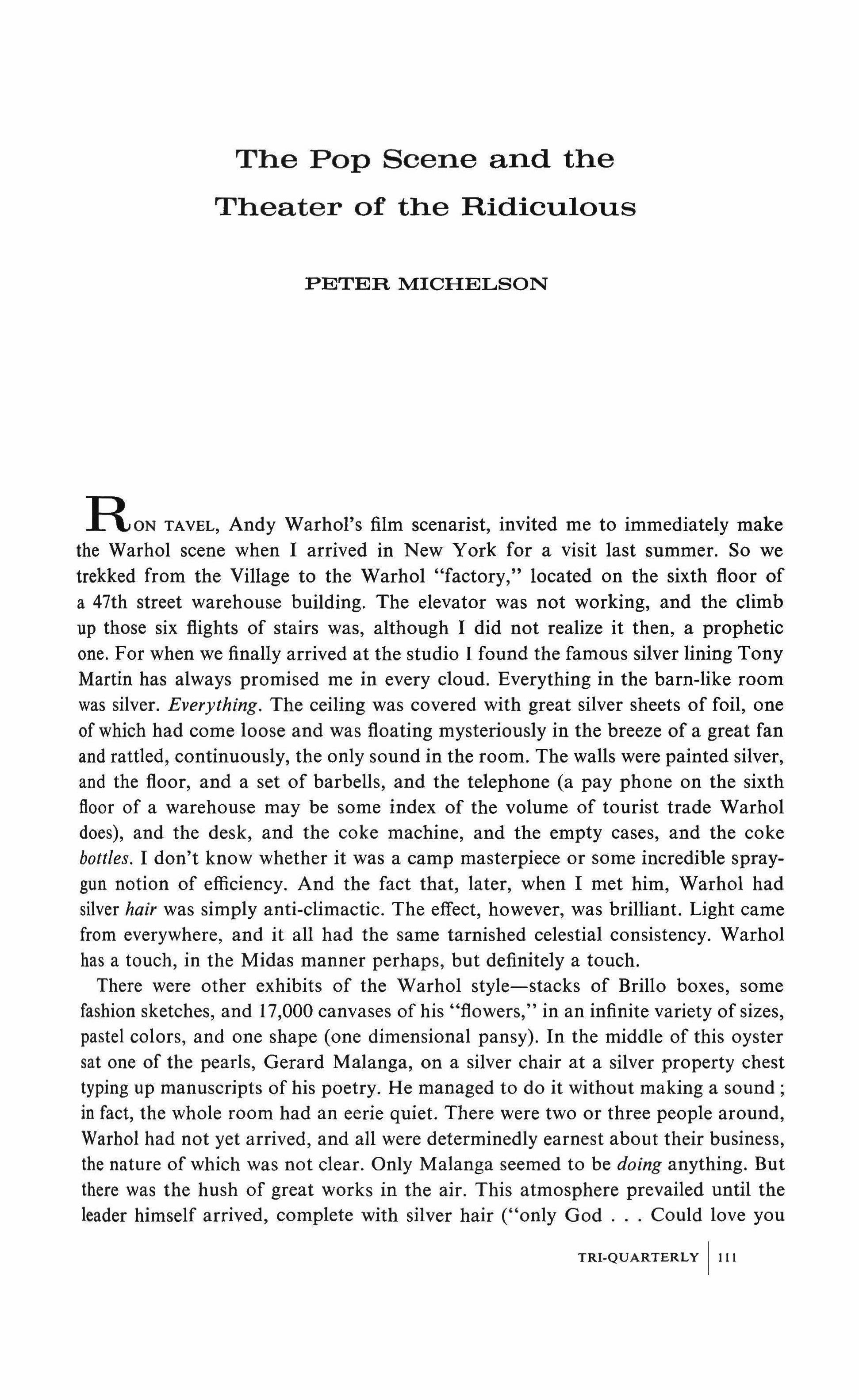
TAVEL, Andy Warhol's film scenarist, invited me to immediately make the Warhol scene when I arrived in New York for a visit last summer. So we trekked from the Village to the Warhol "factory," located on the sixth floor of a 47th street warehouse building, The elevator was not working, and the climb up those six flights of stairs was, although I did not realize it then, a prophetic one. For when we finally arrived at the studio I found the famous silver lining Tony Martin has always promised me in every cloud. Everything in the barn-like room was silver. Everything. The ceiling was covered with great silver sheets of foil, one of which had come loose and was floating mysteriously in the breeze of a great fan and rattled, continuously, the only sound in the room. The walls were painted silver, and the floor, and a set of barbells, and the telephone (a pay phone on the sixth floor of a warehouse may be some index of the volume of tourist trade Warhol does), and the desk, and the coke machine, and the empty cases, and the coke bottles. I don't know whether it was a camp masterpiece or some incredible spraygun notion of efficiency. And the fact that, later, when I met him, Warhol had silver hair was simply anti-climactic. The effect, however, was brilliant. Light came from everywhere, and it all had the same tarnished celestial consistency. Warhol has a touch, in the Midas manner perhaps, but definitely a touch.
There were other exhibits of the Warhol style-stacks of Brillo boxes, some fashion sketches, and 17,000 canvases of his "flowers," in an infinite variety of sizes, pastel colors, and one shape (one dimensional pansy). In the middle of this oyster sat one of the pearls, Gerard Malanga, on a silver chair at a silver property chest typing up manuscripts of his poetry. He managed to do it without making a sound; in fact, the whole room had an eerie quiet. There were two or three people around, Warhol had not yet arrived, and all were determinedly earnest about their business, the nature of which was not clear. Only Malanga seemed to be doing anything. But there was the hush of great works in the air. This atmosphere prevailed until the leader himself arrived, complete with silver hair ("only God Could love you
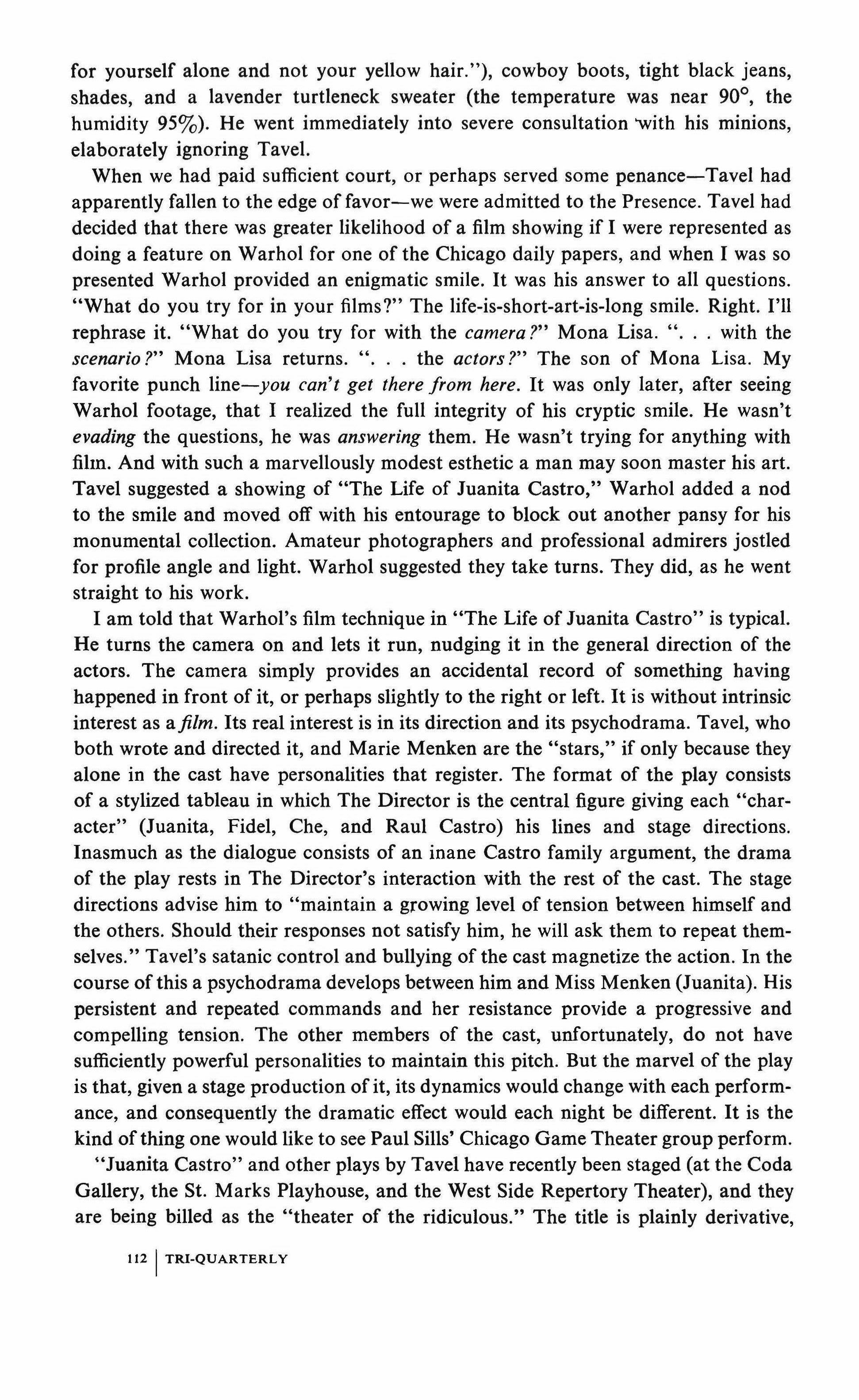
for yourself alone and not your yellow hair."), cowboy boots, tight black jeans, shades, and a lavender turtleneck sweater (the temperature was near 90°, the humidity 95%). He went immediately into severe consultation 'With his minions, elaborately ignoring Tavel.
When we had paid sufficient court, or perhaps served some penance-Tavel had apparently fallen to the edge of favor-we were admitted to the Presence. Tavel had decided that there was greater likelihood of a film showing if I were represented as doing a feature on Warhol for one of the Chicago daily papers, and when I was so presented Warhol provided an enigmatic smile. It was his answer to all questions. "What do you try for in your films?" The Iife-is-short-art-is-long smile. Right. I'll rephrase it. "What do you try for with the camera?" Mona Lisa. with the scenario?" Mona Lisa returns. ". the actors?" The son of Mona Lisa. My favorite punch line-you can't get there from here. It was only later, after seeing Warhol footage, that I realized the full integrity of his cryptic smile. He wasn't evading the questions, he was answering them. He wasn't trying for anything with film. And with such a marvellously modest esthetic a man may soon master his art. Tavel suggested a showing of "The Life of Juanita Castro," Warhol added a nod to the smile and moved off with his entourage to block out another pansy for his monumental collection. Amateur photographers and professional admirers jostled for profile angle and light. Warhol suggested they take turns. They did, as he went straight to his work.
I am told that Warhol's film technique in "The Life of Juanita Castro" is typical. He turns the camera on and lets it run, nudging it in the general direction of the actors. The camera simply provides an accidental record of something having happened in front of it, or perhaps slightly to the right or left. It is without intrinsic interest as afilm. Its real interest is in its direction and its psychodrama. Tavel, who both wrote and directed it, and Marie Menken are the "stars," if only because they alone in the cast have personalities that register. The format of the play consists of a stylized tableau in which The Director is the central figure giving each "character" (Juanita, Fidel, Che, and Raul Castro) his lines and stage directions. Inasmuch as the dialogue consists of an inane Castro family argument, the drama of the play rests in The Director's interaction with the rest of the cast. The stage directions advise him to "maintain a growing level of tension between himself and the others. Should their responses not satisfy him, he will ask them to repeat themselves." Tavel's satanic control and bullying of the cast magnetize the action. In the course of this a psychodrama develops between him and Miss Menken (Juanita). His persistent and repeated commands and her resistance provide a progressive and compelling tension. The other members of the cast, unfortunately, do not have sufficiently powerful personalities to maintain this pitch. But the marvel of the play is that, given a stage production of it, its dynamics would change with each performance, and consequently the dramatic effect would each night be different. It is the kind of thing one would like to see Paul Sills' Chicago Game Theater group perform.
"Juanita Castro" and other plays by Tavel have recently been staged (at the Coda Gallery, the St. Marks Playhouse, and the West Side Repertory Theater), and they are being billed as the "theater of the ridiculous." The title is plainly derivative, 1121 TRI-QUARTERLY


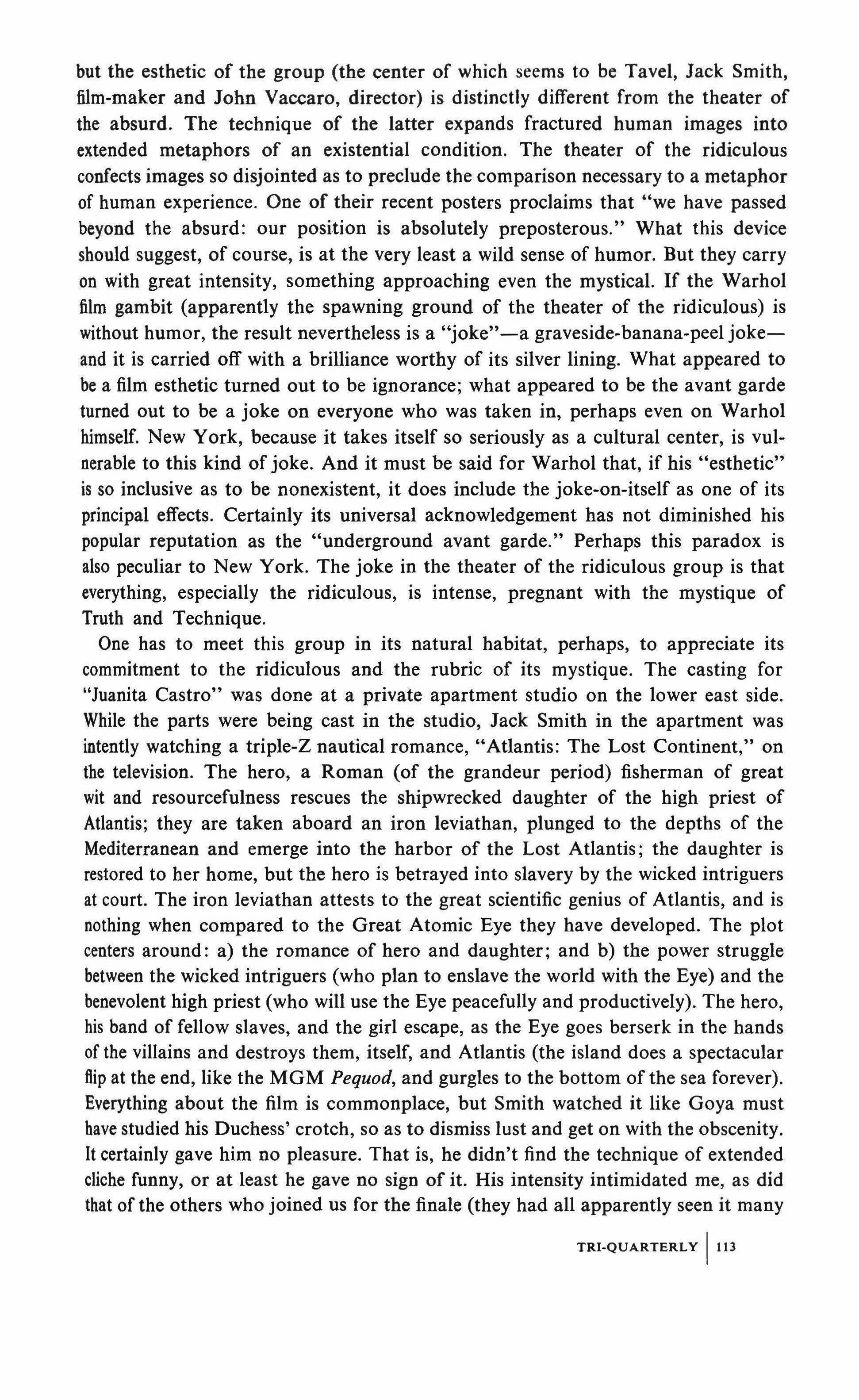
but the esthetic of the group (the center of which seems to be Tavel, Jack Smith, film-maker and John Vaccaro, director) is distinctly different from the theater of the absurd. The technique of the latter expands fractured human images into extended metaphors of an existential condition. The theater of the ridiculous confects images so disjointed as to preclude the comparison necessary to a metaphor of human experience. One of their recent posters proclaims that "we have passed beyond the absurd: our position is absolutely preposterous." What this device should suggest, of course, is at the very least a wild sense of humor. But they carry on with great intensity, something approaching even the mystical. If the Warhol film gambit (apparently the spawning ground of the theater of the ridiculous) is without humor, the result nevertheless is a "joke"-a graveside-banana-peel jokeand it is carried off with a brilliance worthy of its silver lining. What appeared to be a film esthetic turned out to be ignorance; what appeared to be the avant garde turned out to be a joke on everyone who was taken in, perhaps even on Warhol himself. New York, because it takes itself so seriously as a cultural center, is vulnerable to this kind of joke. And it must be said for Warhol that, if his "esthetic" is so inclusive as to be nonexistent, it does include the joke-on-itself as one of its principal effects. Certainly its universal acknowledgement has not diminished his popular reputation as the "underground avant garde." Perhaps this paradox is also peculiar to New York. The joke in the theater of the ridiculous group is that everything, especially the ridiculous, is intense, pregnant with the mystique of Truth and Technique.
One has to meet this group in its natural habitat, perhaps, to appreciate its commitment to the ridiculous and the rubric of its mystique. The casting for "Juanita Castro" was done at a private apartment studio on the lower east side. While the parts were being cast in the studio, Jack Smith in the apartment was intently watching a triple-Z nautical romance, "Atlantis: The Lost Continent," on the television. The hero, a Roman (of the grandeur period) fisherman of great wit and resourcefulness rescues the shipwrecked daughter of the high priest of Atlantis; they are taken aboard an iron leviathan, plunged to the depths of the Mediterranean and emerge into the harbor of the Lost Atlantis; the daughter is restored to her home, but the hero is betrayed into slavery by the wicked intriguers at court. The iron leviathan attests to the great scientific genius of Atlantis, and is nothing when compared to the Great Atomic Eye they have developed. The plot centers around: a) the romance of hero and daughter; and b) the power struggle between the wicked intriguers (who plan to enslave the world with the Eye) and the benevolent high priest (who will use the Eye peacefully and productively). The hero, his band of fellow slaves, and the girl escape, as the Eye goes berserk in the hands of the villains and destroys them, itself, and Atlantis (the island does a spectacular ftip at the end, like the MGM Pequod, and gurgles to the bottom of the sea forever). Everything about the film is commonplace, but Smith watched it like Goya must have studied his Duchess' crotch, so as to dismiss lust and get on with the obscenity. It certainly gave him no pleasure. That is, he didn't find the technique of extended cliche funny, or at least he gave no sign of it. His intensity intimidated me, as did that of the others who joined us for the finale (they had all apparently seen it many
TRI-QUARTERLY 1113
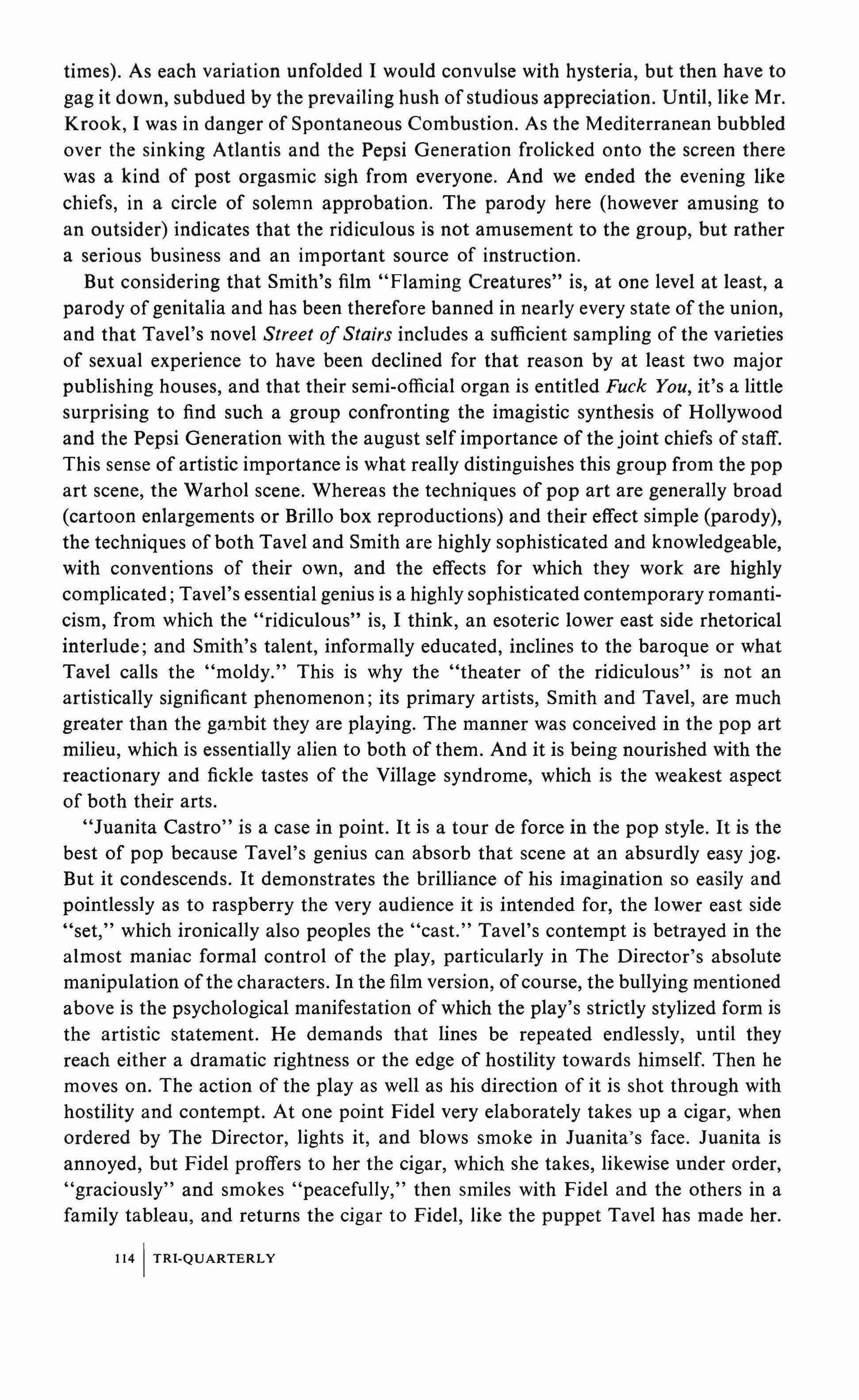
times). As each variation unfolded I would convulse with hysteria, but then have to gag it down, subdued by the prevailing hush of studious appreciation. Until, like Mr. Krook, I was in danger of Spontaneous Combustion. As the Mediterranean bubbled over the sinking Atlantis and the Pepsi Generation frolicked onto the screen there was a kind of post orgasmic sigh from everyone. And we ended the evening like chiefs, in a circle of solemn approbation. The parody here (however amusing to an outsider) indicates that the ridiculous is not amusement to the group, but rather a serious business and an important source of instruction.
But considering that Smith's film "Flaming Creatures" is, at one level at least, a parody of genitalia and has been therefore banned in nearly every state of the union, and that Tavel's novel Street of Stairs includes a sufficient sampling of the varieties of sexual experience to have been declined for that reason by at least two major publishing houses, and that their semi-official organ is entitled Fuck You, it's a little surprising to find such a group confronting the imagistic synthesis of Hollywood and the Pepsi Generation with the august self importance of the joint chiefs of staff. This sense of artistic importance is what really distinguishes this group from the pop art scene, the Warhol scene. Whereas the techniques of pop art are generally broad (cartoon enlargements or Brillo box reproductions) and their effect simple (parody), the techniques of both Tavel and Smith are highly sophisticated and knowledgeable, with conventions of their own, and the effects for which they work are highly complicated; Tavel's essential genius is a highly sophisticated contemporary romanticism, from which the "ridiculous" is, I think, an esoteric lower east side rhetorical interlude; and Smith's talent, informally educated, inclines to the baroque or what Tavel calls the "moldy." This is why the "theater of the ridiculous" is not an artistically significant phenomenon; its primary artists, Smith and Tavel, are much greater than the gambit they are playing. The manner was conceived in the pop art milieu, which is essentially alien to both of them. And it is being nourished with the reactionary and fickle tastes of the Village syndrome, which is the weakest aspect of both their arts.
"Juanita Castro" is a case in point. It is a tour de force in the pop style. It is the best of pop because Tavel's genius can absorb that scene at an absurdly easy jog. But it condescends. It demonstrates the brilliance of his imagination so easily and pointlessly as to raspberry the very audience it is intended for, the lower east side "set," which ironically also peoples the "cast." Tavel's contempt is betrayed in the almost maniac formal control of the play, particularly in The Director's absolute manipulation ofthe characters. In the film version, of course, the bullying mentioned above is the psychological manifestation of which the play's strictly stylized form is the artistic statement. He demands that lines be repeated endlessly, until they reach either a dramatic rightness or the edge of hostility towards himself. Then he moves on. The action of the playas well as his direction of it is shot through with hostility and contempt. At one point Fidel very elaborately takes up a cigar, when ordered by The Director, lights it, and blows smoke in Juanita's face. Juanita is annoyed, but Fidel proffers to her the cigar, which she takes, likewise under order, "graciously" and smokes "peacefully," then smiles with Fidel and the others in a family tableau, and returns the cigar to Fidel, like the puppet Tavel has made her.
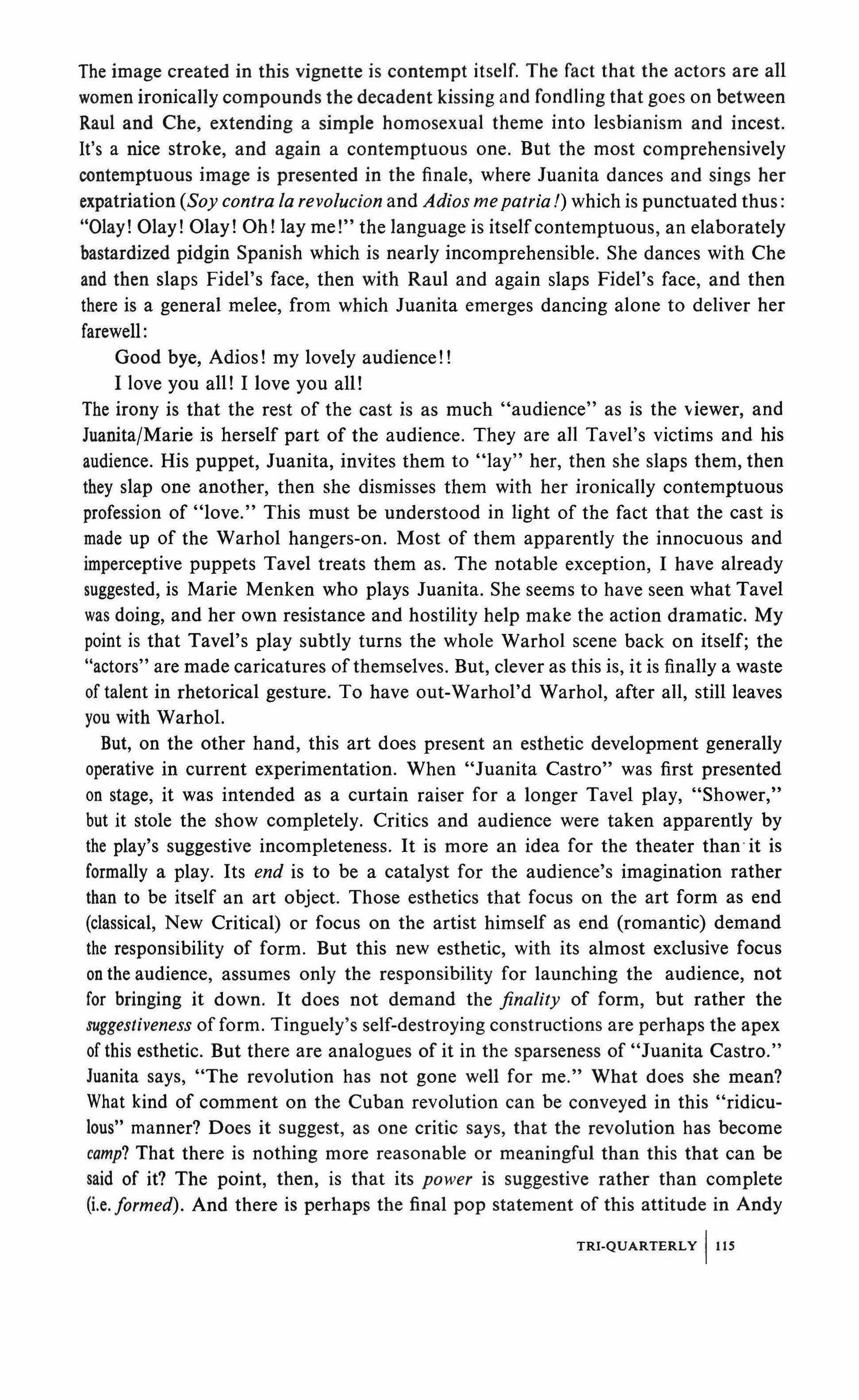
The image created in this vignette is contempt itself. The fact that the actors are all women ironically compounds the decadent kissing and fondling that goes on between Raul and Che, extending a simple homosexual theme into lesbianism and incest. It's a nice stroke, and again a contemptuous one. But the most comprehensively contemptuous image is presented in the finale, where Juanita dances and sings her expatriation (Soy contra fa revofucion and Adios me patria I) which is punctuated thus: "Olay! Olay! Olay! Oh! lay me!" the language is itselfcontemptuous, an elaborately bastardized pidgin Spanish which is nearly incomprehensible. She dances with Che and then slaps Fidel's face, then with Raul and again slaps Fidel's face, and then there is a general melee, from which Juanita emerges dancing alone to deliver her farewell:
Good bye, Adios! my lovely audience! !
I love you all! I love you all!
The irony is that the rest of the cast is as much "audience" as is the viewer, and Juanita/Marie is herself part of the audience. They are all Tavel's victims and his audience. His puppet, Juanita, invites them to "lay" her, then she slaps them, then they slap one another, then she dismisses them with her ironically contemptuous profession of "love." This must be understood in light of the fact that the cast is made up of the Warhol hangers-on. Most of them apparently the innocuous and imperceptive puppets Tavel treats them as. The notable exception, I have already suggested, is Marie Menken who plays Juanita. She seems to have seen what Tavel was doing, and her own resistance and hostility help make the action dramatic. My point is that Tavel's play subtly turns the whole Warhol scene back on itself; the "actors" are made caricatures of themselves. But, clever as this is, it is finally a waste of talent in rhetorical gesture. To have out-Warhol'd Warhol, after all, still leaves you with Warhol.
But, on the other hand, this art does present an esthetic development generally operative in current experimentation. When "Juanita Castro" was first presented on stage, it was intended as a curtain raiser for a longer Tavel play, "Shower," but it stole the show completely. Critics and audience were taken apparently by the play's suggestive incompleteness. It is more an idea for the theater than' it is formally a play. Its end is to be a catalyst for the audience's imagination rather than to be itself an art object. Those esthetics that focus on the art form as end (classical, New Critical) or focus on the artist himself as end (romantic) demand the responsibility of form. But this new esthetic, with its almost exclusive focus on the audience, assumes only the responsibility for launching the audience, not for bringing it down. It does not demand the finality of form, but rather the suggestiveness of form. Tinguely's self-destroying constructions are perhaps the apex of this esthetic. But there are analogues of it in the sparseness of "Juanita Castro." Juanita says, "The revolution has not gone well for me." What does she mean? What kind of comment on the Cuban revolution can be conveyed in this "ridiculous" manner? Does it suggest, as one critic says, that the revolution has become camp? That there is nothing more reasonable or meaningful than this that can be said of it? The point, then, is that its power is suggestive rather than complete (i.e.formed). And there is perhaps the final pop statement of this attitude in Andy TRI-QUARTERLY IllS
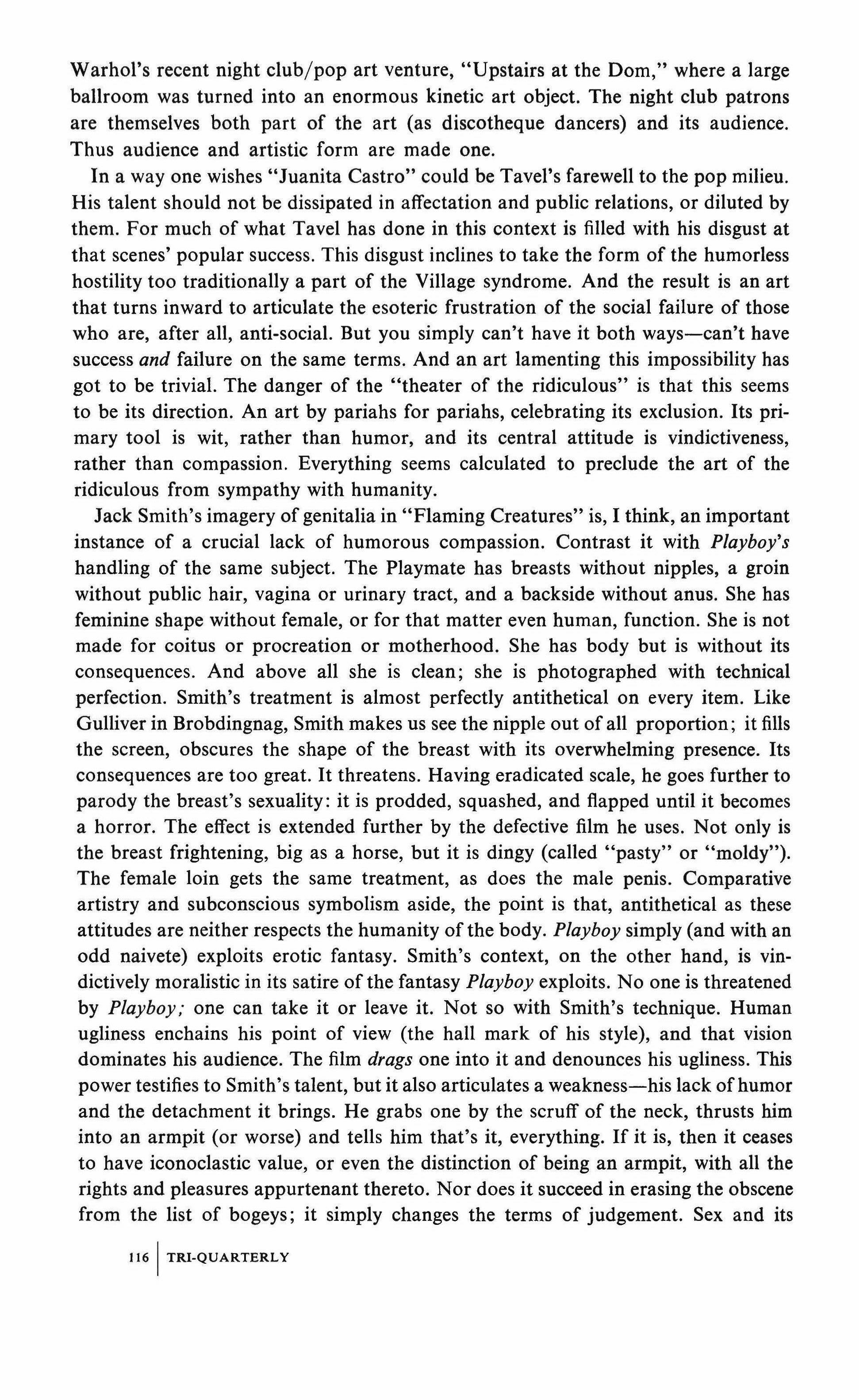
Warhol's recent night club/pop art venture, "Upstairs at the Dom," where a large ballroom was turned into an enormous kinetic art object. The night club patrons are themselves both part of the art (as discotheque dancers) and its audience. Thus audience and artistic form are made one.
In a way one wishes "Juanita Castro" could be Tavel's farewell to the pop milieu. His talent should not be dissipated in affectation and public relations, or diluted by them. For much of what Tavel has done in this context is filled with his disgust at that scenes' popular success. This disgust inclines to take the form of the humorless hostility too traditionally a part of the Village syndrome. And the result is an art that turns inward to articulate the esoteric frustration of the social failure of those who are, after all, anti-social. But you simply can't have it both ways-can't have success and failure on the same terms. And an art lamenting this impossibility has got to be trivial. The danger of the "theater of the ridiculous" is that this seems to be its direction. An art by pariahs for pariahs, celebrating its exclusion. Its primary tool is wit, rather than humor, and its central attitude is vindictiveness, rather than compassion. Everything seems calculated to preclude the art of the ridiculous from sympathy with humanity.
Jack Smith's imagery of genitalia in "Flaming Creatures" is, I think, an important instance of a crucial lack of humorous compassion. Contrast it with Playboy's handling of the same subject. The Playmate has breasts without nipples, a groin without public hair, vagina or urinary tract, and a backside without anus. She has feminine shape without female, or for that matter even human, function. She is not made for coitus or procreation or motherhood. She has body but is without its consequences. And above all she is clean; she is photographed with technical perfection. Smith's treatment is almost perfectly antithetical on every item. Like Gulliver in Brobdingnag, Smith makes us see the nipple out of all proportion; it fills the screen, obscures the shape of the breast with its overwhelming presence. Its consequences are too great. It threatens. Having eradicated scale, he goes further to parody the breast's sexuality: it is prodded, squashed, and flapped until it becomes a horror. The effect is extended further by the defective film he uses. Not only is the breast frightening, big as a horse, but it is dingy (called "pasty" or "moldy"). The female loin gets the same treatment, as does the male penis. Comparative artistry and subconscious symbolism aside, the point is that, antithetical as these attitudes are neither respects the humanity of the body. Playboy simply (and with an odd naivete) exploits erotic fantasy. Smith's context, on the other hand, is vindictively moralistic in its satire of the fantasy Playboy exploits. No one is threatened by Playboy; one can take it or leave it. Not so with Smith's technique. Human ugliness enchains his point of view (the hall mark of his style), and that vision dominates his audience. The film drags one into it and denounces his ugliness. This power testifies to Smith's talent, but it also articulates a weakness-his lack of humor and the detachment it brings. He grabs one by the scruff of the neck, thrusts him into an armpit (or worse) and tells him that's it, everything. If it is, then it ceases to have iconoclastic value, or even the distinction of being an armpit, with all the rights and pleasures appurtenant thereto. Nor does it succeed in erasing the obscene from the list of bogeys; it simply changes the terms of judgement. Sex and its
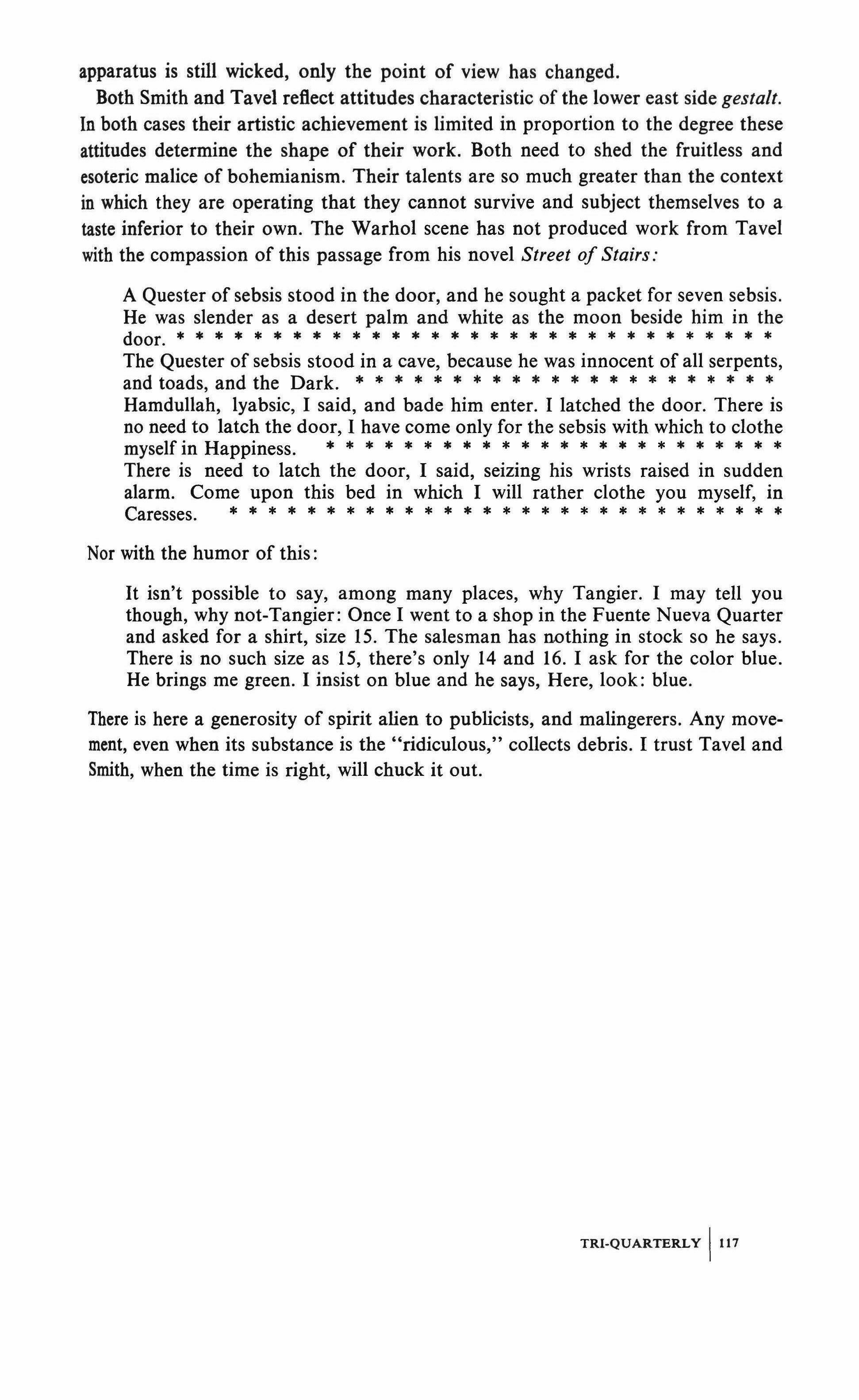
apparatus is still wicked, only the point of view has changed.
Both Smith and Tavel reflect attitudes characteristic of the lower east side gestalt. In both cases their artistic achievement is limited in proportion to the degree these attitudes determine the shape of their work. Both need to shed the fruitless and esoteric malice of bohemianism. Their talents are so much greater than the context in which they are operating that they cannot survive and subject themselves to a taste inferior to their own. The Warhol scene has not produced work from Tavel with the compassion of this passage from his novel Street of Stairs:
A Quester of sebsis stood in the door, and he sought a packet for seven sebsis. He was slender as a desert palm and white as the moon beside him in the door.
The Quester of sebsis stood in a cave, because he was innocent of all serpents, and toads, and the Dark.
Hamdullah, lyabsic, I said, and bade him enter. I latched the door. There is no need to latch the door, I have come only for the sebsis with which to clothe myself in Happiness.
There is need to latch the door, I said, seizing his wrists raised in sudden alarm. Come upon this bed in which I will rather clothe you myself, in Caresses.
Nor with the humor of this:
It isn't possible to say, among many places, why Tangier. I may tell you though, why not-Tangier: Once I went to a shop in the Fuente Nueva Quarter and asked for a shirt, size 15. The salesman has nothing in stock so he says. There is no such size as 15, there's only 14 and 16. I ask for the color blue. He brings me green. I insist on blue and he says, Here, look: blue.
There is here a generosity of spirit alien to publicists, and malingerers. Any movement, even when its substance is the "ridiculous," collects debris. I trust Tavel and Smith, when the time is right, will chuck it out.
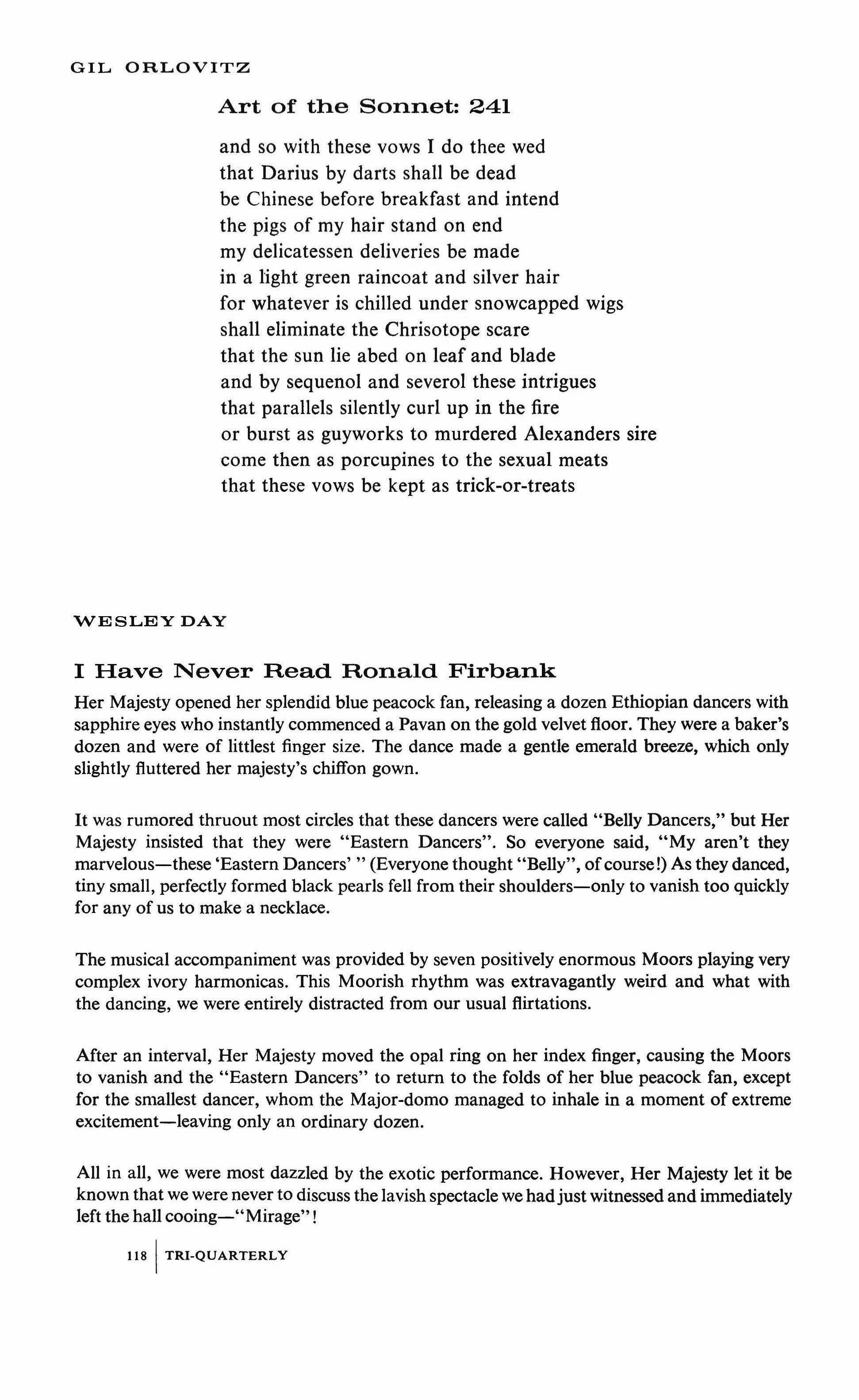
Art of the Sonnet: 241 and so with these vows I do thee wed that Darius by darts shall be dead be Chinese before breakfast and intend the pigs of my hair stand on end my delicatessen deliveries be made in a light green raincoat and silver hair for whatever is chilled under snowcapped wigs shall eliminate the Chrisotope scare that the sun lie abed on leaf and blade and by sequenol and severol these intrigues that parallels silently curl up in the fire or burst as guyworks to murdered Alexanders sire come then as porcupines to the sexual meats that these vows be kept as trick-or-treats
Her Majesty opened her splendid blue peacock fan, releasing a dozen Ethiopian dancers with sapphire eyes who instantly commenced a Pavan on the gold velvet floor. They were a baker's dozen and were of littlest finger size. The dance made a gentle emerald breeze, which only slightly fluttered her majesty's chiffon gown.
It was rumored thruout most circles that these dancers were called "Belly Dancers," but Her Majesty insisted that they were "Eastern Dancers". So everyone said, "My aren't they marvelous-these 'Eastern Dancers' (Everyone thought "Belly", ofcourse!) As they danced, tiny small, perfectly formed black pearls fell from their shoulders-only to vanish too quickly for any of us to make a necklace.
The musical accompaniment was provided by seven positively enormous Moors playing very complex ivory harmonicas. This Moorish rhythm was extravagantly weird and what with the dancing, we were entirely distracted from our usual flirtations.
After an interval, Her Majesty moved the opal ring on her index finger, causing the Moors to vanish and the "Eastern Dancers" to return to the folds of her blue peacock fan, except for the smallest dancer, whom the Major-domo managed to inhale in a moment of extreme excitement-leaving only an ordinary dozen.
All in all, we were most dazzled by the exotic performance. However, Her Majesty let it be known that we were never to discuss the lavish spectacle we hadjust witnessed and immediately left the hall cooing-"Mirage" !

characters:
JUANITA
FIDEL
CHE RAUL
EXTRAS
THE DIRECTOR
props:
JUANITA'S GUN
JUANITA'S FAN
FIDEL'S CIGAR
FIDEL'S CORD
CHE'S HANDKERCHIEF
(The Director and Juanita are to be played by male actors. The others, including any extras that are used, byfemales.
Upon the curtain's rise, or after their entrance, JUANITA should be seated. FIDEL may stand or sit to JUANITA'S left. CHE may stand or sit to JUANITA'S right. RAUL should stand behind and between JUANITA and CHE. The DIRECTOR may sit where he pleases, either above and behind the group, or in front of it, but at some distance from and facing it.
JUANITA should be dressed in an attractive, perhaps flamboyant dress, gay Latin colors. A wig is not necessary, a tiara or dark mantilla will do. FIDEL, RAUL, and CHE
© Copyright 1966 by Ronald
TavelTRI-QUARTERLY 1119
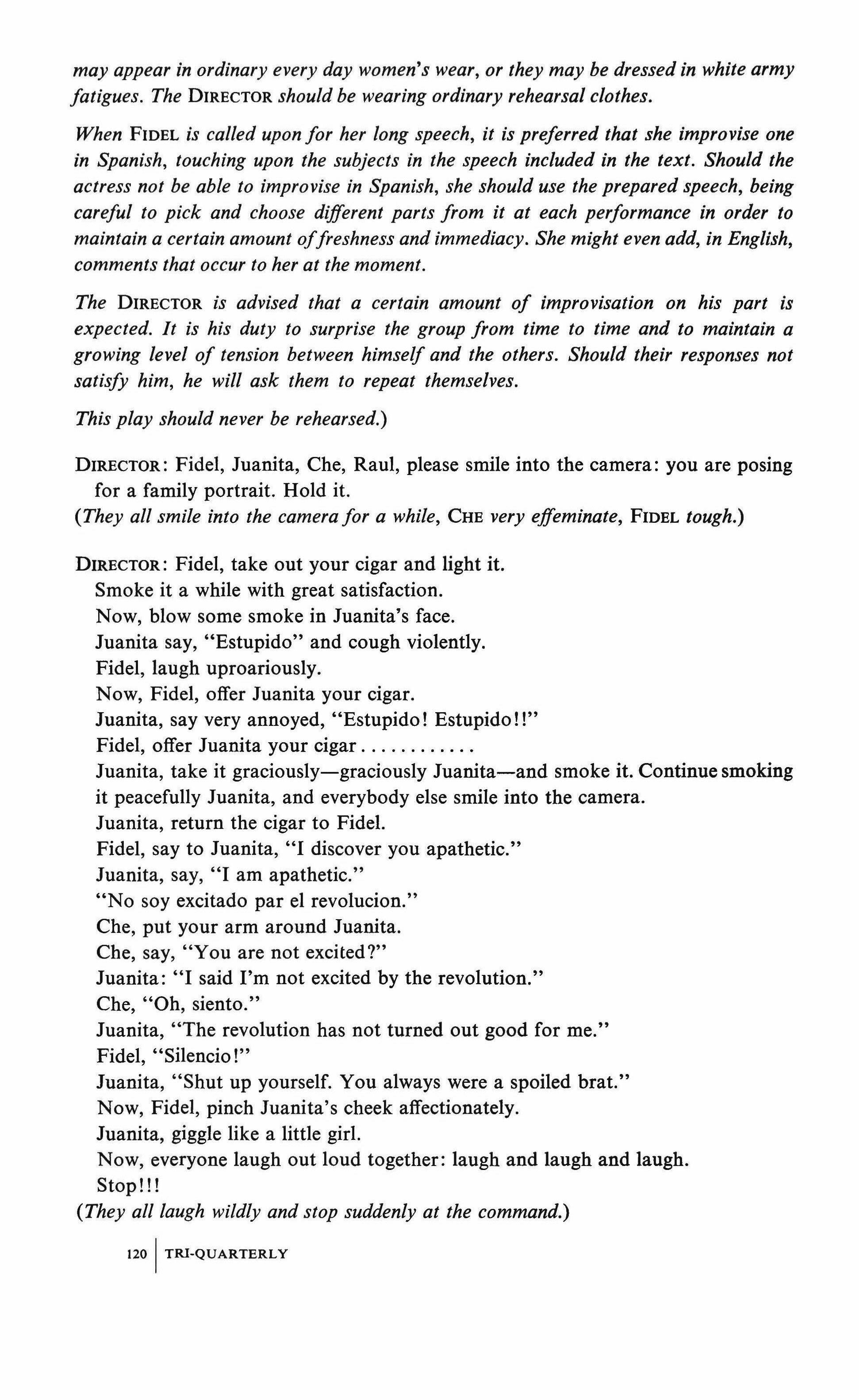
may appear in ordinary every day women's wear, or they may be dressed in white army fatigues. The DIRECTOR should be wearing ordinary rehearsal clothes.
When FIDEL is called upon for her long speech, it is preferred that she improvise one in Spanish, touching upon the subjects in the speech included in the text. Should the actress not be able to improvise in Spanish, she should use the prepared speech, being careful to pick and choose different parts from it at each performance in order to maintain a certain amount offreshness and immediacy. She might even add, in English, comments that occur to her at the moment.
The DIRECTOR is advised that a certain amount of improvisation on his part is expected. It is his duty to surprise the group from time to time and to maintain a growing level of tension between himself and the others. Should their responses not satisfy him, he will ask them to repeat themselves.
This play should never be rehearsed.)
DIRECTOR: Fidel, Juanita, Che, Raul, please smile into the camera: you are posing for a family portrait. Hold it.
(They all smile into the camera for a while, CHE very effeminate, FIDEL tough.)
DIRECTOR: Fidel, take out your cigar and light it.
Smoke it a while with great satisfaction.
Now, blow some smoke in Juanita's face.
Juanita say, "Estupido" and cough violently.
Fidel, laugh uproariously.
Now, Fidel, offer Juanita your cigar.
Juanita, say very annoyed, "Estupido! Estupido!!"
Fidel, offer Juanita your cigar
Juanita, take it graciously-graciously Juanita-and smoke it. Continue smoking it peacefully Juanita, and everybody else smile into the camera.
Juanita, return the cigar to Fidel.
Fidel, say to Juanita, "I discover you apathetic."
Juanita, say, "I am apathetic."
"No soy excitado par el revolucion."
Che, put your arm around Juanita. Che, say, "You are not excited?"
Juanita: "I said I'm not excited by the revolution."
Che, "Oh, siento."
Juanita, "The revolution has not turned out good for me."
Fidel, "Silencio!"
Juanita, "Shut up yourself. You always were a spoiled brat."
Now, Fidel, pinch Juanita's cheek affectionately.
Juanita, giggle like a little girl.
Now, everyone laugh out loud together: laugh and laugh and laugh. Stop!!!
(They all laugh wildly and stop suddenly at the command.)
120 I TRl-QUARTERLY
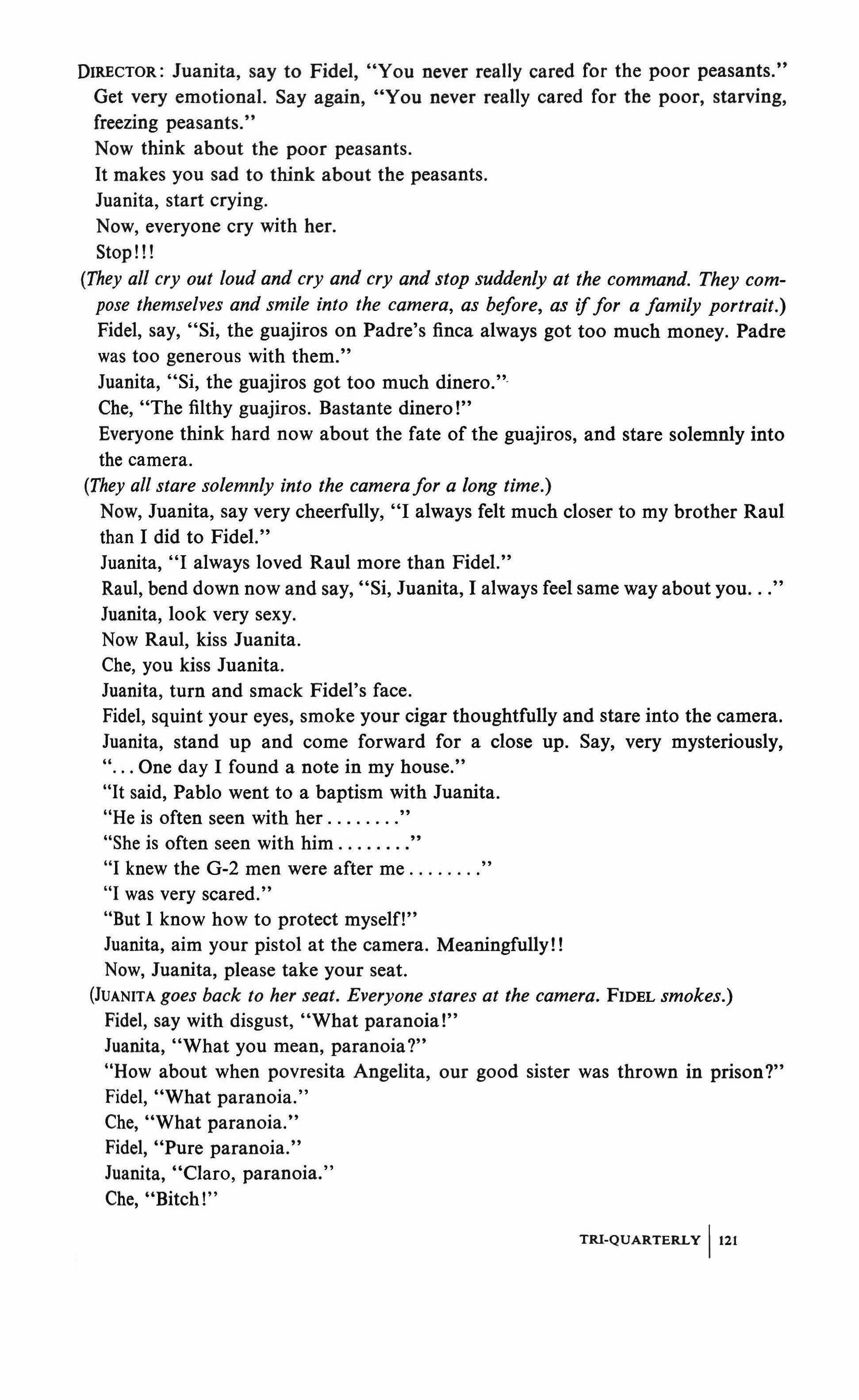
DIRECTOR: Juanita, say to Fidel, "You never really cared for the poor peasants."
Get very emotional. Say again, "You never really cared for the poor, starving, freezing peasants."
Now think about the poor peasants. It makes you sad to think about the peasants.
Juanita, start crying.
Now, everyone cry with her.
Stop!!!
(They all cry out loud and cry and cry and stop suddenly at the command. They compose themselves and smile into the camera, as before, as iffor a family portrait.)
Fidel, say, "Si, the guajiros on Padre's finca always got too much money. Padre was too generous with them."
Juanita, "Si, the guajiros got too much dinero.":
Che, "The filthy guajiros. Bastante dinero!"
Everyone think hard now about the fate of the guajiros, and stare solemnly into the camera.
(They all stare solemnly into the camera for a long time.)
Now, Juanita, say very cheerfully, "I always felt much closer to my brother Raul than I did to Fidel."
Juanita, "I always loved Raul more than Fidel."
Raul, bend down now and say, "Si, Juanita, I always feel same way about you "
Juanita, look very sexy.
Now Raul, kiss Juanita.
Che, you kiss Juanita.
Juanita, turn and smack Fidel's face.
Fidel, squint your eyes, smoke your cigar thoughtfully and stare into the camera. Juanita, stand up and come forward for a close up. Say, very mysteriously, One day I found a note in my house."
"It said, Pablo went to a baptism with Juanita.
"He is often seen with her
"She is often seen with him "
"I knew the G-2 men were after me
"I was very scared."
"But I know how to protect myselfl"
Juanita, aim your pistol at the camera. Meaningfully!!
Now, Juanita, please take your seat.
(JUANITA goes back to her seat. Everyone stares at the camera. FIDEL smokes.)
Fidel, say with disgust, "What paranoia!"
Juanita, "What you mean, paranoia?"
"How about when povresita Angelita, our good sister was thrown in prison?"
Fidel, "What paranoia."
Che, "What paranoia."
Fidel, "Pure paranoia."
Juanita, "Claro, paranoia."
Che, "Bitch!"
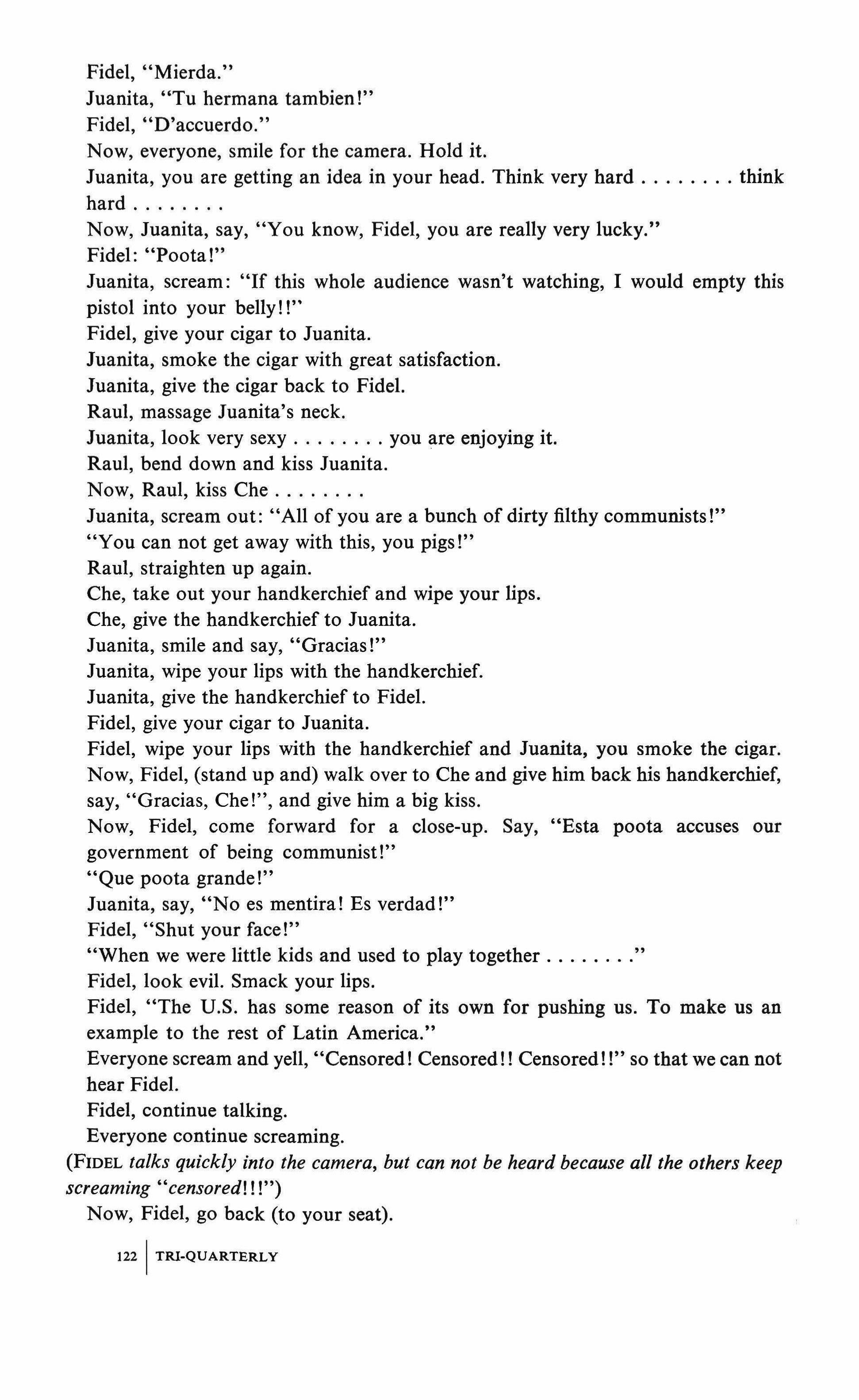
Fidel, "Mierda."
Juanita, "Tu hermana tambien!"
Fidel, "D'accuerdo."
Now, everyone, smile for the camera. Hold it.
Juanita, you are getting an idea in your head. Think very hard think hard
Now, Juanita, say, "You know, Fidel, you are really very lucky."
Fidel: "Poota!"
Juanita, scream: "If this whole audience wasn't watching, I would empty this pistol into your belly!!"
Fidel, give your cigar to Juanita.
Juanita, smoke the cigar with great satisfaction.
Juanita, give the cigar back to Fidel.
Raul, massage Juanita's neck.
Juanita, look very sexy you are enjoying it.
Raul, bend down and kiss Juanita.
Now, Raul, kiss Che
Juanita, scream out: "All of you are a bunch of dirty filthy communists!"
"You can not get away with this, you pigs!"
Raul, straighten up again.
Che, take out your handkerchief and wipe your lips.
Che, give the handkerchief to Juanita.
Juanita, smile and say, "Gracias!"
Juanita, wipe your lips with the handkerchief.
Juanita, give the handkerchief to Fidel.
Fidel, give your cigar to Juanita.
Fidel, wipe your lips with the handkerchief and Juanita, you smoke the cigar.
Now, Fidel, (stand up and) walk over to Che and give him back his handkerchief, say, "Gracias, Che!", and give him a big kiss.
Now, Fidel, come forward for a close-up. Say, "Esta poota accuses our government of being communist!"
"Que poota grande!"
Juanita, say, "No es mentira! Es verdad!"
Fidel, "Shut your face!"
"When we were little kids and used to play together
Fidel, look evil. Smack your lips.
Fidel, "The U.S. has some reason of its own for pushing us. To make us an example to the rest of Latin America."
Everyone scream and yell, "Censored! Censored!! Censored!!" so that we can not hear Fidel.
Fidel, continue talking. Everyone continue screaming.
(FIDEL talks quickly into the camera, but can not be heard because all the others keep screaming "censored!! !")
Now, Fidel, go back (to your seat).
1221 TRI-QUARTERLY
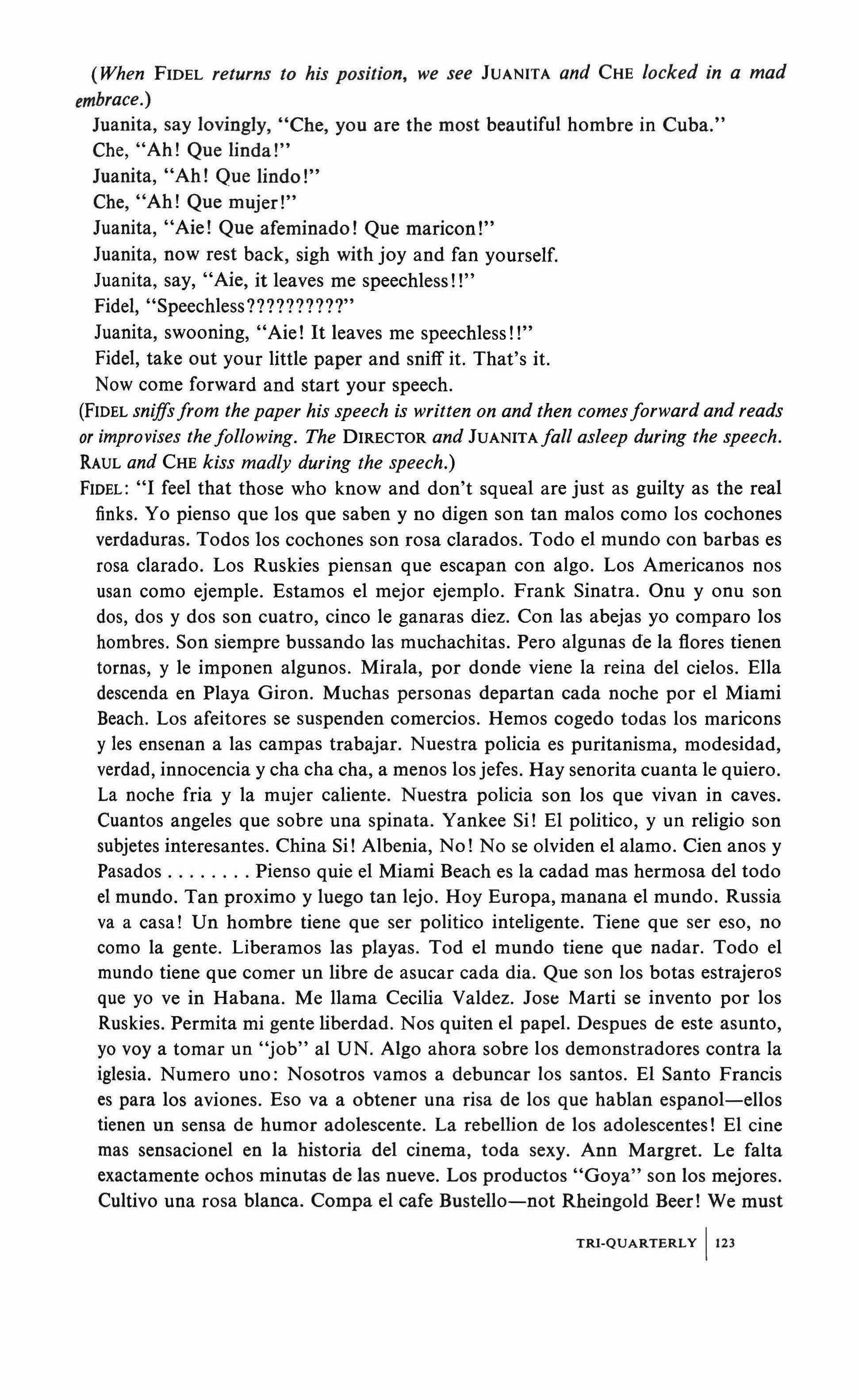
(When FIDEL returns to his position, we see JUANITA and CHE locked in a mad embrace.)
Juanita, say lovingly, "Che, you are the most beautiful hombre in Cuba." Che, "Ah! Que linda!"
Juanita, "Ah! Que lindo!"
Che, "Ah! Que mujer!"
Juanita, "Aie! Que afeminado! Que maricon!"
Juanita, now rest back, sigh with joy and fan yourself.
Juanita, say, "Aie, it leaves me speechless!!"
Fidel, "Speechless??????????"
Juanita, swooning, "Aie! It leaves me speechless!!" Fidel, take out your little paper and sniff it. That's it. Now come forward and start your speech.
(FIDEL sniffsfrom the paper his speech is written on and then comesforward and reads or improvises thefollowing. The DIRECTOR and JUANITAfall asleep during the speech. RAUL and CHE kiss madly during the speech.)
FIDEL: "I feel that those who know and don't squeal are just as guilty as the real finks. Yo pienso que los que saben y no digen son tan malos como los cochones verdaduras. Todos los cochones son rosa clarados. Todo el mundo con barbas es rosa clarado. Los Ruskies piensan que escapan con algo. Los Americanos nos usan como ejemple. Estamos el mejor ejemplo. Frank Sinatra. Onu y onu son dos, dos y dos son cuatro, cinco Ie ganaras diez. Con las abejas yo comparo los hombres. Son siempre bussando las muchachitas. Pero algunas de la flores tienen tornas, y Ie imponen algunos. Mirala, por donde viene la reina del cielos. Ella descenda en Playa Giron. Muchas personas departan cada noche por el Miami Beach. Los afeitores se suspenden comercios. Hemos cogedo todas los maricons y les ensenan a las campas trabajar. Nuestra policia es puritanisma, modesidad, verdad, innocencia y cha cha cha, a menos los jefes. Hay senorita cuanta Ie quiero. La noche fria y la mujer caliente. Nuestra policia son los que vivan in caves. Cuantos angeles que sobre una spinata. Yankee Sit EI politico, y un religio son subjetes interesantes. China Sit Albenia, No! No se olviden el alamo. Cien anos y Pasados Pienso quie el Miami Beach es la cadad mas hermosa del todo el mundo. Tan proximo y luego tan lejo. Hoy Europa, manana el mundo. Russia va a casal Un hombre tiene que ser politico inteligente. Tiene que ser eso, no como la gente. Liberamos las playas. Tod el mundo tiene que nadar. Todo el mundo tiene que comer un libre de asucar cada dia. Que son los botas estrajeros que yo ve in Habana. Me llama Cecilia Valdez. Jose Marti se invento por los Ruskies. Permita mi gente liberdad. Nos quiten el papel. Despues de este asunto, yo voy a tomar un "job" al UN. Algo ahora sobre los demonstradores contra la iglesia. Numero uno: Nosotros vamos a debuncar los santos. EI Santo Francis es para los aviones. Eso va a obtener una risa de los que hablan espanol-ellos tienen un sensa de humor adolescente. La rebellion de los adolescentes! EI cine mas sensacionel en la historia del cinema, toda sexy. Ann Margret. Le falta exactamente ochos minutas de las nueve. Los productos "Goya" son los mejores. Cultivo una rosa blanca. Compa el cafe Bustello-not Rheingold Beer! We must
TRl-QUARTERLY 1123
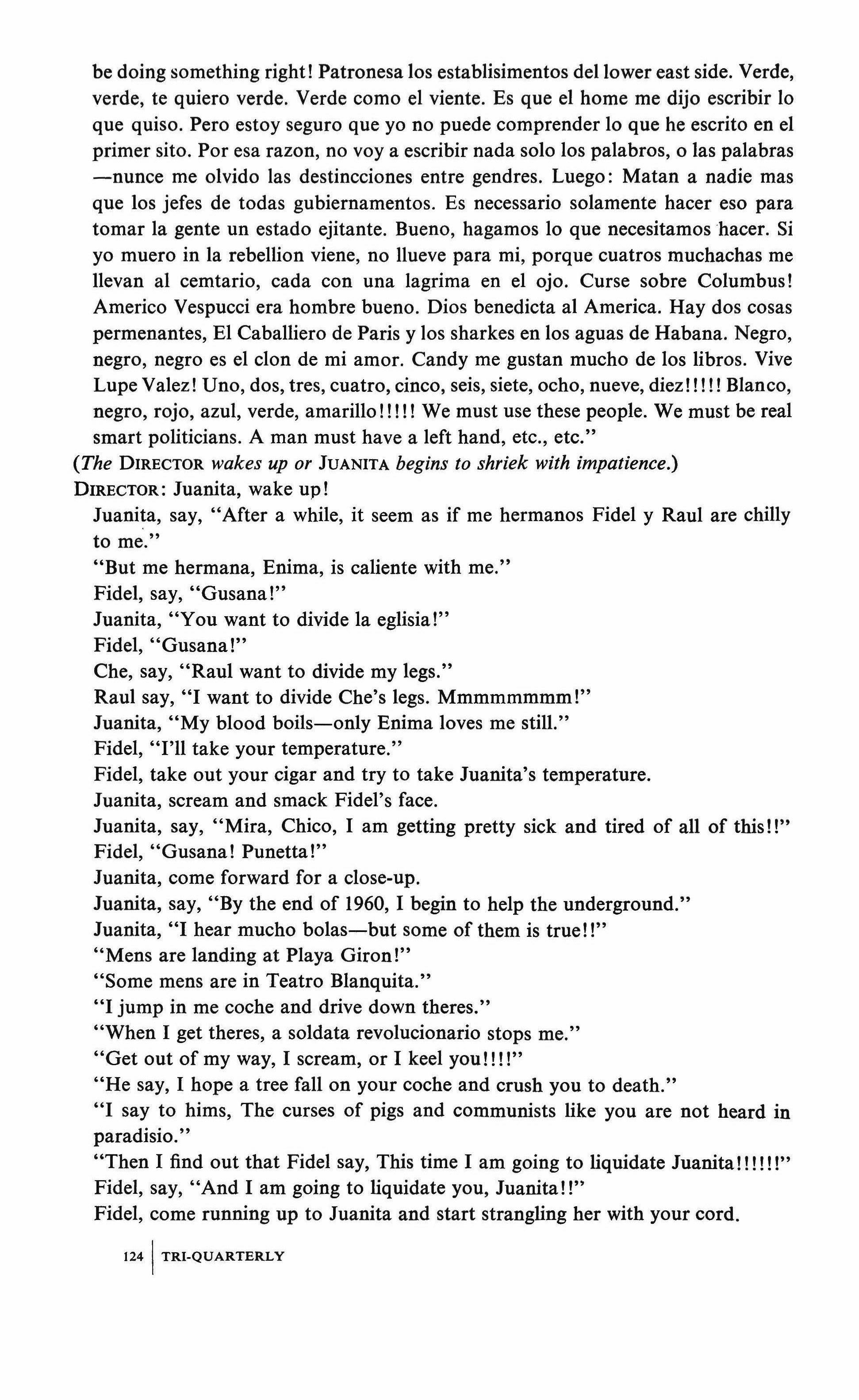
be doing something right! Patronesa los establisimentos del lower east side. Verde, verde, te quiero verde. Verde como el viente. Es que el home me dijo escribir 10 que quiso. Pero estoy seguro que yo no puede comprender 10 que he escrito en el primer sito. Por esa razon, no voy a escribir nada solo los palabros, 0 las palabras -nunce me olvido las destincciones entre gendres. Luego: Matan a nadie mas que los jefes de todas gubiernamentos. Es necessario solamente hacer eso para tomar la gente un estado ejitante. Bueno, hagamos 10 que necesitamos hacer. Si yo muero in la rebellion viene, no llueve para mi, porque cuatros muchachas me llevan al cemtario, cada con una lagrima en el ojo. Curse sobre Columbus! Americo Vespucci era hombre bueno. Dios benedicta al America. Hay dos cosas permenantes, El Caballiero de Paris y los sharkes en los aguas de Habana. Negro, negro, negro es el clon de mi amor. Candy me gustan mucho de los libros. Vive Lupe Valez! Uno, dos, tres, cuatro, cinco, seis, siete, ocho, nueve, diez! ! ! !! Blanco, negro, rojo, azul, verde, amarillo!!!!! We must use these people. We must be real smart politicians. A man must have a left hand, etc., etc."
(The DIRECTOR wakes up or JUANITA begins to shriek with impatience.)
DIRECTOR: Juanita, wake up!
Juanita, say, "After a while, it seem as if me hermanos Fidel y Raul are chilly to me."
"But me hermana, Enima, is caliente with me."
Fidel, say, "Gusana!"
Juanita, "You want to divide la eglisia!"
Fidel, "Gusana!"
Che, say, "Raul want to divide my legs."
Raul say, "I want to divide Che's legs. Mmmmmmmm!"
Juanita, "My blood boils-only Enima loves me still."
Fidel, "I'll take your temperature."
Fidel, take out your cigar and try to take Juanita's temperature.
Juanita, scream and smack Fidel's face.
Juanita, say, "Mira, Chico, I am getting pretty sick and tired of all of this!!" Fidel, "Gusana! Punetta!"
Juanita, come forward for a close-up.
Juanita, say, "By the end of 1960, I begin to help the underground."
Juanita, "I hear mucho bolas-but some of them is true!!"
"Mens are landing at Playa Giron!"
"Some mens are in Teatro Blanquita."
"I jump in me coche and drive down theres."
"When I get theres, a soldata revolucionario stops me."
"Get out of my way, I scream, or I keel you!!!!"
"He say, I hope a tree fall on your coche and crush you to death."
"I say to hims, The curses of pigs and communists like you are not heard in paradisio.'
"Then I find out that Fidel say, This time I am going to liquidate Juanita!!!!!!"
Fidel, say, "And I am going to liquidate you, Juanita!!"
Fidel, come running up to Juanita and start strangling her with your cord.
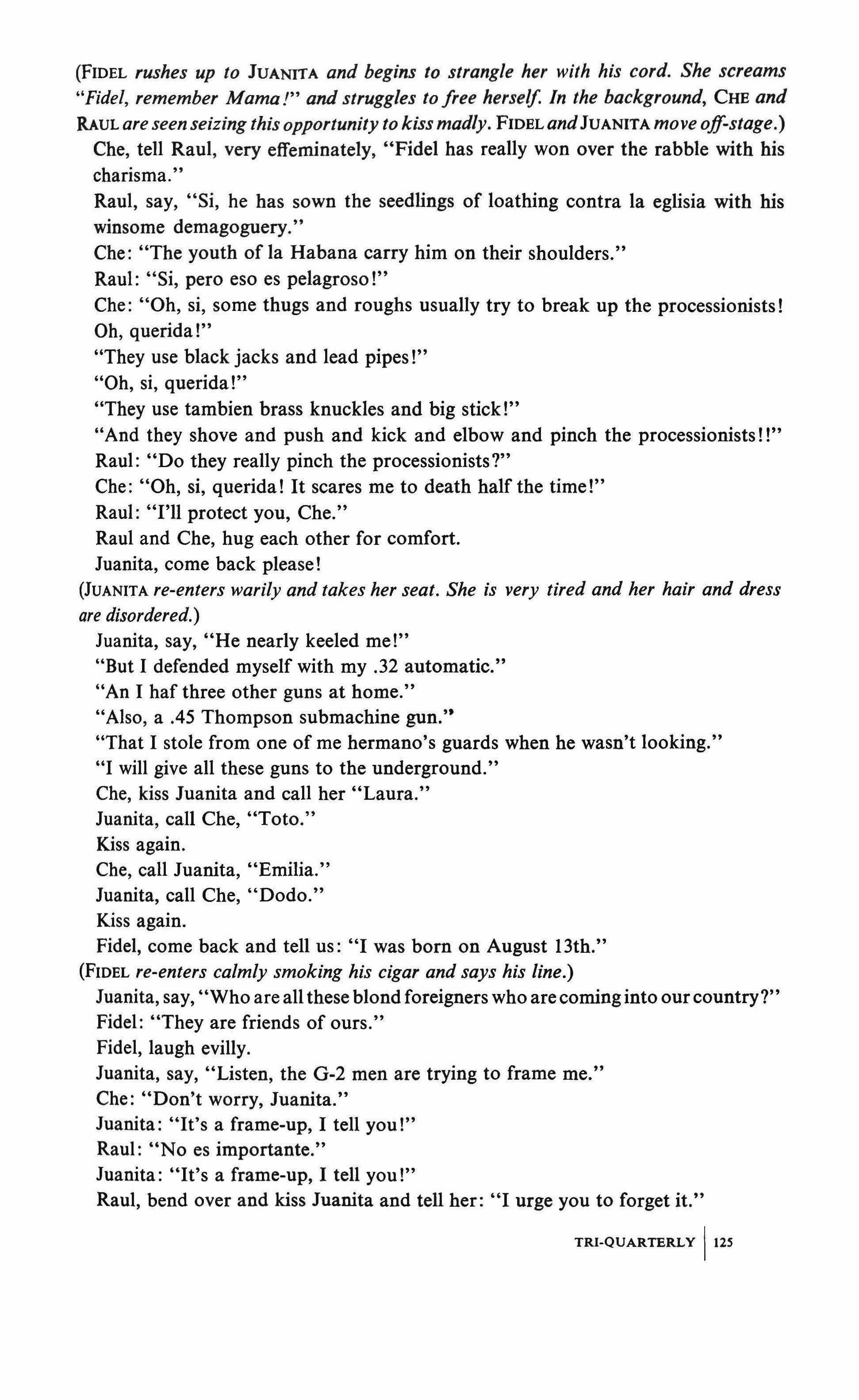
(FIDEL rushes up to IUANITA and begins to strangle her with his cord. She screams "Fidel, remember MamaI" and struggles to free herself. In the background, CRE and RAUL are seen seizing this opportunity to kissmadly. FIDELandJUANITA move off-stage.)
Che, tell Raul, very effeminately, "Fidel has really won over the rabble with his charisma.
Raul, say, "Si, he has sown the seedlings of loathing contra la eglisia with his winsome demagoguery."
Che: "The youth of la Habana carry him on their shoulders."
Raul: "Si, pero eso es pelagroso!"
Che: "Oh, si, some thugs and roughs usually try to break up the processionists! Oh, querida!"
"They use black jacks and lead pipes!"
"Oh, si, querida!"
"They use tambien brass knuckles and big stick!"
"And they shove and push and kick and elbow and pinch the processionists!!"
Raul: "Do they really pinch the processionists?"
Che: "Oh, si, querida! It scares me to death half the time!"
Raul: "I'll protect you, Che."
Raul and Che, hug each other for comfort.
Juanita, come back please!
(JUANITA re-enters warily and takes her seat. She is very tired and her hair and dress are disordered.)
Juanita, say, "He nearly keeled me!"
"But I defended myself with my .32 automatic."
"An I haf three other guns at home."
"Also, a .45 Thompson submachine gun."
"That I stole from one of me hermano's guards when he wasn't looking."
"I will give all these guns to the underground."
Che, kiss Iuanita and call her "Laura."
Juanita, call Che, "Toto."
Kiss again.
Che, call Juanita, "Emilia."
Juanita, call Che, "Dodo."
Kiss again.
Fidel, come back and tell us: "I was born on August 13th." (FIDEL re-enters calmly smoking his cigar and says his line.)
Juanita, say, "Who are all these blond foreigners who are coming into our country?"
Fidel: "They are friends of ours."
Fidel, laugh evilly,
Juanita, say, "Listen, the 0-2 men are trying to frame me."
Che: "Don't worry, Juanita."
Juanita: "It's a frame-up, I tell you!"
Raul: "No es importante."
Juanita: "It's a frame-up, I tell you!"
Raul, bend over and kiss Juanita and tell her: "I urge you to forget it."
TRI-QUARTERLY
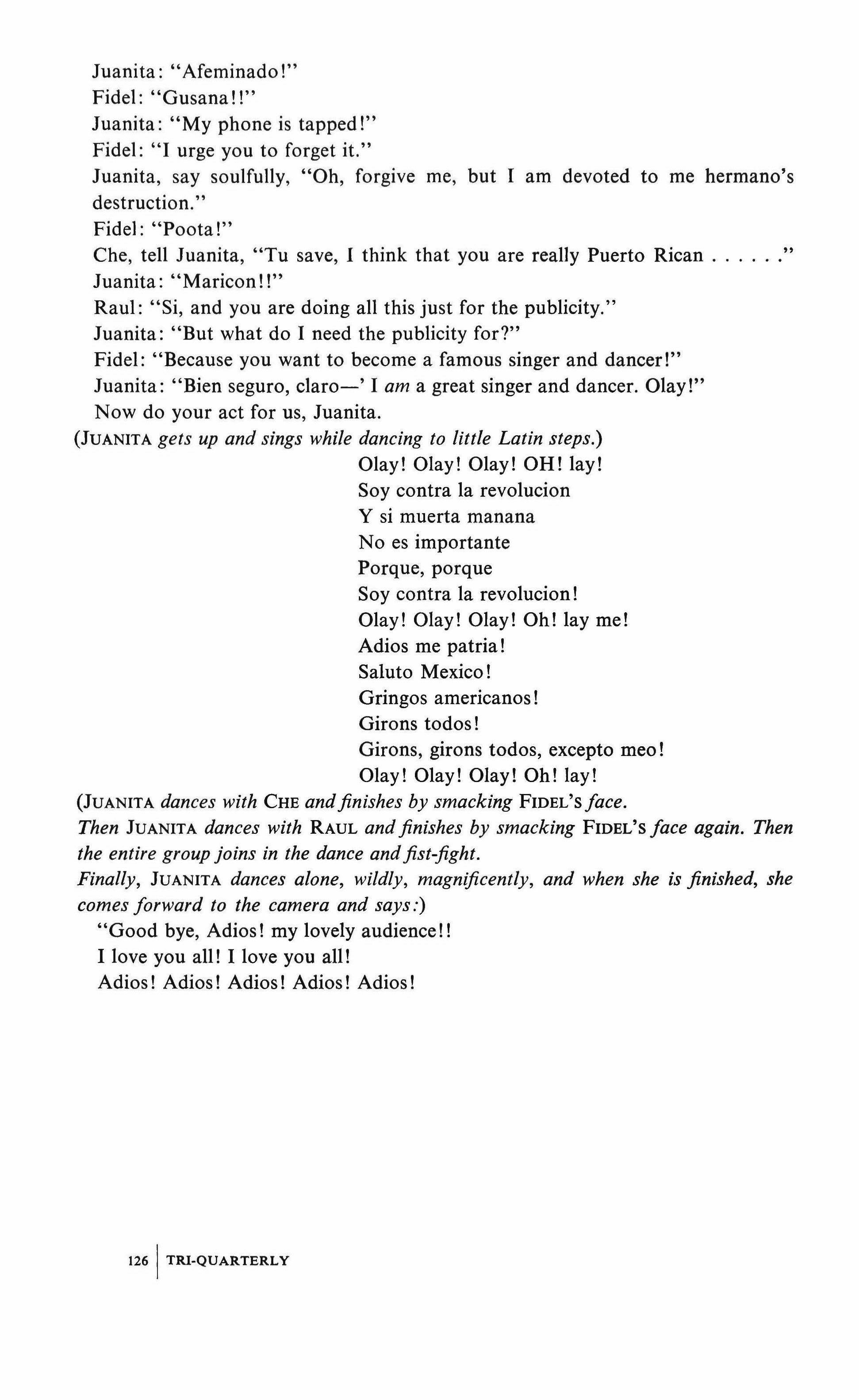
Juanita: "Afeminado!"
Fidel: "Gusana!!"
Juanita: "My phone is tapped!"
Fidel: "I urge you to forget it."
Juanita, say soulfully, "Oh, forgive me, but 1 am devoted to me hermano's destruction.
Fidel: "Poota!"
Che, tell Juanita, "Tu save, I think that you are really Puerto Rican Juanita: "Maricon!!"
Raul: "Si, and you are doing all this just for the publicity."
Juanita: "But what do 1 need the publicity for?"
Fidel: "Because you want to become a famous singer and dancer!"
Juanita: "Bien seguro, claro-' 1 am a great singer and dancer. Olay!"
Now do your act for us, Juanita.
(JuANITA gets up and sings while dancing to little Latin steps.)
Olay! Olay! Olay! OH! lay!
Soy contra la revolucion
Y si muerta manana
No es importante
Porque, porque
Soy contra la revolucion!
Olay! Olay! Olay! Oh! lay me!
Adios me patria!
Saluto Mexico!
Gringos americanos!
Girons todos!
Girons, girons todos, excepto meo!
Olay! Olay! Olay! Oh! lay!
(JUANITA dances with CHE andfinishes by smacking FIDEL'sface. Then JUANITA dances with RAUL andfinishes by smacking FIDEL'S face again. Then the entire group joins in the dance andfist-fight.
Finally, JUANITA dances alone, wildly, magnificently, and when she is finished, she comes forward to the camera and says:)
"Good bye, Adios! my lovely audience! !
1 love you all! 1 love you all!
Adios! Adios! Adios! Adios! Adios!
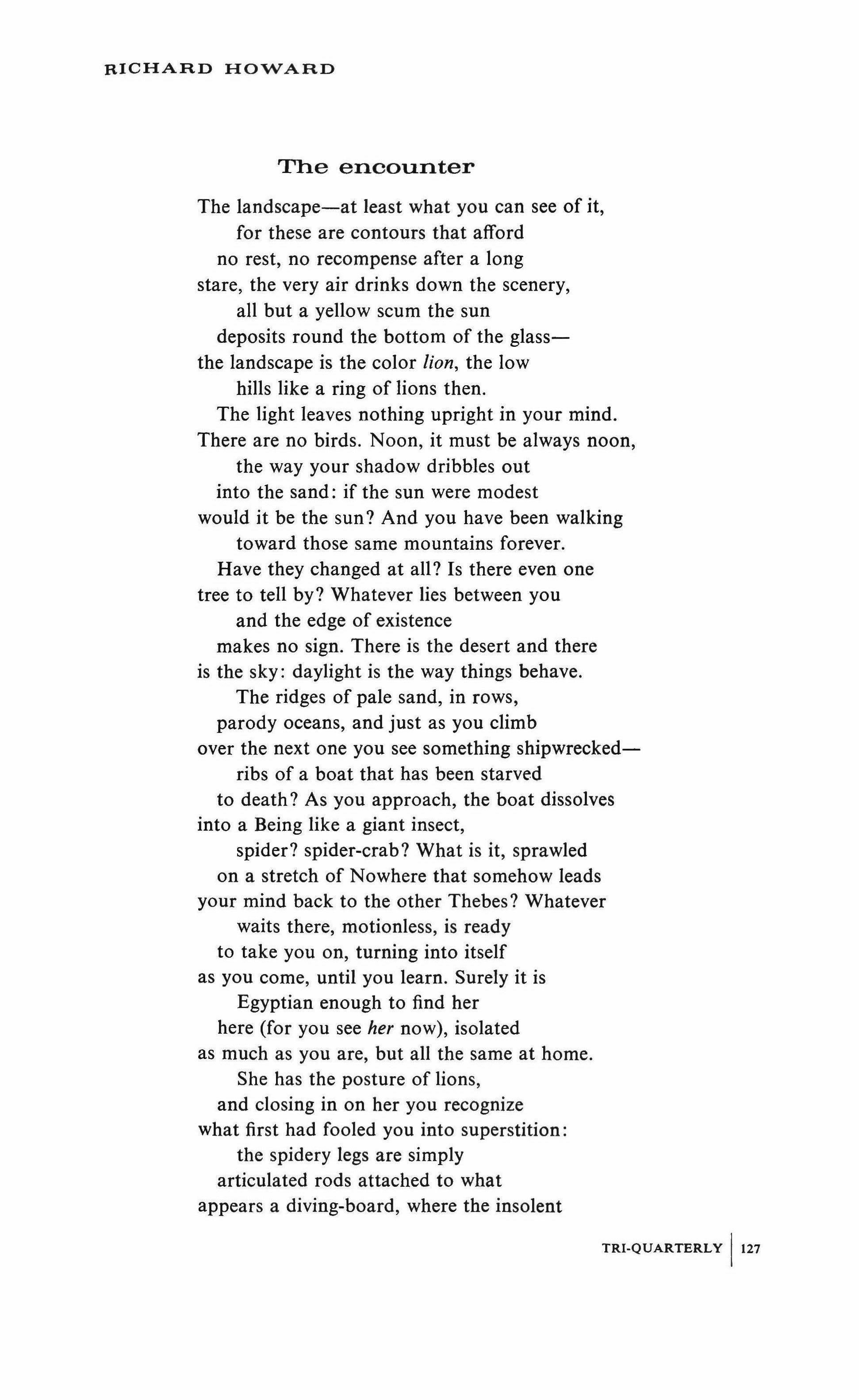
The landscape-at least what you can see of it, for these are contours that afford no rest, no recompense after a long stare, the very air drinks down the scenery, all but a yellow scum the sun deposits round the bottom of the glassthe landscape is the color lion, the low hills like a ring of lions then. The light leaves nothing upright in your mind. There are no birds. Noon, it must be always noon, the way your shadow dribbles out into the sand: if the sun were modest would it be the sun? And you have been walking toward those same mountains forever. Have they changed at all? Is there even one tree to tell by? Whatever lies between you and the edge of existence makes no sign. There is the desert and there is the sky: daylight is the way things behave. The ridges of pale sand, in rows, parody oceans, and just as you climb over the next one you see something shipwreckedribs of a boat that has been starved to death? As you approach, the boat dissolves into a Being like a giant insect, spider? spider-crab? What is it, sprawled on a stretch of Nowhere that somehow leads your mind back to the other Thebes? Whatever waits there, motionless, is ready to take you on, turning into itself as you come, until you learn. Surely it is Egyptian enough to find her here (for you see her now), isolated as much as you are, but all the same at home. She has the posture of lions, and closing in on her you recognize what first had fooled you into superstition: the spidery legs are simply articulated rods attached to what appears a diving-board, where the insolent
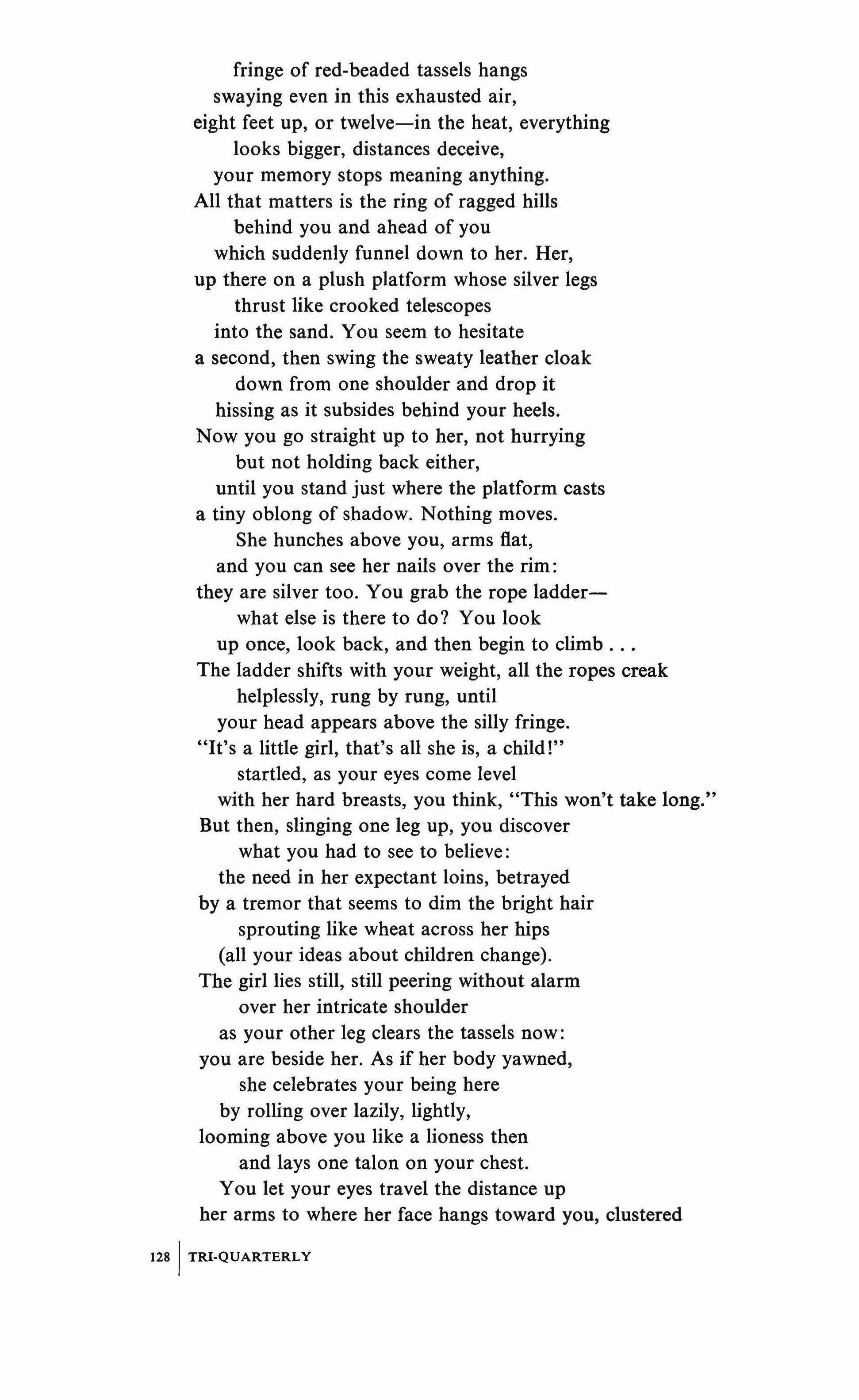
fringe of red-beaded tassels hangs swaying even in this exhausted air, eight feet up, or twelve-in the heat, everything looks bigger, distances deceive, your memory stops meaning anything. All that matters is the ring of ragged hills behind you and ahead of you which suddenly funnel down to her. Her, up there on a plush platform whose silver legs thrust like crooked telescopes into the sand. You seem to hesitate a second, then swing the sweaty leather cloak down from one shoulder and drop it hissing as it subsides behind your heels. Now you go straight up to her, not hurrying but not holding back either, until you stand just where the platform casts a tiny oblong of shadow. Nothing moves. She hunches above you, arms fiat, and you can see her nails over the rim: they are silver too. You grab the rope ladderwhat else is there to do? You look up once, look back, and then begin to climb The ladder shifts with your weight, all the ropes creak helplessly, rung by rung, until your head appears above the silly fringe. "It's a little girl, that's all she is, a child!" startled, as your eyes come level with her hard breasts, you think, "This won't take long." But then, slinging one leg up, you discover what you had to see to believe: the need in her expectant loins, betrayed by a tremor that seems to dim the bright hair sprouting like wheat across her hips (all your ideas about children change). The girl lies still, still peering without alarm over her intricate shoulder as your other leg clears the tassels now: you are beside her. As if her body yawned, she celebrates your being here by rolling over lazily, lightly, looming above you like a lioness then and lays one talon on your chest. You let your eyes travel the distance up her arms to where her face hangs toward you, clustered
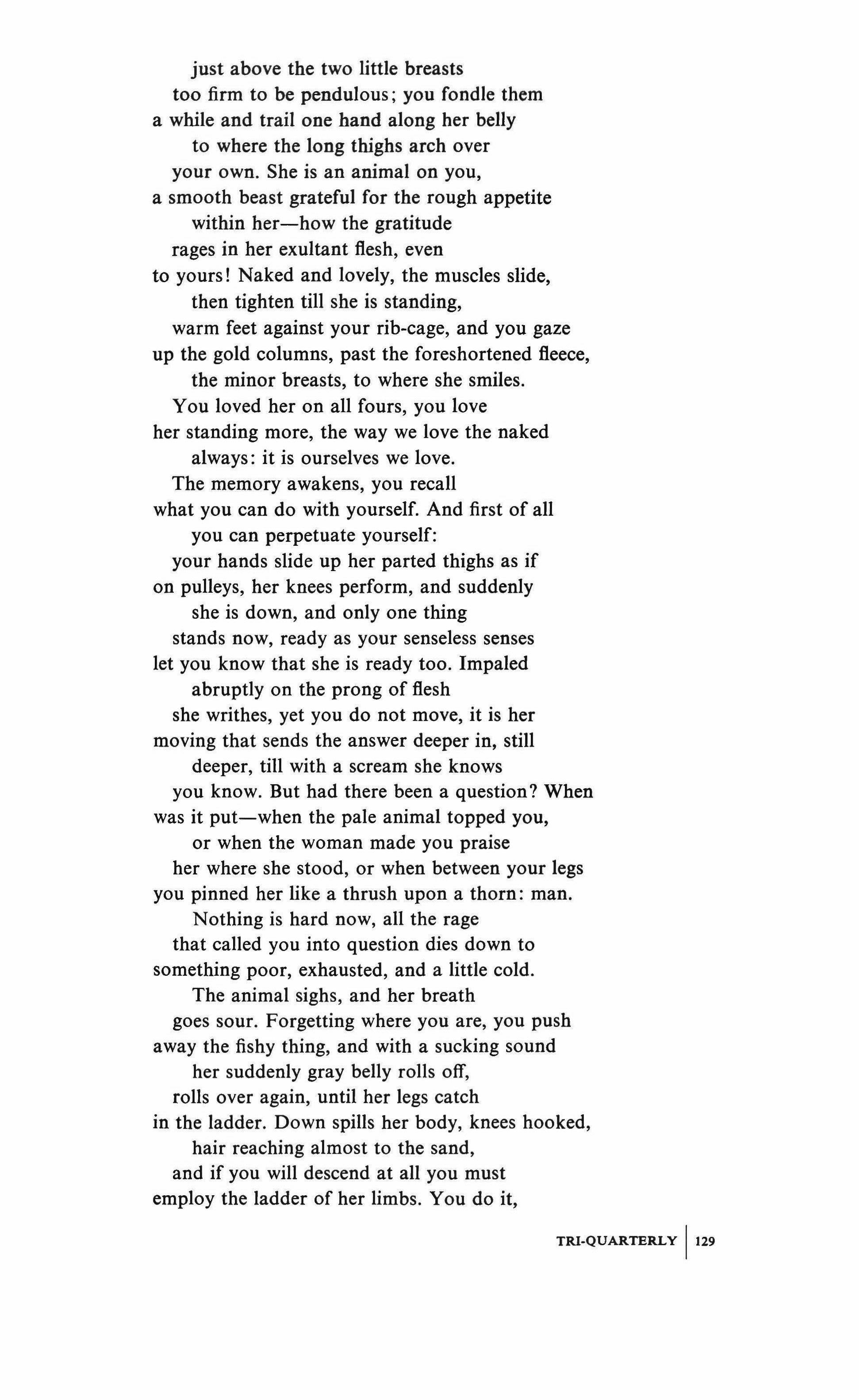
just above the two little breasts too firm to be pendulous; you fondle them a while and trail one hand along her belly to where the long thighs arch over your own. She is an animal on you, a smooth beast grateful for the rough appetite within her-how the gratitude rages in her exultant flesh, even to yours! Naked and lovely, the muscles slide, then tighten till she is standing, warm feet against your rib-cage, and you gaze up the gold columns, past the foreshortened fleece, the minor breasts, to where she smiles. You loved her on all fours, you love her standing more, the way we love the naked always: it is ourselves we love.
The memory awakens, you recall what you can do with yourself. And first of all you can perpetuate yourself: your hands slide up her parted thighs as if on pulleys, her knees perform, and suddenly she is down, and only one thing stands now, ready as your senseless senses let you know that she is ready too. Impaled abruptly on the prong of flesh she writhes, yet you do not move, it is her moving that sends the answer deeper in, still deeper, till with a scream she knows you know. But had there been a question? When was it put-when the pale animal topped you, or when the woman made you praise her where she stood, or when between your legs you pinned her like a thrush upon a thorn: man. Nothing is hard now, all the rage that called you into question dies down to something poor, exhausted, and a little cold. The animal sighs, and her breath goes sour. Forgetting where you are, you push away the fishy thing, and with a sucking sound her suddenly gray belly rolls off, rolls over again, until her legs catch in the ladder. Down spills her body, knees hooked, hair reaching almost to the sand, and if you will descend at all you must employ the ladder of her limbs. You do it, TRI-QUARTERLY
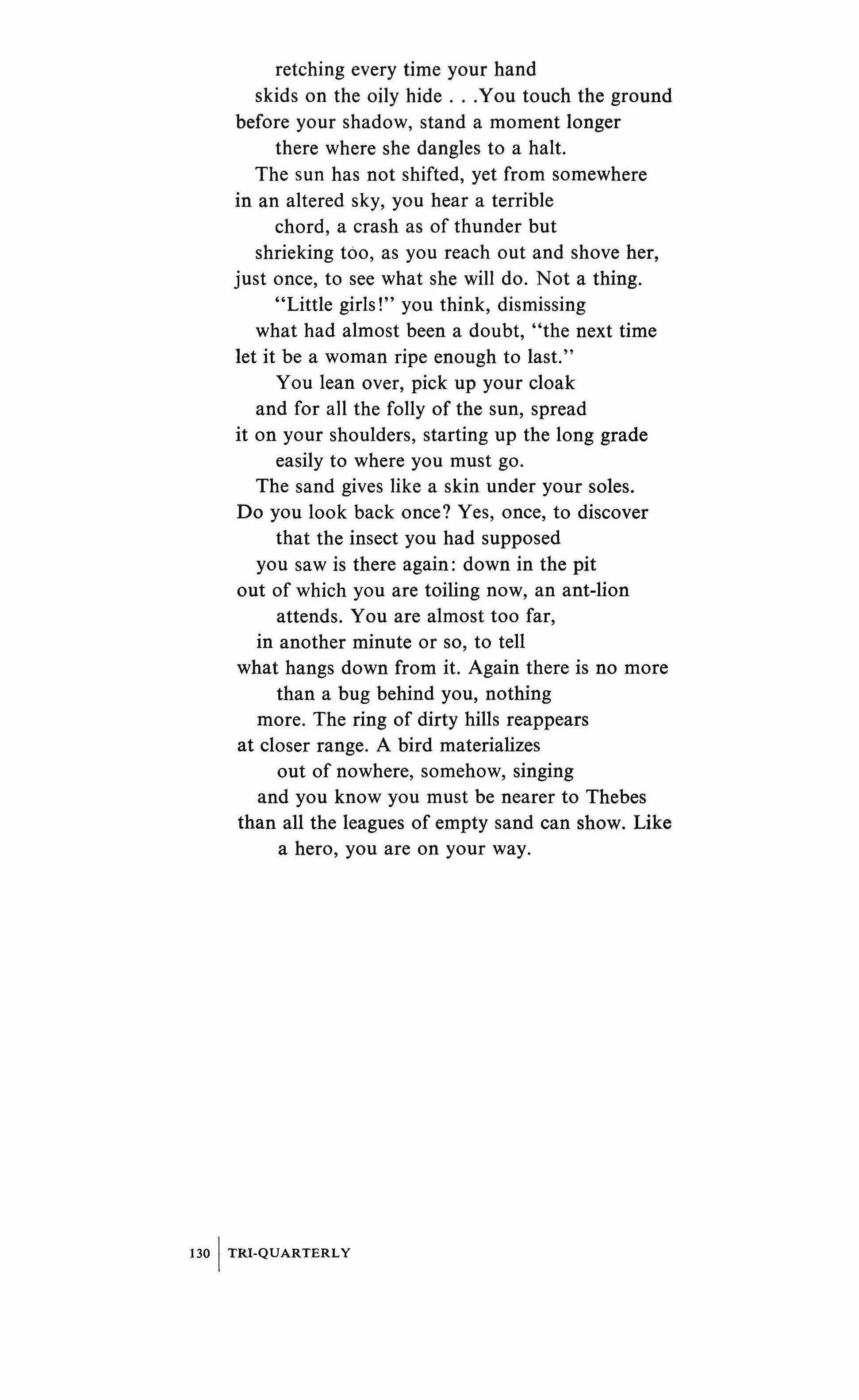
retching every time your hand skids on the oily hide You touch the ground before your shadow, stand a moment longer there where she dangles to a halt.
The sun has not shifted, yet from somewhere in an altered sky, you hear a terrible chord, a crash as of thunder but shrieking too, as you reach out and shove her, just once, to see what she will do. Not a thing. "Little girls!" you think, dismissing what had almost been a doubt, "the next time let it be a woman ripe enough to last." You lean over, pick up your cloak and for all the folly of the sun, spread it on your shoulders, starting up the long grade easily to where you must go.
The sand gives like a skin under your soles. Do you look back once? Yes, once, to discover that the insect you had supposed you saw is there again: down in the pit out of which you are toiling now, an ant-lion attends. You are almost too far, in another minute or so, to tell what hangs down from it. Again there is no more than a bug behind you, nothing more. The ring of dirty hills reappears at closer range. A bird materializes out of nowhere, somehow, singing and you know you must be nearer to Thebes than all the leagues of empty sand can show. Like a hero, you are on your way.
We needed our man there-theirs, but really ours. We knew he had to say their words, and smile. We knew our only chance was his captivity, that he roll over, play dead, sit up and beg. But he was ours. Often he had spoken straight out: had lavished the dangerous truth, and he owned with us that delight, how we all wanted to sing, were almost free, till their power frightened our country-theirscruel again. But he was our manAnd plays dead: Adlai.
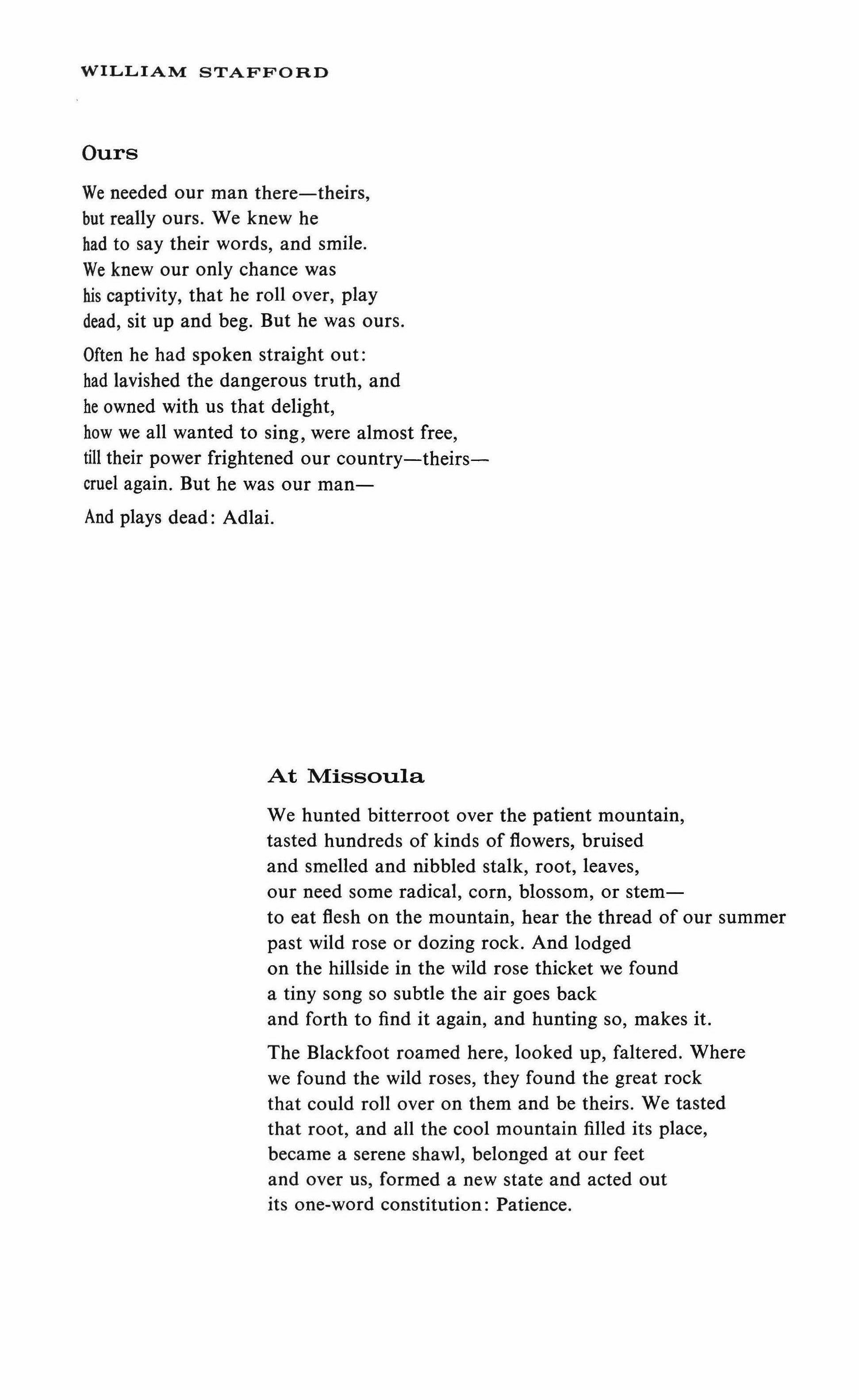
We hunted bitterroot over the patient mountain, tasted hundreds of kinds of flowers, bruised and smelled and nibbled stalk, root, leaves, our need some radical, corn, blossom, or stemto eat flesh on the mountain, hear the thread of our summer past wild rose or dozing rock. And lodged on the hillside in the wild rose thicket we found a tiny song so subtle the air goes back and forth to find it again, and hunting so, makes it. The Blackfoot roamed here, looked up, faltered. Where we found the wild roses, they found the great rock that could roll over on them and be theirs. We tasted that root, and all the cool mountain filled its place, became a serene shawl, belonged at our feet and over us, formed a new state and acted out its one-word constitution: Patience.
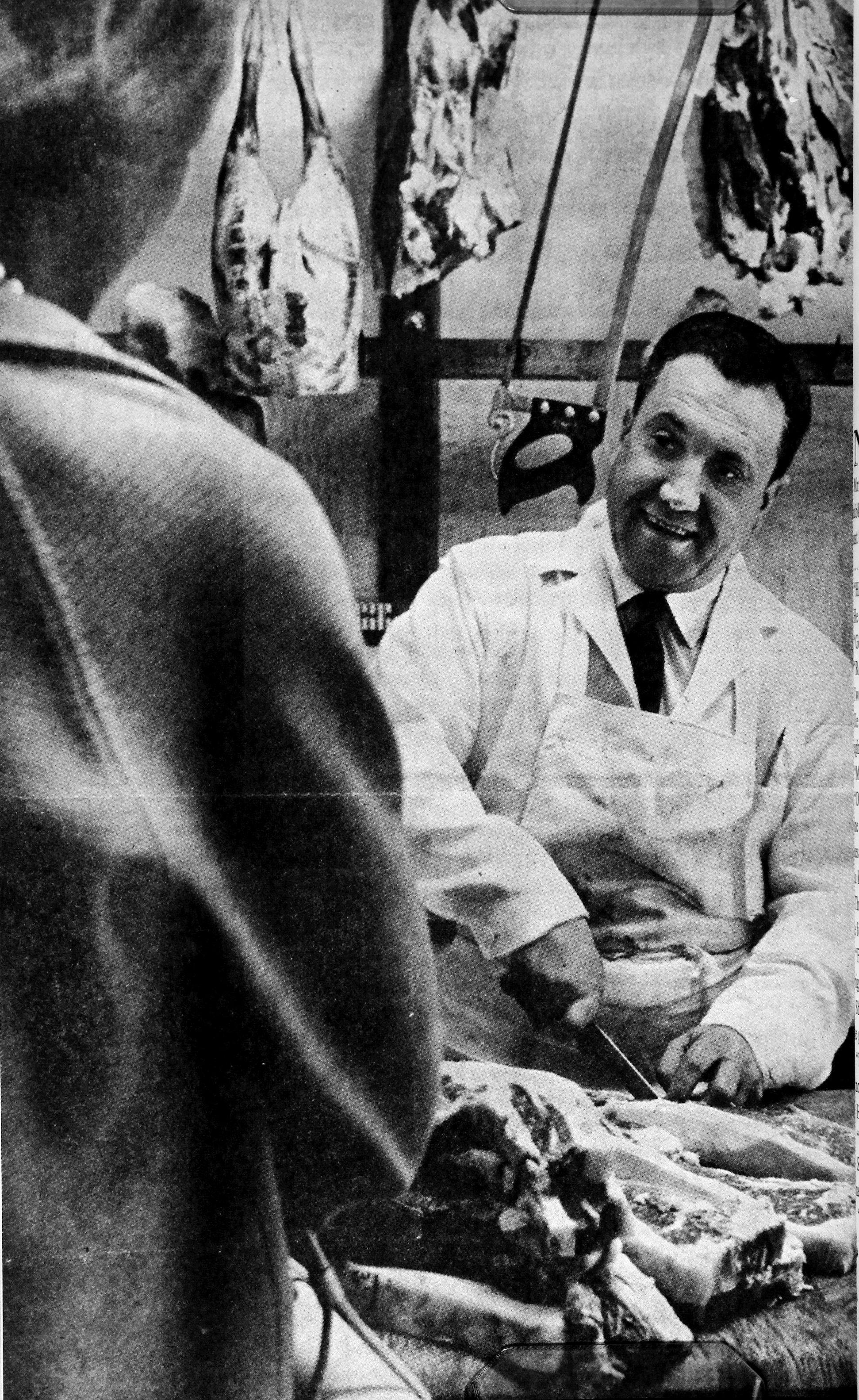
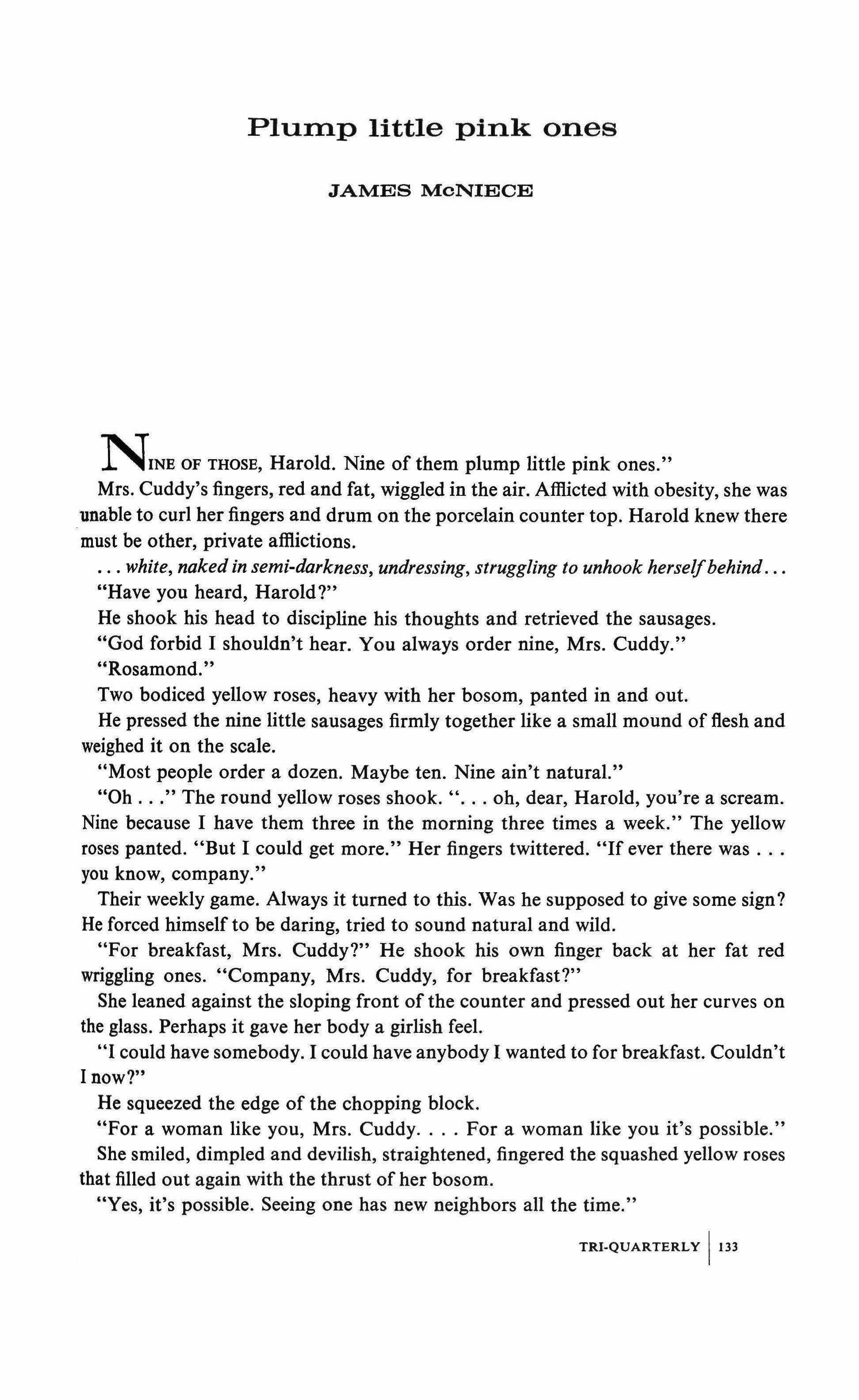
NINE OF THOSE, Harold. Nine of them plump little pink ones."
Mrs. Cuddy's fingers, red and fat, wiggled in the air. Afflicted with obesity, she was unable to curl her fingers and drum on the porcelain counter top. Harold knew there must be other, private afflictions white, naked in semi-darkness, undressing, struggling to unhook herselfbehind
"Have you heard, Harold?"
He shook his head to discipline his thoughts and retrieved the sausages.
"God forbid I shouldn't hear. You always order nine, Mrs. Cuddy."
"Rosamond.
Two bodiced yellow roses, heavy with her bosom, panted in and out.
He pressed the nine little sausages firmly together like a small mound of flesh and weighed it on the scale.
"Most people order a dozen. Maybe ten. Nine ain't natural."
"Oh The round yellow roses shook. oh, dear, Harold, you're a scream. Nine because I have them three in the morning three times a week." The yellow roses panted. "But I could get more." Her fingers twittered. "If ever there was you know, company."
Their weekly game. Always it turned to this. Was he supposed to give some sign? He forced himself to be daring, tried to sound natural and wild.
"For breakfast, Mrs. Cuddy?" He shook his own finger back at her fat red wriggling ones. "Company, Mrs. Cuddy, for breakfast?"
She leaned against the sloping front of the counter and pressed out her curves on the glass. Perhaps it gave her body a girlish feel.
"I could have somebody. I could have anybody I wanted to for breakfast. Couldn't I now?"
He squeezed the edge of the chopping block.
"For a woman like you, Mrs. Cuddy For a woman like you it's possible." She smiled, dimpled and devilish, straightened, fingered the squashed yellow roses that filled out again with the thrust of her bosom.
"Yes, it's possible. Seeing one has new neighbors all the time."
TRI-QUARTERLY 1133
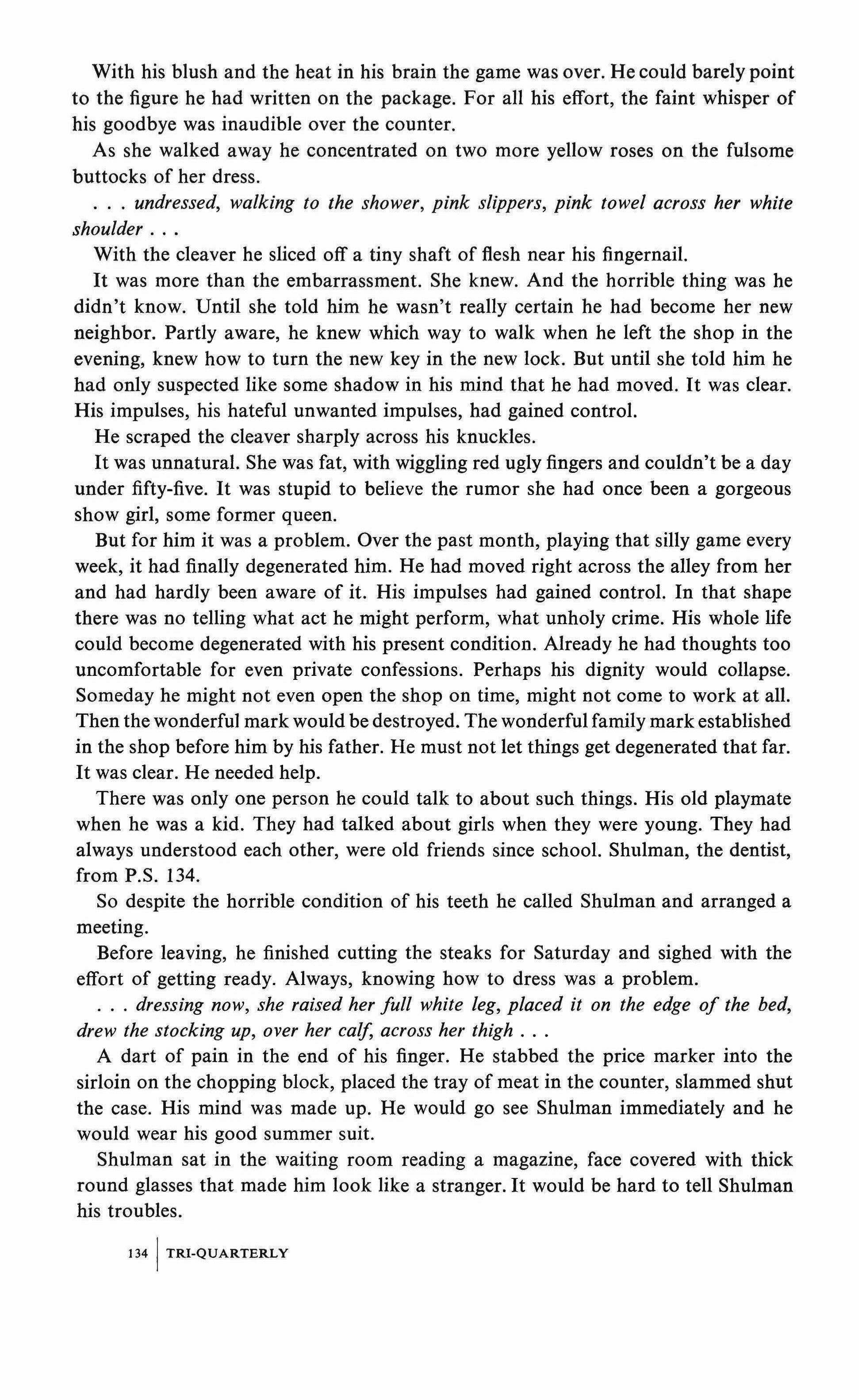
With his blush and the heat in his brain the game was over. He could barely point to the figure he had written on the package. For all his effort, the faint whisper of his goodbye was inaudible over the counter.
As she walked away he concentrated on two more yellow roses on the fulsome buttocks of her dress undressed, walking to the shower, pink slippers, pink towel across her white shoulder
With the cleaver he sliced off a tiny shaft of flesh near his fingernail.
It was more than the embarrassment. She knew. And the horrible thing was he didn't know. Until she told him he wasn't really certain he had become her new neighbor. Partly aware, he knew which way to walk when he left the shop in the evening, knew how to turn the new key in the new lock. But until she told him he had only suspected like some shadow in his mind that he had moved. It was clear. His impulses, his hateful unwanted impulses, had gained control.
He scraped the cleaver sharply across his knuckles.
It was unnatural. She was fat, with wiggling red ugly fingers and couldn't be a day under fifty-five. It was stupid to believe the rumor she had once been a gorgeous show girl, some former queen.
But for him it was a problem. Over the past month, playing that silly game every week, it had finally degenerated him. He had moved right across the alley from her and had hardly been aware of it. His impulses had gained control. In that shape there was no telling what act he might perform, what unholy crime. His whole life could become degenerated with his present condition. Already he had thoughts too uncomfortable for even private confessions. Perhaps his dignity would collapse. Someday he might not even open the shop on time, might not come to work at all. Then the wonderful mark would be destroyed. The wonderful family mark established in the shop before him by his father. He must not let things get degenerated that far. It was clear. He needed help.
There was only one person he could talk to about such things. His old playmate when he was a kid. They had talked about girls when they were young. They had always understood each other, were old friends since school. Shulman, the dentist, from P.S. 134.
So despite the horrible condition of his teeth he called Shulman and arranged a meeting.
Before leaving, he finished cutting the steaks for Saturday and sighed with the effort of getting ready. Always, knowing how to dress was a problem dressing now, she raised her full white leg, placed it on the edge of the bed, drew the stocking up, over her calf, across her thigh
A dart of pain in the end of his finger. He stabbed the price marker into the sirloin on the chopping block, placed the tray of meat in the counter, slammed shut the case. His mind was made up. He would go see Shulman immediately and he would wear his good summer suit.
Shulman sat in the waiting room reading a magazine, face covered with thick round glasses that made him look like a stranger. It would be hard to tell Shulman his troubles.
TRI-QUARTERLY
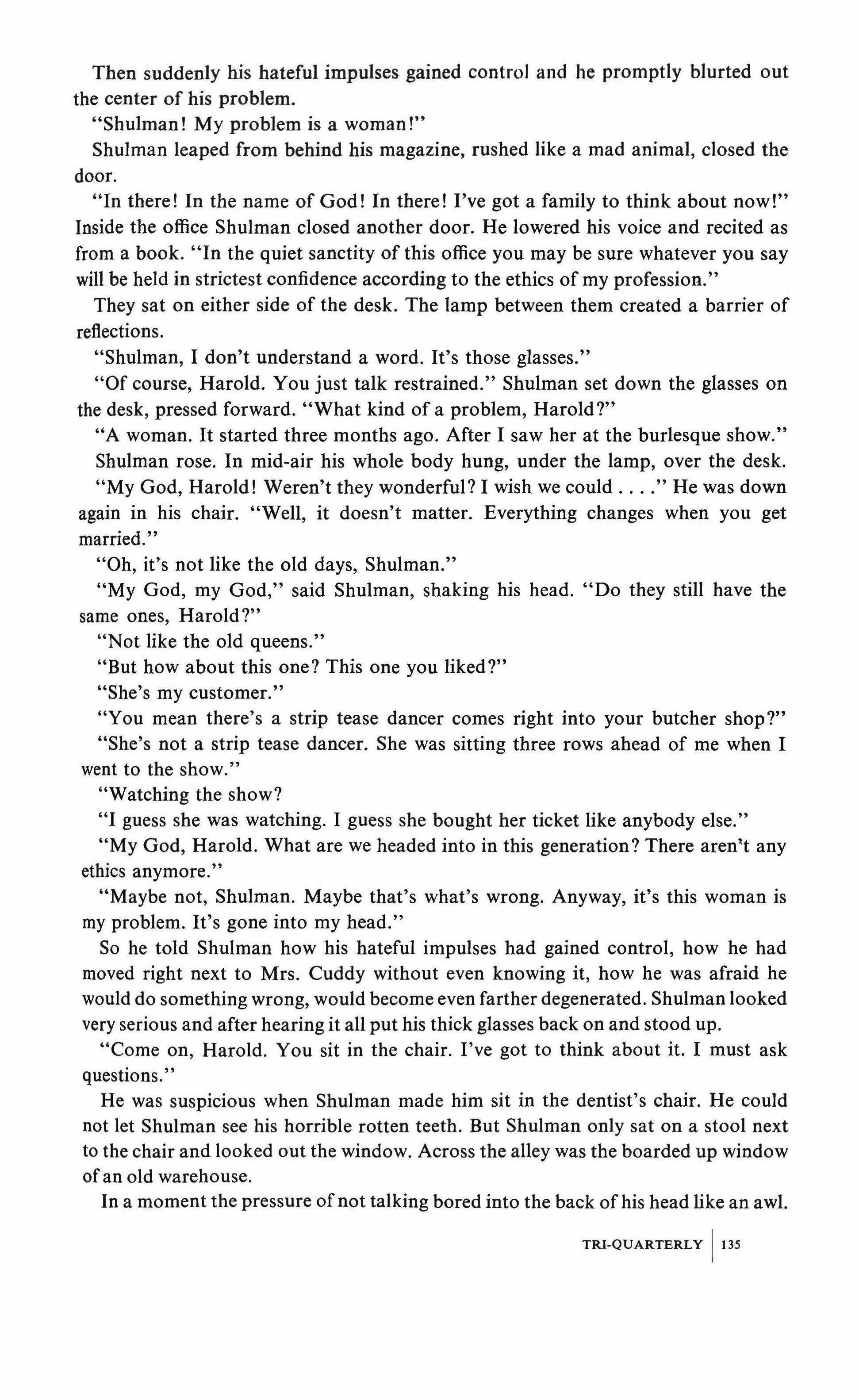
Then suddenly his hateful impulses gained control and he promptly blurted out the center of his problem.
"Shulman! My problem is a woman!"
Shulman leaped from behind his magazine, rushed like a mad animal, closed the door.
"In there! In the name of God! In there! I've got a family to think about now!" Inside the office Shulman closed another door. He lowered his voice and recited as from a book. "In the quiet sanctity of this office you may be sure whatever you say will be held in strictest confidence according to the ethics of my profession."
They sat on either side of the desk. The lamp between them created a barrier of reflections.
"Shulman, I don't understand a word. It's those glasses."
"Of course, Harold. You just talk restrained." Shulman set down the glasses on the desk, pressed forward. "What kind of a problem, Harold?"
"A woman. It started three months ago. After I saw her at the burlesque show."
Shulman rose. In mid-air his whole body hung, under the lamp, over the desk.
"My God, Harold! Weren't they wonderful? I wish we could He was down again in his chair. "Well, it doesn't matter. Everything changes when you get married."
"Oh, it's not like the old days, Shulman."
"My God, my God," said Shulman, shaking his head. "Do they still have the same ones, Harold?"
"Not like the old queens."
"But how about this one? This one you liked?"
"She's my customer."
"You mean there's a strip tease dancer comes right into your butcher shop?"
"She's not a strip tease dancer. She was sitting three rows ahead of me when I went to the show."
"Watching the show?
"I guess she was watching. I guess she bought her ticket like anybody else."
"My God, Harold. What are we headed into in this generation? There aren't any ethics anymore."
"Maybe not, Shulman. Maybe that's what's wrong. Anyway, it's this woman is my problem. It's gone into my head."
So he told Shulman how his hateful impulses had gained control, how he had moved right next to Mrs. Cuddy without even knowing it, how he was afraid he would do something wrong, would become even farther degenerated. Shulman looked very serious and after hearing it all put his thick glasses back on and stood up.
"Come on, Harold. You sit in the chair. I've got to think about it. I must ask questions.
He was suspicious when Shulman made him sit in the dentist's chair. He could not let Shulman see his horrible rotten teeth. But Shulman only sat on a stool next to the chair and looked out the window. Across the alley was the boarded up window of an old warehouse.
In a moment the pressure of not talking bored into the back ofhis head like an awl.
TRI-QUARTERLY 1135
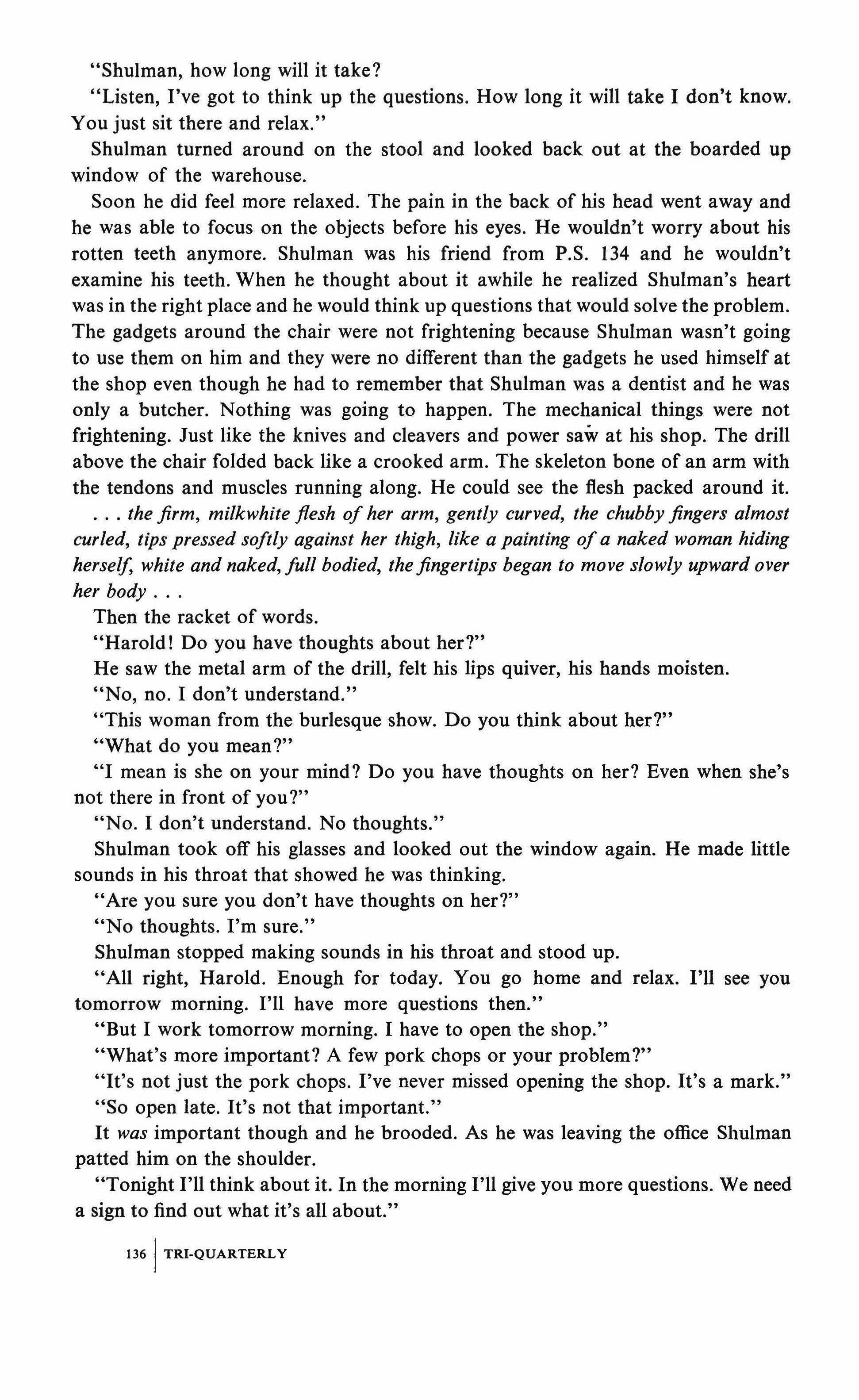
"Shulman, how long will it take?
"Listen, I've got to think up the questions. How long it will take I don't know. You just sit there and relax."
Shulman turned around on the stool and looked back out at the boarded up window of the warehouse.
Soon he did feel more relaxed. The pain in the back of his head went away and he was able to focus on the objects before his eyes. He wouldn't worry about his rotten teeth anymore. Shulman was his friend from P.S. 134 and he wouldn't examine his teeth. When he thought about it awhile he realized Shulman's heart was in the right place and he would think up questions that would solve the problem. The gadgets around the chair were not frightening because Shulman wasn't going to use them on him and they were no different than the gadgets he used himself at the shop even though he had to remember that Shulman was a dentist and he was only a butcher. Nothing was going to happen. The mechanical things were not frightening. Just like the knives and cleavers and power saw at his shop. The drill above the chair folded back like a crooked arm. The skeleton bone of an arm with the tendons and muscles running along. He could see the flesh packed around it. the firm, milkwhite flesh of her arm, gently curved, the chubby fingers almost curled, tips pressed softly against her thigh, like a painting of a naked woman hiding herself, white and naked, full bodied, thefingertips began to move slowly upward over her body
Then the racket of words.
"Harold! Do you have thoughts about her?"
He saw the metal arm of the drill, felt his lips quiver, his hands moisten.
"No, no. I don't understand."
"This woman from the burlesque show. Do you think about her?"
"What do you mean?"
"I mean is she on your mind? Do you have thoughts on her? Even when she's not there in front of you?"
"No. I don't understand. No thoughts."
Shulman took off his glasses and looked out the window again. He made little sounds in his throat that showed he was thinking.
"Are you sure you don't have thoughts on her?"
"No thoughts. I'm sure."
Shulman stopped making sounds in his throat and stood up.
"All right, Harold. Enough for today. You go home and relax. I'll see you tomorrow morning. I'll have more questions then."
"But I work tomorrow morning. I have to open the shop."
"What's more important? A few pork chops or your problem?"
"It's not just the pork chops. I've never missed opening the shop. It's a mark."
"So open late. It's not that important."
It was important though and he brooded. As he was leaving the office Shulman patted him on the shoulder.
"Tonight I'll think about it. In the morning I'll give you more questions. We need a sign to find out what it's all about."
TRI-QUARTERLY
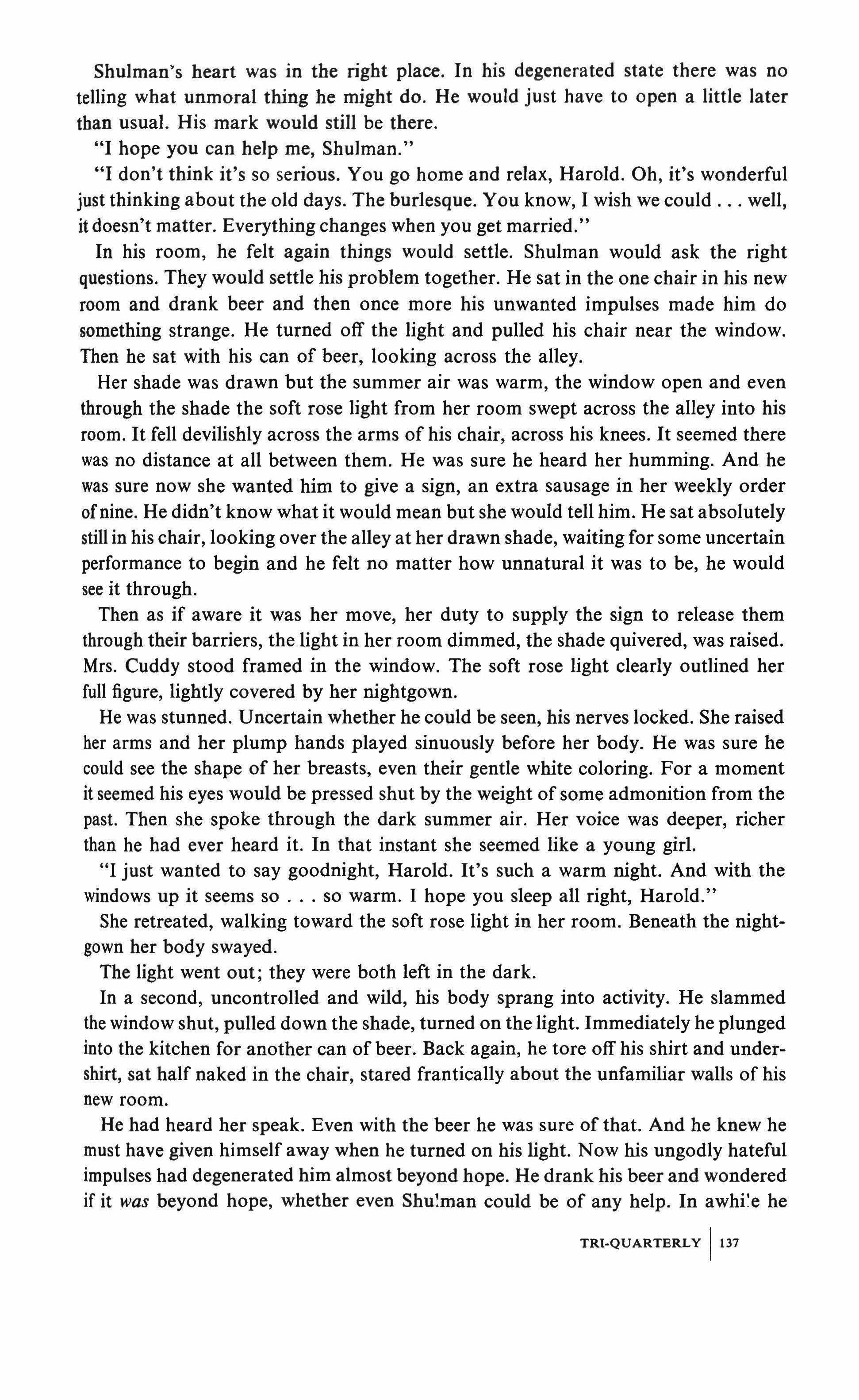
Shulman's heart was in the right place. In his degenerated state there was no telling what unmoral thing he might do. He would just have to open a little later than usual. His mark would still be there.
"I hope you can help me, Shulman."
"I don't think it's so serious. You go horne and relax, Harold. Oh, it's wonderful just thinking about the old days. The burlesque. You know, I wish we could well, it doesn't matter. Everything changes when you get married."
In his room, he felt again things would settle. Shulman would ask the right questions. They would settle his problem together. He sat in the one chair in his new room and drank beer and then once more his unwanted impulses made him do something strange. He turned off the light and pulled his chair near the window. Then he sat with his can of beer, looking across the alley.
Her shade was drawn but the summer air was warm, the window open and even through the shade the soft rose light from her room swept across the alley into his room. It fell devilishly across the arms of his chair, across his knees. It seemed there was no distance at all between them. He was sure he heard her humming. And he was sure now she wanted him to give a sign, an extra sausage in her weekly order ofnine. He didn't know what it would mean but she would tell him. He sat absolutely still in his chair, looking over the alley at her drawn shade, waiting for some uncertain performance to begin and he felt no matter how unnatural it was to be, he would see it through.
Then as if aware it was her move, her duty to supply the sign to release them through their barriers, the light in her room dimmed, the shade quivered, was raised. Mrs. Cuddy stood framed in the window. The soft rose light clearly outlined her full figure, lightly covered by her nightgown.
He was stunned. Uncertain whether he could be seen, his nerves locked. She raised her arms and her plump hands played sinuously before her body. He was sure he could see the shape of her breasts, even their gentle white coloring. For a moment it seemed his eyes would be pressed shut by the weight of some admonition from the past. Then she spoke through the dark summer air. Her voice was deeper, richer than he had ever heard it. In that instant she seemed like a young girl.
"I just wanted to say goodnight, Harold. It's such a warm night. And with the windows up it seems so so warm. I hope you sleep all right, Harold."
She retreated, walking toward the soft rose light in her room. Beneath the nightgown her body swayed.
The light went out; they were both left in the dark.
In a second, uncontrolled and wild, his body sprang into activity. He slammed the window shut, pulled down the shade, turned on the light. Immediately he plunged into the kitchen for another can of beer. Back again, he tore off his shirt and undershirt, sat half naked in the chair, stared frantically about the unfamiliar walls of his new room.
He had heard her speak. Even with the beer he was sure of that. And he knew he must have given himself away when he turned on his light. Now his ungodly hateful impulses had degenerated him almost beyond hope. He drank his beer and wondered if it was beyond hope, whether even Shulman could be of any help. In awhi'e he
TRI-QUARTERLY
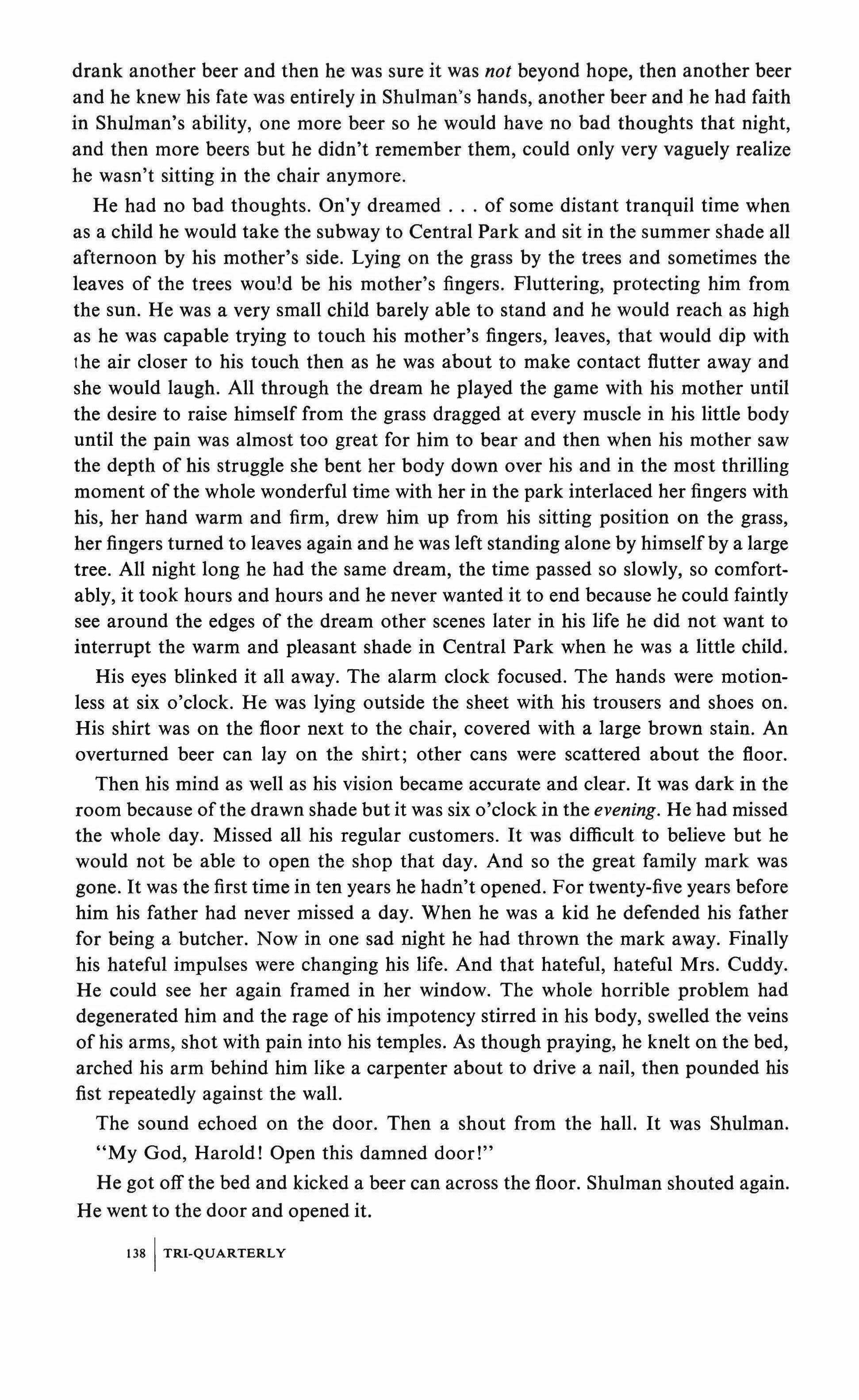
drank another beer and then he was sure it was not beyond hope, then another beer and he knew his fate was entirely in Shulman's hands, another beer and he had faith in Shulman's ability, one more beer so he would have no bad thoughts that night, and then more beers but he didn't remember them, could only very vaguely realize he wasn't sitting in the chair anymore.
He had no bad thoughts. On'y dreamed of some distant tranquil time when as a child he would take the subway to Central Park and sit in the summer shade all afternoon by his mother's side. Lying on the grass by the trees and sometimes the leaves of the trees would be his mother's fingers. Fluttering, protecting him from the sun. He was a very small child barely able to stand and he would reach as high as he was capable trying to touch his mother's fingers, leaves, that would dip with the air closer to his touch then as he was about to make contact flutter away and she would laugh. All through the dream he played the game with his mother until the desire to raise himself from the grass dragged at every muscle in his little body until the pain was almost too great for him to bear and then when his mother saw the depth of his struggle she bent her body down over his and in the most thrilling moment of the whole wonderful time with her in the park interlaced her fingers with his, her hand warm and firm, drew him up from his sitting position on the grass, her fingers turned to leaves again and he was left standing alone by himself by a large tree. All night long he had the same dream, the time passed so slowly, so comfortably, it took hours and hours and he never wanted it to end because he could faintly see around the edges of the dream other scenes later in his life he did not want to interrupt the warm and pleasant shade in Central Park when he was a little child.
His eyes blinked it all away. The alarm clock focused. The hands were motionless at six o'clock. He was lying outside the sheet with his trousers and shoes on. His shirt was on the floor next to the chair, covered with a large brown stain. An overturned beer can lay on the shirt; other cans were scattered about the floor.
Then his mind as well as his vision became accurate and clear. It was dark in the room because of the drawn shade but it was six o'clock in the evening. He had missed the whole day. Missed all his regular customers. It was difficult to believe but he would not be able to open the shop that day. And so the great family mark was gone. It was the first time in ten years he hadn't opened. For twenty-five years before him his father had never missed a day. When he was a kid he defended his father for being a butcher. Now in one sad night he had thrown the mark away. Finally his hateful impulses were changing his life. And that hateful, hateful Mrs. Cuddy. He could see her again framed in her window. The whole horrible problem had degenerated him and the rage of his impotency stirred in his body, swelled the veins of his arms, shot with pain into his temples. As though praying, he knelt on the bed, arched his arm behind him like a carpenter about to drive a nail, then pounded his fist repeatedly against the wall.
The sound echoed on the door. Then a shout from the hall. It was Shulman.
"My God, Harold! Open this damned door!"
He got off the bed and kicked a beer can across the floor. Shulman shouted again. He went to the door and opened it.
1381 TRI-QUARTERLY
"What in the name of God is this? You were supposed to be at my office this morning."
"It's not important."
"I had questions for you. Isn't that important?"
"I would have lied anyway."
"Lied? To me from P.S. 134?"
"I've been lying to you all along. But it's not important now. I didn't open the shop today."
"So? You missed a few pork chops."
"It's not pork chops, Shulman. It's the mark. I've thrown away the mark. What would my father think?"
Shulman sat in the chair, facing away into the kitchen as though looking in there for inspiration. He drew out his glasses and pressed them about his ears, awkwardly, with the most complicated blundering for so simple an operation. The tips of Shulman's fingers sought out imaginary grooves behind the ears.
"Shulman, why do you have to wear those glasses to give me advice? You don't have to look at anything."
Shulman spoke loudly, straight into the kitchen.
"It seems to me you've already made enough mess to let me do things my way. It so happens I think better with my glasses on. What have you lied to me about?"
"Thoughts. I do have thoughts. I have dirty thoughts on her all the time."
"So. Now you tell me the truth."
"I'm sorry, Shulman. But I know where your heart is."
Shulman made little sounds in his throat and stared off into the empty kitchen. While he thought, the temples of his glasses worked upward, almost free of his ears.
"All right. You know where my heart is. But do you know where your own is?"
"I don't understand."
"It's much too complicated. There must be more questions. But I am ready to make my preliminary statement. I have come to the conclusion, Harold, this is not a problem of the brain. It is an affair of the heart."
He looked with fear at the back of Shulman's head.
"A heart affair?"
"Love."
His eyes were fastened on Shulman's ears. The temples ofthe glasses seemed about to pop off his head.
"With who?"
"With the woman, of course. The woman from the burlesque show."
"With Mrs. Cuddy?"
"Is there another woman?"
"Mrs. Cuddy? I can't be in love with Mrs. Cuddy. It's unnatural for someone like me to be in love with Mrs. Cuddy."
"Ah, Harold, once I spoke those very words myself. Now I'm a happily married man with the responsibilities of a family."
"Shulman, I want nothing to do with this woman."
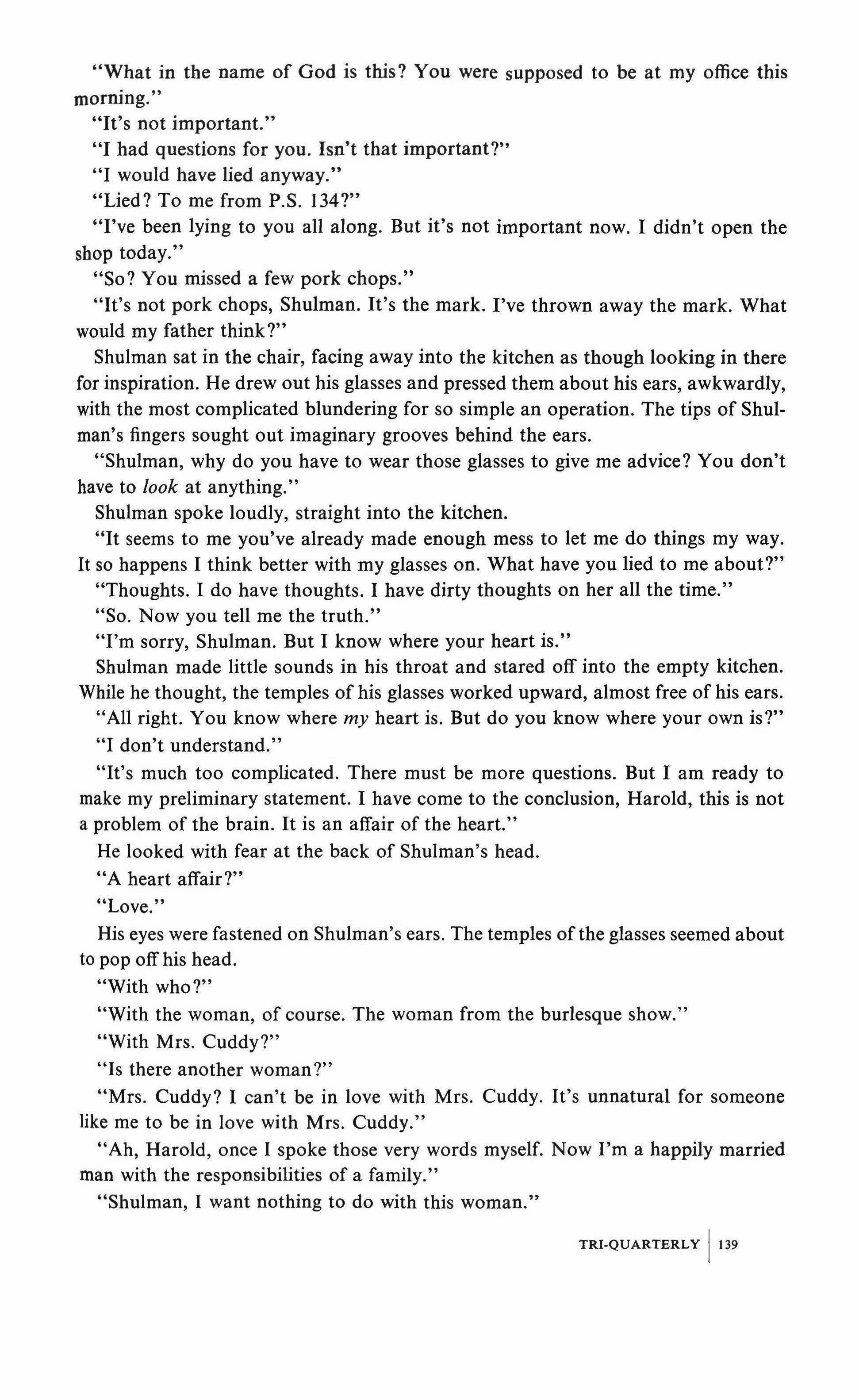
TRI-QUARTERLY 1139
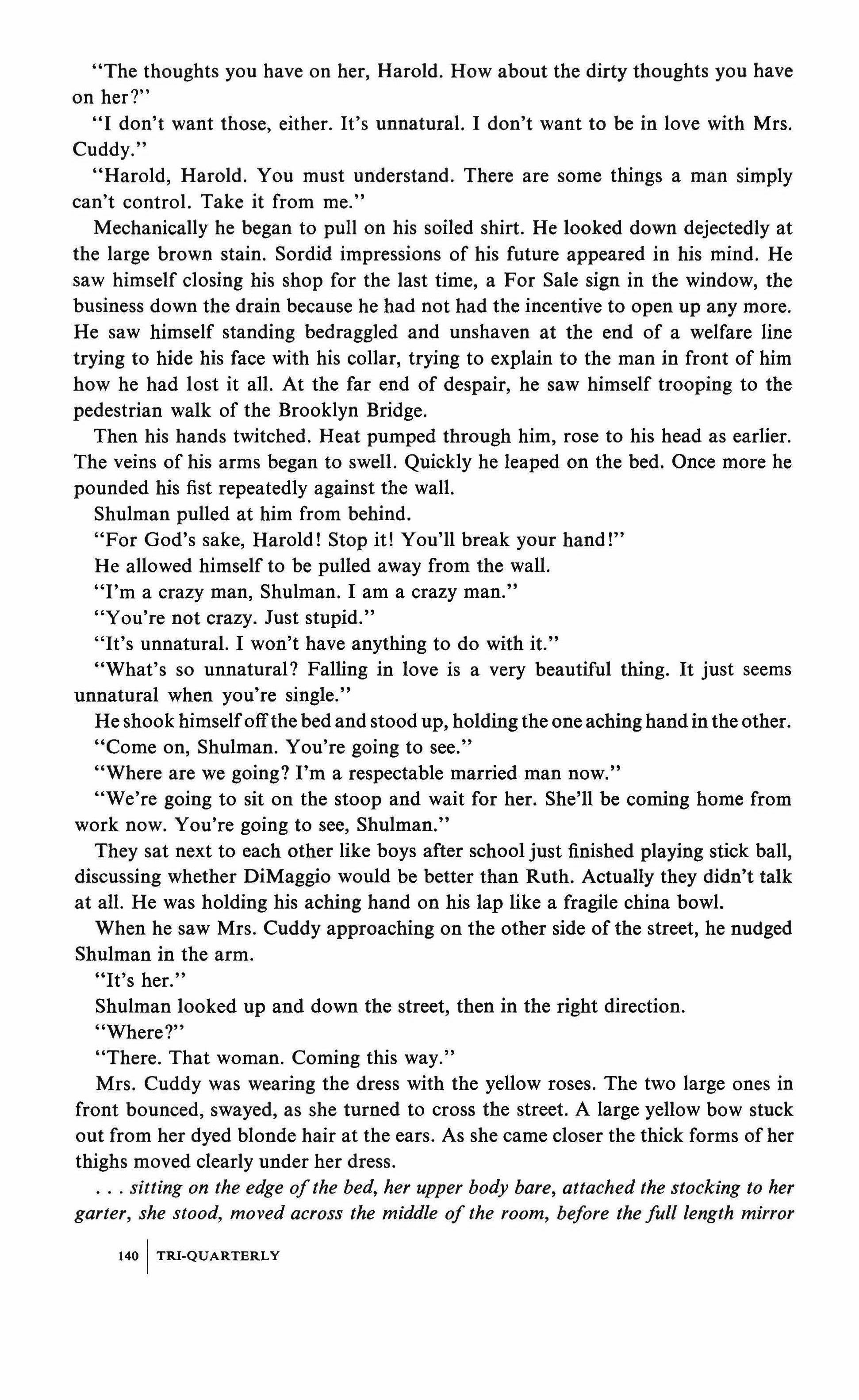
"The thoughts you have on her, Harold. How about the dirty thoughts you have on her?"
"I don't want those, either. It's unnatural. I don't want to be in love with Mrs. Cuddy."
"Harold, Harold. You must understand. There are some things a man simply can't control. Take it from me."
Mechanically he began to pull on his soiled shirt. He looked down dejectedly at the large brown stain. Sordid impressions of his future appeared in his mind. He saw himself closing his shop for the last time, a For Sale sign in the window, the business down the drain because he had not had the incentive to open up any more. He saw himself standing bedraggled and unshaven at the end of a welfare line trying to hide his face with his collar, trying to explain to the man in front of him how he had lost it all. At the far end of despair, he saw himself trooping to the pedestrian walk of the Brooklyn Bridge.
Then his hands twitched. Heat pumped through him, rose to his head as earlier. The veins of his arms began to swell. Quickly he leaped on the bed. Once more he pounded his fist repeatedly against the wall.
Shulman pulled at him from behind.
"For God's sake, Harold! Stop it! You'll break your hand!"
He allowed himself to be pulled away from the wall.
"I'm a crazy man, Shulman. I am a crazy man."
"You're not crazy. Just stupid."
"It's unnatural. I won't have anything to do with it."
"What's so unnatural? Falling in love is a very beautiful thing. It just seems unnatural when you're single."
He shook himselfoffthe bed and stood up, holding the one aching hand in the other.
"Come on, Shulman. You're going to see."
"Where are we going? I'm a respectable married man now."
"We're going to sit on the stoop and wait for her. She'll be coming home from work now. You're going to see, Shulman."
They sat next to each other like boys after school just finished playing stick ball, discussing whether DiMaggio would be better than Ruth. Actually they didn't talk at all. He was holding his aching hand on his lap like a fragile china bowl.
When he saw Mrs. Cuddy approaching on the other side of the street, he nudged Shulman in the arm.
"It's her."
Shulman looked up and down the street, then in the right direction. "Where?"
"There. That woman. Coming this way."
Mrs. Cuddy was wearing the dress with the yellow roses. The two large ones in front bounced, swayed, as she turned to cross the street. A large yellow bow stuck out from her dyed blonde hair at the ears. As she came closer the thick forms of her thighs moved clearly under her dress
sitting on the edge of the bed, her upper body bare, attached the stocking to her garter, she stood, moved across the middle of the room, before the full length mirror
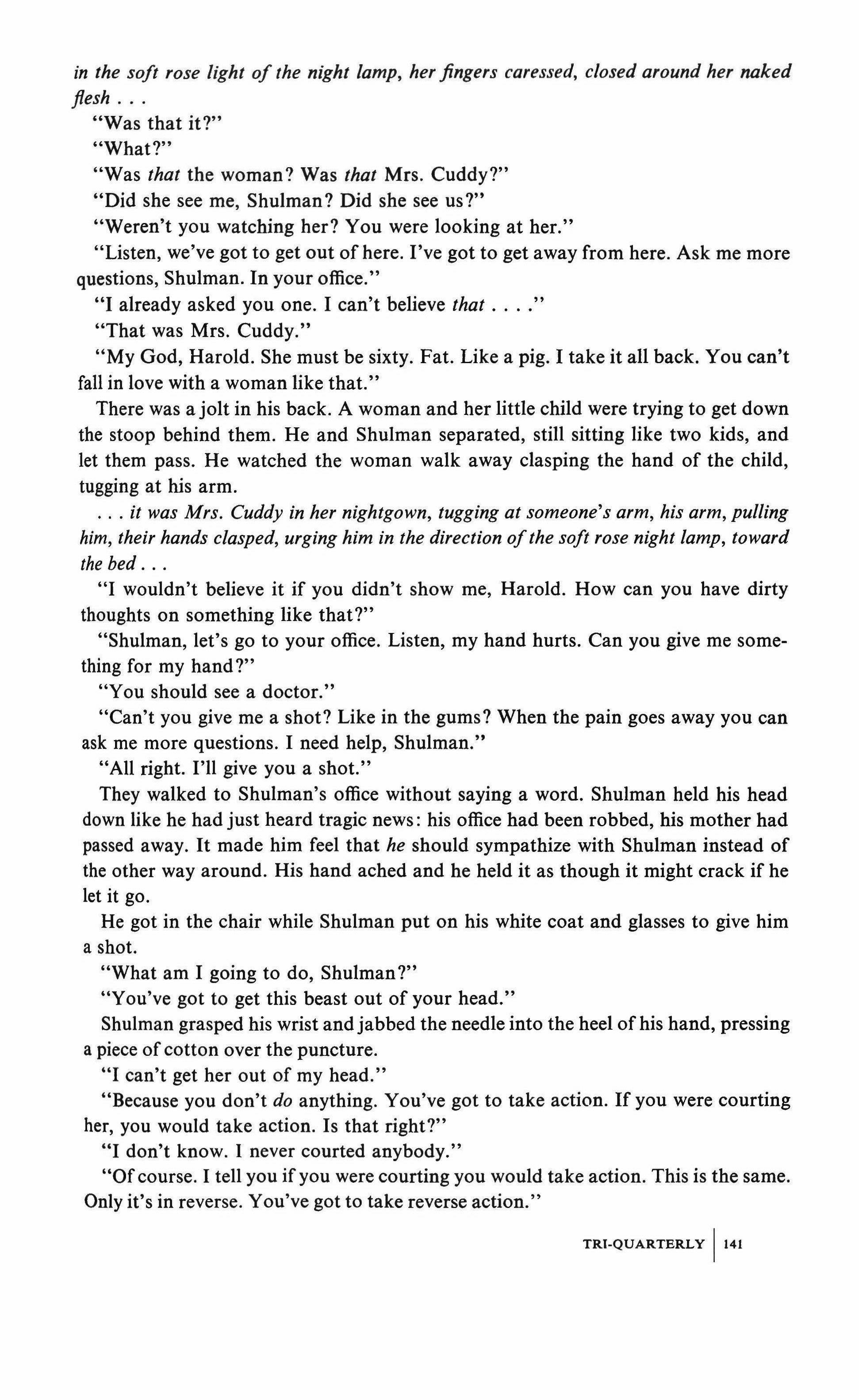
in the soft rose light of the night lamp, her fingers caressed, closed around her naked flesh
"Was that it?"
"What?"
"Was that the woman? Was that Mrs. Cuddy?"
"Did she see me, Shulman? Did she see us?"
"Weren't you watching her? You were looking at her."
"Listen, we've got to get out of here. I've got to get away from here. Ask me more questions, Shulman. In your office."
"I already asked you one. I can't believe that "That was Mrs. Cuddy."
"My God, Harold. She must be sixty. Fat. Like a pig. I take it all back. You can't fall in love with a woman like that."
There was a jolt in his back. A woman and her little child were trying to get down the stoop behind them. He and Shulman separated, still sitting like two kids, and let them pass. He watched the woman walk away clasping the hand of the child, tugging at his arm
it was Mrs. Cuddy in her nightgown, tugging at someone's arm, his arm, pulling him, their hands clasped, urging him in the direction ofthe soft rose night lamp, toward the bed
"I wouldn't believe it if you didn't show me, Harold. How can you have dirty thoughts on something like that?"
"Shulman, let's go to your office. Listen, my hand hurts. Can you give me something for my hand?"
"You should see a doctor."
"Can't you give me a shot? Like in the gums? When the pain goes away you can ask me more questions. I need help, Shulman."
"All right. I'll give you a shot."
They walked to Shulman's office without saying a word. Shulman held his head down like he had just heard tragic news: his office had been robbed, his mother had passed away. It made him feel that he should sympathize with Shulman instead of the other way around. His hand ached and he held it as though it might crack if he let it go.
He got in the chair while Shulman put on his white coat and glasses to give him a shot.
"What am I going to do, Shulman?"
"You've got to get this beast out of your head."
Shulman grasped his wrist and jabbed the needle into the heel of his hand, pressing a piece of cotton over the puncture.
"I can't get her out of my head."
"Because you don't do anything. You've got to take action. If you were courting her, you would take action. Is that right?"
"I don't know. I never courted anybody."
"Of course. I tell you if you were courting you would take action. This is the same. Only it's in reverse. You've got to take reverse action."
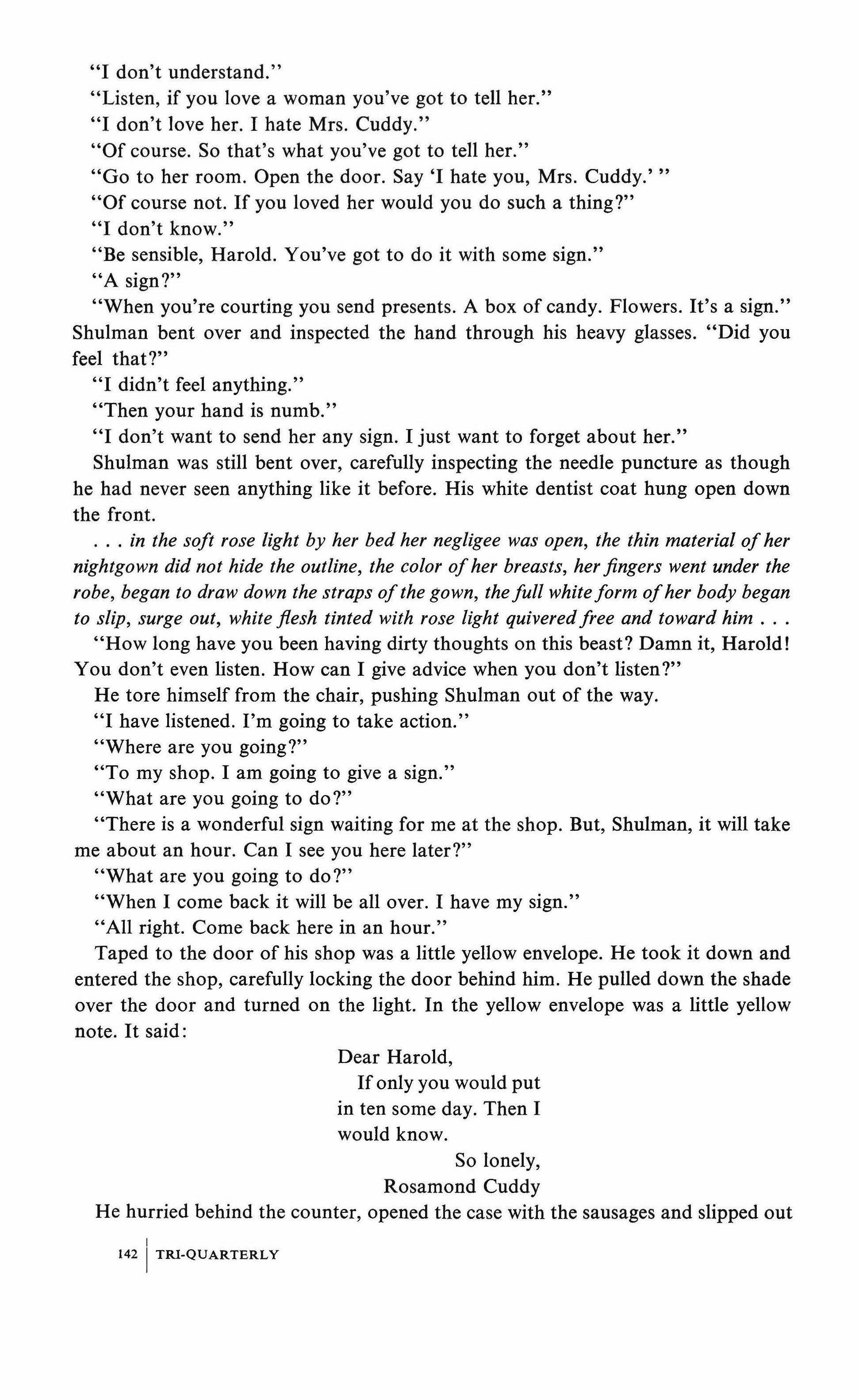
"I don't understand."
"Listen, if you love a woman you've got to tell her."
"I don't love her. I hate Mrs. Cuddy."
"Of course. So that's what you've got to tell her."
"Go to her room. Open the door. Say 'I hate you, Mrs. Cuddy.'
"Of course not. If you loved her would you do such a thing?"
"I don't know."
"Be sensible, Harold. You've got to do it with some sign."
"A sign?"
"When you're courting you send presents. A box of candy. Flowers. It's a sign." Shulman bent over and inspected the hand through his heavy glasses. "Did you feel that?"
"I didn't feel anything."
"Then your hand is numb."
"I don't want to send her any sign. I just want to forget about her."
Shulman was still bent over, carefully inspecting the needle puncture as though he had never seen anything like it before. His white dentist coat hung open down the front.
in the soft rose light by her bed her negligee was open, the thin material ofher nightgown did not hide the outline, the color ofher breasts, herfingers went under the robe, began to draw down the straps ofthe gown, thefull whiteform ofher body began to slip, surge out, white flesh tinted with rose light quiveredfree and toward him
"How long have you been having dirty thoughts on this beast? Damn it, Harold! You don't even listen. How can I give advice when you don't listen?"
He tore himself from the chair, pushing Shulman out of the way.
"I have listened. I'm going to take action."
"Where are you going?"
"To my shop. I am going to give a sign."
"What are you going to do?"
"There is a wonderful sign waiting for me at the shop. But, Shulman, it will take me about an hour. Can I see you here later?"
"What are you going to do?"
"When I come back it will be all over. I have my sign."
"All right. Come back here in an hour."
Taped to the door of his shop was a little yellow envelope. He took it down and entered the shop, carefully locking the door behind him. He pulled down the shade over the door and turned on the light. In the yellow envelope was a little yellow note. It said:
Dear Harold,
If only you would put in ten some day. Then I would know.
So lonely, Rosamond
CuddyHe hurried behind the counter, opened the case with the sausages and slipped out
nine from the tray. Nine plump little pink ones, just as she always ordered. He set them on the waxed paper and automatically weighed them. Then he realized he would be making no charge and smiled.
On the other side of the yellow paper he wrote his own message: Dear Rosamond, Ten plump little pink ones for Rosamond Cuddy. I hope you won't be lonely no more.
Your butcher, Harold Byrd
Taking care, he inserted the note between two of the sausages so that his own message would appear face up when the package was opened. He placed the sausages on the waxed paper next to the power saw. Next he stripped the gauze covering from a salami and set the gauze too beside the saw. He checked once to make sure everything was in order, turned the switch, and the blade of the saw whirred.
He spread the four fingers on his numbed hand away from the thumb and poised his hand momentarily before the whirling saw. His movements were slow but deliberate so he would be sure to get exactly the right angle. He guided his hand toward the blade, then quickly shoved it into, through, the spinning teeth.
His thumb was severed cleanly.
Immediately he turned off the saw and wrapped his wound in the gauze". Then he prepared his package. He placed the thumb atop three sausages, turning the nail face down, shaping a firm little mound with the rest of the meat. Packed that way, the protruding tip of the thumb looked remarkably like the plump pink end of a sausage itself. He rolled up his bundle and secured it with tape.
Out on the sidewalk he checked his thoughts to make sure he had everything straight. First he would take the package to Mrs. Cuddy. Take it right to her room, knock, set it down and run before she could come to the door. He smiled. It was just the way a bashful man would leave flowers, a box of candy, if he was courting.
Then after delivering the package he would go back to see his friend, Shulman, the dentist, to show him what he had done. Shulman would clean up his wound, give him some pill in case his hand hurt that night. They would both have a long talk about it. It would put them both in a good frame of mind. Maybe Shulman would feel like celebrating. Maybe, even, they could sneak out together just like old times to the burlesque show. Who could tell? Some old favorite, one of the old queens, might still be dancing there.
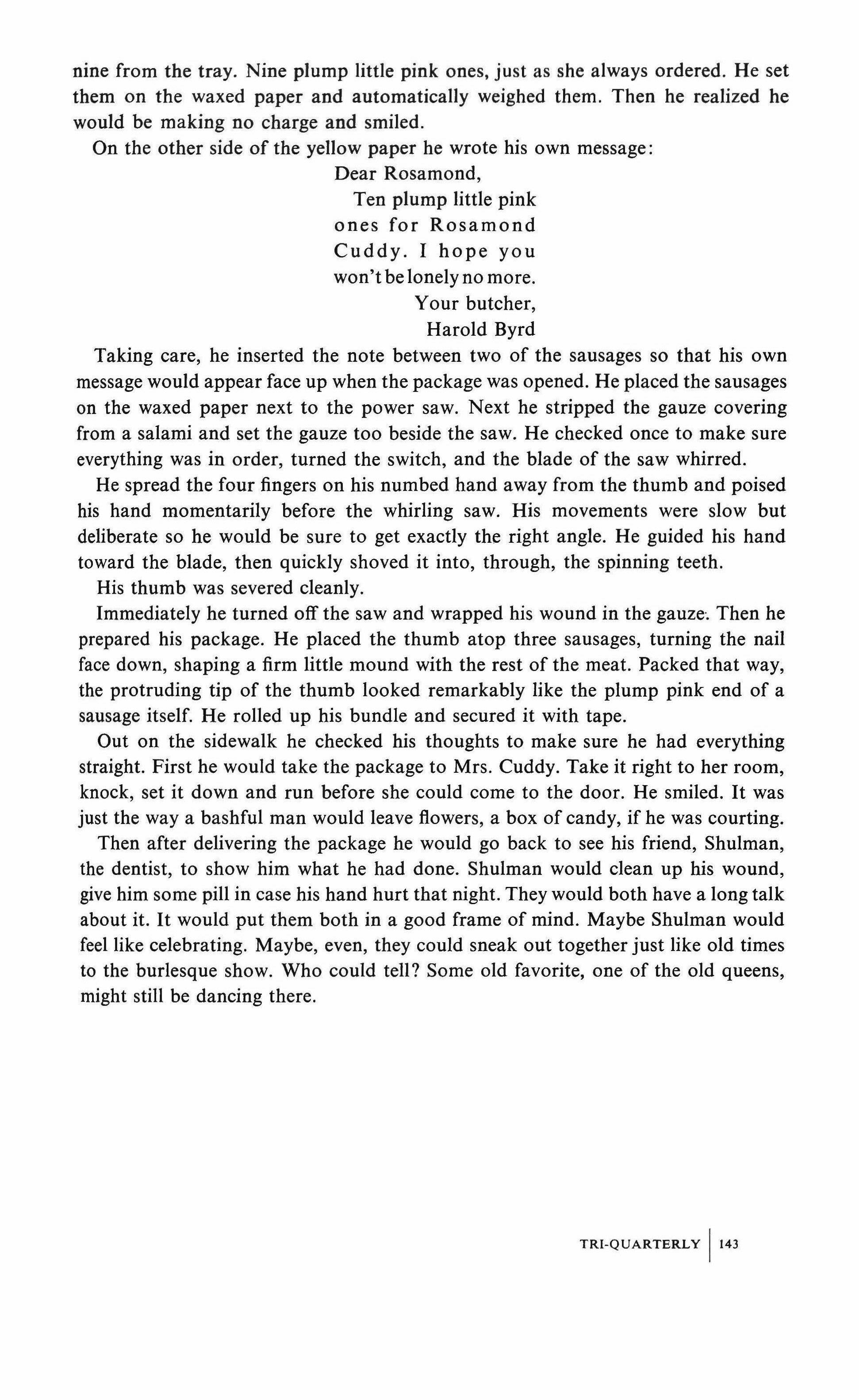
TRI-QUARTERLY 1143
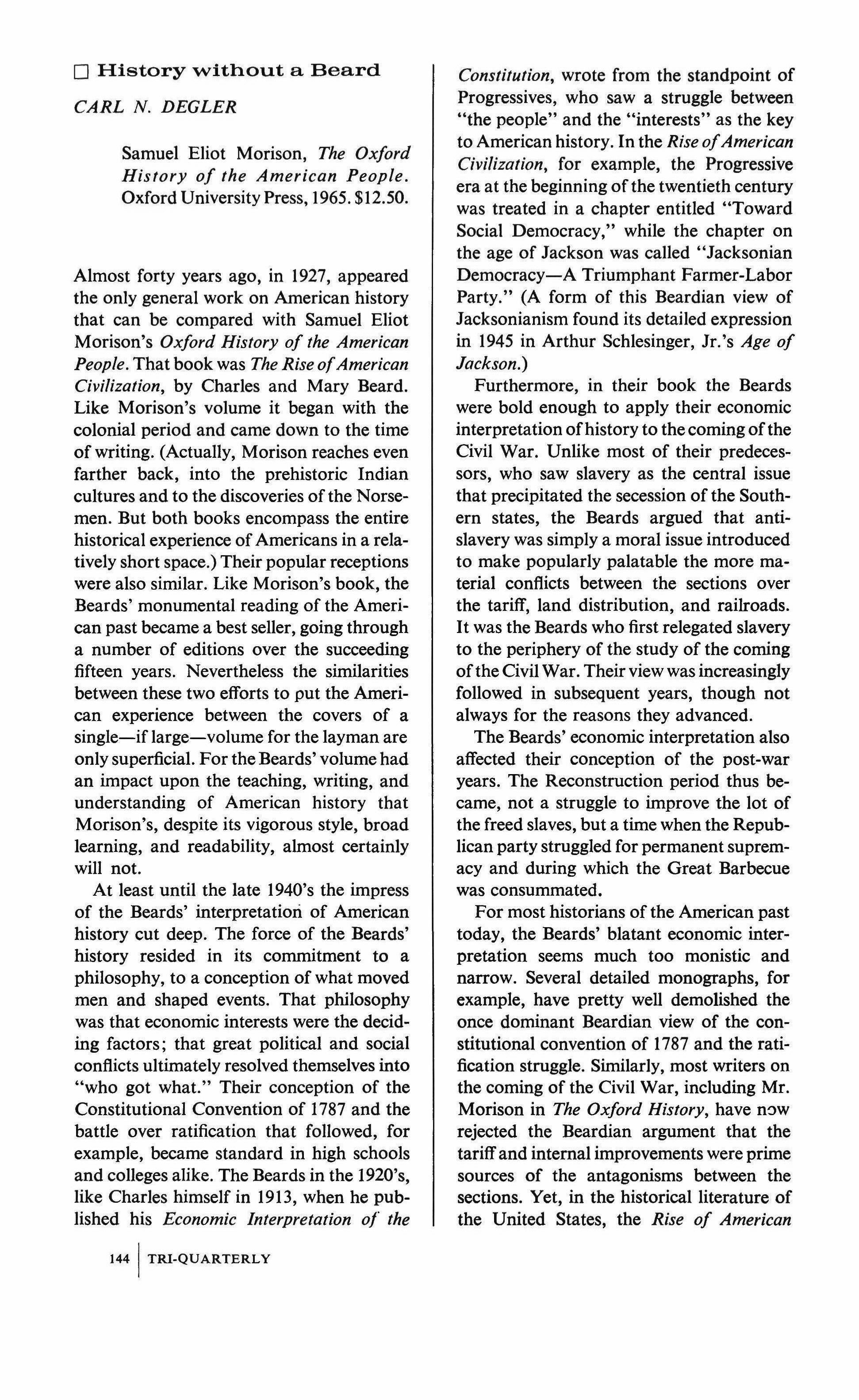
o History without a Beard
CARL N. DEGLERSamuel Eliot Morison, The Oxford History of the American People. Oxford University Press, 1965. $12.50.
Almost forty years ago, in 1927, appeared the only general work on American history that can be compared with Samuel Eliot Morison's Oxford History of the American People. That book was The Rise ofAmerican Civilization, by Charles and Mary Beard. Like Morison's volume it began with the colonial period and came down to the time of writing. (Actually, Morison reaches even farther back, into the prehistoric Indian cultures and to the discoveries of the Norsemen. But both books encompass the entire historical experience ofAmericans in a relatively short space.) Their popular receptions were also similar. Like Morison's book, the Beards' monumental reading of the American past became a best seller, going through a number of editions over the succeeding fifteen years. Nevertheless the similarities between these two efforts to put the American experience between the covers of a single-if large-volume for the layman are only superficial. For the Beards' volume had an impact upon the teaching, writing, and understanding of American history that Morison's, despite its vigorous style, broad learning, and readability, almost certainly will not.
At least until the late 1940's the impress of the Beards' interpretatiori of American history cut deep. The force of the Beards' history resided in its commitment to a philosophy, to a conception of what moved men and shaped events. That philosophy was that economic interests were the deciding factors; that great political and social conflicts ultimately resolved themselves into "who got what." Their conception of the Constitutional Convention of 1787 and the battle over ratification that followed, for example, became standard in high schools and colleges alike. The Beards in the 1920's, like Charles himself in 1913, when he published his Economic Interpretation of the
Constitution, wrote from the standpoint of Progressives, who saw a struggle between "the people" and the "interests" as the key to American history. In the Rise ofAmerican Civilization, for example, the Progressive era at the beginning ofthe twentieth century was treated in a chapter entitled "Toward Social Democracy," while the chapter on the age of Jackson was called "Jacksonian Democracy-A Triumphant Farmer-Labor Party." (A form of this Beardian view of Jacksonianism found its detailed expression in 1945 in Arthur Schlesinger, Jr.'s Age of Jackson.)
Furthermore, in their book the Beards were bold enough to apply their economic interpretation ofhistory to the coming ofthe Civil War. Unlike most of their predecessors, who saw slavery as the central issue that precipitated the secession of the Southern states, the Beards argued that antislavery was simply a moral issue introduced to make popularly palatable the more material conflicts between the sections over the tariff, land distribution, and railroads. It was the Beards who first relegated slavery to the periphery of the study of the coming ofthe Civil War. Their view was increasingly followed in subsequent years, though not always for the reasons they advanced.
The Beards' economic interpretation also affected their conception of the post-war years. The Reconstruction period thus became, not a struggle to improve the lot of the freed slaves, but a time when the Republican party struggled for permanent supremacy and during which the Great Barbecue was consummated.
For most historians of the American past today, the Beards' blatant economic interpretation seems much too monistic and narrow. Several detailed monographs, for example, have pretty well demolished the once dominant Beardian view of the constitutional convention of 1787 and the ratification struggle. Similarly, most writers on the coming of the Civil War, including Mr. Morison in The Oxford History, have now rejected the Beardian argument that the tariffand internal improvements were prime sources of the antagonisms between the sections. Yet, in the historical literature of the United States, the Rise of American
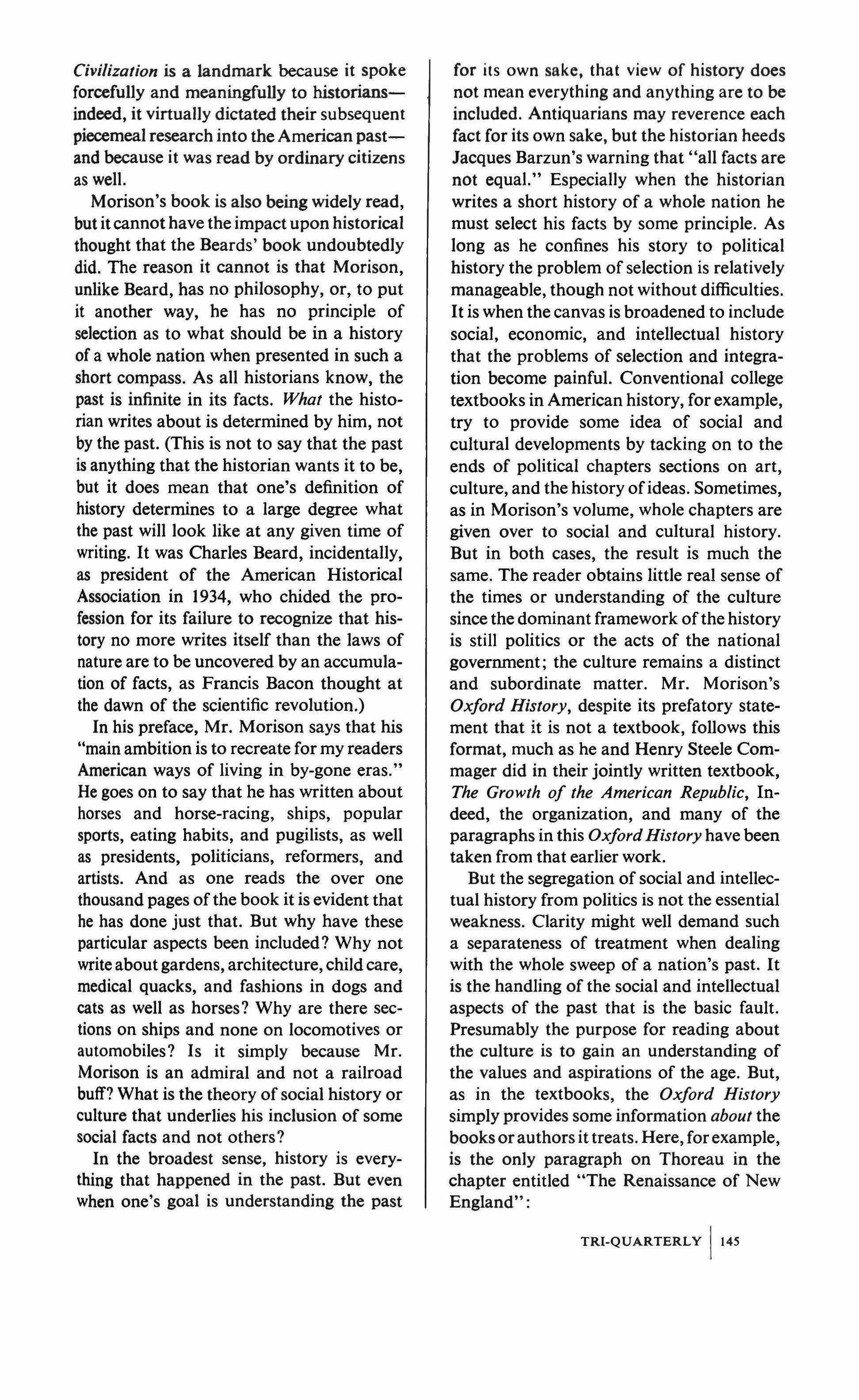
Civilization is a landmark because it spoke forcefully and meaningfully to historiansindeed, it virtually dictated their subsequent piecemeal research into the American pastand because it was read by ordinary citizens as well.
Morison's book is also being widely read, but itcannot have the impact upon historical thought that the Beards' book undoubtedly did. The reason it cannot is that Morison, unlike Beard, has no philosophy, or, to put it another way, he has no principle of selection as to what should be in a history of a whole nation when presented in such a short compass. As all historians know, the past is infinite in its facts. What the historian writes about is determined by him, not by the past. (This is not to say that the past is anything that the historian wants it to be, but it does mean that one's definition of history determines to a large degree what the past will look like at any given time of writing. It was Charles Beard, incidentally, as president of the American Historical Association in 1934, who chided the profession for its failure to recognize that history no more writes itself than the laws of nature are to be uncovered by an accumulation of facts, as Francis Bacon thought at the dawn of the scientific revolution.)
In his preface, Mr. Morison says that his "main ambition is to recreate for my readers American ways of living in by-gone eras." He goes on to say that he has written about horses and horse-racing, ships, popular sports, eating habits, and pugilists, as well as presidents, politicians, reformers, and artists. And as one reads the over one thousand pages of the book it is evident that he has done just that. But why have these particular aspects been included? Why not write about gardens, architecture, child care, medical quacks, and fashions in dogs and cats as well as horses? Why are there sections on ships and none on locomotives or automobiles? Is it simply because Mr. Morison is an admiral and not a railroad buff? What is the theory of social history or culture that underlies his inclusion of some social facts and not others?
In the broadest sense, history is everything that happened in the past. But even When one's goal is understanding the past
for its own sake, that view of history does not mean everything and anything are to be included. Antiquarians may reverence each fact for its own sake, but the historian heeds Jacques Barzun's warning that "all facts are not equal." Especially when the historian writes a short history of a whole nation he must select his facts by some principle. As long as he confines his story to political history the problem of selection is relatively manageable, though not without difficulties. It is when the canvas is broadened to include social, economic, and intellectual history that the problems of selection and integration become painful. Conventional college textbooks in American history, for example, try to provide some idea of social and cultural developments by tacking on to the ends of political chapters sections on art, culture, and the history ofideas. Sometimes, as in Morison's volume, whole chapters are given over to social and cultural history. But in both cases, the result is much the same. The reader obtains little real sense of the times or understanding of the culture since the dominant framework ofthe history is still politics or the acts of the national government; the culture remains a distinct and subordinate matter. Mr. Morison's Oxford History, despite its prefatory statement that it is not a textbook, follows this format, much as he and Henry Steele Commager did in their jointly written textbook, The Growth of the American Republic, Indeed, the organization, and many of the paragraphs in this OxfordHistory have been taken from that earlier work.
But the segregation of social and intellectual history from politics is not the essential weakness. Clarity might well demand such a separateness of treatment when dealing with the whole sweep of a nation's past. It is the handling of the social and intellectual aspects of the past that is the basic fault. Presumably the purpose for reading about the culture is to gain an understanding of the values and aspirations of the age. But, as in the textbooks, the Oxford History simply provides some information about the books or authors it treats. Here, for example, is the only paragraph on Thoreau in the chapter entitled "The Renaissance of New England":
TRI-QUARTERLy 1145
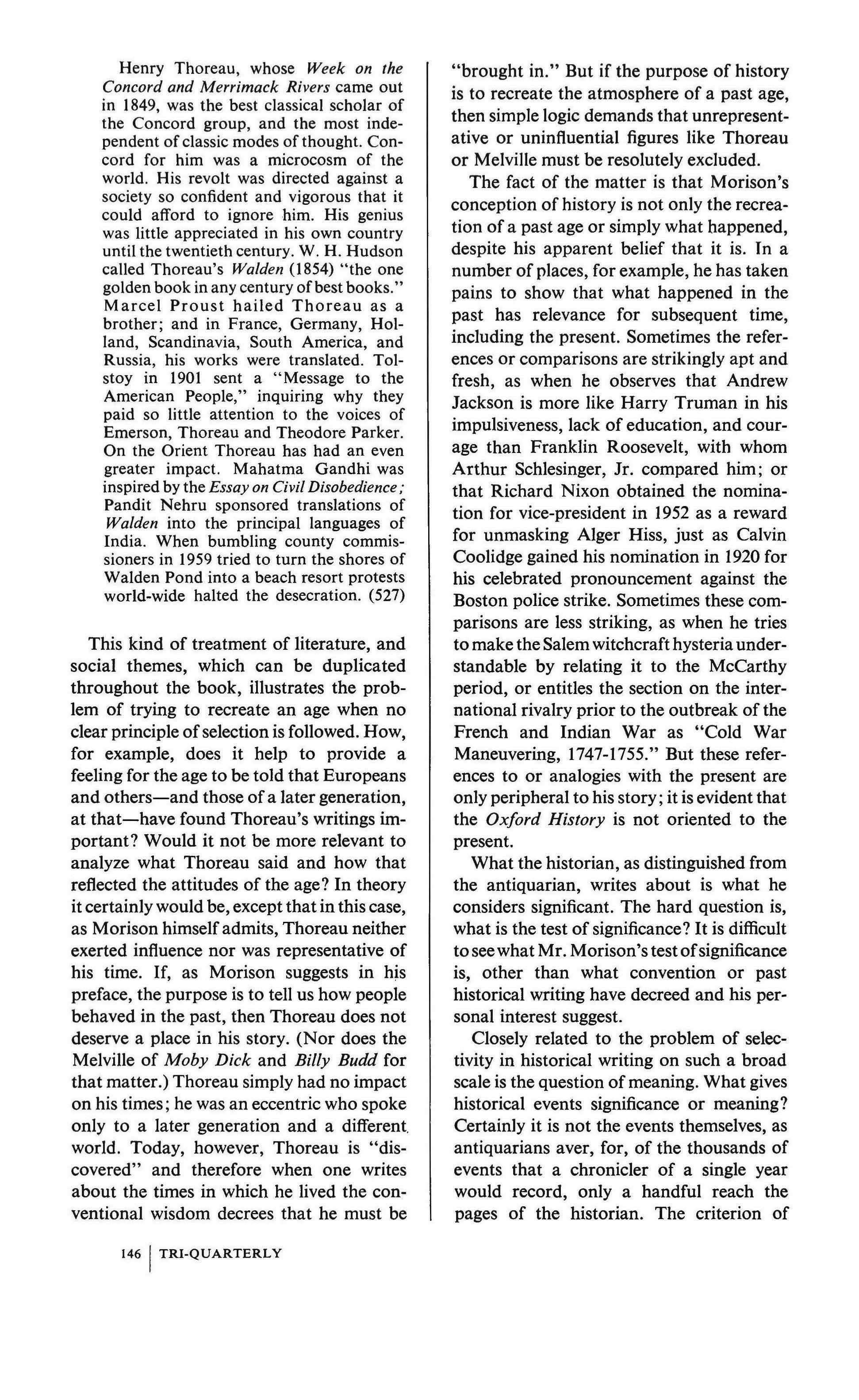
Henry Thoreau, whose Week on the Concord and Merrimack Rivers came out in 1849, was the best classical scholar of the Concord group, and the most independent of classic modes of thought. Concord for him was a microcosm of the world. His revolt was directed against a society so confident and vigorous that it could afford to ignore him. His genius was little appreciated in his own country until the twentieth century. W. H. Hudson called Thoreau's Walden (1854) "the one golden book in any century ofbest books."
Marcel Proust hailed Thoreau as a brother; and in France, Germany, Holland, Scandinavia, South America, and Russia, his works were translated. Tolstoy in 1901 sent a "Message to the American People," inquiring why they paid so little attention to the voices of Emerson, Thoreau and Theodore Parker. On the Orient Thoreau has had an even greater impact. Mahatma Gandhi was inspired by the Essay on Civil Disobedience; Pandit Nehru sponsored translations of Walden into the principal languages of India. When bumbling county commissioners in 1959 tried to turn the shores of Walden Pond into a beach resort protests world-wide halted the desecration. (527)
This kind of treatment of literature, and social themes, which can be duplicated throughout the book, illustrates the problem of trying to recreate an age when no clear principle ofselection is followed. How, for example, does it help to provide a feeling for the age to be told that Europeans and others-and those of a later generation, at that-have found Thoreau's writings important? Would it not be more relevant to analyze what Thoreau said and how that reflected the attitudes of the age? In theory it certainly would be, except that in this case, as Morison himself admits, Thoreau neither exerted influence nor was representative of his time. If, as Morison suggests in his preface, the purpose is to tell us how people behaved in the past, then Thoreau does not deserve a place in his story. (Nor does the Melville of Moby Dick and Billy Budd for that matter.) Thoreau simply had no impact on his times; he was an eccentric who spoke only to a later generation and a different. world. Today, however, Thoreau is "discovered" and therefore when one writes about the times in which he lived the conventional wisdom decrees that he must be
146 TRI-QUARTERLY
"brought in." But if the purpose of history is to recreate the atmosphere of a past age, then simple logic demands that unrepresentative or uninfluential figures like Thoreau or Melville must be resolutely excluded.
The fact of the matter is that Morison's conception of history is not only the recreation of a past age or simply what happened, despite his apparent belief that it is. In a number of places, for example, he has taken pains to show that what happened in the past has relevance for subsequent time, including the present. Sometimes the references or comparisons are strikingly apt and fresh, as when he observes that Andrew Jackson is more like Harry Truman in his impulsiveness, lack of education, and courage than Franklin Roosevelt, with whom Arthur Schlesinger, Jr. compared him; or that Richard Nixon obtained the nomination for vice-president in 1952 as a reward for unmasking Alger Hiss, just as Calvin Coolidge gained his nomination in 1920 for his celebrated pronouncement against the Boston police strike. Sometimes these comparisons are less striking, as when he tries to make the Salem witchcraft hysteriaunderstandable by relating it to the McCarthy period, or entitles the section on the international rivalry prior to the outbreak ofthe French and Indian War as "Cold War Maneuvering, 1747-1755." But these references to or analogies with the present are only peripheral to his story; it is evident that the Oxford History is not oriented to the present.
What the historian, as distinguished from the antiquarian, writes about is what he considers significant. The hard question is, what is the test of significance? It is difficult to see what Mr. Morison's test ofsignificance is, other than what convention or past historical writing have decreed and his personal interest suggest.
Closely related to the problem of selectivity in historical writing on such a broad scale is the question of meaning. What gives historical events significance or meaning? Certainly it is not the events themselves, as antiquarians aver, for, of the thousands of events that a chronicler of a single year would record, only a handful reach the pages of the historian. The criterion of
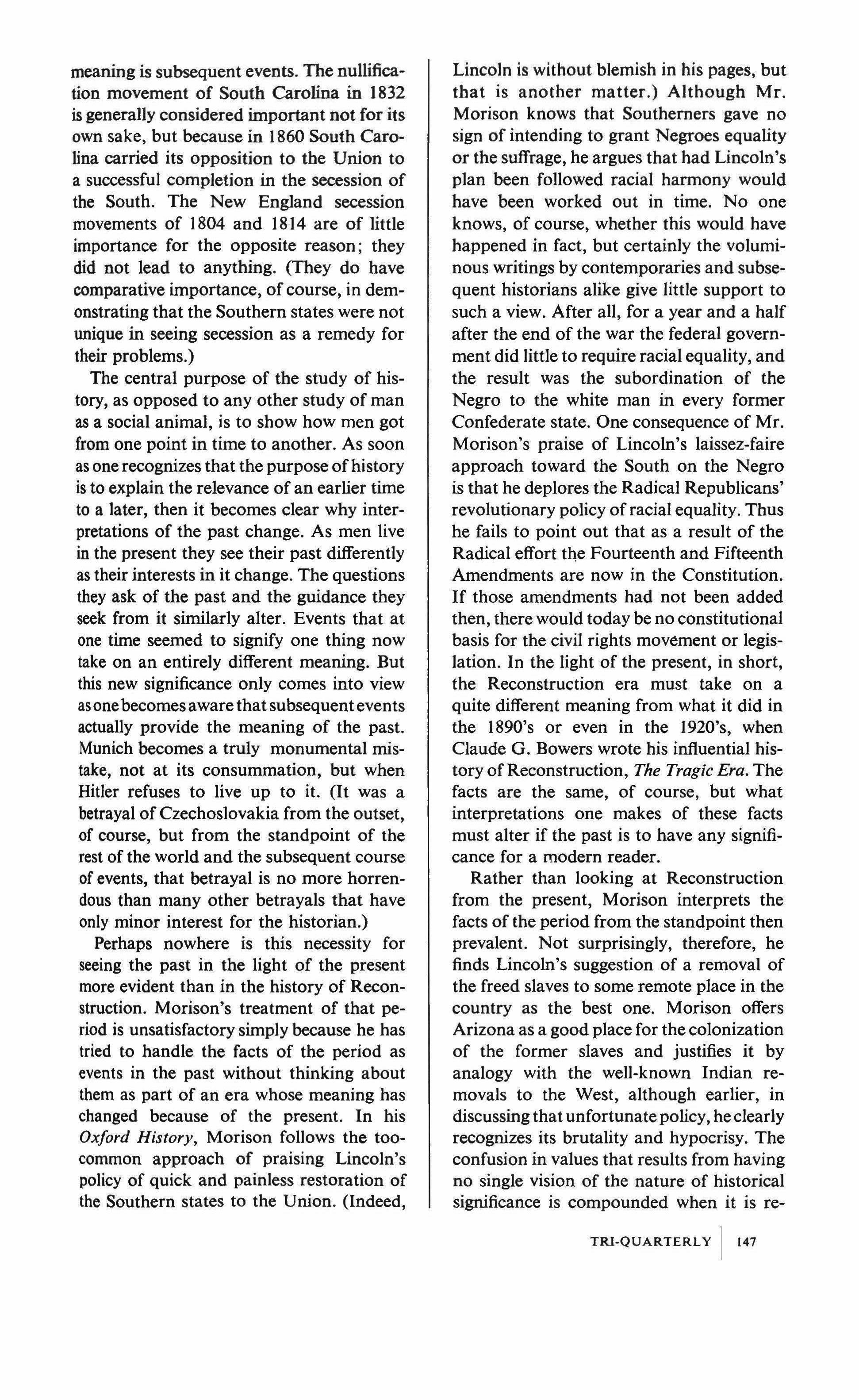
meaning is subsequent events. The nullification movement of South Carolina in 1832 is generally considered important not for its own sake, but because in 1860 South Carolina carried its opposition to the Union to a successful completion in the secession of the South. The New England secession movements of 1804 and 1814 are of little importance for the opposite reason; they did not lead to anything. (They do have comparative importance, of course, in demonstrating that the Southern states were not unique in seeing secession as a remedy for their problems.)
The central purpose of the study of history, as opposed to any other study of man as a social animal, is to show how men got from one point in time to another. As soon as one recognizes that the purpose ofhistory is to explain the relevance of an earlier time to a later, then it becomes clear why interpretations of the past change. As men live in the present they see their past differently as their interests in it change. The questions they ask of the past and the guidance they seek from it similarly alter. Events that at one time seemed to signify one thing now take on an entirely different meaning. But this new significance only comes into view as one becomes aware that subsequentevents actually provide the meaning of the past. Munich becomes a truly monumental mistake, not at its consummation, but when Hitler refuses to live up to it. (It was a betrayal of Czechoslovakia from the outset, of course, but from the standpoint of the rest of the world and the subsequent course of events, that betrayal is no more horrendous than many other betrayals that have only minor interest for the historian.)
Perhaps nowhere is this necessity for seeing the past in the light of the present more evident than in the history of Reconstruction. Morison's treatment of that period is unsatisfactory simply because he has tried to handle the facts of the period as events in the past without thinking about them as part of an era whose meaning has changed because of the present. In his Oxford History, Morison follows the toocommon approach of praising Lincoln's policy of quick and painless restoration of the Southern states to the Union. (Indeed,
Lincoln is without blemish in his pages, but that is another matter.) Although Mr. Morison knows that Southerners gave no sign of intending to grant Negroes equality or the suffrage, he argues that had Lincoln's plan been followed racial harmony would have been worked out in time. No one knows, of course, whether this would have happened in fact, but certainly the voluminous writings by contemporaries and subsequent historians alike give little support to such a view. After all, for a year and a half after the end of the war the federal government did little to require racial equality, and the result was the subordination of the Negro to the white man in every former Confederate state. One consequence of Mr. Morison's praise of Lincoln's laissez-faire approach toward the South on the Negro is that he deplores the Radical Republicans' revolutionary policy of racial equality. Thus he fails to point out that as a result of the Radical effort the Fourteenth and Fifteenth Amendments are now in the Constitution. If those amendments had not been added then, there would today be no constitutional basis for the civil rights movement or legislation. In the light of the present, in short, the Reconstruction era must take on a quite different meaning from what it did in the 1890's or even in the 1920's, when Claude G. Bowers wrote his influential history ofReconstruction, The Tragic Era. The facts are the same, of course, but what interpretations one makes of these facts must alter if the past is to have any significance for a modern reader.
Rather than looking at Reconstruction from the present, Morison interprets the facts of the period from the standpoint then prevalent. Not surprisingly, therefore, he finds Lincoln's suggestion of a removal of the freed slaves to some remote place in the country as the best one. Morison offers Arizona as a good place for the colonization of the former slaves and justifies it by analogy with the well-known Indian removals to the West, although earlier, in discussingthat unfortunatepolicy, he clearly recognizes its brutality and hypocrisy. The confusion in values that results from having no single vision of the nature of historical significance is compounded when it is re-
TRI-QUARTERLy 147
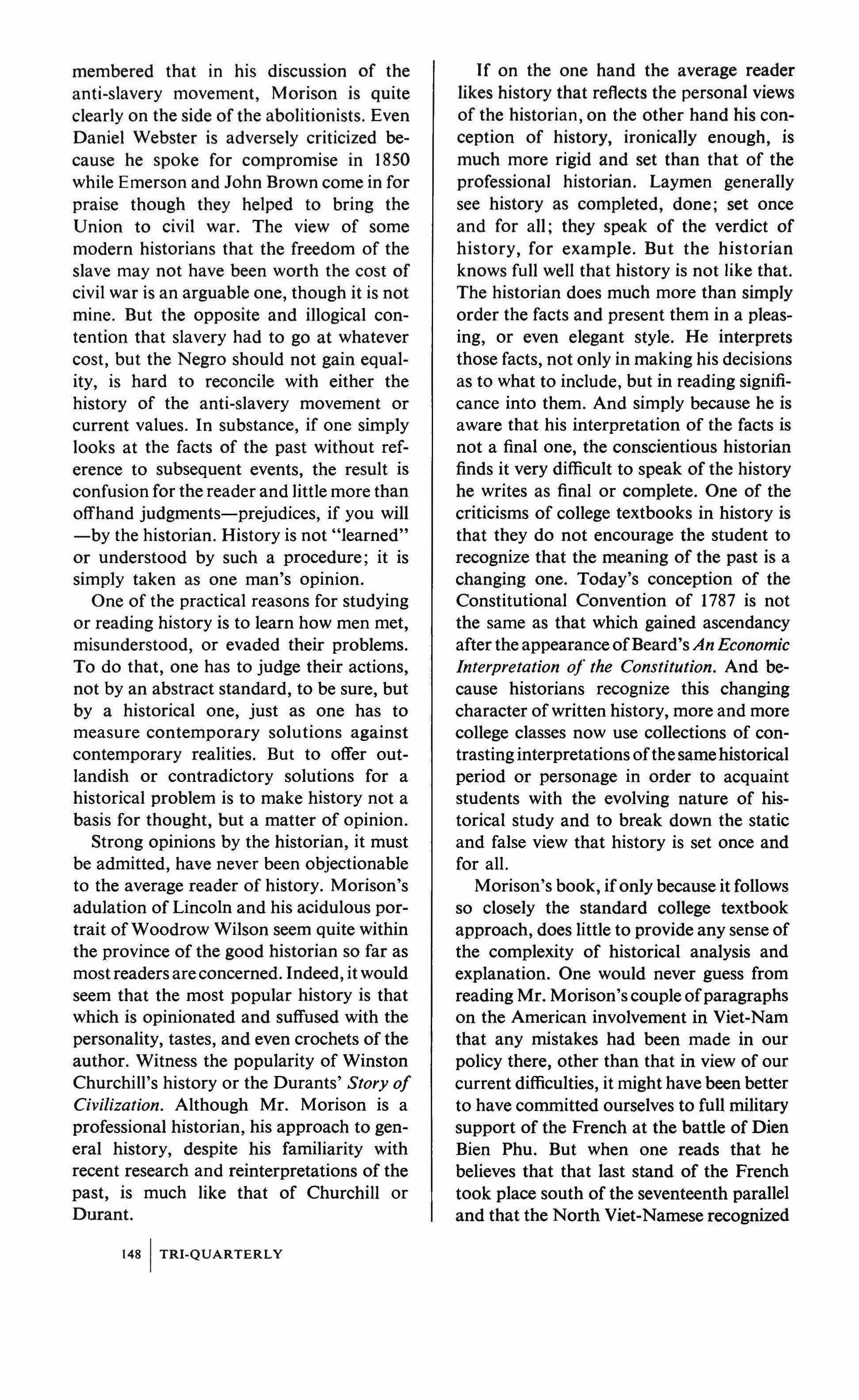
membered that in his discussion of the anti-slavery movement, Morison is quite clearly on the side of the abolitionists. Even Daniel Webster is adversely criticized because he spoke for compromise in 1850 while Emerson and John Brown come in for praise though they helped to bring the Union to civil war. The view of some modern historians that the freedom of the slave may not have been worth the cost of civil war is an arguable one, though it is not mine. But the opposite and illogical contention that slavery had to go at whatever cost, but the Negro should not gain equality, is hard to reconcile with either the history of the anti-slavery movement or current values. In substance, if one simply looks at the facts of the past without reference to subsequent events, the result is confusion for the reader and little more than offhand judgments-prejudices, if you will -by the historian. History is not "learned" or understood by such a procedure; it is simply taken as one man's opinion.
One of the practical reasons for studying or reading history is to learn how men met, misunderstood, or evaded their problems. To do that, one has to judge their actions, not by an abstract standard, to be sure, but by a historical one, just as one has to measure contemporary solutions against contemporary realities. But to offer outlandish or contradictory solutions for a historical problem is to make history not a basis for thought, but a matter of opinion.
Strong opinions by the historian, it must be admitted, have never been objectionable to the average reader of history. Morison's adulation of Lincoln and his acidulous portrait of Woodrow Wilson seem quite within the province of the good historian so far as most readers are concerned. Indeed, it would seem that the most popular history is that which is opinionated and suffused with the personality, tastes, and even crochets of the author. Witness the popularity of Winston Churchill's history or the Durants' Story of Civilization. Although Mr. Morison is a professional historian, his approach to general history, despite his familiarity with recent research and reinterpretations of the past, is much like that of Churchill or Durant.
If on the one hand the average reader likes history that reflects the personal views of the historian, on the other hand his conception of history, ironically enough, is much more rigid and set than that of the professional historian. Laymen generally see history as completed, done; set once and for all; they speak of the verdict of history, for example. But the historian knows full well that history is not like that. The historian does much more than simply order the facts and present them in a pleasing, or even elegant style. He interprets those facts, not only in making his decisions as to what to include, but in reading significance into them. And simply because he is aware that his interpretation of the facts is not a final one, the conscientious historian finds it very difficult to speak of the history he writes as final or complete. One of the criticisms of college textbooks in history is that they do not encourage the student to recognize that the meaning of the past is a changing one. Today's conception of the Constitutional Convention of 1787 is not the same as that which gained ascendancy after the appearance ofBeard's An Economic Interpretation of the Constitution. And because historians recognize this changing character of written history, more and more college classes now use collections of contrastinginterpretations ofthe samehistorical period or personage in order to acquaint students with the evolving nature of historical study and to break down the static and false view that history is set once and for all.
Morison's book, ifonly because it follows so closely the standard college textbook approach, does little to provide any sense of the complexity of historical analysis and explanation. One would never guess from reading Mr. Morison'scouple ofparagraphs on the American involvement in Viet-Nam that any mistakes had been made in our policy there, other than that in view of our current difficulties, it might have been better to have committed ourselves to full military support of the French at the battle of Dien Bien Phu. But when one reads that he believes that that last stand of the French took place south of the seventeenth parallel and that the North Viet-Namese recognized
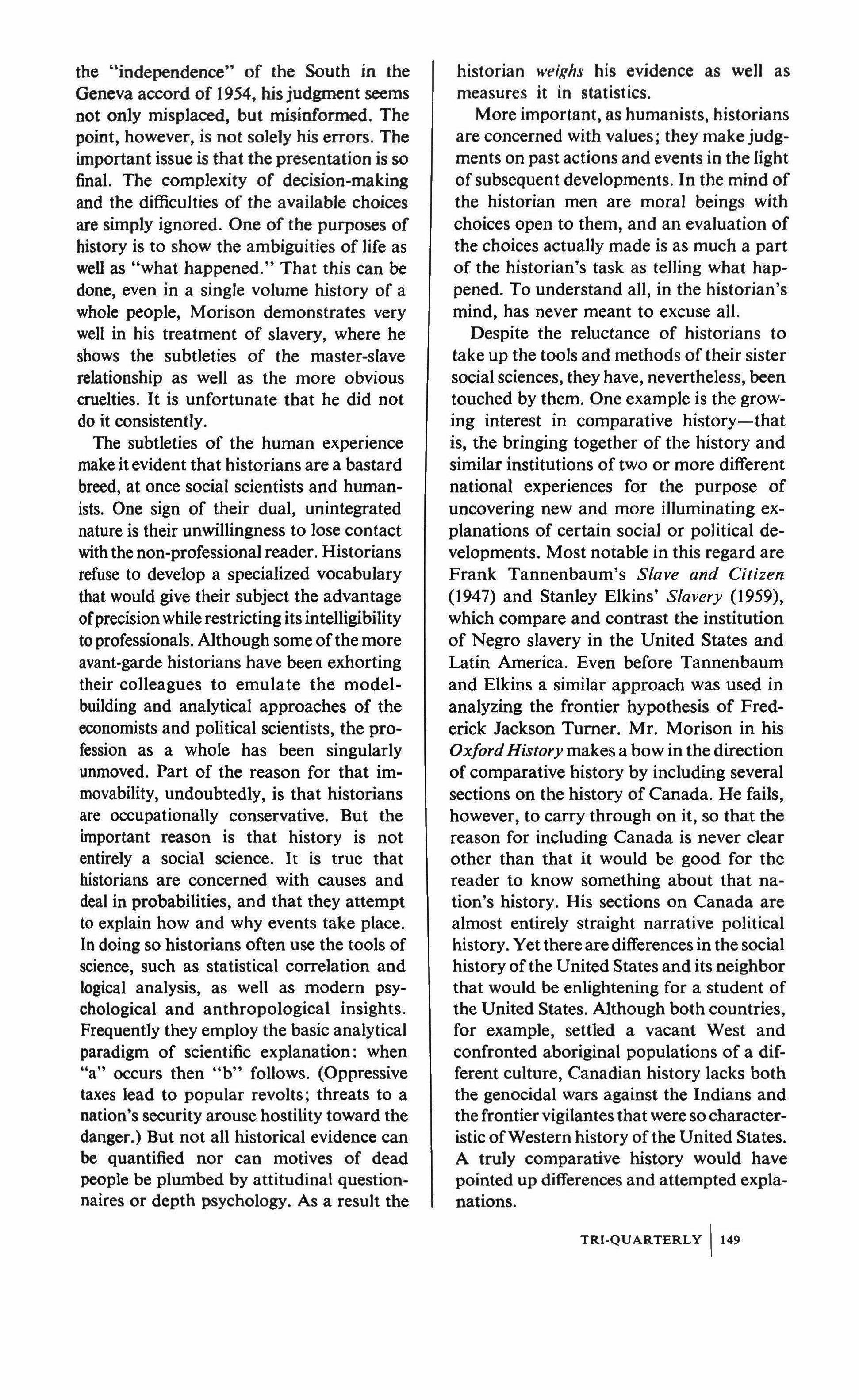
the "independence" of the South in the Geneva accord of 1954, his judgment seems not only misplaced, but misinformed. The point, however, is not solely his errors. The important issue is that the presentation is so finaL The complexity of decision-making and the difficulties of the available choices are simply ignored. One of the purposes of history is to show the ambiguities of life as well as "what happened." That this can be done, even in a single volume history of a whole people, Morison demonstrates very well in his treatment of slavery, where he shows the subtleties of the master-slave relationship as well as the more obvious cruelties. It is unfortunate that he did not do it consistently.
The subtleties of the human experience make it evident that historians are a bastard breed, at once social scientists and humanists. One sign of their dual, unintegrated nature is their unwillingness to lose contact with the non-professional reader. Historians refuse to develop a specialized vocabulary that would give their subject the advantage ofprecision while restricting its intelligibility to professionals. Although some ofthe more avant-garde historians have been exhorting their colleagues to emulate the modelbuilding and analytical approaches of the economists and political scientists, the profession as a whole has been singularly unmoved. Part of the reason for that immovability, undoubtedly, is that historians are occupationally conservative. But the important reason is that history is not entirely a social science. It is true that historians are concerned with causes and deal in probabilities, and that they attempt to explain how and why events take place. In doing so historians often use the tools of science, such as statistical correlation and logical analysis, as well as modern psychological and anthropological insights. Frequently they employ the basic analytical paradigm of scientific explanation: when "a" occurs then "b" follows. (Oppressive taxes lead to popular revolts; threats to a nation's security arouse hostility toward the danger.) But not all historical evidence can be quantified nor can motives of dead people be plumbed by attitudinal questionnaires or depth psychology. As a result the
historian weighs his evidence as well as measures it in statistics.
More important, as humanists, historians are concerned with values; they makejudgments on past actions and events in the light of subsequent developments. In the mind of the historian men are moral beings with choices open to them, and an evaluation of the choices actually made is as much a part of the historian's task as telling what happened. To understand all, in the historian's mind, has never meant to excuse all.
Despite the reluctance of historians to take up the tools and methods of their sister social sciences, they have, nevertheless, been touched by them. One example is the growing interest in comparative history-that is, the bringing together of the history and similar institutions of two or more different national experiences for the purpose of uncovering new and more illuminating explanations of certain social or political developments. Most notable in this regard are Frank Tannenbaum's Slave and Citizen (1947) and Stanley Elkins' Slavery (1959), which compare and contrast the institution of Negro slavery in the United States and Latin America. Even before Tannenbaum and Elkins a similar approach was used in analyzing the frontier hypothesis of Frederick Jackson Turner. Mr. Morison in his OxfordHistory makes a bow in the direction of comparative history by including several sections on the history of Canada. He fails, however, to carry through on it, so that the reason for including Canada is never clear other than that it would be good for the reader to know something about that nation's history. His sections on Canada are almost entirely straight narrative political history Yet there are differences in the social history ofthe United States and its neighbor that would be enlightening for a student of the United States. Although both countries, for example, settled a vacant West and confronted aboriginal populations of a different culture, Canadian history lacks both the genocidal wars against the Indians and the frontier vigilantes that were so characteristic ofWestern history ofthe United States. A truly comparative history would have pointed up differences and attempted explanations.
TRI-QUARTERLY
I began this essay with the observation that unlike the Beards' Rise of American Civilization, the Oxford History, despite the eminence of its author, will have little effect upon professional historians. It might be argued that such a result will not really reduce its effect upon the non-professional reader. But I think it will. The reason it will is not because the ordinary lay reader is concerned with the professionals' reaction, but because all readers, professional or not, want meaning in their history. All readers, of course, will enjoy Morison's felicitous style, his wealth of apt anecdotes, and his numerous illustrative examples. For it is undoubtedly a brilliantly written book, clearly organized. Moreover, in some spots, Morison brings the reader up sharply with a fresh view of the past, as in his persuasive depiction of the Puritans as living human beings, who bore almost no resemblance to the stereotype ofthe conventional blue nose. At such a point the reader will begin to rethink his easy ascription to the Puritans ofmodern American attitudes on sex, drinking, and pleasure. In another place the reader is treated to a refreshingly fair analysis of the British colonial system on the eve of the Revolution that may well lead him to reevaluate the arguments of those who believe the American Revolution has relevance to or a lesson for the new colonial nations of Asia and Africa. What the reader will miss, however, is a sense of the relationship of the whole of the American past, as it passes before his eyes, to his life today. The history of his country as it is set forth in this book will still seem to be a rather remote, if fascinating story, peopled by strangers, who briefly come to life because ofevocative writing and pungent comments, but whose acts and times have only slight relevance to the reader's own existence.
The protean nature of history precludes that it will be written in only one way or from a single point of view. A monograph certainlydemands a different approach from a biography or the history of a period. But the Oxford History was not just any work of history; its intention was to provide for the ordinary citizen a conception of his nation's past. When such a work is written without a philosophy of historical signifi-
150 I TRI-QUARTERLY
cance, it becomes not only arbitrary, but irrelevant as well, no matter how good the writing or the scholarship. History is the memory of the race and the historian of a nation is its interpreter. If he fails to make his history relevant and his philosophy consistent, he fails to provide for the citizen what he is entitled to expect. For when written history has a principle of selection and a consistent view of the past, instead of being only a collection of facts and opinions chronologically arranged, it is a powerful tool ofcontemporary thought, as the Beards' Rise of American Civilization certainly was and Morison's Oxford History is not.

o Mind. experience. and 'the American identity'Miller and Boorstin as historians
Perry Miller,
The Life of The Mind in America: From The Revolution to The Civil War, Harcourt, Brace and World, 1965 Daniel Boorstin, The Americans: The National Experience, Random House, 1965
Americans sat for their portrait in the 19th century, painted in classical sociological style by Tocqueville. The image has remained vivid of a nationalistic and democratic, provincial and practical, commercial and conservative people. Two prominent modern historians, Perry Miller and Daniel J. Boorstin, have recently painted their pictures of 19th-century Americans. Miller is fascinated by the American mind's accomodation to a new society; Boorstin is dazzled by the shapelessness of American experience itself, confounding the familiar European categories of mind. Despite their different approaches, their portraits in many respects tend to converge withTocqueville's.
Both Miller and Boorstin present us with a wealth of detail that Tocqueville never knew, yet because they seek to portray "the
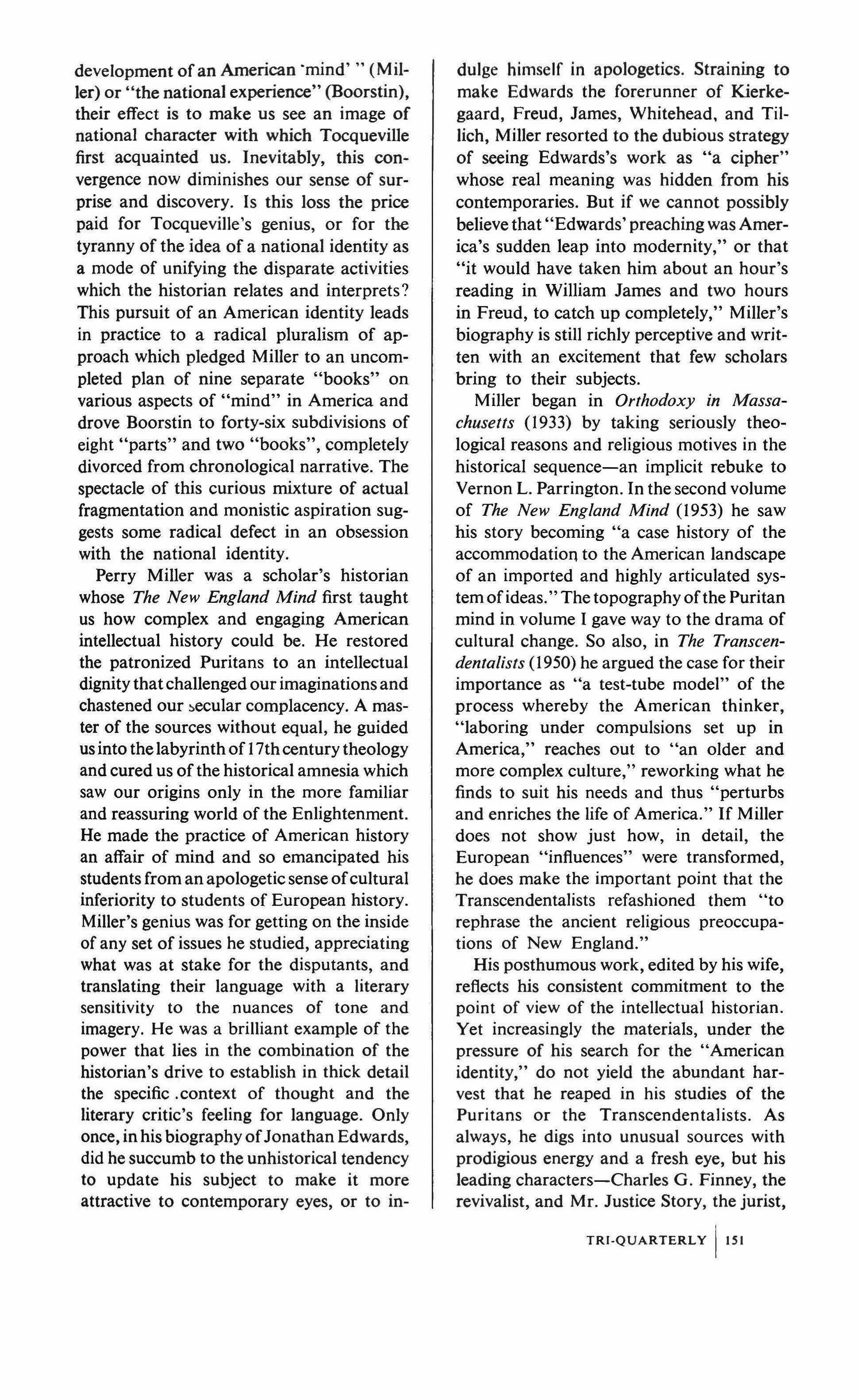
development of an American 'mind' (Miller) or "the national experience" (Boorstin), their effect is to make us see an image of national character with which Tocqueville first acquainted us, Inevitably, this convergence now diminishes our sense of surprise and discovery, Is this loss the price paid for Tocqueville's genius, or for the tyranny of the idea of a national identity as a mode of unifying the disparate activities which the historian relates and interprets? This pursuit of an American identity leads in practice to a radical pluralism of approach which pledged Miller to an uncompleted plan of nine separate "books" on various aspects of "mind" in America and drove Boorstin to forty-six subdivisions of eight "parts" and two "books", completely divorced from chronological narrative. The spectacle of this curious mixture of actual fragmentation and monistic aspiration suggests some radical defect in an obsession with the national identity.
Perry Miller was a scholar's historian whose The New England Mind first taught us how complex and engaging American intellectual history could be. He restored the patronized Puritans to an intellectual dignitythatchallenged our imaginations and chastened our secular complacency. A master of the sources without equal, he guided us into thelabyrinthof 17thcenturytheology and cured us of the historical amnesia which saw our origins only in the more familiar and reassuring world of the Enlightenment. He made the practice of American history an affair of mind and so emancipated his students from an apologetic sense ofcultural inferiority to students of European history. Miller's genius was for getting on the inside of any set of issues he studied, appreciating what was at stake for the disputants, and translating their language with a literary sensitivity to the nuances of tone and imagery. He was a brilliant example of the power that lies in the combination of the historian's drive to establish in thick detail the specific .context of thought and the literary critic's feeling for language. Only once, in his biography ofJonathan Edwards, did he succumb to the unhistorical tendency to update his subject to make it more attractive to contemporary eyes, or to in-
dulge himself in apologetics. Straining to make Edwards the forerunner of Kierkegaard, Freud, James, Whitehead, and Tillich, Miller resorted to the dubious strategy of seeing Edwards's work as "a cipher" whose real meaning was hidden from his contemporaries. But if we cannot possibly believe that "Edwards' preaching was America's sudden leap into modernity," or that "it would have taken him about an hour's reading in William James and two hours in Freud, to catch up completely," Miller's biography is still richly perceptive and written with an excitement that few scholars bring to their subjects.
Miller began in Orthodoxy in Massachusetts (1933) by taking seriously theological reasons and religious motives in the historical sequence-an implicit rebuke to Vernon L. Parrington. In the second volume of The New England Mind (1953) he saw his story becoming "a case history of the accommodation to the American landscape of an imported and highly articulated system ofideas."The topography ofthe Puritan mind in volume I gave way to the drama of cultural change. So also, in The Transcendentalists (1950) he argued the case for their importance as "a test-tube model" of the process whereby the American thinker, "laboring under compulsions set up in America," reaches out to "an older and more complex culture," reworking what he finds to suit his needs and thus "perturbs and enriches the life of America." If Miller does not show just how, in detail, the European "influences" were transformed, he does make the important point that the Transcendentalists refashioned them "to rephrase the ancient religious preoccupations of New England."
His posthumous work, edited by his wife, reflects his consistent commitment to the point of view of the intellectual historian. Yet increasingly the materials, under the pressure of his search for the "American identity," do not yield the abundant harvest that he reaped in his studies of the Puritans or the Transcendentalists. As always, he digs into unusual sources with prodigious energy and a fresh eye, but his leading characters-Charles G. Finney, the revivalist, and Mr. Justice Story, the jurist,
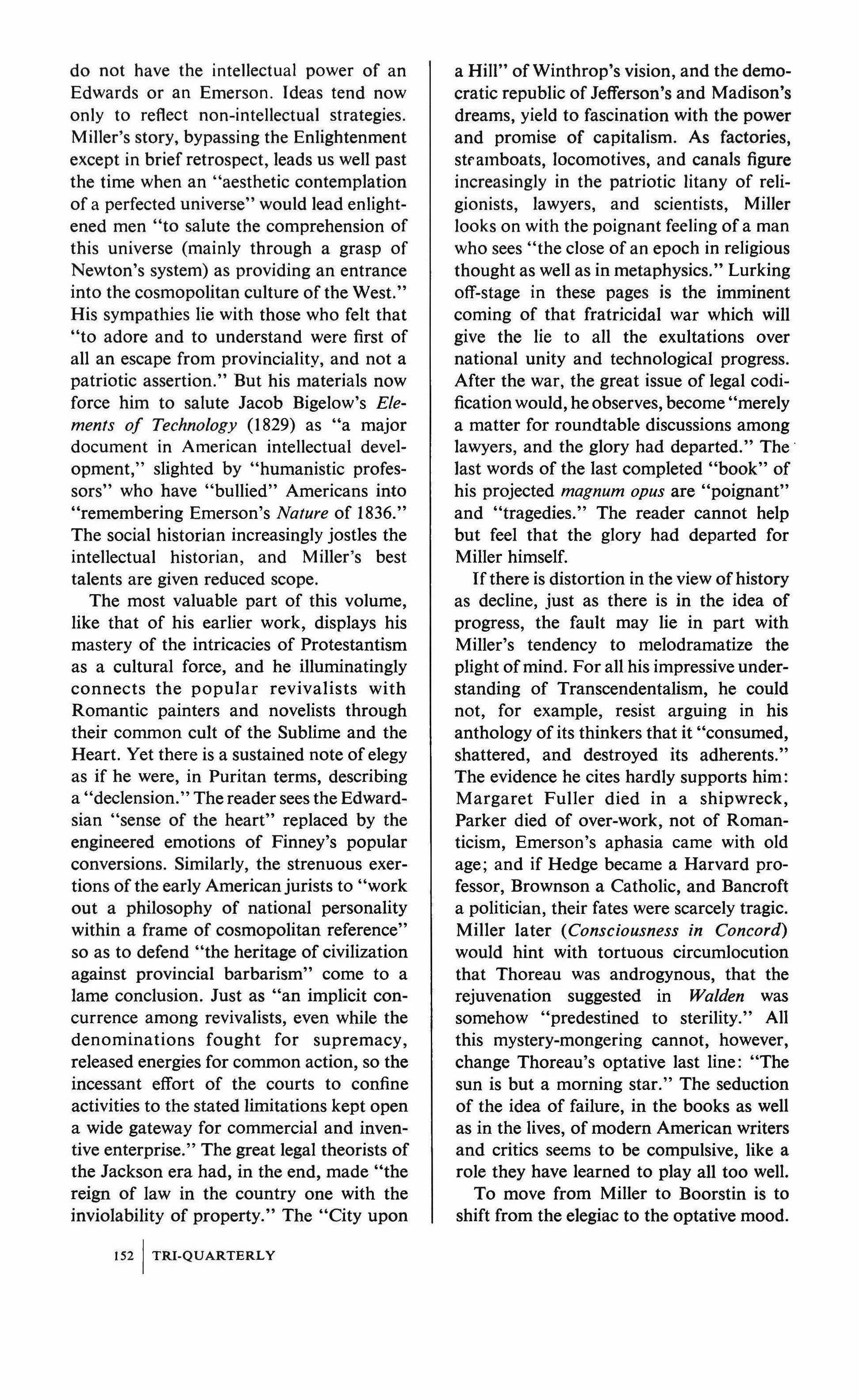
do not have the intellectual power of an Edwards or an Emerson. Ideas tend now only to reflect non-intellectual strategies. Miller's story, bypassing the Enlightenment except in brief retrospect, leads us well past the time when an "aesthetic contemplation of a perfected universe" would lead enlightened men "to salute the comprehension of this universe (mainly through a grasp of Newton's system) as providing an entrance into the cosmopolitan culture of the West." His sympathies lie with those who felt that "to adore and to understand were first of all an escape from provinciality, and not a patriotic assertion." But his materials now force him to salute Jacob Bigelow's Elements of Technology (1829) as "a major document in American intellectual development," slighted by "humanistic professors" who have "bullied" Americans into "remembering Emerson's Nature of 1836." The social historian increasingly jostles the intellectual historian, and Miller's best talents are given reduced scope.
The most valuable part of this volume, like that of his earlier work, displays his mastery of the intricacies of Protestantism as a cultural force, and he illuminatingly connects the popular revivalists with Romantic painters and novelists through their common cult of the Sublime and the Heart. Yet there is a sustained note of elegy as if he were, in Puritan terms, describing a "declension." The reader sees the Edwardsian "sense of the heart" replaced by the engineered emotions of Finney's popular conversions. Similarly, the strenuous exertions of the early American jurists to "work out a philosophy of national personality within a frame of cosmopolitan reference" so as to defend "the heritage of civilization against provincial barbarism" come to a lame conclusion. Just as "an implicit concurrence among revivalists, even while the denominations fought for supremacy, released energies for common action, so the incessant effort of the courts to confine activities to the stated limitations kept open a wide gateway for commercial and inventive enterprise." The great legal theorists of the Jackson era had, in the end, made "the reign of law in the country one with the inviolability of property." The "City upon
a Hill" of Winthrop's vision, and the democratic republic of Jefferson's and Madison's dreams, yield to fascination with the power and promise of capitalism. As factories, steamboats, locomotives, and canals figure increasingly in the patriotic litany of religionists, lawyers, and scientists, Miller looks on with the poignant feeling of a man who sees "the close of an epoch in religious thought as well as in metaphysics." Lurking off-stage in these pages is the imminent coming of that fratricidal war which will give the lie to all the exultations over national unity and technological progress. After the war, the great issue of legal codification would, he observes, become "merely a matter for roundtable discussions among lawyers, and the glory had departed." The last words of the last completed "book" of his projected magnum opus are "poignant" and "tragedies." The reader cannot help but feel that the glory had departed for Miller himself.
If there is distortion in the view of history as decline, just as there is in the idea of progress, the fault may lie in part with Miller's tendency to melodramatize the plight ofmind. For all his impressive understanding of Transcendentalism, he could not, for example, resist arguing in his anthology of its thinkers that it "consumed, shattered, and destroyed its adherents." The evidence he cites hardly supports him: Margaret Fuller died in a shipwreck, Parker died of over-work, not of Romanticism, Emerson's aphasia came with old age; and if Hedge became a Harvard professor, Brownson a Catholic, and Bancroft a politician, their fates were scarcely tragic. Miller later (Consciousness in Concord) would hint with tortuous circumlocution that Thoreau was androgynous, that the rejuvenation suggested in Walden was somehow "predestined to sterility." All this mystery-mongering cannot, however, change Thoreau's optative last line: "The sun is but a morning star." The seduction of the idea of failure, in the books as well as in the lives, of modern American writers and critics seems to be compulsive, like a role they have learned to play all too well.
To move from Miller to Boorstin is to shift from the elegiac to the optative mood.
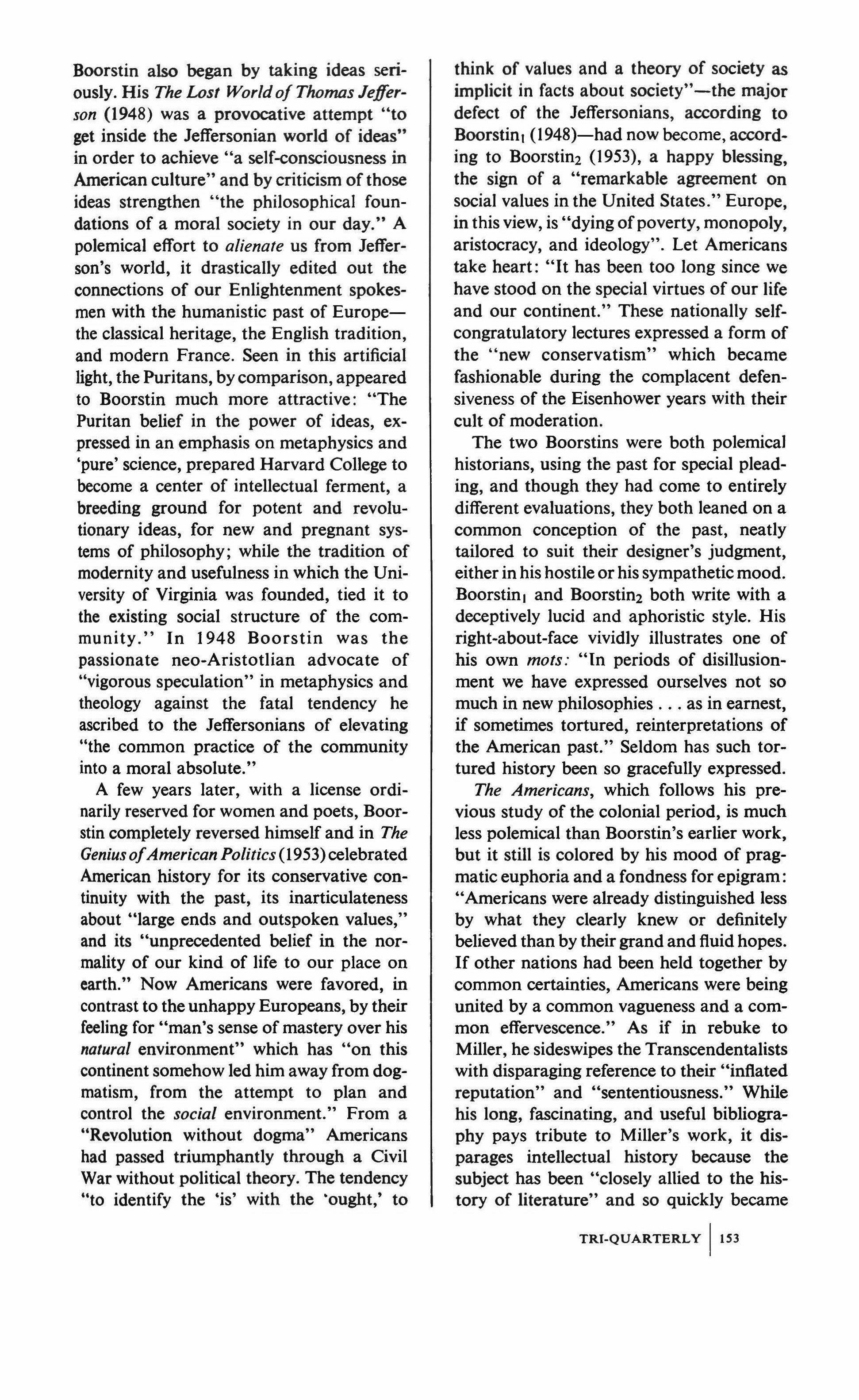
Boorstin also began by taking ideas seriously. His The Lost Worldof Thomas Jefferson (1948) was a provocative attempt "to get inside the Jeffersonian world of ideas" in order to achieve "a self-consciousness in American culture" and by criticism of those ideas strengthen "the philosophical foundations of a moral society in our day." A polemical effort to alienate us from Jefferson's world, it drastically edited out the connections of our Enlightenment spokesmen with the humanistic past of Europethe classical heritage, the English tradition, and modern France. Seen in this artificial light, the Puritans, bycomparison, appeared to Boorstin much more attractive: "The Puritan belief in the power of ideas, expressed in an emphasis on metaphysics and 'pure' science, prepared Harvard College to become a center of intellectual ferment, a breeding ground for potent and revolutionary ideas, for new and pregnant systems of philosophy; while the tradition of modernity and usefulness in which the University of Virginia was founded, tied it to the existing social structure of the community." In 1948 Boorstin was the passionate neo-Aristotlian advocate of "vigorous speculation" in metaphysics and theology against the fatal tendency he ascribed to the Jeffersonians of elevating "the common practice of the community into a moral absolute."
A few years later, with a license ordinarily reserved for women and poets, Boorstin completely reversed himself and in The GeniusofAmerican Politics(1953) celebrated American history for its conservative continuity with the past, its inarticulateness about "large ends and outspoken values," and its "unprecedented belief in the normality of our kind of life to our place on earth." Now Americans were favored, in contrast to the unhappy Europeans, by their feeling for "man's sense of mastery over his natural environment" which has "on this continent somehow led him away from dogmatism, from the attempt to plan and control the social environment." From a "Revolution without dogma" Americans had passed triumphantly through a Civil War without political theory. The tendency "to identify the 'is' with the 'ought,' to
think of values and a theory of society as implicit in facts about society"-the major defect of the Jeffersonians, according to Boorstim (l948)-had now become, according to Boorstin- (1953), a happy blessing, the sign of a "remarkable agreement on social values in the United States." Europe, in this view, is "dying ofpoverty, monopoly, aristocracy, and ideology". Let Americans take heart: "It has been too long since we have stood on the special virtues of our life and our continent." These nationally selfcongratulatory lectures expressed a form of the "new conservatism" which became fashionable during the complacent defensiveness of the Eisenhower years with their cult of moderation.
The two Boorstins were both polemical historians, using the past for special pleading, and though they had come to entirely different evaluations, they both leaned on a common conception of the past, neatly tailored to suit their designer's judgment, either in his hostile or his sympathetic mood. Boorstin, and Boorstinj both write with a deceptively lucid and aphoristic style. His right-about-face vividly illustrates one of his own mots: "In periods of disillusionment we have expressed ourselves not so much in new philosophies as in earnest, if sometimes tortured, reinterpretations of the American past." Seldom has such tortured history been so gracefully expressed.
The Americans, which follows his previous study of the colonial period, is much less polemical than Boorstin's earlier work, but it still is colored by his mood of pragmatic euphoria and a fondness for epigram: "Americans were already distinguished less by what they clearly knew or definitely believed than by their grand and fluid hopes. If other nations had been held together by common certainties, Americans were being united by a common vagueness and a common effervescence. As if in rebuke to Miller, he sideswipes the Transcendentalists with disparaging reference to their "inflated reputation" and "sententiousness." While his long, fascinating, and useful bibliography pays tribute to Miller's work, it disparages intellectual history because the subject has been "closely allied to the history of literature" and so quickly became
TRI-QUARTERLY IIS3
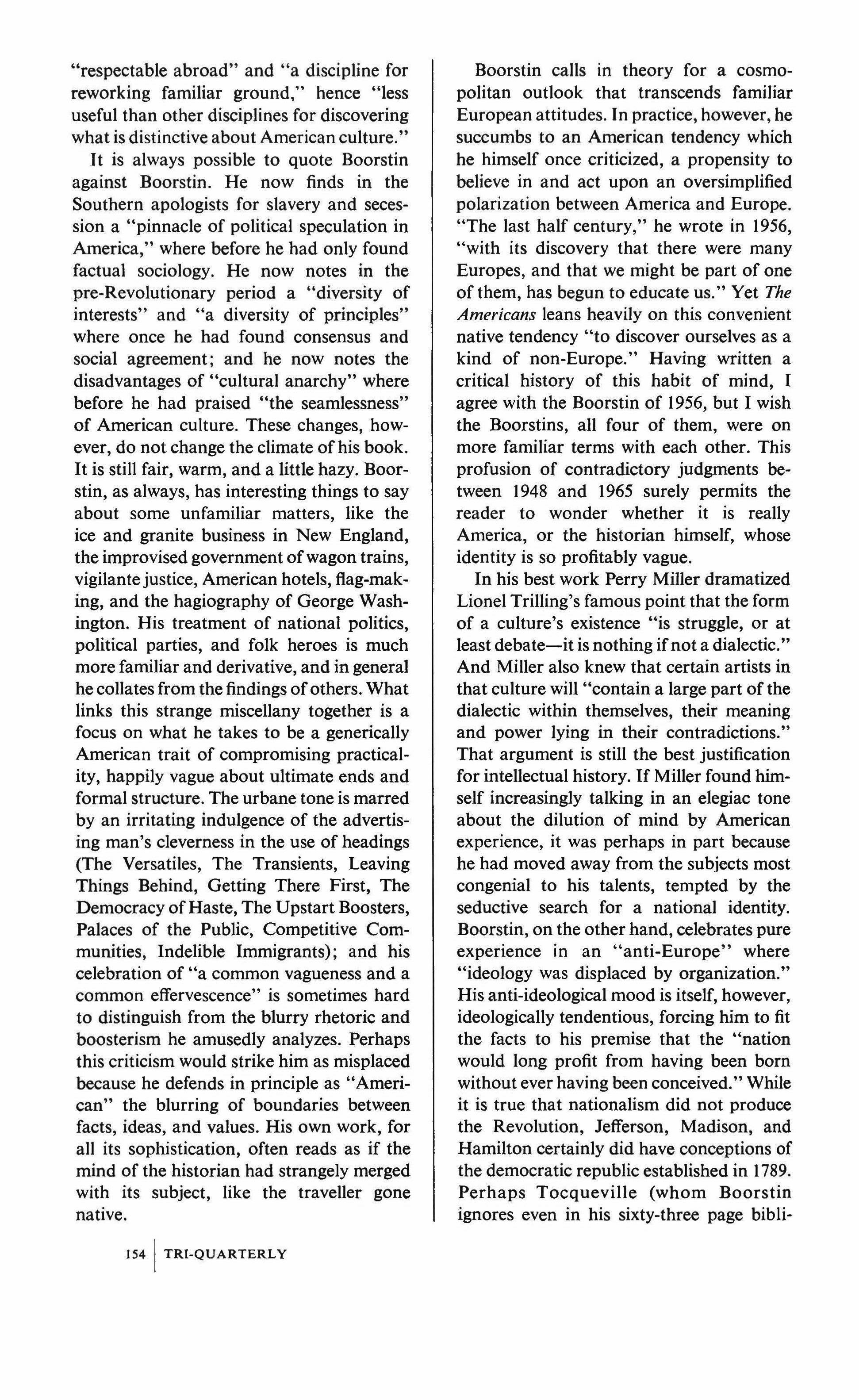
"respectable abroad" and "a discipline for reworking familiar ground," hence "less useful than other disciplines for discovering what is distinctive about American culture." It is always possible to quote Boorstin against Boorstin. He now finds in the Southern apologists for slavery and secession a "pinnacle of political speculation in America," where before he had only found factual sociology. He now notes in the pre-Revolutionary period a "diversity of interests" and "a diversity of principles" where once he had found consensus and social agreement; and he now notes the disadvantages of "cultural anarchy" where before he had praised "the seamlessness" of American culture. These changes, however, do not change the climate of his book. It is still fair, warm, and a little hazy. Boorstin, as always, has interesting things to say about some unfamiliar matters, like the ice and granite business in New England, the improvised government ofwagon trains, vigilantejustice, American hotels, flag-making, and the hagiography of George Washington. His treatment of national politics, political parties, and folk heroes is much more familiar and derivative, and in general he collates from the findings ofothers. What links this strange miscellany together is a focus on what he takes to be a generically American trait of compromising practicality, happily vague about ultimate ends and formal structure. The urbane tone is marred by an irritating indulgence of the advertising man's cleverness in the use of headings (The Versatiles, The Transients, Leaving Things Behind, Getting There First, The Democracy of Haste, The Upstart Boosters, Palaces of the Public, Competitive Communities, Indelible Immigrants); and his celebration of "a common vagueness and a common effervescence" is sometimes hard to distinguish from the blurry rhetoric and boosterism he amusedly analyzes. Perhaps this criticism would strike him as misplaced because he defends in principle as "American" the blurring of boundaries between facts, ideas, and values. His own work, for all its sophistication, often reads as if the mind of the historian had strangely merged with its subject, like the traveller gone native.
1541 TRI-QUARTERLY
Boorstin calls in theory for a cosmopolitan outlook that transcends familiar European attitudes. In practice, however, he succumbs to an American tendency which he himself once criticized, a propensity to believe in and act upon an oversimplified polarization between America and Europe. "The last half century," he wrote in 1956, "with its discovery that there were many Europes, and that we might be part of one of them, has begun to educate us." Yet The Americans leans heavily on this convenient native tendency "to discover ourselves as a kind of non-Europe." Having written a critical history of this habit of mind, I agree with the Boorstin of 1956, but I wish the Boorstins, all four of them, were on more familiar terms with each other. This profusion of contradictory judgments between 1948 and 1965 surely permits the reader to wonder whether it is really America, or the historian himself, whose identity is so profitably vague.
In his best work Perry Miller dramatized Lionel Trilling's famous point that the form of a culture's existence "is struggle, or at least debate-it is nothing ifnot a dialectic. And Miller also knew that certain artists in that culture will "contain a large part of the dialectic within themselves, their meaning and power lying in their contradictions." That argument is still the best justification for intellectual history. If Miller found himself increasingly talking in an elegiac tone about the dilution of mind by American experience, it was perhaps in part because he had moved away from the subjects most congenial to his talents, tempted by the seductive search for a national identity. Boorstin, on the other hand, celebrates pure experience in an "anti-Europe" where "ideology was displaced by organization." His anti-ideological mood is itself, however, ideologically tendentious, forcing him to fit the facts to his premise that the "nation would long profit from having been born without ever having been conceived." While it is true that nationalism did not produce the Revolution, Jefferson, Madison, and Hamilton certainly did have conceptions of the democratic republic established in 1789. Perhaps Tocqueville (whom Boorstin ignores even in his sixty-three page bibli-
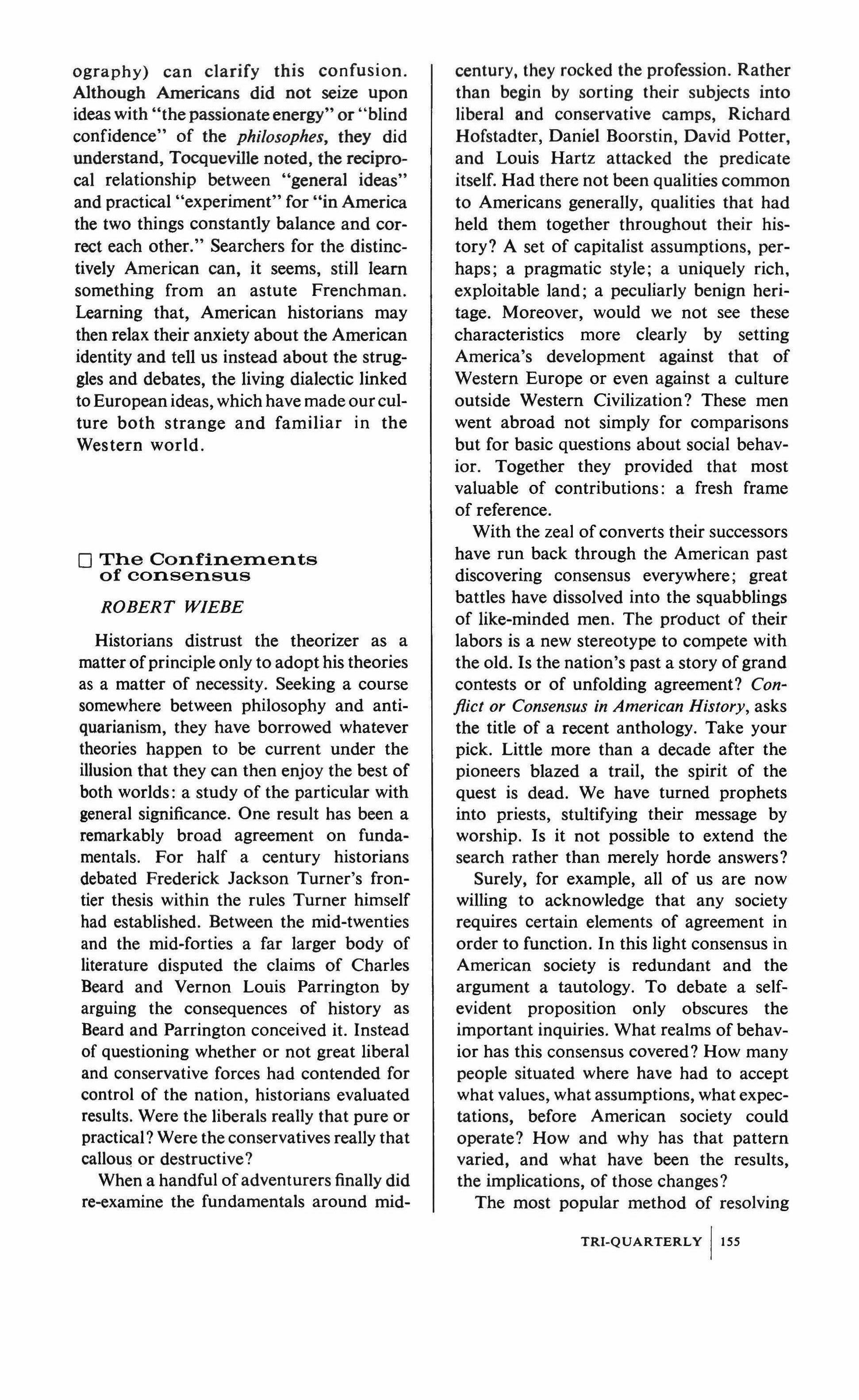
ography) can clarify this confusion. Although Americans did not seize upon ideas with "the passionateenergy" or "blind confidence" of the philosophes, they did understand, Tocqueville noted, the reciprocal relationship between "general ideas" and practical "experiment" for "in America the two things constantly balance and correct each other." Searchers for the distinctively American can, it seems, still learn something from an astute Frenchman. Learning that, American historians may then relax their anxiety about the American identity and tell us instead about the struggles and debates, the living dialectic linked to European ideas, which have made our culture both strange and familiar in the Western world.
Historians distrust the theorizer as a matter ofprincipleonly to adopt his theories as a matter of necessity. Seeking a course somewhere between philosophy and antiquarianism, they have borrowed whatever theories happen to be current under the illusion that they can then enjoy the best of both worlds: a study of the particular with general significance. One result has been a remarkably broad agreement on fundamentals. For half a century historians debated Frederick Jackson Turner's frontier thesis within the rules Turner himself had established. Between the mid-twenties and the mid-forties a far larger body of literature disputed the claims of Charles Beard and Vernon Louis Parrington by arguing the consequences of history as Beard and Parrington conceived it. Instead of questioning whether or not great liberal and conservative forces had contended for control of the nation, historians evaluated results. Were the liberals really that pure or practical? Were the conservatives really that callous or destructive?
When a handful of adventurers finally did re-examine the fundamentals around mid-
century, they rocked the profession. Rather than begin by sorting their subjects into liberal and conservative camps, Richard Hofstadter, Daniel Boorstin, David Potter, and Louis Hartz attacked the predicate itself. Had there not been qualities common to Americans generally, qualities that had held them together throughout their history? A set of capitalist assumptions, perhaps; a pragmatic style; a uniquely rich, exploitable land; a peculiarly benign heritage. Moreover, would we not see these characteristics more clearly by setting America's development against that of Western Europe or even against a culture outside Western Civilization? These men went abroad not simply for comparisons but for basic questions about social behavior. Together they provided that most valuable of contributions: a fresh frame of reference.
With the zeal of converts their successors have run back through the American past discovering consensus everywhere; great battles have dissolved into the squabblings of like-minded men. The product of their labors is a new stereotype to compete with the old. Is the nation's past a story of grand contests or of unfolding agreement? Conflict or Consensus in American History, asks the title of a recent anthology. Take your pick. Little more than a decade after the pioneers blazed a trail, the spirit of the quest is dead. We have turned prophets into priests, stultifying their message by worship. Is it not possible to extend the search rather than merely horde answers?
Surely, for example, all of us are now willing to acknowledge that any society requires certain elements of agreement in order to function. In this light consensus in American society is redundant and the argument a tautology. To debate a selfevident proposition only obscures the important inquiries. What realms of behavior has this consensus covered? How many people situated where have had to accept what values, what assumptions, what expectations, before American society could operate? How and why has that pattern varied, and what have been the results, the implications, of those changes?
The most popular method of resolving
TRI-QUARTERLY
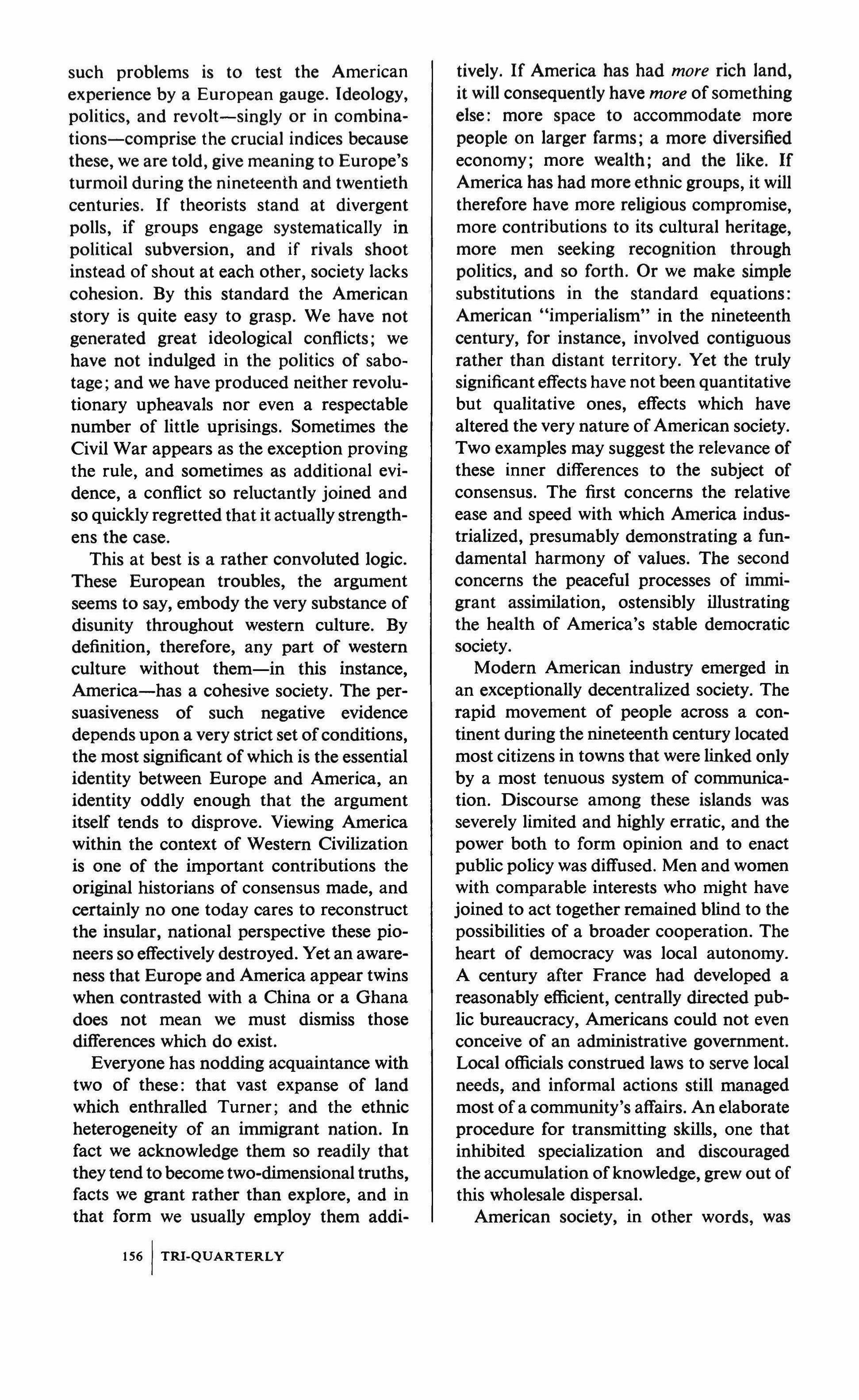
such problems is to test the American experience by a European gauge. Ideology, politics, and revolt-singly or in combinations-comprise the crucial indices because these, we are told, give meaning to Europe's turmoil during the nineteenth and twentieth centuries. If theorists stand at divergent polls, if groups engage systematically in political subversion, and if rivals shoot instead of shout at each other, society lacks cohesion. By this standard the American story is quite easy to grasp. We have not generated great ideological conflicts; we have not indulged in the politics of sabotage; and we have produced neither revolutionary upheavals nor even a respectable number of little uprisings. Sometimes the Civil War appears as the exception proving the rule, and sometimes as additional evidence, a conflict so reluctantly joined and so quickly regretted that it actuallystrengthens the case.
This at best is a rather convoluted logic. These European troubles, the argument seems to say, embody the very substance of disunity throughout western culture. By definition, therefore, any part of western culture without them-in this instance, America-has a cohesive society. The persuasiveness of such negative evidence depends upon a very strict set ofconditions, the most significant of which is the essential identity between Europe and America, an identity oddly enough that the argument itself tends to disprove. Viewing America within the context of Western Civilization is one of the important contributions the original historians of consensus made, and certainly no one today cares to reconstruct the insular, national perspective these pioneers so effectively destroyed. Yet an awareness that Europe and America appear twins when contrasted with a China or a Ghana does not mean we must dismiss those differences which do exist.
Everyone has nodding acquaintance with two of these: that vast expanse of land which enthralled Turner; and the ethnic heterogeneity of an immigrant nation. In fact we acknowledge them so readily that they tend to become two-dimensional truths, facts we grant rather than explore, and in that form we usually employ them addi-
tively, If America has had more rich land, it will consequently have more of something else: more space to accommodate more people on larger farms; a more diversified economy; more wealth; and the like. If America has had more ethnic groups, it will therefore have more religious compromise, more contributions to its cultural heritage, more men seeking recognition through politics, and so forth. Or we make simple substitutions in the standard equations: American "imperialism" in the nineteenth century, for instance, involved contiguous rather than distant territory. Yet the truly significant effects have not been quantitative but qualitative ones, effects which have altered the very nature of American society. Two examples may suggest the relevance of these inner differences to the subject of consensus. The first concerns the relative ease and speed with which America industrialized, presumably demonstrating a fundamental harmony of values. The second concerns the peaceful processes of immigrant assimilation, ostensibly illustrating the health of America's stable democratic society.
Modern American industry emerged in an exceptionally decentralized society. The rapid movement of people across a continent during the nineteenth century located most citizens in towns that were linked only by a most tenuous system of communication. Discourse among these islands was severely limited and highly erratic, and the power both to form opinion and to enact public policy was diffused. Men and women with comparable interests who might have joined to act together remained blind to the possibilities of a broader cooperation. The heart of democracy was local autonomy. A century after France had developed a reasonably efficient, centrally directed public bureaucracy, Americans could not even conceive of an administrative government. Local officials construed laws to serve local needs, and informal actions still managed most of a community's affairs. An elaborate procedure for transmitting skills, one that inhibited specialization and discouraged the accumulation ofknowledge, grew out of this wholesale dispersal.
American society, in other words, was
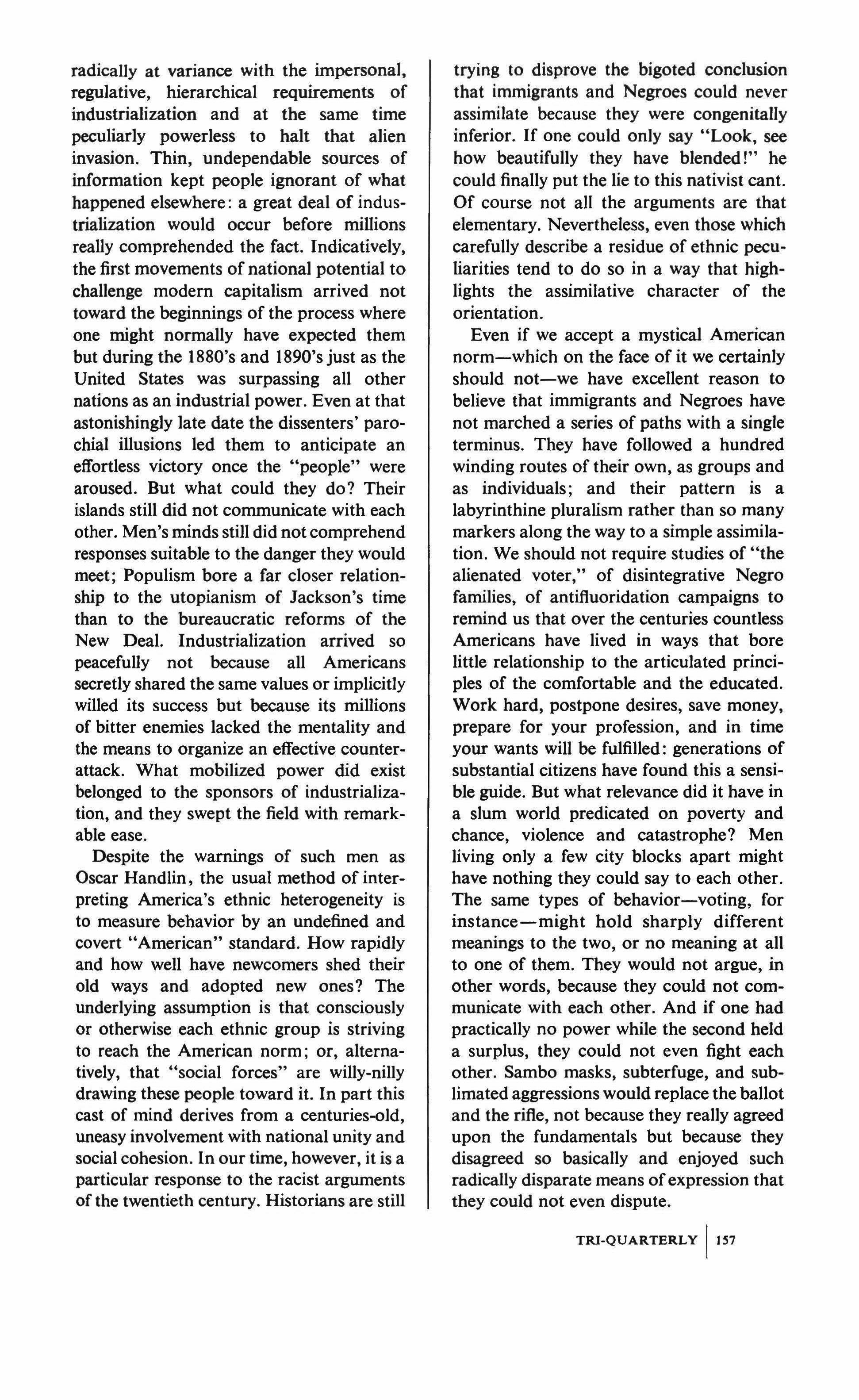
radically at variance with the impersonal, regulative, hierarchical requirements of industrialization and at the same time peculiarly powerless to halt that alien invasion. Thin, undependable sources of information kept people ignorant of what happened elsewhere: a great deal of industrialization would occur before millions really comprehended the fact. Indicatively, the first movements of national potential to challenge modem capitalism arrived not toward the beginnings of the process where one might normally have expected them but during the 1880's and 1890's just as the United States was surpassing all other nations as an industrial power. Even at that astonishingly late date the dissenters' parochial illusions led them to anticipate an effortless victory once the "people" were aroused. But what could they do? Their islands still did not communicate with each other. Men's minds still did not comprehend responses suitable to the danger they would meet; Populism bore a far closer relationship to the utopianism of Jackson's time than to the bureaucratic reforms of the New Deal. Industrialization arrived so peacefully not because all Americans secretly shared the same values or implicitly willed its success but because its millions of bitter enemies lacked the mentality and the means to organize an effective counterattack. What mobilized power did exist belonged to the sponsors of industrialization, and they swept the field with remarkable ease.
Despite the warnings of such men as Oscar Handlin, the usual method of interpreting America's ethnic heterogeneity is to measure behavior by an undefined and covert "American" standard. How rapidly and how well have newcomers shed their old ways and adopted new ones? The underlying assumption is that consciously or otherwise each ethnic group is striving to reach the American norm; or, alternatively, that "social forces" are willy-nilly drawing these people toward it. In part this cast of mind derives from a centuries-old, uneasy involvement with national unity and social cohesion. In our time, however, it is a particular response to the racist arguments of the twentieth century. Historians are still
trying to disprove the bigoted conclusion that immigrants and Negroes could never assimilate because they were congenitally inferior. If one could only say "Look, see how beautifully they have blended!" he could finally put the lie to this nativist cant. Of course not all the arguments are that elementary. Nevertheless, even those which carefully describe a residue of ethnic peculiarities tend to do so in a way that highlights the assimilative character of the orientation.
Even if we accept a mystical American norm-which on the face of it we certainly should not-we have excellent reason to believe that immigrants and Negroes have not marched a series of paths with a single terminus. They have followed a hundred winding routes of their own, as groups and as individuals; and their pattern is a labyrinthine pluralism rather than so many markers along the way to a simple assimilation. We should not require studies of "the alienated voter," of disintegrative Negro families, of antifluoridation campaigns to remind us that over the centuries countless Americans have lived in ways that bore little relationship to the articulated principles of the comfortable and the educated. Work hard, postpone desires, save money, prepare for your profession, and in time your wants will be fulfilled: generations of substantial citizens have found this a sensible guide. But what relevance did it have in a slum world predicated on poverty and chance, violence and catastrophe? Men living only a few city blocks apart might have nothing they could say to each other. The same types of behavior-voting, for instance-might hold sharply different meanings to the two, or no meaning at all to one of them. They would not argue, in other words, because they could not communicate with each other. And if one had practically no power while the second held a surplus, they could not even fight each other. Sambo masks, subterfuge, and sublimated aggressions would replace the ballot and the rifle, not because they really agreed upon the fundamentals but because they disagreed so basically and enjoyed such radically disparate means ofexpression that they could not even dispute.
TRJ-QUARTERLY 1157
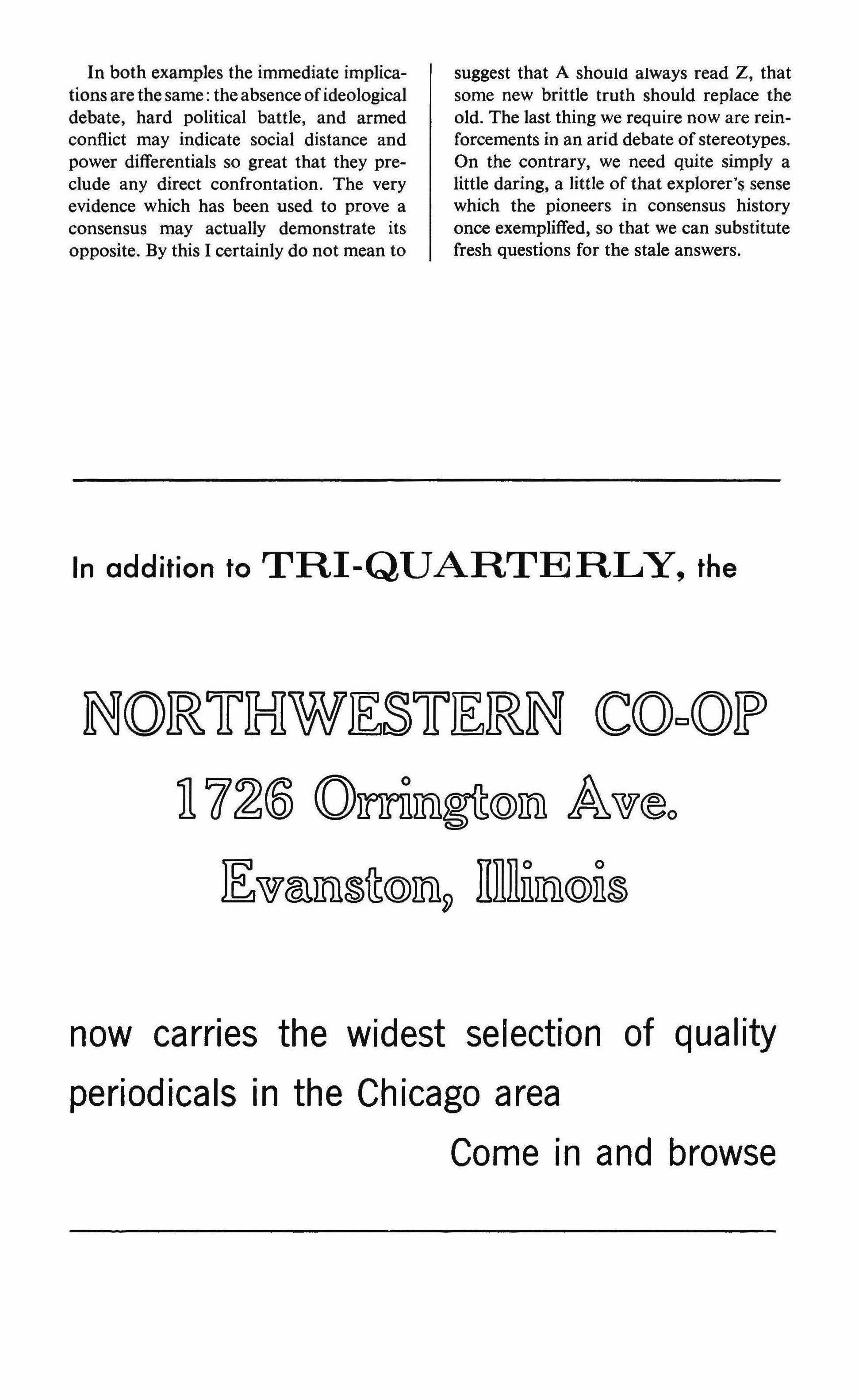
In both examples the immediate implications are the same: the absence ofideological debate, hard political battle, and armed conflict may indicate social distance and power differentials so great that they preclude any direct confrontation. The very evidence which has been used to prove a consensus may actually demonstrate its opposite. By this I certainly do not mean to
suggest that A should always read Z, that some new brittle truth should replace the old. The last thing we require now are reinforcements in an arid debate of stereotypes. On the contrary, we need quite simply a little daring, a little of that explorer's sense which the pioneers in consensus history once exempliffed, so that we can substitute fresh questions for the stale answers.
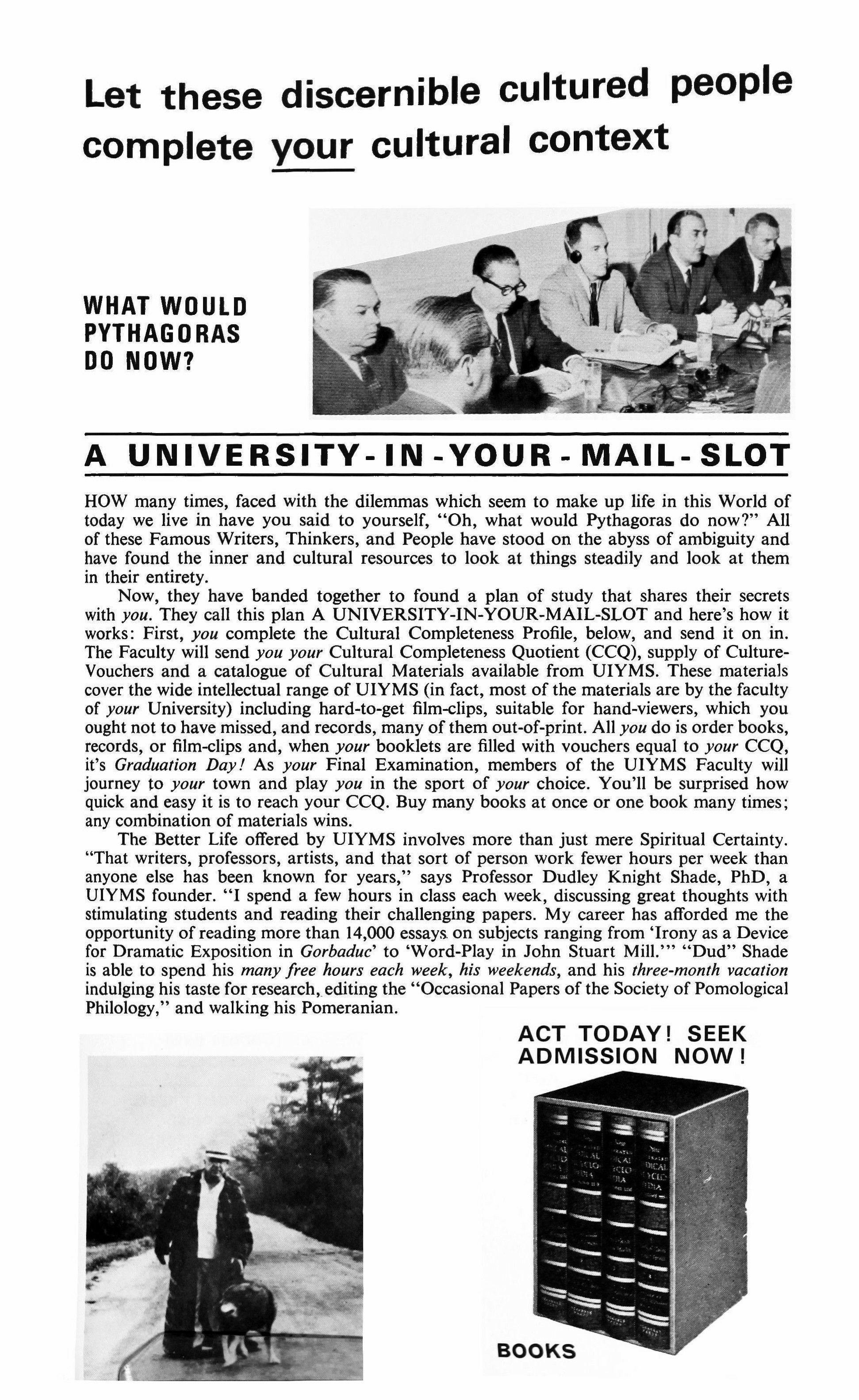
HOW many times, faced with the dilemmas which seem to make up life in this World of today we live in have you said to yourself, "Oh, what would Pythagoras do now?" All of these Famous Writers, Thinkers, and People have stood on the abyss of ambiguity and have found the inner and cultural resources to look at things steadily and look at them in their entirety.
Now, they have banded together to found a plan of study that shares their secrets with you. They call this plan A UNIVERSITY-IN-YOUR-MAIL-SLOT and here's how it works: First, you complete the Cultural Completeness Profile, below, and send it on in. The Faculty will send you your Cultural Completeness Quotient (CCQ), supply of CultureVouchers and a catalogue of Cultural Materials available from UIYMS. These materials cover the wide intellectual range of UIYMS (in fact, most of the materials are by the faculty of your University) including hard-to-get film-clips, suitable for hand-viewers, which you ought not to have missed, and records, many of them out-of-print. All you do is order books, records, or film-clips and, when your booklets are filled with vouchers equal to your CCQ, it's Graduation Day! As your Final Examination, members of the UIYMS Faculty will journey to your town and play you in the sport of your choice. You'll be surprised how quick and easy it is to reach your CCQ. Buy many books at once or one book many times; any combination of materials wins.
The Better Life offered by UIYMS involves more than just mere Spiritual Certainty. "That writers, professors, artists, and that sort of person work fewer hours per week than anyone else has been known for years," says Professor Dudley Knight Shade, PhD, a UIYMS founder. "I spend a few hours in class each week, discussing great thoughts with stimulating students and reading their challenging papers. My career has afforded me the opportunity of reading more than 14,000 essays. on subjects ranging from 'Irony as a Device for Dramatic Exposition in Gorbaduc' to 'Word-Play in John Stuart Mill." "Dud" Shade is able to spend his many free hours each week, his weekends, and his three-month vacation indulging his taste for research, editing the "Occasional Papers of the Society of Pornological Philology," and walking his Pomeranian.
ACT TODAY! SEEK ADMISSION NOW!
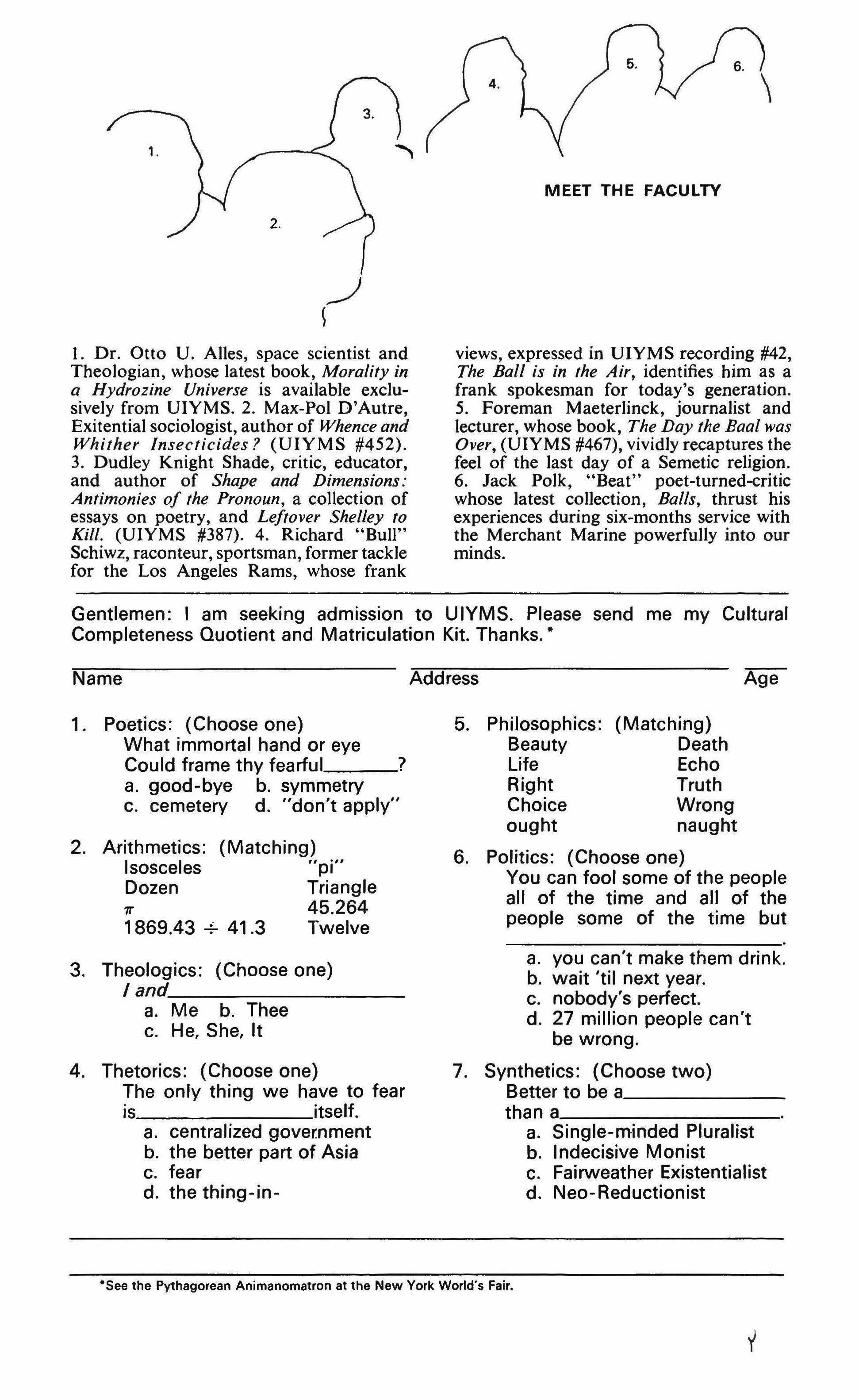
l. Dr. Otto U. Alles, space scientist and Theologian, whose latest book, Morality in a Hydrozine Universe is available exclusively from UIYMS. 2. Max-Pol D'Autre, Exitential sociologist, author of Whence and Whither Insecticides? (UIYMS #452).
3. Dudley Knight Shade, critic, educator, and author of Shape and Dimensions: Antimonies of the Pronoun, a collection of essays on poetry, and Leftover Shelley to Kill. (UIYMS #387). 4. Richard "Bull" Schiwz, raconteur, sportsman, former tackle for the Los Angeles Rams, whose frank
views, expressed in UIYMS recording #42, The Ball is in the Air, identifies him as a frank spokesman for today's generation.
5. Foreman Maeterlinck, journalist and lecturer, whose book, The Day the Baal was Over, (UIYMS #467), vividly recaptures the feel of the last day of a Semetic religion.
6. Jack Polk, "Beat" poet-turned-critic whose latest collection, Balls, thrust his experiences during six-months service with the Merchant Marine powerfully into our minds.
Gentlemen: I am seeking admission to UIYMS. Please send me my Cultural Completeness Quotient and Matriculation Kit. Thanks.
Name
1. Poetics: (Choose one)
What immortal hand or eye
Could frame thy fearful ?
a. good-bye b. symmetry c. cemetery d. "don't apply"
2. Arithmetics: Isosceles Dozen (Matching)
3. Theologics: (Choose one) land
4. Thetorics: (Choose one) The only thing we have to fear is itself.
a. centralized government b. the better part of Asia
c. fear d. the thing-in-
5. Philosophics: Beauty Life Right Choice
(Matching) Death Echo Truth Wrong naught
6. Politics: (Choose one)
You can fool some of the people all of the time and all of the people some of the time but
a. you can't make them drink.
b. wait 'til next year.
c. nobody's perfect.
d. 27 million people can't be wrong.
7. Synthetics: (Choose two) Better to be a thana
a. Single-minded Pluralist
b. Indecisive Monist
c. Fairweather Existentialist
d. Neo-Reductionist ·See